








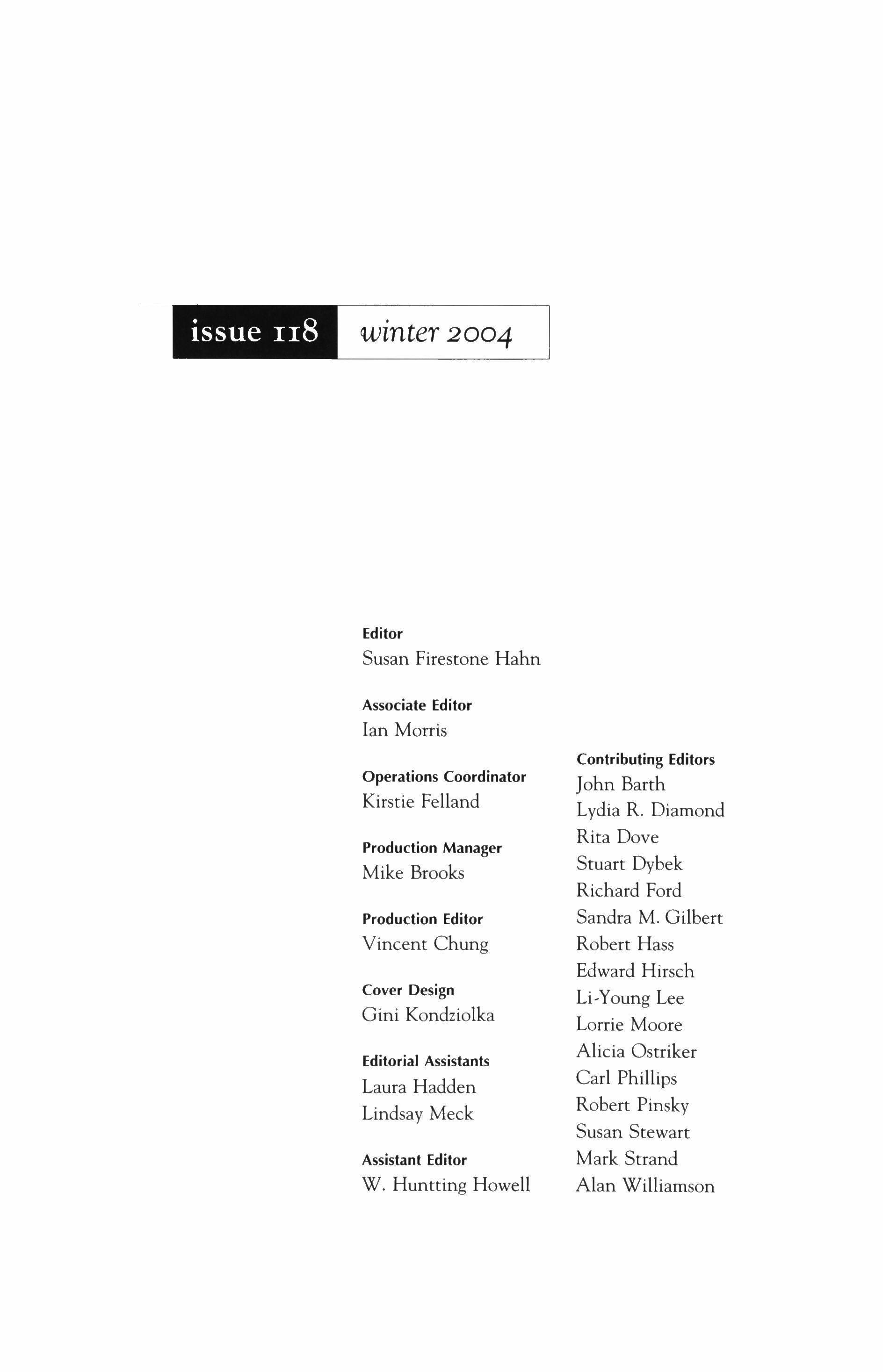
Editor
Susan Firestone Hahn
Associate Editor
Ian Morris
Operations Coordinator
Kirstie Felland
Production Manager
Mike Brooks
Production Editor
Vincent Chung
Cover Design
Gini Kondziolka
Editorial Assistants
Laura Hadden
Lindsay Meck
Assistant Editor
W. Huntting Howell
Contributing Editors
John Barth
Lydia R. Diamond
Rita Dove
Stuart Dybek
Richard Ford
Sandra M. Gilbert
Robert Hass
Edward Hirsch
Li-Young Lee
Lorrie Moore
Alicia Ostriker
Carl Phillips
Robert Pinsky
Susan Stewart
Mark Strand
Alan Williamson
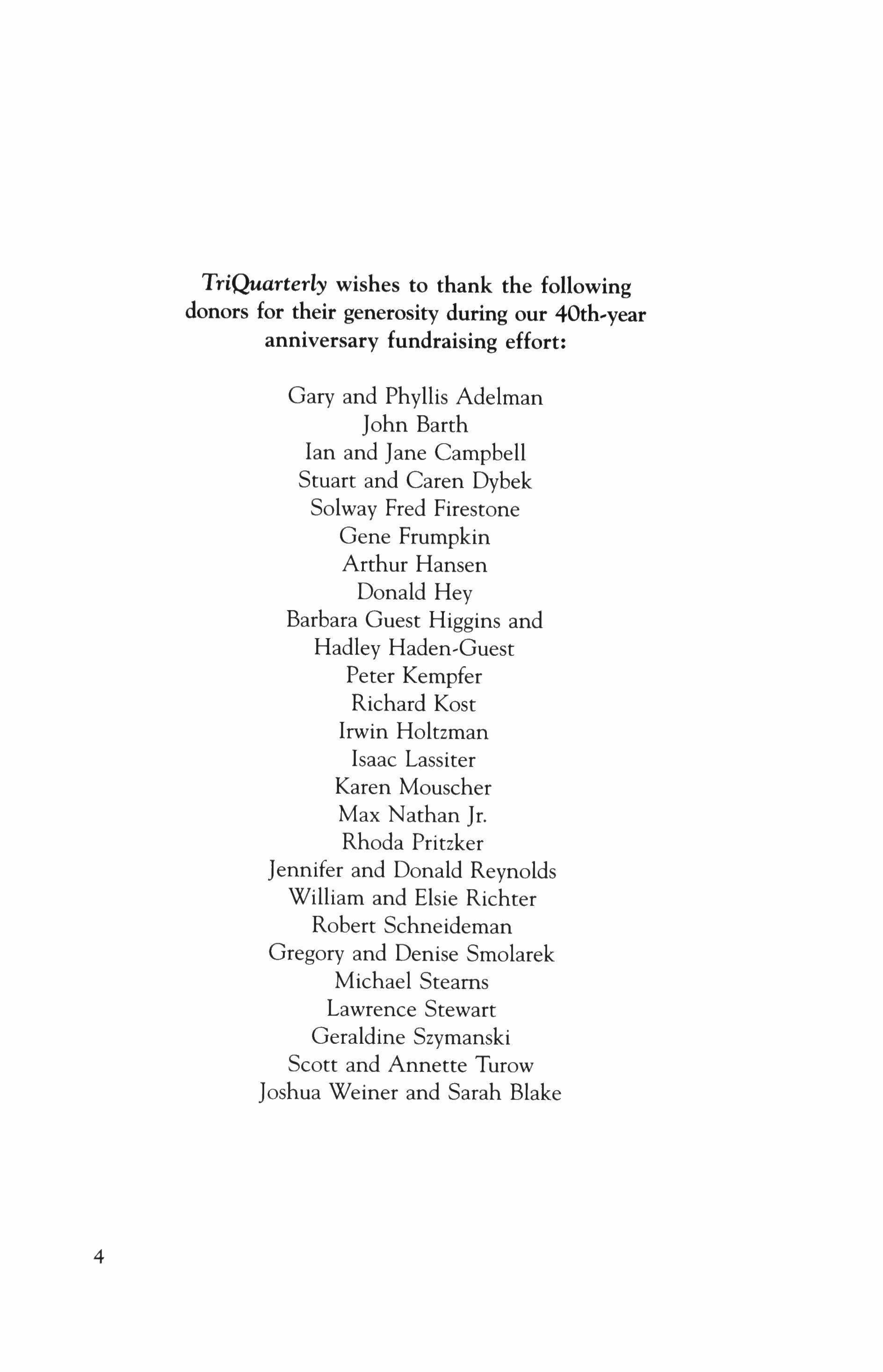
TriQuarterly wishes to thank the following donors for their generosity during our 40th,year anniversary fundraising effort:
Gary and Phyllis Adelman
John Barth
Ian and Jane Campbell
Stuart and Caren Dybek
Solway Fred Firestone
Gene Frumpkin
Arthur Hansen
Donald Hey
Barbara Guest Higgins and Hadley Haden-Guest
Peter Kempfer
Richard Kost
Irwin Holtzman
Isaac Lassiter
Karen Mouscher
Max Nathan Jr.
Rhoda Pritzker
Jennifer and Donald Reynolds
William and Elsie Richter
Robert Schneideman
Gregory and Denise Smolarek
Michael Steams
Lawrence Stewart
Geraldine Szymanski
Scott and Annette Turow
Joshua Weiner and Sarah Blake
poems

59 Herkimer; Marriage in Canaan; Germaine River
D. Nurkse
65 from Living in the Past
Philip Schultz
80 Cyanopsitta Spixii; Heteralocha Acutirostris; Xenicus Longipes
Kimiko Hahn
83 Stealing from Lehigh Dairy; Cordless
Daisy Fried
88 Emerging Figure
Robert Farnsworth
90 The Good Shepherd
Nathaniel Bellows
92 The Poet's House; To the Reader
Corey Marks
97 In Anticipation of an Audience
Judith Hall
131 Lucifer in New York
Lloyd Schwartz
151 Blue Angels
larry Janowski
154 What a Little Charisma Can Do; Portrait of My Father Slapping His Ear
David Hernandez
157 summer lesson; the grass; the obituaries
Christine Garren
160 The Persistence of Memory; One Another
Roy Jacobstein
162 Absence; Have You Ever Started Your Life Over; Cut Roses
Anne Marie Macari
167 River; Birch; Mad
Elizabeth Arnold
185 The Drowned Girl's Say
Steve Fay
196 Early Spring; In Extremis
Corey Thrasher
199 Learning the Trails
Jeffrey Harrison
201 Hayden's Writer's Shack's Latest Occupant
Neil Shepard
203 The Atlantis of Morning
Geri Doran
205 Samsara; Winter Solstice: Newgrange, Ireland; Kata Tjuta
Richard Foerster 210 Eurydice & Orpheus; Poem; Voice, Distant, Still Assembling; Hello
Mark Irwin
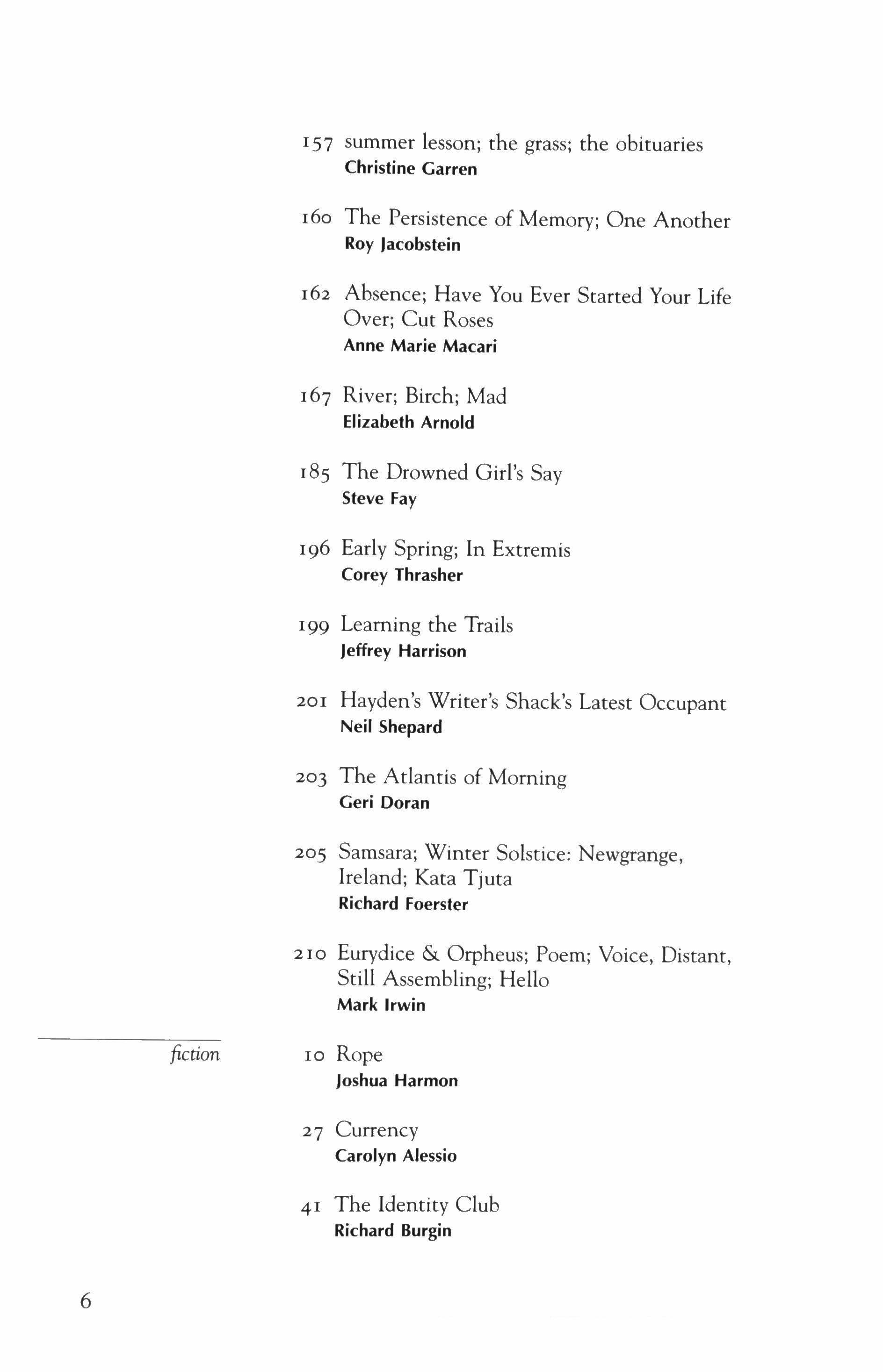
Currency Carolyn Alessio
The Identity Club
Richard Burgin
170 Freedom; Supernatural
Alexi Galaviz-Budziszewski
224 Walking on Water
Tara Mantel
235 Muggings
David H. Lynn
play 99 Crime and Punishment
Marilyn Campbell, Curt Columbus
essays 140 Reflections from a Concrete Shore
Donna Seaman
249 The 5:30 Irregulars
Judith Valente
translations 8 Spring Snow
Han Yu
Translated from the Chinese by Tony Barnstone and Chou Ping
2 I 5 A Photograph; The Boat; Return to the Forest; [At dawn the light ]; But whoever sees ; The Wall; [I struggled through the dream ]; Chestnut Tree
Tadeusz Rozewicz
Translated from the Polish by Joanna Trzeciak
257 A Fallen Petal
Han Yu
Translated from the Chinese by Tony Barnstone and Chou Ping
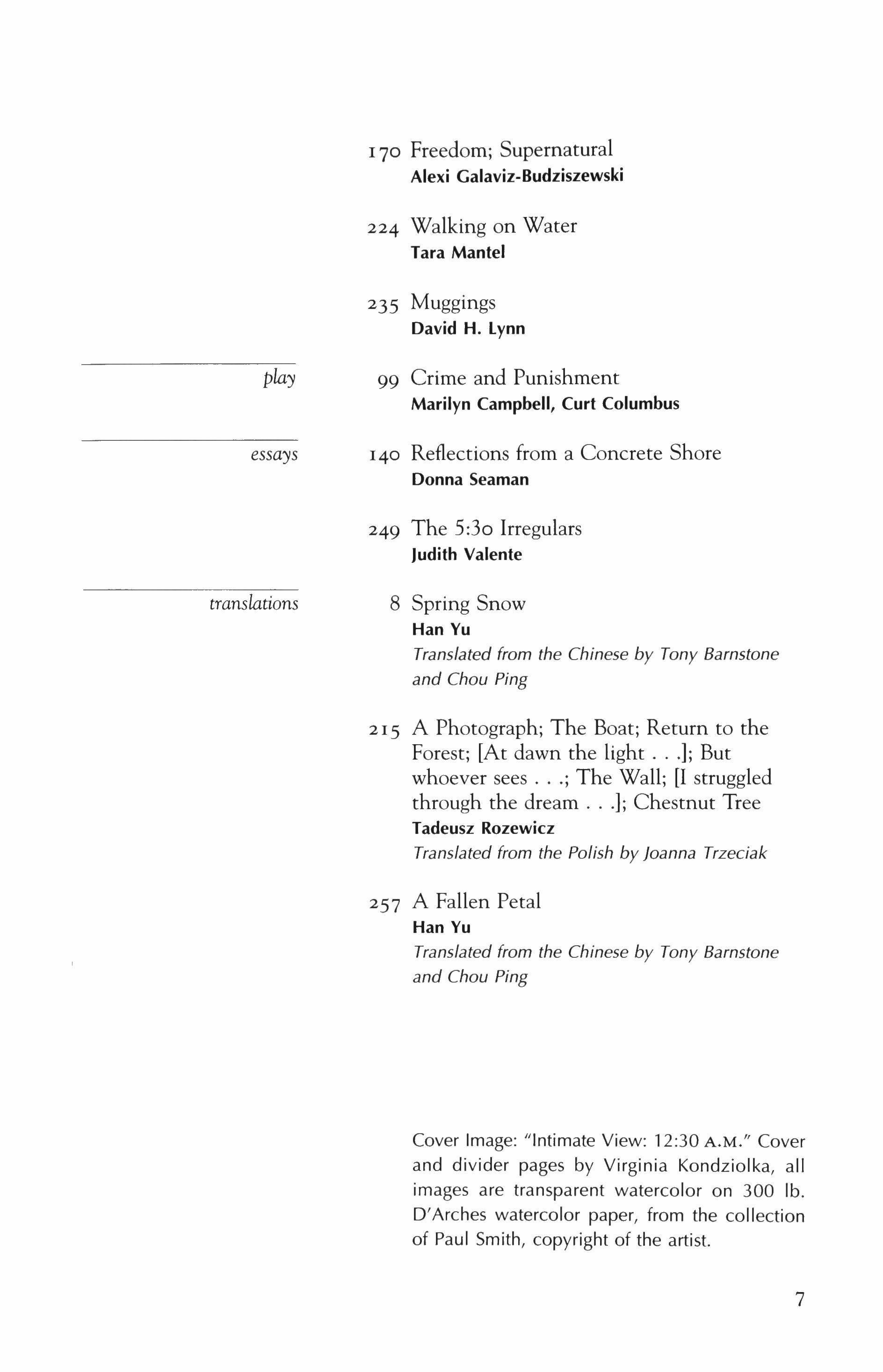
Cover Image: "Intimate View: 12:30 A.M." Cover and divider pages by Virginia Kondziolka, all images are transparent watercolor on 300 lb. D'Arches watercolor paper, from the collection of Paul Smith, copyright of the artist.
Translated from the Chinese by Tony Bamstone and Chou Ping
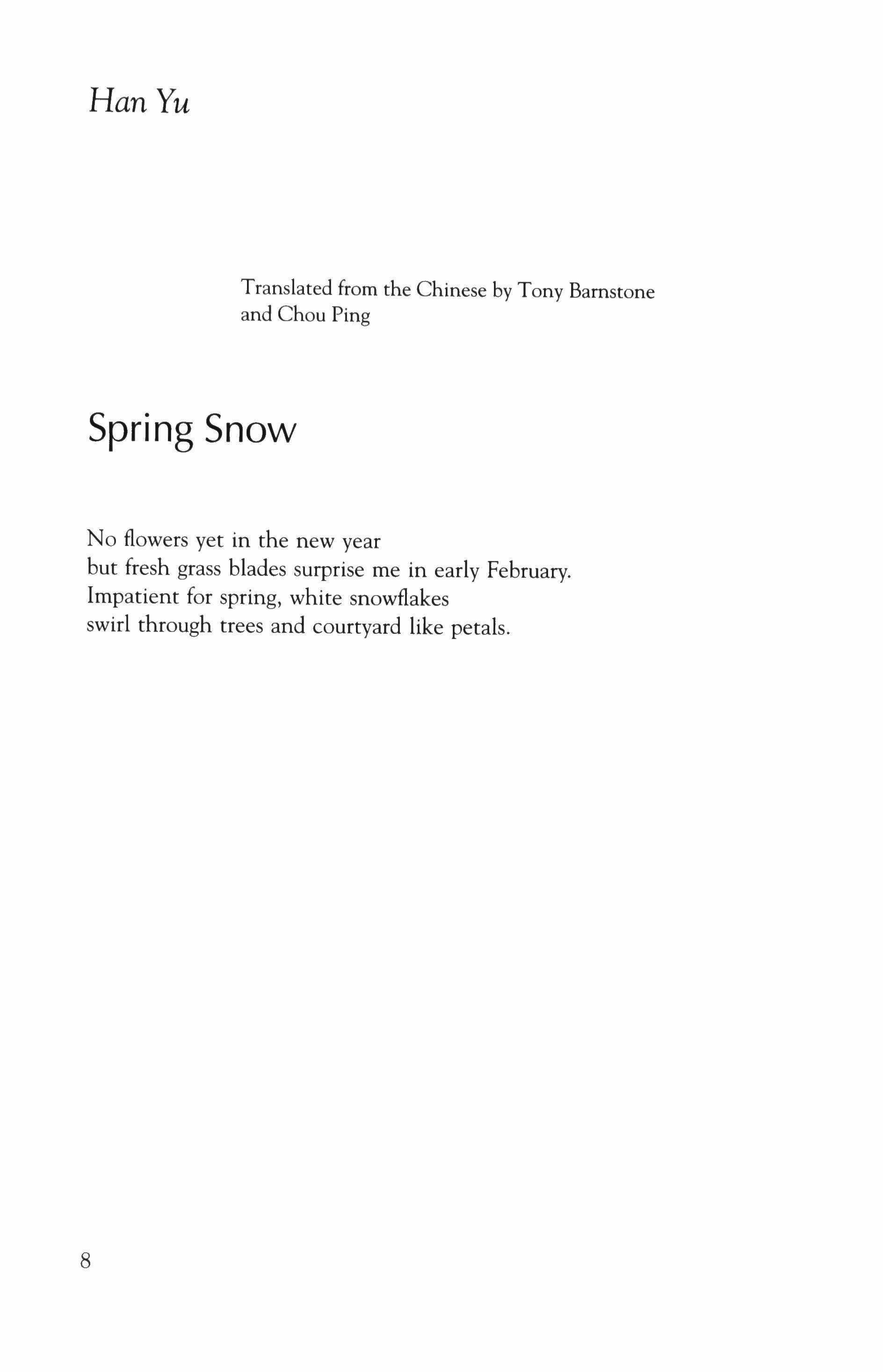
No flowers yet in the new year but fresh grass blades surprise me in early February. Impatient for spring, white snowflakes swirl through trees and courtyard like petals.
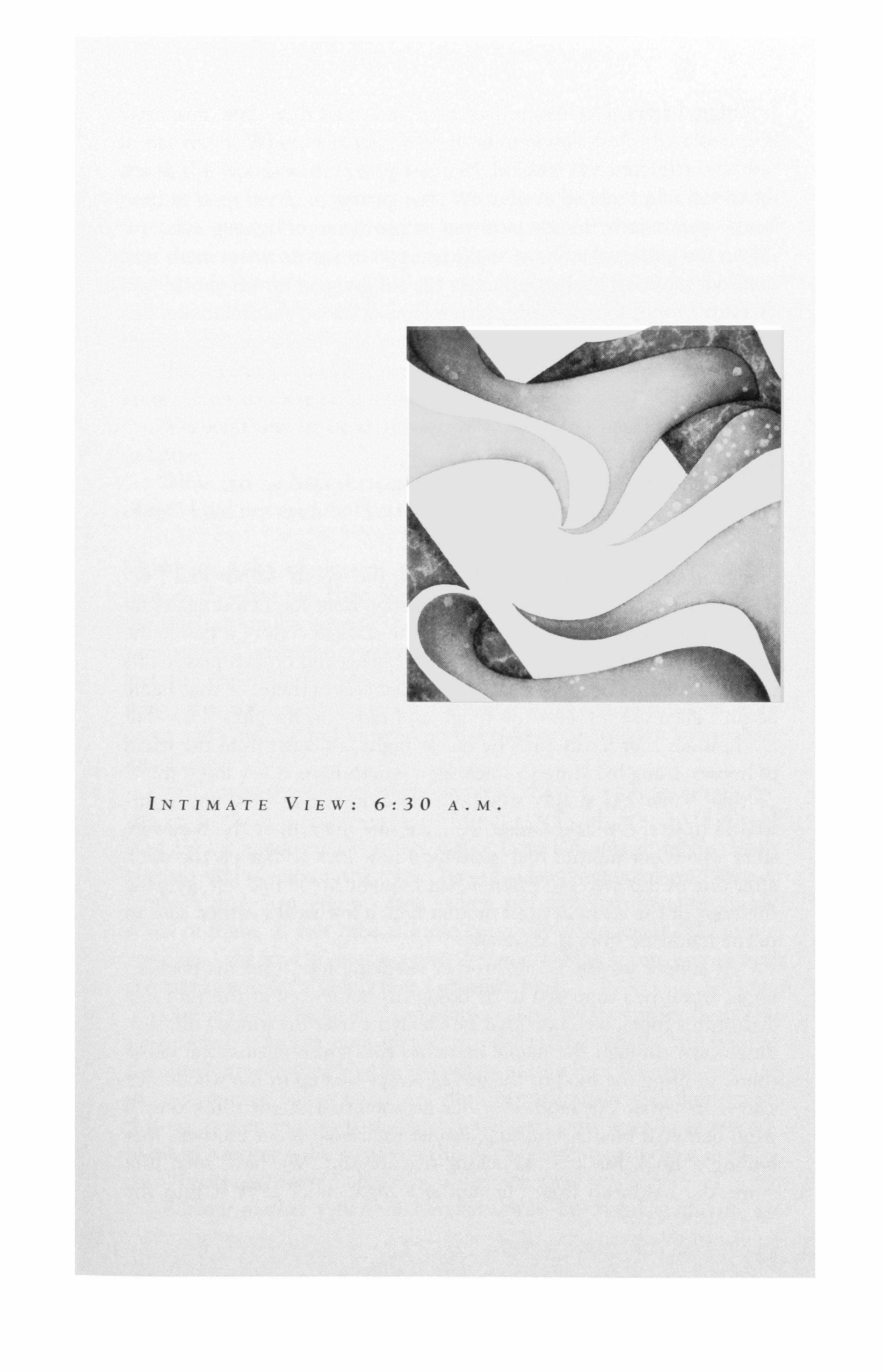
INTIMATE VIEW: 6:30 A.M.

Our brother keeps a girl tied to a tree in the woods. Mindy and I believe that Jamie, our brother, stole the rope from Joe Letourneau's father's garage, where everyone has seen the stacked coils of it beside the broken-toothed rakes and broken-spoked bikes and broken plastic bits of last Christmas's toys that Mr. Letourneau saves there, or that Jamie doesn't even use a rope-too rough and raspy on his girl's skin-but clotheslines that for months he has at night collected from the backs of houses, using his knife to snick off a length here, a few loops there, or that Jamie has simply snitched the clotheslines new and tightwound from the wicker basket we once saw them in at the hardware store where our mother had gone for a new lock to put on the door, after one of the men our mother had brought home had left, keeping the copy of the extra key our mother had, a few weeks earlier, sent us to the hardware store to have cut.
At supper we catch our brother sneaking food into his pockets. Later, when he's supposed to be doing his homework at the yard sale desk in his room, we know that he's bellying over his windowsill, slipping down through the maple branches that brush against the house there, to bring the food to the girl he keeps tied up in the woods. We know that what our mother or our grandmother might think only a wind-bothered branch brushing against the house is our brother's foot finding a hold, his knee knocking a clapboard. We have seen him swipe the hairbrush from our mother's nightstand, carry it into the
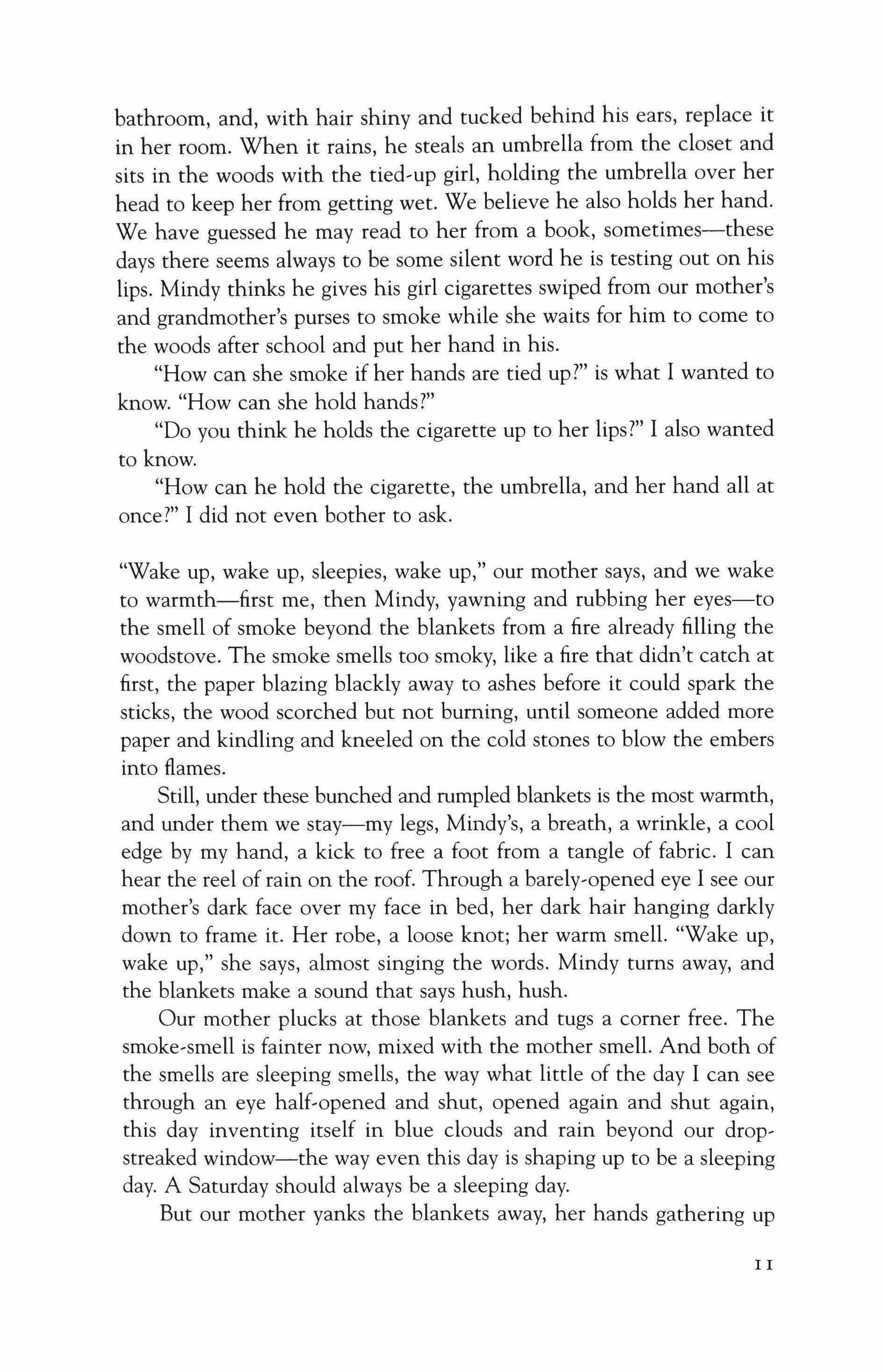
bathroom, and, with hair shiny and tucked behind his ears, replace it in her room. When it rains, he steals an umbrella from the closet and sits in the woods with the tied-up girl, holding the umbrella over her head to keep her from getting wet. We believe he also holds her hand. We have guessed he may read to her from a book, sometimes-these days there seems always to be some silent word he is testing out on his lips. Mindy thinks he gives his girl cigarettes swiped from our mother's and grandmother's purses to smoke while she waits for him to come to the woods after school and put her hand in his.
"How can she smoke if her hands are tied up?" is what I wanted to know. "How can she hold hands?"
"Do you think he holds the cigarette up to her lips?" I also wanted to know.
"How can he hold the cigarette, the umbrella, and her hand all at once?" I did not even bother to ask.
"Wake up, wake up, sleepies, wake up," our mother says, and we wake to warmth-first me, then Mindy, yawning and rubbing her eyes-to the smell of smoke beyond the blankets from a fire already filling the woodstove. The smoke smells too smoky, like a fire that didn't catch at first, the paper blazing blackly away to ashes before it could spark the sticks, the wood scorched but not burning, until someone added more paper and kindling and kneeled on the cold stones to blow the embers into flames.
Still, under these bunched and rumpled blankets is the most warmth, and under them we stay-my legs, Mindy's, a breath, a wrinkle, a cool edge by my hand, a kick to free a foot from a tangle of fabric. I can hear the reel of rain on the roof. Through a barely-opened eye I see our mother's dark face over my face in bed, her dark hair hanging darkly down to frame it. Her robe, a loose knot; her warm smell. "Wake up, wake up," she says, almost singing the words. Mindy turns away, and the blankets make a sound that says hush, hush.
Our mother plucks at those blankets and tugs a comer free. The smoke-smell is fainter now, mixed with the mother smell. And both of the smells are sleeping smells, the way what little of the day I can see through an eye half-opened and shut, opened again and shut again, this day inventing itself in blue clouds and rain beyond our dropstreaked window-the way even this day is shaping up to be a sleeping day. A Saturday should always be a sleeping day.
But our mother yanks the blankets away, her hands gathering up
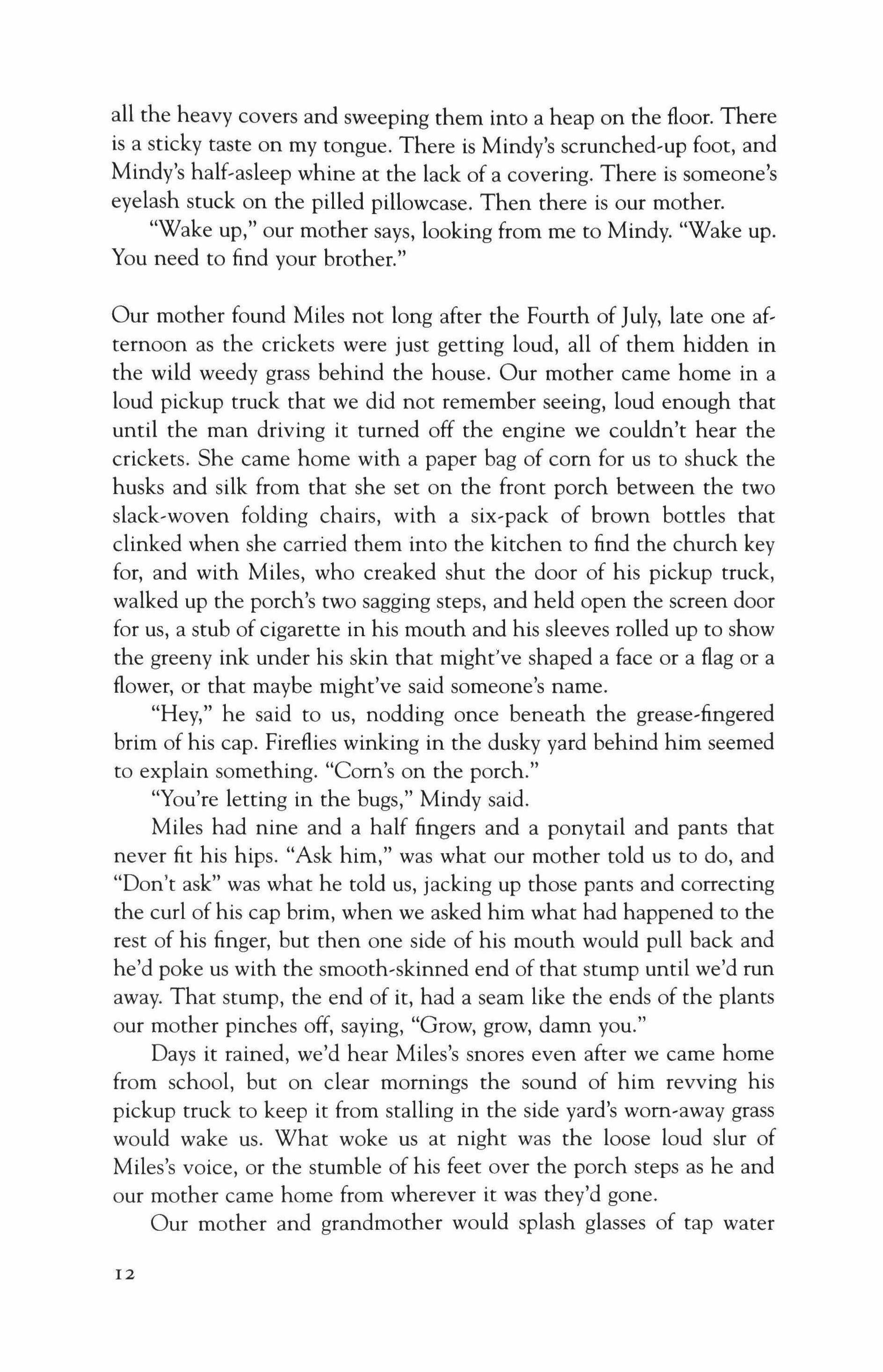
all the heavy covers and sweeping them into a heap on the floor. There is a sticky taste on my tongue. There is Mindy's scrunched,up foot, and Mindy's half,asleep whine at the lack of a covering. There is someone's eyelash stuck on the pilled pillowcase. Then there is our mother.
"Wake up," our mother says, looking from me to Mindy. "Wake up. You need to find your brother."
Our mother found Miles not long after the Fourth of July, late one afternoon as the crickets were just getting loud, all of them hidden in the wild weedy grass behind the house. Our mother came home in a loud pickup truck that we did not remember seeing, loud enough that until the man driving it turned off the engine we couldn't hear the crickets. She came home with a paper bag of corn for us to shuck the husks and silk from that she set on the front porch between the two slack,woven folding chairs, with a six-pack of brown bottles that clinked when she carried them into the kitchen to find the church key for, and with Miles, who creaked shut the door of his pickup truck, walked up the porch's two sagging steps, and held open the screen door for us, a stub of cigarette in his mouth and his sleeves rolled up to show the greeny ink under his skin that might've shaped a face or a flag or a flower, or that maybe might've said someone's name.
"Hey," he said to us, nodding once beneath the grease-fingered brim of his cap. Fireflies winking in the dusky yard behind him seemed to explain something. "Corn's on the porch."
"You're letting in the bugs," Mindy said.
Miles had nine and a half fingers and a ponytail and pants that never fit his hips. "Ask him," was what our mother told us to do, and "Don't ask" was what he told us, jacking up those pants and correcting the curl of his cap brim, when we asked him what had happened to the rest of his finger, but then one side of his mouth would pull back and he'd poke us with the smooth,skinned end of that stump until we'd run away. That stump, the end of it, had a seam like the ends of the plants our mother pinches off, saying, "Grow, grow, damn you."
Days it rained, we'd hear Miles's snores even after we came home from school, but on clear mornings the sound of him revving his pickup truck to keep it from stalling in the side yard's worn,away grass would wake us. What woke us at night was the loose loud slur of Miles's voice, or the stumble of his feet over the porch steps as he and our mother came home from wherever it was they'd gone.
Our mother and grandmother would splash glasses of tap water
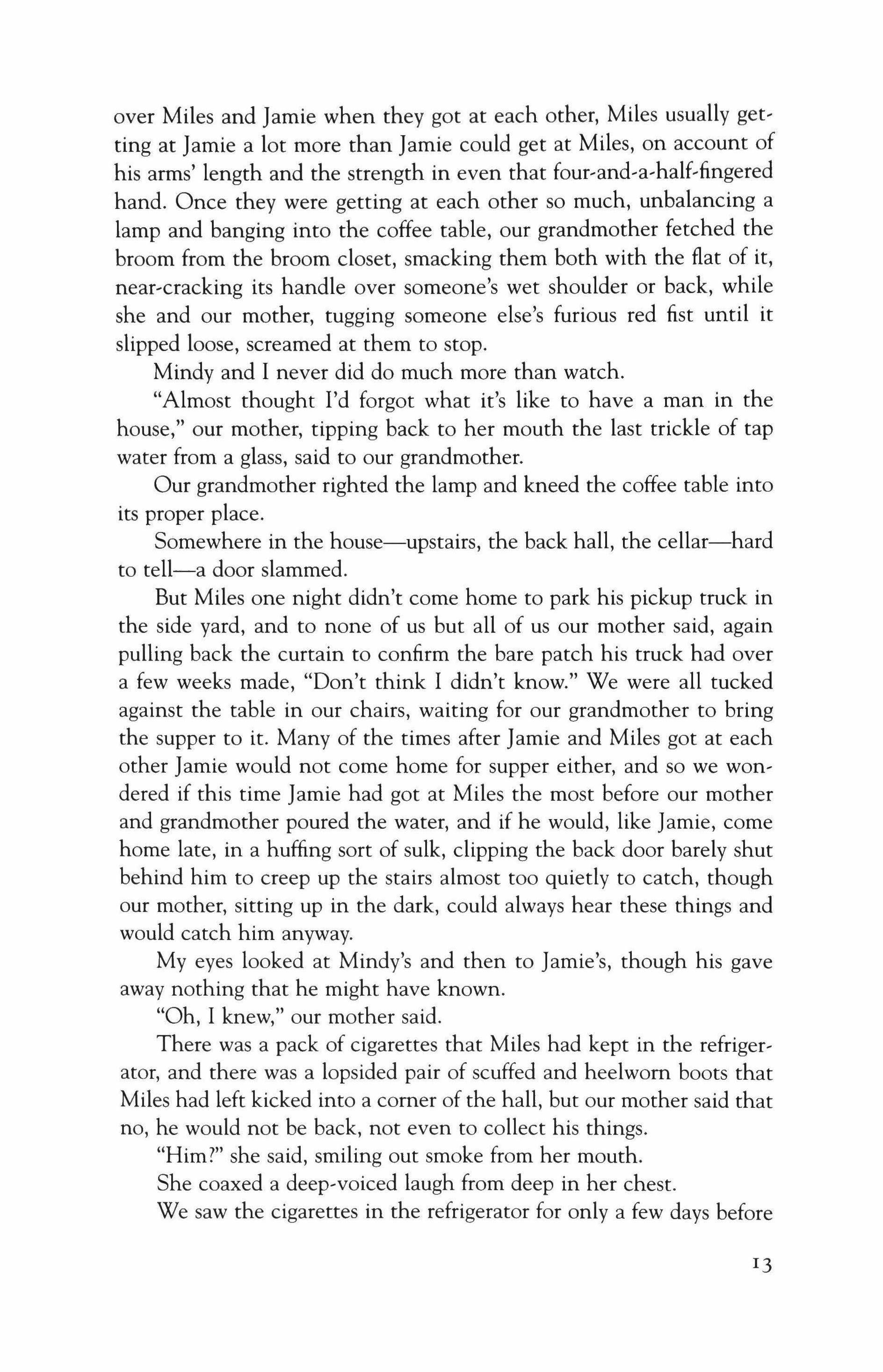
over Miles and Jamie when they got at each other, Miles usually getting at Jamie a lot more than Jamie could get at Miles, on account of his arms' length and the strength in even that four-and-a-half-fingered hand. Once they were getting at each other so much, unbalancing a lamp and banging into the coffee table, our grandmother fetched the broom from the broom closet, smacking them both with the flat of it, near-cracking its handle over someone's wet shoulder or back, while she and our mother, tugging someone else's furious red fist until it slipped loose, screamed at them to stop.
Mindy and I never did do much more than watch.
"Almost thought I'd forgot what it's like to have a man in the house," our mother, tipping back to her mouth the last trickle of tap water from a glass, said to our grandmother.
Our grandmother righted the lamp and kneed the coffee table into its proper place.
Somewhere in the house-upstairs, the back hall, the cellar-hard to tell-a door slammed.
But Miles one night didn't come home to park his pickup truck in the side yard, and to none of us but all of us our mother said, again pulling back the curtain to confirm the bare patch his truck had over a few weeks made, "Don't think I didn't know." We were all tucked against the table in our chairs, waiting for our grandmother to bring the supper to it. Many of the times after Jamie and Miles got at each other Jamie would not come home for supper either, and so we wondered if this time Jamie had got at Miles the most before our mother and grandmother poured the water, and if he would, like Jarnie, come home late, in a huffing sort of sulk, clipping the back door barely shut behind him to creep up the stairs almost too quietly to catch, though our mother, sitting up in the dark, could always hear these things and would catch him anyway.
My eyes looked at Mindy's and then to Jamie's, though his gave away nothing that he might have known.
"Oh, I knew," our mother said.
There was a pack of cigarettes that Miles had kept in the refrigerator, and there was a lopsided pair of scuffed and heelworn boots that Miles had left kicked into a comer of the hall, but our mother said that no, he would not be back, not even to collect his things.
"Him?" she said, smiling out smoke from her mouth.
She coaxed a deep-voiced laugh from deep in her chest.
We saw the cigarettes in the refrigerator for only a few days before

they were gone, and Mindy thought that Miles had come back and taken them no matter what our mother had said. "No," I told her, and that afternoon pointed out to her Jamie, out back at the edge of the woods behind our house, breathing out smoke of his own, while his lips shaped shapes we thought might be new things he was thinking to say to the girl he keeps tied in the woods.
We don't know who the girl our brother keeps tied to a tree in the woods is. We don't know what the girl looks like. We would like to think she is pretty, and Mindy says, in the quiet after-bedtime darkness of our bedroom some nights, that she would prefer the tied-up girl's hair a pale shade of blonde, perhaps tied with a green ribbon, but never a bow.
We know our brother has told his friends. Pressed against the stickered surface of his door when they're all shut inside his bedroom, we've heard them talk; we've heard the words "gorgeous," "wicked," "pound on you," "no way," "not yet." We've heard other words, and words we couldn't make out, and the simple rough grunting and smacking of boys hitting other boys hard with their hands and, possibly, their feet.
We wonder who else knows. We've tried to count the girls in our school, in our brother's older grade-the girls testing each other's eye shadow in the hallways, the girls whose bra straps the boys reach to snap in class, the girls old enough for a Saturday afternoon permanent or a pair of pierced ears if they want one, and some of them do-but can't tell if anyone of these girls is missing. They walk down the halls of school and we watch them, counting them silently to ourselves, noting in a notebook their numbers-there are so many of them, these older girls. We study a blush-bruised face, note a hand's chipped fingernail polish, observe the hand-beaded bracelets knotted around their wrists, memorize the careful line lipstick has left at the corner of a frown, tally the unbuttoned buttons of their blouses, practice their practiced walks.
We don't know who the girl is.
Downstairs, dressed, hair gathered into ponytails, socks tugged on, eyes rubbed and red, we wait for more news. Our grandmother has tipped over the chairs in the living room as if she might find our brother beneath. "Lit the fire and then left," she says. She shakes her head. "Just left, I guess." She looks at the woodstove. She holds the broom in her
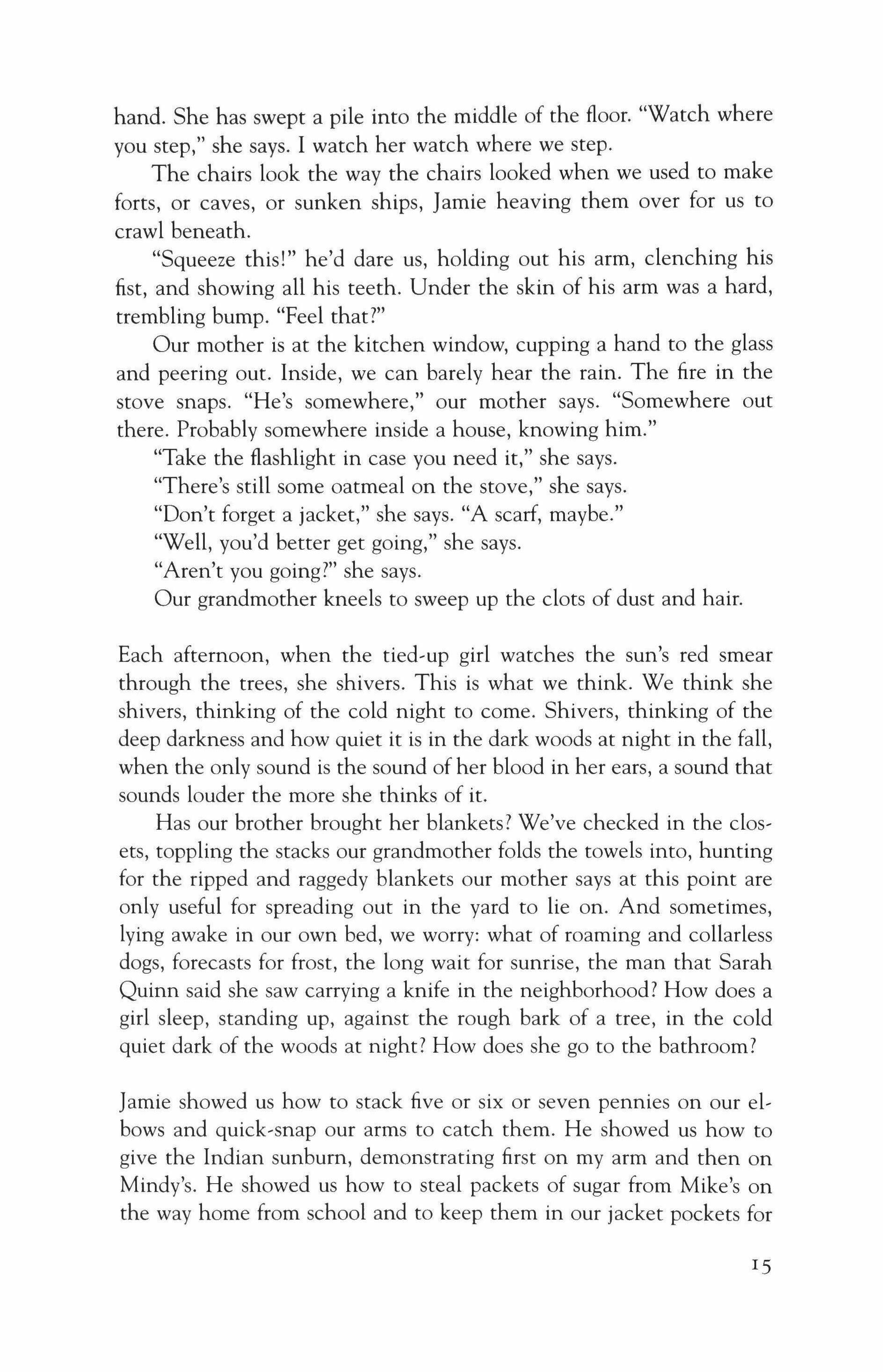
hand. She has swept a pile into the middle of the floor. "Watch where you step," she says. I watch her watch where we step.
The chairs look the way the chairs looked when we used to make forts, or caves, or sunken ships, Jamie heaving them over for us to crawl beneath.
"Squeeze this!" he'd dare us, holding out his arm, clenching his fist, and showing all his teeth. Under the skin of his arm was a hard, trembling bump. "Feel that?"
Our mother is at the kitchen window, cupping a hand to the glass and peering out. Inside, we can barely hear the rain. The fire in the stove snaps. "He's somewhere," our mother says. "Somewhere out there. Probably somewhere inside a house, knowing him."
"Take the flashlight in case you need it," she says.
"There's still some oatmeal on the stove," she says.
"Don't forget a jacket," she says. "A scarf, maybe."
"Well, you'd better get going," she says.
"Aren't you going?" she says.
Our grandmother kneels to sweep up the clots of dust and hair.
Each afternoon, when the tied-up girl watches the sun's red smear through the trees, she shivers. This is what we think. We think she shivers, thinking of the cold night to come. Shivers, thinking of the deep darkness and how quiet it is in the dark woods at night in the fall, when the only sound is the sound of her blood in her ears, a sound that sounds louder the more she thinks of it.
Has our brother brought her blankets? We've checked in the closets, toppling the stacks our grandmother folds the towels into, hunting for the ripped and raggedy blankets our mother says at this point are only useful for spreading out in the yard to lie on. And sometimes, lying awake in our own bed, we worry: what of roaming and collarless dogs, forecasts for frost, the long wait for sunrise, the man that Sarah Quinn said she saw carrying a knife in the neighborhood? How does a girl sleep, standing up, against the rough bark of a tree, in the cold quiet dark of the woods at night? How does she go to the bathroom?
Jamie showed us how to stack five or six or seven pennies on our elbows and quick-snap our arms to catch them. He showed us how to give the Indian sunburn, demonstrating first on my arm and then on Mindy's. He showed us how to steal packets of sugar from Mike's on the way home from school and to keep them in our jacket pockets for
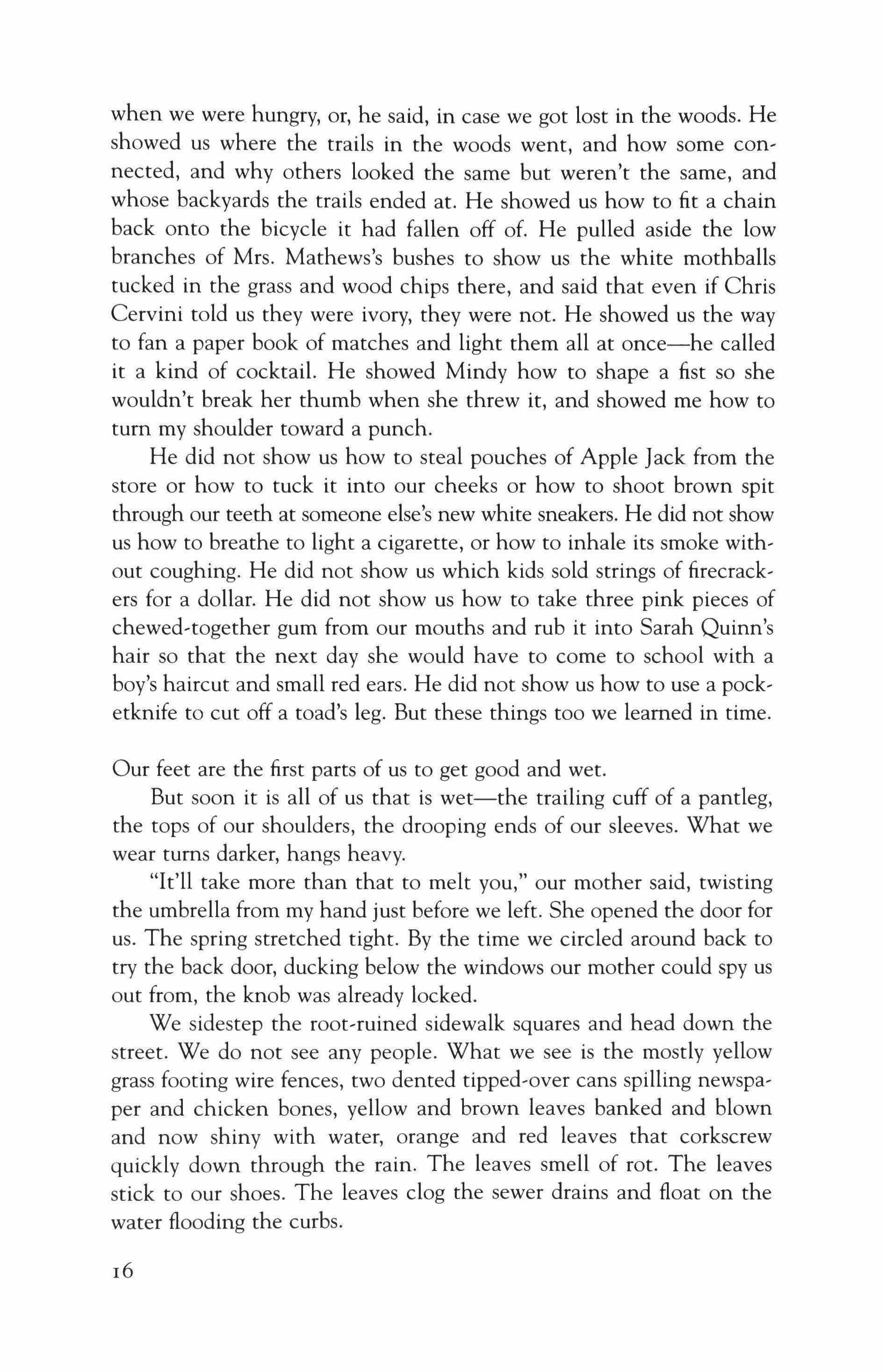
when we were hungry, or, he said, in case we got lost in the woods. He showed us where the trails in the woods went, and how some connected, and why others looked the same but weren't the same, and whose backyards the trails ended at. He showed us how to fit a chain back onto the bicycle it had fallen off of. He pulled aside the low branches of Mrs. Mathews's bushes to show us the white mothballs tucked in the grass and wood chips there, and said that even if Chris Cervini told us they were ivory, they were not. He showed us the way to fan a paper book of matches and light them all at once-he called it a kind of cocktail. He showed Mindy how to shape a fist so she wouldn't break her thumb when she threw it, and showed me how to tum my shoulder toward a punch.
He did not show us how to steal pouches of Apple Jack from the store or how to tuck it into our cheeks or how to shoot brown spit through our teeth at someone else's new white sneakers. He did not show us how to breathe to light a cigarette, or how to inhale its smoke without coughing. He did not show us which kids sold strings of firecrackers for a dollar. He did not show us how to take three pink pieces of chewed-together gum from our mouths and rub it into Sarah Quinn's hair so that the next day she would have to come to school with a boy's haircut and small red ears. He did not show us how to use a pocketknife to cut off a toad's leg. But these things too we learned in time.
Our feet are the first parts of us to get good and wet.
But soon it is all of us that is wet-the trailing cuff of a pantleg, the tops of our shoulders, the drooping ends of our sleeves. What we wear turns darker, hangs heavy.
"It'll take more than that to melt you," our mother said, twisting the umbrella from my hand just before we left. She opened the door for us. The spring stretched tight. By the time we circled around back to try the back door, ducking below the windows our mother could spy us out from, the knob was already locked.
We sidestep the root-ruined sidewalk squares and head down the street. We do not see any people. What we see is the mostly yellow grass footing wire fences, two dented tipped-over cans spilling newspaper and chicken bones, yellow and brown leaves banked and blown and now shiny with water, orange and red leaves that corkscrew quickly down through the rain. The leaves smell of rot. The leaves stick to our shoes. The leaves clog the sewer drains and float on the water flooding the curbs.
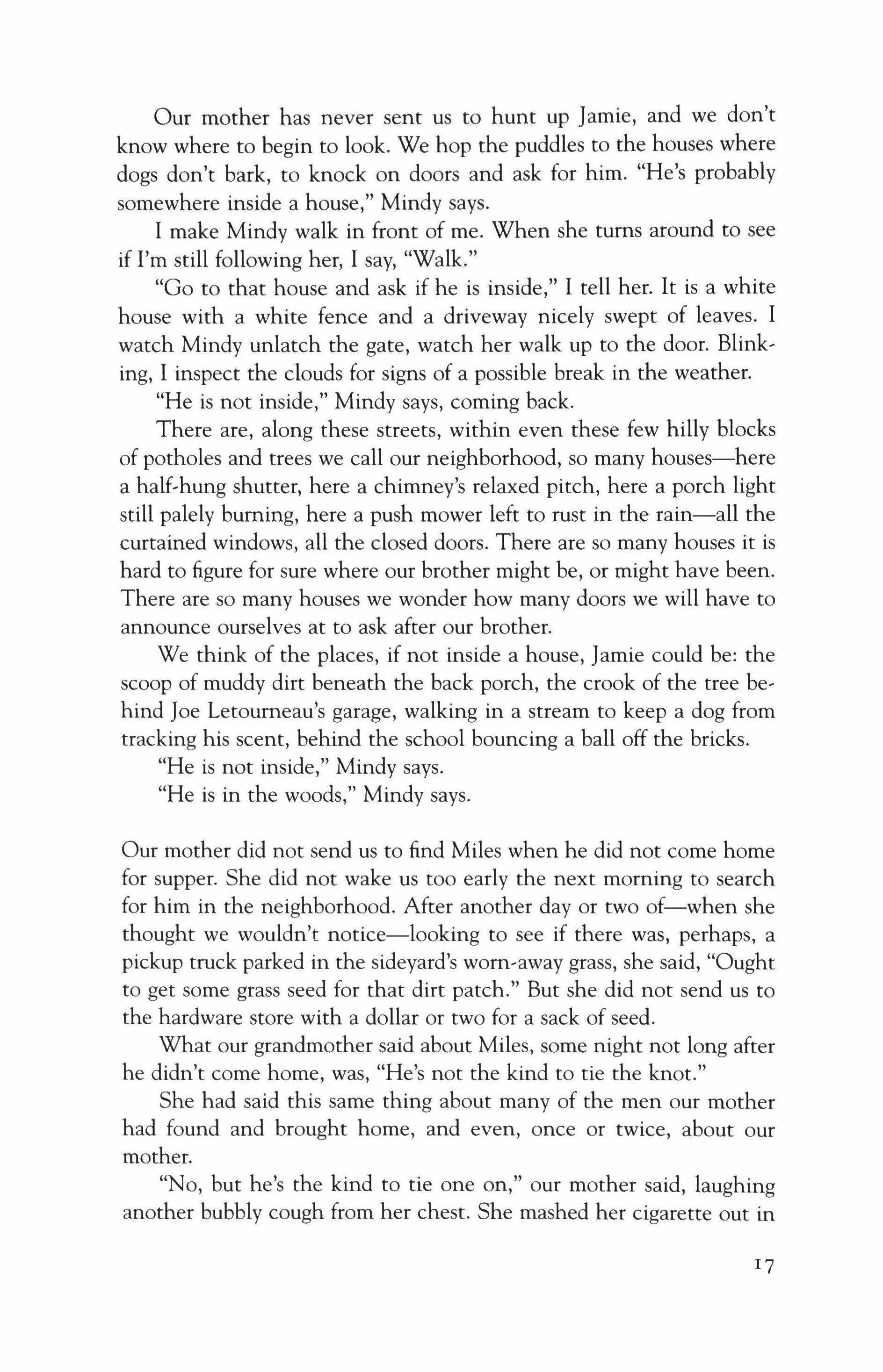
Our mother has never sent us to hunt up Jarnie, and we don't know where to begin to look. We hop the puddles to the houses where dogs don't bark, to knock on doors and ask for him. "He's probably somewhere inside a house," Mindy says.
I make Mindy walk in front of me. When she turns around to see if I'm still following her, I say, "Walk."
"Go to that house and ask if he is inside," I tell her. It is a white house with a white fence and a driveway nicely swept of leaves. I watch Mindy unlatch the gate, watch her walk up to the door. Blinking, I inspect the clouds for signs of a possible break in the weather.
"He is not inside," Mindy says, coming back.
There are, along these streets, within even these few hilly blocks of potholes and trees we call our neighborhood, so many houses-here a half-hung shutter, here a chimney's relaxed pitch, here a porch light still palely burning, here a push mower left to rust in the rain-all the curtained windows, all the closed doors. There are so many houses it is hard to figure for sure where our brother might be, or might have been. There are so many houses we wonder how many doors we will have to announce ourselves at to ask after our brother.
We think of the places, if not inside a house, Jamie could be: the scoop of muddy dirt beneath the back porch, the crook of the tree behind Joe Letourneau's garage, walking in a stream to keep a dog from tracking his scent, behind the school bouncing a ball off the bricks.
"He is not inside," Mindy says.
"He is in the woods," Mindy says.
Our mother did not send us to find Miles when he did not come home for supper. She did not wake us too early the next morning to search for him in the neighborhood. After another day or two of-when she thought we wouldn't notice-looking to see if there was, perhaps, a pickup truck parked in the sideyard's worn-away grass, she said, "Ought to get some grass seed for that dirt patch." But she did not send us to the hardware store with a dollar or two for a sack of seed.
What our grandmother said about Miles, some night not long after he didn't come home, was, "He's not the kind to tie the knot."
She had said this same thing about many of the men our mother had found and brought home, and even, once or twice, about our mother.
"No, but he's the kind to tie one on," our mother said, laughing another bubbly cough from her chest. She mashed her cigarette out in
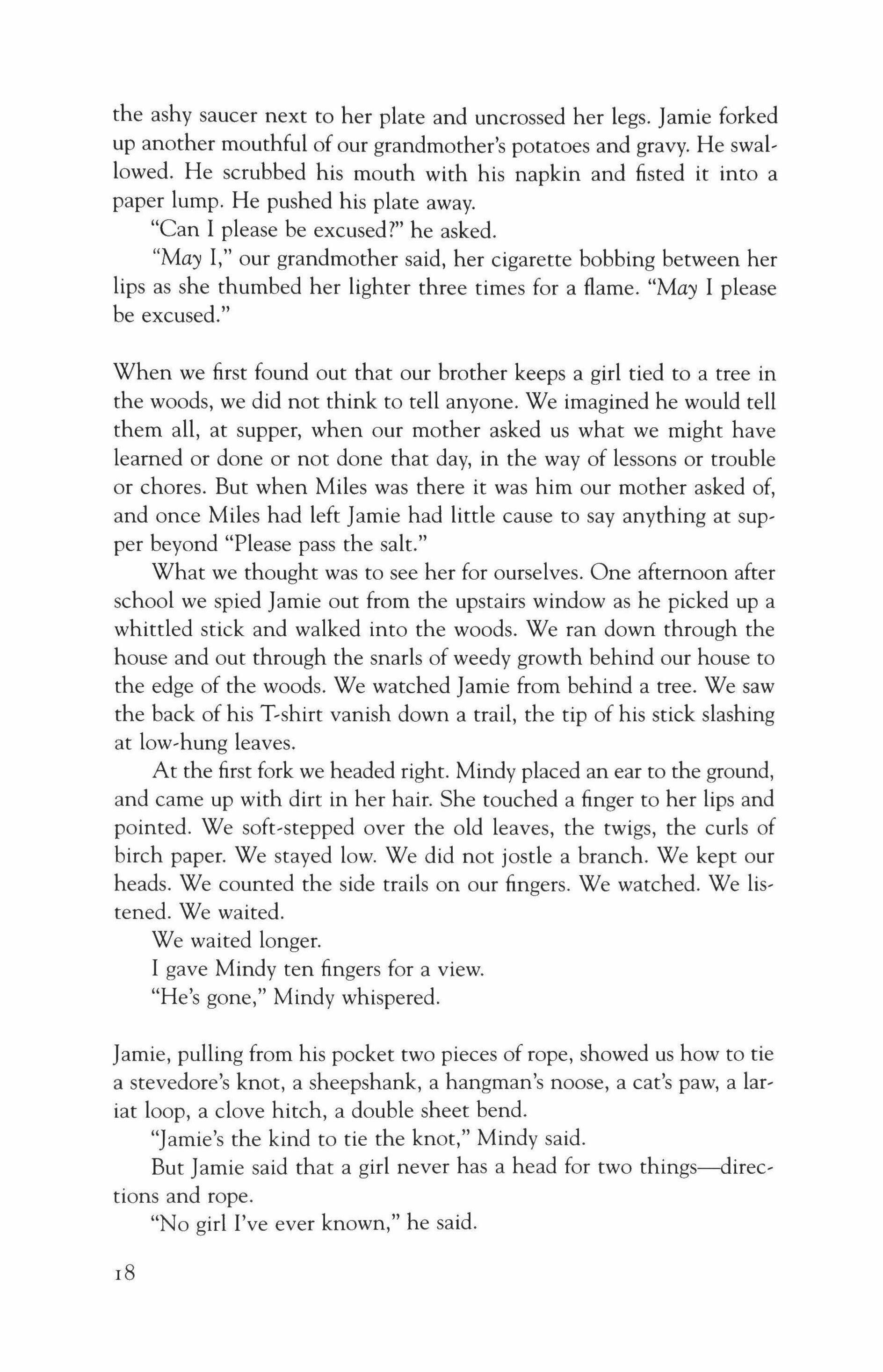
the ashy saucer next to her plate and uncrossed her legs. Jamie forked up another mouthful of our grandmother's potatoes and gravy. He swallowed. He scrubbed his mouth with his napkin and fisted it into a paper lump. He pushed his plate away.
"Can I please be excused?" he asked.
"May I," our grandmother said, her cigarette bobbing between her lips as she thumbed her lighter three times for a flame. "May I please be excused."
When we first found out that our brother keeps a girl tied to a tree in the woods, we did not think to tell anyone. We imagined he would tell them all, at supper, when our mother asked us what we might have learned or done or not done that day, in the way of lessons or trouble or chores. But when Miles was there it was him our mother asked of, and once Miles had left Jamie had little cause to say anything at supper beyond "Please pass the salt."
What we thought was to see her for ourselves. One afternoon after school we spied Jamie out from the upstairs window as he picked up a whittled stick and walked into the woods. We ran down through the house and out through the snarls of weedy growth behind our house to the edge of the woods. We watched Jamie from behind a tree. We saw the back of his T-shirt vanish down a trail, the tip of his stick slashing at low-hung leaves.
At the first fork we headed right. Mindy placed an ear to the ground, and came up with dirt in her hair. She touched a finger to her lips and pointed. We soft-stepped over the old leaves, the twigs, the curls of birch paper. We stayed low. We did not jostle a branch. We kept our heads. We counted the side trails on our fingers. We watched. We listened. We waited.
We waited longer.
I gave Mindy ten fingers for a view.
"He's gone," Mindy whispered.
Jamie, pulling from his pocket two pieces of rope, showed us how to tie a stevedore's knot, a sheepshank, a hangman's noose, a eat's paw, a lariat loop, a clove hitch, a double sheet bend.
"Jamie's the kind to tie the knot," Mindy said.
But Jamie said that a girl never has a head for two things-directions and rope.
"No girl I've ever known," he said.
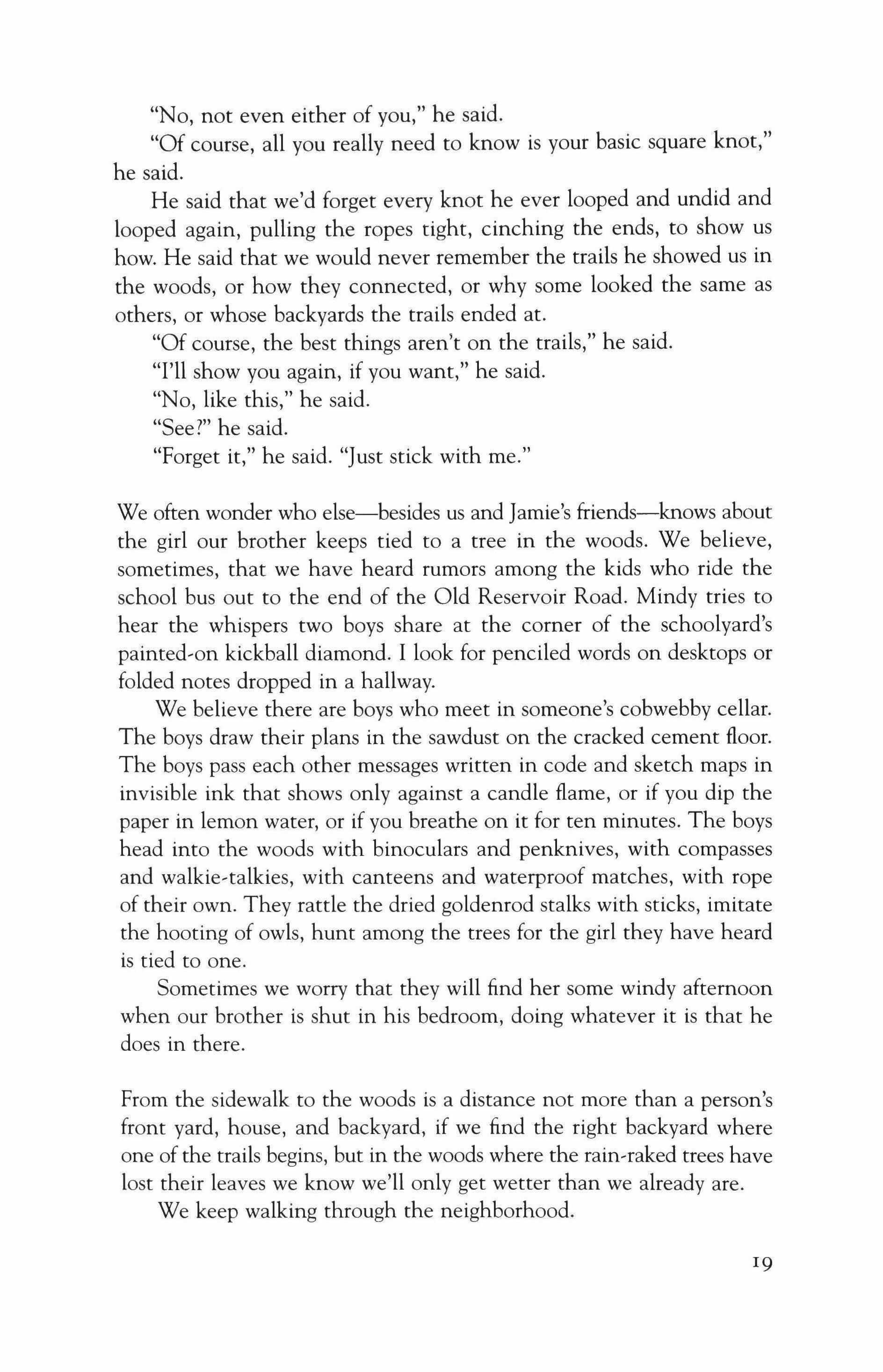
"No, not even either of you," he said.
"Of course, all you really need to know is your basic square knot," he said.
He said that we'd forget every knot he ever looped and undid and looped again, pulling the ropes tight, cinching the ends, to show us how. He said that we would never remember the trails he showed us in the woods, or how they connected, or why some looked the same as others, or whose backyards the trails ended at.
"Of course, the best things aren't on the trails," he said.
"I'll show you again, if you want," he said.
"No, like this," he said.
"See?" he said.
"Forget it," he said. "Just stick with me."
We often wonder who else-besides us and Jamie's friends-knows about the girl our brother keeps tied to a tree in the woods. We believe, sometimes, that we have heard rumors among the kids who ride the school bus out to the end of the Old Reservoir Road. Mindy tries to hear the whispers two boys share at the corner of the schoolyard's painted-on kickball diamond. I look for penciled words on desktops or folded notes dropped in a hallway.
We believe there are boys who meet in someone's cobwebby cellar. The boys draw their plans in the sawdust on the cracked cement floor. The boys pass each other messages written in code and sketch maps in invisible ink that shows only against a candle flame, or if you dip the paper in lemon water, or if you breathe on it for ten minutes. The boys head into the woods with binoculars and penknives, with compasses and walkie-talkies, with canteens and waterproof matches, with rope of their own. They rattle the dried goldenrod stalks with sticks, imitate the hooting of owls, hunt among the trees for the girl they have heard is tied to one.
Sometimes we worry that they will find her some windy afternoon when our brother is shut in his bedroom, doing whatever it is that he does in there.
From the sidewalk to the woods is a distance not more than a person's front yard, house, and backyard, if we find the right backyard where one of the trails begins, but in the woods where the rain-raked trees have lost their leaves we know we'll only get wetter than we already are.
We keep walking through the neighborhood.
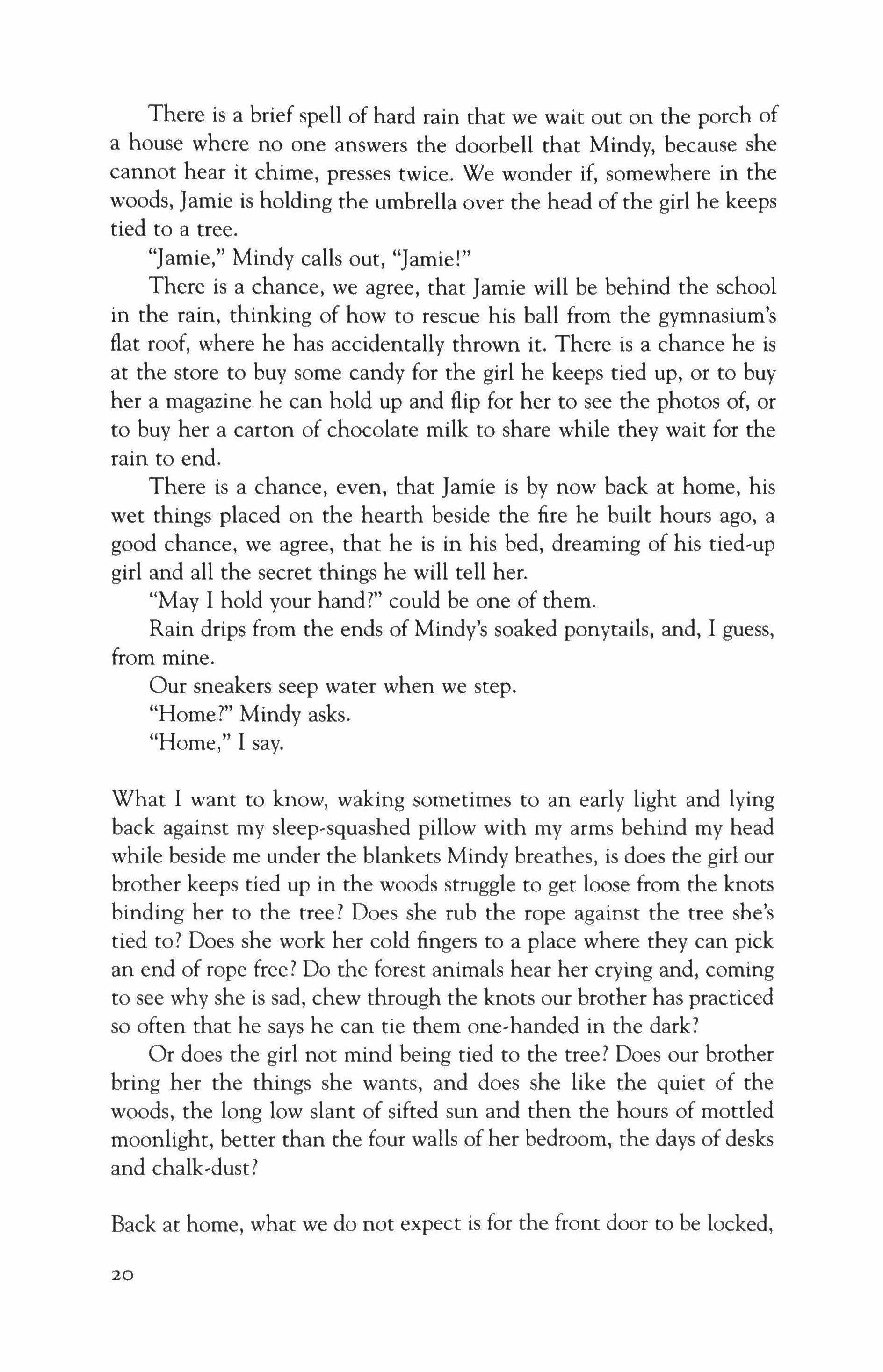
There is a brief spell of hard rain that we wait out on the porch of a house where no one answers the doorbell that Mindy, because she cannot hear it chime, presses twice. We wonder if, somewhere in the woods, Jamie is holding the umbrella over the head of the girl he keeps tied to a tree.
"Jamie," Mindy calls out, "Jamie!"
There is a chance, we agree, that Jamie will be behind the school in the rain, thinking of how to rescue his ball from the gymnasium's flat roof, where he has accidentally thrown it. There is a chance he is at the store to buy some candy for the girl he keeps tied up, or to buy her a magazine he can hold up and flip for her to see the photos of, or to buy her a carton of chocolate milk to share while they wait for the rain to end.
There is a chance, even, that Jamie is by now back at home, his wet things placed on the hearth beside the fire he built hours ago, a good chance, we agree, that he is in his bed, dreaming of his tied-up girl and all the secret things he will tell her.
"May I hold your hand?" could be one of them.
Rain drips from the ends of Mindy's soaked ponytails, and, I guess, from mine.
Our sneakers seep water when we step. "Home?" Mindy asks.
"Home," I say.
What I want to know, waking sometimes to an early light and lying back against my sleep-squashed pillow with my arms behind my head while beside me under the blankets Mindy breathes, is does the girl our brother keeps tied up in the woods struggle to get loose from the knots binding her to the tree? Does she rub the rope against the tree she's tied to? Does she work her cold fingers to a place where they can pick an end of rope free? Do the forest animals hear her crying and, coming to see why she is sad, chew through the knots our brother has practiced so often that he says he can tie them one-handed in the dark?
Or does the girl not mind being tied to the tree? Does our brother bring her the things she wants, and does she like the quiet of the woods, the long low slant of sifted sun and then the hours of mottled moonlight, better than the four walls of her bedroom, the days of desks and chalk-dust?
Back at home, what we do not expect is for the front door to be locked,
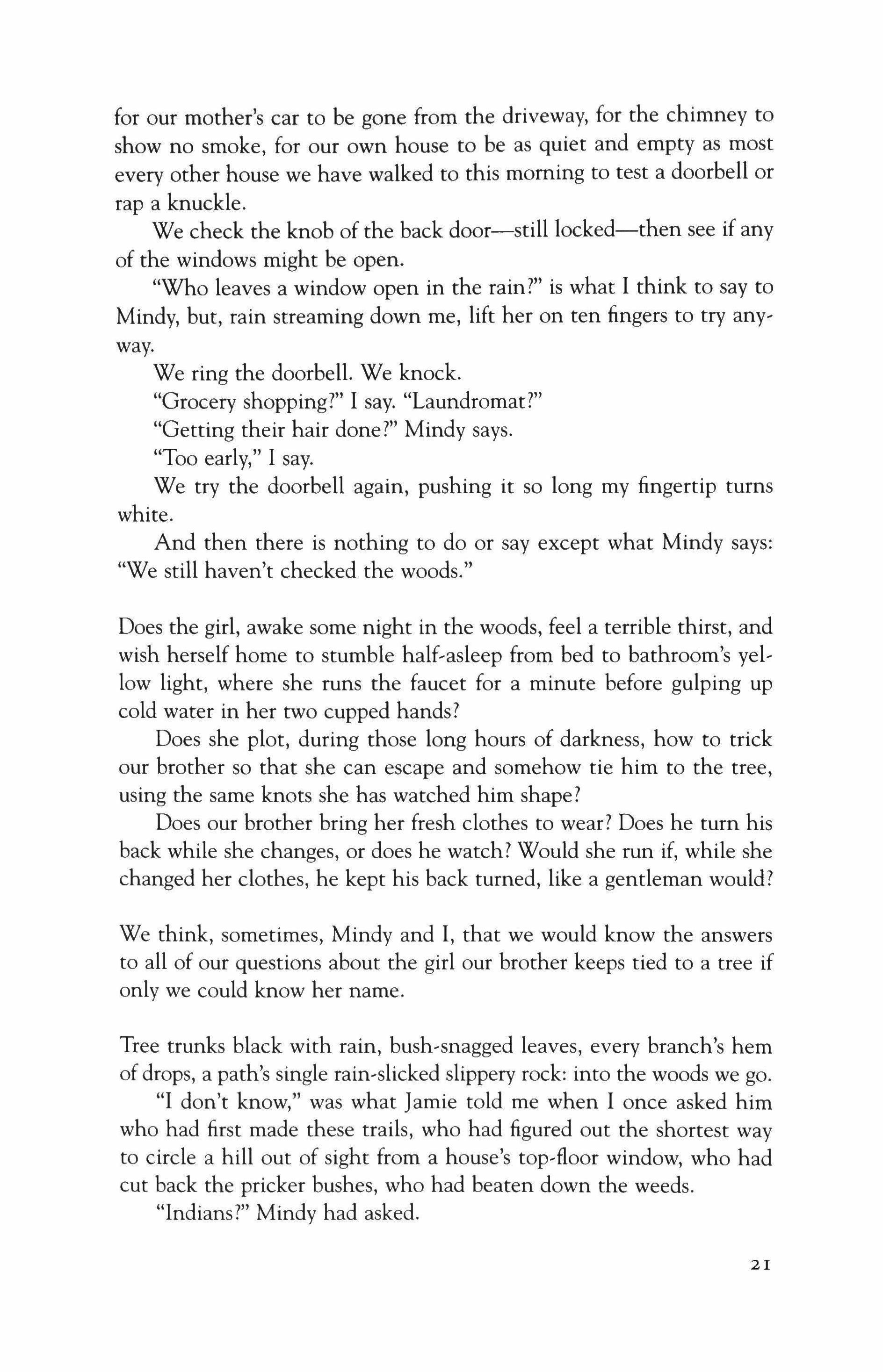
for our mother's car to be gone from the driveway, for the chimney to show no smoke, for our own house to be as quiet and empty as most every other house we have walked to this morning to test a doorbell or rap a knuckle.
We check the knob of the back door-still locked-then see if any of the windows might be open.
"Who leaves a window open in the rain?" is what I think to say to Mindy, but, rain streaming down me, lift her on ten fingers to try any' way.
We ring the doorbell. We knock.
"Grocery shopping?" I say. "Laundromat?"
"Getting their hair done?" Mindy says.
"Too early," I say.
We try the doorbell again, pushing it so long my fingertip turns white.
And then there is nothing to do or say except what Mindy says: "We still haven't checked the woods."
Does the girl, awake some night in the woods, feel a terrible thirst, and wish herself horne to stumble half,asleep from bed to bathroom's vellow light, where she runs the faucet for a minute before gulping up cold water in her two cupped hands?
Does she plot, during those long hours of darkness, how to trick our brother so that she can escape and somehow tie him to the tree, using the same knots she has watched him shape?
Does our brother bring her fresh clothes to wear? Does he tum his back while she changes, or does he watch? Would she run if, while she changed her clothes, he kept his back turned, like a gentleman would?
We think, sometimes, Mindy and I, that we would know the answers to all of our questions about the girl our brother keeps tied to a tree if only we could know her name.
Tree trunks black with rain, bush,snagged leaves, every branch's hem of drops, a path's single rain-slicked slippery rock: into the woods we go.
"I don't know," was what Jamie told me when I once asked him who had first made these trails, who had figured out the shortest way to circle a hill out of sight from a house's top'floor window, who had cut back the pricker bushes, who had beaten down the weeds.
"Indians?" Mindy had asked.

The trail, buried under the wet and bunched leaves, is hard to follow. With a sogged sneaker toe I scrape away leaves and sticks, candy wrappers and bottle caps. Bits of glass stud the muddy trail beneath. Low branches clutch the cellophane sleeves of cigarette packs, and under the orange ferns are the weather-whitened and rain-stuck pages of magazines. A rusted can of spray paint has caught in a tangle of branches. Holding back a branch so it doesn't whip Mindy's face, I take a step forward.
"If we knew her name, we would know the name to call as we walk through these woods," I think to say to Mindy, who instead holds her hands to her mouth and calls, "Jamie!"
We believe a man jogging through the woods one afternoon ran past the girl our brother keeps tied to a tree, but never saw her. Did he stop to tie a loose shoelace, and look the wrong way, or was he watching only the ground, to keep from stumbling on a rock? We don't know if she called out to him, or bit her tongue, or if the noise of his feet on the pine-needled dirt and the rush of wind in his ears kept him from thinking that he heard anything more than one bird calling to another.
In the woods, we can't hear the sound of cars splashing through the puddled streets, can't hear the sound of someone calling inside a wet dog, can't hear anything except the stutter of rain against the leaf-covered ground and the scuff of our own cold feet through the soaked leaves.
The light, since we left, has not changed, and it might be any time at all.
We walk, and keep walking, and still keep walking, but all we see are leaf piles and bushes and trees with no girls tied to them.
Mindy has stopped to rummage deep down in her pockets, where, I see in a moment, the sugar packets she long ago stuffed are about the only thing about us that is still dry.
And they are slightly damp.
Mindy bends her body over to keep the rain off, rips a comer, and lifts an envelope up to her mouth. She empties it in one go. She tears open another.
"It is," our brother once said, "instant energy."
"Can I have one?" I say.
"May I have one?" I say.
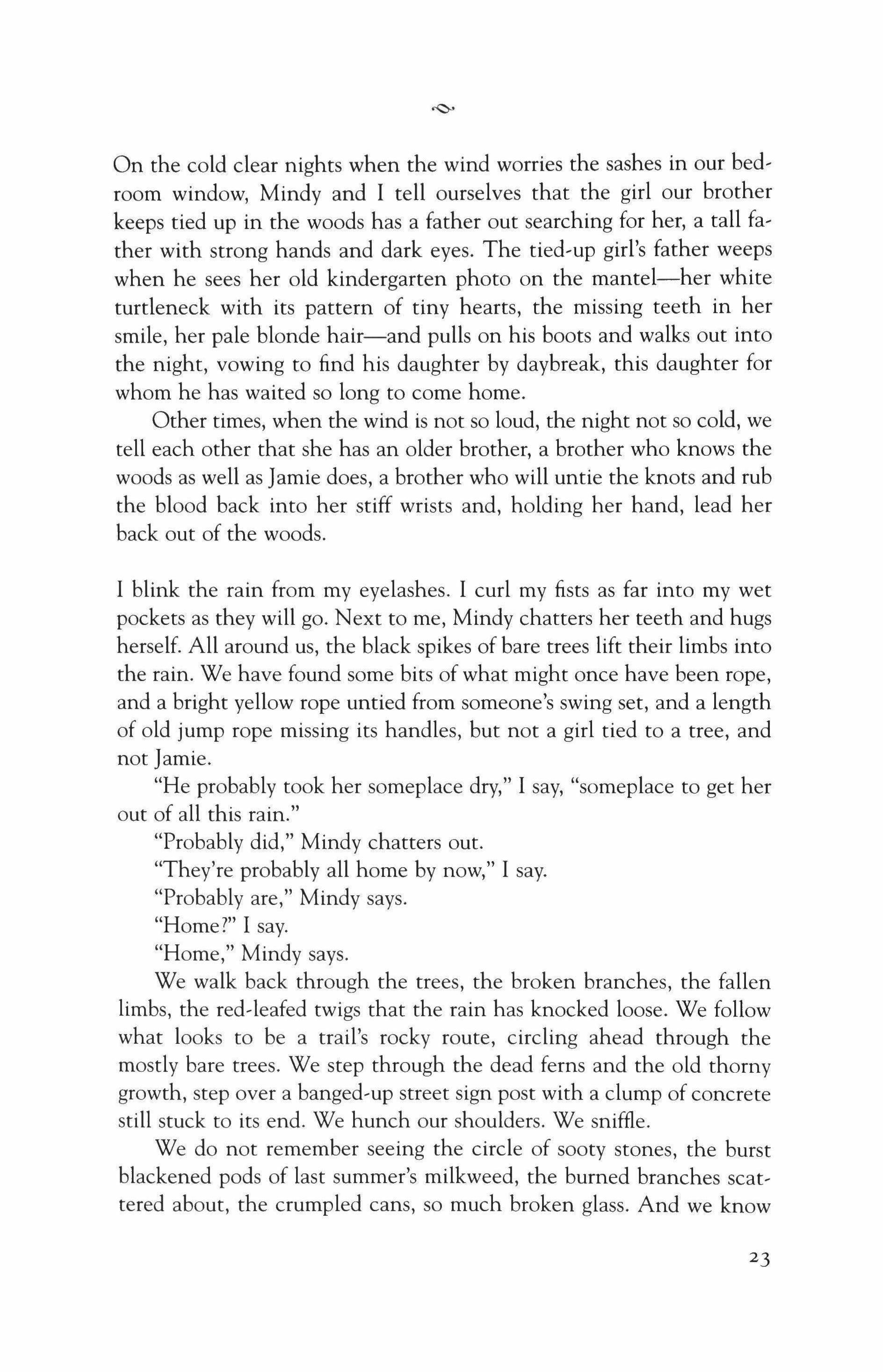
On the cold clear nights when the wind worries the sashes in our bedroom window, Mindy and I tell ourselves that the girl our brother keeps tied up in the woods has a father out searching for her, a tall father with strong hands and dark eyes. The tied-up girl's father weeps when he sees her old kindergarten photo on the mantel-her white turtleneck with its pattern of tiny hearts, the missing teeth in her smile, her pale blonde hair-and pulls on his boots and walks out into the night, vowing to find his daughter by daybreak, this daughter for whom he has waited so long to come home.
Other times, when the wind is not so loud, the night not so cold, we tell each other that she has an older brother, a brother who knows the woods as well as Jamie does, a brother who will untie the knots and rub the blood back into her stiff wrists and, holding her hand, lead her back out of the woods.
I blink the rain from my eyelashes. I curl my fists as far into my wet pockets as they will go. Next to me, Mindy chatters her teeth and hugs herself. All around us, the black spikes of bare trees lift their limbs into the rain. We have found some bits of what might once have been rope, and a bright yellow rope untied from someone's swing set, and a length of old jump rope missing its handles, but not a girl tied to a tree, and not Jamie.
"He probably took her someplace dry," I say, "someplace to get her out of all this rain."
"Probably did," Mindy chatters out.
"They're probably all home by now," I say.
"Probably are," Mindy says.
"Home?" I say.
"Home," Mindy says.
We walk back through the trees, the broken branches, the fallen limbs, the red-leafed twigs that the rain has knocked loose. We follow what looks to be a trail's rocky route, circling ahead through the mostly bare trees. We step through the dead ferns and the old thorny growth, step over a banged-up street sign post with a clump of concrete still stuck to its end. We hunch our shoulders. We sniffle.
We do not remember seeing the circle of sooty stones, the burst blackened pods of last summer's milkweed, the burned branches scattered about, the crumpled cans, so much broken glass. And we know
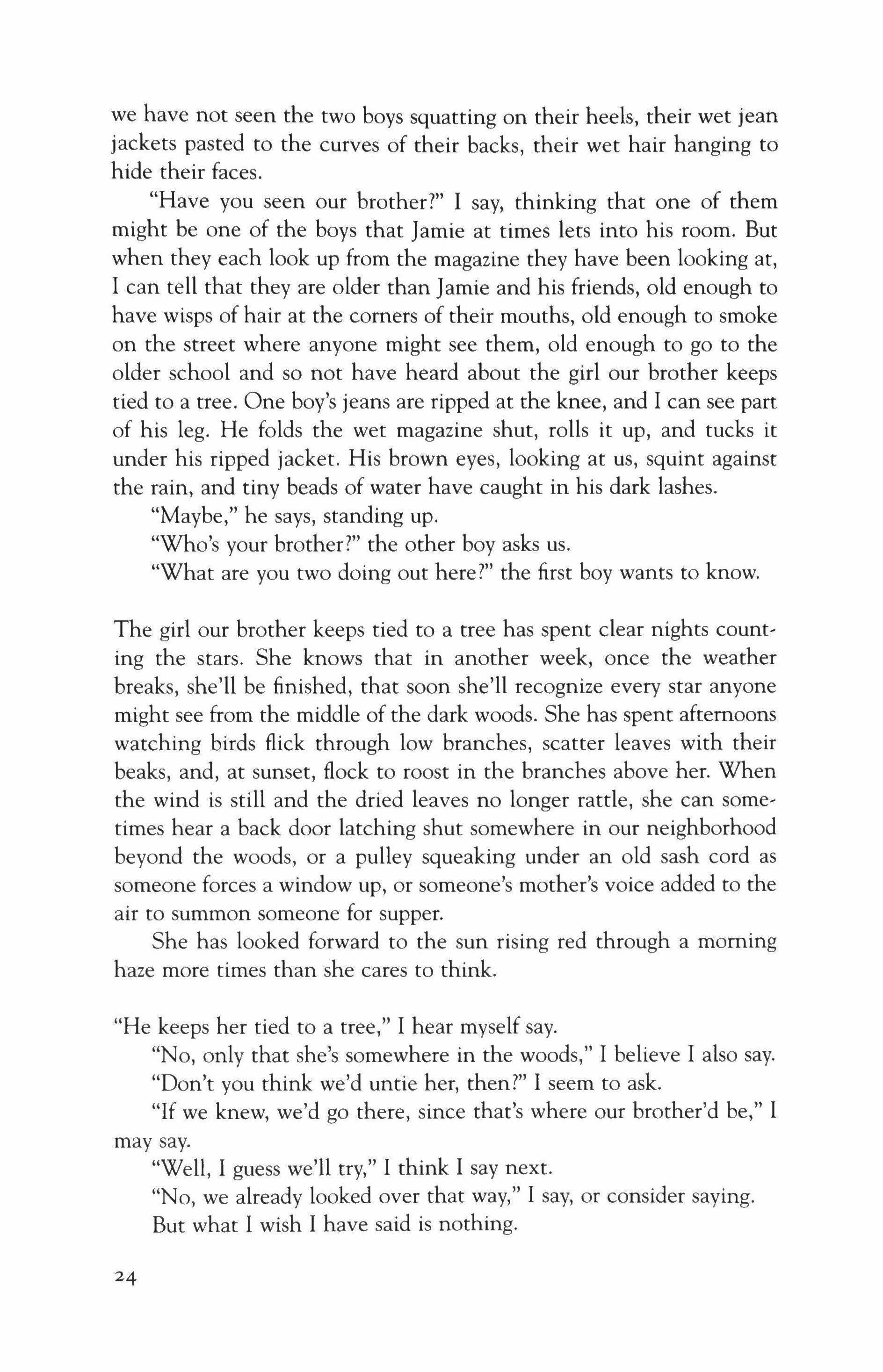
we have not seen the two boys squatting on their heels, their wet jean jackets pasted to the curves of their backs, their wet hair hanging to hide their faces.
"Have you seen our brother?" I say, thinking that one of them might be one of the boys that Jamie at times lets into his room. But when they each look up from the magazine they have been looking at, I can tell that they are older than Jamie and his friends, old enough to have wisps of hair at the comers of their mouths, old enough to smoke on the street where anyone might see them, old enough to go to the older school and so not have heard about the girl our brother keeps tied to a tree. One boy's jeans are ripped at the knee, and I can see part of his leg. He folds the wet magazine shut, rolls it up, and tucks it under his ripped jacket. His brown eyes, looking at us, squint against the rain, and tiny beads of water have caught in his dark lashes.
"Maybe," he says, standing up.
"Who's your brother?" the other boy asks us.
"What are you two doing out here?" the first boy wants to know.
The girl our brother keeps tied to a tree has spent clear nights counting the stars. She knows that in another week, once the weather breaks, she'll be finished, that soon she'll recognize every star anyone might see from the middle of the dark woods. She has spent afternoons watching birds flick through low branches, scatter leaves with their beaks, and, at sunset, flock to roost in the branches above her. When the wind is still and the dried leaves no longer rattle, she can sometimes hear a back door latching shut somewhere in our neighborhood beyond the woods, or a pulley squeaking under an old sash cord as someone forces a window up, or someone's mother's voice added to the air to summon someone for supper.
She has looked forward to the sun rising red through a morning haze more times than she cares to think.
"He keeps her tied to a tree," I hear myself say.
"No, only that she's somewhere in the woods," I believe I also say.
"Don't you think we'd untie her, then?" I seem to ask.
"If we knew, we'd go there, since that's where our brother'd be," I may say.
"Well, I guess we'll try," I think I say next.
"No, we already looked over that way," I say, or consider saying. But what I wish I have said is nothing.
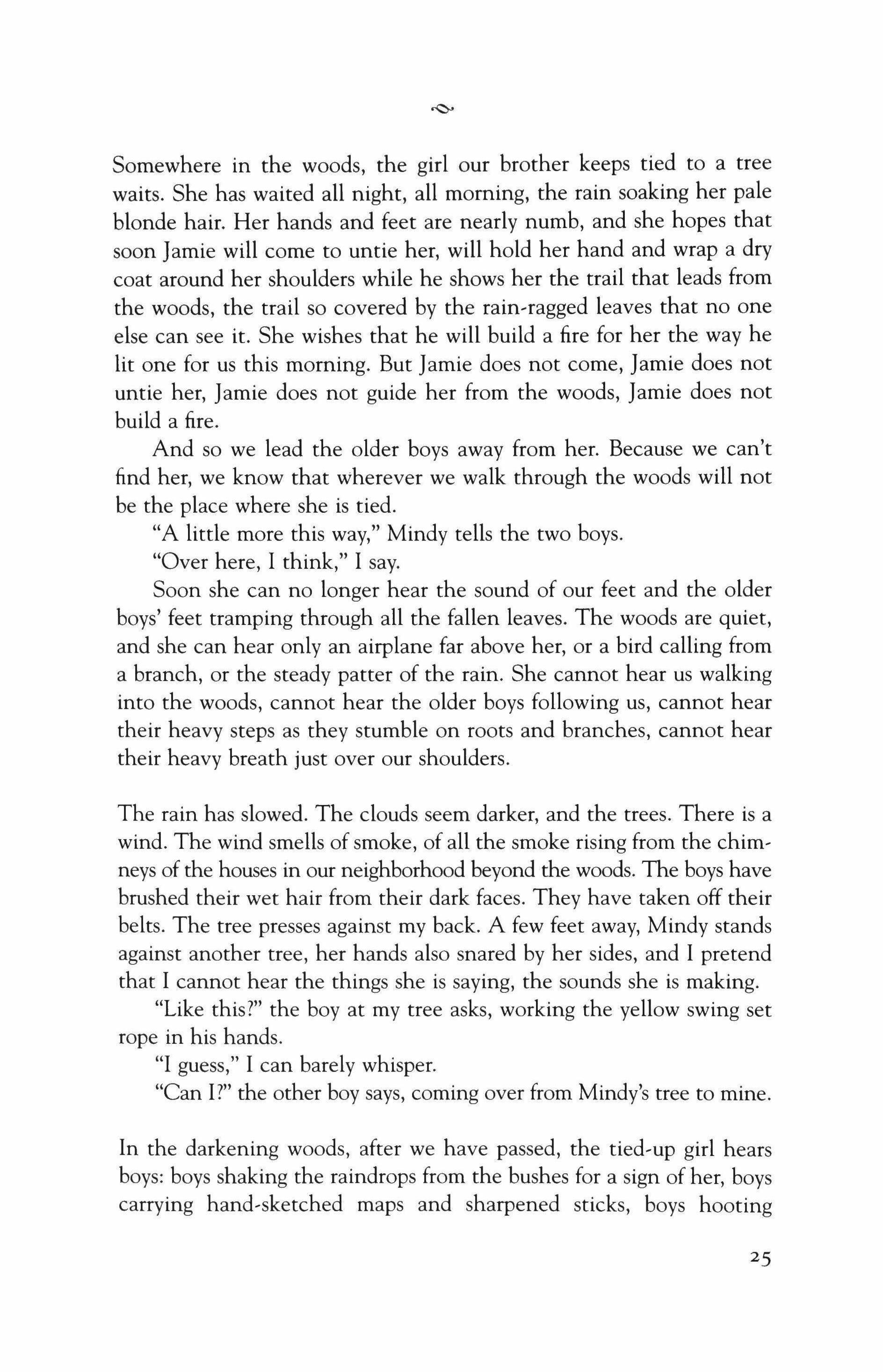
Somewhere in the woods, the girl our brother keeps tied to a tree waits. She has waited all night, all morning, the rain soaking her pale blonde hair. Her hands and feet are nearly numb, and she hopes that soon Jamie will come to untie her, will hold her hand and wrap a dry coat around her shoulders while he shows her the trail that leads from the woods, the trail so covered by the rain-ragged leaves that no one else can see it. She wishes that he will build a fire for her the way he lit one for us this morning. But Jamie does not come, Jamie does not untie her, Jamie does not guide her from the woods, Jamie does not build a fire.
And so we lead the older boys away from her. Because we can't find her, we know that wherever we walk through the woods will not be the place where she is tied.
"A little more this way," Mindy tells the two boys.
"Over here, I think," I say.
Soon she can no longer hear the sound of our feet and the older boys' feet tramping through all the fallen leaves. The woods are quiet, and she can hear only an airplane far above her, or a bird calling from a branch, or the steady patter of the rain. She cannot hear us walking into the woods, cannot hear the older boys following us, cannot hear their heavy steps as they stumble on roots and branches, cannot hear their heavy breath just over our shoulders.
The rain has slowed. The clouds seem darker, and the trees. There is a wind. The wind smells of smoke, of all the smoke rising from the chimneys of the houses in our neighborhood beyond the woods. The boys have brushed their wet hair from their dark faces. They have taken off their belts. The tree presses against my back. A few feet away, Mindy stands against another tree, her hands also snared by her sides, and I pretend that I cannot hear the things she is saying, the sounds she is making.
"Like this?" the boy at my tree asks, working the yellow swing set rope in his hands.
"I guess," I can barely whisper.
"Can I?" the other boy says, coming over from Mindy's tree to mine.
In the darkening woods, after we have passed, the tied-up girl hears boys: boys shaking the raindrops from the bushes for a sign of her, boys carrying hand-sketched maps and sharpened sticks, boys hooting
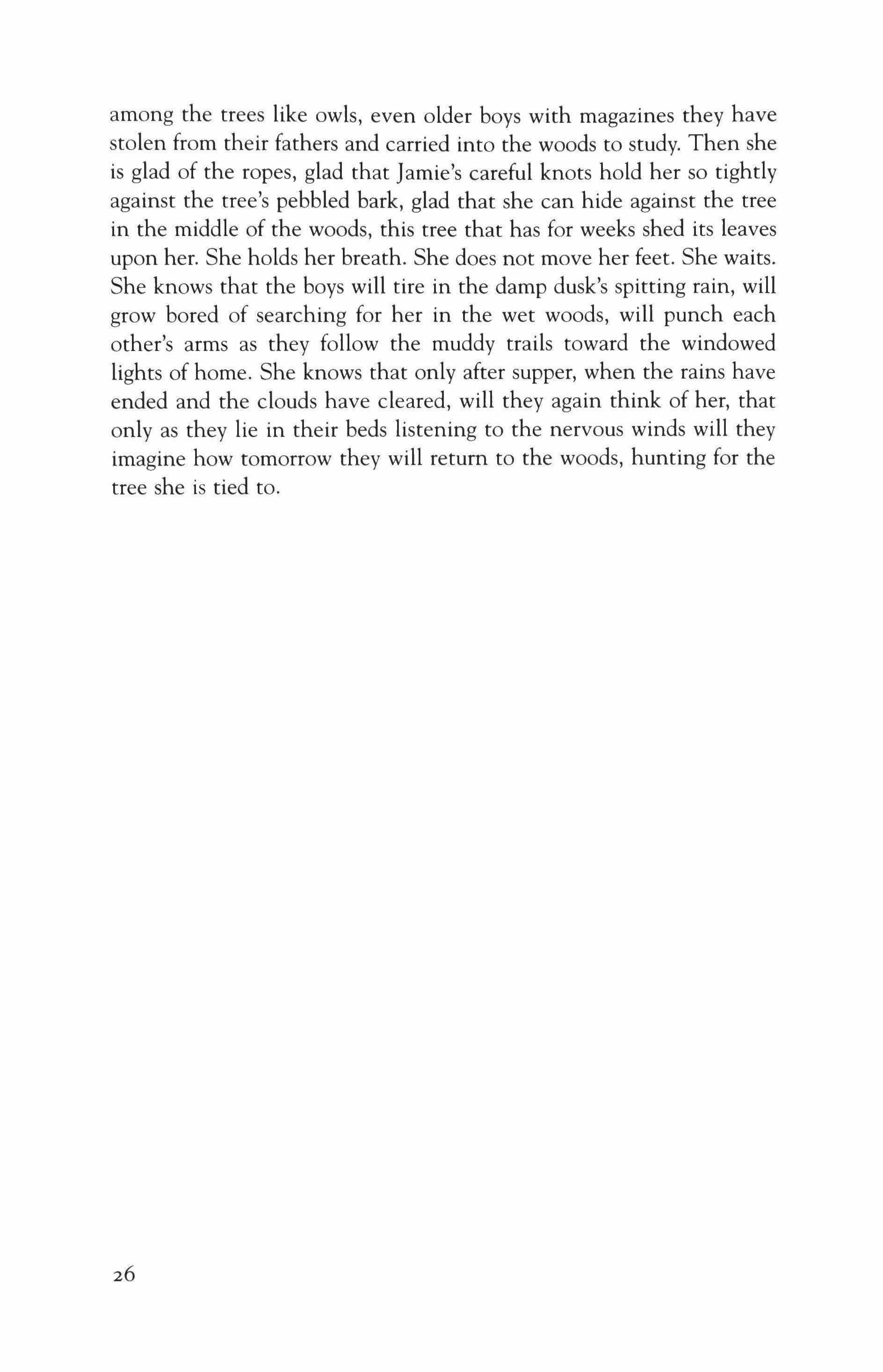
among the trees like owls, even older boys with magazines they have stolen from their fathers and carried into the woods to study. Then she is glad of the ropes, glad that Jamie's careful knots hold her so tightly against the tree's pebbled bark, glad that she can hide against the tree in the middle of the woods, this tree that has for weeks shed its leaves upon her. She holds her breath. She does not move her feet. She waits. She knows that the boys will tire in the damp dusk's spitting rain, will grow bored of searching for her in the wet woods, will punch each other's arms as they follow the muddy trails toward the windowed lights of home. She knows that only after supper, when the rains have ended and the clouds have cleared, will they again think of her, that only as they lie in their beds listening to the nervous winds will they imagine how tomorrow they will return to the woods, hunting for the tree she is tied to.

The agency had told them they might not meet their son until their second night in the country, so Molly and Tom were surprised to look up from the luggage carrel and see a sign raised from the crowd bearing their last names followed by the word SUN. Tom later would admit he thought the greeters from the adoption agency meant to convey warmth, the rays of happiness their new child would surely bring, but Molly immediately guessed that the writers were non-native English speakers and had intended to write "SON."
A procession of taped-up, cardboard boxes chugged its way out on the luggage carrel behind them. "Let's come back," Tom said, but Molly wanted to wait for their suitcase, which she had filled with soft toys, blankets, and even a copy of Good Night, Moon in Spanish. The agency had recommended bringing some "attachment objects" and Molly had come prepared.
In customs, the couple began to unzip the luggage, but the agent just waved them on, smiling as if at a private joke. Molly and Tom moved through the airport, whose main floor looked casual and spacious cornpared to the tightly packed crowd that loomed above. People waiting to meet flights at La Aurora airport were not allowed to come inside, so they stood instead on an outdoor balcony that looked down on the newly arrived passengers like soccer players emerging onto a field.
By the time Molly and Tom left the airport, the crowd from the balcony had emptied out onto the street. Vendors closed in on the
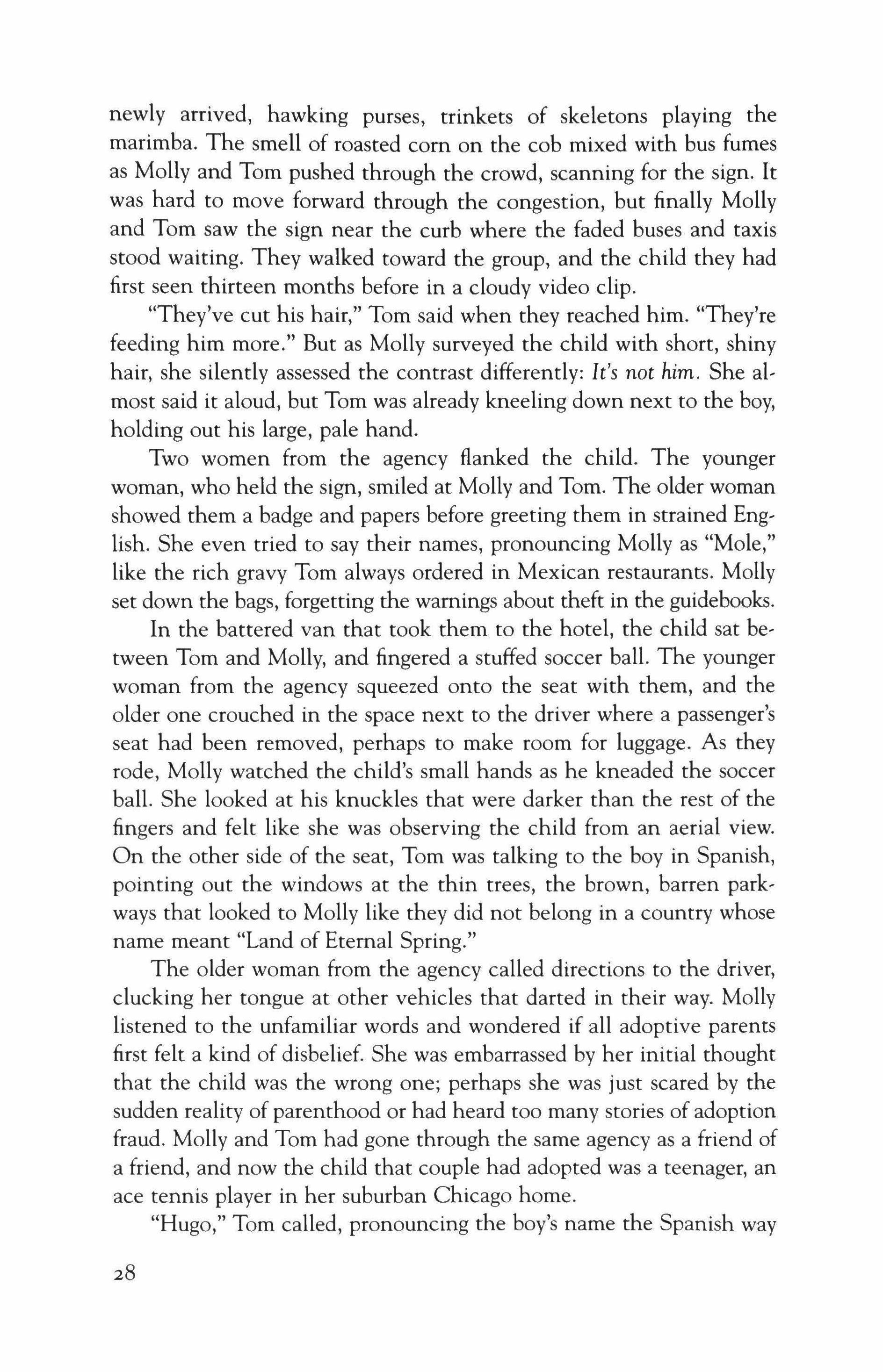
newly arrived, hawking purses, trinkets of skeletons playing the marimba. The smell of roasted corn on the cob mixed with bus fumes as Molly and Tom pushed through the crowd, scanning for the sign. It was hard to move forward through the congestion, but finally Molly and Tom saw the sign near the curb where the faded buses and taxis stood waiting. They walked toward the group, and the child they had first seen thirteen months before in a cloudy video clip.
"They've cut his hair," Tom said when they reached him. "They're feeding him more." But as Molly surveyed the child with short, shiny hair, she silently assessed the contrast differently: It's not him. She almost said it aloud, but Tom was already kneeling down next to the boy, holding out his large, pale hand.
Two women from the agency flanked the child. The younger woman, who held the sign, smiled at Molly and Tom. The older woman showed them a badge and papers before greeting them in strained English. She even tried to say their names, pronouncing Molly as "Mole," like the rich gravy Tom always ordered in Mexican restaurants. Molly set down the bags, forgetting the warnings about theft in the guidebooks.
In the battered van that took them to the hotel, the child sat between Tom and Molly, and fingered a stuffed soccer ball. The younger woman from the agency squeezed onto the seat with them, and the older one crouched in the space next to the driver where a passenger's seat had been removed, perhaps to make room for luggage. As they rode, Molly watched the child's small hands as he kneaded the soccer ball. She looked at his knuckles that were darker than the rest of the fingers and felt like she was observing the child from an aerial view. On the other side of the seat, Tom was talking to the boy in Spanish, pointing out the windows at the thin trees, the brown, barren parkways that looked to Molly like they did not belong in a country whose name meant "Land of Eternal Spring."
The older woman from the agency called directions to the driver, clucking her tongue at other vehicles that darted in their way. Molly listened to the unfamiliar words and wondered if all adoptive parents first felt a kind of disbelief. She was embarrassed by her initial thought that the child was the wrong one; perhaps she was just scared by the sudden reality of parenthood or had heard too many stories of adoption fraud. Molly and Tom had gone through the same agency as a friend of a friend, and now the child that couple had adopted was a teenager, an ace tennis player in her suburban Chicago home.
"Hugo," Tom called, pronouncing the boy's name the Spanish way
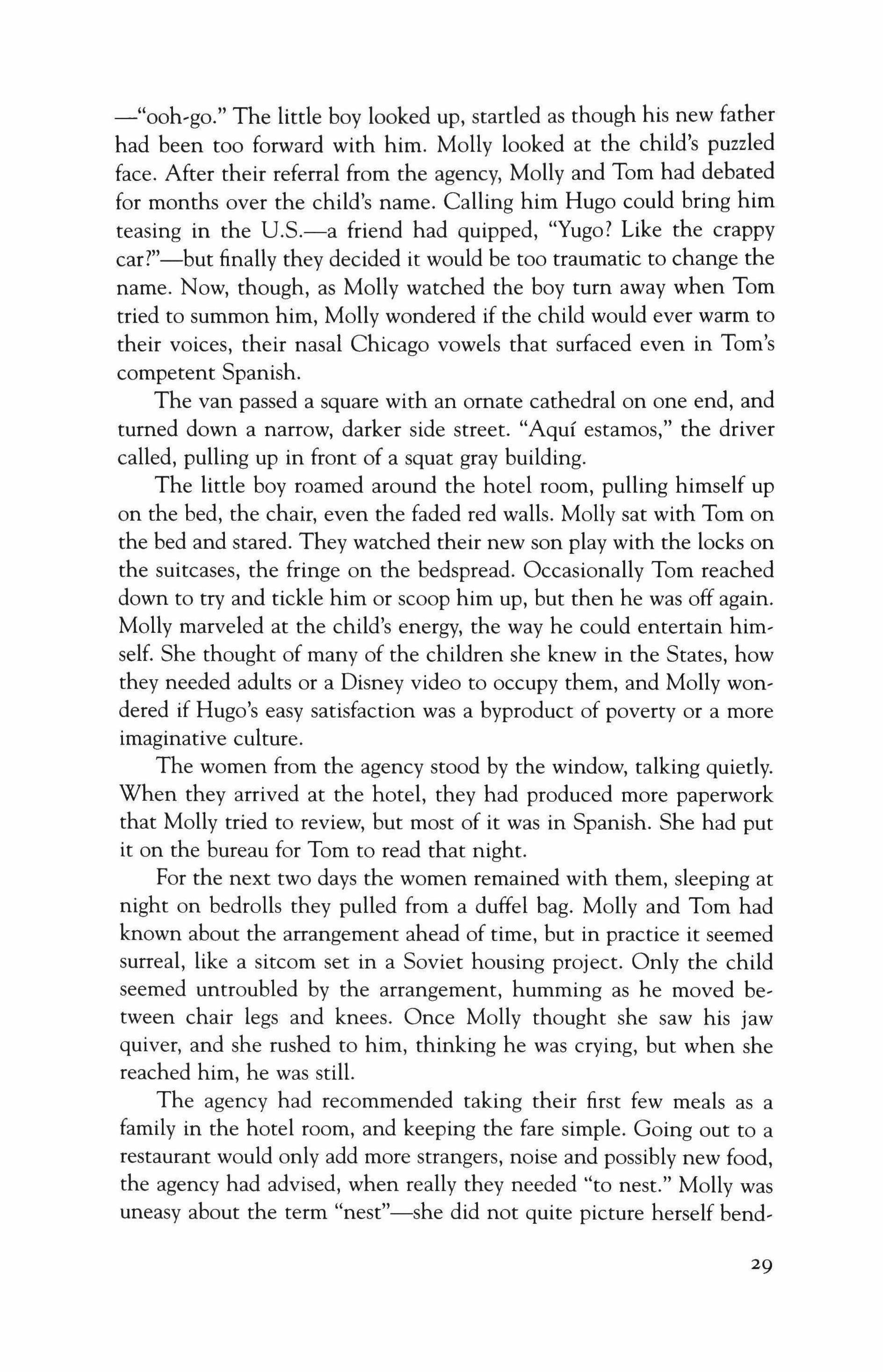
-"ooh,go." The little boy looked up, startled as though his new father had been too forward with him. Molly looked at the child's puzzled face. After their referral from the agency, Molly and Tom had debated for months over the child's name. Calling him Hugo could bring him teasing in the U.S.-a friend had quipped, "Yugo? Like the crappy car?"-but finally they decided it would be too traumatic to change the name. Now, though, as Molly watched the boy turn away when Tom tried to summon him, Molly wondered if the child would ever warm to their voices, their nasal Chicago vowels that surfaced even in Tom's competent Spanish.
The van passed a square with an ornate cathedral on one end, and turned down a narrow, darker side street. "Aquf estamos," the driver called, pulling up in front of a squat gray building.
The little boy roamed around the hotel room, pulling himself up on the bed, the chair, even the faded red walls. Molly sat with Tom on the bed and stared. They watched their new son play with the locks on the suitcases, the fringe on the bedspread. Occasionally Tom reached down to try and tickle him or scoop him up, but then he was off again. Molly marveled at the child's energy, the way he could entertain him, self. She thought of many of the children she knew in the States, how they needed adults or a Disney video to occupy them, and Molly won, dered if Hugo's easy satisfaction was a byproduct of poverty or a more imaginative culture.
The women from the agency stood by the window, talking quietly. When they arrived at the hotel, they had produced more paperwork that Molly tried to review, but most of it was in Spanish. She had put it on the bureau for Tom to read that night.
For the next two days the women remained with them, sleeping at night on bedrolls they pulled from a duffel bag. Molly and Tom had known about the arrangement ahead of time, but in practice it seemed surreal, like a sitcom set in a Soviet housing project. Only the child seemed untroubled by the arrangement, humming as he moved be, tween chair legs and knees. Once Molly thought she saw his jaw quiver, and she rushed to him, thinking he was crying, but when she reached him, he was still.
The agency had recommended taking their first few meals as a family in the hotel room, and keeping the fare simple. Going out to a restaurant would only add more strangers, noise and possibly new food, the agency had advised, when really they needed "to nest." Molly was uneasy about the term "nest"-she did not quite picture herself bend,
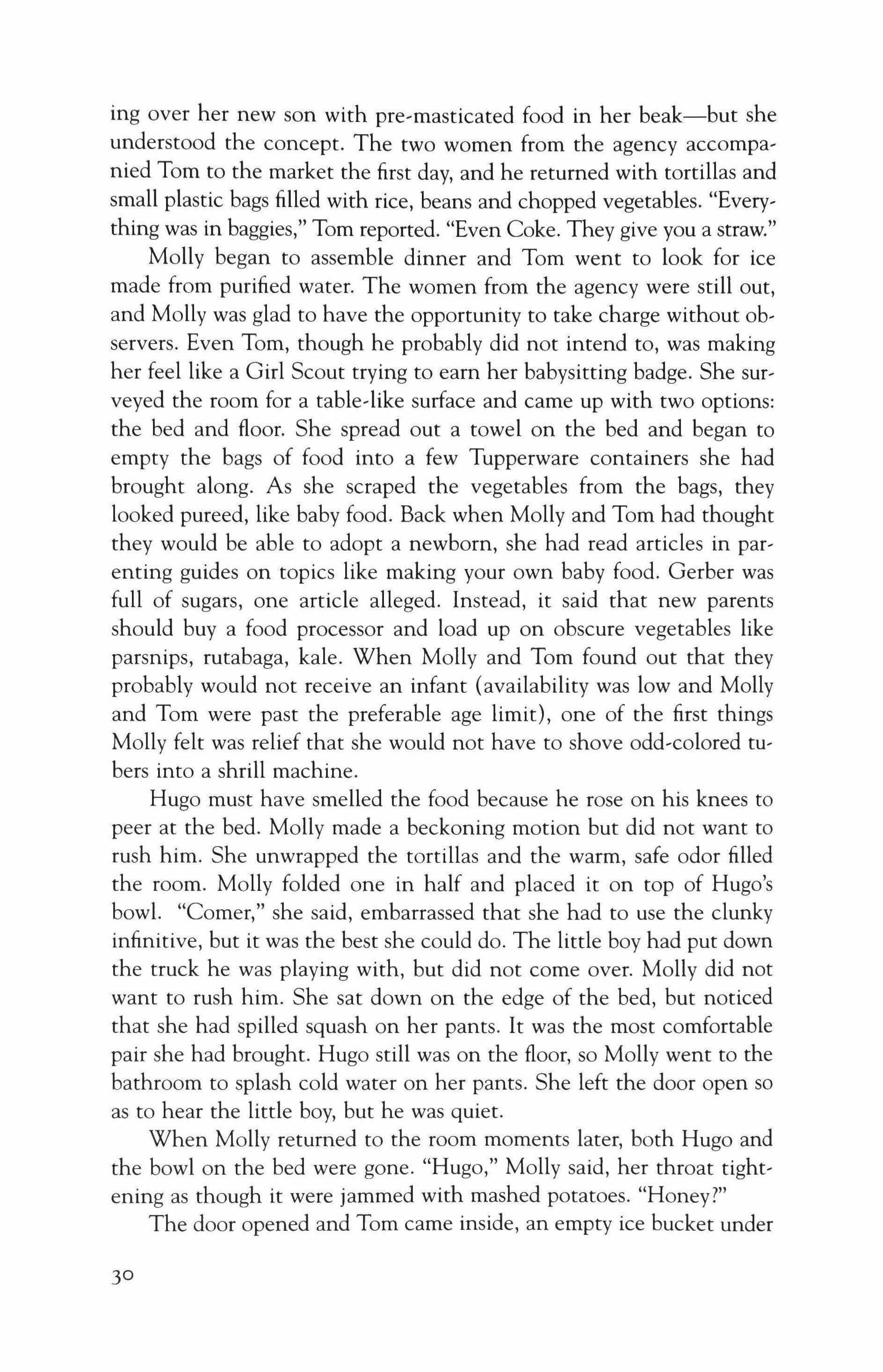
ing over her new son with pre-masticated food in her beak-but she understood the concept. The two women from the agency accompanied Tom to the market the first day, and he returned with tortillas and small plastic bags filled with rice, beans and chopped vegetables. "Everything was in baggies," Tom reported. "Even Coke. They give you a straw."
Molly began to assemble dinner and Tom went to look for ice made from purified water. The women from the agency were still out, and Molly was glad to have the opportunity to take charge without observers. Even Tom, though he probably did not intend to, was making her feel like a Girl Scout trying to earn her babysitting badge. She surveyed the room for a table-like surface and came up with two options: the bed and floor. She spread out a towel on the bed and began to empty the bags of food into a few Tupperware containers she had brought along. As she scraped the vegetables from the bags, they looked pureed, like baby food. Back when Molly and Tom had thought they would be able to adopt a newborn, she had read articles in parenting guides on topics like making your own baby food. Gerber was full of sugars, one article alleged. Instead, it said that new parents should buy a food processor and load up on obscure vegetables like parsnips, rutabaga, kale. When Molly and Tom found out that they probably would not receive an infant (availability was low and Molly and Tom were past the preferable age limit), one of the first things Molly felt was relief that she would not have to shove odd-colored tubers into a shrill machine.
Hugo must have smelled the food because he rose on his knees to peer at the bed. Molly made a beckoning motion but did not want to rush him. She unwrapped the tortillas and the warm, safe odor filled the room. Molly folded one in half and placed it on top of Hugo's bowl. "Comer," she said, embarrassed that she had to use the clunky infinitive, but it was the best she could do. The little boy had put down the truck he was playing with, but did not come over. Molly did not want to rush him. She sat down on the edge of the bed, but noticed that she had spilled squash on her pants. It was the most comfortable pair she had brought. Hugo still was on the floor, so Molly went to the bathroom to splash cold water on her pants. She left the door open so as to hear the little boy, but he was quiet.
When Molly returned to the room moments later, both Hugo and the bowl on the bed were gone. "Hugo," Molly said, her throat tightening as though it were jammed with mashed potatoes. "Honey?"
The door opened and Tom came inside, an empty ice bucket under
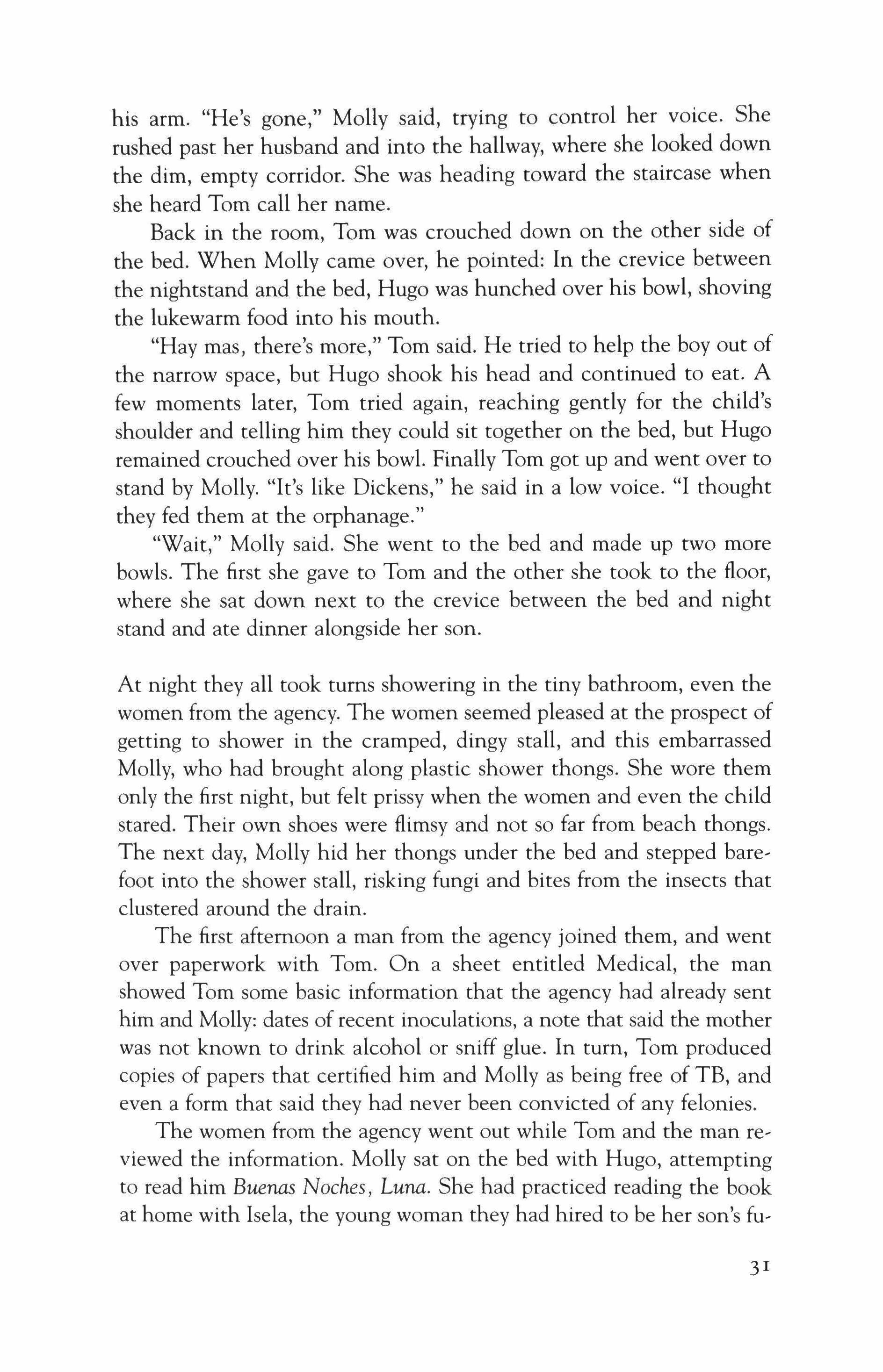
his arm. "He's gone," Molly said, trying to control her voice. She rushed past her husband and into the hallway, where she looked down the dim, empty corridor. She was heading toward the staircase when she heard Tom call her name.
Back in the room, Tom was crouched down on the other side of the bed. When Molly came over, he pointed: In the crevice between the nightstand and the bed, Hugo was hunched over his bowl, shoving the lukewarm food into his mouth.
"Hay mas, there's more," Tom said. He tried to help the boy out of the narrow space, but Hugo shook his head and continued to eat. A few moments later, Tom tried again, reaching gently for the child's shoulder and telling him they could sit together on the bed, but Hugo remained crouched over his bowl. Finally Tom got up and went over to stand by Molly. "It's like Dickens," he said in a low voice. "I thought they fed them at the orphanage."
"Wait," Molly said. She went to the bed and made up two more bowls. The first she gave to Tom and the other she took to the floor, where she sat down next to the crevice between the bed and night stand and ate dinner alongside her son.
At night they all took turns showering in the tiny bathroom, even the women from the agency. The women seemed pleased at the prospect of getting to shower in the cramped, dingy stall, and this embarrassed Molly, who had brought along plastic shower thongs. She wore them only the first night, but felt prissy when the women and even the child stared. Their own shoes were flimsy and not so far from beach thongs. The next day, Molly hid her thongs under the bed and stepped barefoot into the shower stall, risking fungi and bites from the insects that clustered around the drain.
The first afternoon a man from the agency joined them, and went over paperwork with Tom. On a sheet entitled Medical, the man showed Tom some basic information that the agency had already sent him and Molly: dates of recent inoculations, a note that said the mother was not known to drink alcohol or sniff glue. In tum, Tom produced copies of papers that certified him and Molly as being free of TB, and even a form that said they had never been convicted of any felonies.
The women from the agency went out while Tom and the man reviewed the information. Molly sat on the bed with Hugo, attempting to read him Buenas Naches, Luna. She had practiced reading the book at home with Isela, the young woman they had hired to be her son's fu-

ture nanny. Molly was embarrassed to hear herself attempting to pro, nounce the Spanish words, so she concentrated on the pictures: the clocks and lights, the bowl and brush. Next to her on the bed, the lit, de boy stared at each page as though it were a puzzling but important document. As Molly read, her chin brushed against the child's glossy hair. It shone so much that it made her wonder if the agency had used a special conditioner on Hugo to prepare him for the meeting.
Molly and Tom awakened the next morning to find swollen patches on their stomachs and arms. Both were redheads, or "orange, and-pink people" as one of their friends called them, so the inflammation looked especially intense. Molly and Tom stood in the mirror, ex, amining their blotchy arms when the child glanced at them and muttered something in Spanish. It was the first time he had truly spoken.
"What, Hugo?" Tom asked. "Que?"
"He said 'bugs,' " the woman said.
"What kind?" Tom asked in Spanish.
The older woman from the agency said something matter-of-fact, prompting Tom to look down at his arms then at the unmade bed.
"What?" Molly said. She was skeptical that a toddler could diagnose a health problem.
"Fleas," Tom said, looking at Molly's freckled face in the narrow mirror. "She says they hide in the beds and we probably have an allergy to the bites."
That night, their last before flying home, Molly left the room to go and buy flea powder. She and Tom had discussed changing hotels, but Tom said the other nearby hotels had even lower cleanliness ratings and be' sides, he was not eager to offend the agency. Molly was heading down the dim hallway when the young woman from the agency emerged from the room and followed her. "Messus," she said to Molly, and pointed down the hall. Molly shook her head: "No espanol. Sposo," she said, motioning back to the room where Tom waited, but the young woman shook her head. She continued down the hallway, lead, ing Molly, and knocked on one or two doors until she found one that was open. The young woman motioned for Molly to come inside and Molly followed, but when the woman went to close the door, Molly stuck her gym shoe between it and the hallway.
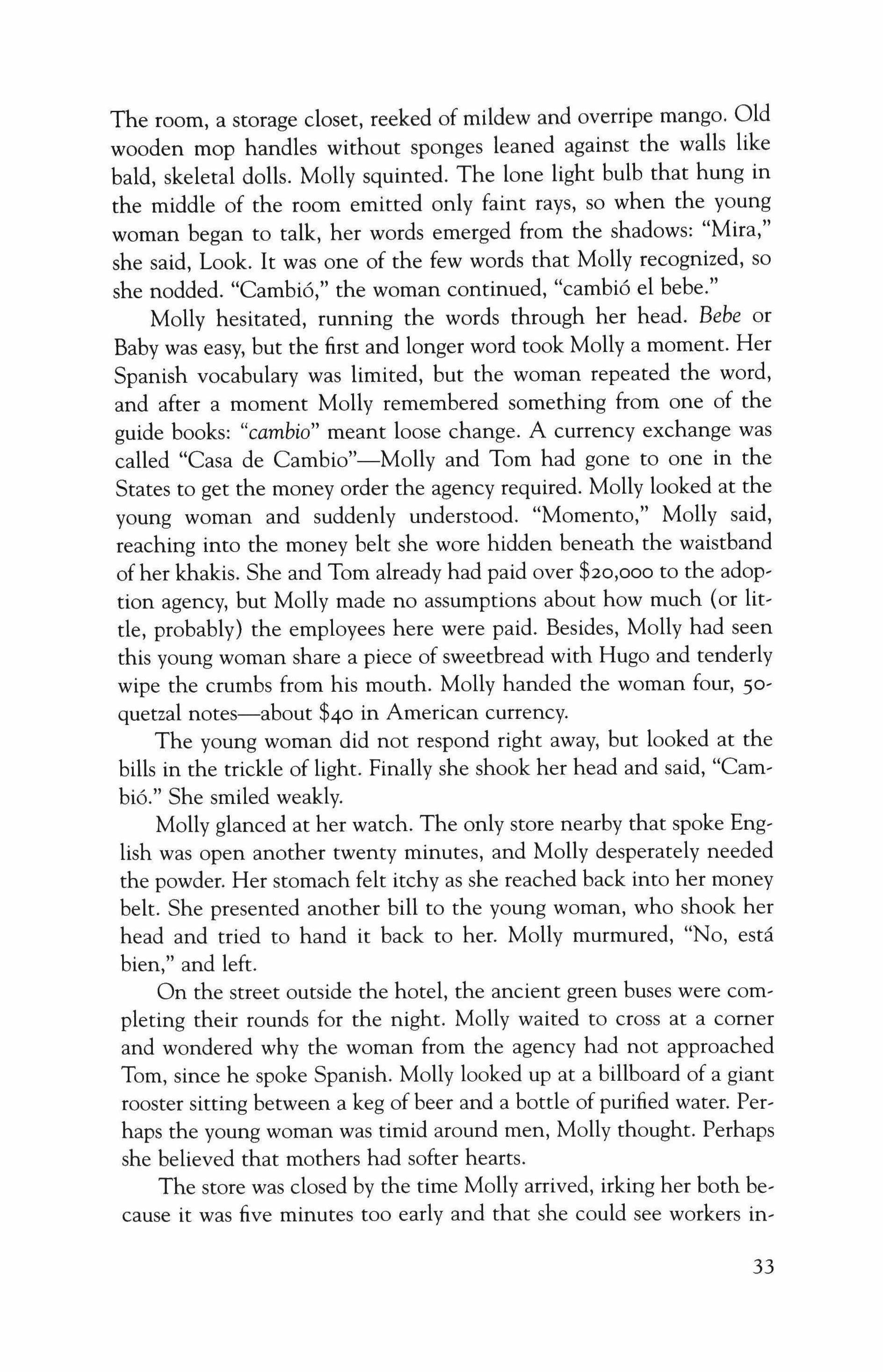
The room, a storage closet, reeked of mildew and overripe mango. Old wooden mop handles without sponges leaned against the walls like bald, skeletal dolls. Molly squinted. The lone light bulb that hung in the middle of the room emitted only faint rays, so when the young woman began to talk, her words emerged from the shadows: "Mira," she said, Look. It was one of the few words that Molly recognized, so she nodded. "Cambia," the woman continued, "cambia el bebe."
Molly hesitated, running the words through her head. Bebe or Baby was easy, but the first and longer word took Molly a moment. Her Spanish vocabulary was limited, but the woman repeated the word, and after a moment Molly remembered something from one of the guide books: "cambia" meant loose change. A currency exchange was called "Casa de Cambio"-Molly and Tom had gone to one in the States to get the money order the agency required. Molly looked at the young woman and suddenly understood. "Momenta," Molly said, reaching into the money belt she wore hidden beneath the waistband of her khakis. She and Tom already had paid over $20,000 to the adoption agency, but Molly made no assumptions about how much {or little, probably} the employees here were paid. Besides, Molly had seen this young woman share a piece of sweetbread with Hugo and tenderly wipe the crumbs from his mouth. Molly handed the woman four, 50quetzal notes-about $40 in American currency.
The young woman did not respond right away, but looked at the bills in the trickle of light. Finally she shook her head and said, "Cambia." She smiled weakly.
Molly glanced at her watch. The only store nearby that spoke English was open another twenty minutes, and Molly desperately needed the powder. Her stomach felt itchy as she reached back into her money belt. She presented another bill to the young woman, who shook her head and tried to hand it back to her. Molly murmured, "No, esta bien," and left.
On the street outside the hotel, the ancient green buses were completing their rounds for the night. Molly waited to cross at a corner and wondered why the woman from the agency had not approached Tom, since he spoke Spanish. Molly looked up at a billboard of a giant rooster sitting between a keg of beer and a bottle of purified water. Perhaps the young woman was timid around men, Molly thought. Perhaps she believed that mothers had softer hearts.
The store was closed by the time Molly arrived, irking her both because it was five minutes too early and that she could see workers in-
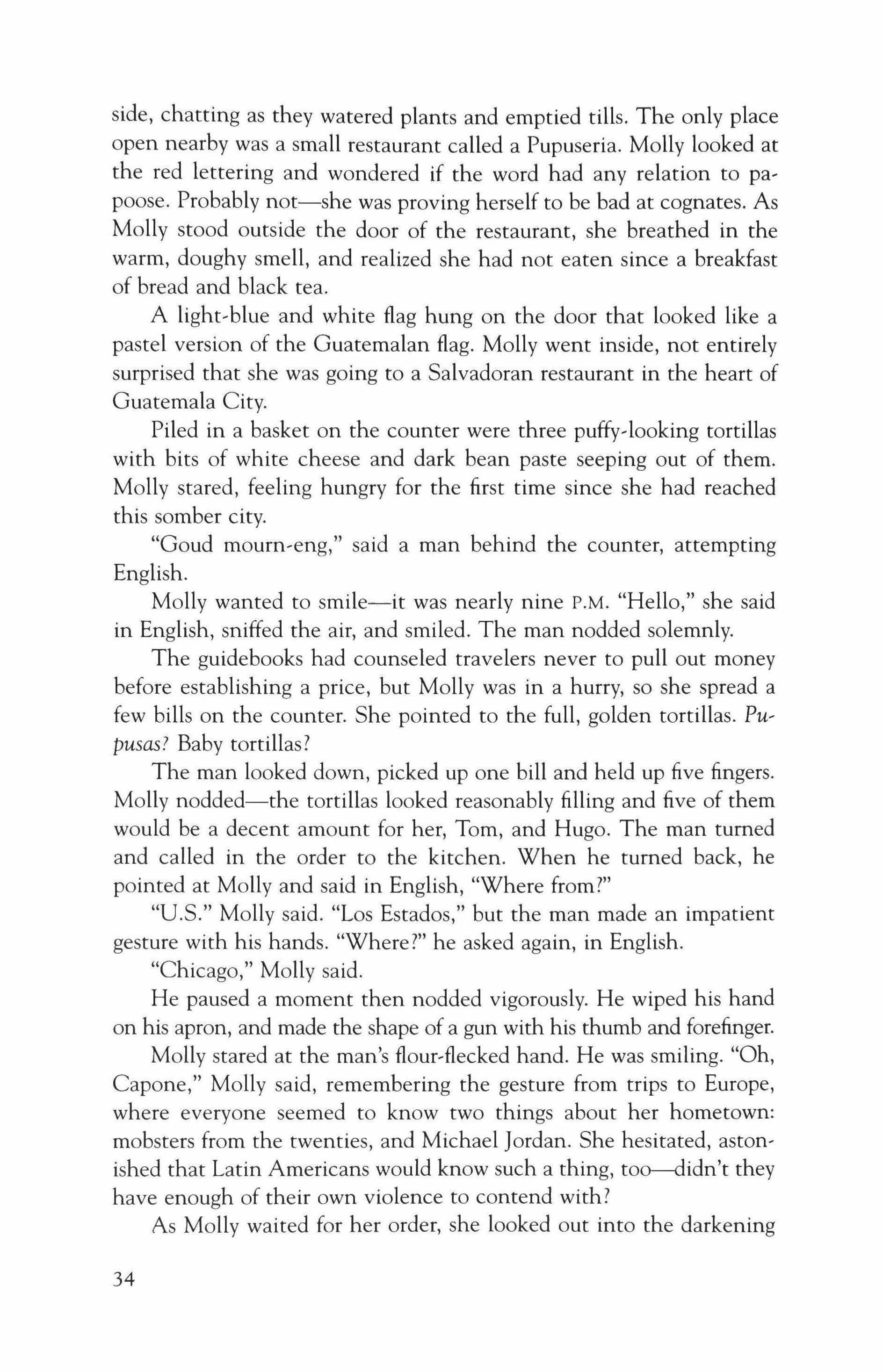
side, chatting as they watered plants and emptied tills. The only place open nearby was a small restaurant called a Pupuseria. Molly looked at the red lettering and wondered if the word had any relation to papoose. Probably not-she was proving herself to be bad at cognates. As Molly stood outside the door of the restaurant, she breathed in the warm, doughy smell, and realized she had not eaten since a breakfast of bread and black tea.
A light-blue and white flag hung on the door that looked like a pastel version of the Guatemalan flag. Molly went inside, not entirely surprised that she was going to a Salvadoran restaurant in the heart of Guatemala City.
Piled in a basket on the counter were three puffy-looking tortillas with bits of white cheese and dark bean paste seeping out of them. Molly stared, feeling hungry for the first time since she had reached this somber city.
"Goud mourn-eng," said a man behind the counter, attempting English.
Molly wanted to smile-it was nearly nine P.M. "Hello," she said in English, sniffed the air, and smiled. The man nodded solemnly.
The guidebooks had counseled travelers never to pull out money before establishing a price, but Molly was in a hurry, so she spread a few bills on the counter. She pointed to the full, golden tortillas. Pupusas? Baby tortillas?
The man looked down, picked up one bill and held up five fingers. Molly nodded-the tortillas looked reasonably filling and five of them would be a decent amount for her, Tom, and Hugo. The man turned and called in the order to the kitchen. When he turned back, he pointed at Molly and said in English, "Where from?"
"U.S." Molly said. "Los Estados," but the man made an impatient gesture with his hands. "Where?" he asked again, in English.
"Chicago," Molly said.
He paused a moment then nodded vigorously. He wiped his hand on his apron, and made the shape of a gun with his thumb and forefinger.
Molly stared at the man's flour-flecked hand. He was smiling. "Oh, Capone," Molly said, remembering the gesture from trips to Europe, where everyone seemed to know two things about her hometown: mobsters from the twenties, and Michael Jordan. She hesitated, astonished that Latin Americans would know such a thing, too--didn't they have enough of their own violence to contend with?
As Molly waited for her order, she looked out into the darkening
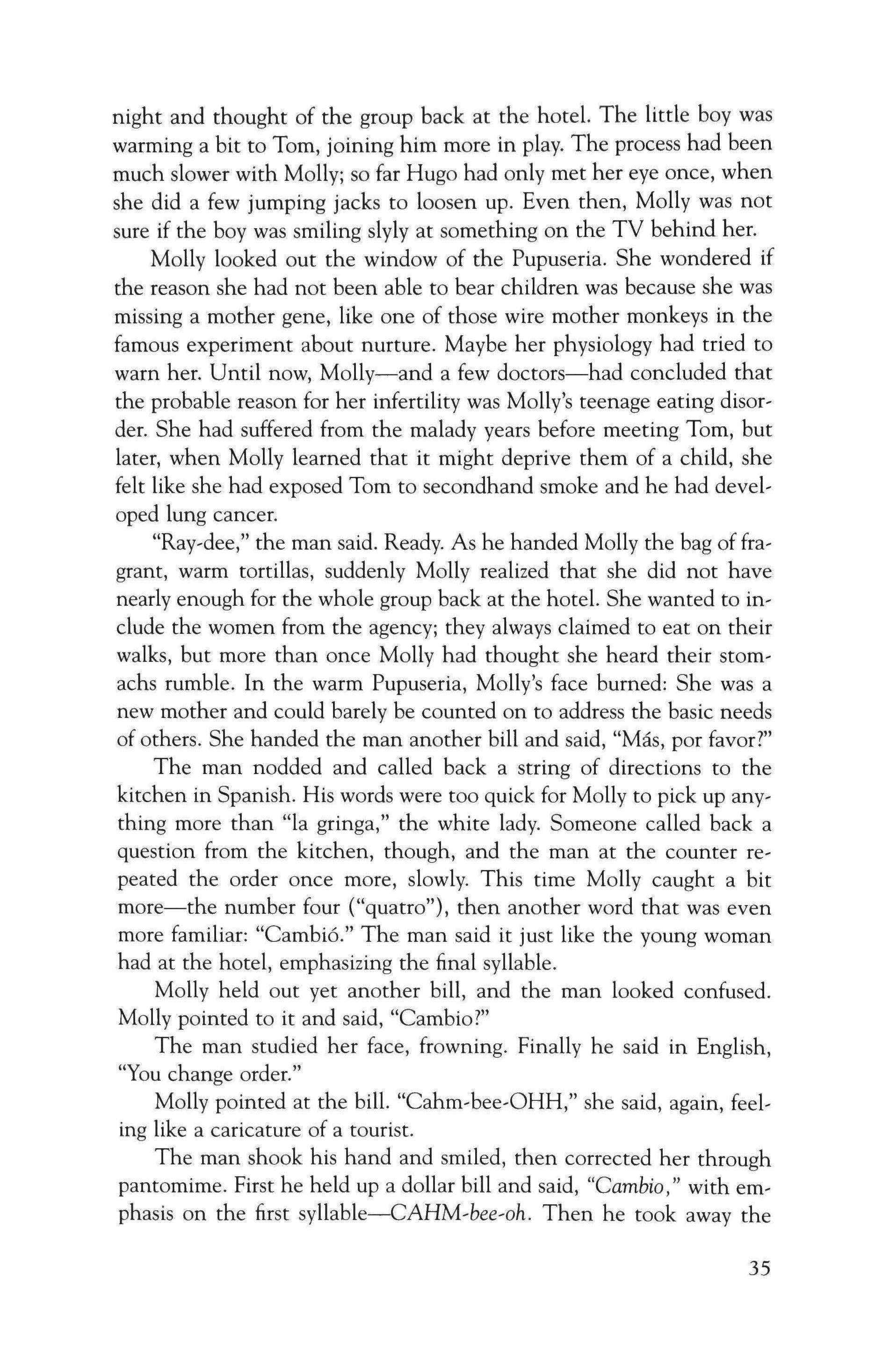
night and thought of the group back at the hotel. The little boy was warming a bit to Tom, joining him more in play. The process had been much slower with Molly; so far Hugo had only met her eye once, when she did a few jumping jacks to loosen up. Even then, Molly was not sure if the boy was smiling slyly at something on the TV behind her.
Molly looked out the window of the Pupuseria. She wondered if the reason she had not been able to bear children was because she was missing a mother gene, like one of those wire mother monkeys in the famous experiment about nurture. Maybe her physiology had tried to warn her. Until now, Molly-and a few doctors-had concluded that the probable reason for her infertility was Molly's teenage eating disorder. She had suffered from the malady years before meeting Tom, but later, when Molly learned that it might deprive them of a child, she felt like she had exposed Tom to secondhand smoke and he had developed lung cancer.
"Ray-dee," the man said. Ready. As he handed Molly the bag of fragrant, warm tortillas, suddenly Molly realized that she did not have nearly enough for the whole group back at the hotel. She wanted to in' elude the women from the agency; they always claimed to eat on their walks, but more than once Molly had thought she heard their stornachs rumble. In the warm Pupuseria, Molly's face burned: She was a new mother and could barely be counted on to address the basic needs of others. She handed the man another bill and said, "Mas, por favor?"
The man nodded and called back a string of directions to the kitchen in Spanish. His words were too quick for Molly to pick up any' thing more than "la gringa," the white lady. Someone called back a question from the kitchen, though, and the man at the counter repeated the order once more, slowly. This time Molly caught a bit more-the number four ("quatro"), then another word that was even more familiar: "Cambi6." The man said it just like the young woman had at the hotel, emphasizing the final syllable.
Molly held out yet another bill, and the man looked confused. Molly pointed to it and said, "Cambia?"
The man studied her face, frowning. Finally he said in English, "You change order."
Molly pointed at the bill. "Cahm-bee-Ol-il-I," she said, again, feel, ing like a caricature of a tourist.
The man shook his hand and smiled, then corrected her through pantomime. First he held up a dollar bill and said, "Cambia," with em' phasis on the first syllable-CAHM,bee,oh. Then he took away the
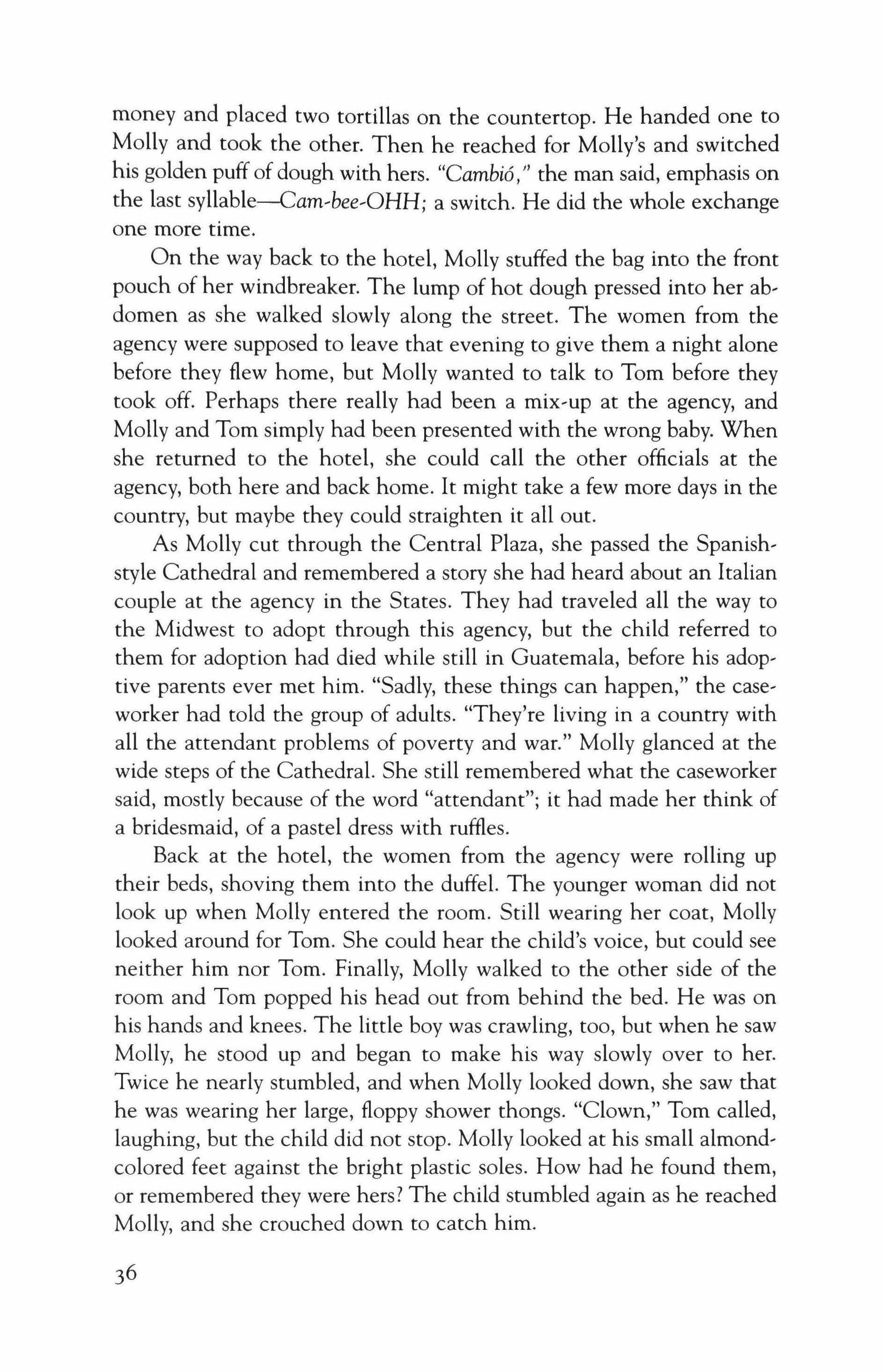
money and placed two tortillas on the countertop. He handed one to Molly and took the other. Then he reached for Molly's and switched his golden puff of dough with hers. "Cambi6," the man said, emphasis on the last syllable-Cam�bee�OHH; a switch. He did the whole exchange one more time.
On the way back to the hotel, Molly stuffed the bag into the front pouch of her windbreaker. The lump of hot dough pressed into her abdomen as she walked slowly along the street. The women from the agency were supposed to leave that evening to give them a night alone before they flew home, but Molly wanted to talk to Tom before they took off. Perhaps there really had been a mix-up at the agency, and Molly and Tom simply had been presented with the wrong baby. When she returned to the hotel, she could call the other officials at the agency, both here and back home. It might take a few more days in the country, but maybe they could straighten it all out.
As Molly cut through the Central Plaza, she passed the Spanishstyle Cathedral and remembered a story she had heard about an Italian couple at the agency in the States. They had traveled all the way to the Midwest to adopt through this agency, but the child referred to them for adoption had died while still in Guatemala, before his adoptive parents ever met him. "Sadly, these things can happen," the caseworker had told the group of adults. "They're living in a country with all the attendant problems of poverty and war." Molly glanced at the wide steps of the Cathedral. She still remembered what the caseworker said, mostly because of the word "attendant"; it had made her think of a bridesmaid, of a pastel dress with ruffles.
Back at the hotel, the women from the agency were rolling up their beds, shoving them into the duffel. The younger woman did not look up when Molly entered the room. Still wearing her coat, Molly looked around for Tom. She could hear the child's voice, but could see neither him nor Tom. Finally, Molly walked to the other side of the room and Tom popped his head out from behind the bed. He was on his hands and knees. The little boy was crawling, too, but when he saw Molly, he stood up and began to make his way slowly over to her. Twice he nearly stumbled, and when Molly looked down, she saw that he was wearing her large, floppy shower thongs. "Clown," Tom called, laughing, but the child did not stop. Molly looked at his small almondcolored feet against the bright plastic soles. How had he found them, or remembered they were hers? The child stumbled again as he reached Molly, and she crouched down to catch him.
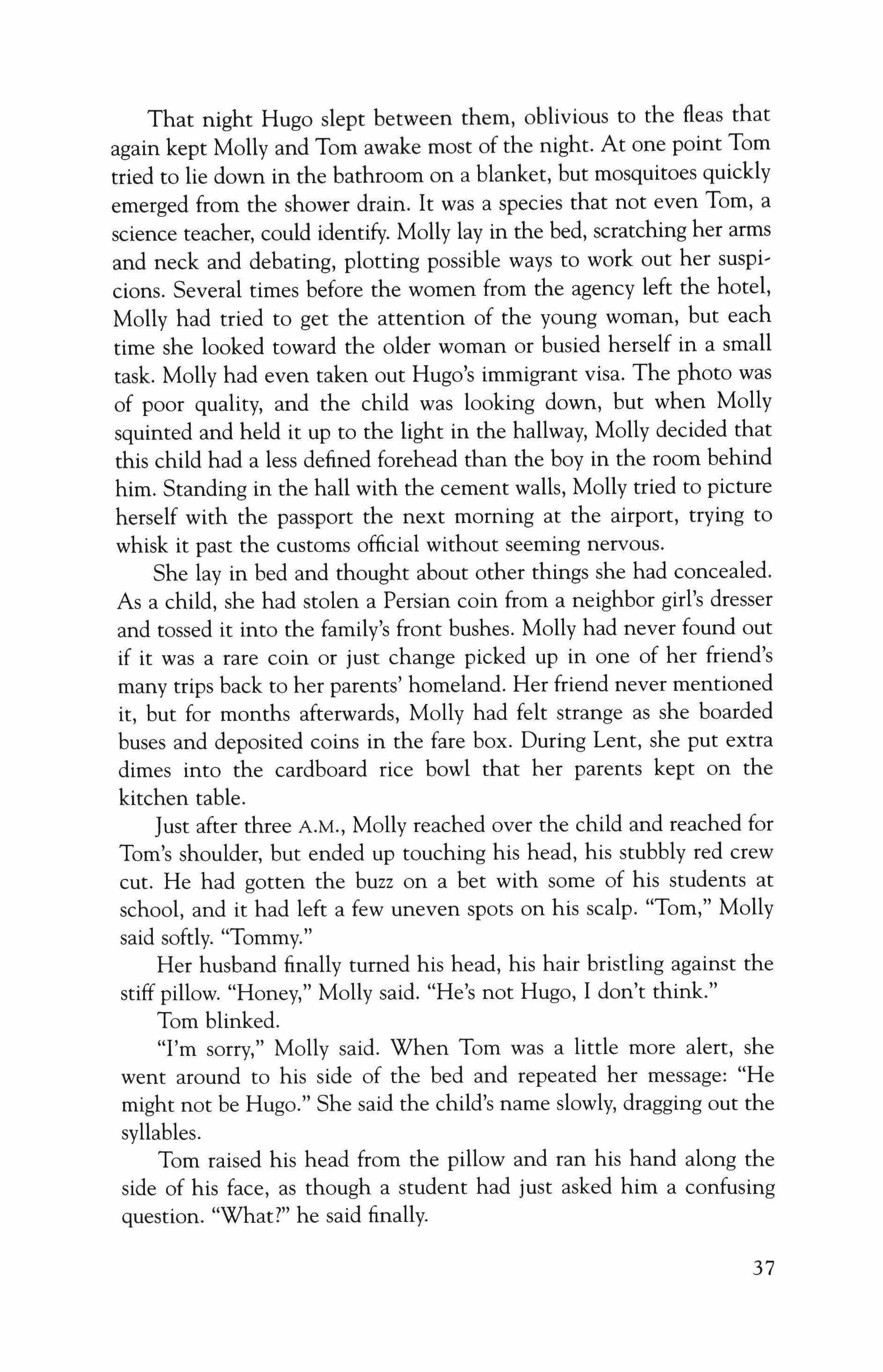
That night Hugo slept between them, oblivious to the fleas that again kept Molly and Tom awake most of the night. At one point Tom tried to lie down in the bathroom on a blanket, but mosquitoes quickly emerged from the shower drain. It was a species that not even Tom, a science teacher, could identify. Molly lay in the bed, scratching her arms and neck and debating, plotting possible ways to work out her suspicions. Several times before the women from the agency left the hotel, Molly had tried to get the attention of the young woman, but each time she looked toward the older woman or busied herself in a small task. Molly had even taken out Hugo's immigrant visa. The photo was of poor quality, and the child was looking down, but when Molly squinted and held it up to the light in the hallway, Molly decided that this child had a less defined forehead than the boy in the room behind him. Standing in the hall with the cement walls, Molly tried to picture herself with the passport the next morning at the airport, trying to whisk it past the customs official without seeming nervous.
She lay in bed and thought about other things she had concealed. As a child, she had stolen a Persian coin from a neighbor girl's dresser and tossed it into the family's front bushes. Molly had never found out if it was a rare coin or just change picked up in one of her friend's many trips back to her parents' homeland. Her friend never mentioned it, but for months afterwards, Molly had felt strange as she boarded buses and deposited coins in the fare box. During Lent, she put extra dimes into the cardboard rice bowl that her parents kept on the kitchen table.
Just after three A.M., Molly reached over the child and reached for Tom's shoulder, but ended up touching his head, his stubbly red crew cut. He had gotten the buzz on a bet with some of his students at school, and it had left a few uneven spots on his scalp. "Tom," Molly said softly. "Tommy."
Her husband finally turned his head, his hair bristling against the stiff pillow. "Honey," Molly said. "He's not Hugo, I don't think."
Tom blinked.
"I'm sorry," Molly said. When Tom was a little more alert, she went around to his side of the bed and repeated her message: "He might not be Hugo." She said the child's name slowly, dragging out the syllables.
Tom raised his head from the pillow and ran his hand along the side of his face, as though a student had just asked him a confusing question. "What?" he said finally.
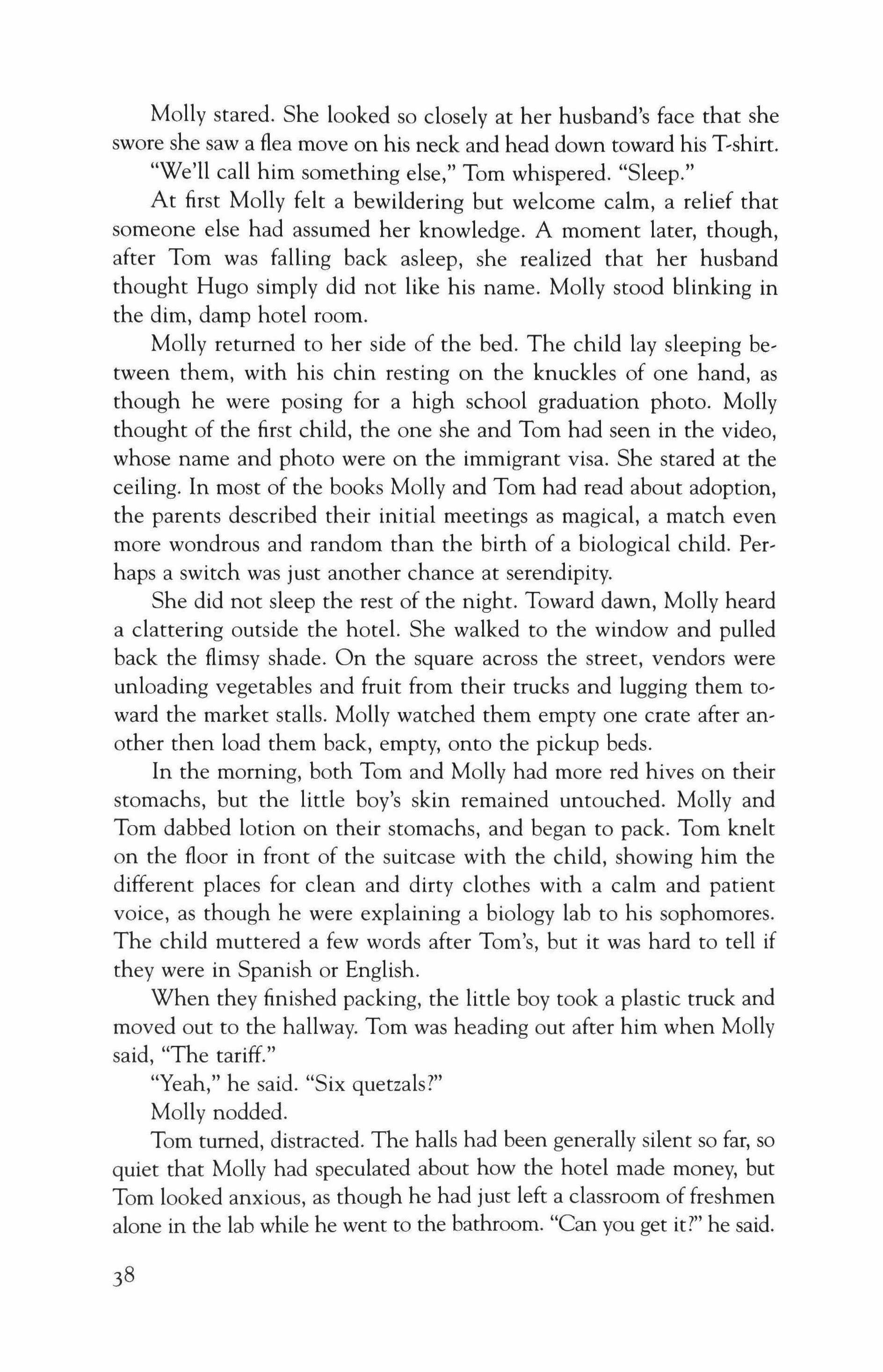
Molly stared. She looked so closely at her husband's face that she swore she saw a flea move on his neck and head down toward his T,shirt.
"We'll call him something else," Tom whispered. "Sleep."
At first Molly felt a bewildering but welcome calm, a relief that someone else had assumed her knowledge. A moment later, though, after Tom was falling back asleep, she realized that her husband thought Hugo simply did not like his name. Molly stood blinking in the dim, damp hotel room.
Molly returned to her side of the bed. The child lay sleeping be' tween them, with his chin resting on the knuckles of one hand, as though he were posing for a high school graduation photo. Molly thought of the first child, the one she and Tom had seen in the video, whose name and photo were on the immigrant visa. She stared at the ceiling. In most of the books Molly and Tom had read about adoption, the parents described their initial meetings as magical, a match even more wondrous and random than the birth of a biological child. Per, haps a switch was just another chance at serendipity.
She did not sleep the rest of the night. Toward dawn, Molly heard a clattering outside the hotel. She walked to the window and pulled back the flimsy shade. On the square across the street, vendors were unloading vegetables and fruit from their trucks and lugging them to' ward the market stalls. Molly watched them empty one crate after an' other then load them back, empty, onto the pickup beds.
In the morning, both Tom and Molly had more red hives on their stomachs, but the little boy's skin remained untouched. Molly and Tom dabbed lotion on their stomachs, and began to pack. Tom knelt on the floor in front of the suitcase with the child, showing him the different places for clean and dirty clothes with a calm and patient voice, as though he were explaining a biology lab to his sophomores. The child muttered a few words after Tom's, but it was hard to tell if they were in Spanish or English.
When they finished packing, the little boy took a plastic truck and moved out to the hallway. Tom was heading out after him when Molly said, "The tariff."
"Yeah," he said. "Six quetzals?"
Molly nodded.
Tom turned, distracted. The halls had been generally silent so far, so quiet that Molly had speculated about how the hotel made money, but Tom looked anxious, as though he had just left a classroom of freshmen alone in the lab while he went to the bathroom. "Can you get it?" he said.
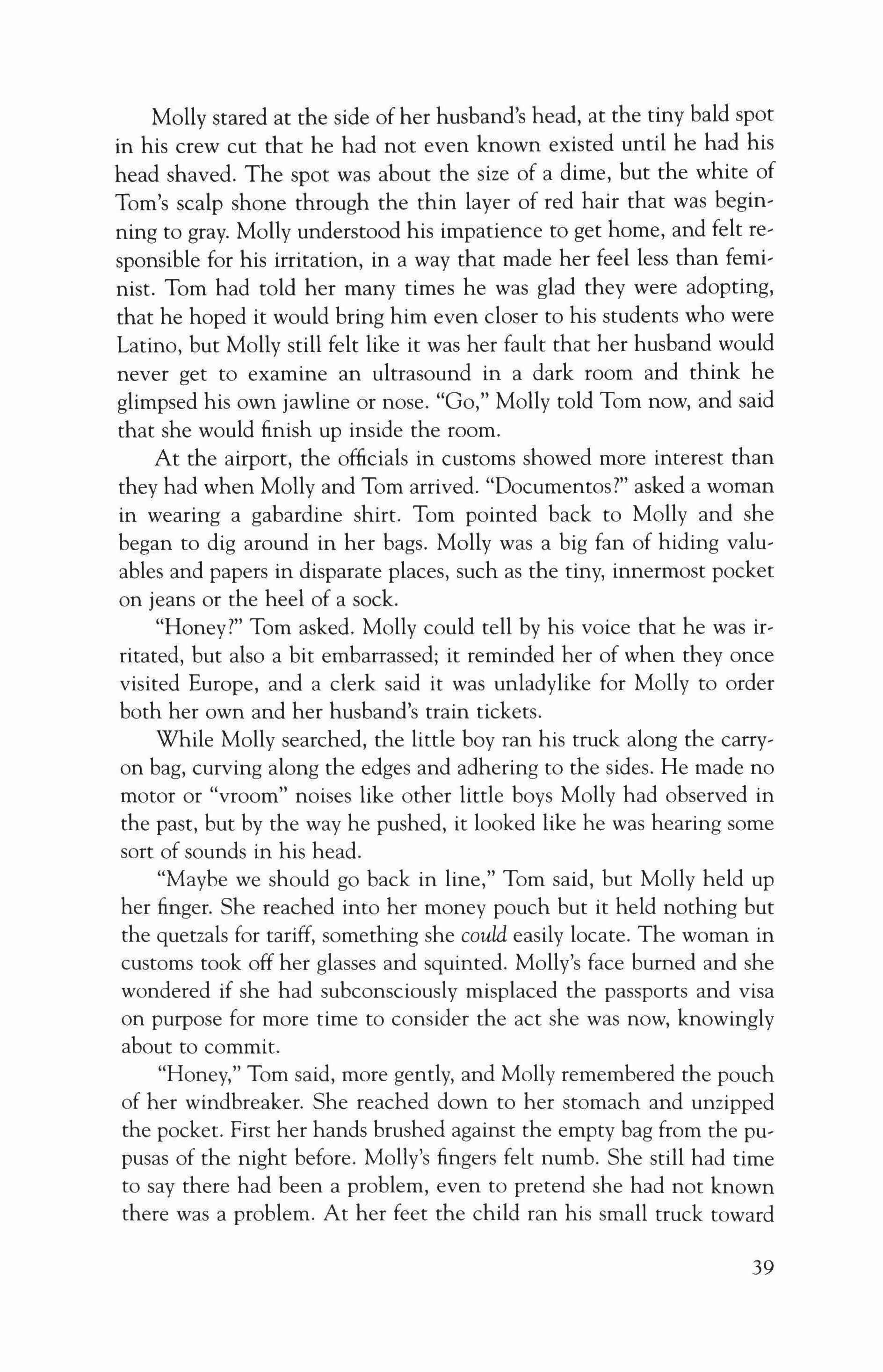
Molly stared at the side of her husband's head, at the tiny bald spot in his crew cut that he had not even known existed until he had his head shaved. The spot was about the size of a dime, but the white of Tom's scalp shone through the thin layer of red hair that was begin, ning to gray. Molly understood his impatience to get home, and felt re, sponsible for his irritation, in a way that made her feel less than ferninist. Tom had told her many times he was glad they were adopting, that he hoped it would bring him even closer to his students who were Latino, but Molly still felt like it was her fault that her husband would never get to examine an ultrasound in a dark room and think he glimpsed his own jawline or nose. "Go," Molly told Tom now, and said that she would finish up inside the room.
At the airport, the officials in customs showed more interest than they had when Molly and Tom arrived. "Documentos?" asked a woman in wearing a gabardine shirt. Tom pointed back to Molly and she began to dig around in her bags. Molly was a big fan of hiding valuables and papers in disparate places, such as the tiny, innermost pocket on jeans or the heel of a sock.
"Honey?" Tom asked. Molly could tell by his voice that he was irritated, but also a bit embarrassed; it reminded her of when they once visited Europe, and a clerk said it was unladylike for Molly to order both her own and her husband's train tickets.
While Molly searched, the little boy ran his truck along the carry' on bag, curving along the edges and adhering to the sides. He made no motor or "vroom" noises like other little boys Molly had observed in the past, but by the way he pushed, it looked like he was hearing some sort of sounds in his head.
"Maybe we should go back in line," Tom said, but Molly held up her finger. She reached into her money pouch but it held nothing but the quetzals for tariff, something she could easily locate. The woman in customs took off her glasses and squinted. Molly's face burned and she wondered if she had subconsciously misplaced the passports and visa on purpose for more time to consider the act she was now, knowingly about to commit.
"Honey," Tom said, more gently, and Molly remembered the pouch of her windbreaker. She reached down to her stomach and unzipped the pocket. First her hands brushed against the empty bag from the pupusas of the night before. Molly's fingers felt numb. She still had time to say there had been a problem, even to pretend she had not known there was a problem. At her feet the child ran his small truck toward
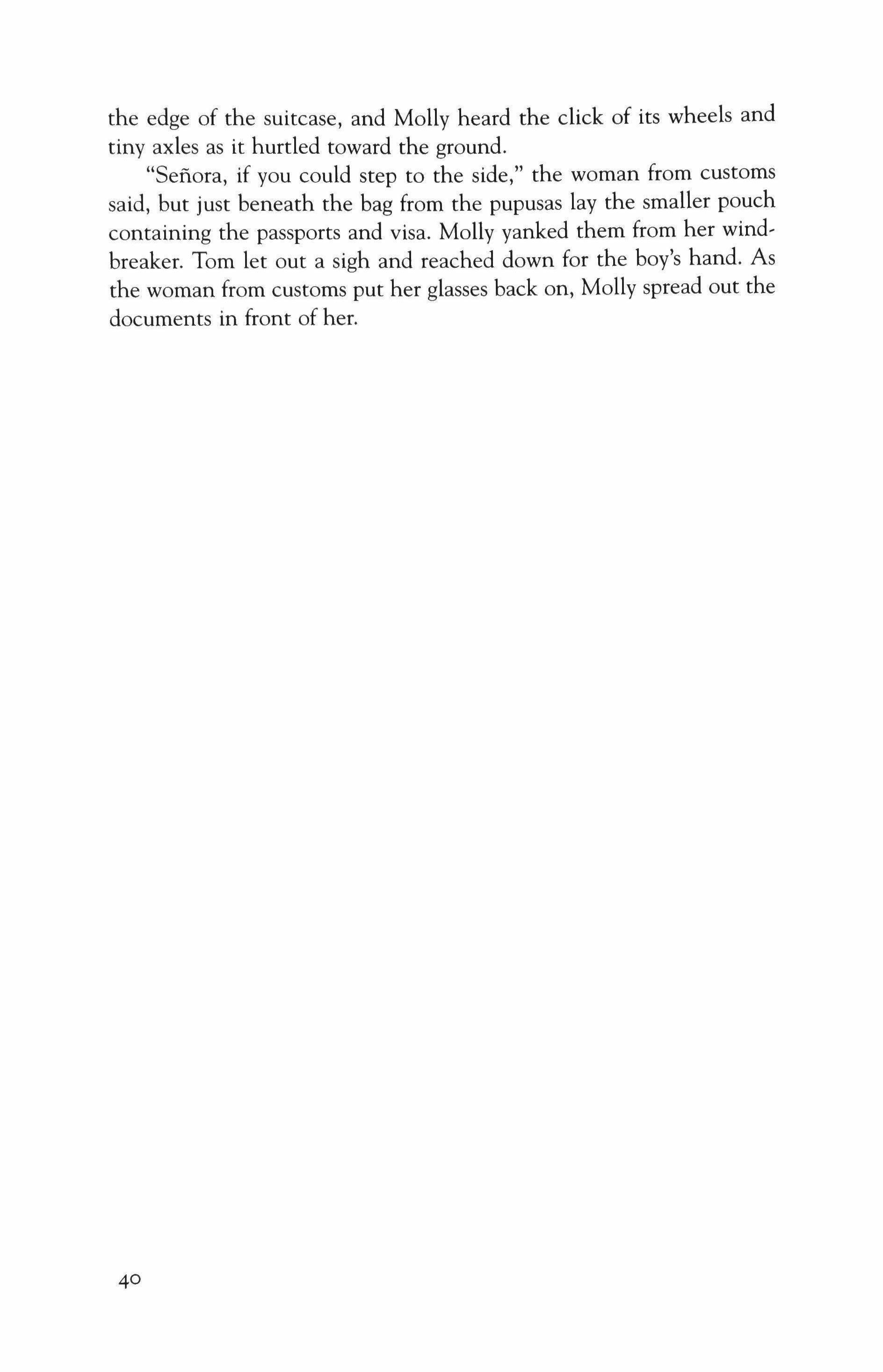
the edge of the suitcase, and Molly heard the click of its wheels and tiny axles as it hurtled toward the ground.
"Senora, if you could step to the side," the woman from customs said, but just beneath the bag from the pupusas lay the smaller pouch containing the passports and visa. Molly yanked them from her windbreaker. Tom let out a sigh and reached down for the boy's hand. As the woman from customs put her glasses back on, Molly spread out the documents in front of her.
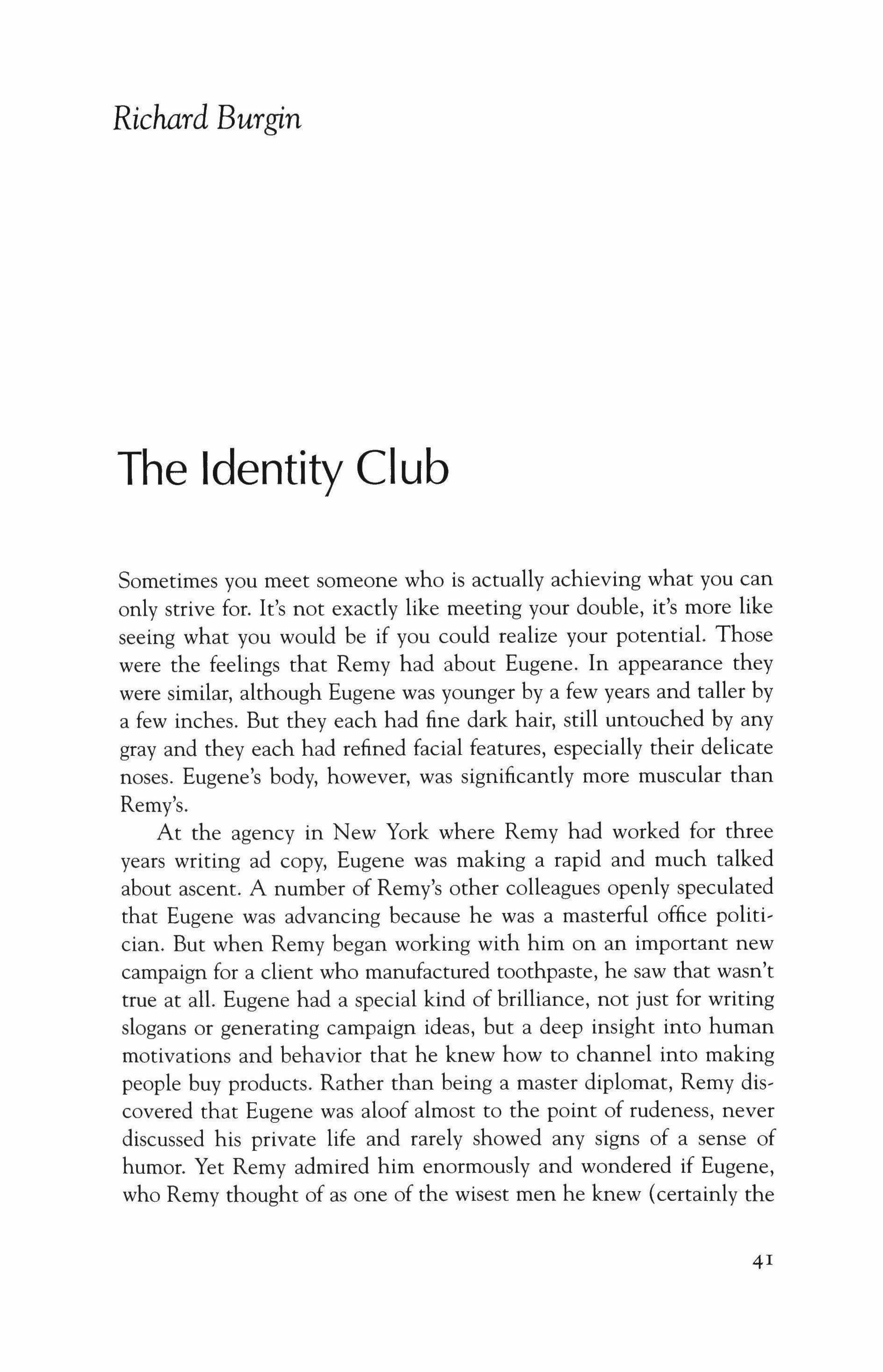
Sometimes you meet someone who is actually achieving what you can only strive for. It's not exactly like meeting your double, it's more like seeing what you would be if you could realize your potential. Those were the feelings that Remy had about Eugene. In appearance they were similar, although Eugene was younger by a few years and taller by a few inches. But they each had fine dark hair, still untouched by any gray and they each had refined facial features, especially their delicate noses. Eugene's body, however, was significantly more muscular than Remy's.
At the agency in New York where Remy had worked for three years writing ad copy, Eugene was making a rapid and much talked about ascent. A number of Remy's other colleagues openly speculated that Eugene was advancing because he was a masterful office politician. But when Remy began working with him on an important new campaign for a client who manufactured toothpaste, he saw that wasn't true at all. Eugene had a special kind of brilliance, not just for writing slogans or generating campaign ideas, but a deep insight into human motivations and behavior that he knew how to channel into making people buy products. Rather than being a master diplomat, Remy discovered that Eugene was aloof almost to the point of rudeness, never discussed his private life and rarely showed any signs of a sense of humor. Yet Remy admired him enormously and wondered if Eugene, who Remy thought of as one of the wisest men he knew {certainly the

wisest young man), might be a person he could confide in about the Identity Club and the important decision he had to make in the near future.
All of these thoughts were streaming through Remy's mind after work one night in his apartment when the phone rang. It was Poe calling to remind him about the Identity Club meeting that night. Remy nearly gasped as he'd inexplicably lost track of time and now had only a half hour to meet Poe and take a cab with him to the meeting.
The club itself had to be, almost by definition, a secretive organization that placed a high value on its members' trustworthiness, dependability and punctuality. Its members assumed the identities-the appearance, activities and personalities-{whenever they could) of various celebrated dead artists they deeply admired. At the monthly meetings, which Remy enjoyed immensely and thought of as parties, all members would be dressed in their adopted identities drinking and eating and joking with each other. As soon as he stepped into a meeting he could feel himself transform, as if the colors of his life went from muted grays and browns to glowing reds and yellows and vibrant greens and blues. To be honest with himself, since moving to New York from New England three years ago, his life before the club had been embarrassingly devoid of both emotion and purpose. How lucky for him, he often thought, that he'd been befriended by Winston Reems-now known by club members as Salvador Dali, a junor executive at his agency who had slowly introduced him to the club.
This month's meeting was at the new Bill Evans's apartment (who had patterned himself after the famous jazz pianist) and since Remy enjoyed music he was particularly looking forward to it. He had also been told that Thomas Bernhard, named for the late, Austrian writer, would definitely be there as well. Since Bernhard was renowned for being a kind of hermit it was always special when he did attend a meeting and it made sense that as a former professional musician he would go to this one.
Quickly Remy dried off from his shower and began putting on new clothes. He thought that tonight promised to be an especially interesting mix of people, which was one of the ostensible ideas of the organization, to have great artists from the different arts meet and mingle, as they never had in real life. The decision facing Remy, which he'd given a good deal of thought to without coming any closer to a conclusion, was who he was going to "become" himself. He was considered at present an "uncommitted member" and had been debating between
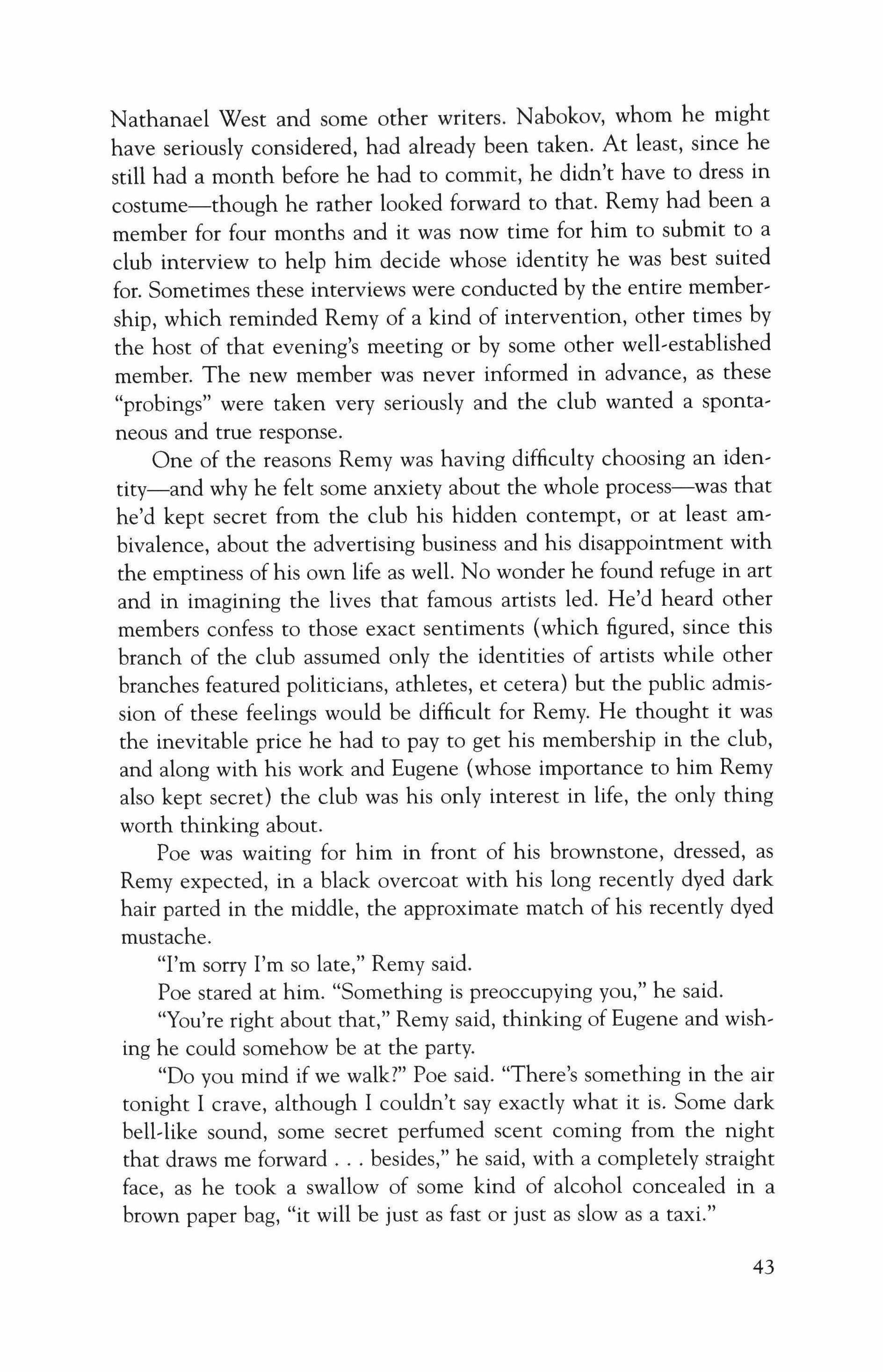
Nathanael West and some other writers. Nabokov, whom he might have seriously considered, had already been taken. At least, since he still had a month before he had to commit, he didn't have to dress in costume-though he rather looked forward to that. Remy had been a member for four months and it was now time for him to submit to a club interview to help him decide whose identity he was best suited for. Sometimes these interviews were conducted by the entire membership, which reminded Remy of a kind of intervention, other times by the host of that evening's meeting or by some other well-established member. The new member was never informed in advance, as these "probings" were taken very seriously and the club wanted a spontaneous and true response.
One of the reasons Remy was having difficulty choosing an identity-and why he felt some anxiety about the whole process-was that he'd kept secret from the club his hidden contempt, or at least ambivalence, about the advertising business and his disappointment with the emptiness of his own life as well. No wonder he found refuge in art and in imagining the lives that famous artists led. He'd heard other members confess to those exact sentiments (which figured, since this branch of the club assumed only the identities of artists while other branches featured politicians, athletes, et cetera) but the public admission of these feelings would be difficult for Remy. He thought it was the inevitable price he had to pay to get his membership in the club, and along with his work and Eugene (whose importance to him Remy also kept secret) the club was his only interest in life, the only thing worth thinking about.
Poe was waiting for him in front of his brownstone, dressed, as Remyexpected, in a black overcoat with his long recently dyed dark hair parted in the middle, the approximate match of his recently dyed mustache.
"I'm sorry I'm so late," Remy said.
Poe stared at him. "Something is preoccupying you," he said.
"You're right about that," Remy said, thinking of Eugene and wishing he could somehow be at the party.
"Do you mind if we walk?" Poe said. "There's something in the air tonight I crave, although I couldn't say exactly what it is. Some dark bell-like sound, some secret perfumed scent coming from the night that draws me forward besides," he said, with a completely straight face, as he took a swallow of some kind of alcohol concealed in a brown paper bag, "it will be just as fast or just as slow as a taxi."
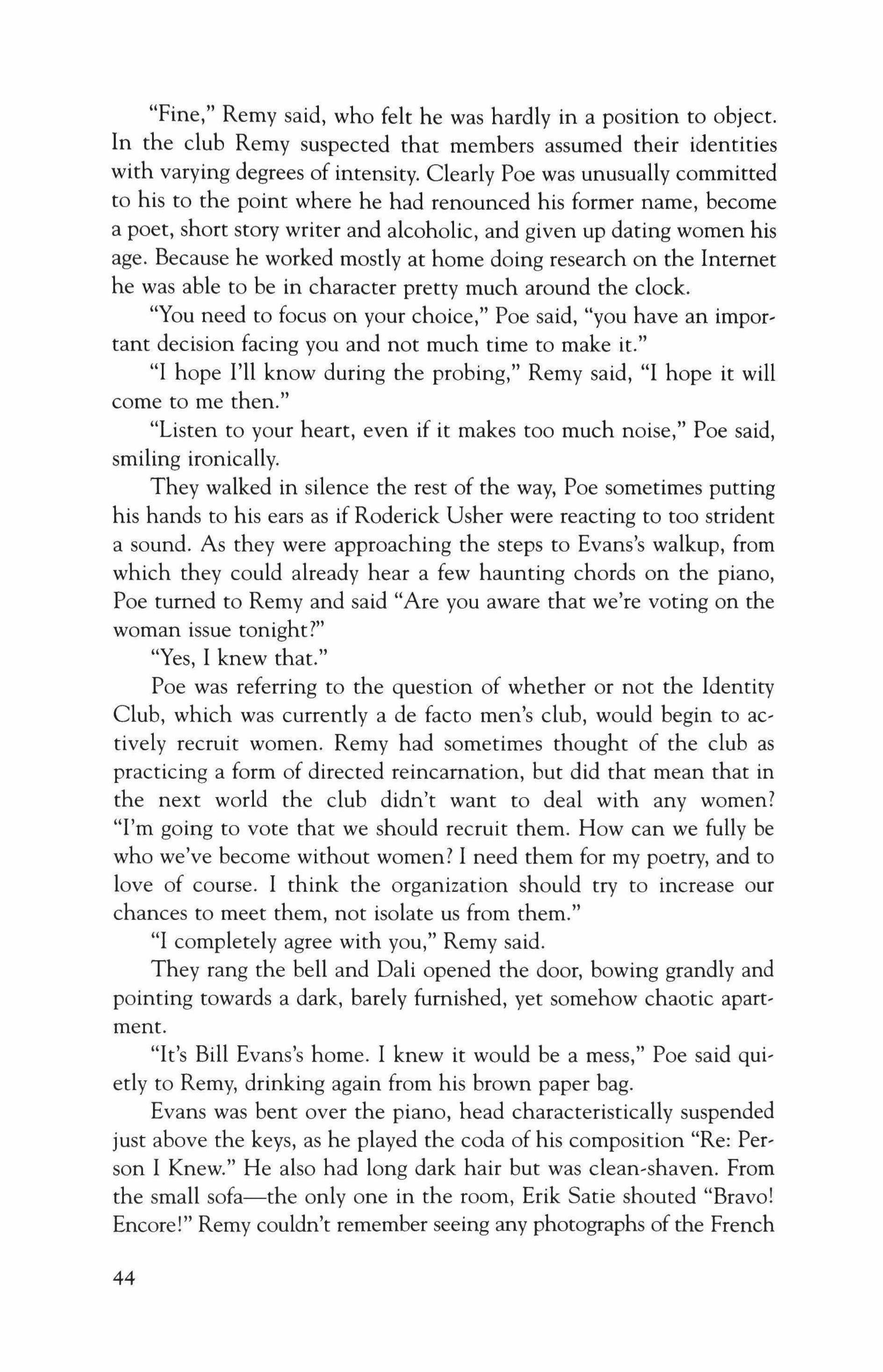
"Fine," Remy said, who felt he was hardly in a position to object. In the club Remy suspected that members assumed their identities with varying degrees of intensity. Clearly Poe was unusually committed to his to the point where he had renounced his former name, become a poet, short story writer and alcoholic, and given up dating women his age. Because he worked mostly at home doing research on the Internet he was able to be in character pretty much around the clock.
"You need to focus on your choice," Poe said, "you have an important decision facing you and not much time to make it."
"I hope I'll know during the probing," Remy said, "I hope it will come to me then."
"Listen to your heart, even if it makes too much noise," Poe said, smiling ironically.
They walked in silence the rest of the way, Poe sometimes putting his hands to his ears as if Roderick Usher were reacting to too strident a sound. As they were approaching the steps to Evans's walkup, from which they could already hear a few haunting chords on the piano, Poe turned to Remy and said "Are you aware that we're voting on the woman issue tonight?"
"Yes, I knew that."
Poe was referring to the question of whether or not the Identity Club, which was currently a de facto men's club, would begin to actively recruit women. Remy had sometimes thought of the club as practicing a form of directed reincarnation, but did that mean that in the next world the club didn't want to deal with any women? "I'm going to vote that we should recruit them. How can we fully be who we've become without women? I need them for my poetry, and to love of course. I think the organization should try to increase our chances to meet them, not isolate us from them."
"I completely agree with you," Remy said.
They rang the bell and Dali opened the door, bowing grandly and pointing towards a dark, barely furnished, yet somehow chaotic apartment.
"It's Bill Evans's home. I knew it would be a mess," Poe said quietly to Remy, drinking again from his brown paper bag.
Evans was bent over the piano, head characteristically suspended just above the keys, as he played the coda of his composition "Re: Person I Knew." He also had long dark hair but was clean-shaven. From the small sofa-the only one in the room, Erik Satie shouted "Bravo! Encore!" Remy couldn't remember seeing any photographs of the French

composer but judged his French to be authentic. As a tribute to his ad, mirer, Evans played a version of Satie's most famous piano piece "Gymnopedie" which Remy recalled the former Evans had recorded on his album Nirvana. This was the first time Remy had heard the new Bill Evans play and while he was hardly an Evans scholar he thought it sounded quite convincing. The harmony, the soft touch and plain, tive melodic lines were all there {no doubt learned from a book that had printed Evans's solos and arrangements} though, of course, some mistakes were made and the new Evans's touch wasn't as elegant as the first one's. Still, Remy could see that the new Evans's immersion into his identity had been thorough. Remy had recently seen a video of the former Evans playing and could see that the new one had his body movements down pat. Could he, Remy, devote himself as thoroughly to the new identity he would soon be assuming?
"Encore, encore," said Satie again and now also Cocteau, who had joined his old friend and collaborator on the sofa. Continuing his homage to his French admirers, Evans played "You Must Believe In Spring" by the French composer Michel Legrand. When it ended Remy found himself applauding vigorously as well and becoming even more curious about the former life of the new Evans. All he knew was that he'd once been a student at [ulliard and was involved now in selling computer parts. He wished he'd paid more attention when he talked with him five months ago at the meeting but now it was too late, as members were not allowed to discuss their former identities with each other once they'd committed to a new one.
After a brief rendition of "Five," Evans took a break and Remy slowly sidled up to him, wishing again that Eugene were there. Though he was often aloof, when the situation required Eugene always knew just what to say to people. What to say and not a word more, for Eu, gene had the gift of concision, just as Evans did on the piano.
"That was beautiful playing," Remy finally said.
"Thanks, man," Evans said, slowly raising his head and smiling at him. Like the first Bill Evans, his teeth weren't very good and he wore glasses.
"1 know how hard it is to keep that kind of time, and to swing like that without your trio."
"1 miss the guys but sometimes when 1 play alone 1 feel a oneness with the music that 1 just can't get any other way."
It occurred to Remy that Evans had had at least four different trios throughout his recording career and that he didn't know which trio
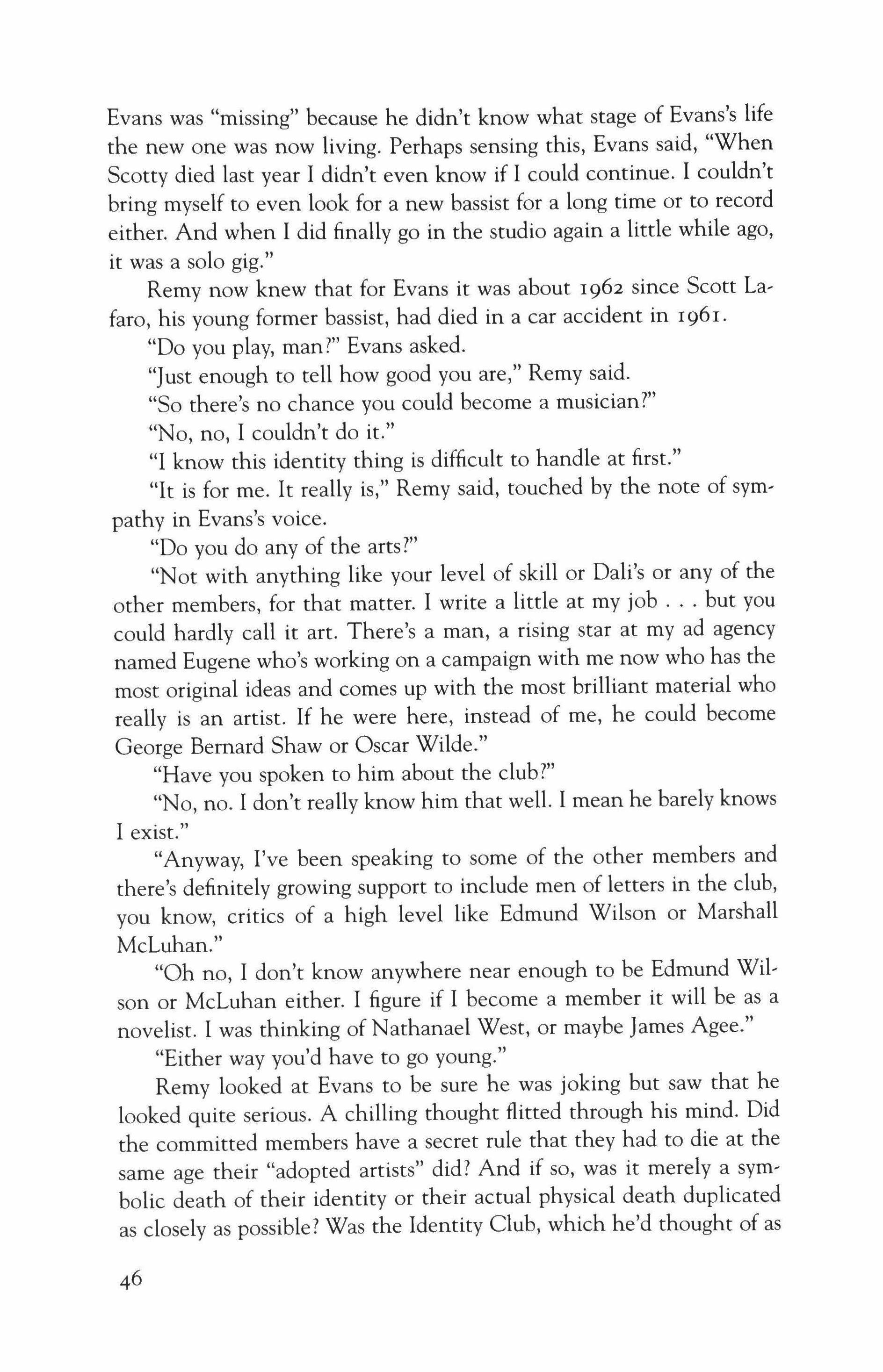
Evans was "missing" because he didn't know what stage of Evans's life the new one was now living. Perhaps sensing this, Evans said, "When Scotty died last year I didn't even know if I could continue. I couldn't bring myself to even look for a new bassist for a long time or to record either. And when I did finally go in the studio again a little while ago, it was a solo gig."
Remy now knew that for Evans it was about 1962 since Scott Lafaro, his young former bassist, had died in a car accident in 196 I
"Do you play, man?" Evans asked.
"Just enough to tell how good you are," Remy said.
"So there's no chance you could become a musician?"
"No, no, I couldn't do it."
"I know this identity thing is difficult to handle at first."
"It is for me. It really is," Remy said, touched by the note of sympathy in Evans's voice.
"Do you do any of the arts?"
"Not with anything like your level of skill or Dali's or any of the other members, for that matter. I write a little at my job but you could hardly call it art. There's a man, a rising star at my ad agency named Eugene who's working on a campaign with me now who has the most original ideas and comes up with the most brilliant material who really is an artist. If he were here, instead of me, he could become George Bernard Shaw or Oscar Wilde."
"Have you spoken to him about the club?"
"No, no. I don't really know him that well. I mean he barely knows I exist."
"Anyway, I've been speaking to some of the other members and there's definitely growing support to include men of letters in the club, you know, critics of a high level like Edmund Wilson or Marshall McLuhan."
"Oh no, I don't know anywhere near enough to be Edmund Wilson or McLuhan either. I figure if I become a member it will be as a novelist. I was thinking of Nathanael West, or maybe James Agee."
"Either way you'd have to go young."
Remy looked at Evans to be sure he was joking but saw that he looked quite serious. A chilling thought flitted through his mind. Did the committed members have a secret rule that they had to die at the same age their "adopted artists" did? And if so, was it merely a symbolic death of their identity or their actual physical death duplicated as closely as possible? Was the Identity Club, which he'd thought of as
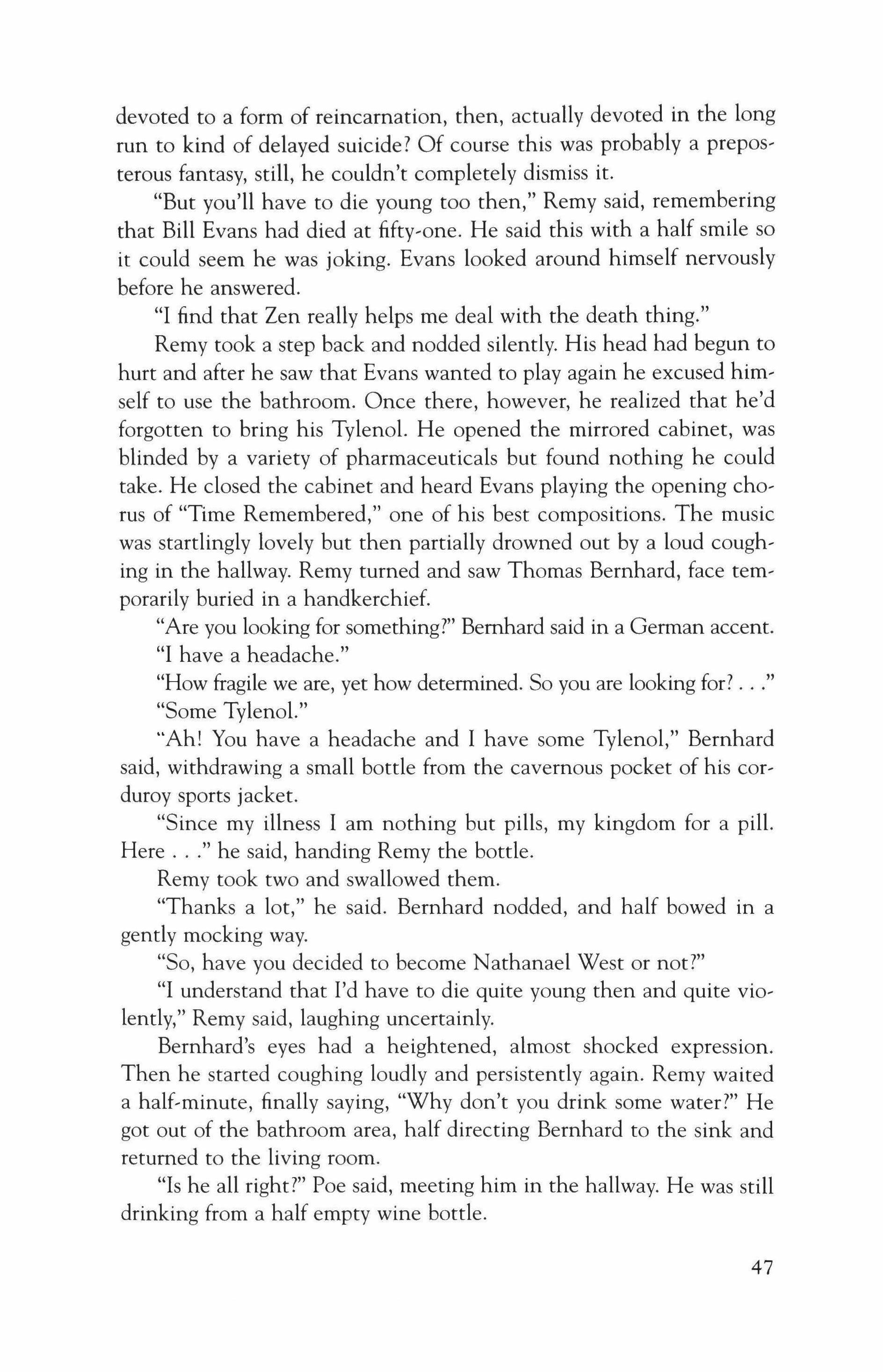
devoted to a form of reincarnation, then, actually devoted in the long run to kind of delayed suicide? Of course this was probably a preposterous fantasy, still, he couldn't completely dismiss it.
"But you'll have to die young too then," Remy said, remembering that Bill Evans had died at fifty-one. He said this with a half smile so it could seem he was joking. Evans looked around himself nervously before he answered.
"I find that Zen really helps me deal with the death thing."
Remy took a step back and nodded silently. His head had begun to hurt and after he saw that Evans wanted to play again he excused himself to use the bathroom. Once there, however, he realized that he'd forgotten to bring his Tylenol. He opened the mirrored cabinet, was blinded by a variety of pharmaceuticals but found nothing he could take. He closed the cabinet and heard Evans playing the opening chorus of "Time Remembered," one of his best compositions. The music was startlingly lovely but then partially drowned out by a loud coughing in the hallway. Remy turned and saw Thomas Bernhard, face temporarily buried in a handkerchief.
"Are you looking for something?" Bernhard said in a German accent.
"I have a headache."
"How fragile we are, yet how determined. So you are looking for? "
"Some Tylenol."
"Ah! You have a headache and I have some Tylenol," Bernhard said, withdrawing a small bottle from the cavernous pocket of his corduroy sports jacket.
"Since my illness I am nothing but pills, my kingdom for a pill. Here he said, handing Remy the bottle.
Remy took two and swallowed them.
"Thanks a lot," he said. Bernhard nodded, and half bowed in a gently mocking way.
"So, have you decided to become Nathanael West or not?"
"I understand that I'd have to die quite young then and quite violently," Remy said, laughing uncertainly.
Bernhard's eyes had a heightened, almost shocked expression. Then he started coughing loudly and persistently again. Remy waited a half-minute, finally saying, "Why don't you drink some water?" He got out of the bathroom area, half directing Bernhard to the sink and returned to the living room.
"Is he all right?" Poe said, meeting him in the hallway. He was still drinking from a half empty wine bottle.
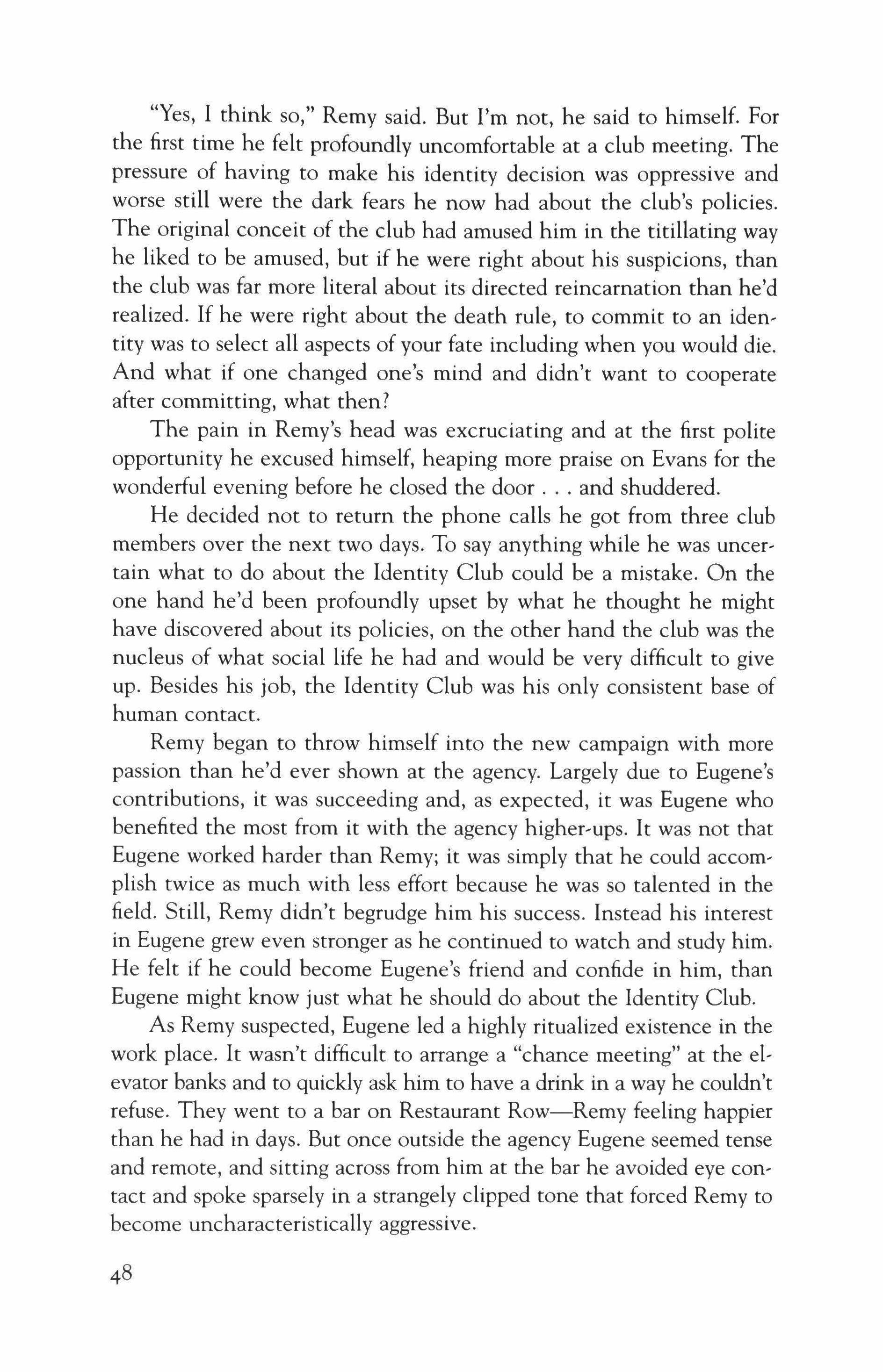
"Yes, I think so," Remy said. But I'm not, he said to himself. For the first time he felt profoundly uncomfortable at a club meeting. The pressure of having to make his identity decision was oppressive and worse still were the dark fears he now had about the club's policies. The original conceit of the club had amused him in the titillating way he liked to be amused, but if he were right about his suspicions, than the club was far more literal about its directed reincarnation than he'd realized. If he were right about the death rule, to commit to an identity was to select all aspects of your fate including when you would die. And what if one changed one's mind and didn't want to cooperate after committing, what then?
The pain in Remy's head was excruciating and at the first polite opportunity he excused himself, heaping more praise on Evans for the wonderful evening before he closed the door and shuddered.
He decided not to return the phone calls he got from three club members over the next two days. To say anything while he was uncertain what to do about the Identity Club could be a mistake. On the one hand he'd been profoundly upset by what he thought he might have discovered about its policies, on the other hand the club was the nucleus of what social life he had and would be very difficult to give up. Besides his job, the Identity Club was his only consistent base of human contact.
Remy began to throw himself into the new campaign with more passion than he'd ever shown at the agency. Largely due to Eugene's contributions, it was succeeding and, as expected, it was Eugene who benefited the most from it with the agency higher-ups. It was not that Eugene worked harder than Remy; it was simply that he could accomplish twice as much with less effort because he was so talented in the field. Still, Remy didn't begrudge him his success. Instead his interest in Eugene grew even stronger as he continued to watch and study him. He felt if he could become Eugene's friend and confide in him, than Eugene might know just what he should do about the Identity Club.
As Remy suspected, Eugene led a highly ritualized existence in the work place. It wasn't difficult to arrange a "chance meeting" at the elevator banks and to quickly ask him to have a drink in a way he couldn't refuse. They went to a bar on Restaurant Row-Remy feeling happier than he had in days. But once outside the agency Eugene seemed tense and remote, and sitting across from him at the bar he avoided eye contact and spoke sparsely in a strangely clipped tone that forced Remy to become uncharacteristically aggressive.
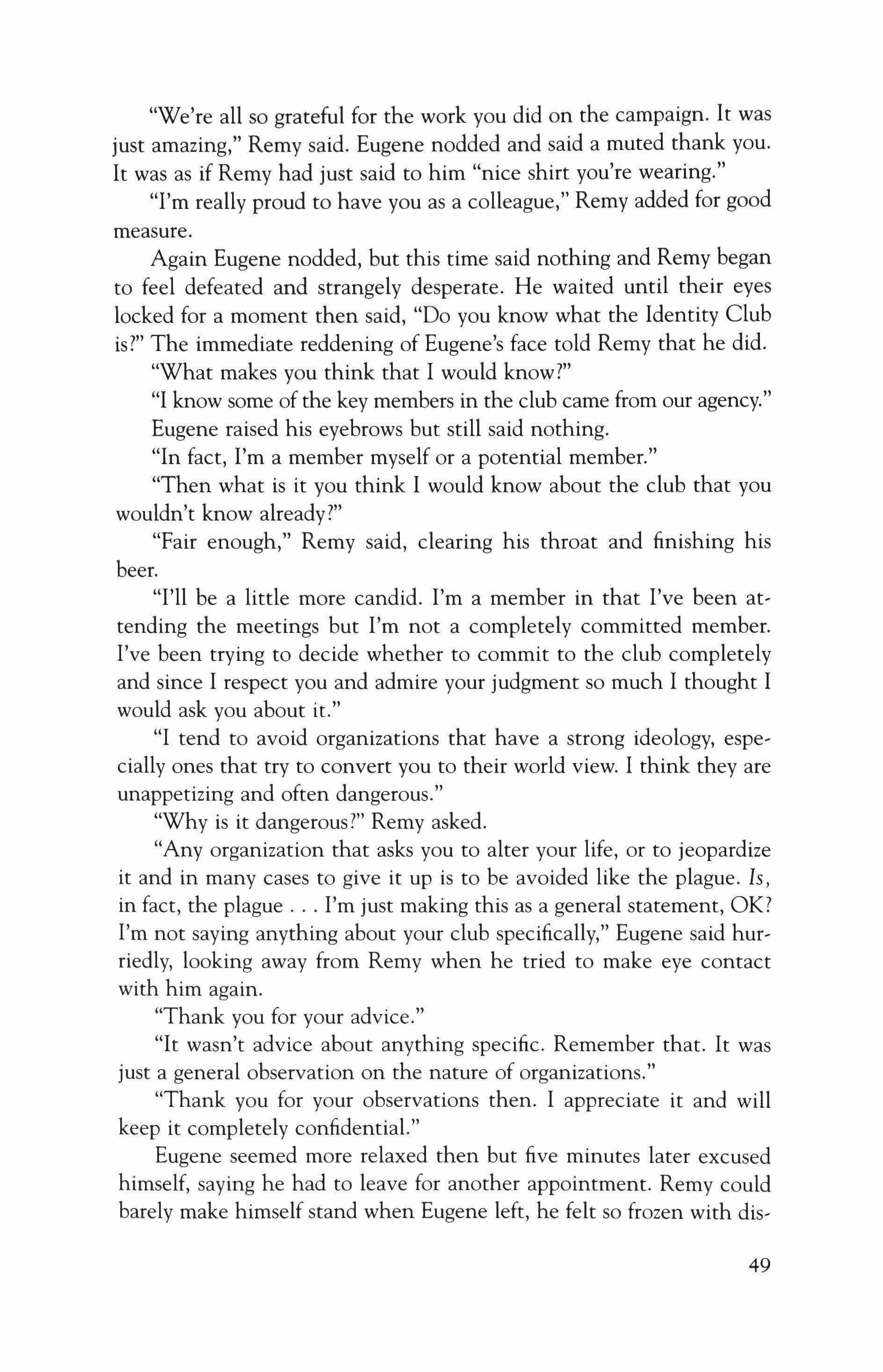
"We're all so grateful for the work you did on the campaign. lt was just amazing," Remy said. Eugene nodded and said a muted thank you. lt was as if Remy had just said to him "nice shirt you're wearing."
"I'm really proud to have you as a colleague," Remy added for good measure.
Again Eugene nodded, but this time said nothing and Remy began to feel defeated and strangely desperate. He waited until their eyes locked for a moment then said, "Do you know what the Identity Club is?" The immediate reddening of Eugene's face told Remy that he did.
"What makes you think that I would know?"
"I know some of the key members in the club came from our agency."
Eugene raised his eyebrows but still said nothing.
"In fact, I'm a member myself or a potential member."
"Then what is it you think I would know about the club that you wouldn't know already?"
"Fair enough," Remy said, clearing his throat and finishing his beer.
"I'll be a little more candid. I'm a member in that I've been attending the meetings but I'm not a completely committed member. I've been trying to decide whether to commit to the club completely and since I respect you and admire your judgment so much I thought I would ask you about it."
"I tend to avoid organizations that have a strong ideology, especially ones that try to convert you to their world view. I think they are unappetizing and often dangerous."
"Why is it dangerous?" Remy asked.
"Any organization that asks you to alter your life, or to jeopardize it and in many cases to give it up is to be avoided like the plague. Is, in fact, the plague I'm just making this as a general statement, OK? I'm not saying anything about your club specifically," Eugene said hurriedly, looking away from Remy when he tried to make eye contact with him again.
"Thank you for your advice."
"It wasn't advice about anything specific. Remember that. It was just a general observation on the nature of organizations."
"Thank you for your observations then. I appreciate it and will keep it completely confidential."
Eugene seemed more relaxed then but five minutes later excused himself, saying he had to leave for another appointment. Remy could barely make himself stand when Eugene left, he felt so frozen with dis-
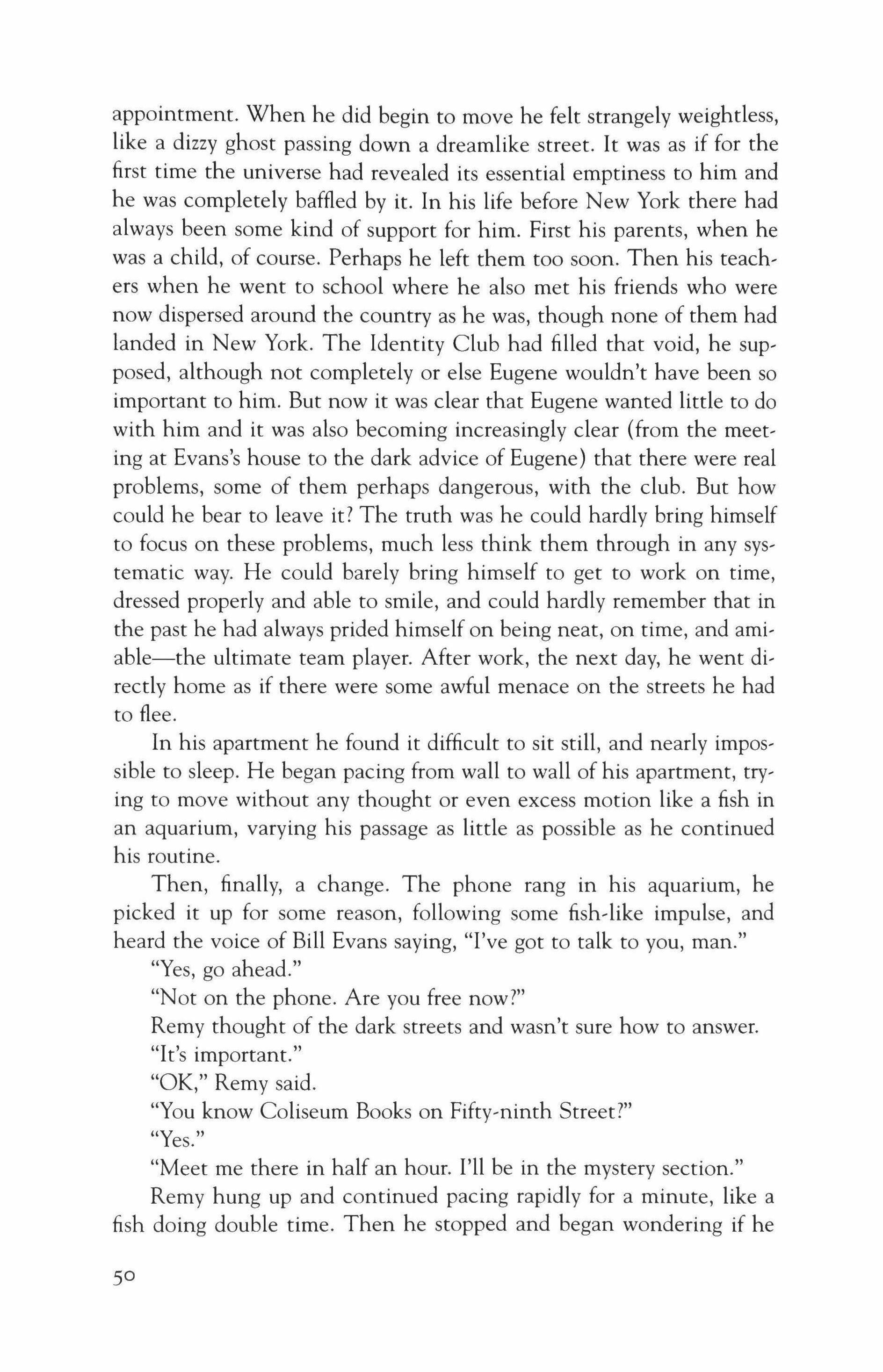
appointment. When he did begin to move he felt strangely weightless, like a dizzy ghost passing down a dreamlike street. It was as if for the first time the universe had revealed its essential emptiness to him and he was completely baffled by it. In his life before New York there had always been some kind of support for him. First his parents, when he was a child, of course. Perhaps he left them too soon. Then his teachers when he went to school where he also met his friends who were now dispersed around the country as he was, though none of them had landed in New York. The Identity Club had filled that void, he supposed, although not completely or else Eugene wouldn't have been so important to him. But now it was clear that Eugene wanted little to do with him and it was also becoming increasingly clear (from the meeting at Evans's house to the dark advice of Eugene) that there were real problems, some of them perhaps dangerous, with the club. But how could he bear to leave it? The truth was he could hardly bring himself to focus on these problems, much less think them through in any systematic way. He could barely bring himself to get to work on time, dressed properly and able to smile, and could hardly remember that in the past he had always prided himself on being neat, on time, and amiable-the ultimate team player. After work, the next day, he went directly home as if there were some awful menace on the streets he had to flee.
In his apartment he found it difficult to sit still, and nearly impossible to sleep. He began pacing from wall to wall of his apartment, trying to move without any thought or even excess motion like a fish in an aquarium, varying his passage as little as possible as he continued his routine.
Then, finally, a change. The phone rang in his aquarium, he picked it up for some reason, following some fish-like impulse, and heard the voice of Bill Evans saying, "I've got to talk to you, man."
"Yes, go ahead."
"Not on the phone. Are you free now?"
Remy thought of the dark streets and wasn't sure how to answer.
"It's important."
"OK," Remy said.
"You know Coliseum Books on Fifty-ninth Street?"
"Yes."
"Meet me there in half an hour. I'll be in the mystery section."
Remy hung up and continued pacing rapidly for a minute, like a fish doing double time. Then he stopped and began wondering if he
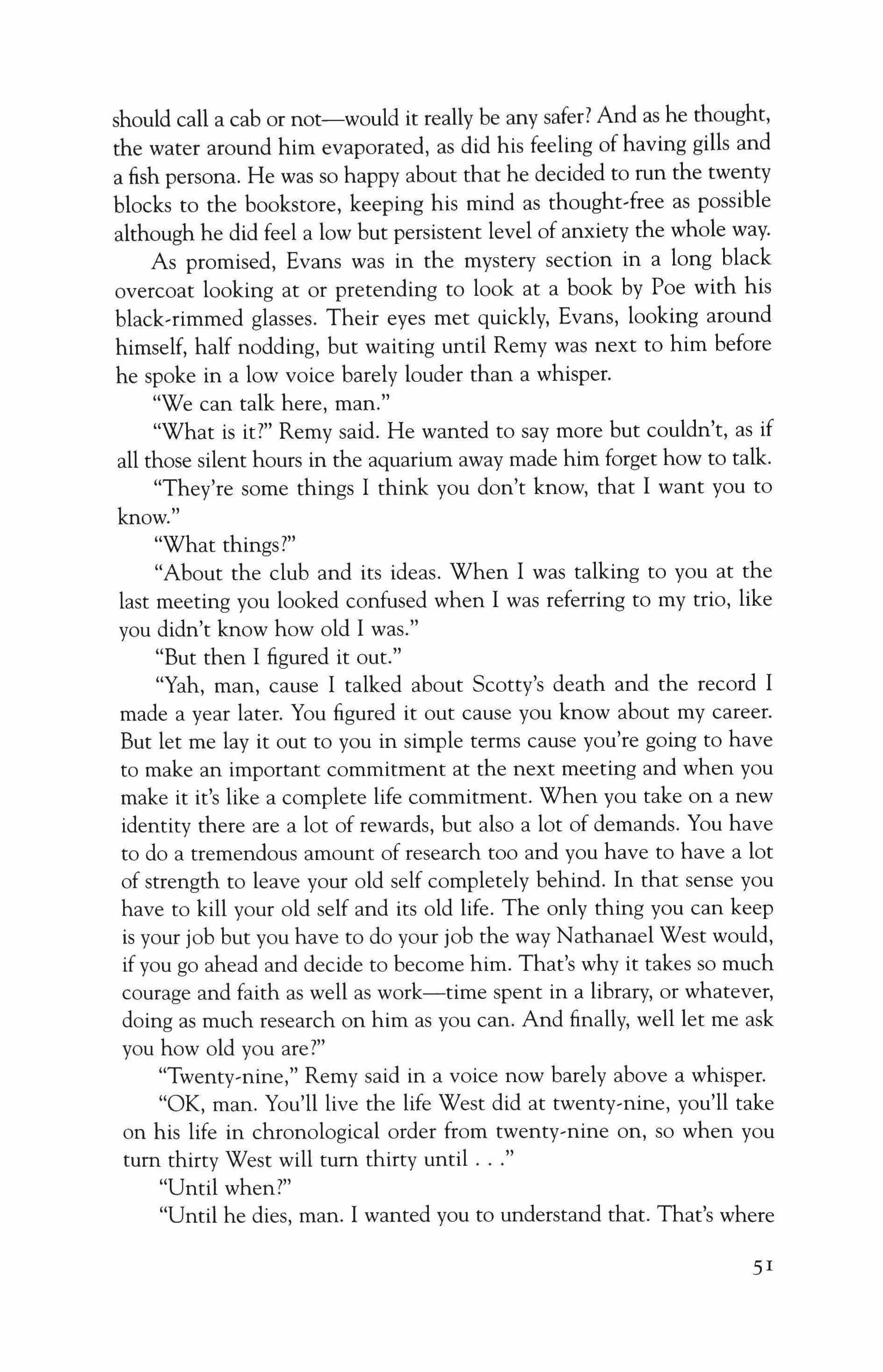
should call a cab or not-would it really be any safer? And as he thought, the water around him evaporated, as did his feeling of having gills and a fish persona. He was so happy about that he decided to run the twenty blocks to the bookstore, keeping his mind as thought-free as possible although he did feel a low but persistent level of anxiety the whole way.
As promised, Evans was in the mystery section in a long black overcoat looking at or pretending to look at a book by Poe with his black-rimmed glasses. Their eyes met quickly, Evans, looking around himself, half nodding, but waiting until Remy was next to him before he spoke in a low voice barely louder than a whisper.
"We can talk here, man."
"What is it?" Remy said. He wanted to say more but couldn't, as if all those silent hours in the aquarium away made him forget how to talk.
"They're some things I think you don't know, that I want you to know."
"What things?"
"About the club and its ideas. When I was talking to you at the last meeting you looked confused when I was referring to my trio, like you didn't know how old I was."
"But then I figured it out."
"Yah, man, cause I talked about Scotty's death and the record I made a year later. You figured it out cause you know about my career. But let me lay it out to you in simple terms cause you're going to have to make an important commitment at the next meeting and when you make it it's like a complete life commitment. When you take on a new identity there are a lot of rewards, but also a lot of demands. You have to do a tremendous amount of research too and you have to have a lot of strength to leave your old self completely behind. In that sense you have to kill your old self and its old life. The only thing you can keep is your job but you have to do your job the way Nathanael West would, if you go ahead and decide to become him. That's why it takes so much courage and faith as well as work-time spent in a library, or whatever, doing as much research on him as you can. And finally, well let me ask you how old you are?"
"Twenty-nine," Remy said in a voice now barely above a whisper.
"OK, man. You'll live the life West did at twenty-nine, you'll take on his life in chronological order from twenty-nine on, so when you turn thirty West will turn thirty until
"Until when?"
"Until he dies, man. I wanted you to understand that. That's where

the courage and faith part come in."
"But he died so young."
"Like I said, I'm gonna pass pretty soon too, but I'm also going to play jazz piano more beautifully than anyone's ever played it-that's the reward part-and besides as long as the club exists I'll be reincarnated again somewhere down the line."
"But you'll be dead."
"No man, I'll be Bill Evans reincarnated. I might have to wait a number of years but like my song says, 'We Will Meet Again,' " Evans said with an ironic smile.
Remy looked down at the floor to get his bearings.
"Do all the members understand this when they make their commitment?"
"Don't worry about the other members. Just focus on yourself."
"But what if I lack the courage and vision to do this, to "Have you been studying the club literature, especially the parts about reincarnation?"
"Not as much as I should have. Look, Bill, what if I decide I can't go through with this and just want to withdraw my membership?"
"I wouldn't advise that," Evans said with unexpected sternness. "I really think it's too late for that 'in your case.'
Instinctively Remy took a step back-his face turning a shade of white that, in tum, made Evans's eyes grow larger and more intense.
"Do you realize the invaluable work we're doing?"
"Yes, no," Remy said.
"We're saving the most important members of the human raceallowing their beauty to continue to touch humanity."
"But you're killing them again. Why not give the, give yourself, for example, a chance to live longer to see what you could do with more time?"
Evans shook his head from side to side like a pendulum.
"You can't go against karma, man. We have to accept our limits." Remy took another step back and Evans extended his arm and let his hand rest on his shoulder.
"This world is as beautiful as it can get. You have to accept it. You know, like the poet said 'death is the mother of beauty.'
"It sounds more like a suicide club than an identity club," Remy blurted.
"Sometimes when something is really important or beautiful you have to die for it, like freedom. Isn't that why all the wars are fought?"
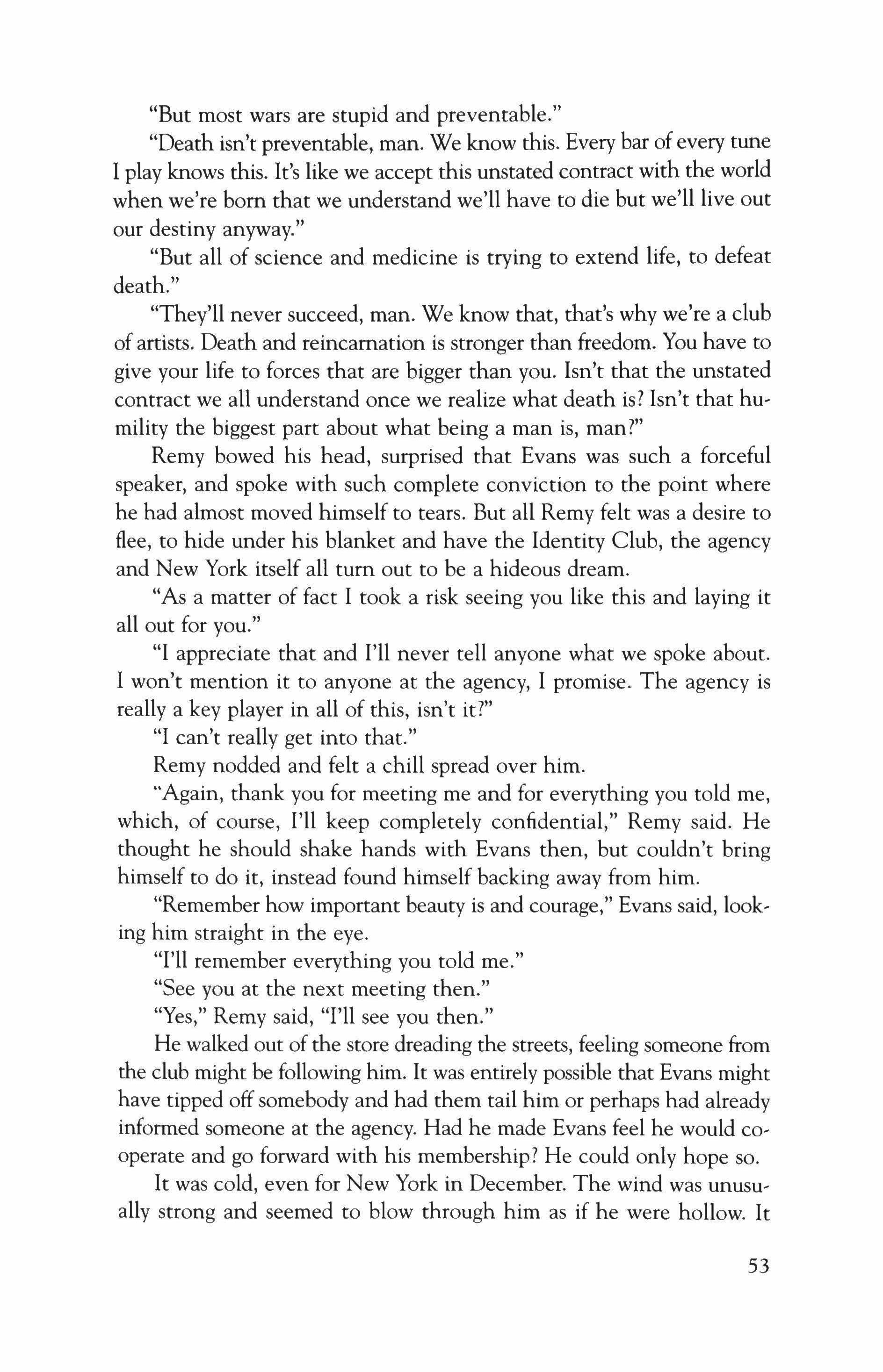
"But most wars are stupid and preventable."
"Death isn't preventable, man. We know this. Every bar of every tune I play knows this. It's like we accept this unstated contract with the world when we're born that we understand we'll have to die but we'll live out our destiny anyway."
"But all of science and medicine is trying to extend life, to defeat death."
"They'll never succeed, man. We know that, that's why we're a club of artists. Death and reincarnation is stronger than freedom. You have to give your life to forces that are bigger than you. Isn't that the unstated contract we all understand once we realize what death is? Isn't that humility the biggest part about what being a man is, man?"
Remy bowed his head, surprised that Evans was such a forceful speaker, and spoke with such complete conviction to the point where he had almost moved himself to tears. But all Remy felt was a desire to flee, to hide under his blanket and have the Identity Club, the agency and New York itself all tum out to be a hideous dream.
"As a matter of fact I took a risk seeing you like this and laying it all out for you."
"I appreciate that and I'll never tell anyone what we spoke about. I won't mention it to anyone at the agency, I promise. The agency is really a key player in all of this, isn't it?"
"I can't really get into that."
Remy nodded and felt a chill spread over him.
"Again, thank you for meeting me and for everything you told me, which, of course, I'll keep completely confidential," Remy said. He thought he should shake hands with Evans then, but couldn't bring himself to do it, instead found himself backing away from him.
"Remember how important beauty is and courage," Evans said, looking him straight in the eye.
"I'll remember everything you told me."
"See you at the next meeting then."
"Yes," Remy said, "I'll see you then."
He walked out of the store dreading the streets, feeling someone from the club might be following him. It was entirely possible that Evans might have tipped off somebody and had them tail him or perhaps had already informed someone at the agency. Had he made Evans feel he would cooperate and go forward with his membership? He could only hope so.
lt was cold, even for New York in December. The wind was unusually strong and seemed to blow through him as if he were hollow. It
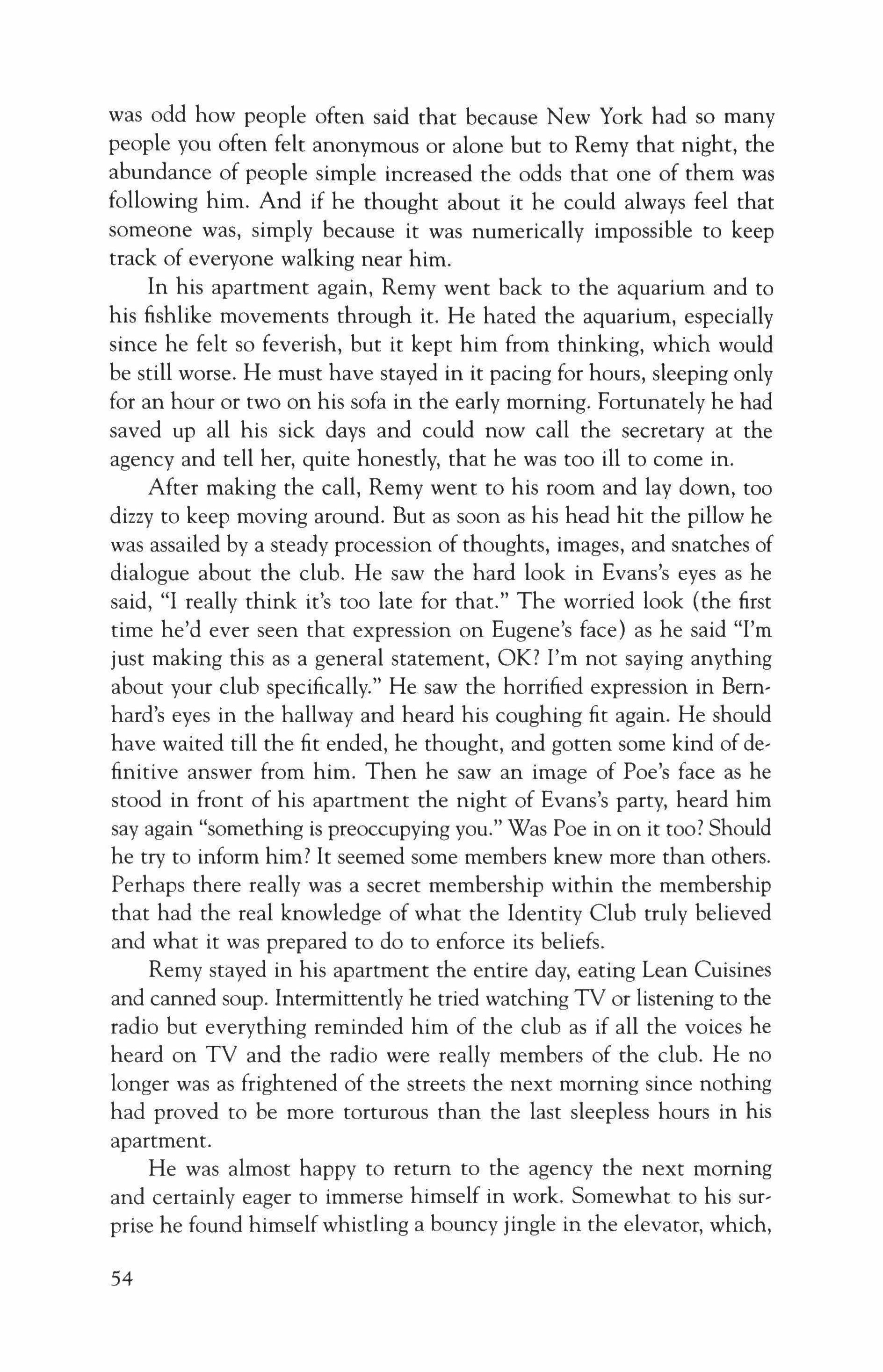
was odd how people often said that because New York had so many people you often felt anonymous or alone but to Remy that night, the abundance of people simple increased the odds that one of them was following him. And if he thought about it he could always feel that someone was, simply because it was numerically impossible to keep track of everyone walking near him.
In his apartment again, Remy went back to the aquarium and to his fishlike movements through it. He hated the aquarium, especially since he felt so feverish, but it kept him from thinking, which would be still worse. He must have stayed in it pacing for hours, sleeping only for an hour or two on his sofa in the early morning. Fortunately he had saved up all his sick days and could now call the secretary at the agency and tell her, quite honestly, that he was too ill to come in.
After making the call, Remy went to his room and lay down, too dizzy to keep moving around. But as soon as his head hit the pillow he was assailed by a steady procession of thoughts, images, and snatches of dialogue about the club. He saw the hard look in Evans's eyes as he said, "I really think it's too late for that." The worried look (the first time he'd ever seen that expression on Eugene's face) as he said "I'm just making this as a general statement, OK? I'm not saying anything about your club specifically." He saw the horrified expression in Bernhard's eyes in the hallway and heard his coughing fit again. He should have waited till the fit ended, he thought, and gotten some kind of definitive answer from him. Then he saw an image of Poe's face as he stood in front of his apartment the night of Evans's party, heard him say again "something is preoccupying you." Was Poe in on it too? Should he try to inform him? It seemed some members knew more than others. Perhaps there really was a secret membership within the membership that had the real knowledge of what the Identity Club truly believed and what it was prepared to do to enforce its beliefs.
Remy stayed in his apartment the entire day, eating Lean Cuisines and canned soup. Intermittently he tried watching TV or listening to the radio but everything reminded him of the club as if all the voices he heard on TV and the radio were really members of the club. He no longer was as frightened of the streets the next morning since nothing had proved to be more torturous than the last sleepless hours in his apartment.
He was almost happy to return to the agency the next morning and certainly eager to immerse himself in work. Somewhat to his surprise he found himself whistling a bouncy jingle in the elevator, which,
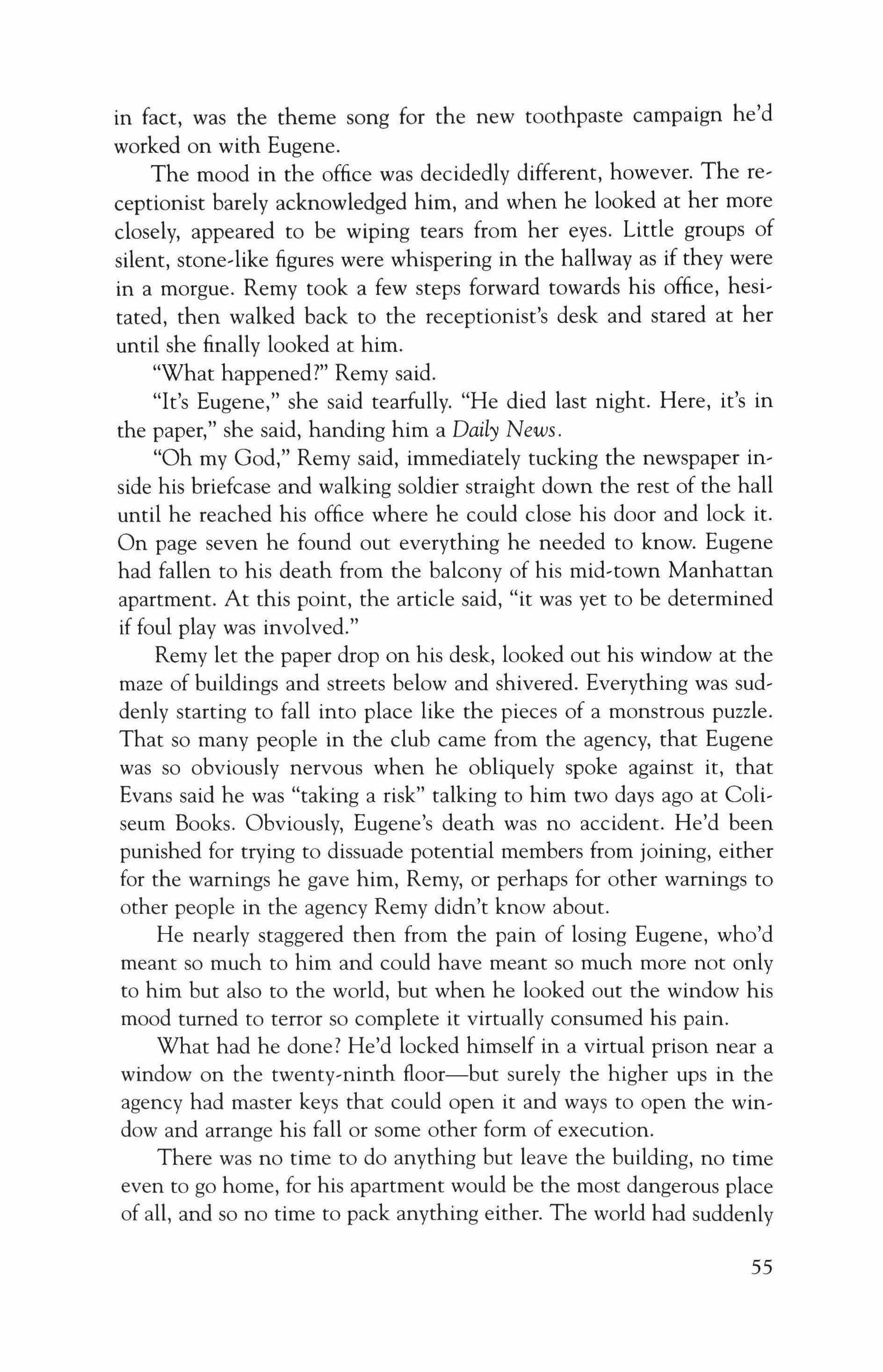
in fact, was the theme song for the new toothpaste campaign he'd worked on with Eugene.
The mood in the office was decidedly different, however. The receptionist barely acknowledged him, and when he looked at her more closely, appeared to be wiping tears from her eyes. Little groups of silent, stone-like figures were whispering in the hallway as if they were in a morgue. Remy took a few steps forward towards his office, hesitated, then walked back to the receptionist's desk and stared at her until she finally looked at him.
"What happened?" Remy said.
"It's Eugene," she said tearfully. "He died last night. Here, it's in the paper," she said, handing him a Daily News.
"Oh my God," Remy said, immediately tucking the newspaper inside his briefcase and walking soldier straight down the rest of the hall until he reached his office where he could close his door and lock it. On page seven he found out everything he needed to know. Eugene had fallen to his death from the balcony of his mid-town Manhattan apartment. At this point, the article said, "it was yet to be determined if foul play was involved."
Remy let the paper drop on his desk, looked out his window at the maze of buildings and streets below and shivered. Everything was suddenly starting to fall into place like the pieces of a monstrous puzzle. That so many people in the club came from the agency, that Eugene was so obviously nervous when he obliquely spoke against it, that Evans said he was "taking a risk" talking to him two days ago at Coliseum Books. Obviously, Eugene's death was no accident. He'd been punished for trying to dissuade potential members from joining, either for the warnings he gave him, Remy, or perhaps for other warnings to other people in the agency Remy didn't know about.
He nearly staggered then from the pain of losing Eugene, who'd meant so much to him and could have meant so much more not only to him but also to the world, but when he looked out the window his mood turned to terror so complete it virtually consumed his pain.
What had he done? He'd locked himself in a virtual prison near a window on the twenty-ninth floor-but surely the higher ups in the agency had master keys that could open it and ways to open the window and arrange his fall or some other form of execution.
There was no time to do anything but leave the building, no time even to go home, for his apartment would be the most dangerous place of all, and so no time to pack anything either. The world had suddenly
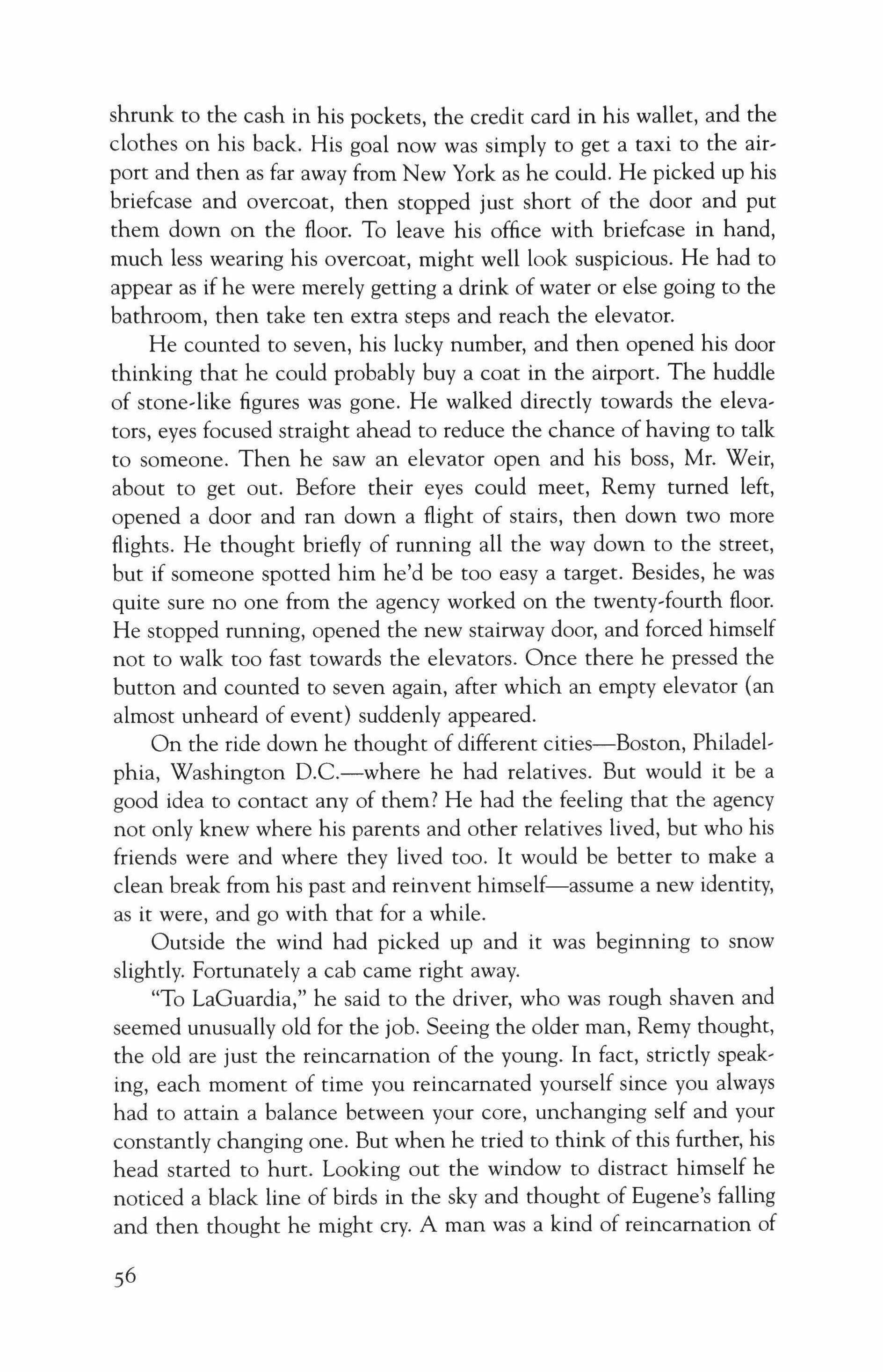
shrunk to the cash in his pockets, the credit card in his wallet, and the clothes on his back. His goal now was simply to get a taxi to the air, port and then as far away from New York as he could. He picked up his briefcase and overcoat, then stopped just short of the door and put them down on the floor. To leave his office with briefcase in hand, much less wearing his overcoat, might well look suspicious. He had to appear as if he were merely getting a drink of water or else going to the bathroom, then take ten extra steps and reach the elevator.
He counted to seven, his lucky number, and then opened his door thinking that he could probably buy a coat in the airport. The huddle of stone,like figures was gone. He walked directly towards the eleva, tors, eyes focused straight ahead to reduce the chance of having to talk to someone. Then he saw an elevator open and his boss, Mr. Weir, about to get out. Before their eyes could meet, Remy turned left, opened a door and ran down a flight of stairs, then down two more flights. He thought briefly of running all the way down to the street, but if someone spotted him he'd be too easy a target. Besides, he was quite sure no one from the agency worked on the twenty-fourth floor. He stopped running, opened the new stairway door, and forced himself not to walk too fast towards the elevators. Once there he pressed the button and counted to seven again, after which an empty elevator {an almost unheard of event} suddenly appeared.
On the ride down he thought of different cities-Boston, Philadelphia, Washington D.C.-where he had relatives. But would it be a good idea to contact any of them? He had the feeling that the agency not only knew where his parents and other relatives lived, but who his friends were and where they lived too. It would be better to make a clean break from his past and reinvent himself-assume a new identity, as it were, and go with that for a while.
Outside the wind had picked up and it was beginning to snow slightly. Fortunately a cab came right away.
"To LaGuardia," he said to the driver, who was rough shaven and seemed unusually old for the job. Seeing the older man, Remy thought, the old are just the reincarnation of the young. In fact, strictly speak, ing, each moment of time you reincarnated yourself since you always had to attain a balance between your core, unchanging self and your constantly changing one. But when he tried to think of this further, his head started to hurt. Looking out the window to distract himself he noticed a black line of birds in the sky and thought of Eugene's falling and then thought he might cry. A man was a kind of reincarnation of
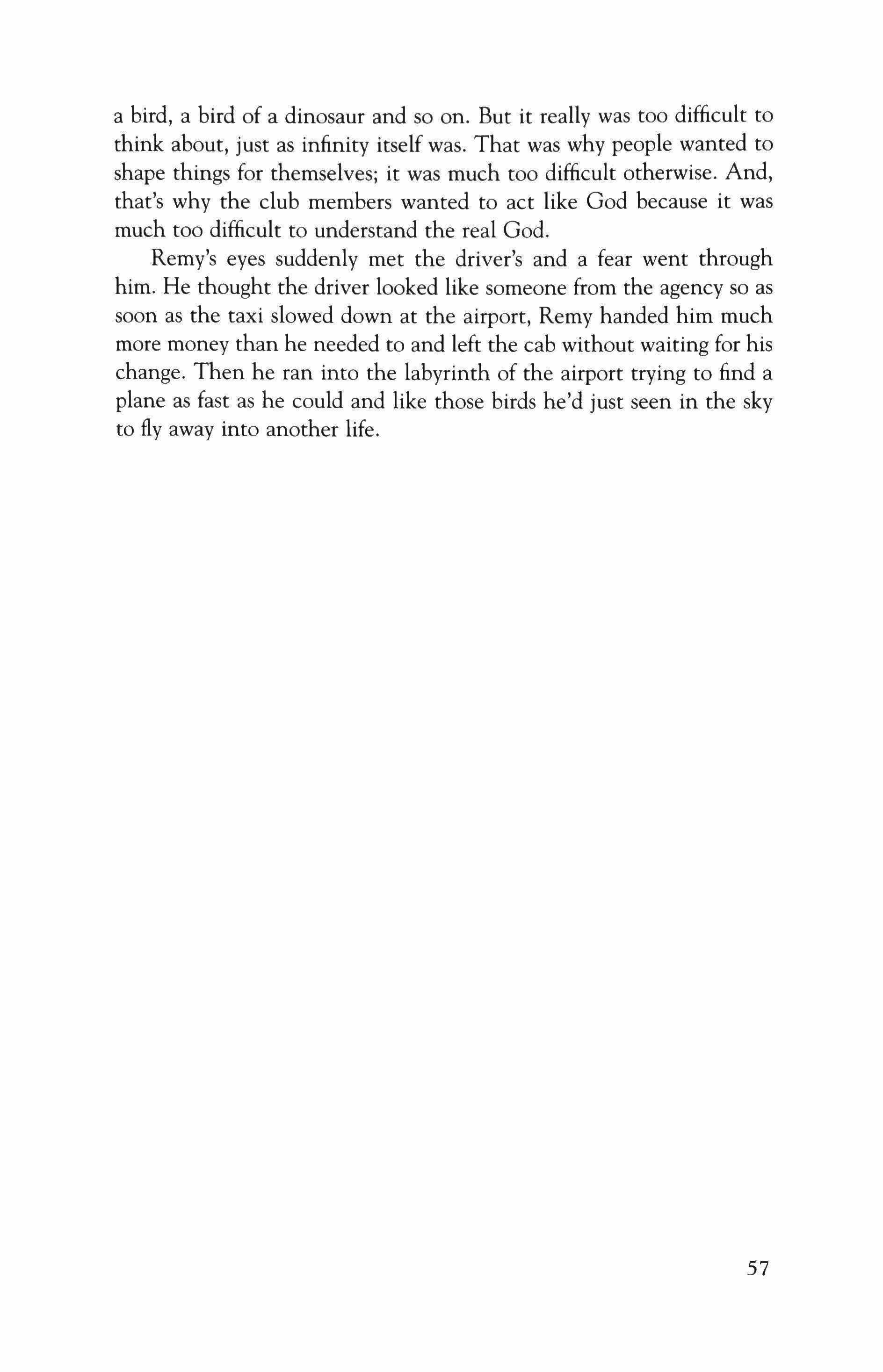
a bird, a bird of a dinosaur and so on. But it really was too difficult to think about, just as infinity itself was. That was why people wanted to shape things for themselves; it was much too difficult otherwise. And, that's why the club members wanted to act like God because it was much too difficult to understand the real God.
Remy's eyes suddenly met the driver's and a fear went through him. He thought the driver looked like someone from the agency so as soon as the taxi slowed down at the airport, Remy handed him much more money than he needed to and left the cab without waiting for his change. Then he ran into the labyrinth of the airport trying to find a plane as fast as he could and like those birds he'd just seen in the sky to flyaway into another life.

INTIMATE VIEW: 9:30 A.M.
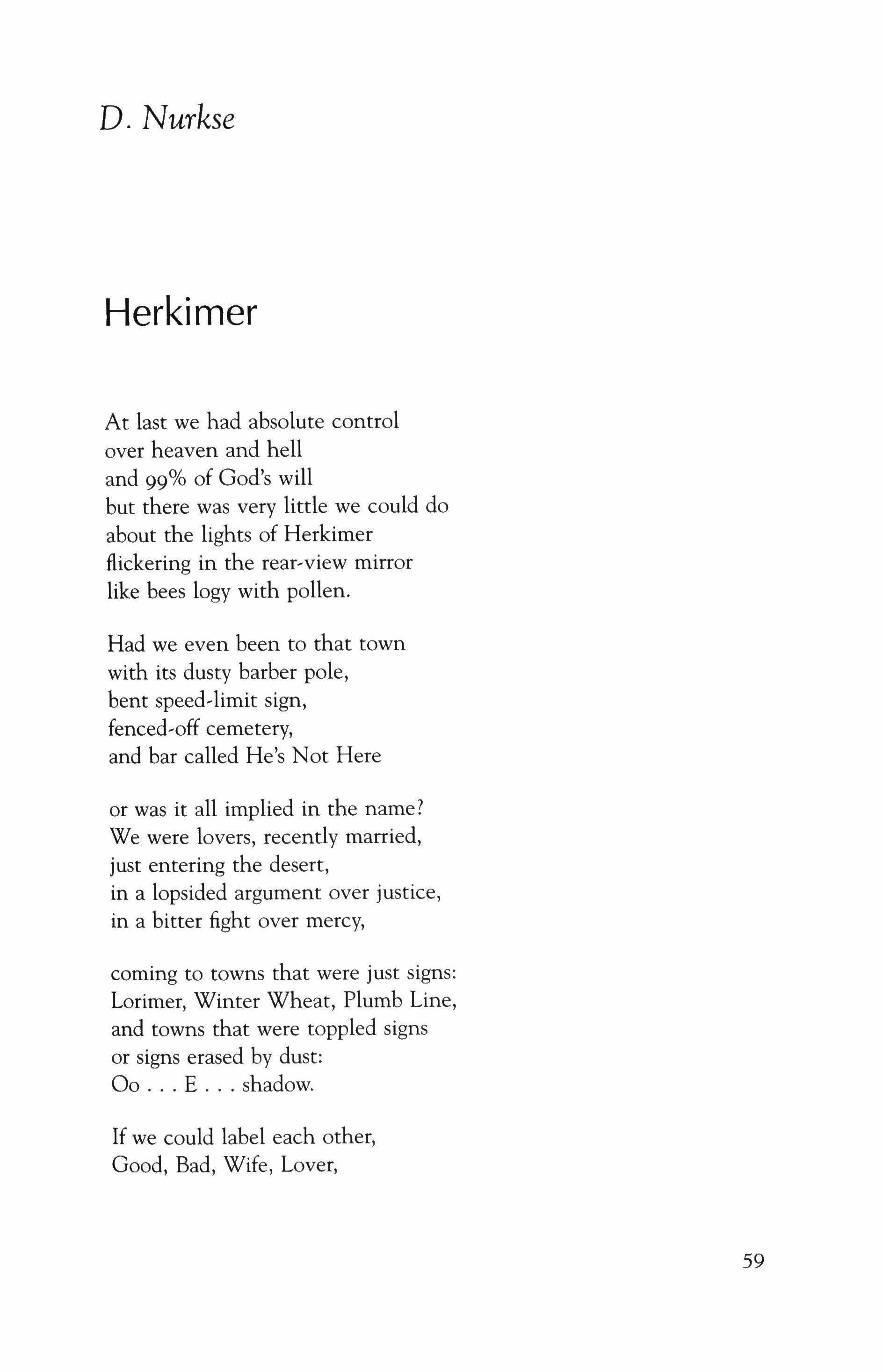
At last we had absolute control over heaven and hell and 99% of God's will but there was very little we could do about the lights of Herkimer flickering in the rear-view mirror like bees logy with pollen.
Had we even been to that town with its dusty barber pole, bent speed-limit sign, fenced-off cemetery, and bar called He's Not Here
or was it all implied in the name? We were lovers, recently married, just entering the desert, in a lopsided argument over justice, in a bitter fight over mercy,
coming to towns that were just signs: Lorimer, Winter Wheat, Plumb Line, and towns that were toppled signs or signs erased by dust: 00 E shadow.
If we could label each other, Good, Bad, Wife, Lover,
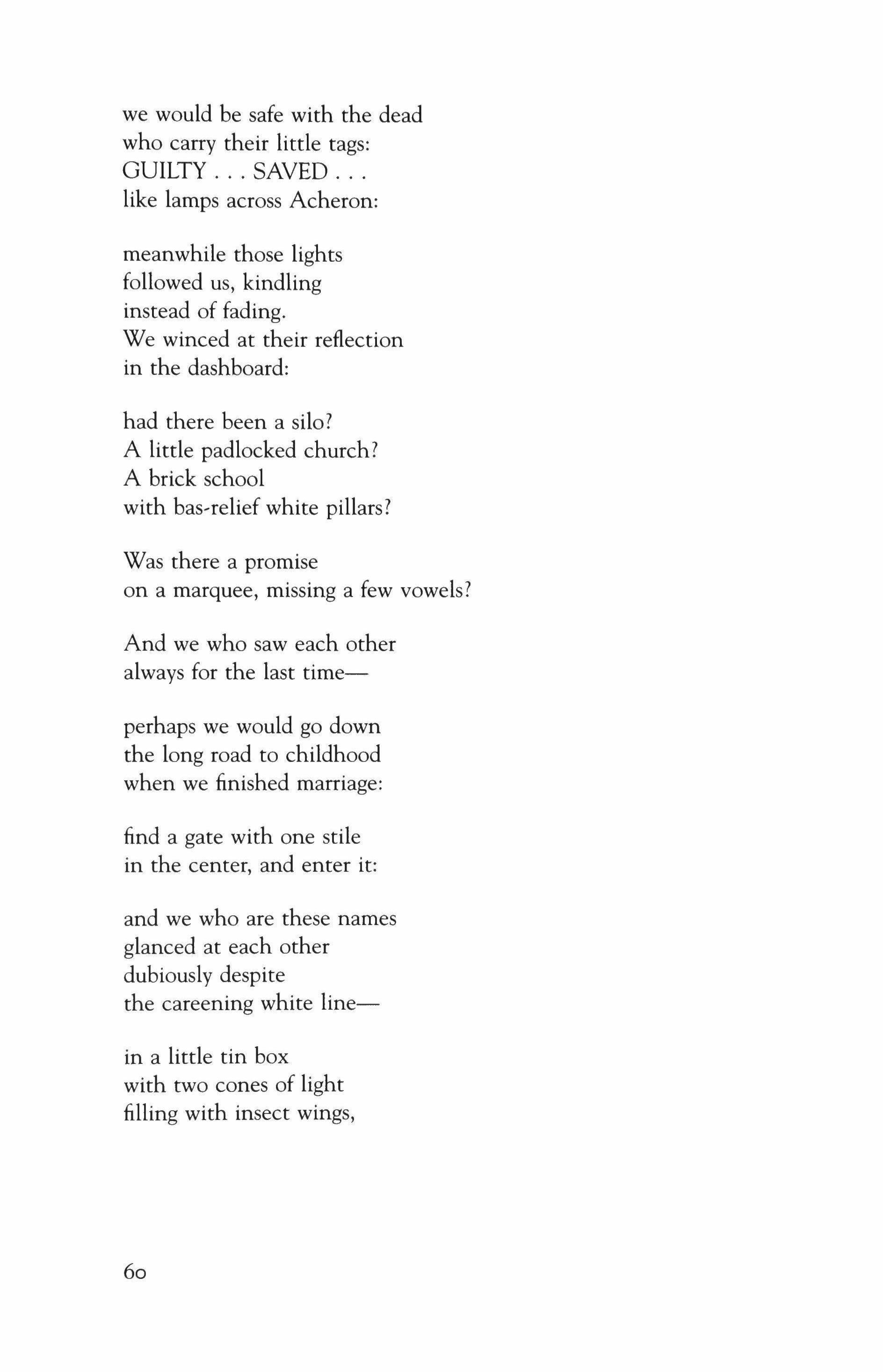
we would be safe with the dead who carry their little tags: GUILTY SAVED like lamps across Acheron: meanwhile those lights followed us, kindling instead of fading. We winced at their reflection in the dashboard: had there been a silo? A little padlocked church? A brick school with bas-relief white pillars?
Was there a promise on a marquee, missing a few vowels?
And we who saw each other always for the last time-
perhaps we would go down the long road to childhood when we finished marriage: find a gate with one stile in the center, and enter it: and we who are these names glanced at each other dubiously despite the careening white linein a little tin box with two cones of light filling with insect wings,
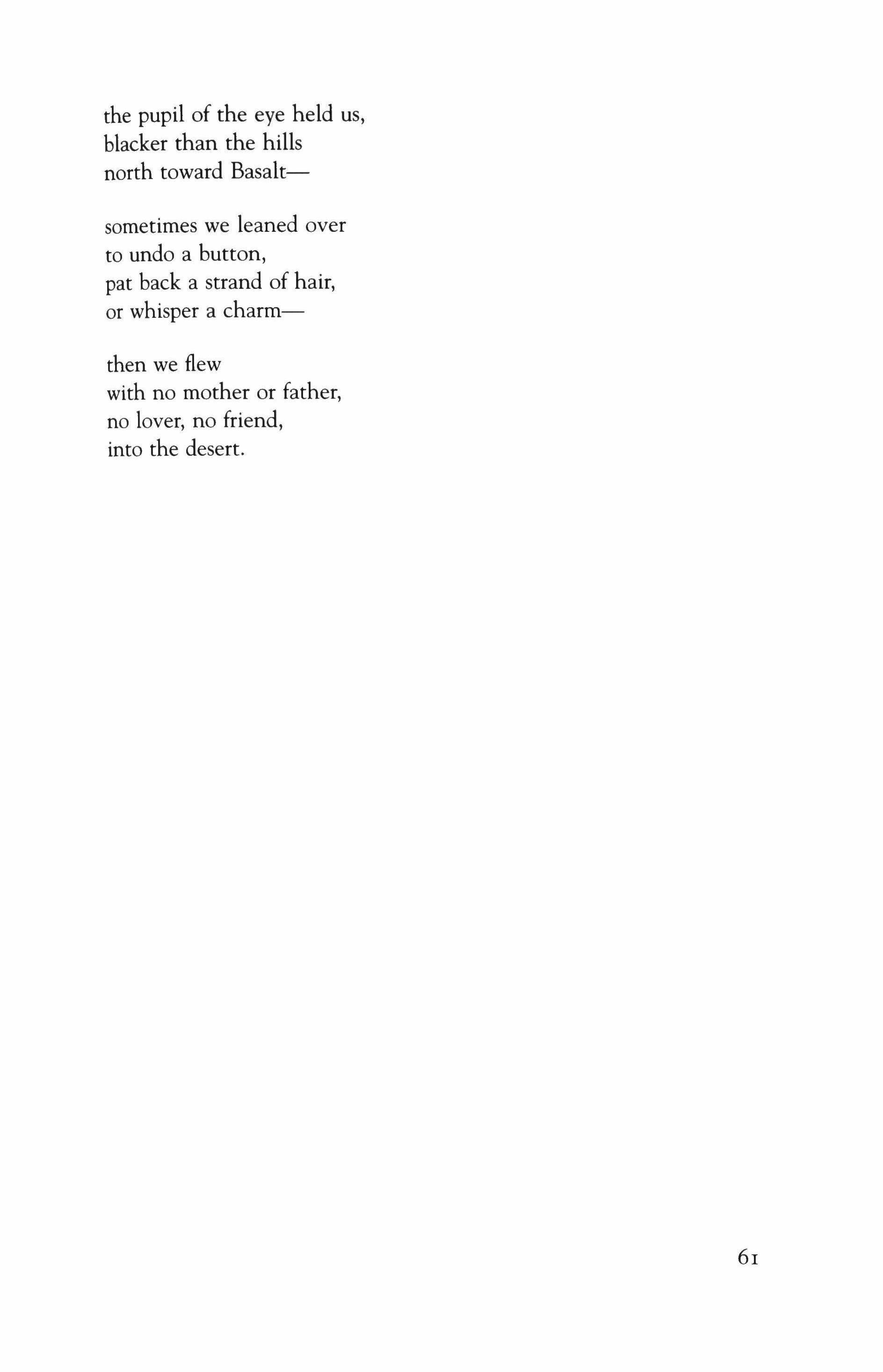
the pupil of the eye held us, blacker than the hills north toward Basalt-
sometimes we leaned over to undo a button, pat back a strand of hair, or whisper a charm-
then we flew with no mother or father, no lover, no friend, into the desert.

How the dog loved to chase his ball even in the rose bushes where thorns tore his coat.
How there was another life.
That long summer a bee circled our house diligently, like a toy airplane. It happened that the child unhooked her swing and carried it away in the crook of her arm.
Happiness undid us.
We wanted to live on a street exactly like this but seen from a distancethe Frisbee in midair by day, by night the books massed in their fiery window.
Our gravel driveway seemed to repel us, pushing us gently up.
Once the dog found a dead sparrow and pawed it gently, puzzled for a second, then certain when he rolled the torso over and saw a cloud of tiny wings.
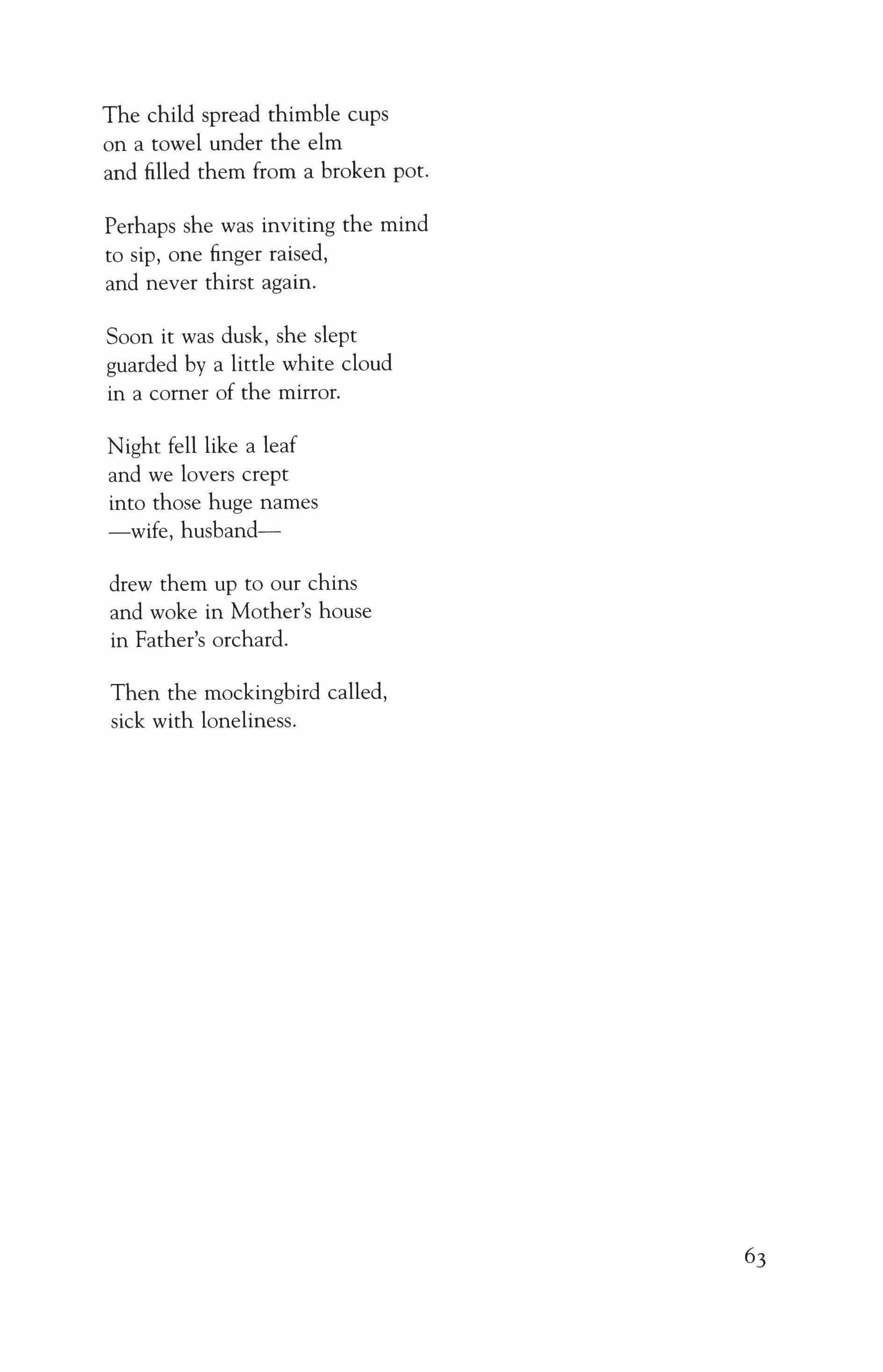
The child spread thimble cups on a towel under the elm and filled them from a broken pot.
Perhaps she was inviting the mind to sip, one finger raised, and never thirst again.
Soon it was dusk, she slept guarded by a little white cloud in a comer of the mirror.
Night fell like a leaf and we lovers crept into those huge names -wife, husbanddrew them up to our chins and woke in Mother's house in Father's orchard.
Then the mockingbird called, sick with loneliness.
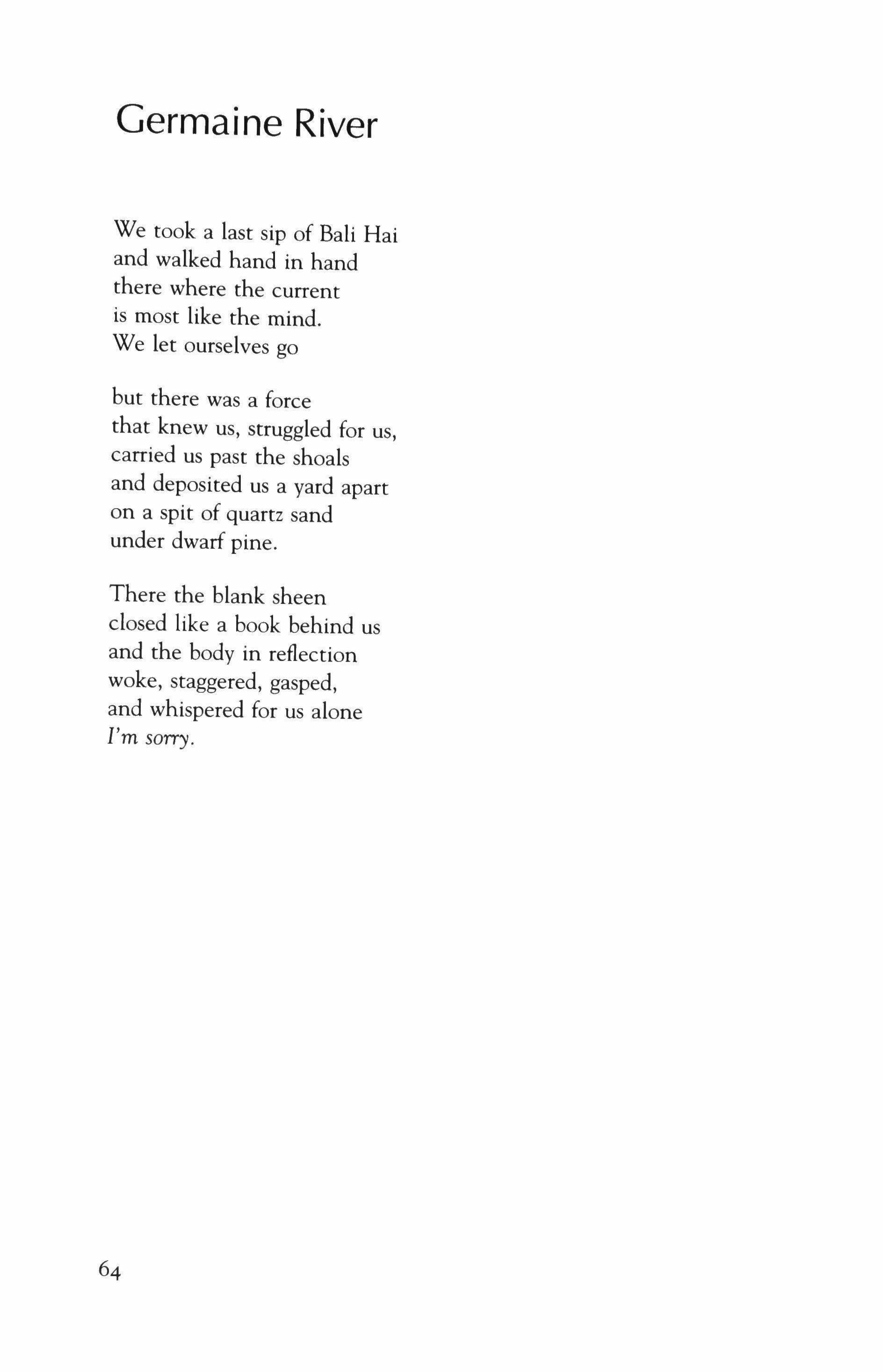
We took a last sip of Bali Hai and walked hand in hand there where the current is most like the mind. We let ourselves go but there was a force that knew us, struggled for us, carried us past the shoals and deposited us a yard apart on a spit of quartz sand under dwarf pine. There the blank sheen closed like a book behind us and the body in reflection woke, staggered, gasped, and whispered for us alone I'm sorry.
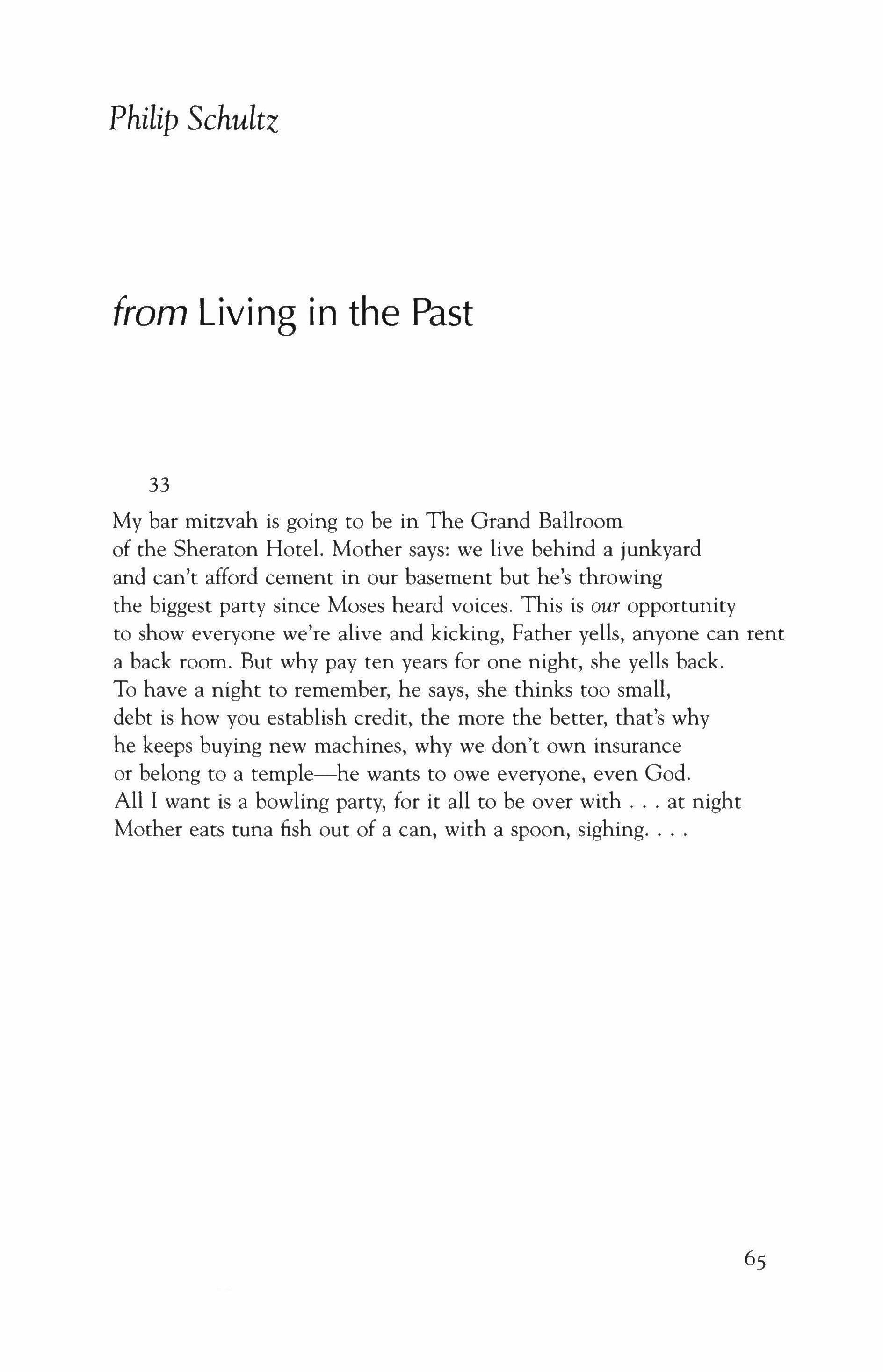
My bar mitzvah is going to be in The Grand Ballroom of the Sheraton Hotel. Mother says: we live behind a junkyard and can't afford cement in our basement but he's throwing the biggest party since Moses heard voices. This is our opportunity to show everyone we're alive and kicking, Father yells, anyone can rent a back room. But why pay ten years for one night, she yells back. To have a night to remember, he says, she thinks too small, debt is how you establish credit, the more the better, that's why he keeps buying new machines, why we don't own insurance or belong to a temple-he wants to owe everyone, even God. All I want is a bowling party, for it all to be over with at night Mother eats tuna fish out of a can, with a spoon, sighing
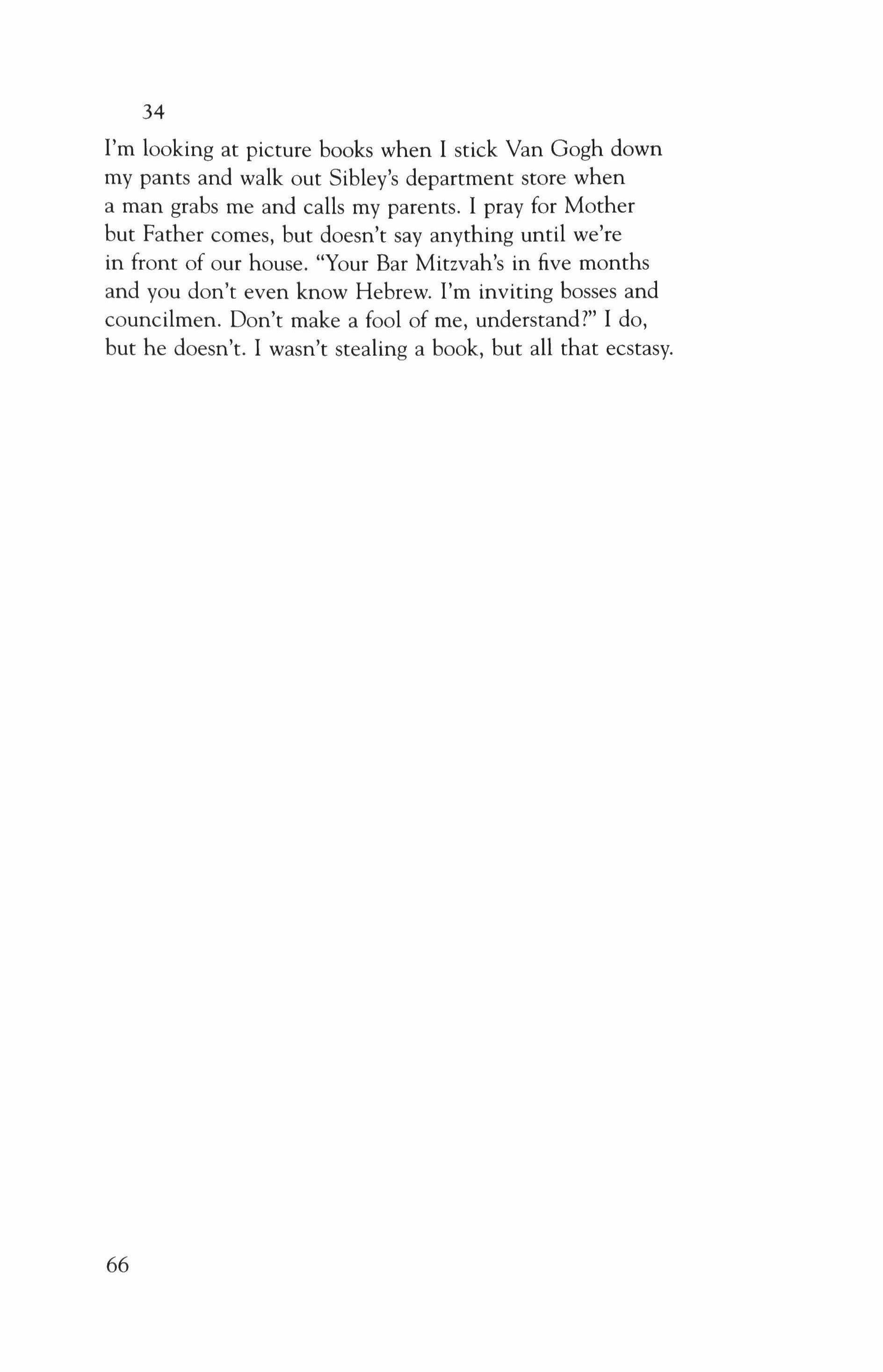
I'm looking at picture books when I stick Van Gogh down my pants and walk out Sibley's department store when a man grabs me and calls my parents. I pray for Mother but Father comes, but doesn't say anything until we're in front of our house. "Your Bar Mitzvah's in five months and you don't even know Hebrew. I'm inviting bosses and councilmen. Don't make a fool of me, understand?" I do, but he doesn't. I wasn't stealing a book, but all that ecstasy.
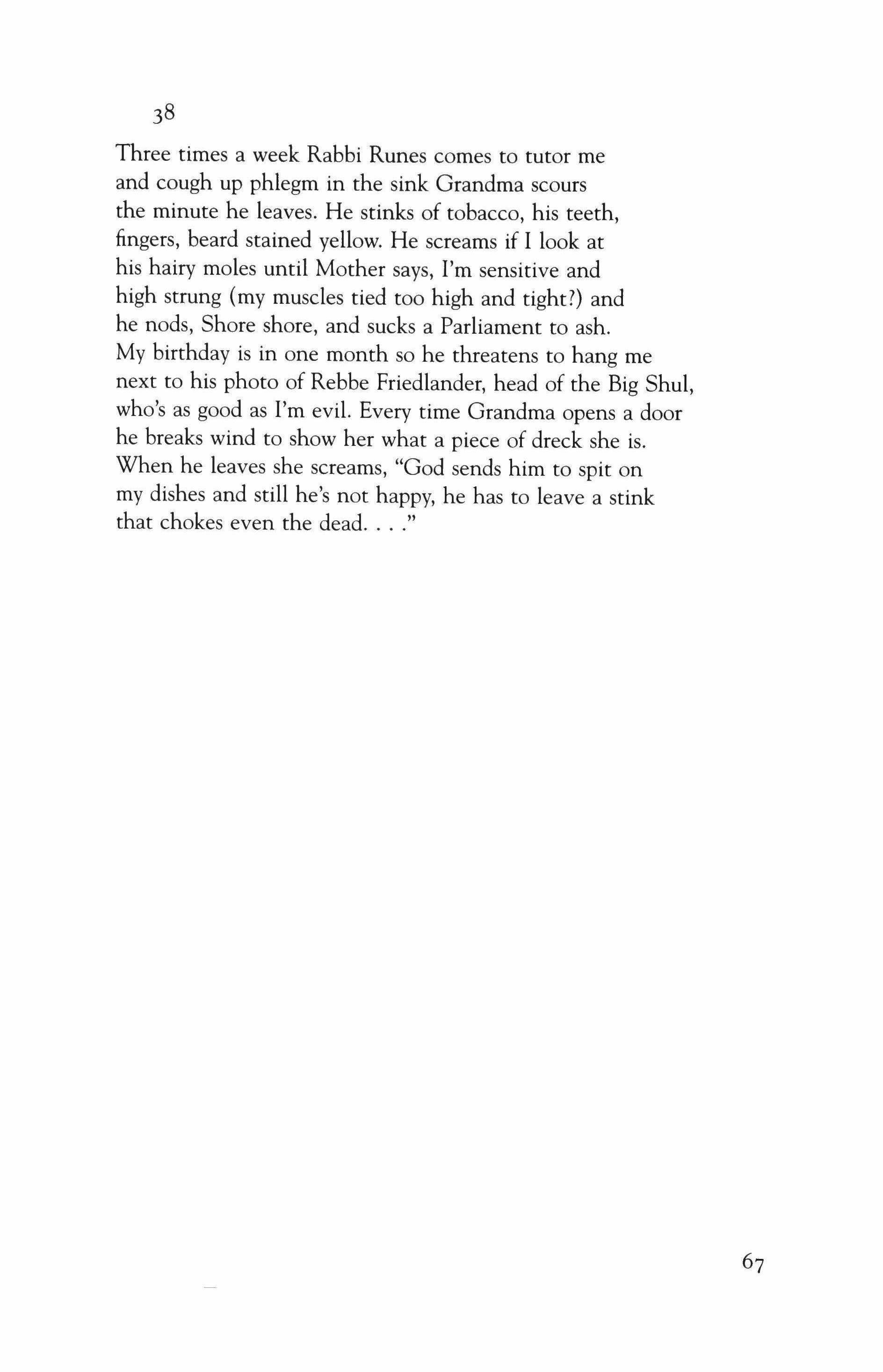
Three times a week Rabbi Runes comes to tutor me and cough up phlegm in the sink Grandma scours the minute he leaves. He stinks of tobacco, his teeth, fingers, beard stained yellow. He screams if I look at his hairy moles until Mother says, I'm sensitive and high strung {my muscles tied too high and tight?} and he nods, Shore shore, and sucks a Parliament to ash. My birthday is in one month so he threatens to hang me next to his photo of Rebbe Friedlander, head of the Big Shul, who's as good as I'm evil. Every time Grandma opens a door he breaks wind to show her what a piece of dreck she is. When he leaves she screams, "God sends him to spit on my dishes and still he's not happy, he has to leave a stink that chokes even the dead
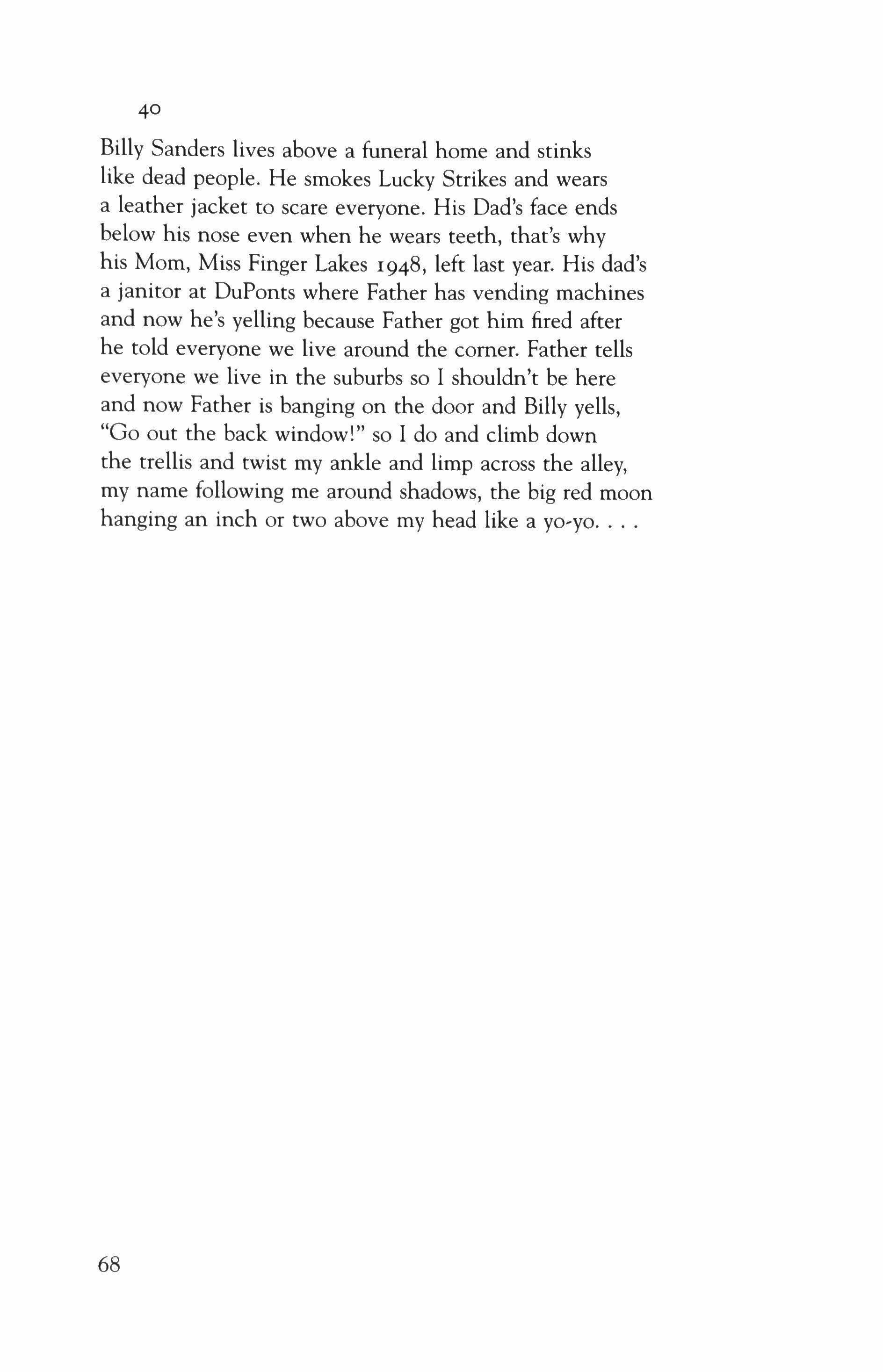
Billy Sanders lives above a funeral home and stinks like dead people. He smokes Lucky Strikes and wears a leather jacket to scare everyone. His Dad's face ends below his nose even when he wears teeth, that's why his Mom, Miss Finger Lakes 1948, left last year. His dad's a janitor at DuPonts where Father has vending machines and now he's yelling because Father got him fired after he told everyone we live around the comer. Father tells everyone we live in the suburbs so I shouldn't be here and now Father is banging on the door and Billy yells, "Go out the back window!" so I do and climb down the trellis and twist my ankle and limp across the alley, my name following me around shadows, the big red moon hanging an inch or two above my head like a yo-yo
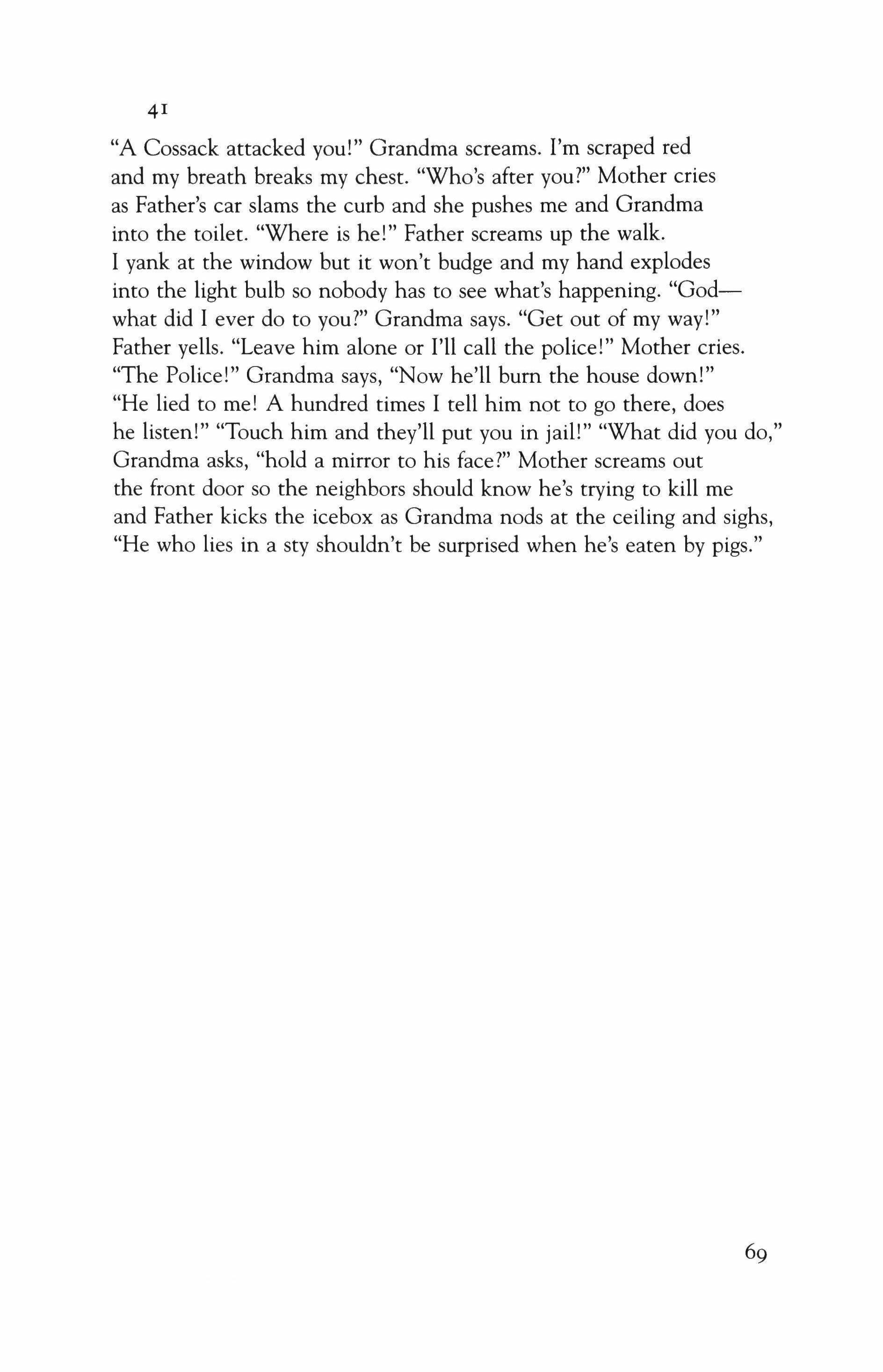
"A Cossack attacked you!" Grandma screams. I'm scraped red and my breath breaks my chest. "Who's after you?" Mother cries as Father's car slams the curb and she pushes me and Grandma into the toilet. "Where is he!" Father screams up the walk. I yank at the window but it won't budge and my hand explodes into the light bulb so nobody has to see what's happening. "Godwhat did I ever do to you?" Grandma says. "Get out of my way!" Father yells. "Leave him alone or I'll call the police!" Mother cries. "The Police!" Grandma says, "Now he'll bum the house down!"
"He lied to me! A hundred times I tell him not to go there, does he listen!" "Touch him and they'll put you in jail!" "What did you do," Grandma asks, "hold a mirror to his face?" Mother screams out the front door so the neighbors should know he's trying to kill me and Father kicks the icebox as Grandma nods at the ceiling and sighs, "He who lies in a sty shouldn't be surprised when he's eaten by pigs."
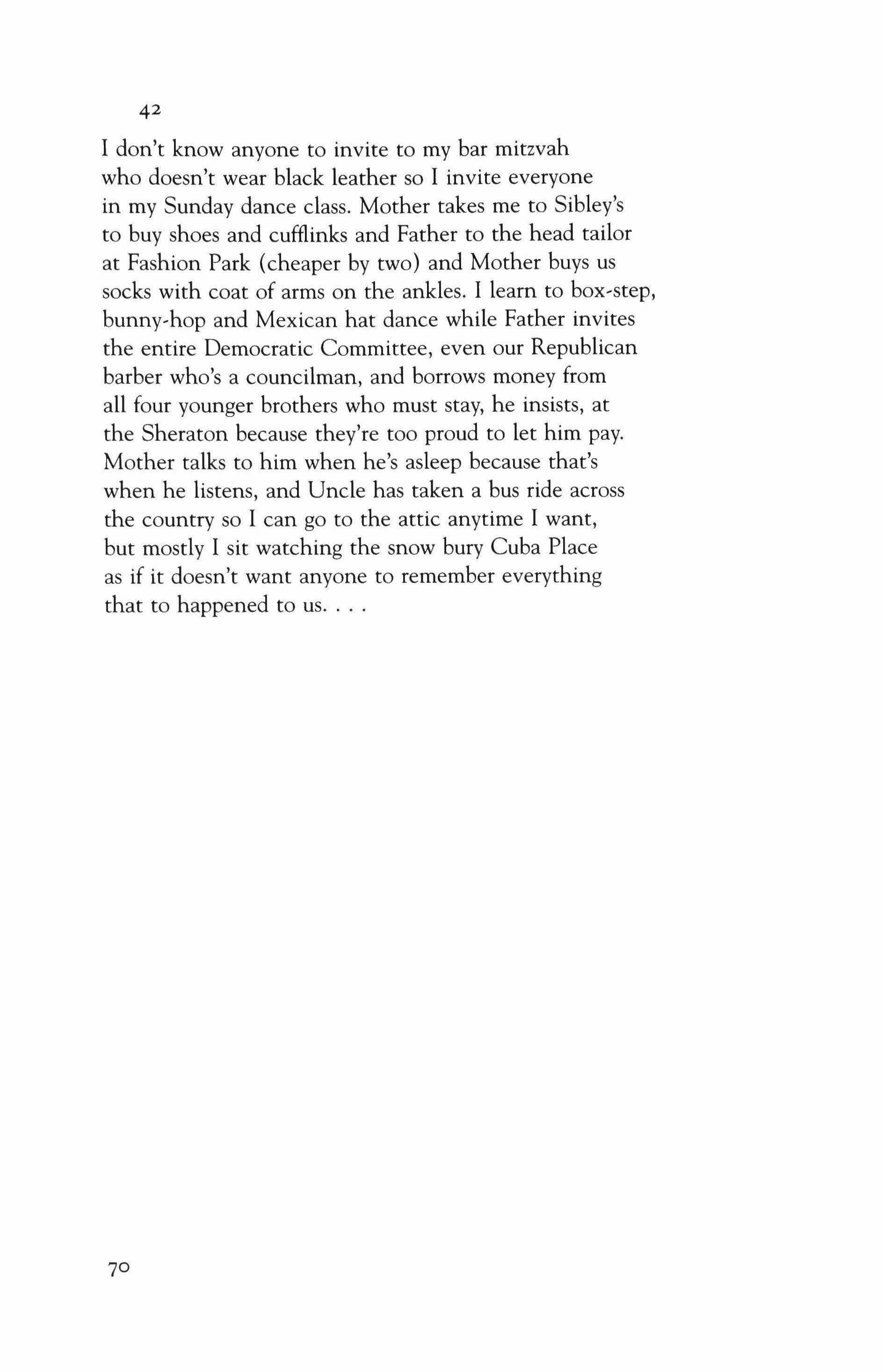
I don't know anyone to invite to my bar mitzvah who doesn't wear black leather so I invite everyone in my Sunday dance class. Mother takes me to Sibley's to buy shoes and cufflinks and Father to the head tailor at Fashion Park (cheaper by two) and Mother buys us socks with coat of arms on the ankles. I learn to box-step, bunny-hop and Mexican hat dance while Father invites the entire Democratic Committee, even our Republican barber who's a councilman, and borrows money from all four younger brothers who must stay, he insists, at the Sheraton because they're too proud to let him pay. Mother talks to him when he's asleep because that's when he listens, and Uncle has taken a bus ride across the country so I can go to the attic anytime I want, but mostly I sit watching the snow bury Cuba Place as if it doesn't want anyone to remember everything that to happened to us

My first morning as a man I practice with a razor, like learning the piano, Mother says, it needs practice. "Bubbe, did you brush your tooth this morning?" I ask, everything's too quiet-krrraccckkkkkk goes her rocker"Even dogs won't piss on your grave!" she yells. Mother comes in the kitchen wearing her new emerald gown and best fake pearls, her hair stiff and shiny, eyes and cheeks so polished and dusted I forget to be scared "Well, Bar Mitzvah boy, how do I look, okay?" Great, I say, putting on my suit and boiled-white shirt and blue silk tie and black buckle shoes that snap like crickets. Father comes out in pinstripes and a red polka dot tie, his big bottom lip thrust out. Help him knot his tie, says Mother, so he yanks at me, yells to stop moving, stands back to look in the mirror, where, his hand on my shoulder, he smiles at himself

We're all dressed but Grandma won't get in a car on Shabbos so the neighbors can enjoy seeing what lousy Jews we are. Father yells and Mother pleads but Grandma hugs her ratty sheared beaver. "Ma please, you want us to be late for his bar mitzvah!" "For Chrissakes!"
Father screams, "the only ones who care if you drive is us!" She stamps and Father pounds the hood as I go over and say, "Bubbe, it's Sunday, we go to the beach every Sunday." She shrugs as if she knew all the time and climbs inside and we go down Rauber Street up Hixon to Thomas and down Widman back around Hixon.
"Why don't we go straight there?" I ask. Mother sighs, "Because he has to surround everything."
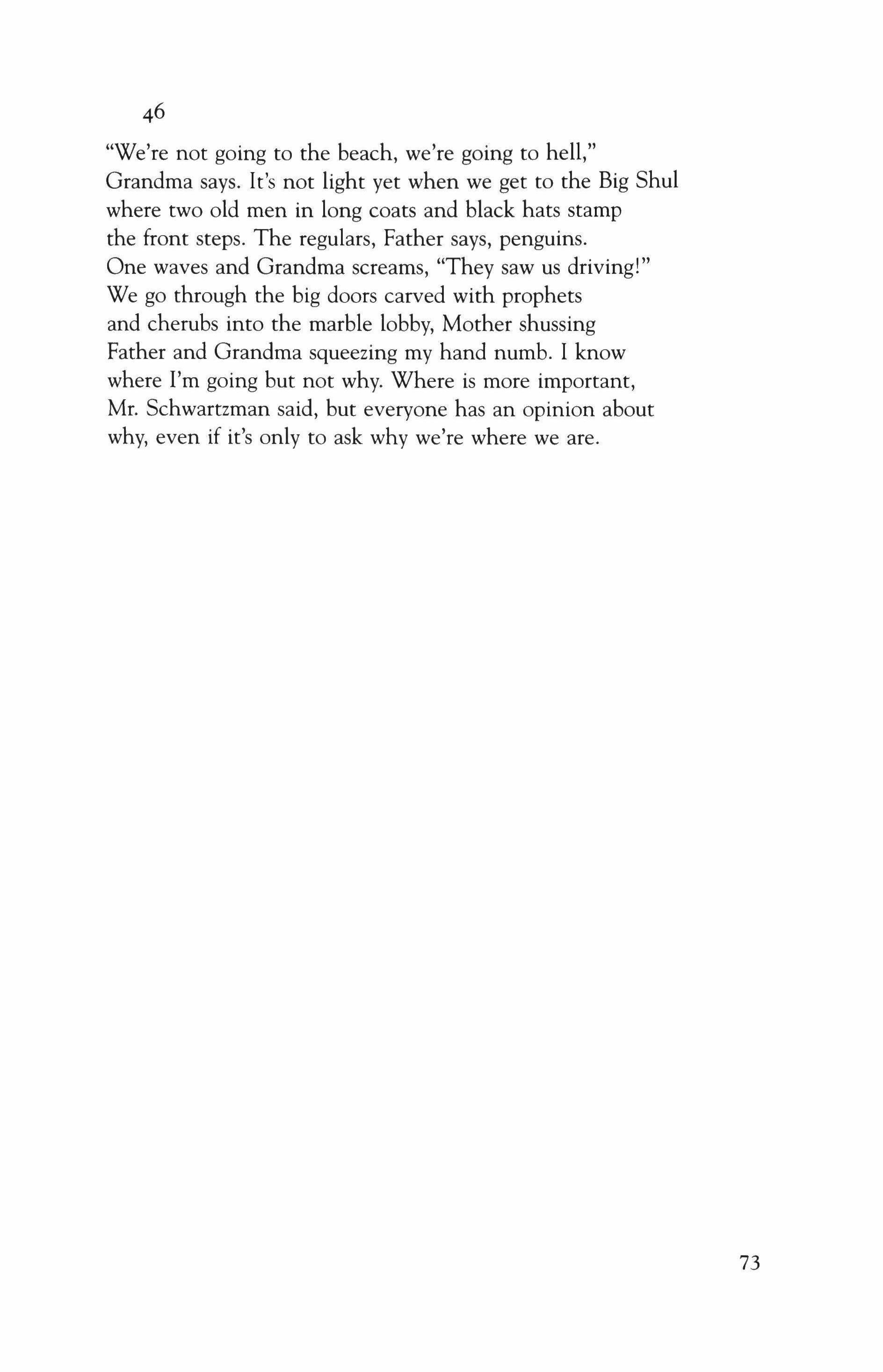
"We're not going to the beach, we're going to hell," Grandma says. It's not light yet when we get to the Big ShuI where two old men in long coats and black hats stamp the front steps. The regulars, Father says, penguins. One waves and Grandma screams, "They saw us driving!" We go through the big doors carved with prophets and cherubs into the marble lobby, Mother shussing Father and Grandma squeezing my hand numb. I know where I'm going but not why. Where is more important, Mr. Schwartzman said, but everyone has an opinion about why, even if it's only to ask why we're where we are.
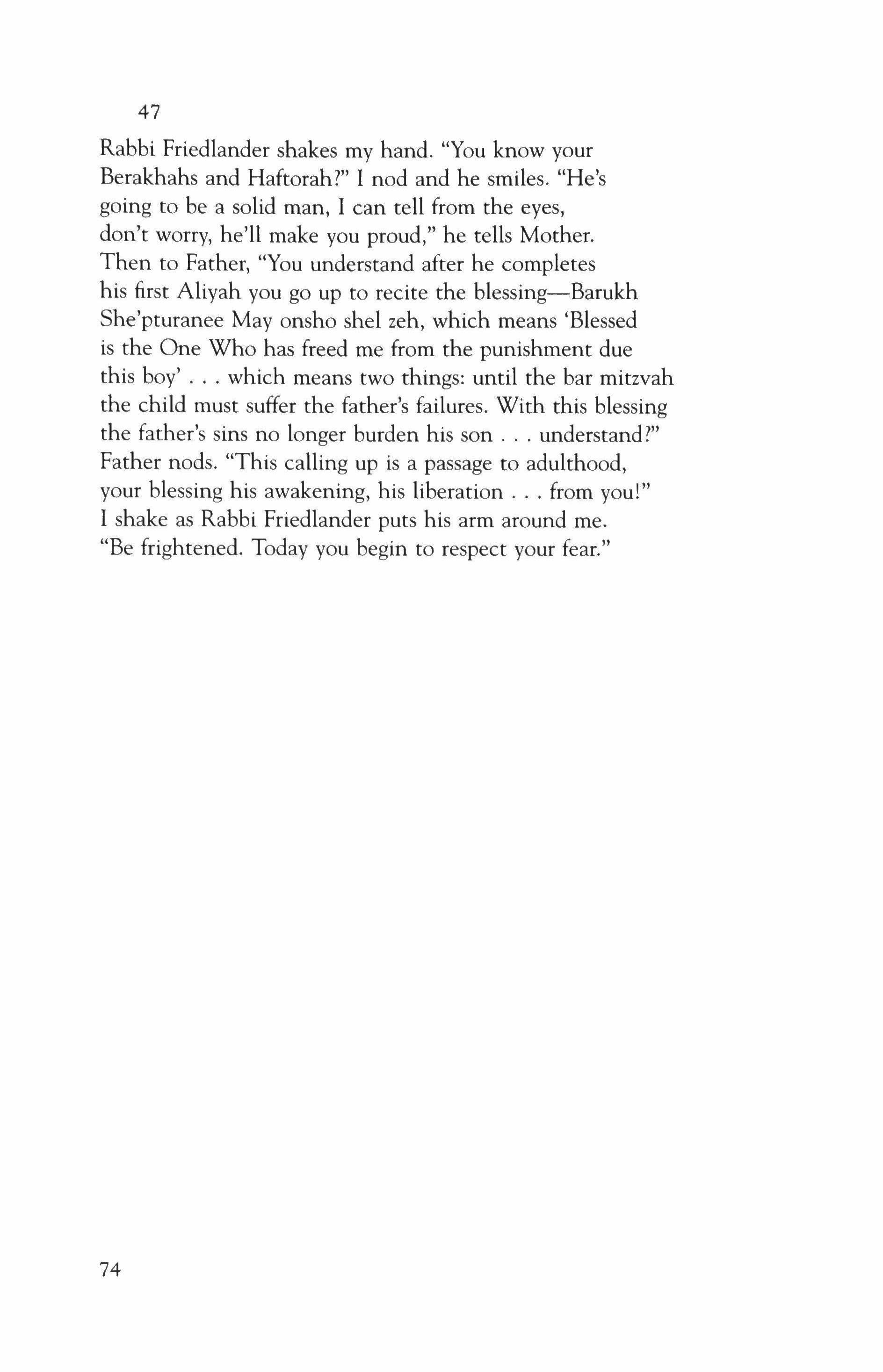
Rabbi Friedlander shakes my hand. "You know your Berakhahs and Haftorah?" I nod and he smiles. "He's going to be a solid man, I can tell from the eyes, don't worry, he'll make you proud," he tells Mother. Then to Father, "You understand after he completes his first Aliyah you go up to recite the blessing-Barukh She'pturanee May onsho shel zeh, which means 'Blessed is the One Who has freed me from the punishment due this boy' which means two things: until the bar mitzvah the child must suffer the father's failures. With this blessing the father's sins no longer burden his son understand?"
Father nods. "This calling up is a passage to adulthood, your blessing his awakening, his liberation from you!" I shake as Rabbi Friedlander puts his arm around me. "Be frightened. Today you begin to respect your fear."
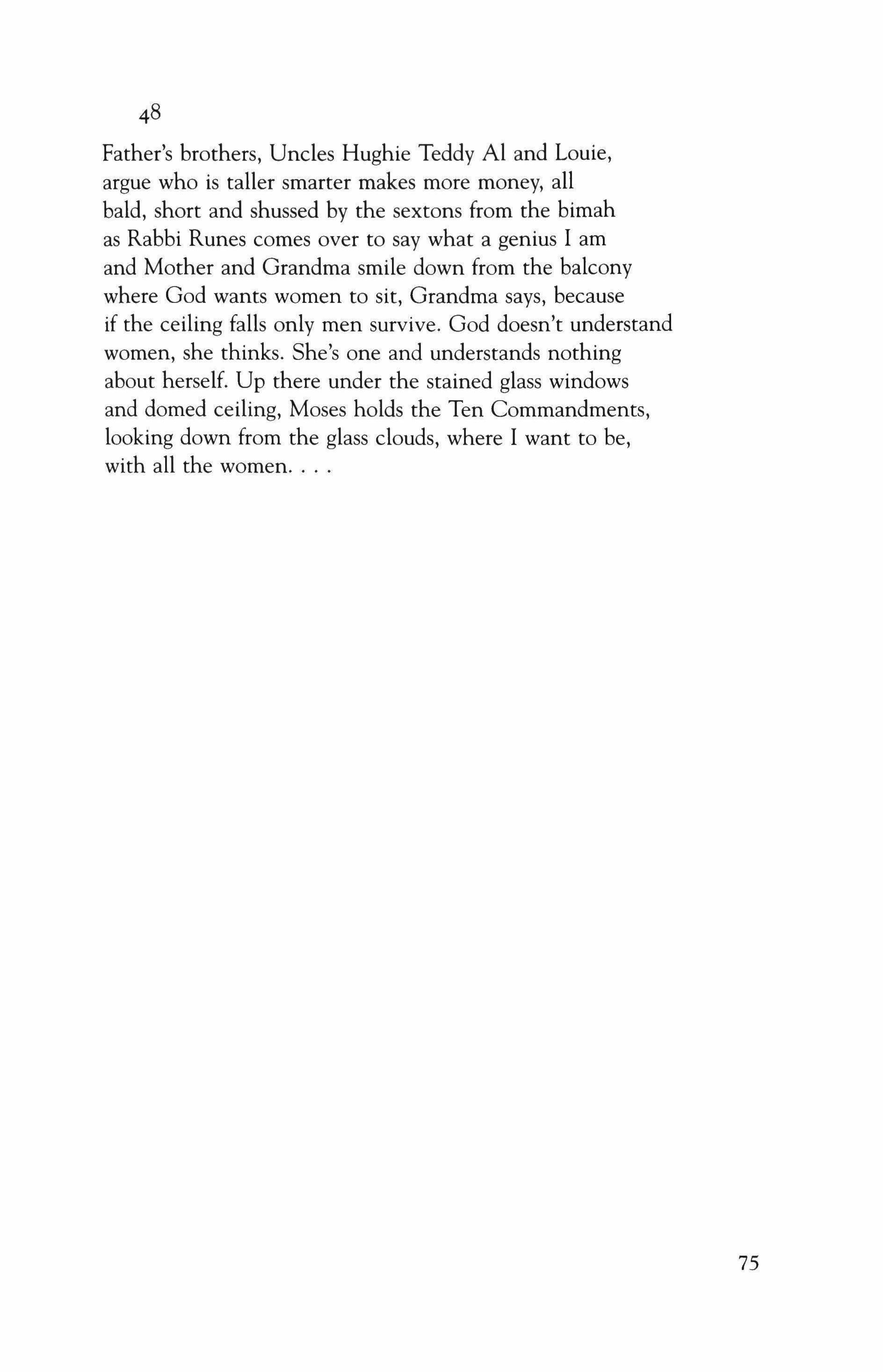
Father's brothers, Uncles Hughie Teddy Al and Louie, argue who is taller smarter makes more money, all bald, short and shussed by the sextons from the bimah as Rabbi Runes comes over to say what a genius I am and Mother and Grandma smile down from the balcony where God wants women to sit, Grandma says, because if the ceiling falls only men survive. God doesn't understand women, she thinks. She's one and understands nothing about herself. Up there under the stained glass windows and domed ceiling, Moses holds the Ten Commandments, looking down from the glass clouds, where I want to be, with all the women
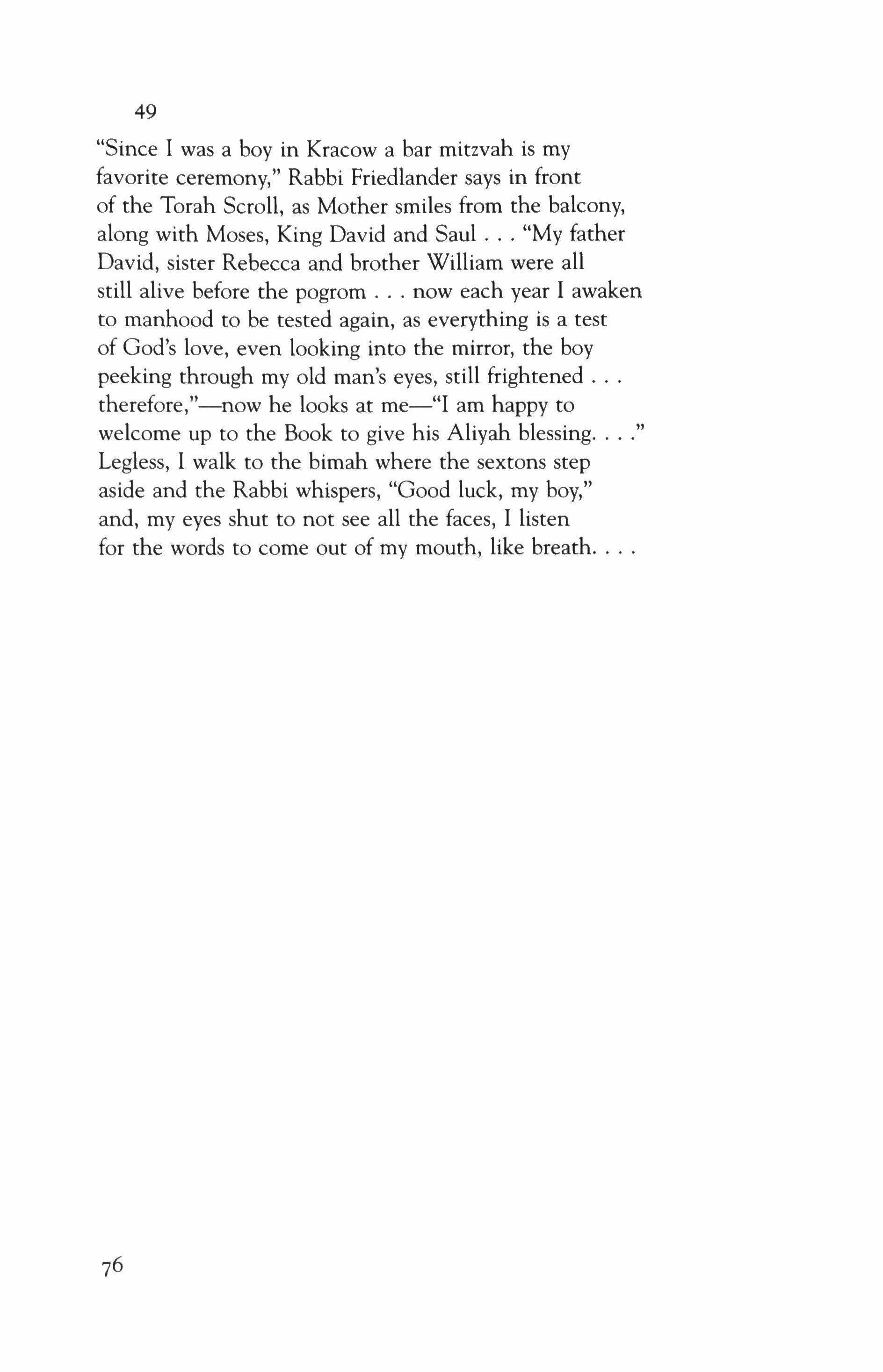
"Since I was a boy in Kracow a bar mitzvah is my favorite ceremony," Rabbi Friedlander says in front of the Torah Scroll, as Mother smiles from the balcony, along with Moses, King David and Saul "My father David, sister Rebecca and brother William were all still alive before the pogrom now each year I awaken to manhood to be tested again, as everything is a test of God's love, even looking into the mirror, the boy peeking through my old man's eyes, still frightened therefore,"-now he looks at me-"I am happy to welcome up to the Book to give his Aliyah blessing Legless, I walk to the bimah where the sextons step aside and the Rabbi whispers, "Good luck, my boy," and, my eyes shut to not see all the faces, I listen for the words to come out of my mouth, like breath
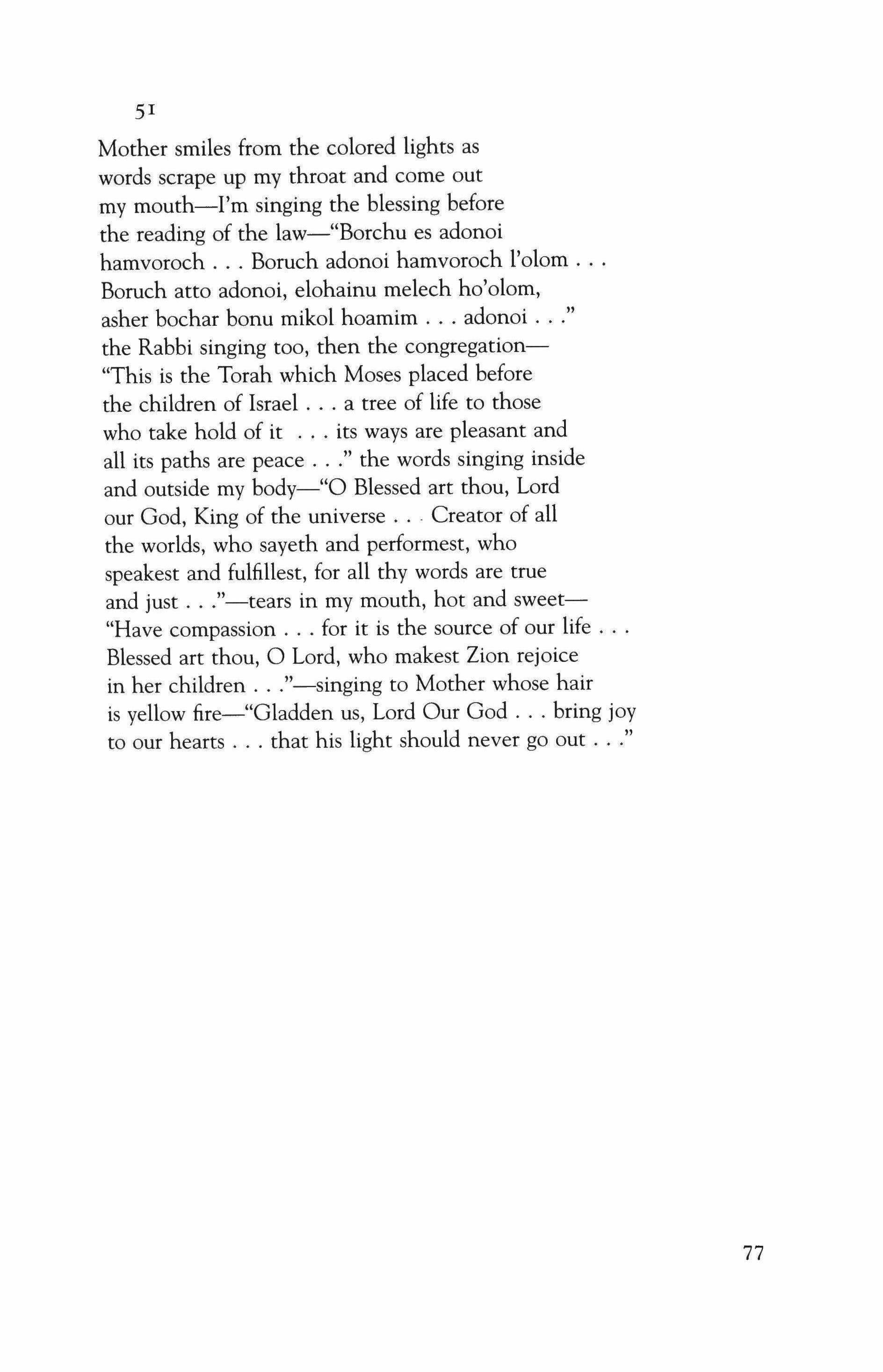
Mother smiles from the colored lights as words scrape up my throat and come out my mouth-I'm singing the blessing before the reading of the law-"Borchu es adonoi hamvoroch Boruch adonoi hamvoroch l'olom Boruch atto adonoi, elohainu melech ho'olom, asher bochar bonu mikol hoamim adonoi " the Rabbi singing too, then the congregation"This is the Torah which Moses placed before the children of Israel a tree of life to those who take hold of it its ways are pleasant and all its paths are peace " the words singing inside and outside my body-"O Blessed art thou, Lord our God, King of the universe Creator of all the worlds, who sayeth and performest, who speakest and fulfillest, for all thy words are true and just "-tears in my mouth, hot and sweet"Have compassion for it is the source of our life Blessed art thou, 0 Lord, who makest Zion rejoice in her children "-singing to Mother whose hair is yellow fire-"Gladden us, Lord Our God bring joy to our hearts that his light should never go out
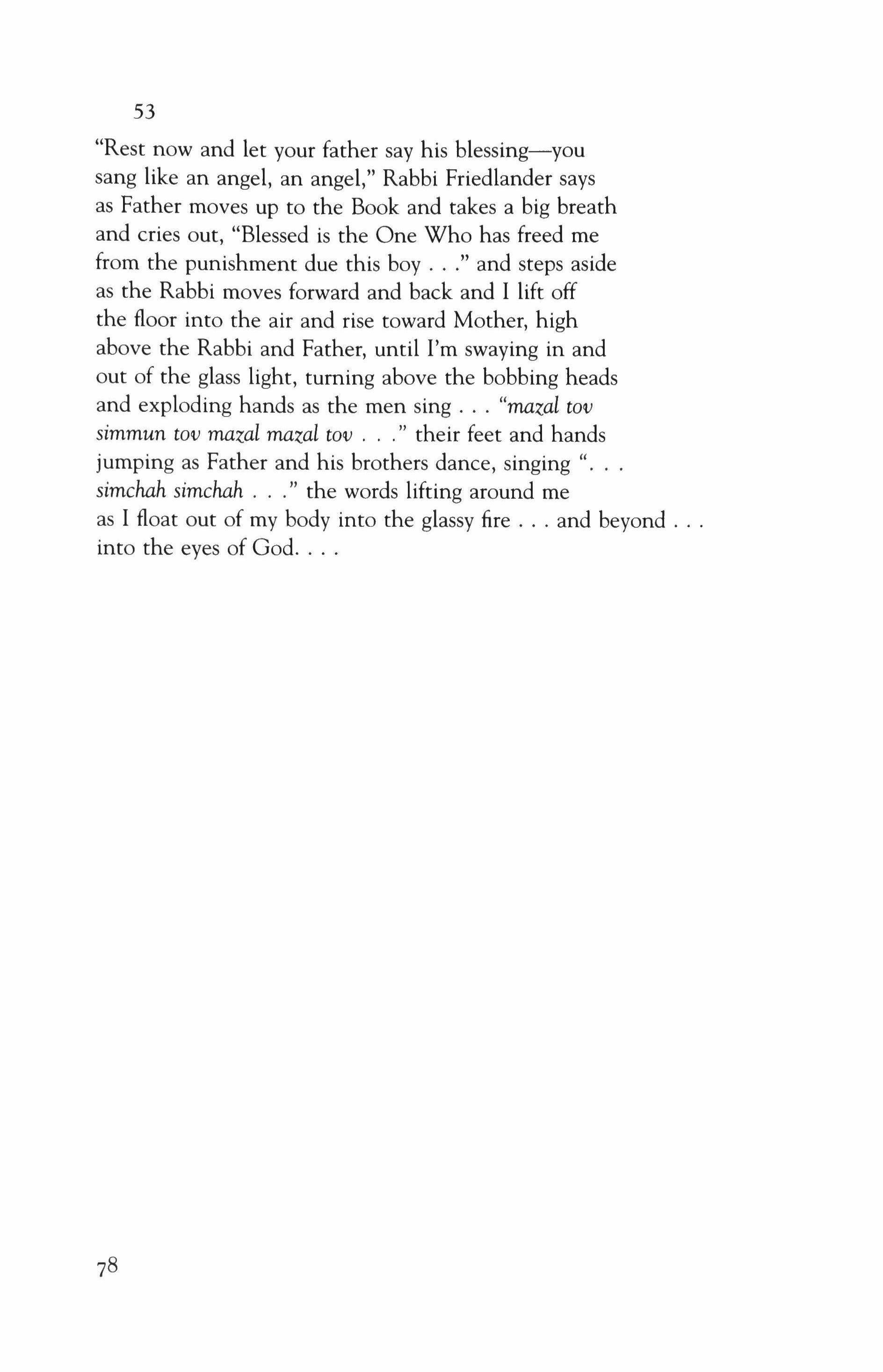
"Rest now and let your father say his blessing-you sang like an angel, an angel," Rabbi Friedlander says as Father moves up to the Book and takes a big breath and cries out, "Blessed is the One Who has freed me from the punishment due this boy and steps aside as the Rabbi moves forward and back and I lift off the floor into the air and rise toward Mother, high above the Rabbi and Father, until I'm swaying in and out of the glass light, turning above the bobbing heads and exploding hands as the men sing "mazal tov simmun tov mazal mazal tov ." their feet and hands jumping as Father and his brothers dance, singing" simchah simchah ." the words lifting around me as I float out of my body into the glassy fire and beyond into the eyes of God
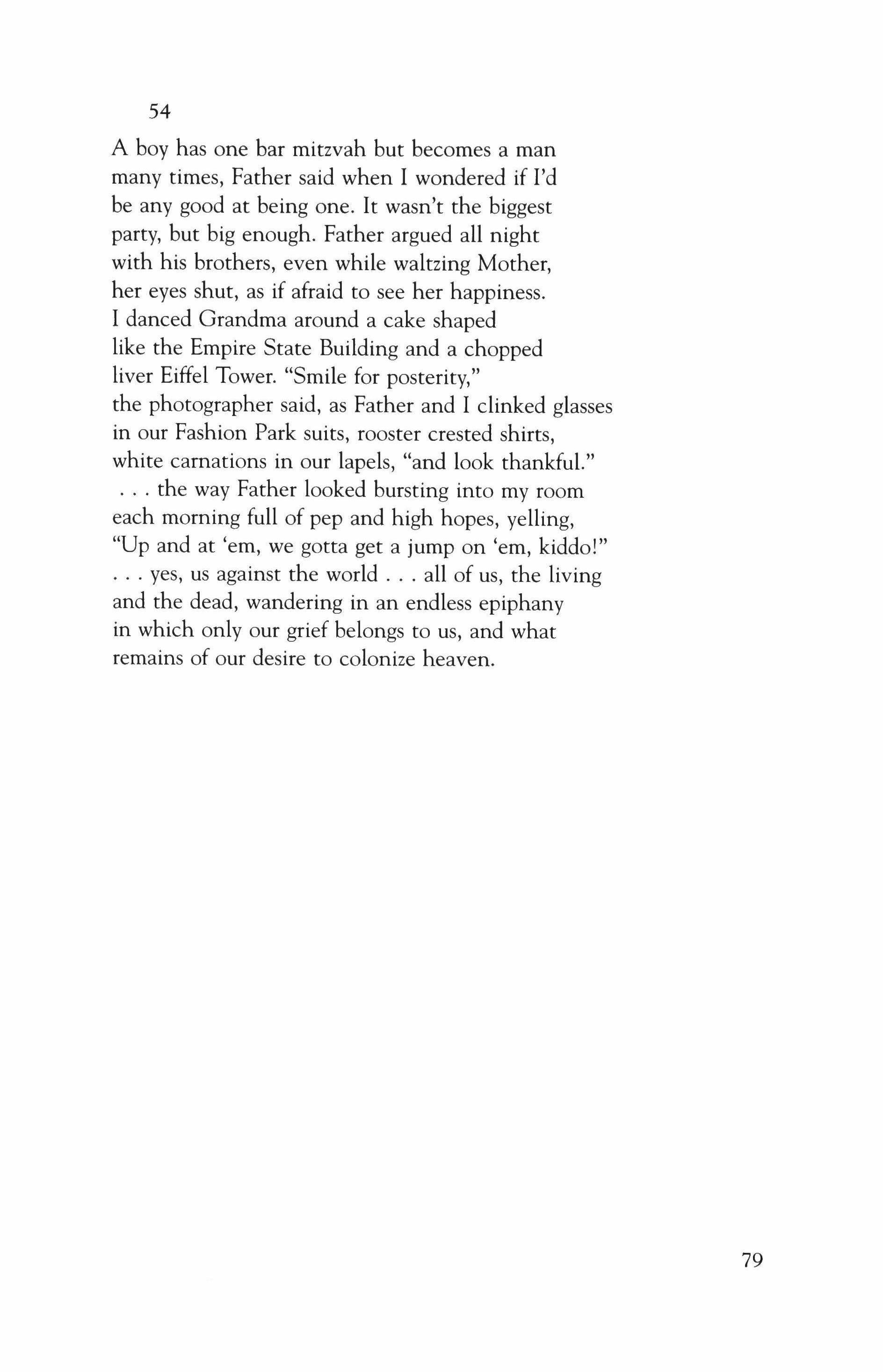
A boy has one bar mitzvah but becomes a man many times, Father said when I wondered if I'd be any good at being one. It wasn't the biggest party, but big enough. Father argued all night with his brothers, even while waltzing Mother, her eyes shut, as if afraid to see her happiness. I danced Grandma around a cake shaped like the Empire State Building and a chopped liver Eiffel Tower. "Smile for posterity," the photographer said, as Father and I clinked glasses in our Fashion Park suits, rooster crested shirts, white carnations in our lapels, "and look thankful." the way Father looked bursting into my room each morning full of pep and high hopes, yelling, "Up and at 'em, we gotta get a jump on 'em, kiddo!" yes, us against the world all of us, the living and the dead, wandering in an endless epiphany in which only our grief belongs to us, and what remains of our desire to colonize heaven.
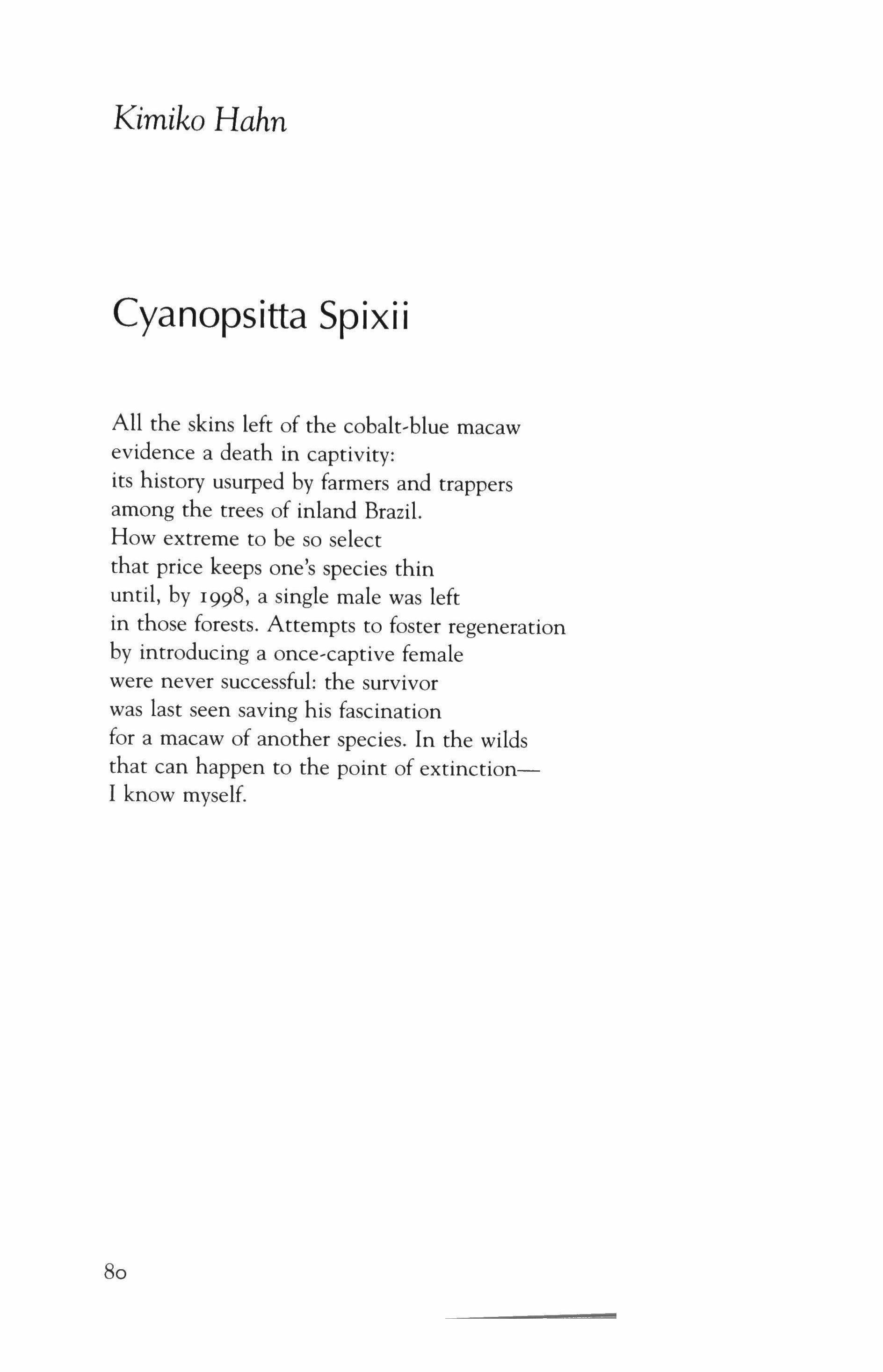
All the skins left of the cobalt-blue macaw evidence a death in captivity: its history usurped by farmers and trappers among the trees of inland Brazil. How extreme to be so select that price keeps one's species thin until, by 1998, a single male was left in those forests. Attempts to foster regeneration by introducing a once-captive female were never successful: the survivor was last seen saving his fascination for a macaw of another species. In the wilds that can happen to the point of extinctionI know myself.
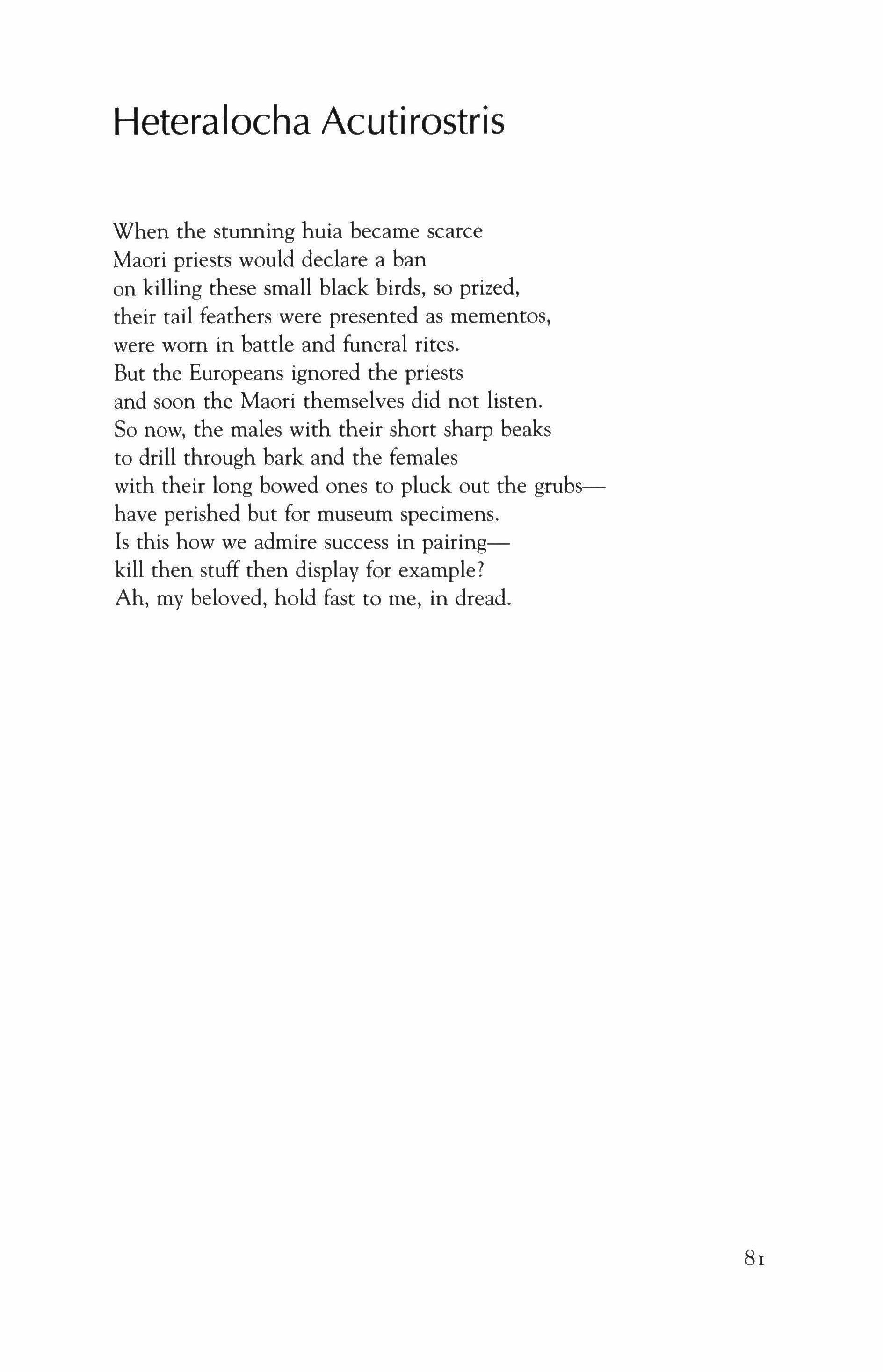
When the stunning huia became scarce Maori priests would declare a ban on killing these small black birds, so prized, their tail feathers were presented as mementos, were worn in battle and funeral rites.
But the Europeans ignored the priests and soon the Maori themselves did not listen. So now, the males with their short sharp beaks to drill through bark and the females with their long bowed ones to pluck out the grubshave perished but for museum specimens. Is this how we admire success in pairingkill then stuff then display for example?
Ah, my beloved, hold fast to me, in dread.
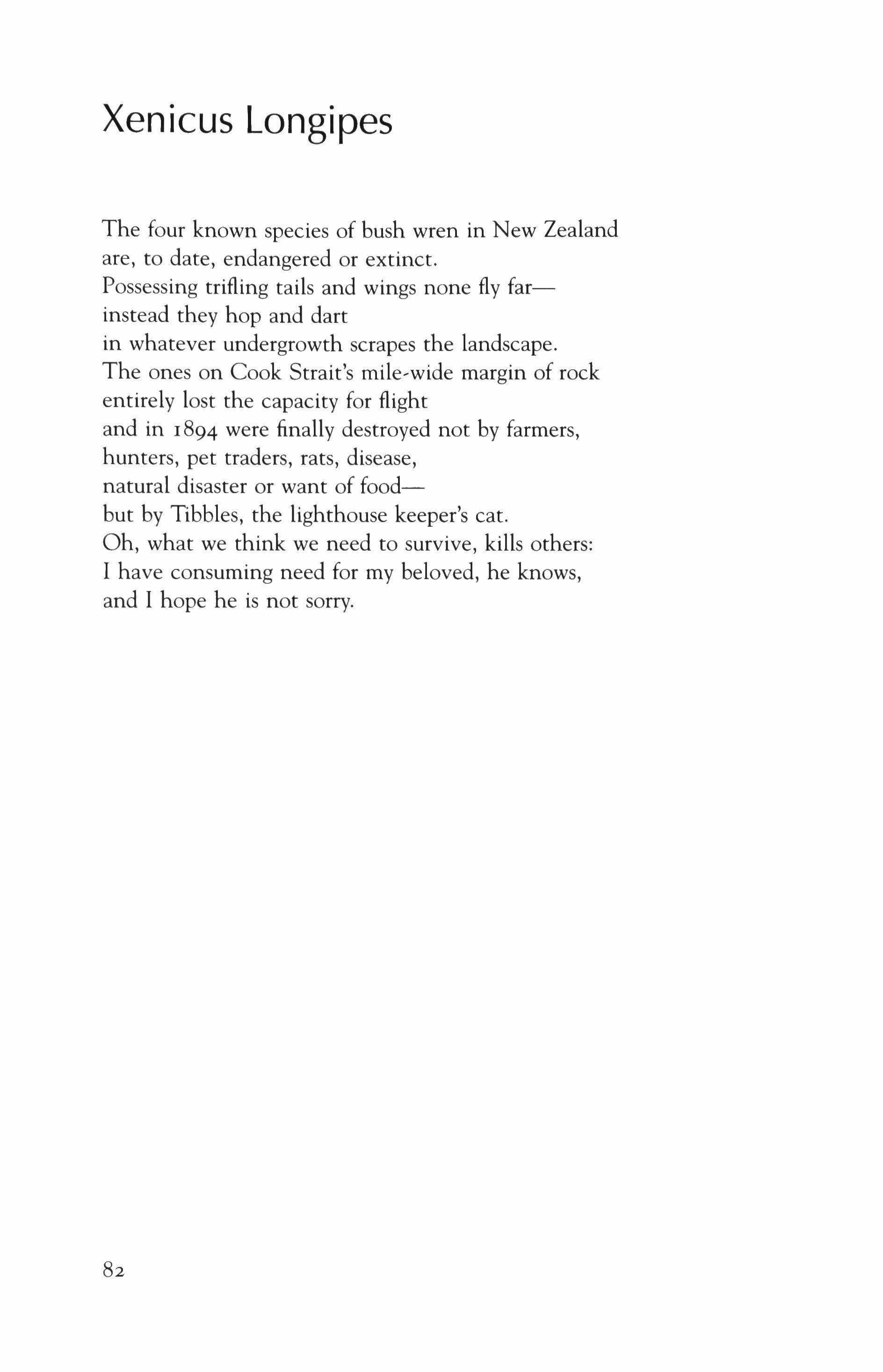
The four known species of bush wren in New Zealand are, to date, endangered or extinct. Possessing trifling tails and wings none fly farinstead they hop and dart in whatever undergrowth scrapes the landscape. The ones on Cook Strait's mile-wide margin of rock entirely lost the capacity for flight and in 1894 were finally destroyed not by farmers, hunters, pet traders, rats, disease, natural disaster or want of foodbut by Tibbles, the lighthouse keeper's cat. Oh, what we think we need to survive, kills others: I have consuming need for my beloved, he knows, and I hope he is not sorry.
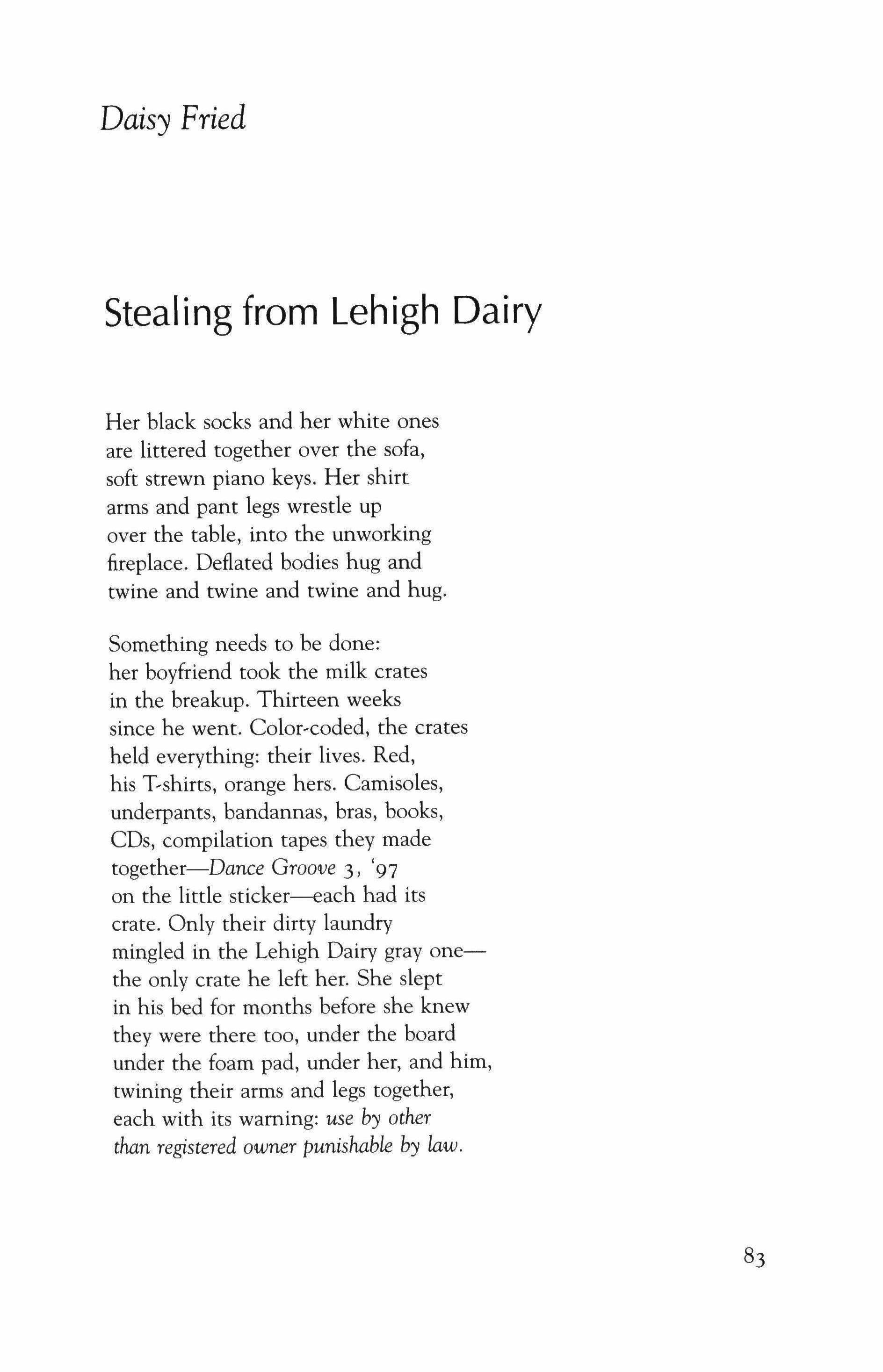
Her black socks and her white ones are littered together over the sofa, soft strewn piano keys. Her shirt arms and pant legs wrestle up over the table, into the unworking fireplace. Deflated bodies hug and twine and twine and twine and hug.
Something needs to be done: her boyfriend took the milk crates in the breakup. Thirteen weeks since he went. Color-coded, the crates held everything: their lives. Red, his Tshirts, orange hers. Camisoles, underpants, bandannas, bras, books, CDs, compilation tapes they made together-Dance Groove 3, '97 on the little sticker-each had its crate. Only their dirty laundry mingled in the Lehigh Dairy gray onethe only crate he left her. She slept in his bed for months before she knew they were there too, under the board under the foam pad, under her, and him, twining their arms and legs together, each with its warning: use by other than registered owner punishable by law.
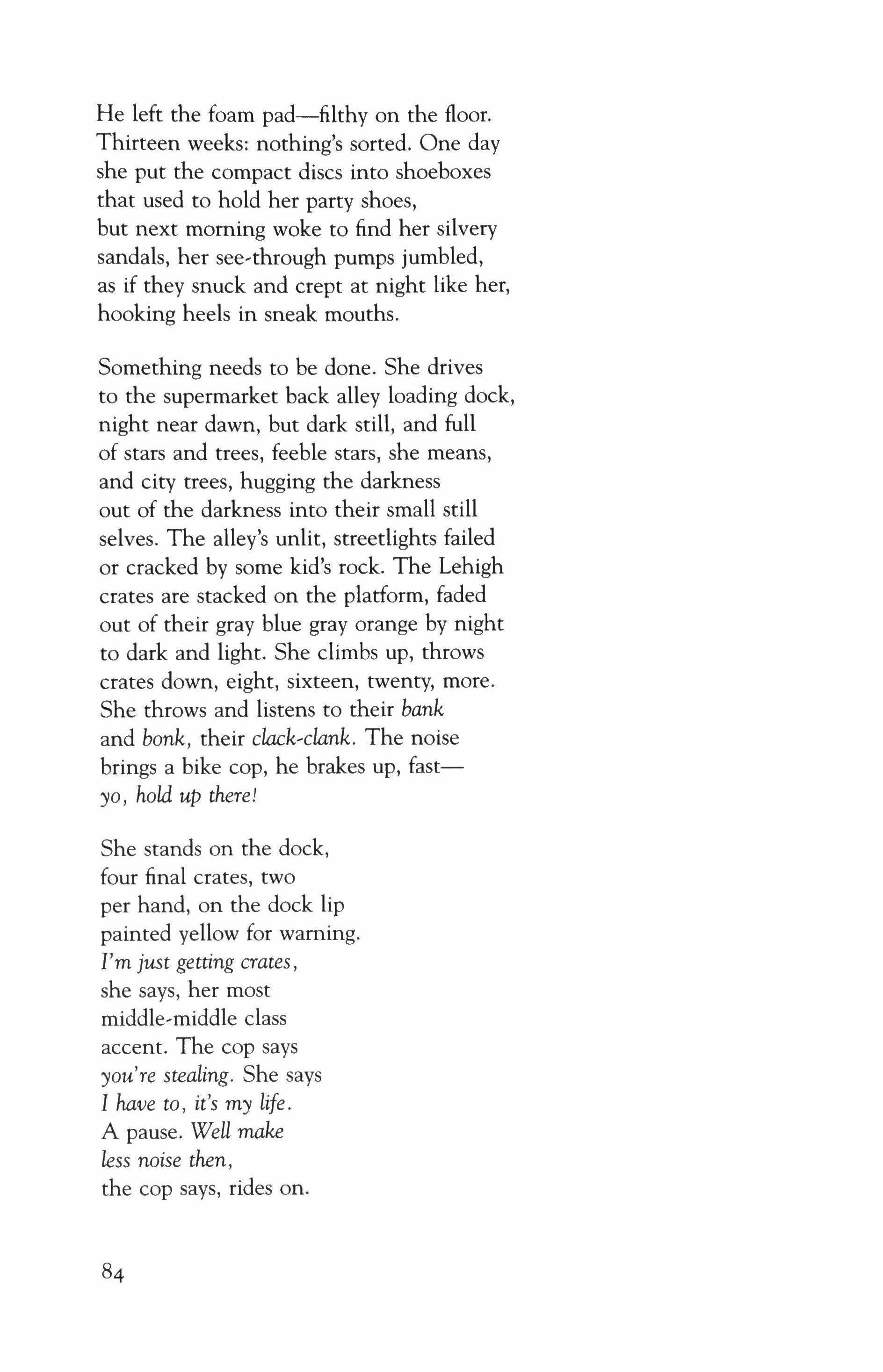
He left the foam pad-filthy on the floor. Thirteen weeks: nothing's sorted. One day she put the compact discs into shoeboxes that used to hold her party shoes, but next morning woke to find her silvery sandals, her see-through pumps jumbled, as if they snuck and crept at night like her, hooking heels in sneak mouths.
Something needs to be done. She drives to the supermarket back alley loading dock, night near dawn, but dark still, and full of stars and trees, feeble stars, she means, and city trees, hugging the darkness out of the darkness into their small still selves. The alley's unlit, streetlights failed or cracked by some kid's rock. The Lehigh crates are stacked on the platform, faded out of their gray blue gray orange by night to dark and light. She climbs up, throws crates down, eight, sixteen, twenty, more. She throws and listens to their bank and bonk, their clack,clank. The noise brings a bike cop, he brakes up, fastyo, hold up there!
She stands on the dock, four final crates, two per hand, on the dock lip painted yellow for warning. 1'm just getting crates, she says, her most middle-middle class accent. The cop says you're stealing. She says I have to, it's my life. A pause. Well make less noise then, the cop says, rides on.

She'll jump down now, load them in her car, till the car's a cage full of smaller cages. Before she jumps, she knows she'll fall the six feet (a boyfriend's height) to the vicious cement. She'll scrape her palms, she'll twist an ankle, her ankle will swell, her palms will sting, grit in the gashes. She'll stack the crates in her living room, leave them three weeks, a month, longer, in four or five-story stacks.
She'll shift them sometimes but leave them empty. Sometimes the sun will come through the southern, eastern windows, seem to clean the mess, bring the empty crates odd tints, play them like colored keys. She looks down at her feet on the yellow dock danger stripe. The same sun will seem to dirty the place the more. She knows, predicts. She jumps.
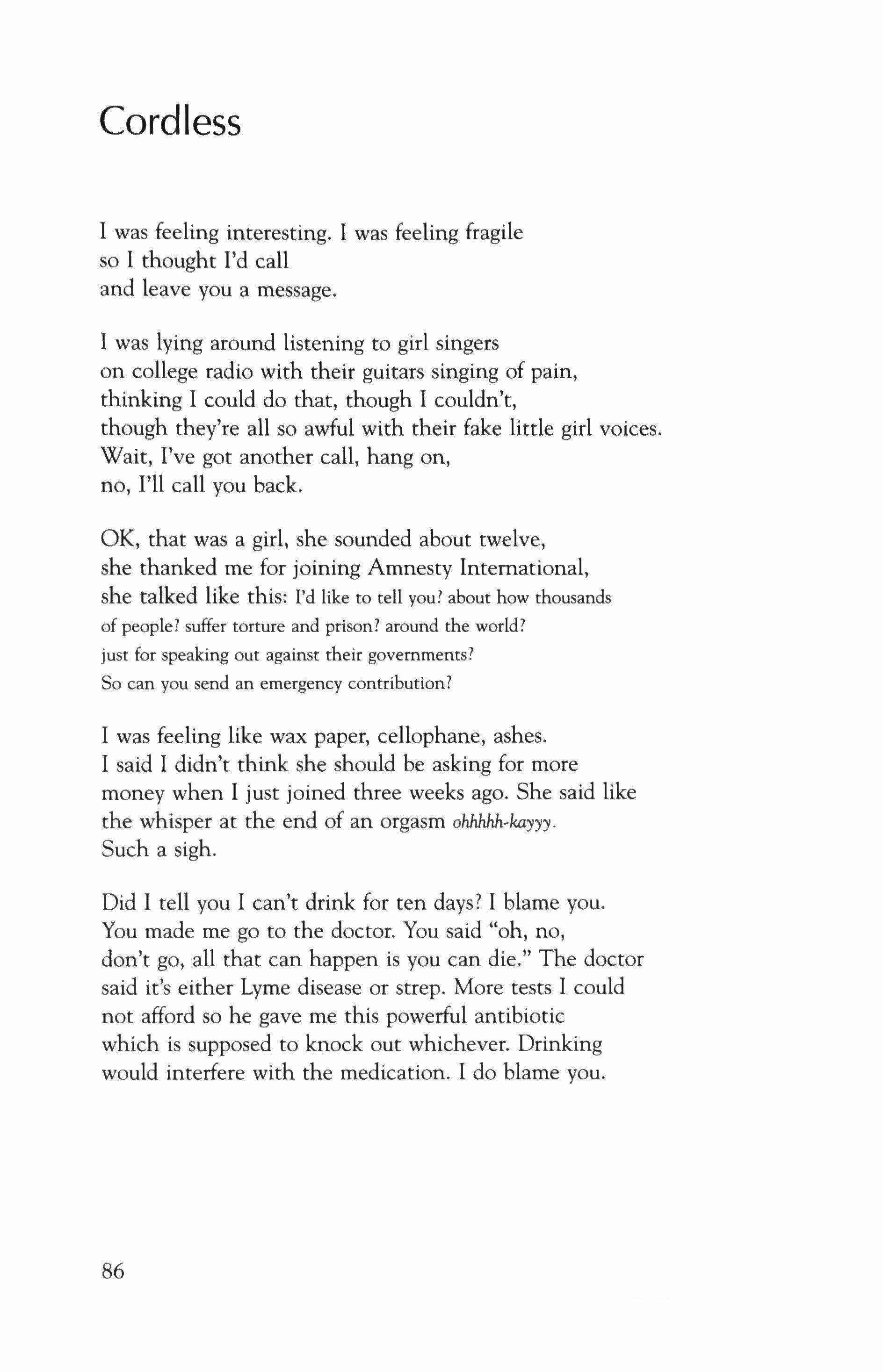
I was feeling interesting. I was feeling fragile so I thought I'd call and leave you a message.
I was lying around listening to girl singers on college radio with their guitars singing of pain, thinking I could do that, though I couldn't, though they're all so awful with their fake little girl voices. Wait, I've got another call, hang on, no, I'll call you back.
OK, that was a girl, she sounded about twelve, she thanked me for joining Amnesty International, she talked like this: I'd like to tell you? about how thousands of people? suffer torture and prison? around the world? just for speaking out against their governments? So can you send an emergency contribution?
I was feeling like wax paper, cellophane, ashes. I said I didn't think she should be asking for more money when I just joined three weeks ago. She said like the whisper at the end of an orgasm ohhhhh-kayyy. Such a sigh.
Did I tell you I can't drink for ten days? I blame you. You made me go to the doctor. You said "oh, no, don't go, all that can happen is you can die." The doctor said it's either Lyme disease or strep. More tests I could not afford so he gave me this powerful antibiotic which is supposed to knock out whichever. Drinking would interfere with the medication. I do blame you.
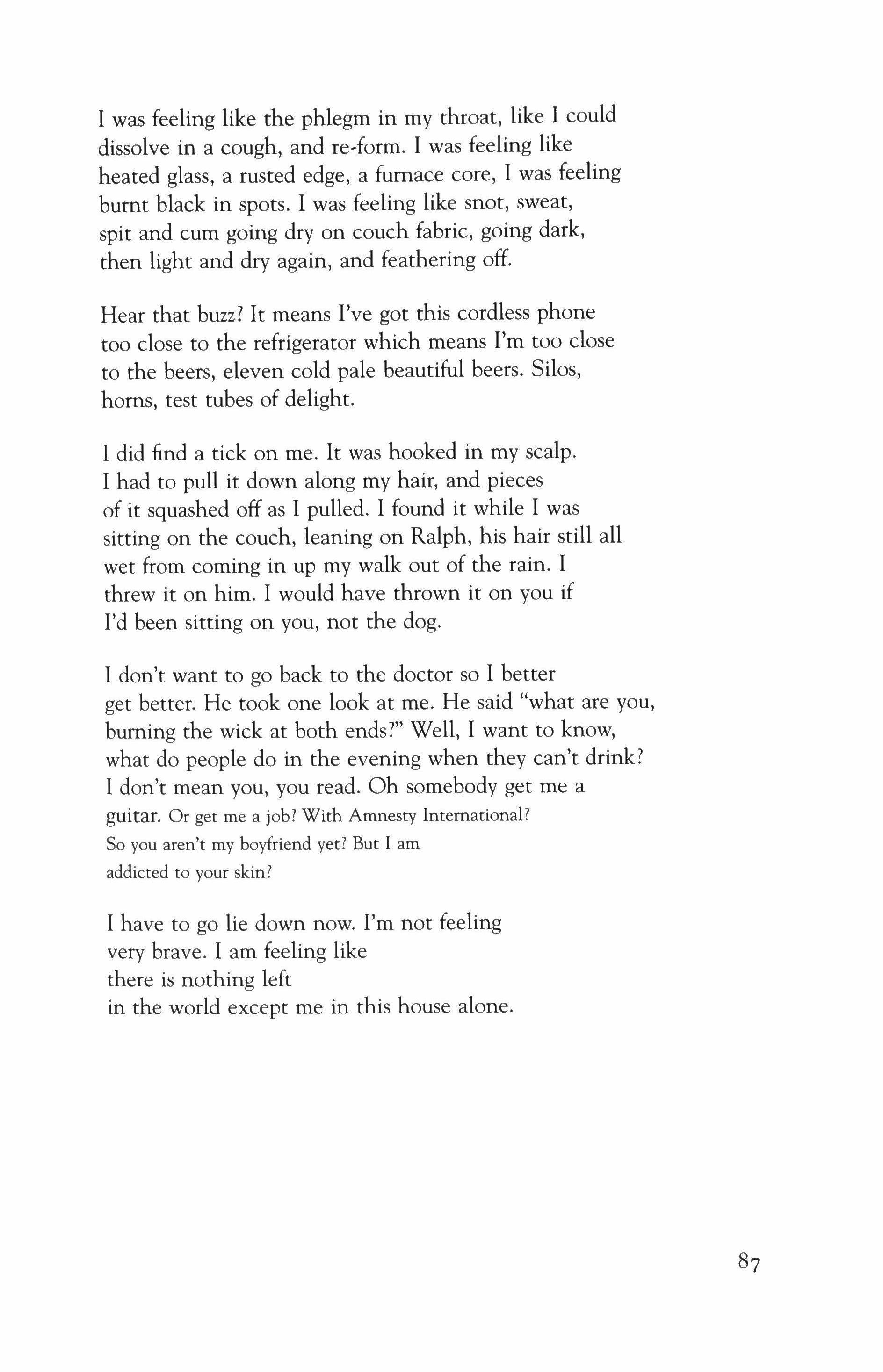
I was feeling like the phlegm in my throat, like I could dissolve in a cough, and re-form. I was feeling like heated glass, a rusted edge, a furnace core, I was feeling burnt black in spots. I was feeling like snot, sweat, spit and cum going dry on couch fabric, going dark, then light and dry again, and feathering off.
Hear that buzz? It means I've got this cordless phone too close to the refrigerator which means I'm too close to the beers, eleven cold pale beautiful beers. Silos, horns, test tubes of delight.
I did find a tick on me. It was hooked in my scalp. I had to pull it down along my hair, and pieces of it squashed off as I pulled. I found it while I was sitting on the couch, leaning on Ralph, his hair still all wet from coming in up my walk out of the rain. I threw it on him. I would have thrown it on you if I'd been sitting on you, not the dog.
I don't want to go back to the doctor so I better get better. He took one look at me. He said "what are you, burning the wick at both ends?" Well, I want to know, what do people do in the evening when they can't drink? I don't mean you, you read. Oh somebody get me a guitar. Or get me a job? With Amnesty International? So you aren't my boyfriend yet? But I am addicted to your skin?
I have to go lie down now. I'm not feeling very brave. I am feeling like there is nothing left in the world except me in this house alone.
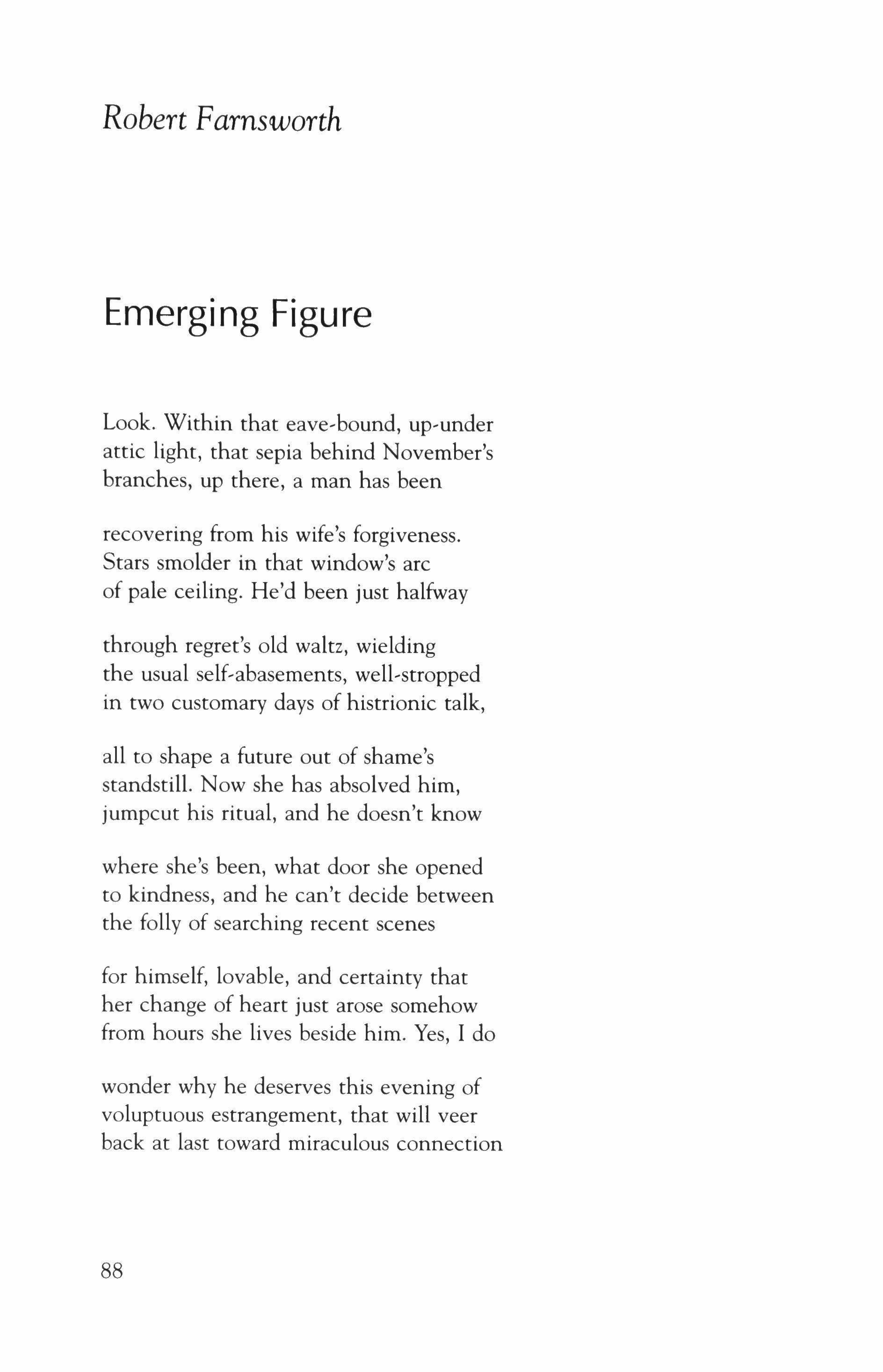
Look. Within that eave-bound, up-under attic light, that sepia behind November's branches, up there, a man has been recovering from his wife's forgiveness. Stars smolder in that window's arc of pale ceiling. He'd been just halfway through regret's old waltz, wielding the usual self-abasements, well-stropped in two customary days of histrionic talk, all to shape a future out of shame's standstill. Now she has absolved him, jumpcut his ritual, and he doesn't know
where she's been, what door she opened to kindness, and he can't decide between the folly of searching recent scenes
for himself, lovable, and certainty that her change of heart just arose somehow from hours she lives beside him. Yes, I do
wonder why he deserves this evening of voluptuous estrangement, that will veer back at last toward miraculous connection
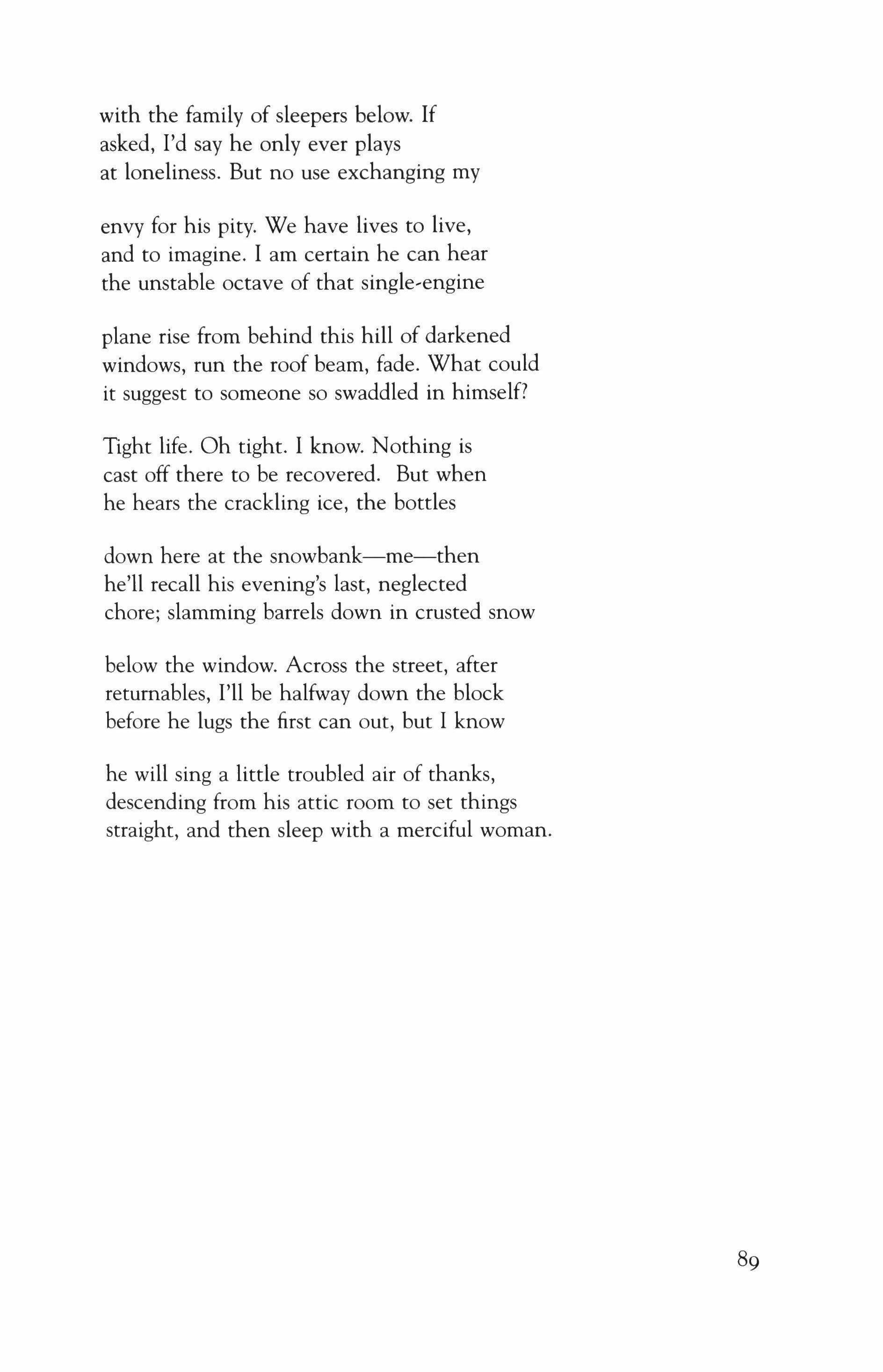
with the family of sleepers below. If asked, I'd say he only ever plays at loneliness. But no use exchanging my envy for his pity. We have lives to live, and to imagine. I am certain he can hear the unstable octave of that single-engine plane rise from behind this hill of darkened windows, run the roof beam, fade. What could it suggest to someone so swaddled in himself?
Tight life. Oh tight. I know. Nothing is cast off there to be recovered. But when he hears the crackling ice, the bottles down here at the snowbank-me-then he'll recall his evening's last, neglected chore; slamming barrels down in crusted snow
below the window. Across the street, after returnables, I'll be halfway down the block before he lugs the first can out, but I know
he will sing a little troubled air of thanks, descending from his attic room to set things straight, and then sleep with a merciful woman.
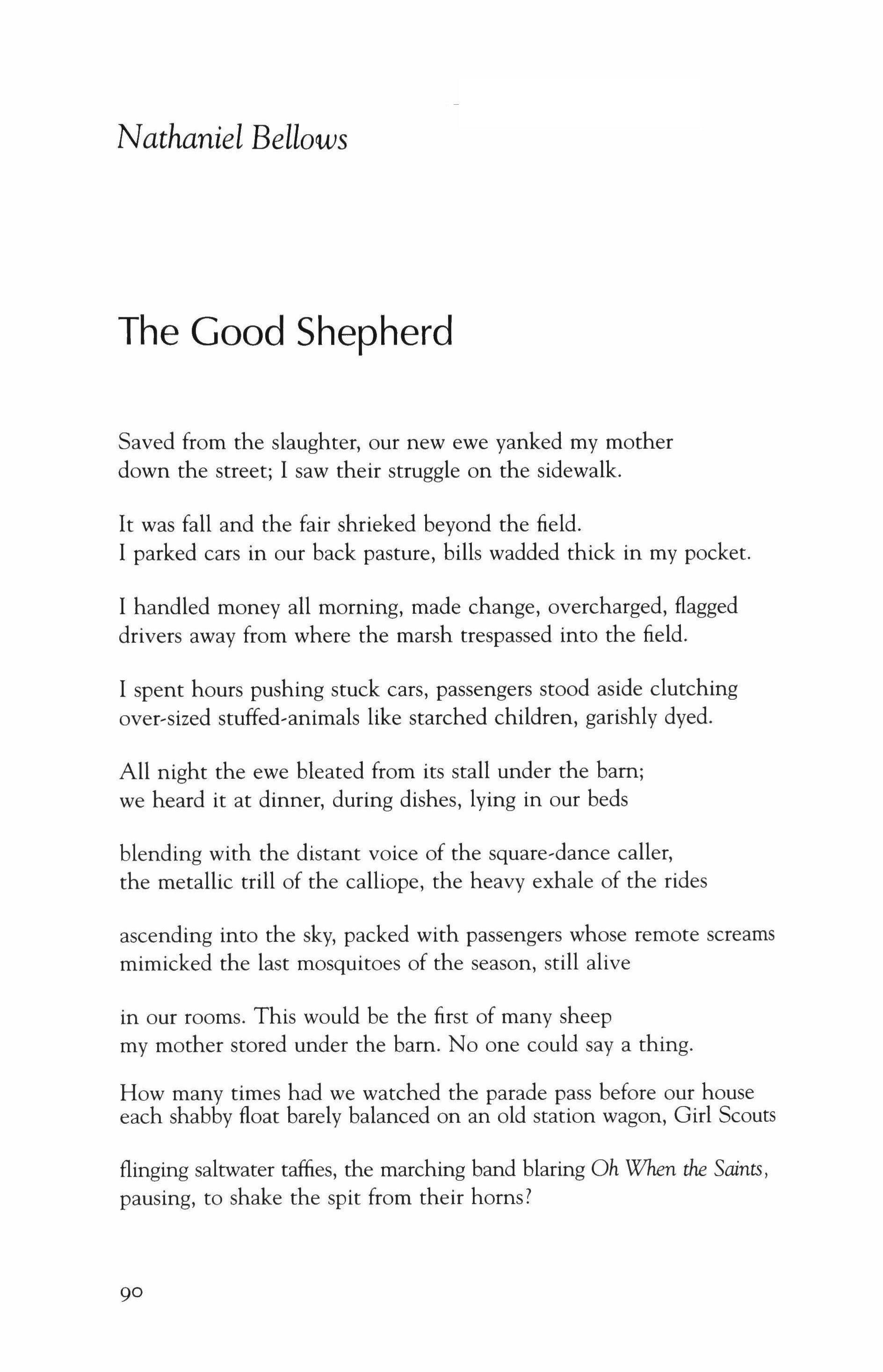
Saved from the slaughter, our new ewe yanked my mother down the street; I saw their struggle on the sidewalk.
It was fall and the fair shrieked beyond the field.
I parked cars in our back pasture, bills wadded thick in my pocket.
I handled money all morning, made change, overcharged, flagged drivers away from where the marsh trespassed into the field.
I spent hours pushing stuck cars, passengers stood aside clutching over-sized stuffed-animals like starched children, garishly dyed.
All night the ewe bleated from its stall under the barn; we heard it at dinner, during dishes, lying in our beds
blending with the distant voice of the square-dance caller, the metallic trill of the calliope, the heavy exhale of the rides
ascending into the sky, packed with passengers whose remote screams mimicked the last mosquitoes of the season, still alive
in our rooms. This would be the first of many sheep my mother stored under the barn. No one could say a thing.
How many times had we watched the parade pass before our house each shabby float barely balanced on an old station wagon, Girl Scouts
flinging saltwater taffies, the marching band blaring Oh When the Saints, pausing, to shake the spit from their horns?
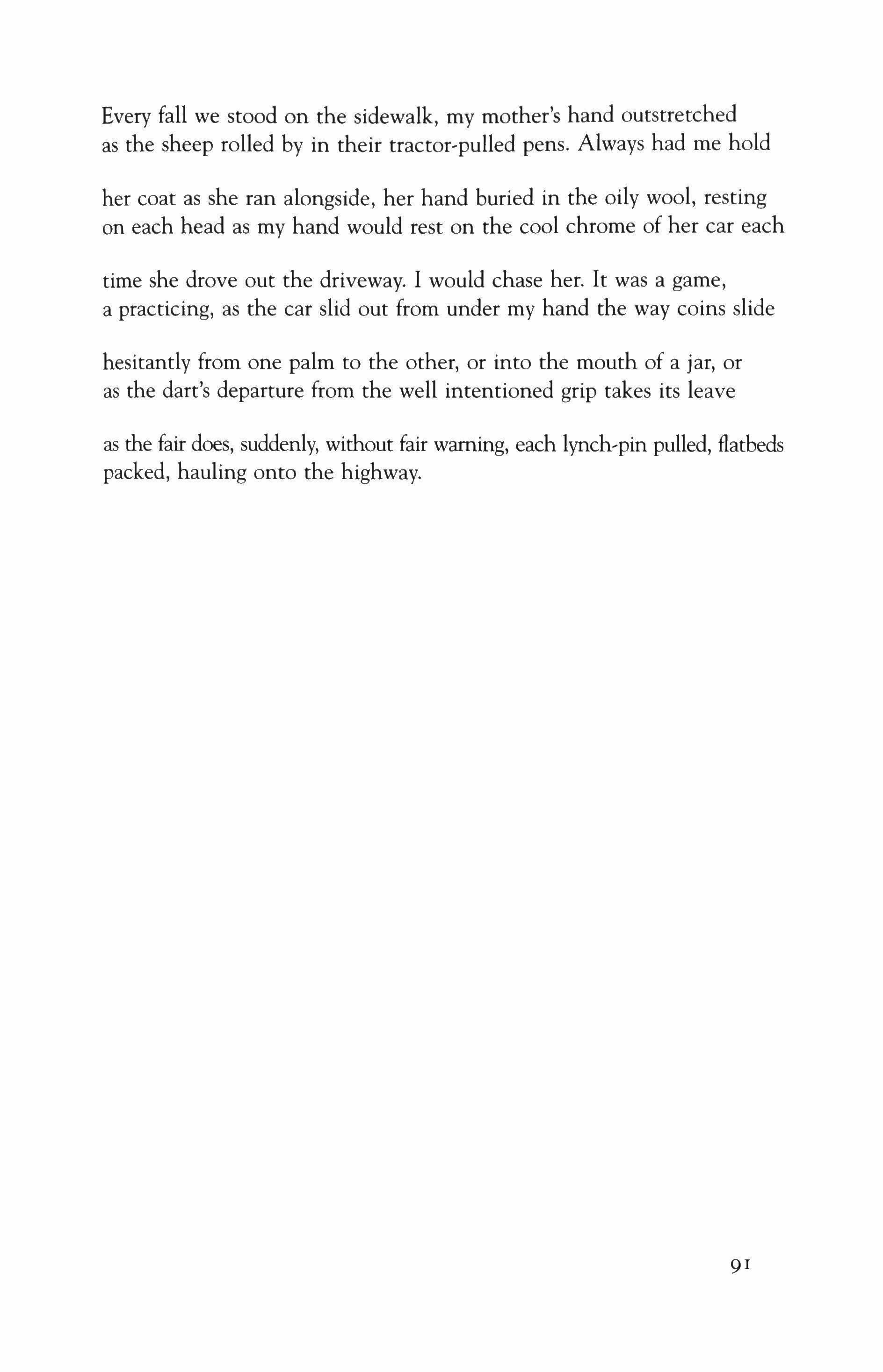
Every fall we stood on the sidewalk, my mother's hand outstretched as the sheep rolled by in their tractor-pulled pens. Always had me hold
her coat as she ran alongside, her hand buried in the oily wool, resting on each head as my hand would rest on the cool chrome of her car each time she drove out the driveway. I would chase her. It was a game, a practicing, as the car slid out from under my hand the way coins slide
hesitantly from one palm to the other, or into the mouth of a jar, or as the dart's departure from the well intentioned grip takes its leave
as the fair does, suddenly, without fair warning, each lynch-pin pulled, flatbeds packed, hauling onto the highway.
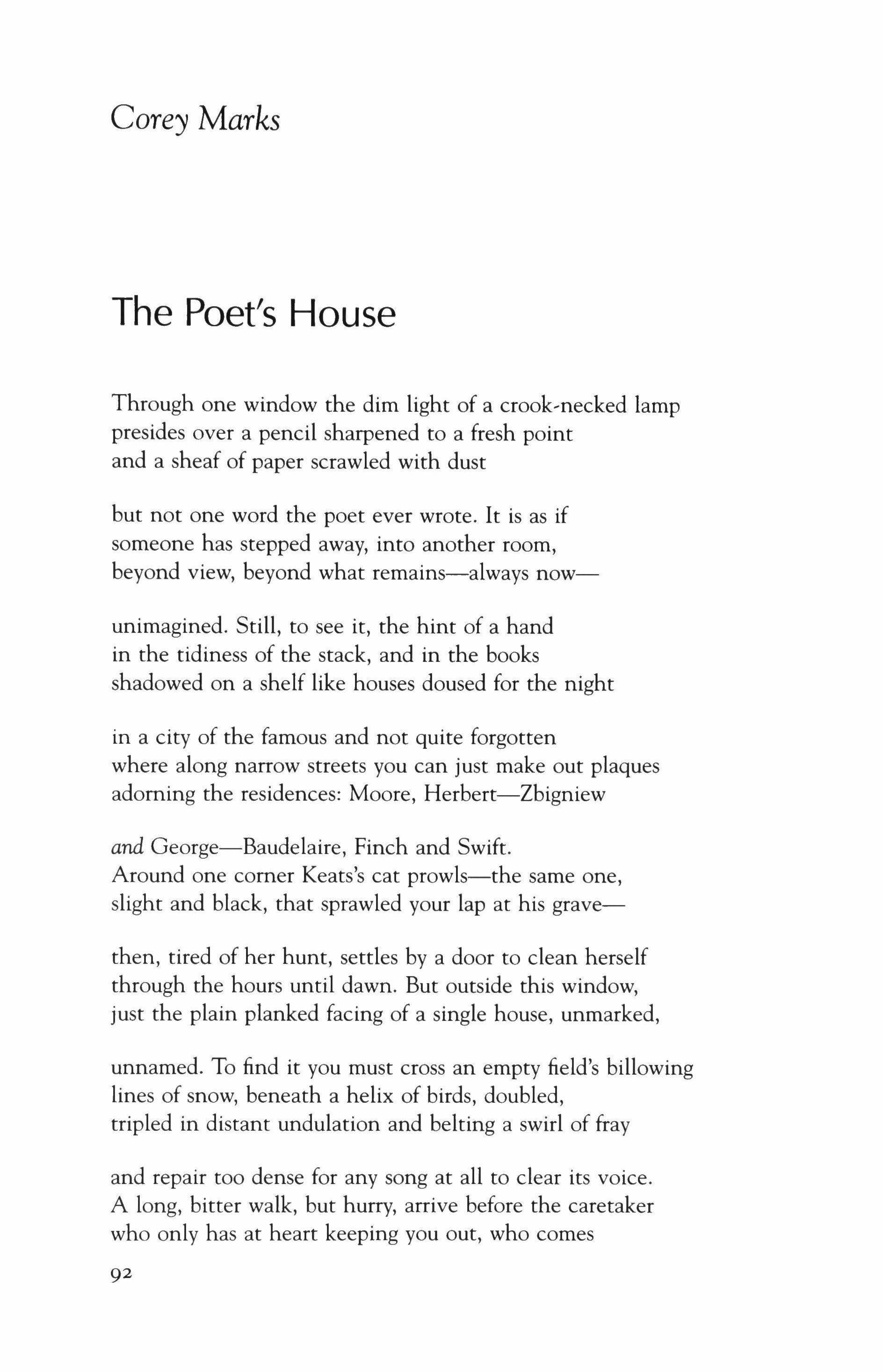
Through one window the dim light of a crook-necked lamp presides over a pencil sharpened to a fresh point and a sheaf of paper scrawled with dust but not one word the poet ever wrote. It is as if someone has stepped away, into another room, beyond view, beyond what remains-always nowunimagined. Still, to see it, the hint of a hand in the tidiness of the stack, and in the books shadowed on a shelf like houses doused for the night in a city of the famous and not quite forgotten where along narrow streets you can just make out plaques adorning the residences: Moore, Herbert-Zbigniew and George-Baudelaire, Finch and Swift. Around one comer Keats's cat prowls-the same one, slight and black, that sprawled your lap at his gravethen, tired of her hunt, settles by a door to clean herself through the hours until dawn. But outside this window, just the plain planked facing of a single house, unmarked, unnamed. To find it you must cross an empty field's billowing lines of snow, beneath a helix of birds, doubled, tripled in distant undulation and belting a swirl of fray and repair too dense for any song at all to clear its voice. A long, bitter walk, but hurry, arrive before the caretaker who only has at heart keeping you out, who comes 92
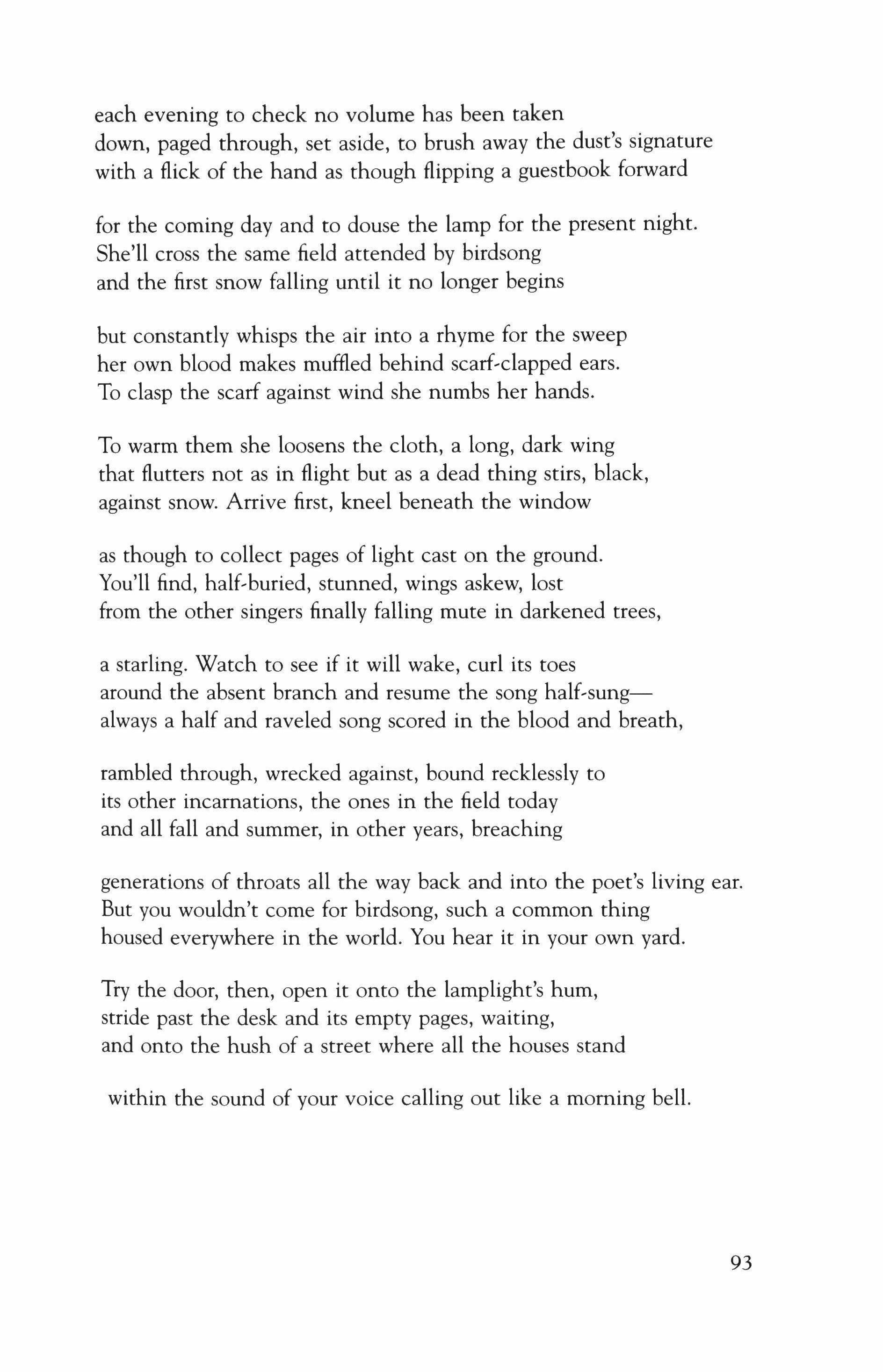
each evening to check no volume has been taken down, paged through, set aside, to brush away the dust's signature with a flick of the hand as though flipping a guestbook forward
for the coming day and to douse the lamp for the present night. She'll cross the same field attended by birdsong and the first snow falling until it no longer begins but constantly whisps the air into a rhyme for the sweep her own blood makes muffled behind scarf-clapped ears.
To clasp the scarf against wind she numbs her hands.
To warm them she loosens the cloth, a long, dark wing that flutters not as in flight but as a dead thing stirs, black, against snow. Arrive first, kneel beneath the window
as though to collect pages of light cast on the ground. You'll find, half-buried, stunned, wings askew, lost from the other singers finally falling mute in darkened trees,
a starling. Watch to see if it will wake, curl its toes around the absent branch and resume the song half-sungalways a half and raveled song scored in the blood and breath,
rambled through, wrecked against, bound recklessly to its other incarnations, the ones in the field today and all fall and summer, in other years, breaching
generations of throats all the way back and into the poet's living ear. But you wouldn't come for birdsong, such a common thing housed everywhere in the world. You hear it in your own yard.
Try the door, then, open it onto the lamplight's hum, stride past the desk and its empty pages, waiting, and onto the hush of a street where all the houses stand
within the sound of your voice calling out like a morning bell.

The marker reads DIED FIGHT, a revision
Chanced by wind and sand allied
On the nearby shore, i, nand g visible
Only to those-knees thrust into scraggly grass-
Who bend studiously, fingers tracing Faint tracks once grooved deeply, quickly,
By a man who never knew the dead man's name, But whose hands halved and quartered
And blocked into rough-hewn impermanence
This wooden cross, a last but not
Lasting record of a life renamed, then named again As a breaking of time's back.
Or as a moment poised to split into halves-after, Before-along an imperceptible fracture
That doesn't yet crack. What do you hope for, love, Bent there like a scholar to her book?
To resolve nearly scoured-away shapes Into sound, to voice some other, weathered voice,
To wrench sequence and syntax back into line Against the shore-wind's daily craft?
How poor to die the anonymous, unwritten Subject of one's own death, to be known
Only as a fading final act in a sentence Constantly ground into fragment, particle.
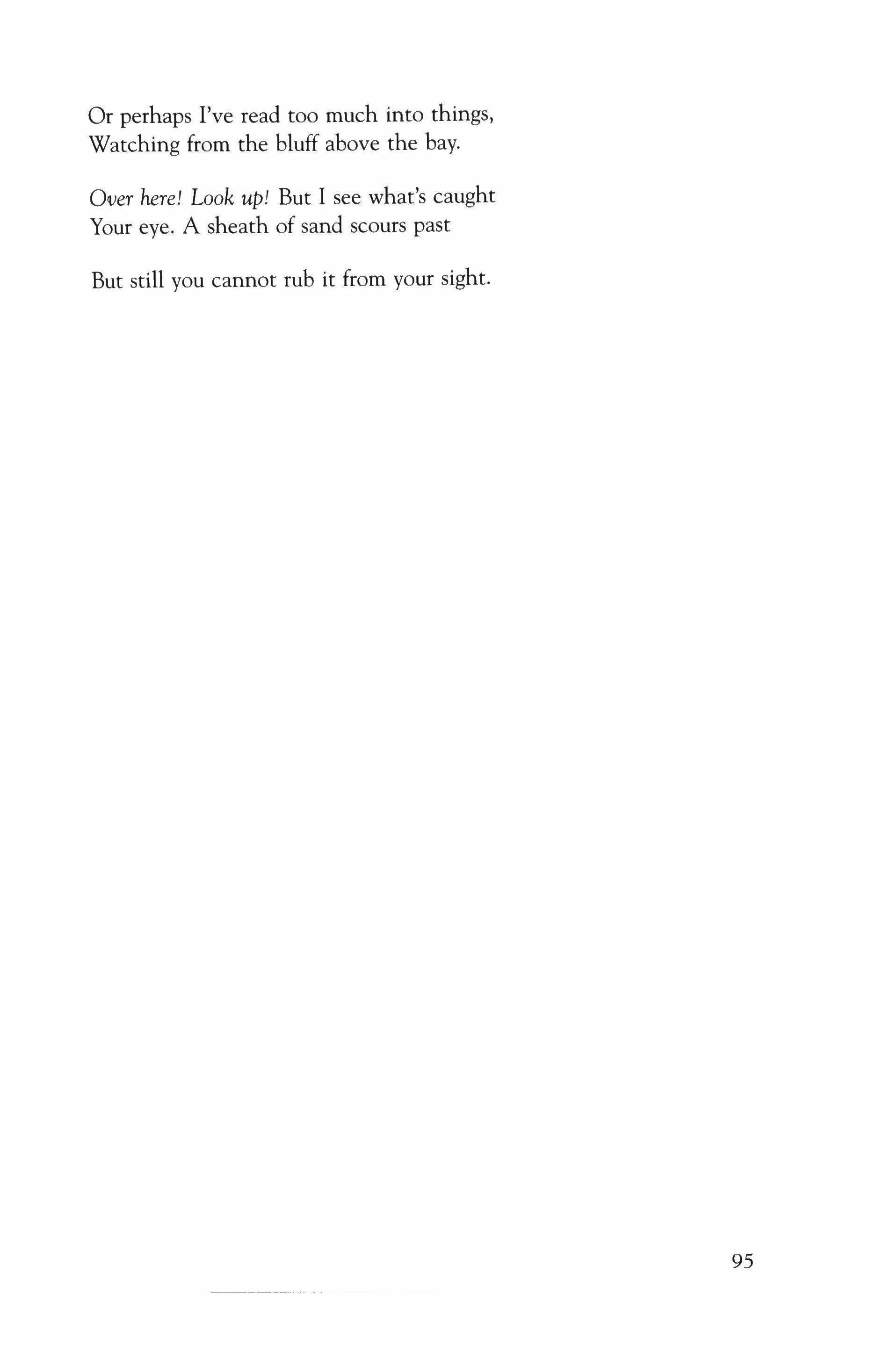
Or perhaps I've read too much into things, Watching from the bluff above the bay.
Over here! Look uP! But I see what's caught Your eye. A sheath of sand scours past
But still you cannot rub it from your sight.
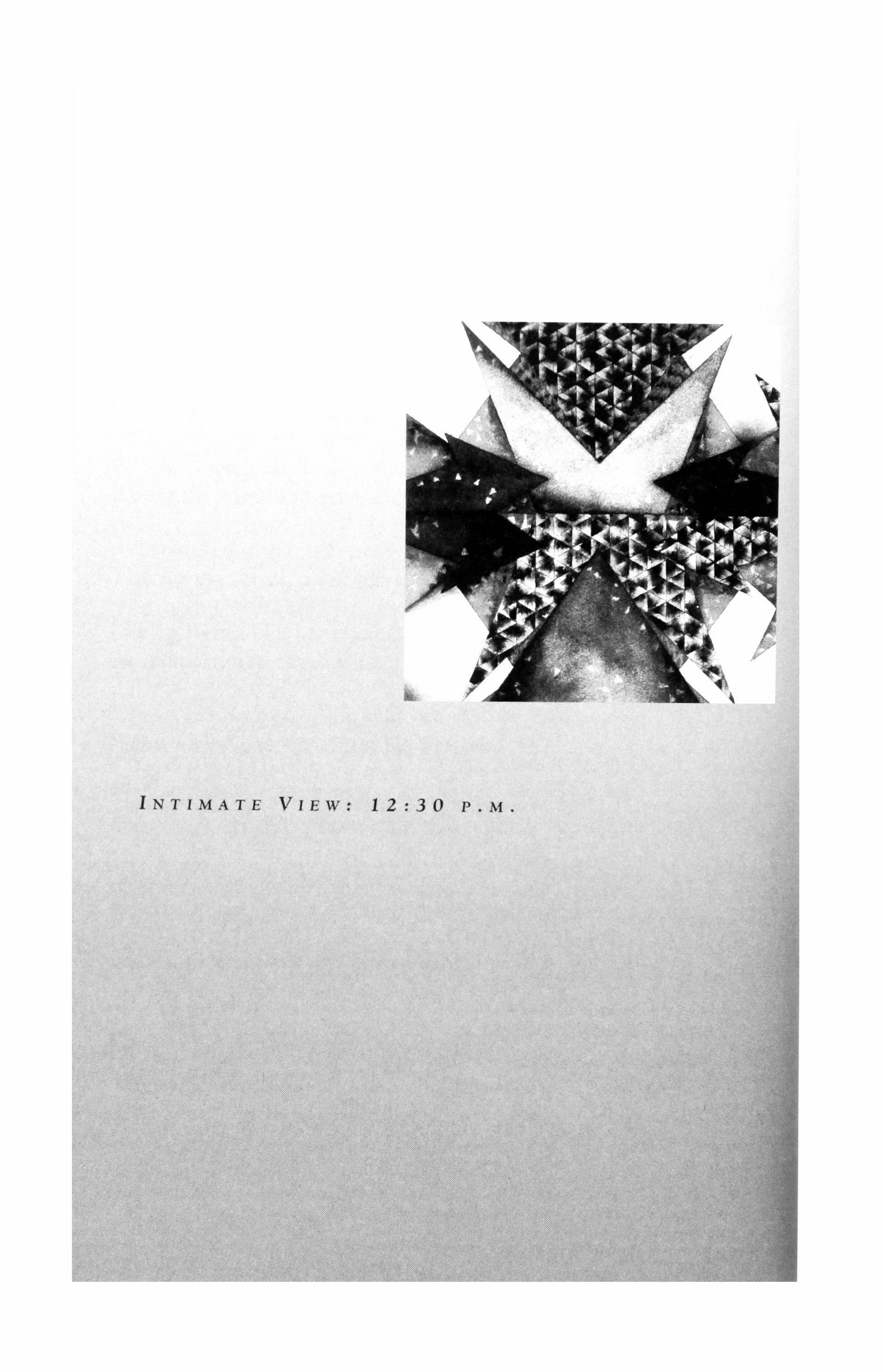
INTIMATE VIEW: 12:30 P.M.
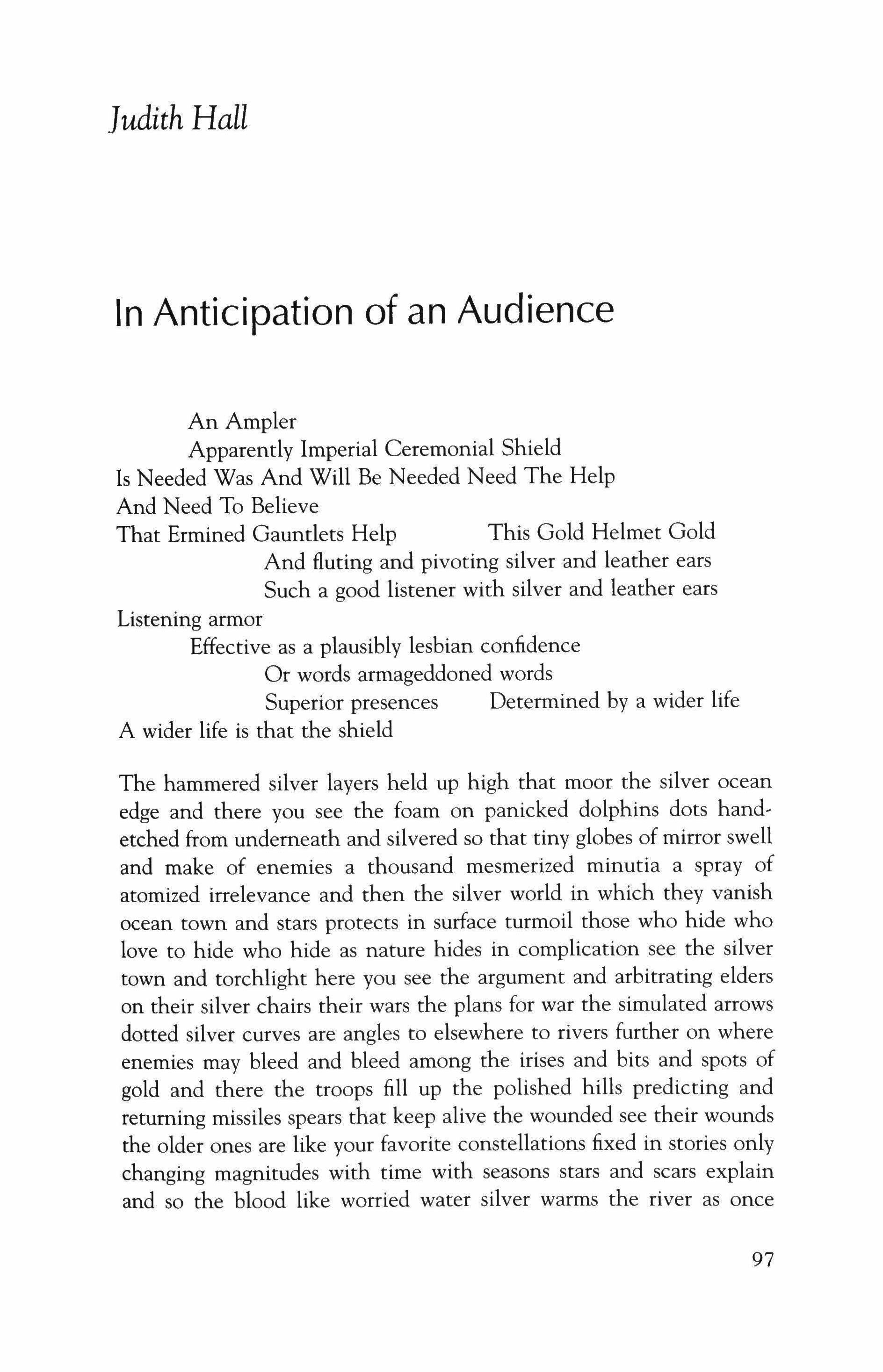
Apparently Imperial Ceremonial Shield Is Needed Was And Will Be Needed Need The Help And Need To Believe
That Ermined Gauntlets Help
This Gold Helmet Gold And fluting and pivoting silver and leather ears
Such a good listener with silver and leather ears
Listening armor
Effective as a plausibly lesbian confidence Or words armageddoned words
Superior presences Determined by a wider life A wider life is that the shield
The hammered silver layers held up high that moor the silver ocean edge and there you see the foam on panicked dolphins dots handetched from underneath and silvered so that tiny globes of mirror swell and make of enemies a thousand mesmerized minutia a spray of atomized irrelevance and then the silver world in which they vanish ocean town and stars protects in surface turmoil those who hide who love to hide who hide as nature hides in complication see the silver town and torchlight here you see the argument and arbitrating elders on their silver chairs their wars the plans for war the simulated arrows dotted silver curves are angles to elsewhere to rivers further on where enemies may bleed and bleed among the irises and bits and spots of gold and there the troops fill up the polished hills predicting and returning missiles spears that keep alive the wounded see their wounds the older ones are like your favorite constellations fixed in stories only changing magnitudes with time with seasons stars and scars explain and so the blood like worried water silver warms the river as once

tongues of shepherds did and girls they love their dogs they somersault and see her silver ankle licked they leap among the drawn up legs of baby crows you see the first unlucky orchid bower for a foreign bride and languid fields turned by many plowmen just as invalids are turned for sleep and sleep at last the wine the silver wine brought in for each from unimaginable hands a strangely formal sympathy or chaos out of which a single wider life began
A wider life
Rehearsed with a curious toss of unwashed hair
Clang Clang The Armaments And Blah Blah
The Tintinnabulations Words Bells Testicles
Orchidaceous Incantintinnabula Orchidaceous lncantintinnabula
Ah The Armor Of It All
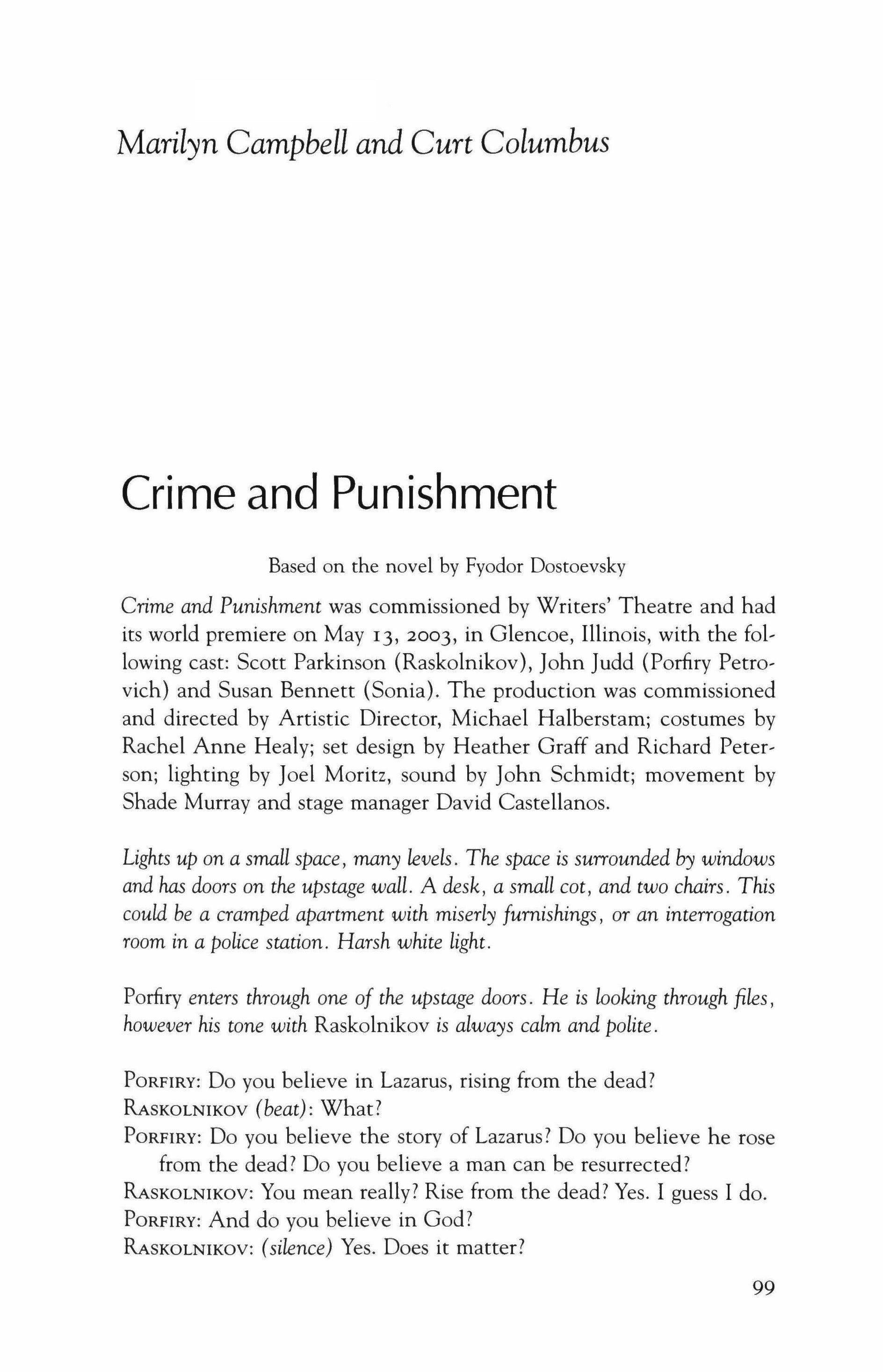
Based on the novel by Fyodor Dostoevsky
Crime and Punishment was commissioned by Writers' Theatre and had its world premiere on May 13, 2003, in Glencoe, Illinois, with the following cast: Scott Parkinson (Raskolnikov), John Judd (Porfiry Petrovich) and Susan Bennett (Sonia). The production was commissioned and directed by Artistic Director, Michael Halberstam; costumes by Rachel Anne Healy; set design by Heather Graff and Richard Peterson; lighting by Joel Moritz, sound by John Schmidt; movement by Shade Murray and stage manager David Castellanos.
Lights up on a small space, many levels. The space is surrounded by windows and has doors on the upstage wall. A desk, a small cot, and two chairs. This could be a cramped apartment with miserly furnishings, or an interrogation room in a police station. Harsh white light.
Porfiry enters through one of the upstage doors. He is looking through files, however his tone with Raskolnikov is always calm and polite.
PORFIRY: Do you believe in Lazarus, rising from the dead?
RASKOLNIKOV (beat): What?
PORFIRY: Do you believe the story of Lazarus? Do you believe he rose from the dead? Do you believe a man can be resurrected?
RASKOLNIKOV: You mean really? Rise from the dead? Yes. I guess I do.
PORFIRY: And do you believe in God?
RASKOLNIKOV: (silence) Yes. Does it matter?
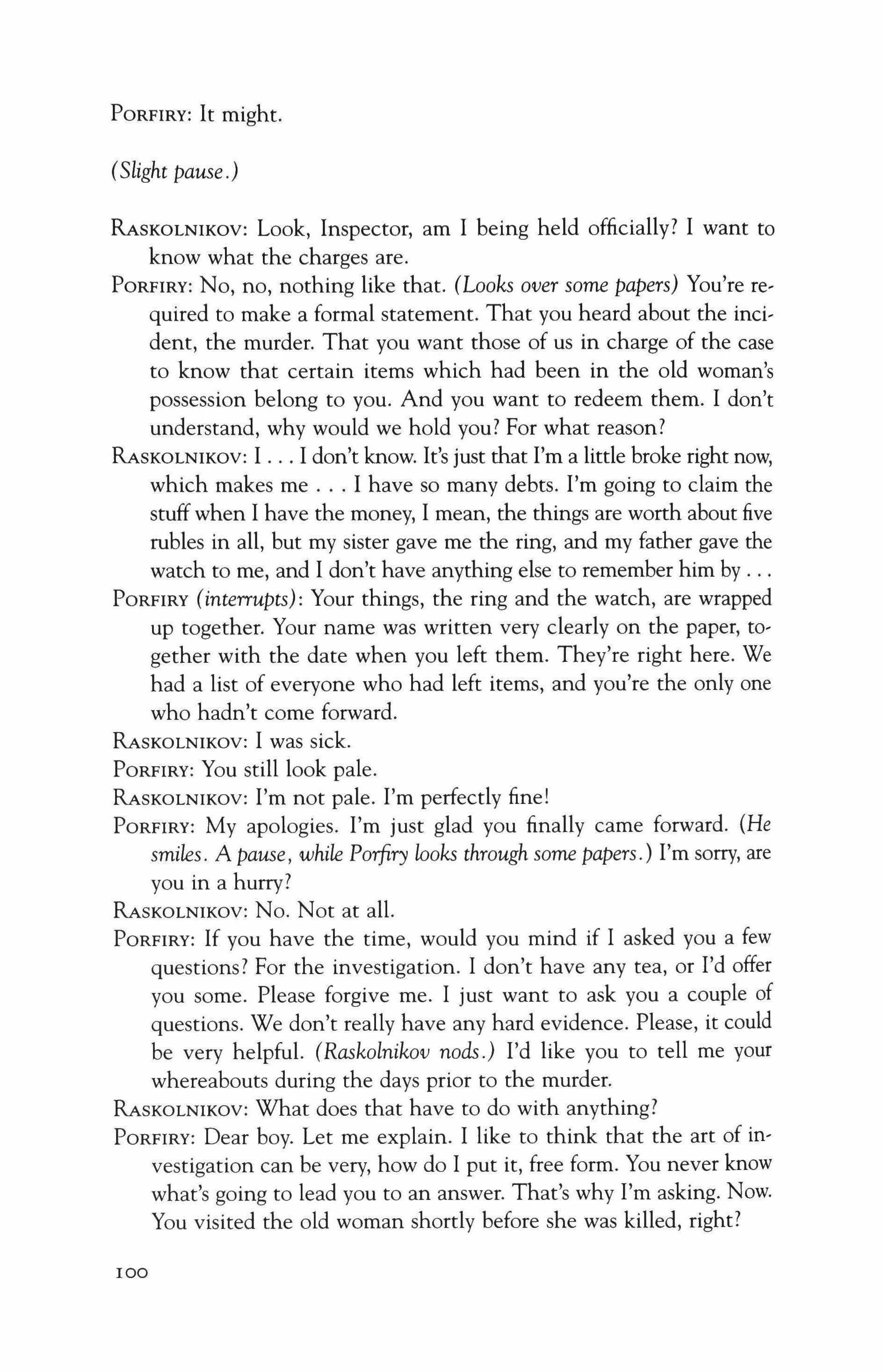
PORFIRY: It might.
(Slight pause.)
RASKOLNIKOV: Look, Inspector, am I being held officially? I want to know what the charges are.
PORFIRY: No, no, nothing like that. (Looks over some papers) You're required to make a formal statement. That you heard about the incident, the murder. That you want those of us in charge of the case to know that certain items which had been in the old woman's possession belong to you. And you want to redeem them. I don't understand, why would we hold you? For what reason?
RASKOLNIKOV: I I don't know. It's just that I'm a little broke right now, which makes me I have so many debts. I'm going to claim the stuff when I have the money, I mean, the things are worth about five rubles in all, but my sister gave me the ring, and my father gave the watch to me, and I don't have anything else to remember him by
PORFIRY (interrupts): Your things, the ring and the watch, are wrapped up together. Your name was written very clearly on the paper, together with the date when you left them. They're right here. We had a list of everyone who had left items, and you're the only one who hadn't come forward.
RASKOLNIKOV: I was sick.
PORFIRY: You still look pale.
RASKOLNIKOV: I'm not pale. I'm perfectly fine!
PORFIRY: My apologies. I'm just glad you finally came forward. (He smiles. A pause, while Porfiry looks through some papers.) I'm sorry, are you in a hurry?
RASKOLNIKOV: No. Not at all.
PORFIRY: If you have the time, would you mind if I asked you a few questions? For the investigation. I don't have any tea, or I'd offer you some. Please forgive me. I just want to ask you a couple of questions. We don't really have any hard evidence. Please, it could be very helpful. (Raskolnikov nods.) I'd like you to tell me your whereabouts during the days prior to the murder.
RASKOLNIKOV: What does that have to do with anything?
PORFIRY: Dear boy. Let me explain. I like to think that the art of investigation can be very, how do I put it, free form. You never know what's going to lead you to an answer. That's why I'm asking. Now. You visited the old woman shortly before she was killed, right?
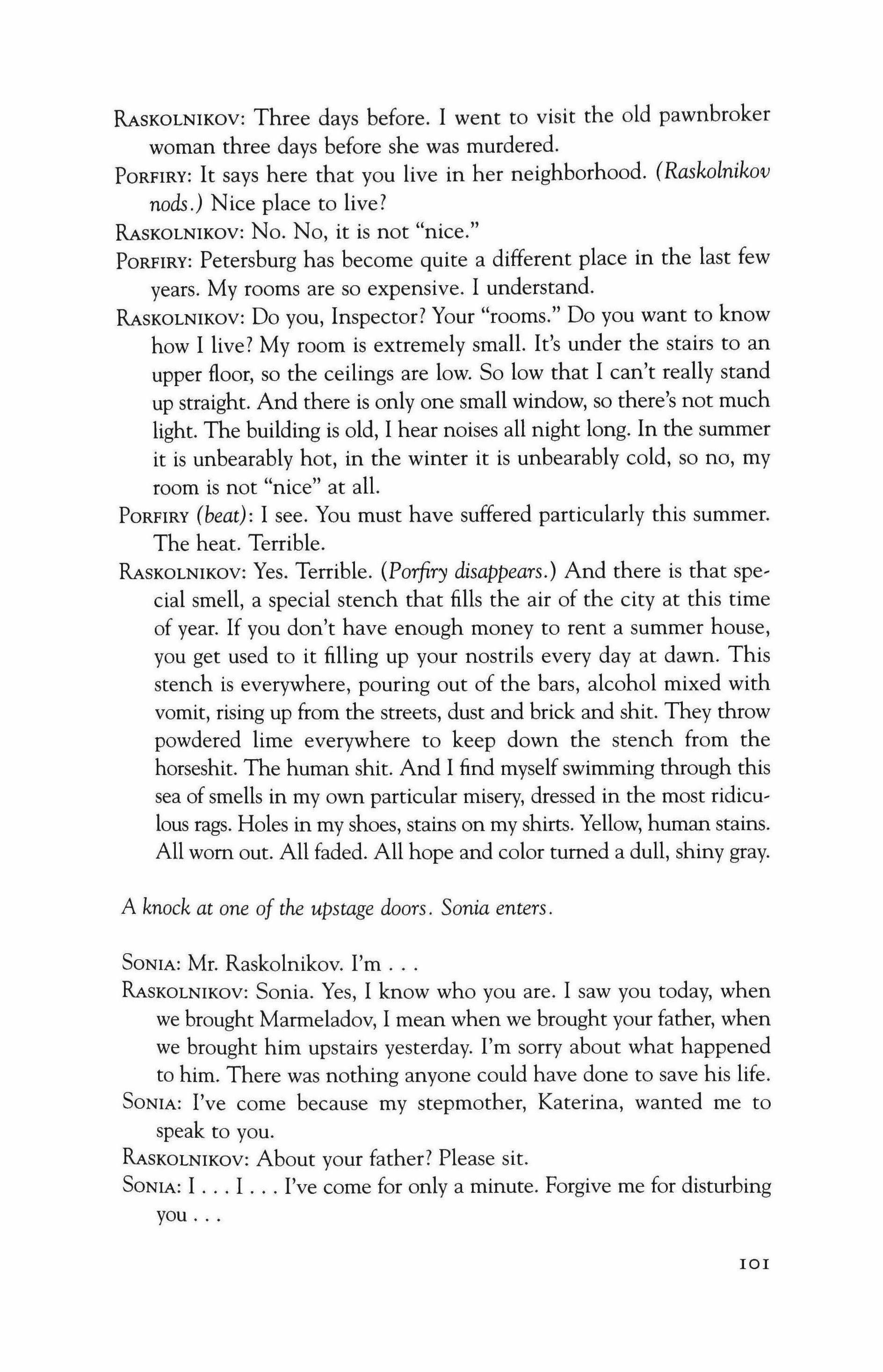
RASKOLNIKOV: Three days before. I went to visit the old pawnbroker woman three days before she was murdered.
PORFIRY: It says here that you live in her neighborhood. (Raskolnikov nods.) Nice place to live?
RASKOLNIKOV: No. No, it is not "nice."
PORFIRY: Petersburg has become quite a different place in the last few years. My rooms are so expensive. I understand.
RASKOLNIKOV: Do you, Inspector? Your "rooms." Do you want to know how I live? My room is extremely small. It's under the stairs to an upper floor, so the ceilings are low. So low that I can't really stand up straight. And there is only one small window, so there's not much light. The building is old, I hear noises all night long. In the summer it is unbearably hot, in the winter it is unbearably cold, so no, my room is not "nice" at all.
PORFIRY (beat): I see. You must have suffered particularly this summer. The heat. Terrible.
RASKOLNIKOV: Yes. Terrible. (Porfiry disappears.) And there is that special smell, a special stench that fills the air of the city at this time of year. If you don't have enough money to rent a summer house, you get used to it filling up your nostrils every day at dawn. This stench is everywhere, pouring out of the bars, alcohol mixed with vomit, rising up from the streets, dust and brick and shit. They throw powdered lime everywhere to keep down the stench from the horseshit. The human shit. And I find myself swimming through this sea of smells in my own particular misery, dressed in the most ridiculous rags. Holes in my shoes, stains on my shirts. Yellow, human stains. All worn out. All faded. All hope and color turned a dull, shiny gray.
A knock at one of the upstage doors. Sonia enters.
SONIA: Mr. Raskolnikov. I'm
RASKOLNIKOV: Sonia. Yes, I know who you are. I saw you today, when we brought Marmeladov, I mean when we brought your father, when we brought him upstairs yesterday. I'm sorry about what happened to him. There was nothing anyone could have done to save his life.
SONIA: I've come because my stepmother, Katerina, wanted me to speak to you.
RASKOLNIKOV: About your father? Please sit.
SONIA: I I I've come for only a minute. Forgive me for disturbing you
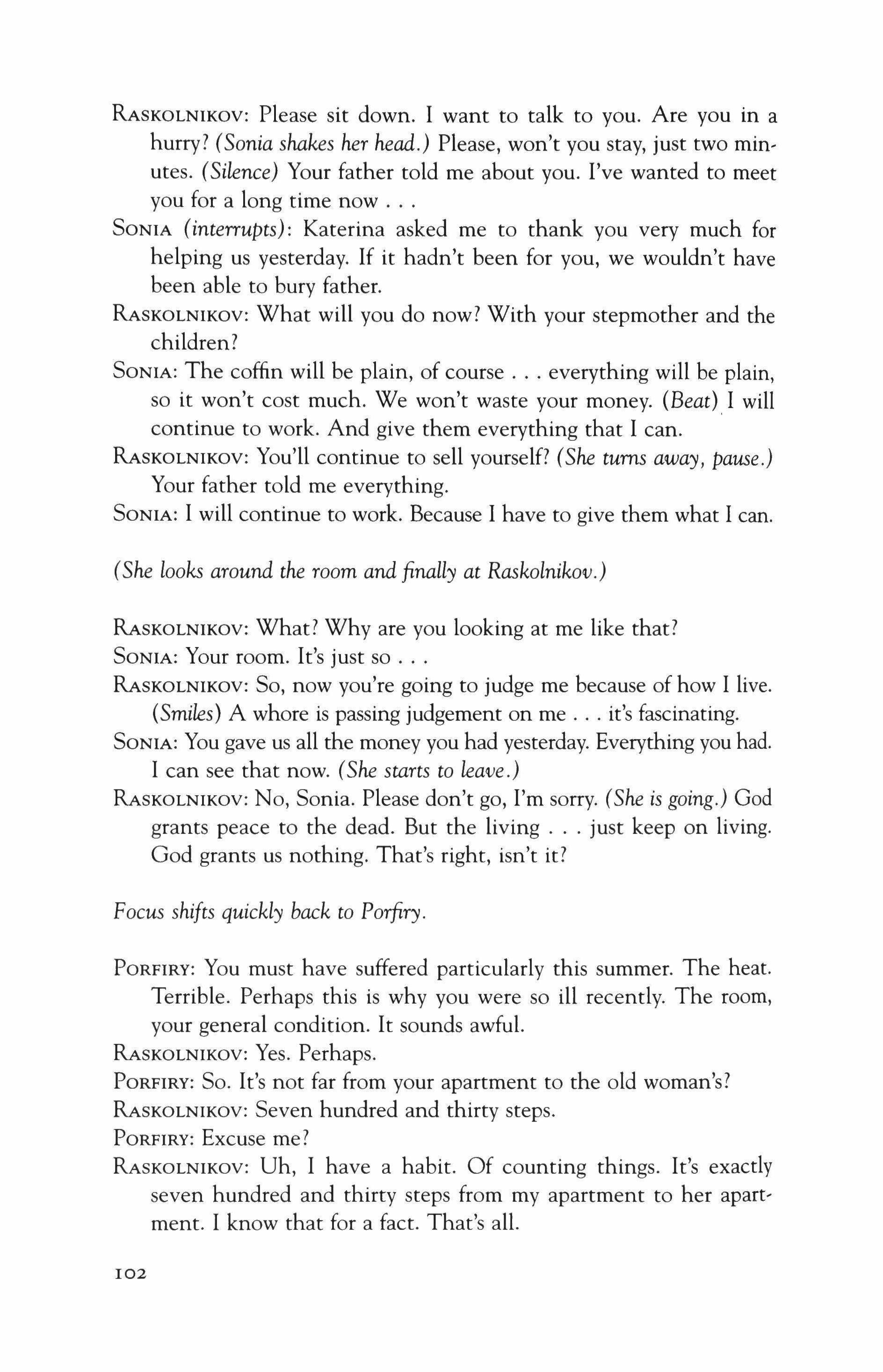
RASKOLNIKOV: Please sit down. I want to talk to you. Are you in a hurry? (Sonia shakes her head.) Please, won't you stay, just two minutes. (Silence) Your father told me about you. I've wanted to meet you for a long time now
SONIA (interrupts): Katerina asked me to thank you very much for helping us yesterday. If it hadn't been for you, we wouldn't have been able to bury father.
RASKOLNIKOV: What will you do now? With your stepmother and the children?
SONIA: The coffin will be plain, of course everything will be plain, so it won't cost much. We won't waste your money. (Beat}I will continue to work. And give them everything that I can.
RASKOLNIKOV: You'll continue to sell yourself? (She turns away, pause.) Your father told me everything.
SONIA: I will continue to work. Because I have to give them what I can.
(She looks around the room and finally at Raskolnikov.)
RASKOLNIKOV: What? Why are you looking at me like that?
SONIA: Your room. It's just so
RASKOLNIKOV: So, now you're going to judge me because of how I live. (Smiles) A whore is passing judgement on me it's fascinating.
SONIA: You gave us all the money you had yesterday. Everything you had. I can see that now. (She starts to leave.)
RASKOLNIKOV: No, Sonia. Please don't go, I'm sorry. (She is going.) God grants peace to the dead. But the living just keep on living. God grants us nothing. That's right, isn't it?
Focus shifts quickly back to Porfiry.
PORFIRY: You must have suffered particularly this summer. The heat. Terrible. Perhaps this is why you were so ill recently. The room, your general condition. It sounds awful.
RASKOLNIKOV: Yes. Perhaps.
PORFIRY: So. It's not far from your apartment to the old woman's?
RASKOLNIKOV: Seven hundred and thirty steps.
PORFIRY: Excuse me?
RASKOLNIKOV: Uh, I have a habit. Of counting things. It's exactly seven hundred and thirty steps from my apartment to her apartment. I know that for a fact. That's all.
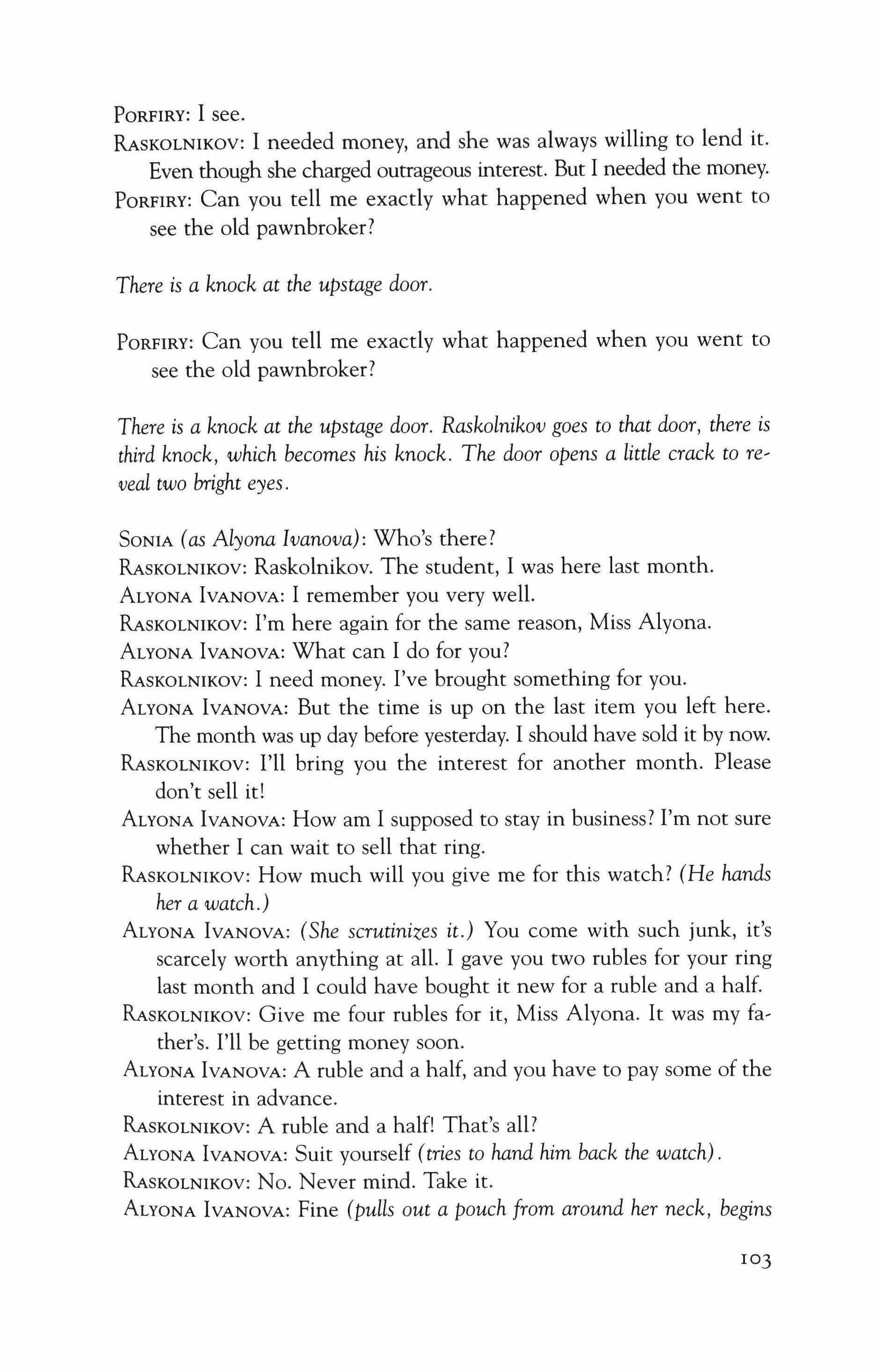
PORFIRY: I see.
RASKOLNIKOV: I needed money, and she was always willing to lend it. Even though she charged outrageous interest. But I needed the money.
PORFIRY: Can you tell me exactly what happened when you went to see the old pawnbroker?
There is a knock at the upstage door.
PORFIRY: Can you tell me exactly what happened when you went to see the old pawnbroker?
There is a knock at the upstage door. Raskolnikov goes to that door, there is third knock, which becomes his knock. The door opens a little crack to reveal two bright eyes.
SONIA (as Alyona Ivanova): Who's there?
RASKOLNIKOV: Raskolnikov. The student, I was here last month.
ALYONA IVANOVA: I remember you very well.
RASKOLNIKOV: I'm here again for the same reason, Miss Alyona.
ALYONA IVANOVA: What can I do for you?
RASKOLNIKOV: I need money. I've brought something for you.
ALYONA IVANOVA: But the time is up on the last item you left here. The month was up day before yesterday. I should have sold it by now.
RASKOLNIKOV: I'll bring you the interest for another month. Please don't sell it!
ALYONA IVANOVA: How am I supposed to stay in business? I'm not sure whether I can wait to sell that ring.
RASKOLNIKOV: How much will you give me for this watch? (He hands her a watch.)
ALYONA IVANOVA: (She scrutinizes it.) You come with such junk, it's scarcely worth anything at all. I gave you two rubles for your ring last month and I could have bought it new for a ruble and a half.
RASKOLNIKOV: Give me four rubles for it, Miss Alyona. It was my father's. I'll be getting money soon.
ALYONA IVANOVA: A ruble and a half, and you have to pay some of the interest in advance.
RASKOLNIKOV: A ruble and a half! That's all?
ALYONA IVANOVA: Suit yourself (tries to hand him back the watch).
RASKOLNIKOV: No. Never mind. Take it.
ALYONA IVANOVA: Fine (pulls out a pouch from around her neck, begins
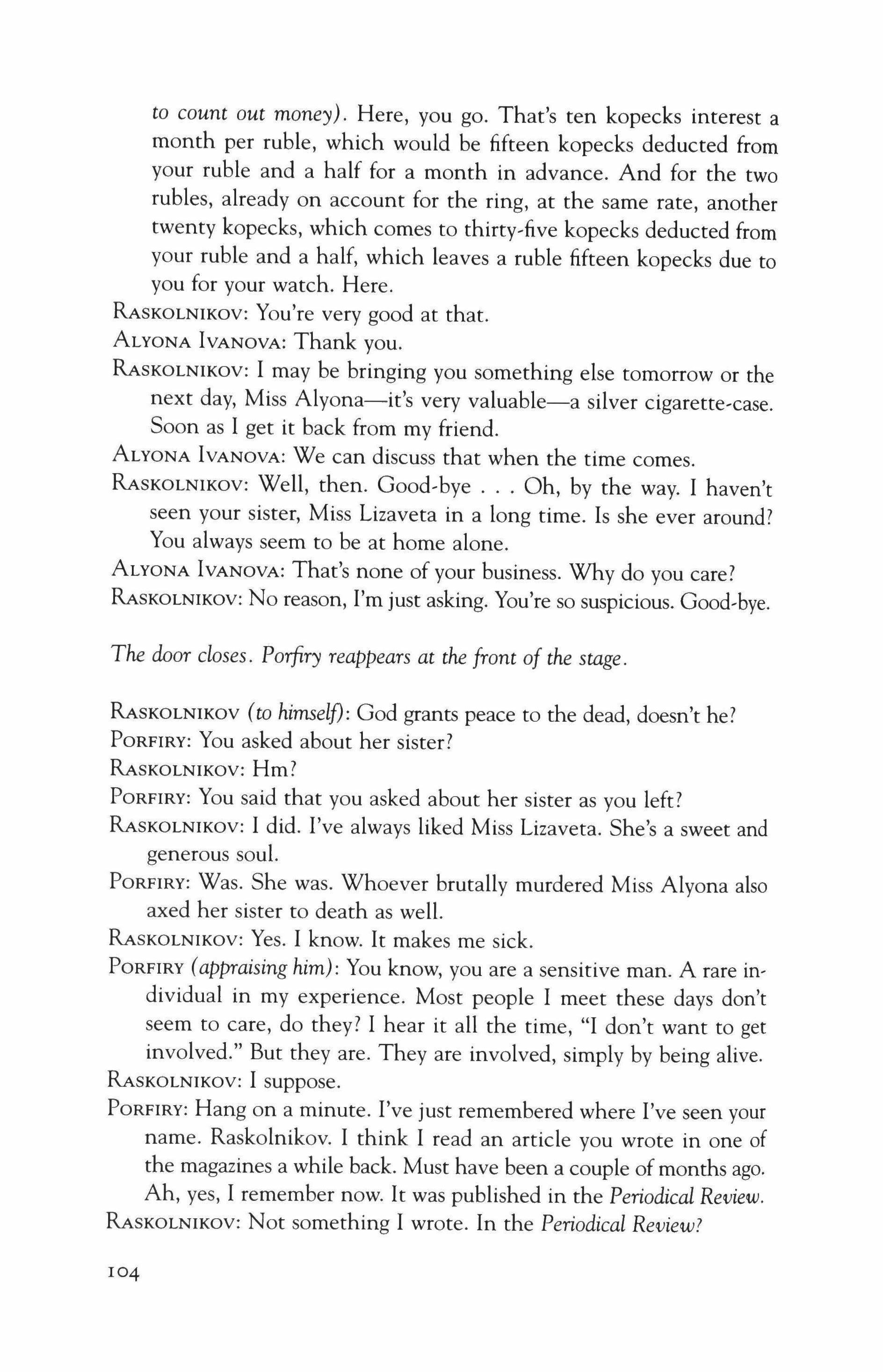
to count out money). Here, you go. That's ten kopecks interest a month per ruble, which would be fifteen kopecks deducted from your ruble and a half for a month in advance. And for the two rubles, already on account for the ring, at the same rate, another twenty kopecks, which comes to thirty-five kopecks deducted from your ruble and a half, which leaves a ruble fifteen kopecks due to you for your watch. Here.
RASKOLNIKOV: You're very good at that.
ALYONA I VANOVA: Thank you.
RASKOLNIKOV: I may be bringing you something else tomorrow or the next day, Miss Alyona-it's very valuable-a silver cigarette-case. Soon as I get it back from my friend.
ALYONA IVANovA: We can discuss that when the time comes.
RASKOLNIKOV: Well, then. Good-bye Oh, by the way. I haven't seen your sister, Miss Lizaveta in a long time. Is she ever around? You always seem to be at home alone.
ALYONA IVANovA: That's none of your business. Why do you care?
RASKOLNIKOV: No reason, I'm just asking. You're so suspicious. Good-bye.
The door closes. Porfiry reappears at the front of the stage.
RASKOLNIKOV (to himself): God grants peace to the dead, doesn't he?
PORFIRY: You asked about her sister?
RASKOLNIKOV: Hm?
PORFIRY: You said that you asked about her sister as you left?
RASKOLNIKOV: I did. I've always liked Miss Lizaveta. She's a sweet and generous soul.
PORFIRY: Was. She was. Whoever brutally murdered Miss Alyona also axed her sister to death as well.
RASKOLNIKOV: Yes. I know. It makes me sick.
PORFIRY (appraising him): You know, you are a sensitive man. A rare individual in my experience. Most people I meet these days don't seem to care, do they? I hear it all the time, "I don't want to get involved." But they are. They are involved, simply by being alive.
RASKOLNIKOV: I suppose.
PORFIRY: Hang on a minute. I've just remembered where I've seen your name. Raskolnikov. I think I read an article you wrote in one of the magazines a while back. Must have been a couple of months ago. Ah, yes, I remember now. It was published in the Periodical Review.
RASKOLNIKOV: Not something I wrote. In the Periodical Review?
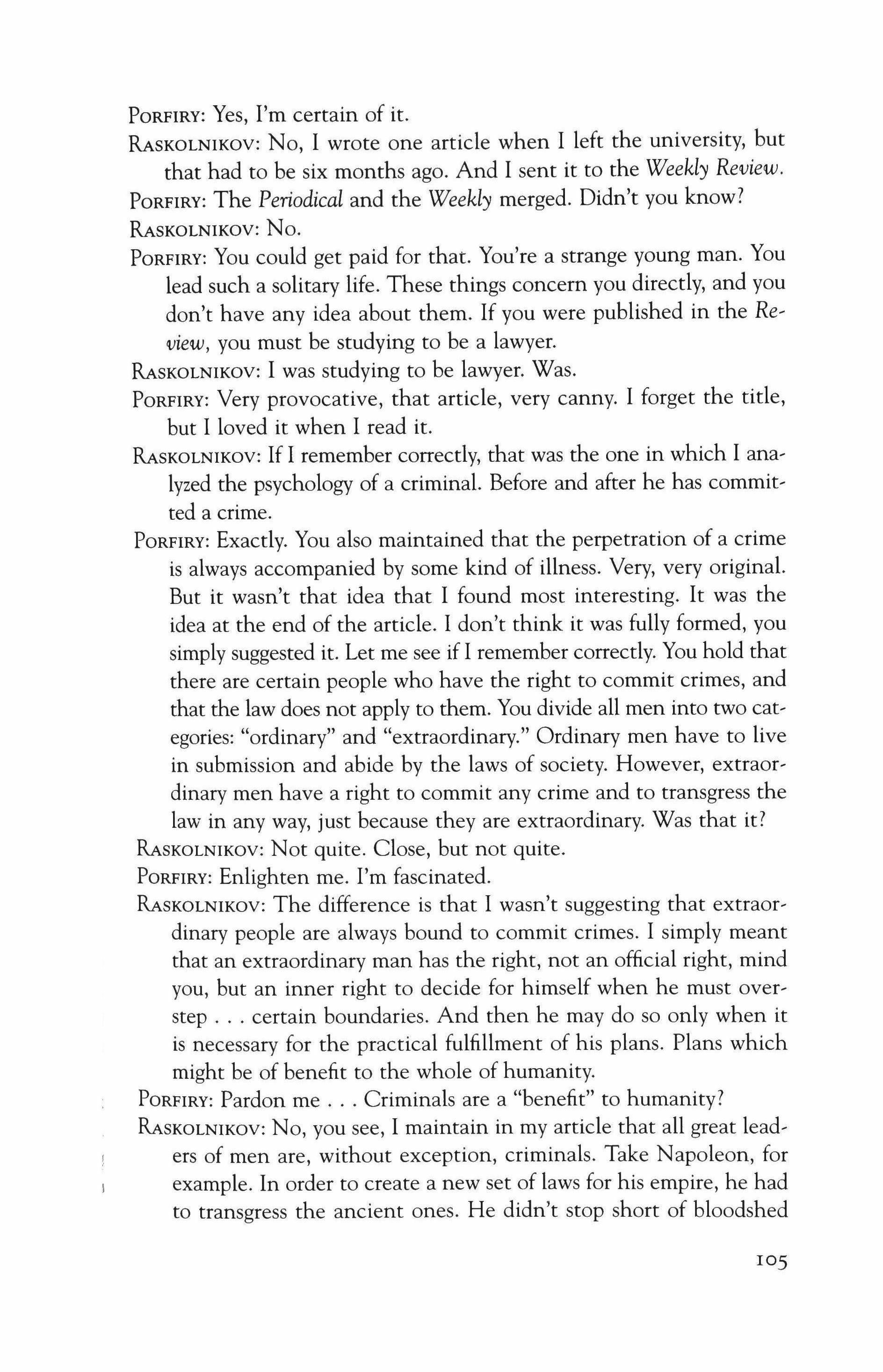
PORFIRY: Yes, I'm certain of it.
RASKOLNIKOV: No, I wrote one article when I left the university, but that had to be six months ago. And I sent it to the Weekly Review.
PORFIRY: The Periodical and the Weekly merged. Didn't you know?
RASKOLNIKOV: No.
PORFIRY: You could get paid for that. You're a strange young man. You lead such a solitary life. These things concern you directly, and you don't have any idea about them. If you were published in the Re� view, you must be studying to be a lawyer.
RASKOLNIKOV: I was studying to be lawyer. Was.
PORFIRY: Very provocative, that article, very canny. I forget the title, but I loved it when I read it.
RASKOLNIKOV: If I remember correctly, that was the one in which I analyzed the psychology of a criminal. Before and after he has committed a crime.
PORFIRY: Exactly. You also maintained that the perpetration of a crime is always accompanied by some kind of illness. Very, very original. But it wasn't that idea that I found most interesting. It was the idea at the end of the article. I don't think it was fully formed, you simply suggested it. Let me see if I remember correctly. You hold that there are certain people who have the right to commit crimes, and that the law does not apply to them. You divide all men into two cat� egories: "ordinary" and "extraordinary." Ordinary men have to live in submission and abide by the laws of society. However, extraordinary men have a right to commit any crime and to transgress the law in any way, just because they are extraordinary. Was that it?
RASKOLNIKOV: Not quite. Close, but not quite.
PORFIRY: Enlighten me. I'm fascinated.
RASKOLNIKOV: The difference is that I wasn't suggesting that extraordinary people are always bound to commit crimes. I simply meant that an extraordinary man has the right, not an official right, mind you, but an inner right to decide for himself when he must overstep certain boundaries. And then he may do so only when it is necessary for the practical fulfillment of his plans. Plans which might be of benefit to the whole of humanity.
PORFIRY: Pardon me Criminals are a "benefit" to humanity?
RASKOLNIKOV: No, you see, I maintain in my article that all great leaders of men are, without exception, criminals. Take Napoleon, for example. In order to create a new set of laws for his empire, he had to transgress the ancient ones. He didn't stop short of bloodshed
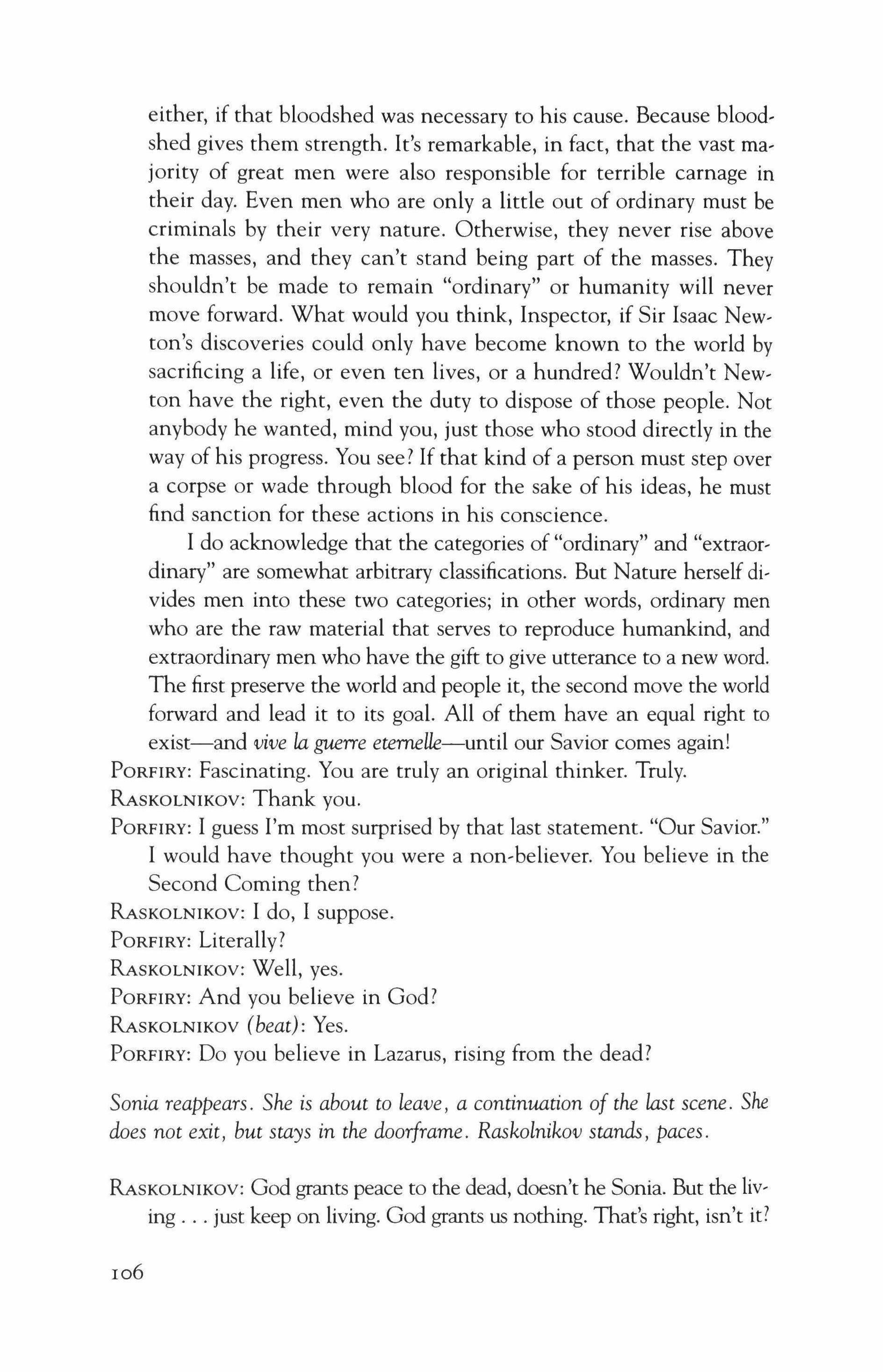
either, if that bloodshed was necessary to his cause. Because bloodshed gives them strength. It's remarkable, in fact, that the vast majority of great men were also responsible for terrible carnage in their day. Even men who are only a little out of ordinary must be criminals by their very nature. Otherwise, they never rise above the masses, and they can't stand being part of the masses. They shouldn't be made to remain "ordinary" or humanity will never move forward. What would you think, Inspector, if Sir Isaac Newton's discoveries could only have become known to the world by sacrificing a life, or even ten lives, or a hundred? Wouldn't Newton have the right, even the duty to dispose of those people. Not anybody he wanted, mind you, just those who stood directly in the way of his progress. You see? If that kind of a person must step over a corpse or wade through blood for the sake of his ideas, he must find sanction for these actions in his conscience.
I do acknowledge that the categories of "ordinary" and "extraordinary" are somewhat arbitrary classifications. But Nature herself divides men into these two categories; in other words, ordinary men who are the raw material that serves to reproduce humankind, and extraordinary men who have the gift to give utterance to a new word. The first preserve the world and people it, the second move the world forward and lead it to its goal. All of them have an equal right to exist-and vive la guerte etemelIe-until our Savior comes again!
PORFIRY: Fascinating. You are truly an original thinker. Truly.
RASKOLNIKOV: Thank you.
PORFIRY: I guess I'm most surprised by that last statement. "Our Savior." I would have thought you were a non-believer. You believe in the Second Coming then?
RASKOLNIKOV: I do, I suppose.
PORFIRY: Literally?
RASKOLNIKOV: Well, yes.
PORFIRY: And you believe in God?
RASKOLNIKOV (beat): Yes.
PORFIRY: Do you believe in Lazarus, rising from the dead?
Sonia reappears. She is about to leave, a continuation of the last scene. She does not exit, but stays in the doorframe. Raskolnikov stands, paces.
RASKOLNIKOV: God grants peace to the dead, doesn't he Sonia. But the living just keep on living. God grants us nothing. That's right, isn't it?
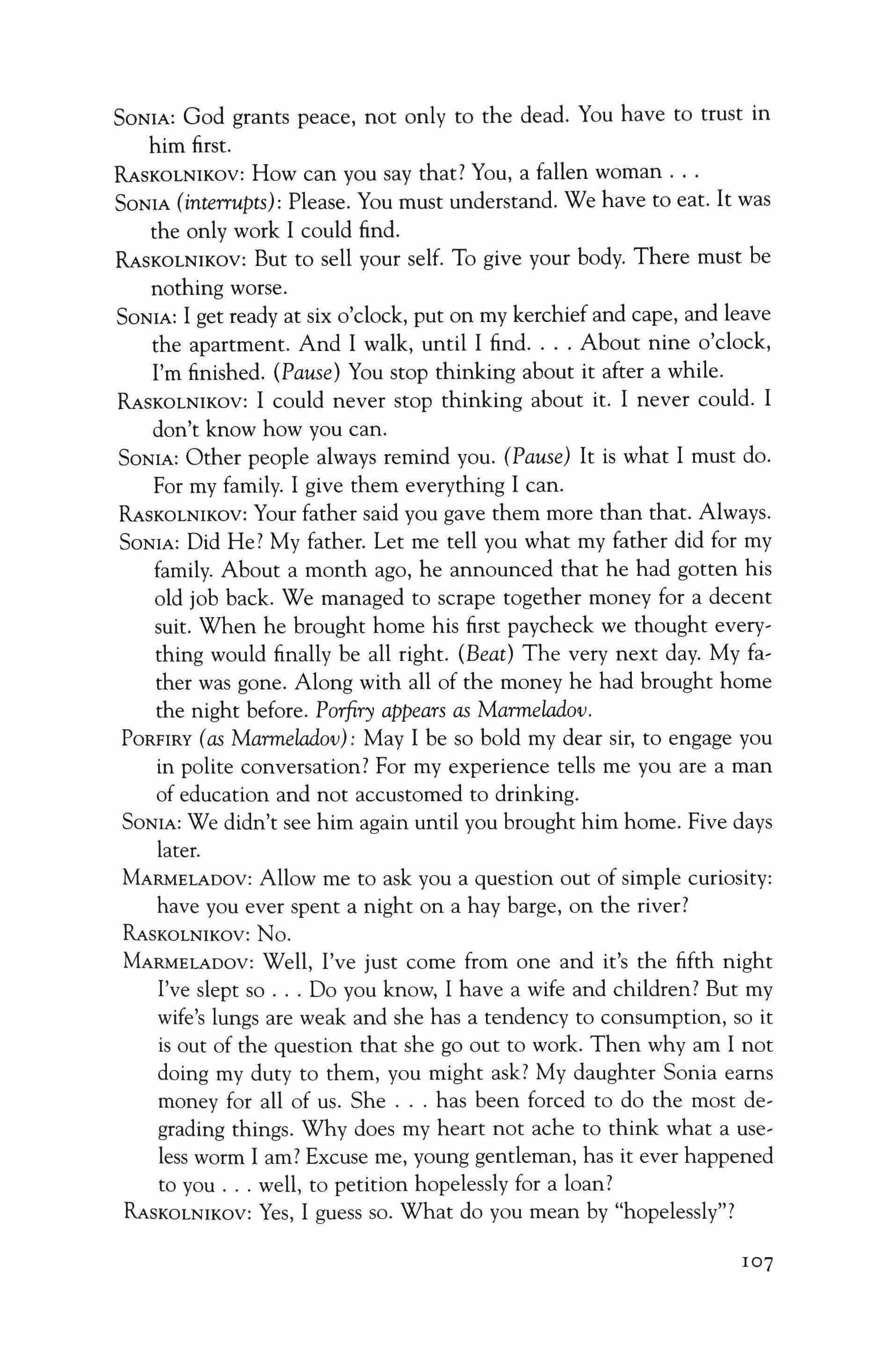
SONIA: God grants peace, not only to the dead. You have to trust in him first.
RASKOLNIKOV: How can you say that? You, a fallen woman
SONIA (interrupts): Please. You must understand. We have to eat. It was the only work I could find.
RASKOLNIKOV: But to sell your self. To give your body. There must be nothing worse.
SONIA: I get ready at six o'clock, put on my kerchief and cape, and leave the apartment. And I walk, until I find About nine o'clock, I'm finished. (Pause) You stop thinking about it after a while.
RASKOLNIKOV: I could never stop thinking about it. I never could. I don't know how you can.
SONIA: Other people always remind you. (Pause) It is what I must do. For my family. I give them everything I can.
RASKOLNIKOV: Your father said you gave them more than that. Always.
SONIA: Did He? My father. Let me tell you what my father did for my family. About a month ago, he announced that he had gotten his old job back. We managed to scrape together money for a decent suit. When he brought home his first paycheck we thought everything would finally be all right. (Beat) The very next day. My father was gone. Along with all of the money he had brought home the night before. Porfiry appears as Marmeladov.
PORFIRY (as Marmeladov): May I be so bold my dear sir, to engage you in polite conversation? For my experience tells me you are a man of education and not accustomed to drinking.
SONIA: We didn't see him again until you brought him home. Five days later.
MARMELADOV: Allow me to ask you a question out of simple curiosity: have you ever spent a night on a hay barge, on the river?
RASKOLNIKOV: No.
MARMELADOV: Well, I've just come from one and it's the fifth night I've slept so Do you know, I have a wife and children? But my wife's lungs are weak and she has a tendency to consumption, so it is out of the question that she go out to work. Then why am I not doing my duty to them, you might ask? My daughter Sonia earns money for all of us. She has been forced to do the most degrading things. Why does my heart not ache to think what a useless worm I am? Excuse me, young gentleman, has it ever happened to you well, to petition hopelessly for a loan?
RASKOLNIKOV: Yes, I guess so. What do you mean by "hopelessly"?
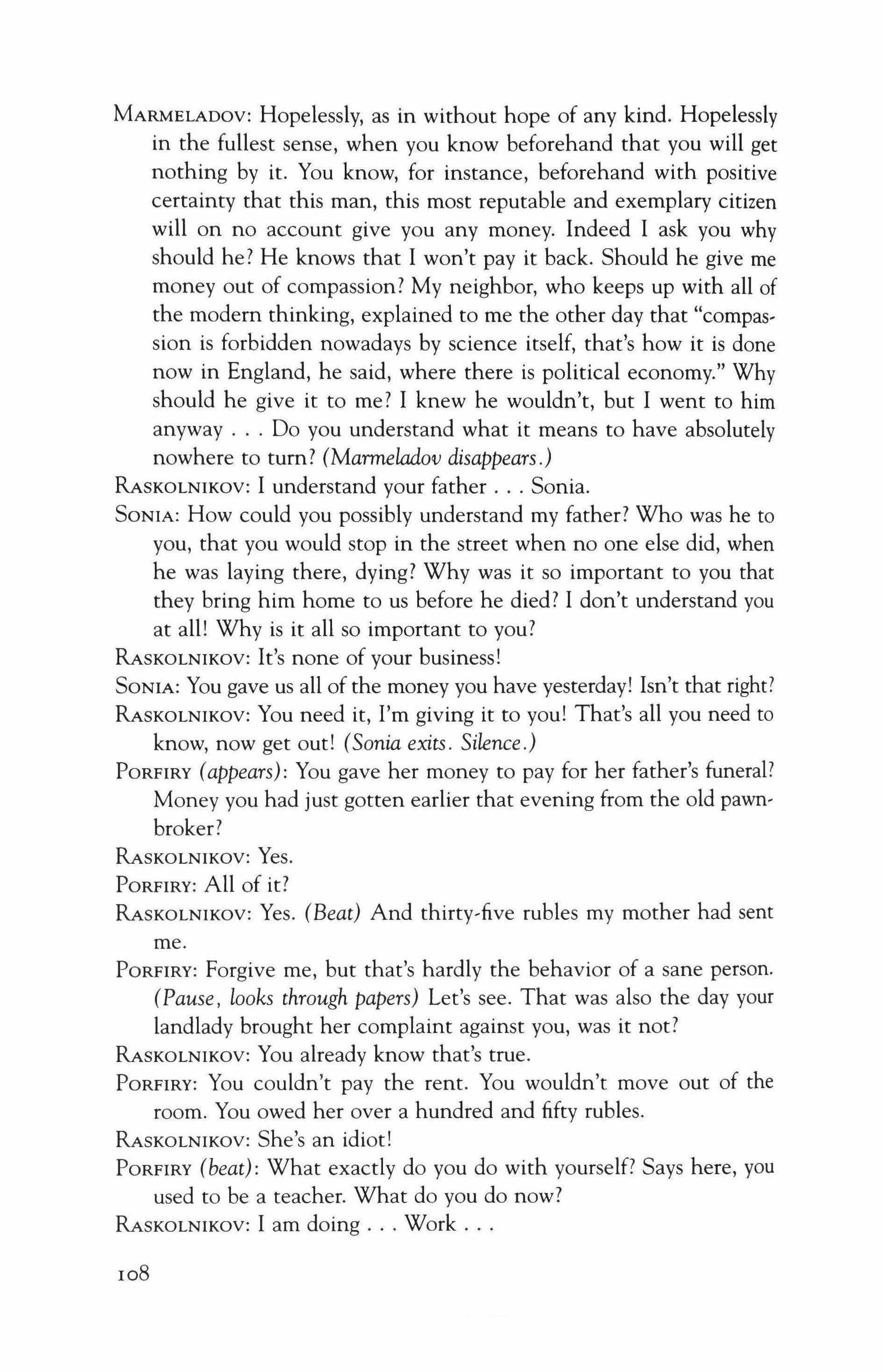
MARMELADOV: Hopelessly, as in without hope of any kind. Hopelessly in the fullest sense, when you know beforehand that you will get nothing by it. You know, for instance, beforehand with positive certainty that this man, this most reputable and exemplary citizen will on no account give you any money. Indeed I ask you why should he? He knows that I won't pay it back. Should he give me money out of compassion? My neighbor, who keeps up with all of the modern thinking, explained to me the other day that "compassion is forbidden nowadays by science itself, that's how it is done now in England, he said, where there is political economy." Why should he give it to me? I knew he wouldn't, but I went to him anyway Do you understand what it means to have absolutely nowhere to turn? (Marmeladov disappears.)
RASKOLNIKOV: I understand your father Sonia.
SONIA: How could you possibly understand my father? Who was he to you, that you would stop in the street when no one else did, when he was laying there, dying? Why was it so important to you that they bring him home to us before he died? I don't understand you at all! Why is it all so important to you?
RASKOLNIKOV: It's none of your business!
SONIA: You gave us all of the money you have yesterday! Isn't that right?
RASKOLNIKOV: You need it, I'm giving it to you! That's all you need to know, now get out! (Sonia exits. Silence.)
PORFIRY (appears): You gave her money to pay for her father's funeral? Money you had just gotten earlier that evening from the old pawnbroker?
RASKOLNIKOV: Yes.
PORFIRY: All of it?
RASKOLNIKOV: Yes. (Beat) And thirty-five rubles my mother had sent me.
PORFIRY: Forgive me, but that's hardly the behavior of a sane person. (Pause, looks through papers) Let's see. That was also the day your landlady brought her complaint against you, was it not?
RASKOLNIKOV: You already know that's true.
PORFIRY: You couldn't pay the rent. You wouldn't move out of the room. You owed her over a hundred and fifty rubles.
RASKOLNIKOV: She's an idiot!
PORFIRY (beat): What exactly do you do with yourself? Says here, you used to be a teacher. What do you do now?
RASKOLNIKOV: I am doing Work
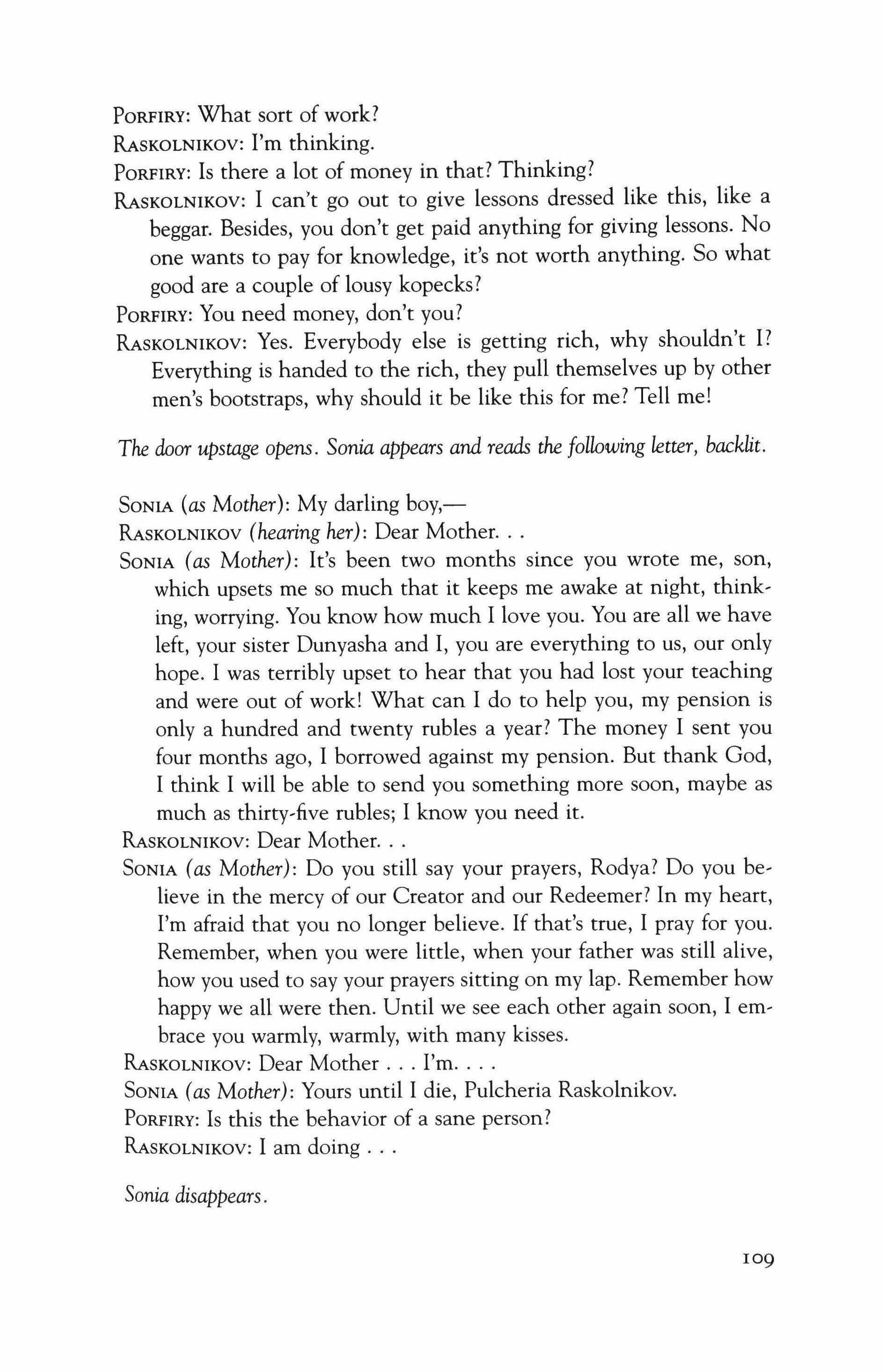
PORFIRY: What sort of work?
RASKOLNIKOV: I'm thinking.
PORFIRY: Is there a lot of money in that? Thinking?
RASKOLNIKOV: I can't go out to give lessons dressed like this, like a beggar. Besides, you don't get paid anything for giving lessons. No one wants to pay for knowledge, it's not worth anything. So what good are a couple of lousy kopecks?
PORFIRY: You need money, don't you?
RASKOLNIKOV: Yes. Everybody else is getting rich, why shouldn't I? Everything is handed to the rich, they pull themselves up by other men's bootstraps, why should it be like this for me? Tell me!
The door upstage opens. Sonia appears and reads the following letter, backlit.
SONIA (as Mother): My darling boy,
RASKOLNIKOV (hearing her): Dear Mother
SONIA (as Mother): It's been two months since you wrote me, son, which upsets me so much that it keeps me awake at night, thinking, worrying. You know how much I love you. You are all we have left, your sister Dunyasha and I, you are everything to us, our only hope. I was terribly upset to hear that you had lost your teaching and were out of work! What can I do to help you, my pension is only a hundred and twenty rubles a year? The money I sent you four months ago, I borrowed against my pension. But thank God, I think I will be able to send you something more soon, maybe as much as thirty-five rubles; I know you need it.
RASKOLNIKOV: Dear Mother
SONIA (as Mother): Do you still say your prayers, Rodya? Do you believe in the mercy of our Creator and our Redeemer? In my heart, I'm afraid that you no longer believe. If that's true, I pray for you. Remember, when you were little, when your father was still alive, how you used to say your prayers sitting on my lap. Remember how happy we all were then. Until we see each other again soon, I ernbrace you warmly, warmly, with many kisses.
RASKOLNIKOV: Dear Mother I'm
SONIA (as Mother): Yours until I die, Pulcheria Raskolnikov.
PORFIRY: Is this the behavior of a sane person?
RASKOLNIKOV: I am doing
Sonia disappears.
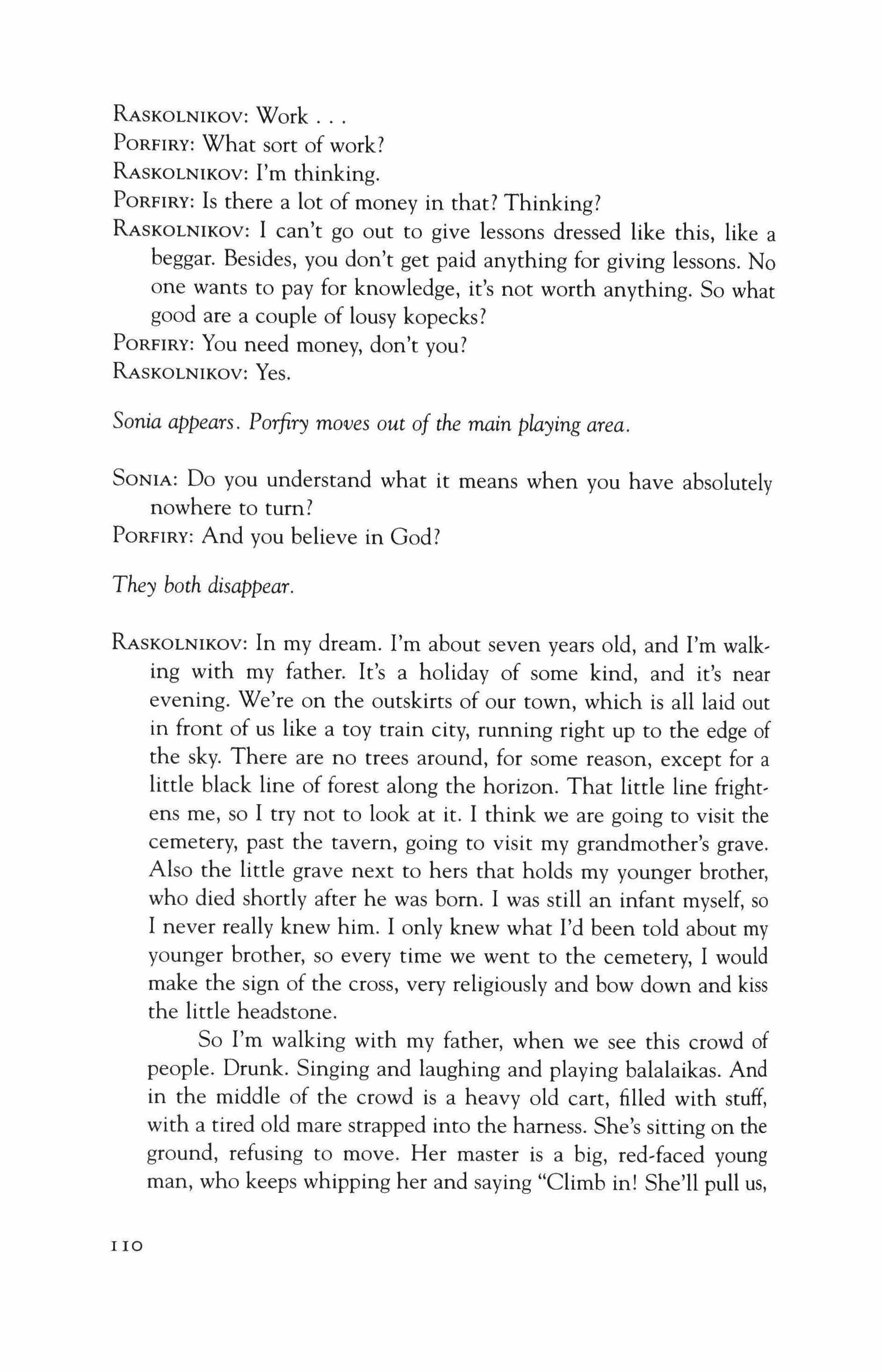
RASKOLNIKOV: Work
PORFIRY: What sort of work?
RASKOLNIKOV: I'm thinking.
PORFIRY: Is there a lot of money in that? Thinking?
RASKOLNIKOV: I can't go out to give lessons dressed like this, like a beggar. Besides, you don't get paid anything for giving lessons. No one wants to pay for knowledge, it's not worth anything. So what good are a couple of lousy kopecks?
PORFIRY: You need money, don't you?
RASKOLNIKOV: Yes.
Sonia appears. Porf1ry moves out of the main playing area.
SONIA: Do you understand what it means when you have absolutely nowhere to tum?
PORFIRY: And you believe in God?
They both disappear.
RASKOLNIKOV: In my dream. I'm about seven years old, and I'm walking with my father. It's a holiday of some kind, and it's near evening. We're on the outskirts of our town, which is all laid out in front of us like a toy train city, running right up to the edge of the sky. There are no trees around, for some reason, except for a little black line of forest along the horizon. That little line frightens me, so I try not to look at it. I think we are going to visit the cemetery, past the tavern, going to visit my grandmother's grave. Also the little grave next to hers that holds my younger brother, who died shortly after he was born. I was still an infant myself, so I never really knew him. I only knew what I'd been told about my younger brother, so every time we went to the cemetery, I would make the sign of the cross, very religiously and bow down and kiss the little headstone.
So I'm walking with my father, when we see this crowd of people. Drunk. Singing and laughing and playing balalaikas. And in the middle of the crowd is a heavy old cart, filled with stuff, with a tired old mare strapped into the harness. She's sitting on the ground, refusing to move. Her master is a big, red-faced young man, who keeps whipping her and saying "Climb in! She'll pull us,
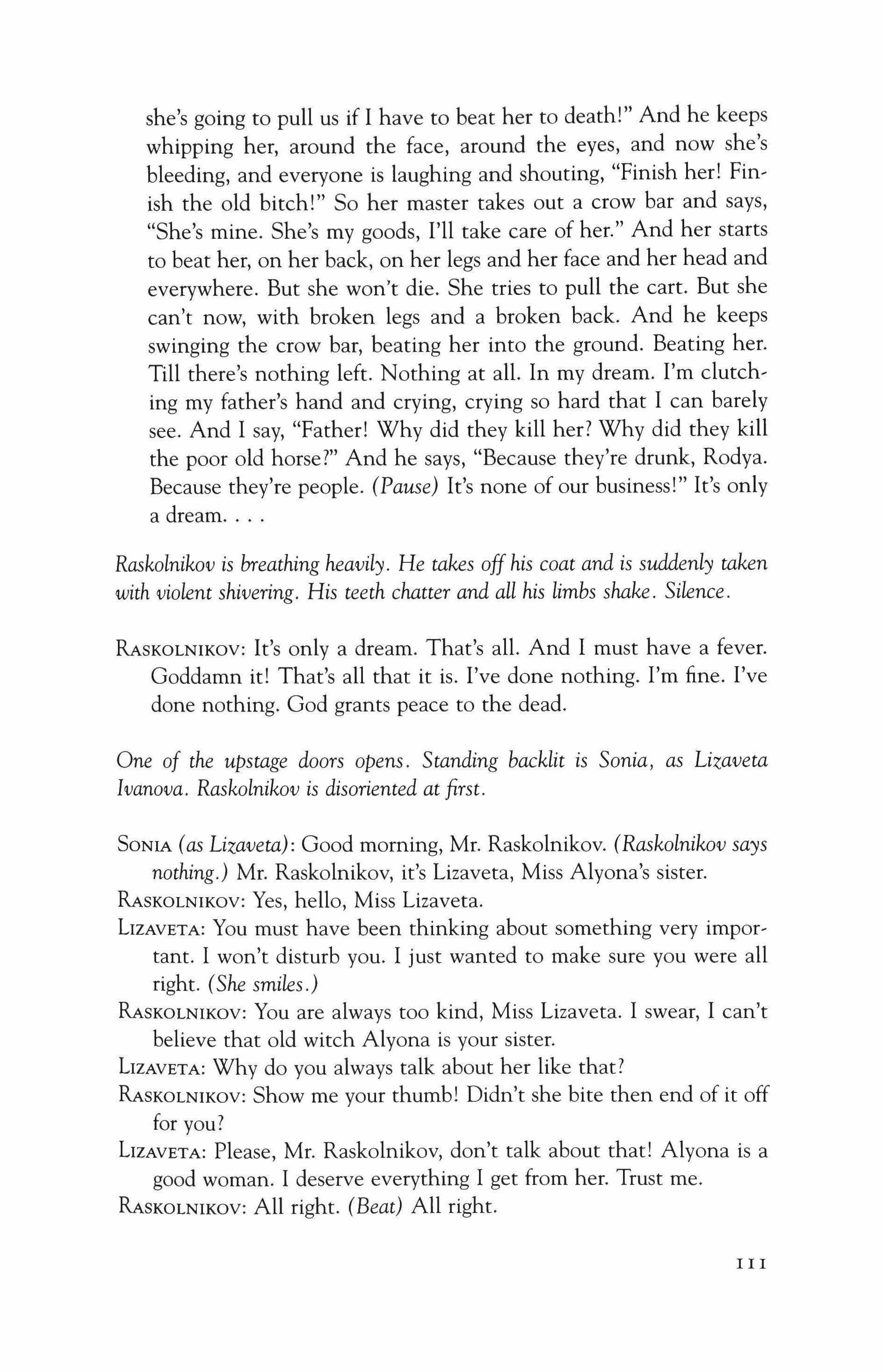
she's going to pull us if I have to beat her to death!" And he keeps whipping her, around the face, around the eyes, and now she's bleeding, and everyone is laughing and shouting, "Finish her! Finish the old bitch!" So her master takes out a crow bar and says, "She's mine. She's my goods, I'll take care of her." And her starts to beat her, on her back, on her legs and her face and her head and everywhere. But she won't die. She tries to pull the cart. But she can't now, with broken legs and a broken back. And he keeps swinging the crow bar, beating her into the ground. Beating her. Till there's nothing left. Nothing at all. In my dream. I'm clutching my father's hand and crying, crying so hard that I can barely see. And I say, "Father! Why did they kill her? Why did they kill the poor old horse?" And he says, "Because they're drunk, Rodya. Because they're people. (Pause) It's none of our business!" It's only a dream
Raskolnikov is breathing heavily. He takes off his coat and is suddenly taken with violent shivering. His teeth chatter and all his limbs shake. Silence.
RASKOLNIKOV: It's only a dream. That's all. And I must have a fever. Goddamn it! That's all that it is. I've done nothing. I'm fine. I've done nothing. God grants peace to the dead.
One of the upstage doors opens. Standing backlit is Sonia, as Lizaveta Ivanova. Raskolnikov is disoriented at first.
SONIA (as Lizaveta): Good morning, Mr. Raskolnikov, (Raskolnikov says nothing.) Mr. Raskolnikov, it's Lizaveta, Miss Alyona's sister.
RASKOLNIKOV: Yes, hello, Miss Lizaveta.
LIZAVETA: You must have been thinking about something very important. I won't disturb you. I just wanted to make sure you were all right. (She smiles.)
RASKOLNIKOV: You are always too kind, Miss Lizaveta. I swear, I can't believe that old witch Alyona is your sister.
L!zAVETA: Why do you always talk about her like that?
RASKOLNIKOV: Show me your thumb! Didn't she bite then end of it off for you?
LIZAVETA: Please, Mr. Raskolnikov, don't talk about that! Alyona is a good woman. I deserve everything I get from her. Trust me.
RASKOLNIKOV: All right. (Beat) All right.
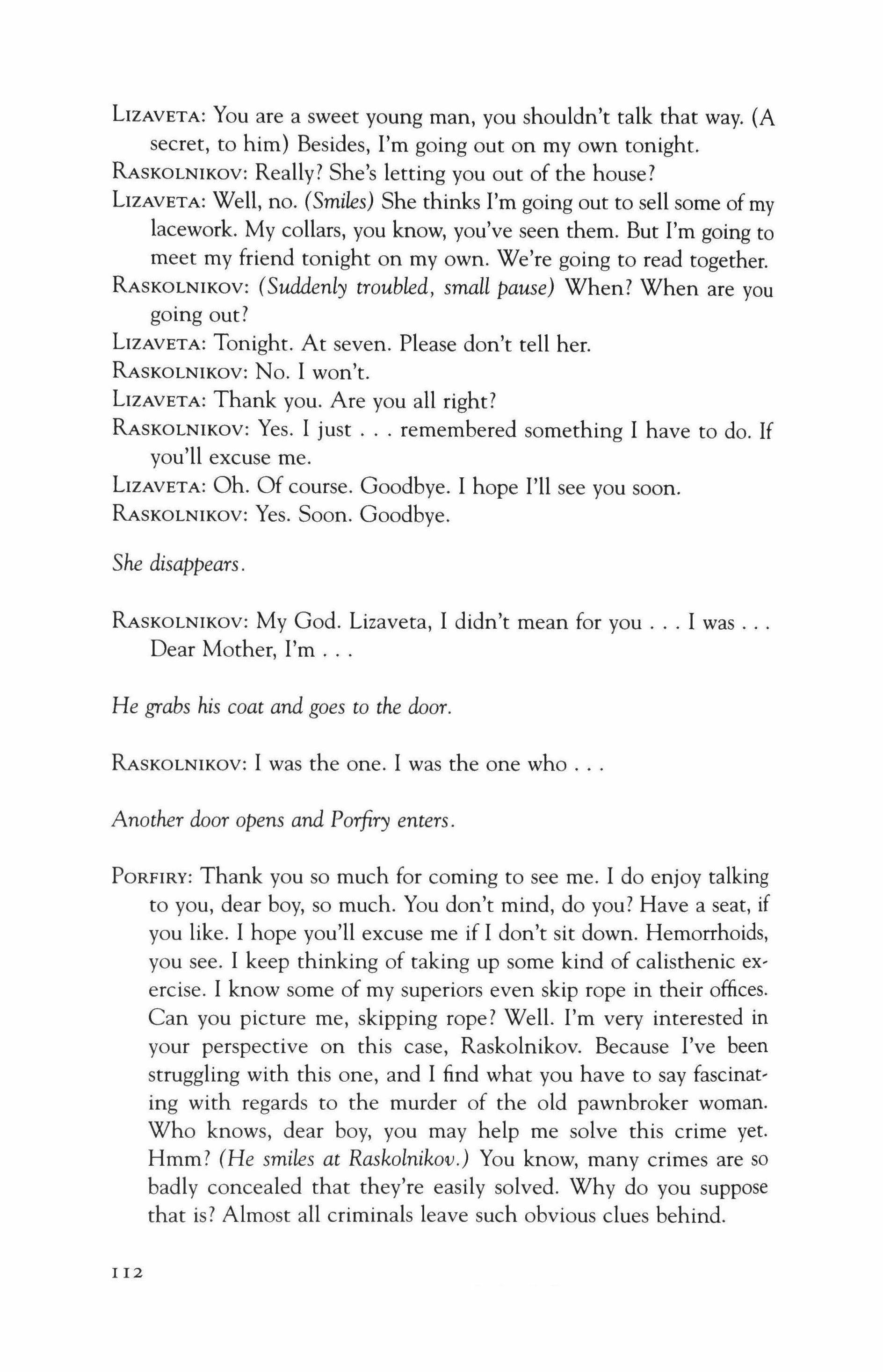
LIZAVETA: You are a sweet young man, you shouldn't talk that way. (A secret, to him) Besides, I'm going out on my own tonight.
RASKOLNIKOV: Really? She's letting you out of the house?
LIZAVETA: Well, no. (Smiles) She thinks I'm going out to sell some of my lacework. My collars, you know, you've seen them. But I'm going to meet my friend tonight on my own. We're going to read together.
RASKOLNIKOV: (Suddenly troubled, small pause) When? When are you going out?
LIZAVETA: Tonight. At seven. Please don't tell her.
RASKOLNIKOV: No. I won't.
LIZAVETA: Thank you. Are you all right?
RASKOLNIKOV: Yes. I just remembered something I have to do. If you'll excuse me.
LIZAVETA: Oh. Of course. Goodbye. I hope I'll see you soon.
RASKOLNIKOV: Yes. Soon. Goodbye.
She disappears.
RASKOLNIKOV: My God. Lizaveta, I didn't mean for you I was Dear Mother, I'm
He grabs his coat and goes to the door.
RASKOLNIKOV: I was the one. I was the one who
Another door opens and Porfiry enters.
PORFIRY: Thank you so much for coming to see me. I do enjoy talking to you, dear boy, so much. You don't mind, do you? Have a seat, if you like. I hope you'll excuse me if I don't sit down. Hemorrhoids, you see. I keep thinking of taking up some kind of calisthenic exercise. I know some of my superiors even skip rope in their offices. Can you picture me, skipping rope? Well. I'm very interested in your perspective on this case, Raskolnikov. Because I've been struggling with this one, and I find what you have to say fascinating with regards to the murder of the old pawnbroker woman. Who knows, dear boy, you may help me solve this crime yet. Hmm? (He smiles at Raskolnikov.) You know, many crimes are so badly concealed that they're easily solved. Why do you suppose that is? Almost all criminals leave such obvious clues behind.
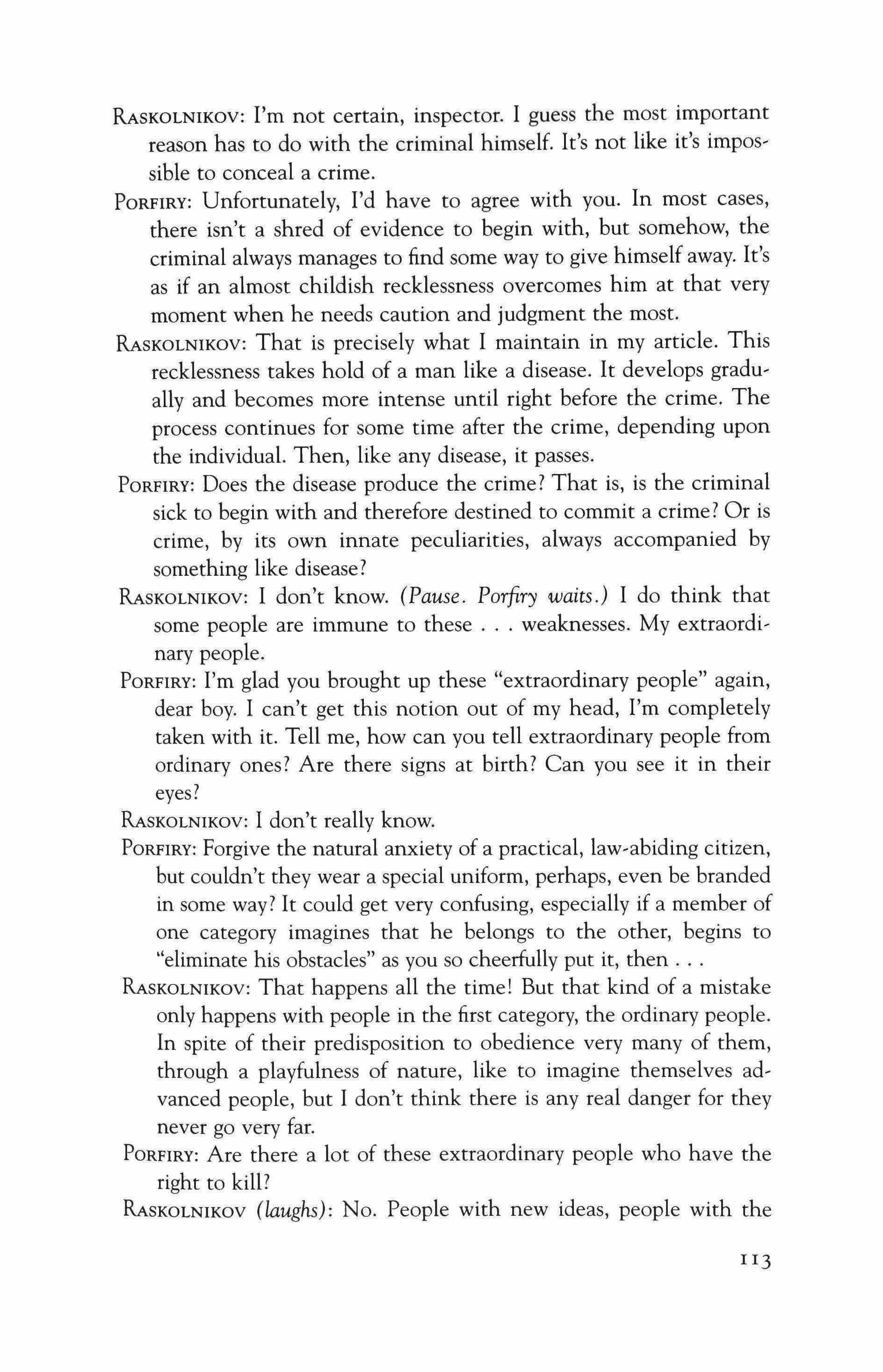
RASKOLNIKOV: I'm not certain, inspector. I guess the most important reason has to do with the criminal himself. It's not like it's impossible to conceal a crime.
PORFIRY: Unfortunately, I'd have to agree with you. In most cases, there isn't a shred of evidence to begin with, but somehow, the criminal always manages to find some way to give himself away. It's as if an almost childish recklessness overcomes him at that very moment when he needs caution and judgment the most.
RASKOLNIKOV: That is precisely what I maintain in my article. This recklessness takes hold of a man like a disease. It develops gradually and becomes more intense until right before the crime. The process continues for some time after the crime, depending upon the individual. Then, like any disease, it passes.
PORFIRY: Does the disease produce the crime? That is, is the criminal sick to begin with and therefore destined to commit a crime? Or is crime, by its own innate peculiarities, always accompanied by something like disease?
RASKOLNIKOV: I don't know. (Pause. Porfiry waits.) I do think that some people are immune to these weaknesses. My extraordinary people.
PORFIRY: I'm glad you brought up these "extraordinary people" again, dear boy. I can't get this notion out of my head, I'm completely taken with it. Tell me, how can you tell extraordinary people from ordinary ones? Are there signs at birth? Can you see it in their eyes?
RASKOLNIKOV: I don't really know.
PORFIRY: Forgive the natural anxiety of a practical, law-abiding citizen, but couldn't they wear a special uniform, perhaps, even be branded in some way? It could get very confusing, especially if a member of one category imagines that he belongs to the other, begins to "eliminate his obstacles" as you so cheerfully put it, then
RASKOLNIKOV: That happens all the time! But that kind of a mistake only happens with people in the first category, the ordinary people. In spite of their predisposition to obedience very many of them, through a playfulness of nature, like to imagine themselves advanced people, but I don't think there is any real danger for they never go very far.
PORFIRY: Are there a lot of these extraordinary people who have the right to kill?
RASKOLNIKOV (laughs): No. People with new ideas, people with the
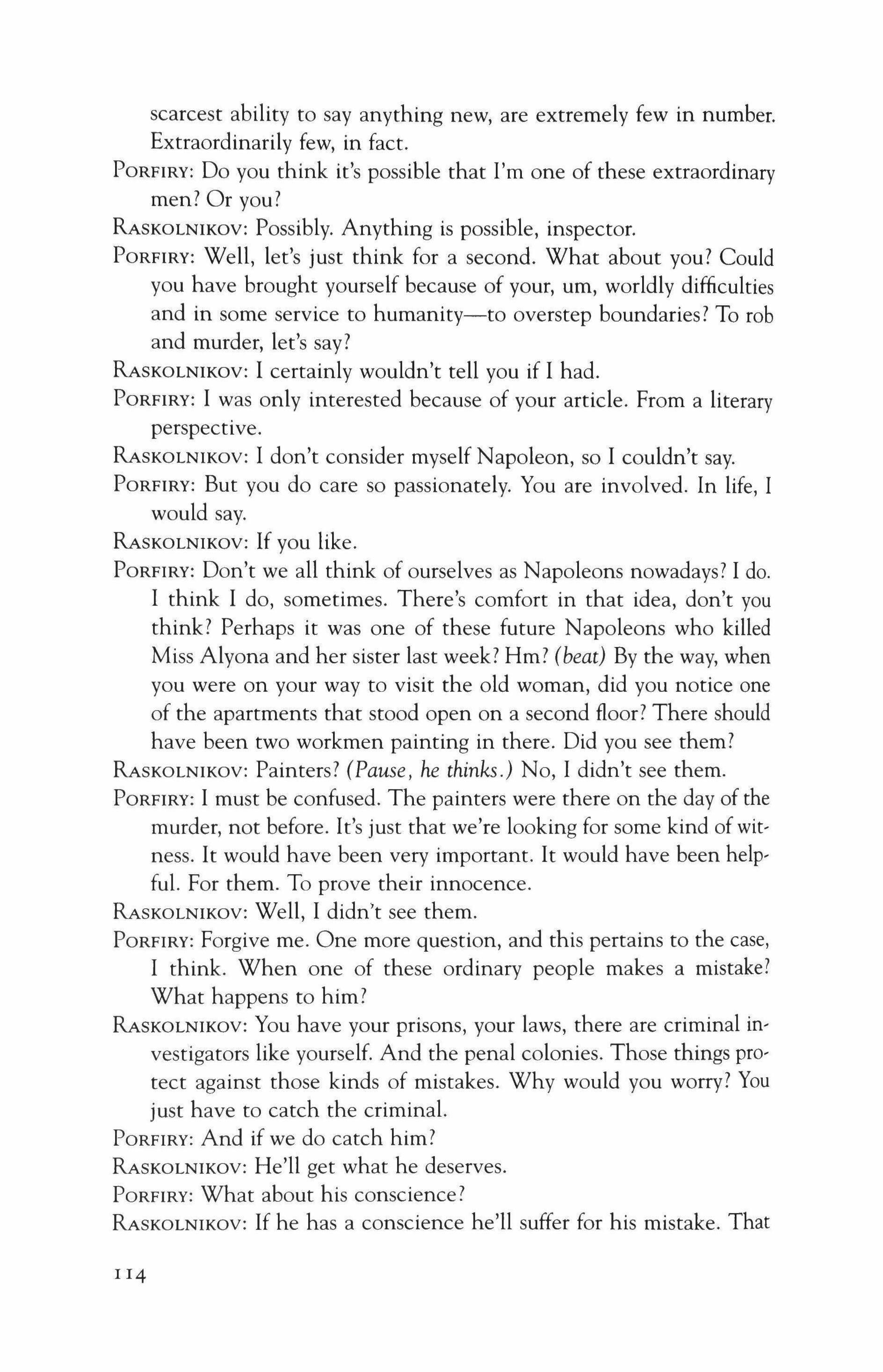
scarcest ability to say anything new, are extremely few in number. Extraordinarily few, in fact.
PORFIRY: Do you think it's possible that I'm one of these extraordinary men? Or you?
RASKOLNIKOV: Possibly. Anything is possible, inspector.
PORFIRY: Well, let's just think for a second. What about you? Could you have brought yourself because of your, urn, worldly difficulties and in some service to humanity-to overstep boundaries? To rob and murder, let's say?
RASKOLNIKOV: I certainly wouldn't tell you if I had.
PORFIRY: I was only interested because of your article. From a literary perspective.
RASKOLNIKOV: I don't consider myself Napoleon, so I couldn't say.
PORFIRY: But you do care so passionately. You are involved. In life, I would say.
RASKOLNIKOV: If you like.
PORFIRY: Don't we all think of ourselves as Napoleons nowadays? I do. I think I do, sometimes. There's comfort in that idea, don't you think? Perhaps it was one of these future Napoleons who killed Miss Alyona and her sister last week? Hm? (beat) By the way, when you were on your way to visit the old woman, did you notice one of the apartments that stood open on a second floor? There should have been two workmen painting in there. Did you see them?
RASKOLNIKOV: Painters? (Pause, he thinks.) No, I didn't see them.
PORFIRY: I must be confused. The painters were there on the day of the murder, not before. It's just that we're looking for some kind of witness. It would have been very important. It would have been helpful. For them. To prove their innocence.
RASKOLNIKOV: Well, I didn't see them.
PORFIRY: Forgive me. One more question, and this pertains to the case, I think. When one of these ordinary people makes a mistake? What happens to him?
RASKOLNIKOV: You have your prisons, your laws, there are criminal investigators like yourself. And the penal colonies. Those things protect against those kinds of mistakes. Why would you worry? You just have to catch the criminal.
PORFIRY: And if we do catch him?
RASKOLNIKOV: He'll get what he deserves.
PORFIRY: What about his conscience?
RASKOLNIKOV: If he has a conscience he'll suffer for his mistake. That
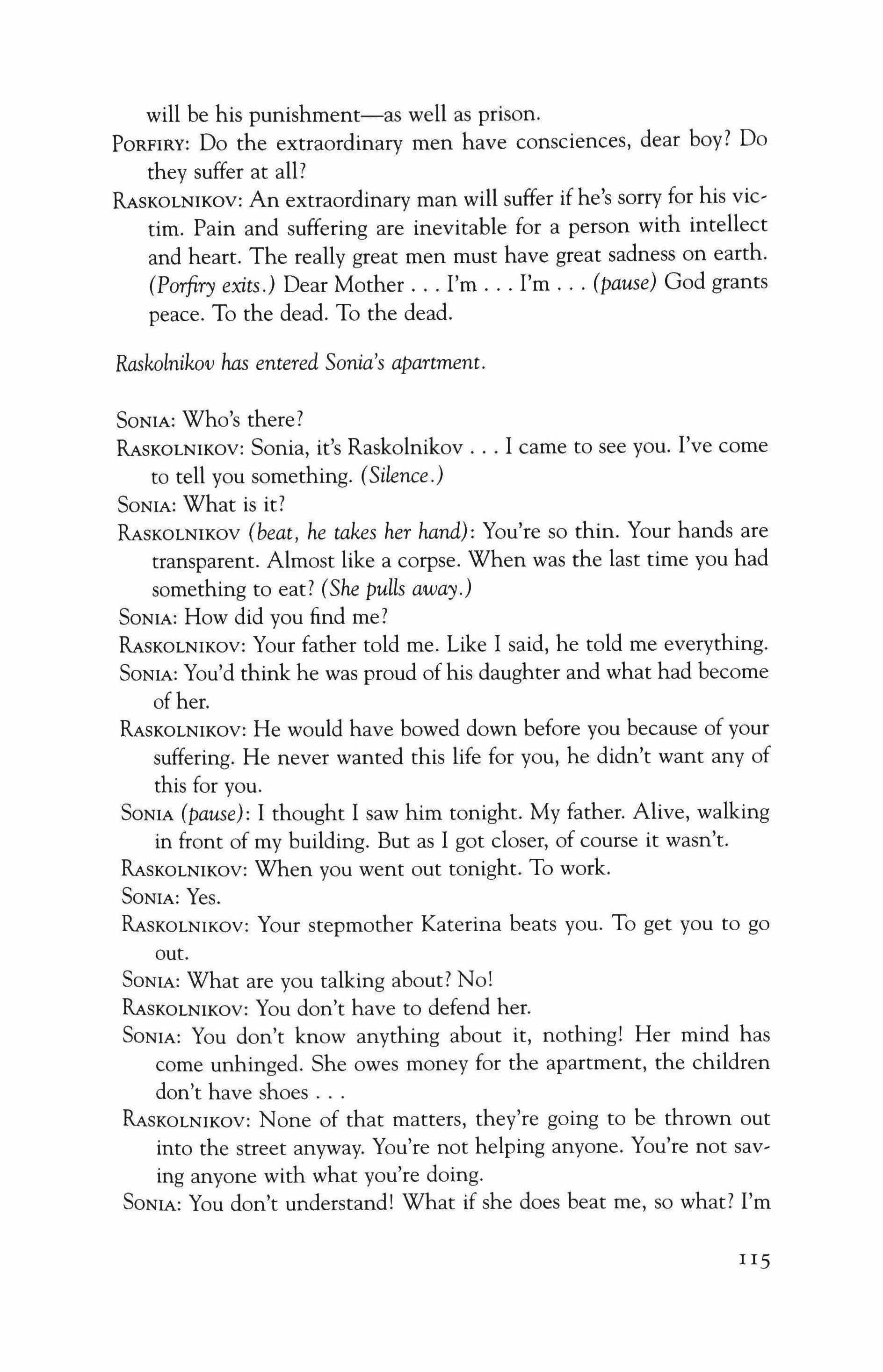
will be his punishment-as well as prison.
PORFIRY: Do the extraordinary men have consciences, dear boy? Do they suffer at all?
RASKOLNIKOV: An extraordinary man will suffer if he's sorry for his victim. Pain and suffering are inevitable for a person with intellect and heart. The really great men must have great sadness on earth. (Porfiry exits.) Dear Mother I'm I'm (pause) God grants peace. To the dead. To the dead.
Raskolnikov has entered Sonia's apartment.
SONIA: Who's there?
RASKOLNIKOV: Sonia, it's Raskolnikov I came to see you. I've come to tell you something. (Silence.)
SONIA: What is it?
RASKOLNIKOV (beat, he takes her hand): You're so thin. Your hands are transparent. Almost like a corpse. When was the last time you had something to eat? (She pulls away.)
SONIA: How did you find me?
RASKOLNIKOV: Your father told me. Like I said, he told me everything.
SONIA: You'd think he was proud of his daughter and what had become of her.
RASKOLNIKOV: He would have bowed down before you because of your suffering. He never wanted this life for you, he didn't want any of this for you.
SONIA (pause): I thought I saw him tonight. My father. Alive, walking in front of my building. But as I got closer, of course it wasn't.
RASKOLNIKOV: When you went out tonight. To work.
SONIA: Yes.
RASKOLNIKOV: Your stepmother Katerina beats you. To get you to go out.
SONIA: What are you talking about? No!
RASKOLNIKOV: You don't have to defend her.
SONIA: You don't know anything about it, nothing! Her mind has come unhinged. She owes money for the apartment, the children don't have shoes
RASKOLNIKOV: None of that matters, they're going to be thrown out into the street anyway. You're not helping anyone. You're not saving anyone with what you're doing.
SONIA: You don't understand! What if she does beat me, so what? I'm
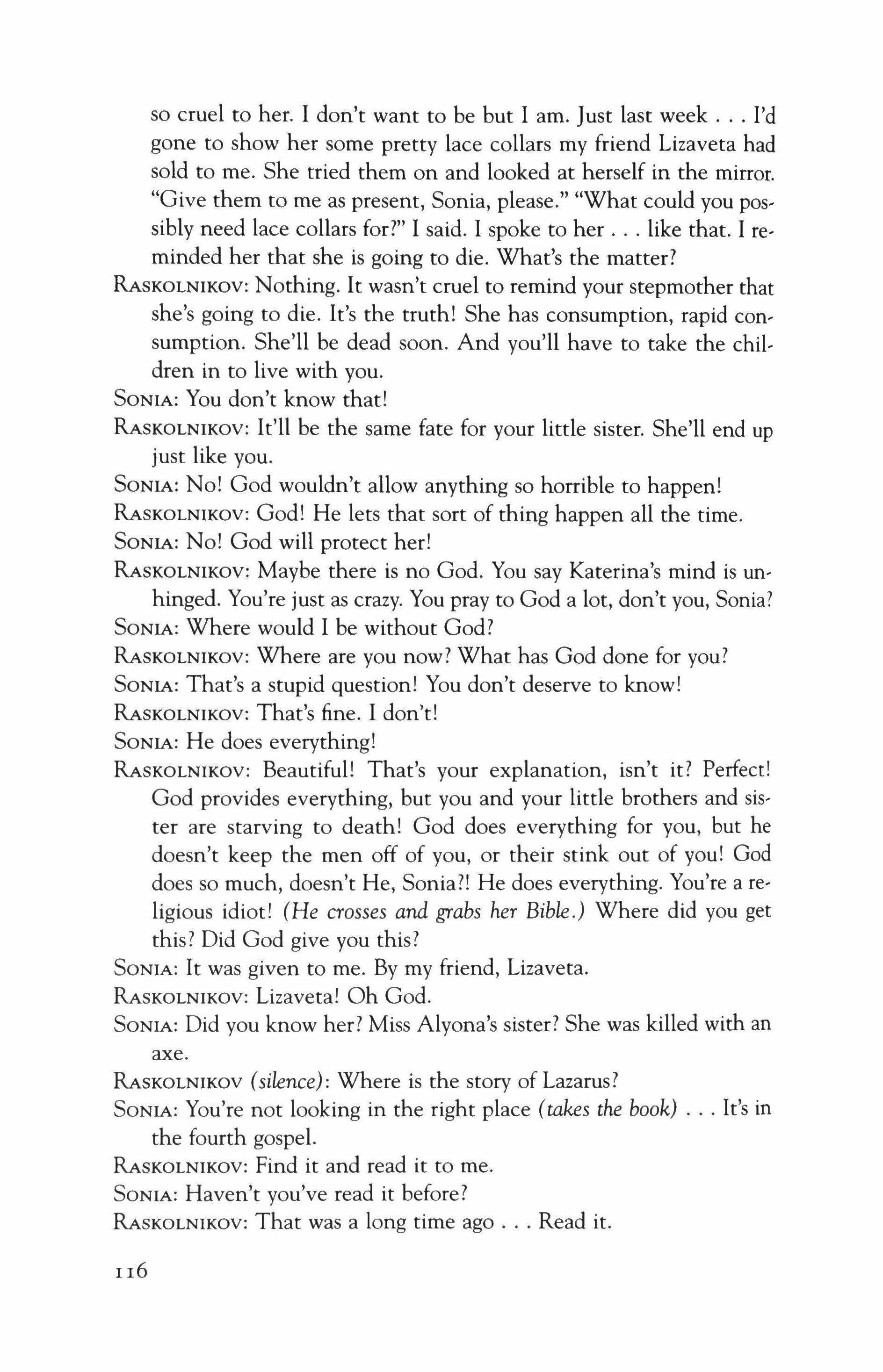
so cruel to her. I don't want to be but I am. Just last week I'd gone to show her some pretty lace collars my friend Lizaveta had sold to me. She tried them on and looked at herself in the mirror. "Give them to me as present, Sonia, please." "What could you possibly need lace collars for?" I said. I spoke to her like that. I reminded her that she is going to die. What's the matter?
RASKOLNIKOV: Nothing. It wasn't cruel to remind your stepmother that she's going to die. It's the truth! She has consumption, rapid consumption. She'll be dead soon. And you'll have to take the children in to live with you.
SONIA: You don't know that!
RASKOLNIKOV: It'll be the same fate for your little sister. She'll end up just like you.
SONIA: No! God wouldn't allow anything so horrible to happen!
RASKOLNIKOV: God! He lets that sort of thing happen all the time.
SONIA: No! God will protect her!
RASKOLNIKOV: Maybe there is no God. You say Katerina's mind is unhinged. You're just as crazy. You pray to God a lot, don't you, Sonia?
SONIA: Where would I be without God?
RASKOLNIKOV: Where are you now? What has God done for you?
SONIA: That's a stupid question! You don't deserve to know!
RASKOLNIKOV: That's fine. I don't!
SONIA: He does everything!
RASKOLNIKOV: Beautiful! That's your explanation, isn't it? Perfect! God provides everything, but you and your little brothers and sister are starving to death! God does everything for you, but he doesn't keep the men off of you, or their stink out of you! God does so much, doesn't He, Sonia?! He does everything. You're a religious idiot! (He crosses and grabs her Bible.) Where did you get this? Did God give you this?
SONIA: It was given to me. By my friend, Lizaveta.
RASKOLNIKOV: Lizaveta! Oh God.
SONIA: Did you know her? Miss Alyona's sister? She was killed with an axe.
RASKOLNIKOV (silence): Where is the story of Lazarus?
SONIA: You're not looking in the right place (takes the book) It's in the fourth gospel.
RASKOLNIKOV: Find it and read it to me.
SONIA: Haven't you've read it before?
RASKOLNIKOV: That was a long time ago Read it.
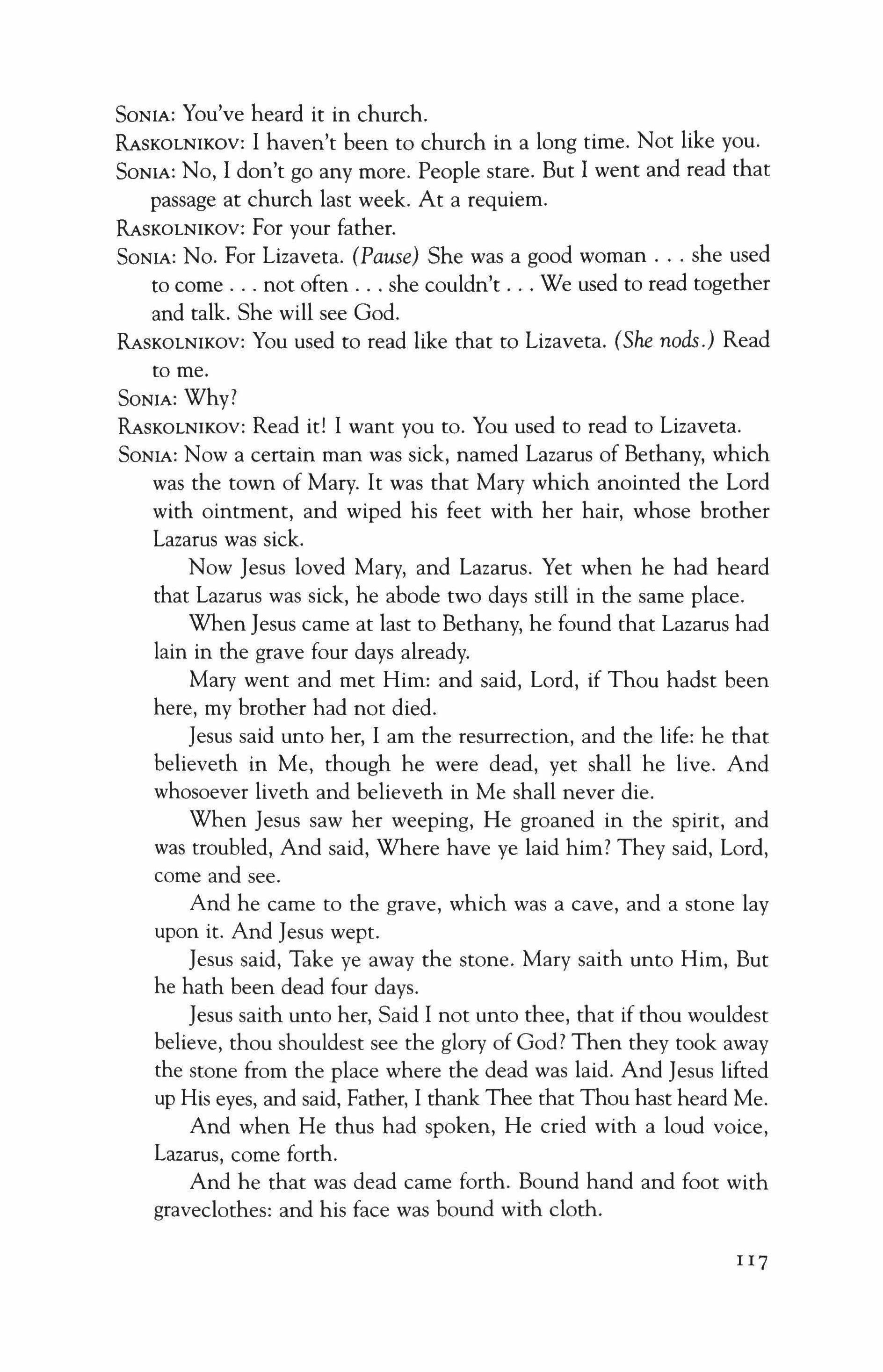
SONIA: You've heard it in church.
RASKOLNIKOV: I haven't been to church in a long time. Not like you.
SONIA: No, I don't go any more. People stare. But I went and read that passage at church last week. At a requiem.
RASKOLNIKOV: For your father.
SONIA: No. For Lizaveta. (Pause) She was a good woman she used to come not often she couldn't We used to read together and talk. She will see God.
RASKOLNIKOV: You used to read like that to Lizaveta. (She nods.) Read to me.
SONIA: Why?
RASKOLNIKOV: Read it! I want you to. You used to read to Lizaveta.
SONIA: Now a certain man was sick, named Lazarus of Bethany, which was the town of Mary. It was that Mary which anointed the Lord with ointment, and wiped his feet with her hair, whose brother Lazarus was sick.
Now Jesus loved Mary, and Lazarus. Yet when he had heard that Lazarus was sick, he abode two days still in the same place.
When Jesus came at last to Bethany, he found that Lazarus had lain in the grave four days already.
Mary went and met Him: and said, Lord, if Thou hadst been here, my brother had not died.
Jesus said unto her, I am the resurrection, and the life: he that believeth in Me, though he were dead, yet shall he live. And whosoever liveth and believeth in Me shall never die.
When Jesus saw her weeping, He groaned in the spirit, and was troubled, And said, Where have ye laid him? They said, Lord, come and see.
And he came to the grave, which was a cave, and a stone lay upon it. And Jesus wept.
Jesus said, Take ye away the stone. Mary saith unto Him, But he hath been dead four days.
Jesus saith unto her, Said I not unto thee, that if thou wouldest believe, thou shouldest see the glory of God? Then they took away the stone from the place where the dead was laid. And Jesus lifted up His eyes, and said, Father, I thank Thee that Thou hast heard Me.
And when He thus had spoken, He cried with a loud voice, Lazarus, come forth.
And he that was dead came forth. Bound hand and foot with graveclothes: and his face was bound with cloth.
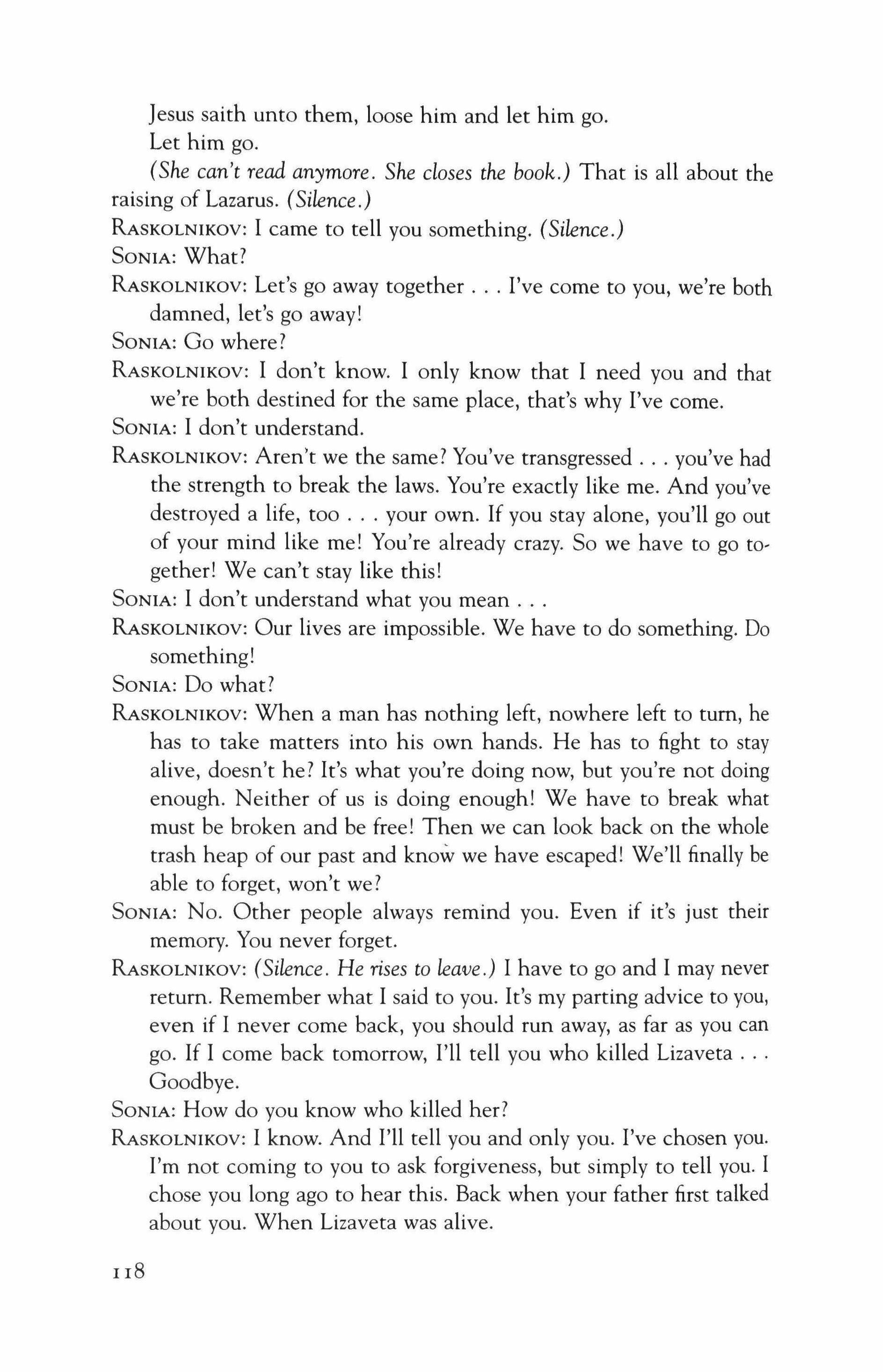
Jesus saith unto them, loose him and let him go. Let him go.
(She can't read anymore. She closes the book.) That is all about the raising of Lazarus. (Silence.)
RASKOLNIKOV: I came to tell you something. (Silence.)
SONIA: What?
RASKOLNIKOV: Let's go away together I've come to you, we're both damned, let's go away!
SONIA: Go where?
RASKOLNIKOV: I don't know. I only know that I need you and that we're both destined for the same place, that's why I've come.
SONIA: I don't understand.
RASKOLNIKOV: Aren't we the same? You've transgressed you've had the strength to break the laws. You're exactly like me. And you've destroyed a life, too your own. If you stay alone, you'll go out of your mind like me! You're already crazy. So we have to go together! We can't stay like this!
SONIA: I don't understand what you mean
RASKOLNIKOV: Our lives are impossible. We have to do something. Do something!
SONIA: Do what?
RASKOLNIKOV: When a man has nothing left, nowhere left to tum, he has to take matters into his own hands. He has to fight to stay alive, doesn't he? It's what you're doing now, but you're not doing enough. Neither of us is doing enough! We have to break what must be broken and be free! Then we can look back on the whole trash heap of our past and know we have escaped! We'll finally be able to forget, won't we?
SONIA: No. Other people always remind you. Even if it's just their memory. You never forget.
RASKOLNIKOV: (Silence. He rises to leave.) I have to go and I may never return. Remember what I said to you. It's my parting advice to you, even if I never come back, you should run away, as far as you can go. If I come back tomorrow, I'll tell you who killed Lizaveta Goodbye.
SONIA: How do you know who killed her?
RASKOLNIKOV: I know. And I'll tell you and only you. I've chosen you. I'm not coming to you to ask forgiveness, but simply to tell you. I chose you long ago to hear this. Back when your father first talked about you. When Lizaveta was alive. IIS
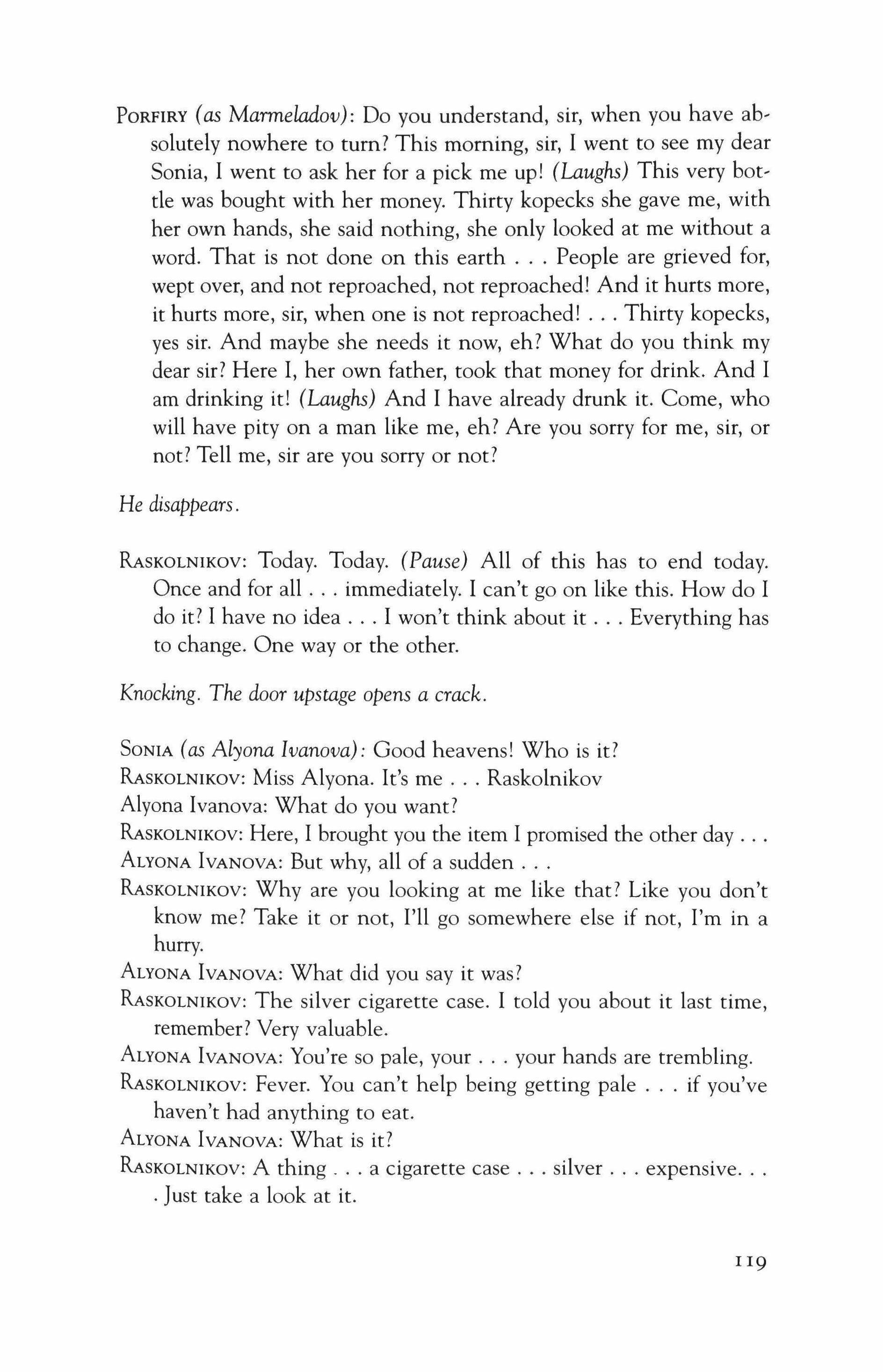
PORFIRY (as Marmeladov): Do you understand, sir, when you have absolutely nowhere to tum? This morning, sir, I went to see my dear Sonia, I went to ask her for a pick me up! (Laughs) This very bot, de was bought with her money. Thirty kopecks she gave me, with her own hands, she said nothing, she only looked at me without a word. That is not done on this earth People are grieved for, wept over, and not reproached, not reproached! And it hurts more, it hurts more, sir, when one is not reproached! Thirty kopecks, yes sir. And maybe she needs it now, eh? What do you think my dear sir? Here I, her own father, took that money for drink. And I am drinking it! (Laughs) And I have already drunk it. Come, who will have pity on a man like me, eh? Are you sorry for me, sir, or not? Tell me, sir are you sorry or not?
He disappears.
RASKOLNIKOV: Today. Today. (Pause) All of this has to end today. Once and for all immediately. I can't go on like this. How do I do it? I have no idea I won't think about it Everything has to change. One way or the other.
Knocking. The door upstage opens a crack.
SONIA (as Alyona Ivanova): Good heavens! Who is it?
RASKOLNIKOV: Miss Alyona. It's me Raskolnikov Alyona Ivanova: What do you want?
RASKOLNIKOV: Here, I brought you the item I promised the other day
ALYONA IVANOVA: But why, all of a sudden
RASKOLNIKOV: Why are you looking at me like that? Like you don't know me? Take it or not, I'll go somewhere else if not, I'm in a hurry.
ALYONA IVANOVA: What did you say it was?
RASKOLNIKOV: The silver cigarette case. I told you about it last time, remember? Very valuable.
ALYONA IVANOVA: You're so pale, your your hands are trembling.
RASKOLNIKOV: Fever. You can't help being getting pale if you've haven't had anything to eat.
ALYONA IVANOVA: What is it?
RASKOLNIKOV: A thing a cigarette case silver expensive Just take a look at it.
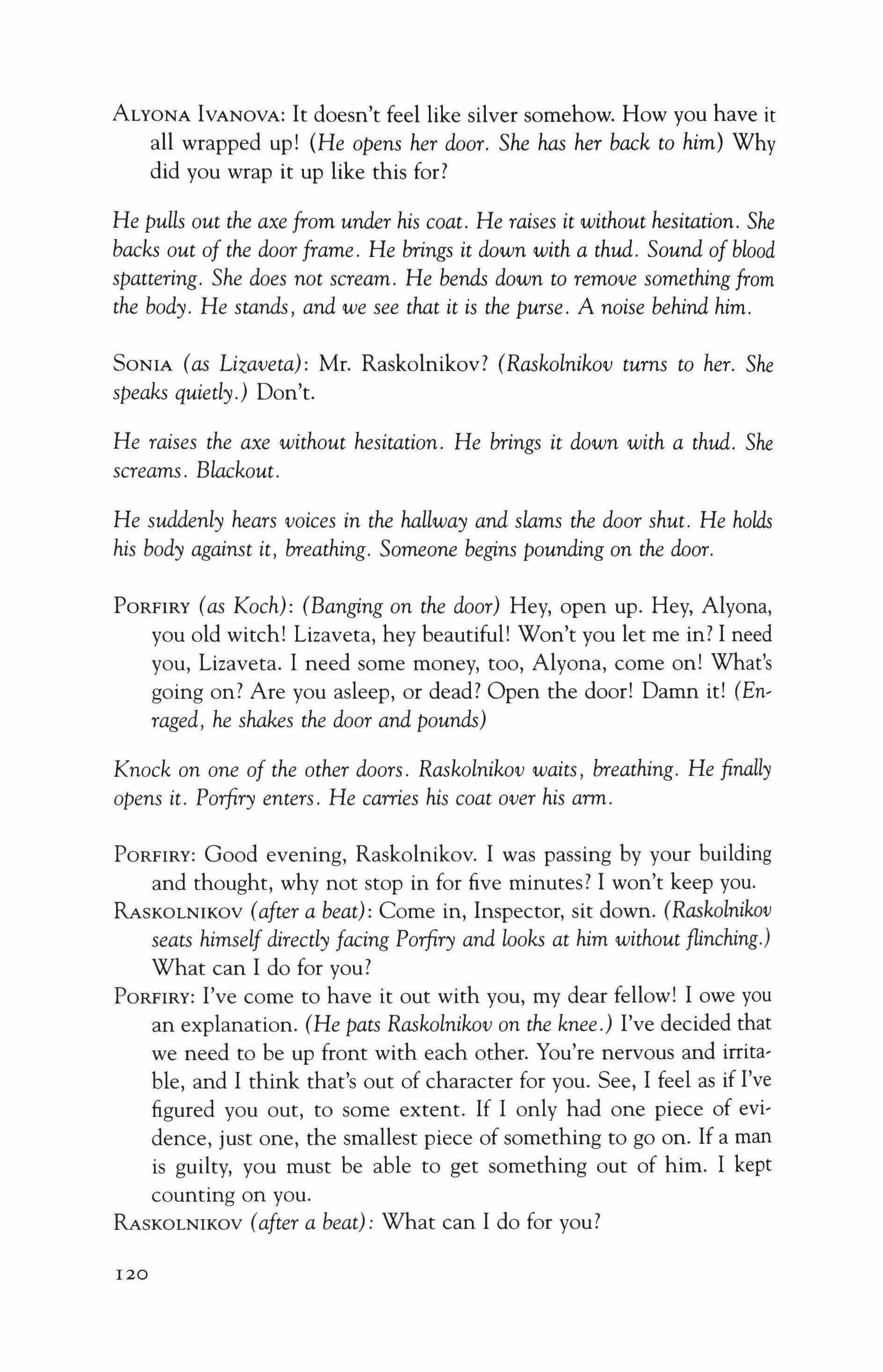
ALYONA IVANOVA: It doesn't feel like silver somehow. How you have it all wrapped up! (He opens her door. She has her back to him) Why did you wrap it up like this for?
He pulls out the axe from under his coat. He raises it without hesitation. She backs out of the door frame. He brings it down with a thud. Sound of blood spattering. She does not scream. He bends down to remove something from the body. He stands, and we see that it is the purse. A noise behind him.
SONIA (as Lizaveta): Mr. Raskolnikov? (Raskolnikov turns to her. She speaks quietly.) Don't.
He raises the axe without hesitation. He brings it down with a thud. She screams. Blackout.
He suddenly hears voices in the hallway and slams the door shut. He holds his body against it, breathing. Someone begins pounding on the door.
PORFIRY (as Koch): (Banging on the door) Hey, open up. Hey, Alyona, you old witch! Lizaveta, hey beautiful! Won't you let me in? I need you, Lizaveta. I need some money, too, Alyona, come on! What's going on? Are you asleep, or dead? Open the door! Damn it! (Enraged, he shakes the door and pounds)
Knock on one of the other doors. Raskolnikov waits, breathing. He finally opens it. Porfiry enters. He carries his coat over his arm.
PORFIRY: Good evening, Raskolnikov. I was passing by your building and thought, why not stop in for five minutes? I won't keep you.
MSKOLNIKOV (after a beat): Come in, Inspector, sit down. (Raskolnikov seats himself directly facing Porfiry and looks at him without flinching.) What can I do for you?
PORFIRY: I've come to have it out with you, my dear fellow! lowe you an explanation. (He pats Raskolnikov on the knee.) I've decided that we need to be up front with each other. You're nervous and irritable, and I think that's out of character for you. See, I feel as if I've figured you out, to some extent. If I only had one piece of evidence, just one, the smallest piece of something to go on. If a man is guilty, you must be able to get something out of him. I kept counting on you.
MSKOLNIKOV (after a beat): What can I do for you?
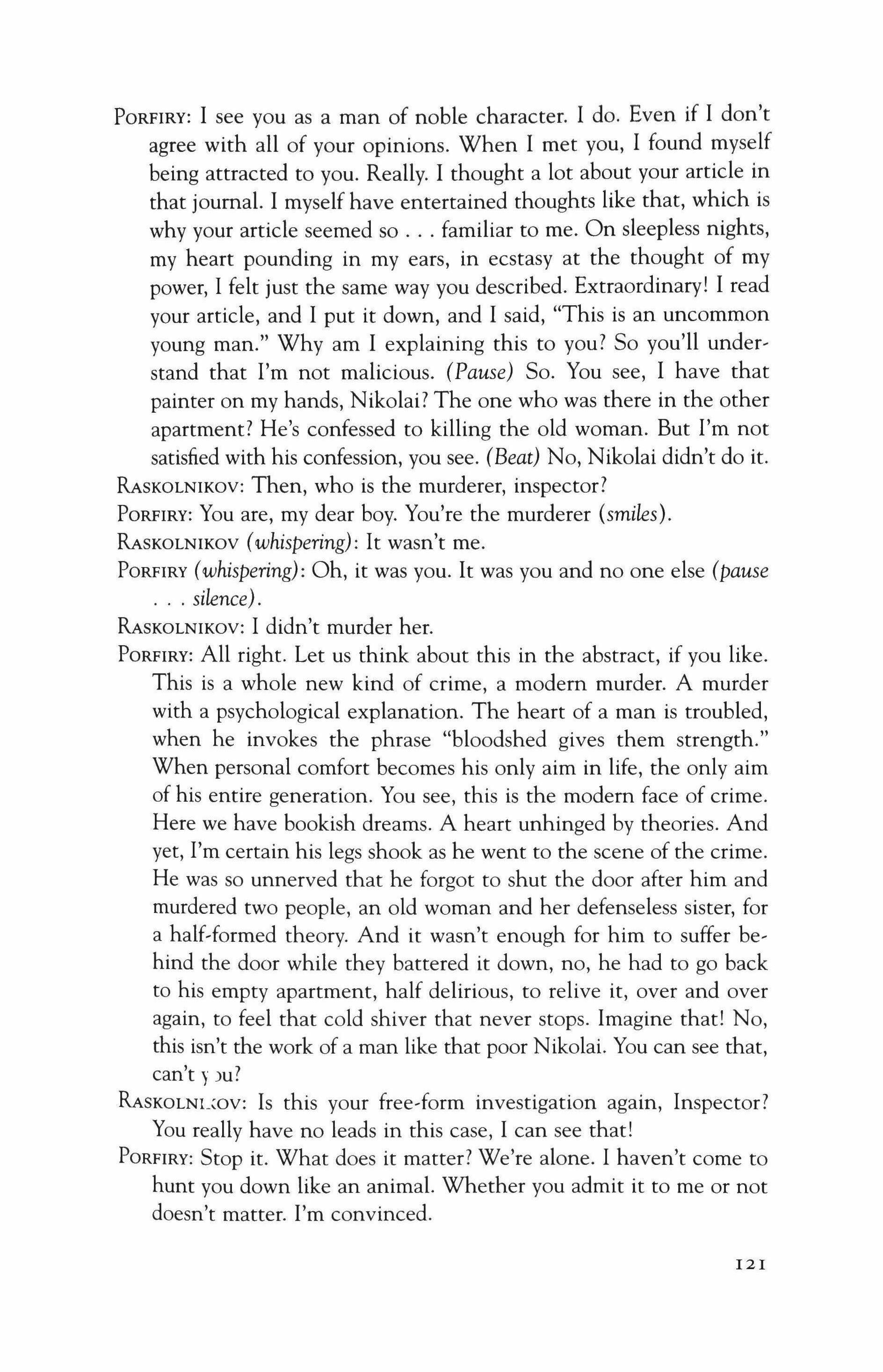
PORFIRY: I see you as a man of noble character. I do. Even if I don't agree with all of your opinions. When I met you, I found myself being attracted to you. Really. I thought a lot about your article in that journal. I myself have entertained thoughts like that, which is why your article seemed so familiar to me. On sleepless nights, my heart pounding in my ears, in ecstasy at the thought of my power, I felt just the same way you described. Extraordinary! I read your article, and I put it down, and I said, "This is an uncommon young man." Why am I explaining this to you? So you'll understand that I'm not malicious. (Pause) So. You see, I have that painter on my hands, Nikolai? The one who was there in the other apartment? He's confessed to killing the old woman. But I'm not satisfied with his confession, you see. (Beat) No, Nikolai didn't do it.
RASKOLNIKOV: Then, who is the murderer, inspector?
PORFIRY: You are, my dear boy. You're the murderer (smiles).
RASKOLNIKOV (whispering): It wasn't me.
PORFIRY (whispering): Oh, it was you. It was you and no one else (pause silence).
RASKOLNIKOV: I didn't murder her.
PORFIRY: All right. Let us think about this in the abstract, if you like. This is a whole new kind of crime, a modem murder. A murder with a psychological explanation. The heart of a man is troubled, when he invokes the phrase "bloodshed gives them strength." When personal comfort becomes his only aim in life, the only aim of his entire generation. You see, this is the modem face of crime. Here we have bookish dreams. A heart unhinged by theories. And yet, I'm certain his legs shook as he went to the scene of the crime. He was so unnerved that he forgot to shut the door after him and murdered two people, an old woman and her defenseless sister, for a half-formed theory. And it wasn't enough for him to suffer behind the door while they battered it down, no, he had to go back to his empty apartment, half delirious, to relive it, over and over again, to feel that cold shiver that never stops. Imagine that! No, this isn't the work of a man like that poor Nikolai. You can see that, can't)' )u?
RASKOLNL�OV: Is this your free-form investigation again, Inspector? You really have no leads in this case, I can see that!
PORFIRY: Stop it. What does it matter? We're alone. I haven't come to hunt you down like an animal. Whether you admit it to me or not doesn't matter. I'm convinced.
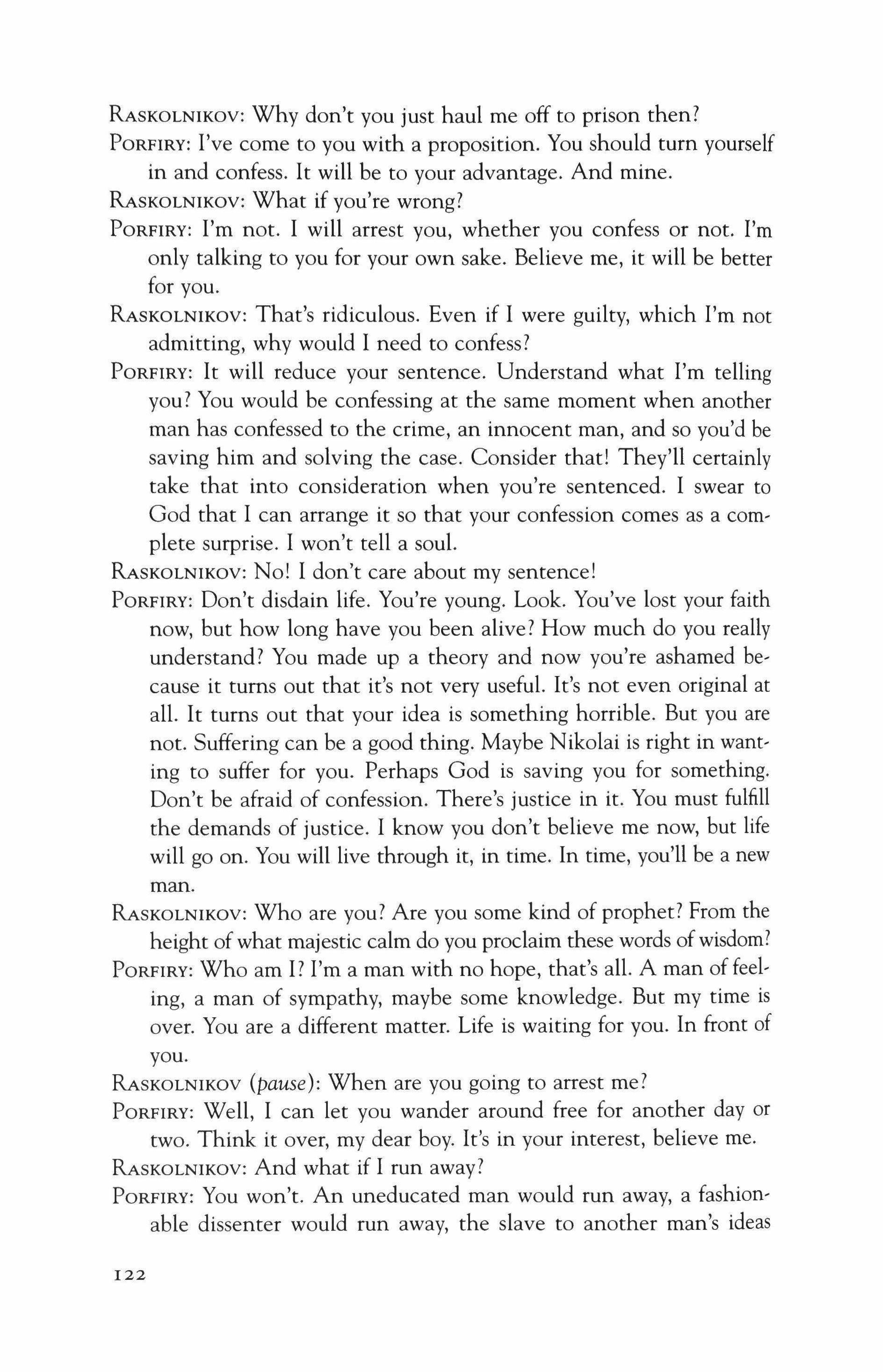
RASKOLNIKOV: Why don't you just haul me off to prison then?
PORFIRY: I've come to you with a proposition. You should turn yourself in and confess. It will be to your advantage. And mine.
RASKOLNIKOV: What if you're wrong?
PORFIRY: I'm not. I will arrest you, whether you confess or not. I'm only talking to you for your own sake. Believe me, it will be better for you.
RASKOLNIKOV: That's ridiculous. Even if I were guilty, which I'm not admitting, why would I need to confess?
PORFIRY: It will reduce your sentence. Understand what I'm telling you? You would be confessing at the same moment when another man has confessed to the crime, an innocent man, and so you'd be saving him and solving the case. Consider that! They'll certainly take that into consideration when you're sentenced. I swear to God that I can arrange it so that your confession comes as a complete surprise. I won't tell a soul.
RASKOLNIKOV: No! I don't care about my sentence!
PORFIRY: Don't disdain life. You're young. Look. You've lost your faith now, but how long have you been alive? How much do you really understand? You made up a theory and now you're ashamed because it turns out that it's not very useful. It's not even original at all. It turns out that your idea is something horrible. But you are not. Suffering can be a good thing. Maybe Nikolai is right in wanting to suffer for you. Perhaps God is saving you for something. Don't be afraid of confession. There's justice in it. You must fulfill the demands of justice. I know you don't believe me now, but life will go on. You will live through it, in time. In time, you'll be a new man.
RASKOLNIKOV: Who are you? Are you some kind of prophet? From the height ofwhat majestic calm do you proclaim these words ofwisdom?
PORFIRY: Who am I? I'm a man with no hope, that's all. A man of feeling, a man of sympathy, maybe some knowledge. But my time is over. You are a different matter. Life is waiting for you. In front of you.
RASKOLNIKOV (pause): When are you going to arrest me?
PORFIRY: Well, I can let you wander around free for another day or two. Think it over, my dear boy. It's in your interest, believe me.
RASKOLNIKOV: And what if I run away?
PORFIRY: You won't. An uneducated man would run away, a fashionable dissenter would run away, the slave to another man's ideas
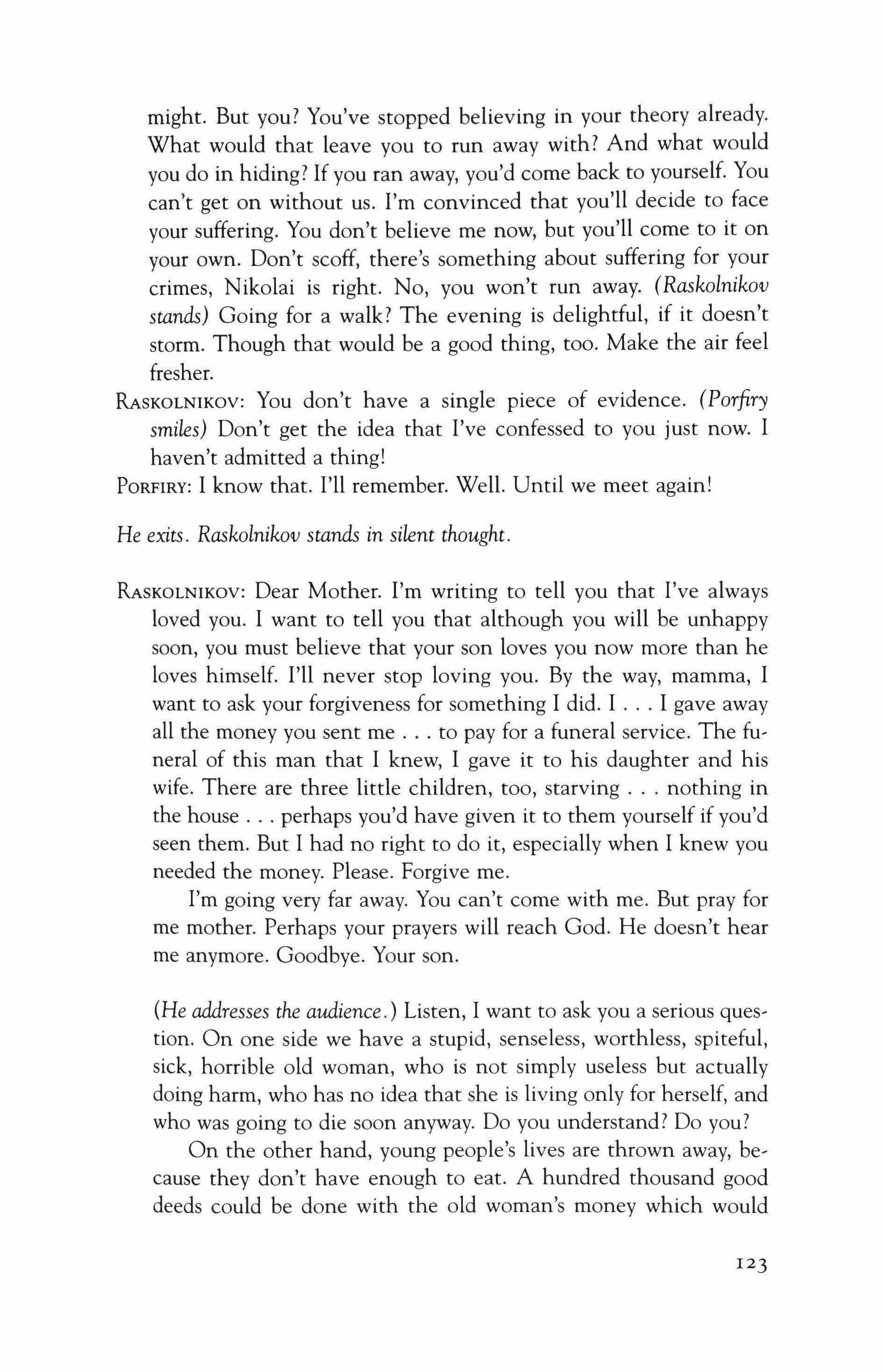
might. But you? You've stopped believing in your theory already. What would that leave you to run away with? And what would you do in hiding? If you ran away, you'd come back to yourself. You can't get on without us. I'm convinced that you'll decide to face your suffering. You don't believe me now, but you'll come to it on your own. Don't scoff, there's something about suffering for your crimes, Nikolai is right. No, you won't run away. (Raskolnikov stands) Going for a walk? The evening is delightful, if it doesn't storm. Though that would be a good thing, too. Make the air feel fresher.
RASKOLNIKOV: You don't have a single piece of evidence. (Porfiry smiles) Don't get the idea that I've confessed to you just now. I haven't admitted a thing!
PORFIRY: I know that. I'll remember. Well. Until we meet again!
He exits. Raskolnikov stands in silent thought.
RASKOLNIKOV: Dear Mother. I'm writing to tell you that I've always loved you. I want to tell you that although you will be unhappy soon, you must believe that your son loves you now more than he loves himself. I'll never stop loving you. By the way, mamma, I want to ask your forgiveness for something I did. I I gave away all the money you sent me to pay for a funeral service. The funeral of this man that I knew, I gave it to his daughter and his wife. There are three little children, too, starving nothing in the house perhaps you'd have given it to them yourself if you'd seen them. But I had no right to do it, especially when I knew you needed the money. Please. Forgive me.
I'm going very far away. You can't come with me. But pray for me mother. Perhaps your prayers will reach God. He doesn't hear me anymore. Goodbye. Your son.
(He addresses the audience.) Listen, I want to ask you a serious question. On one side we have a stupid, senseless, worthless, spiteful, sick, horrible old woman, who is not simply useless but actually doing harm, who has no idea that she is living only for herself, and who was going to die soon anyway. Do you understand? Do you?
On the other hand, young people's lives are thrown away, because they don't have enough to eat. A hundred thousand good deeds could be done with the old woman's money which would I23

have been buried with her in a monastery! Hundreds, thousands maybe, could be set on the right path; dozens of families saved from poverty, from ruin, from wickedness-and all with her money. Kill her, take her money and with her assistance, devote yourself to serving humanity, working for the good of all mankind. What do you think, wouldn't one tiny crime be wiped out by thousands of good deeds? One death, and a hundred lives in exchange-it's a simple mathematical equation! Of course she doesn't deserve to live, but there it is, it's nature's plan, you say. Well, but we have to correct nature and direct nature, don't we? Don't we? Isn't that mankind's greatest gift to the world?
Music is heard from the street. Raskolnikov goes to window, looks out.
Do you like street musicians? I love them on cold, dark, damp autumn evenings-they have to be damp-when all the passers-by have pale green, sickly faces, or better still when wet snow is falling straight down, when there's no wind-you know what I mean? And the street lamps shine through it
God grants peace to the dead I read somewhere recently that a man condemned to death thinks, about an hour before he dies that anything he has to do stay alive would be better than death. If he had to live on some high rock, on a ledge so narrow that he could only ever stand. If that little ledge were surrounded by a rolling ocean, an everlasting tempest swirling around him. If he had to live plunged in everlasting darkness, in everlasting solitude. If he had to remain standing on a square yard of space for a thousand years, for the rest of eternity, it would be better to live like that than to die in the next hour! Just to live, to live life, however horrible it may be! (Pause) Man is a disgusting creature!
Sonia appears upstage in one of the doorways, back lit. She will move into the room during the following until we can see her face.
SONIA: Do you believe in Lazarus?
RASKOLNIKOV: What?
SONIA: Do you believe a man can be resurrected?
RASKOLNIKOV: Yes. I guess I do.
SONIA: And do you believe in God?
RASKOLNIKOV (silence): Does it matter?
SONIA: It might. (Raskolnikov looks as if he might speak.) I've been
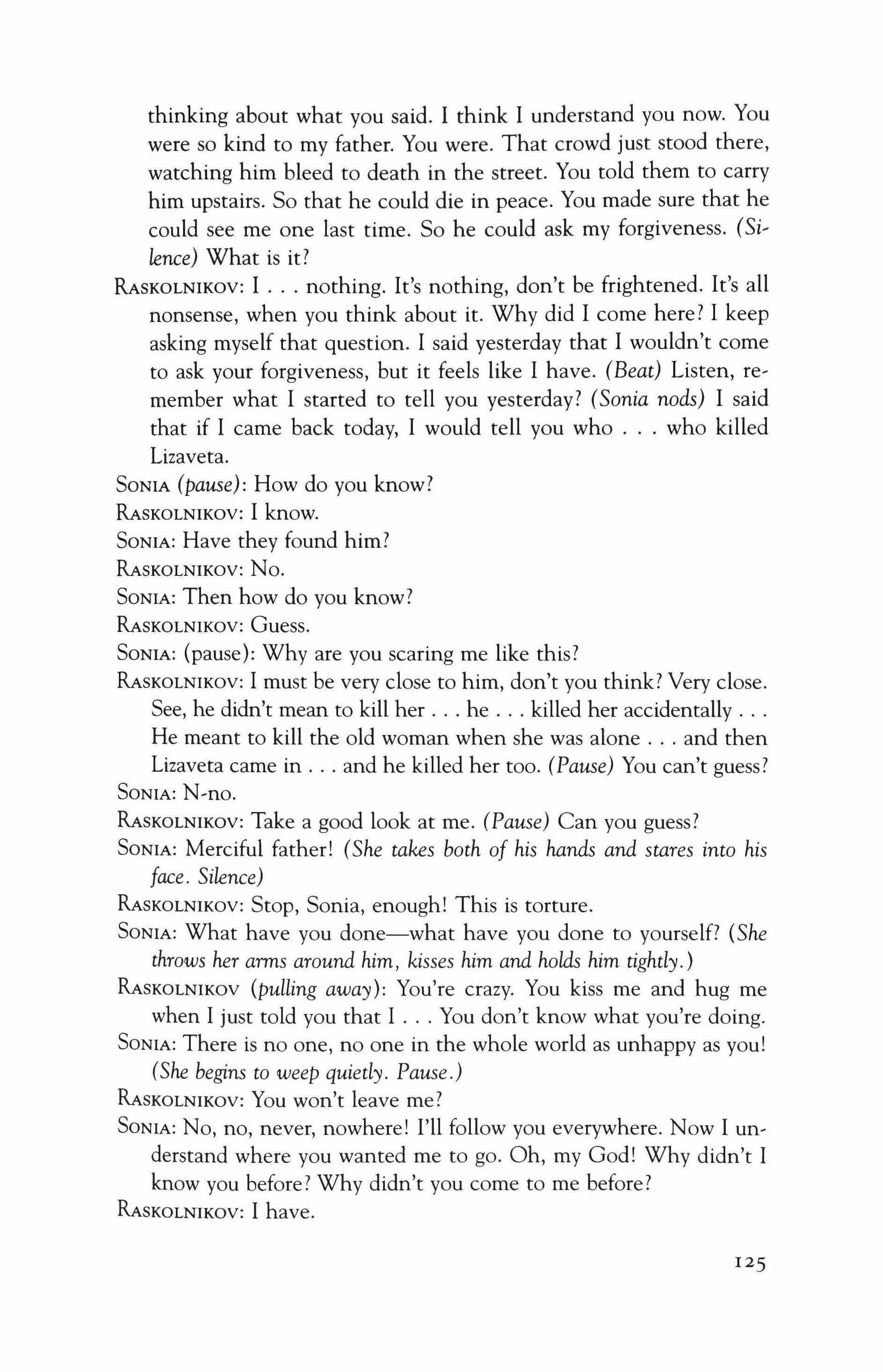
thinking about what you said. I think I understand you now. You were so kind to my father. You were. That crowd just stood there, watching him bleed to death in the street. You told them to carry him upstairs. So that he could die in peace. You made sure that he could see me one last time. So he could ask my forgiveness. (Si, lence) What is it?
RASKOLNIKOV: I nothing. It's nothing, don't be frightened. It's all nonsense, when you think about it. Why did I come here? I keep asking myself that question. I said yesterday that I wouldn't come to ask your forgiveness, but it feels like I have. (Beat) Listen, remember what I started to tell you yesterday? (Sonia nods) I said that if I came back today, I would tell you who who killed Lizaveta.
SONIA (pause): How do you know?
RASKOLNIKOV: I know.
SONIA: Have they found him?
RASKOLNIKOV: No.
SONIA: Then how do you know?
RASKOLNIKOV: Guess.
SONIA: (pause): Why are you scaring me like this?
RASKOLNIKOV: I must be very close to him, don't you think? Very close. See, he didn't mean to kill her he killed her accidentally He meant to kill the old woman when she was alone and then Lizaveta came in and he killed her too. (Pause) You can't guess?
SONIA: N'no.
RASKOLNIKOV: Take a good look at me. (Pause) Can you guess?
SONIA: Merciful father! (She takes both of his hands and stares into his face. Silence)
RASKOLNIKOV: Stop, Sonia, enough! This is torture.
SONIA: What have you done-what have you done to yourself? (She throws her arms around him, kisses him and holds him tightly.)
RASKOLNIKOV (pulling away): You're crazy. You kiss me and hug me when I just told you that I You don't know what you're doing.
SONIA: There is no one, no one in the whole world as unhappy as you! (She begins to weep quietly. Pause.)
RASKOLNIKOV: You won't leave me?
SONIA: No, no, never, nowhere! I'll follow you everywhere. Now I un, derstand where you wanted me to go. Oh, my God! Why didn't I know you before? Why didn't you come to me before?
RASKOLNIKOV: I have.
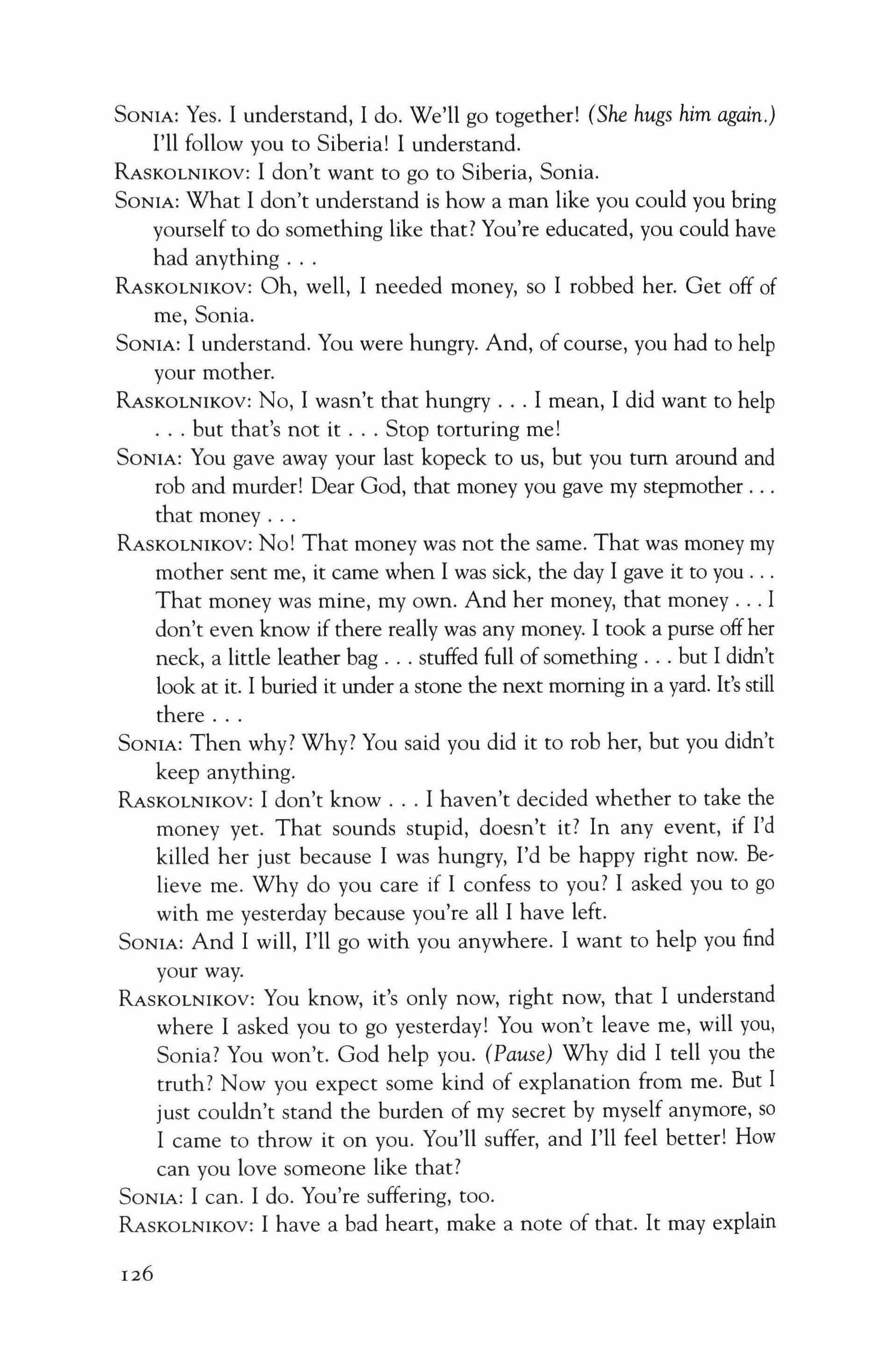
SONIA: Yes. I understand, I do. We'll go together! (She hugs him again.) I'll follow you to Siberia! I understand.
RASKOLNIKOV: I don't want to go to Siberia, Sonia.
SONIA: What I don't understand is how a man like you could you bring yourself to do something like that? You're educated, you could have had anything
RASKOLNIKOV: Oh, well, I needed money, so I robbed her. Get off of me, Sonia.
SONIA: I understand. You were hungry. And, of course, you had to help your mother.
RASKOLNIKOV: No, I wasn't that hungry I mean, I did want to help but that's not it
torturing me!
SONIA: You gave away your last kopeck to us, but you tum around and rob and murder! Dear God, that money you gave my stepmother that money
RASKOLNIKOV: No! That money was not the same. That was money my mother sent me, it came when I was sick, the day I gave it to you That money was mine, my own. And her money, that money I don't even know if there really was any money. I took a purse offher neck, a little leather bag stuffed full of something but I didn't look at it. I buried it under a stone the next morning in a yard. It's still there
SONIA: Then why? Why? You said you did it to rob her, but you didn't keep anything.
RASKOLNIKOV: I don't know I haven't decided whether to take the money yet. That sounds stupid, doesn't it? In any event, if I'd killed her just because I was hungry, I'd be happy right now. Believe me. Why do you care if I confess to you? I asked you to go with me yesterday because you're all I have left.
SONIA: And I will, I'll go with you anywhere. I want to help you find your way.
RASKOLNIKOV: You know, it's only now, right now, that I understand where I asked you to go yesterday! You won't leave me, will you, Sonia? You won't. God help you. (Pause) Why did I tell you the truth? Now you expect some kind of explanation from me. But I just couldn't stand the burden of my secret by myself anymore, so I came to throw it on you. You'll suffer, and I'll feel better! How can you love someone like that?
SONIA: I can. I do. You're suffering, too.
RASKOLNIKOV: I have a bad heart, make a note of that. It may explain
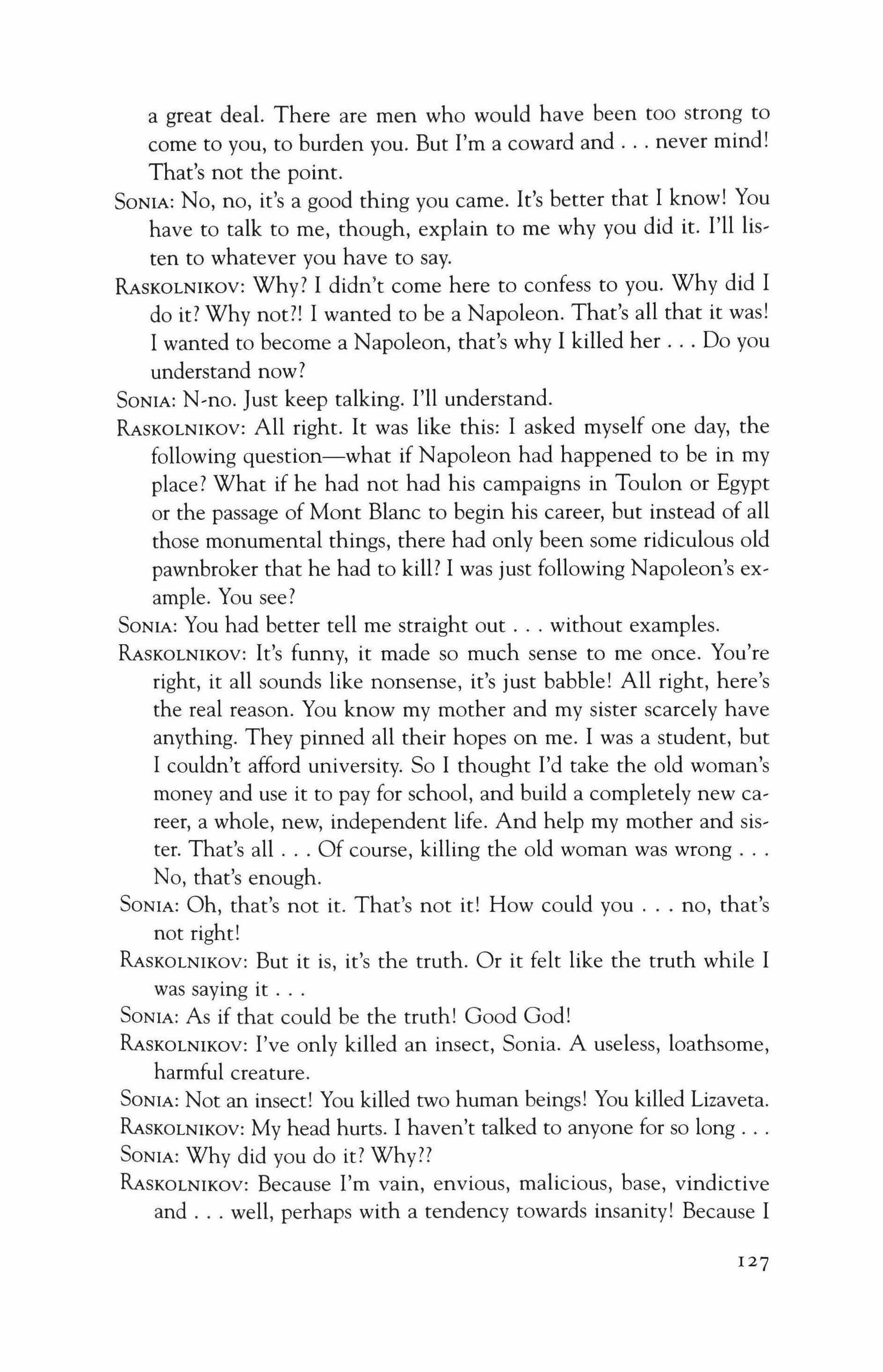
a great deal. There are men who would have been too strong to come to you, to burden you. But I'm a coward and never mind! That's not the point.
SONIA: No, no, it's a good thing you came. It's better that I know! You have to talk to me, though, explain to me why you did it. I'll listen to whatever you have to say.
RASKOLNIKOV: Why? I didn't come here to confess to you. Why did I do it? Why not?! I wanted to be a Napoleon. That's all that it was! I wanted to become a Napoleon, that's why I killed her Do you understand now?
SONIA: Nvno. Just keep talking. I'll understand.
RASKOLNIKOV: All right. It was like this: I asked myself one day, the following question-what if Napoleon had happened to be in my place? What if he had not had his campaigns in Toulon or Egypt or the passage of Mont Blanc to begin his career, but instead of all those monumental things, there had only been some ridiculous old pawnbroker that he had to kill? I was just following Napoleon's example. You see?
SONIA: You had better tell me straight out without examples.
RASKOLNIKOV: It's funny, it made so much sense to me once. You're right, it all sounds like nonsense, it's just babble! All right, here's the real reason. You know my mother and my sister scarcely have anything. They pinned all their hopes on me. I was a student, but I couldn't afford university. So I thought I'd take the old woman's money and use it to pay for school, and build a completely new career, a whole, new, independent life. And help my mother and sister. That's all Of course, killing the old woman was wrong No, that's enough.
SONIA: Oh, that's not it. That's not it! How could you no, that's not right!
RASKOLNIKOV: But it is, it's the truth. Or it felt like the truth while I was saying it
SONIA: As if that could be the truth! Good God!
RASKOLNIKOV: I've only killed an insect, Sonia. A useless, loathsome, harmful creature.
SONIA: Not an insect! You killed two human beings! You killed Lizaveta.
RASKOLNIKOV: My head hurts. I haven't talked to anyone for so long
SONIA: Why did you do it? Why??
RASKOLNIKOV: Because I'm vain, envious, malicious, base, vindictive and well, perhaps with a tendency towards insanity! Because I
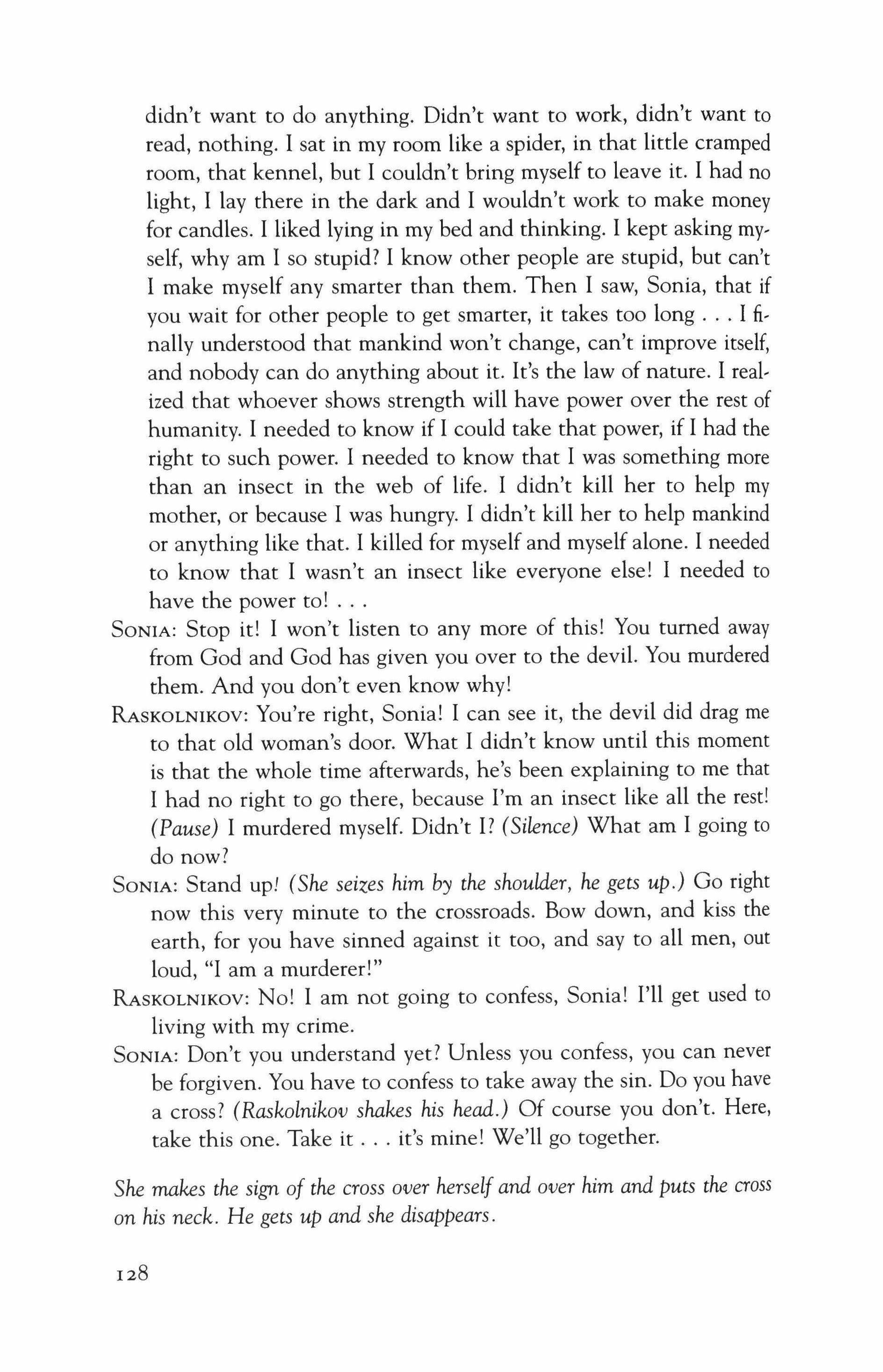
didn't want to do anything. Didn't want to work, didn't want to read, nothing. I sat in my room like a spider, in that little cramped room, that kennel, but I couldn't bring myself to leave it. I had no light, I lay there in the dark and I wouldn't work to make money for candles. I liked lying in my bed and thinking. I kept asking myself, why am I so stupid? I know other people are stupid, but can't I make myself any smarter than them. Then I saw, Sonia, that if you wait for other people to get smarter, it takes too long I finally understood that mankind won't change, can't improve itself, and nobody can do anything about it. It's the law of nature. I realized that whoever shows strength will have power over the rest of humanity. I needed to know if I could take that power, if I had the right to such power. I needed to know that I was something more than an insect in the web of life. I didn't kill her to help my mother, or because I was hungry. I didn't kill her to help mankind or anything like that. I killed for myself and myself alone. I needed to know that I wasn't an insect like everyone else! I needed to have the power to!
SONIA: Stop it! I won't listen to any more of this! You turned away from God and God has given you over to the devil. You murdered them. And you don't even know why!
RASKOLNIKOV: You're right, Sonia! I can see it, the devil did drag me to that old woman's door. What I didn't know until this moment is that the whole time afterwards, he's been explaining to me that I had no right to go there, because I'm an insect like all the rest! (Pause) I murdered myself. Didn't l? (Silence) What am I going to do now?
SONIA: Stand up! (She seizes him by the shoulder, he gets up.) Go right now this very minute to the crossroads. Bow down, and kiss the earth, for you have sinned against it too, and say to all men, out loud, "I am a murderer!"
RASKOLNIKOV: No! I am not going to confess, Sonia! I'll get used to living with my crime.
SONIA: Don't you understand yet? Unless you confess, you can never be forgiven. You have to confess to take away the sin. Do you have a cross? (Raskolnikov shakes his head.) Of course you don't. Here, take this one. Take it it's mine! We'll go together.
She makes the sign of the cross over herself and over him and puts the cross on his neck. He gets up and she disappears.

RASKOLNIKOV: Go to the crossroads, bow down to the people, kiss the earth, for you have sinned against it too, and say aloud to the whole world
He falls to his knees. He crosses himself several times. He crosses himself again, violently. Pause. He opens his mouth, but nothing comes out. He tries to make his confession, but nothing. Porfiry appears, stands look, ingat him.
PORFIRY: So. You have come to see me? That's nice. If it's a business call, you're late. I was almost ready to go home. But, I'll do what I can. I what is it?
RASKOLNIKOV: Raskolnikov. I'm. Raskolnikov.
PORFIRY (beat): Yes, I know. I was at your apartment the other night, remember? Did you think I could forget you? It would be like for' getting myself at this point. (Pause) Did you come to tell me some' thing? (Raskolnikov shakes his head.) Please. I'll listen to anything you have to say.
RASKOLNIKOV: Forgive me. For bothering you. I, I, I have to go.
PORFIRY (beat): Not at all. It's always a pleasure to see you (offers his hand).
RASKOLNIKOV: I only wanted I'm very happy to have good-bye. (He turns away from Porfiry. He pauses.)
PORFIRY: Have you left something behind? What's the matter?
RASKOLNIKOV: I I was (Raskolnikov sits heavily in a chair. His breathing is heavy and labored. Porfiry moves to him)
PORFIRY: I'll get you some water. (Raskolnikov stops Porfiry with his hand.)
RASKOLNIKOV: I was the one. Who robbed the old pawnbroker woman. And killed her. And her sister Lizaveta with an axe. (Pause) I was the one who robbed the old pawnbroker woman and killed her and her sister Lizaveta with an axe.
Sonia moves downstage toward the two of them. She and Porfiry speak qui, etly and directly to Raskolnikov.
PORFIRY (pause): Now. Do you believe in the story of Lazarus?
RASKOLNIKOV: What?
SONIA: Do you believe a man can be resurrected?
RASKOLNIKOV: I don't know anymore.
PORFIRY: And do you believe in God?
RASKOLNIKOV: Does it matter?
SONIA: It might.
A moment. The lights snap off.

Professionals and amateurs are hereby warned that Crime and Punishment is subject to a royalty and is fully protected under copyright laws. No performance of the play, including readings may be given without obtaining in advance the written permission of the authors. All inquiries concerning rights should be addressed to Dramatic Publishing, JII Washington St., Woodstock, IL 60098.
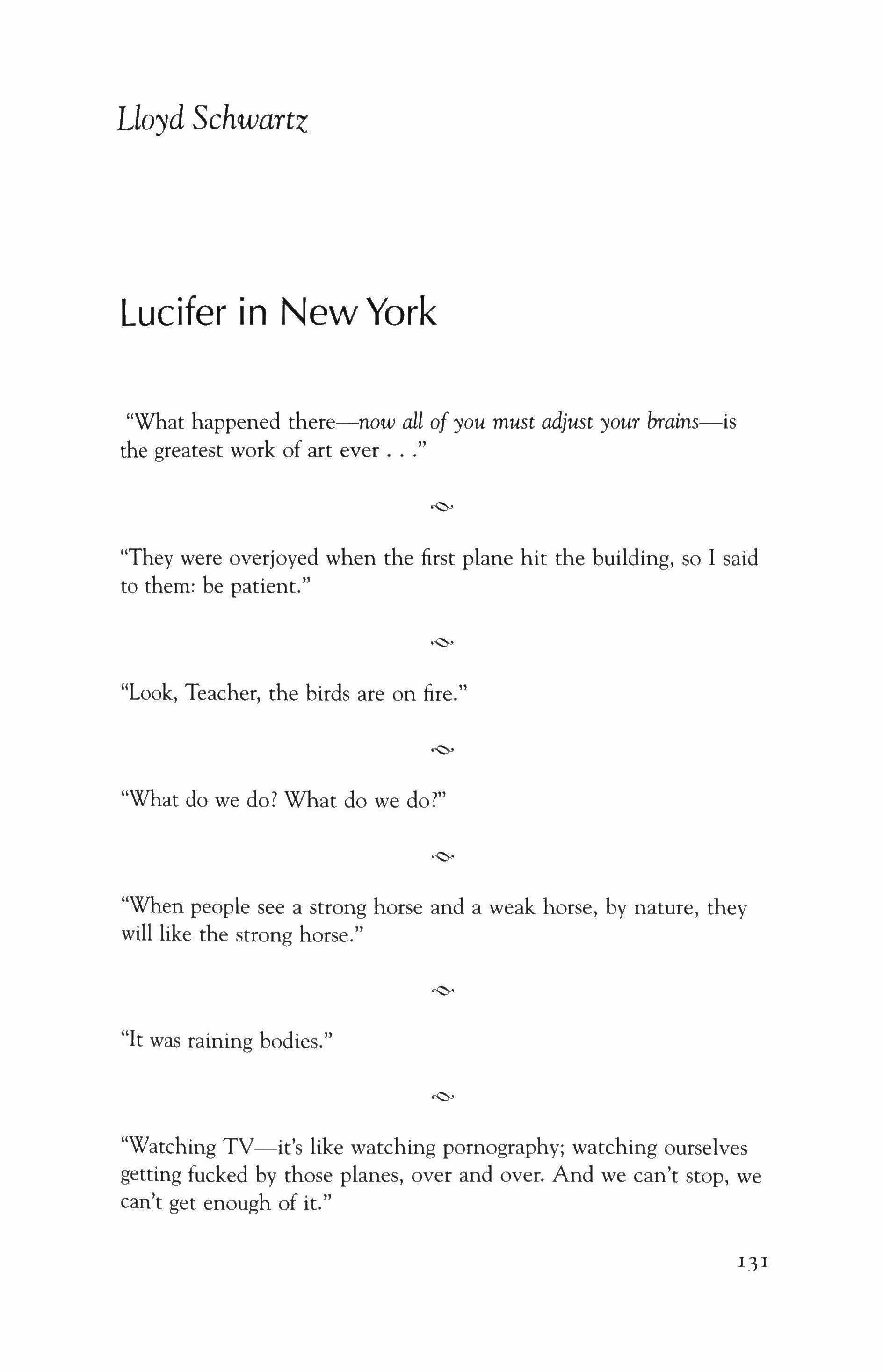
"What happened there-now all of you must adjust your brains-is the greatest work of art ever
"They were overjoyed when the first plane hit the building, so I said to them: be patient."
"Look, Teacher, the birds are on fire."
"What do we do? What do we do?"
"When people see a strong horse and a weak horse, by nature, they will like the strong horse."
"It was raining bodies."
"Watching TV-it's like watching pornography; watching ourselves getting fucked by those planes, over and over. And we can't stop, we can't get enough of it."
"People running, billows of smoke, shaky cameras-it looked like some cheap disaster movie."
.�
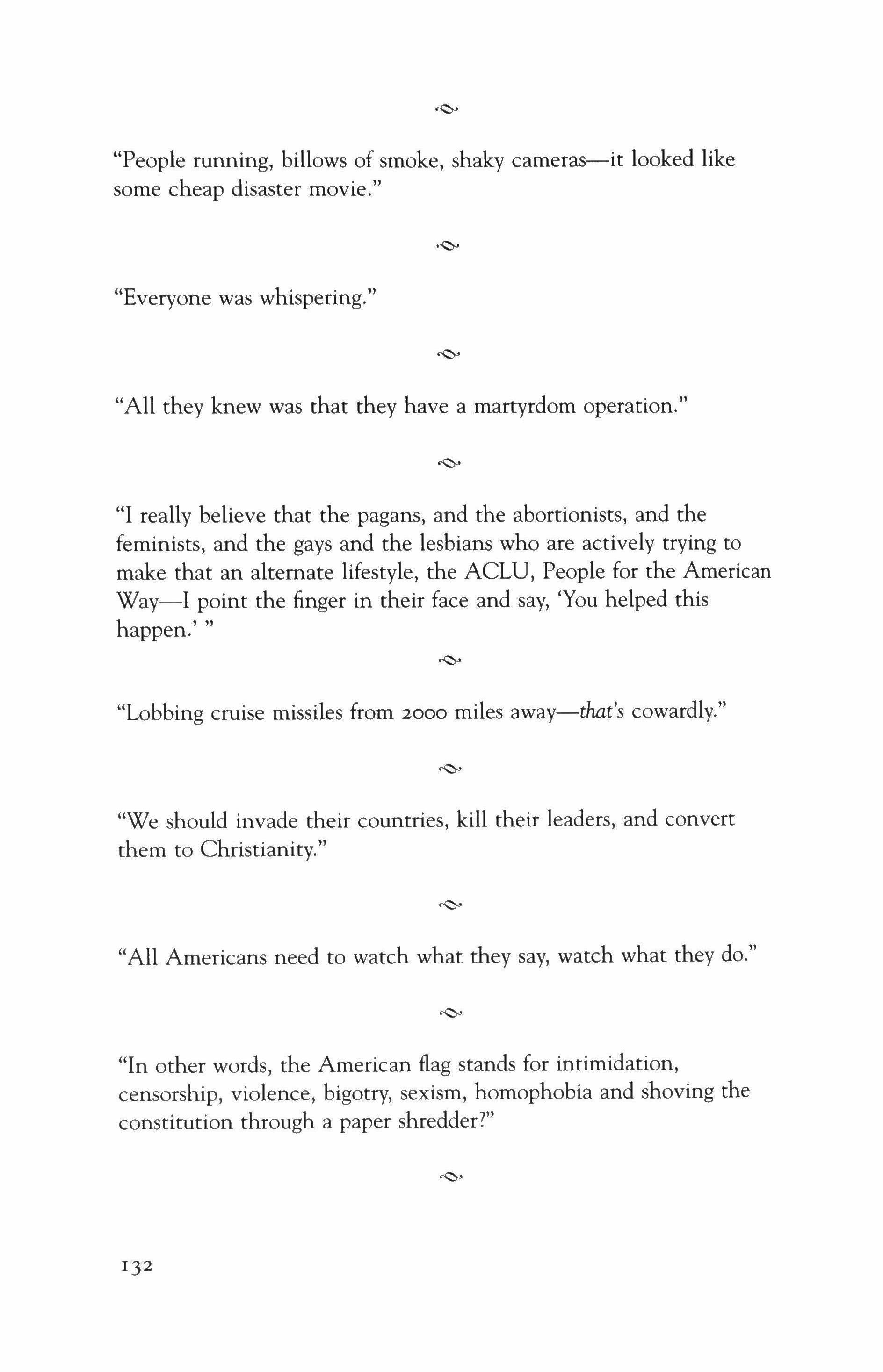
"Everyone was whispering."
"All they knew was that they have a martyrdom operation."
"I really believe that the pagans, and the abortionists, and the feminists, and the gays and the lesbians who are actively trying to make that an alternate lifestyle, the ACLU, People for the American Way-I point the finger in their face and say, 'You helped this happen.'
"Lobbing cruise missiles from 2000 miles away-that's cowardly."
"We should invade their countries, kill their leaders, and convert them to Christianity."
"All Americans need to watch what they say, watch what they do."
"In other words, the American flag stands for intimidation, censorship, violence, bigotry, sexism, homophobia and shoving the constitution through a paper shredder?"
"There are organizations within the United States that have labored unceasingly to strip religious values from our public square and, in the process, to take away the mantle of divine protection which our nation has enjoyed ever since the days of its founding. However, in no way has any guest on my program suggested that anyone other than the Middle East terrorists were responsible for the tragic events that took place on Tuesday."
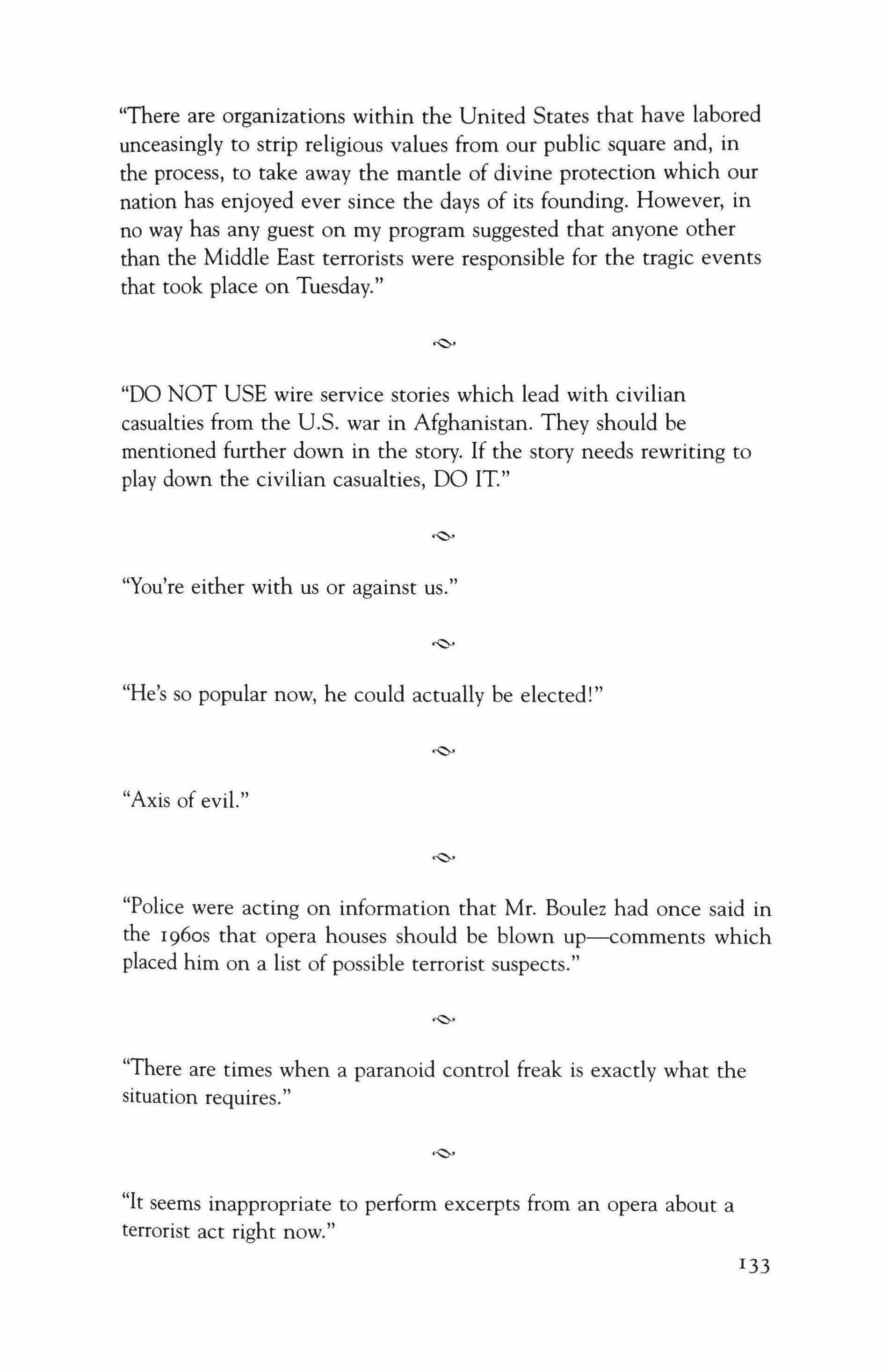
"DO NOT USE wire service stories which lead with civilian casualties from the U.S. war in Afghanistan. They should be mentioned further down in the story. If the story needs rewriting to play down the civilian casualties, DO IT."
"You're either with us or against us."
"He's so popular now, he could actually be elected!"
"Axis of evil."
"Police were acting on information that Mr. Boulez had once said in the I960s that opera houses should be blown up-comments which placed him on a list of possible terrorist suspects."
"There are times when a paranoid control freak is exactly what the situation requires."
"It seems inappropriate to perform excerpts from an opera about a terrorist act right now."
"Men are shaving off their beards; thousands of people are lining up at movie theaters in Kabul."
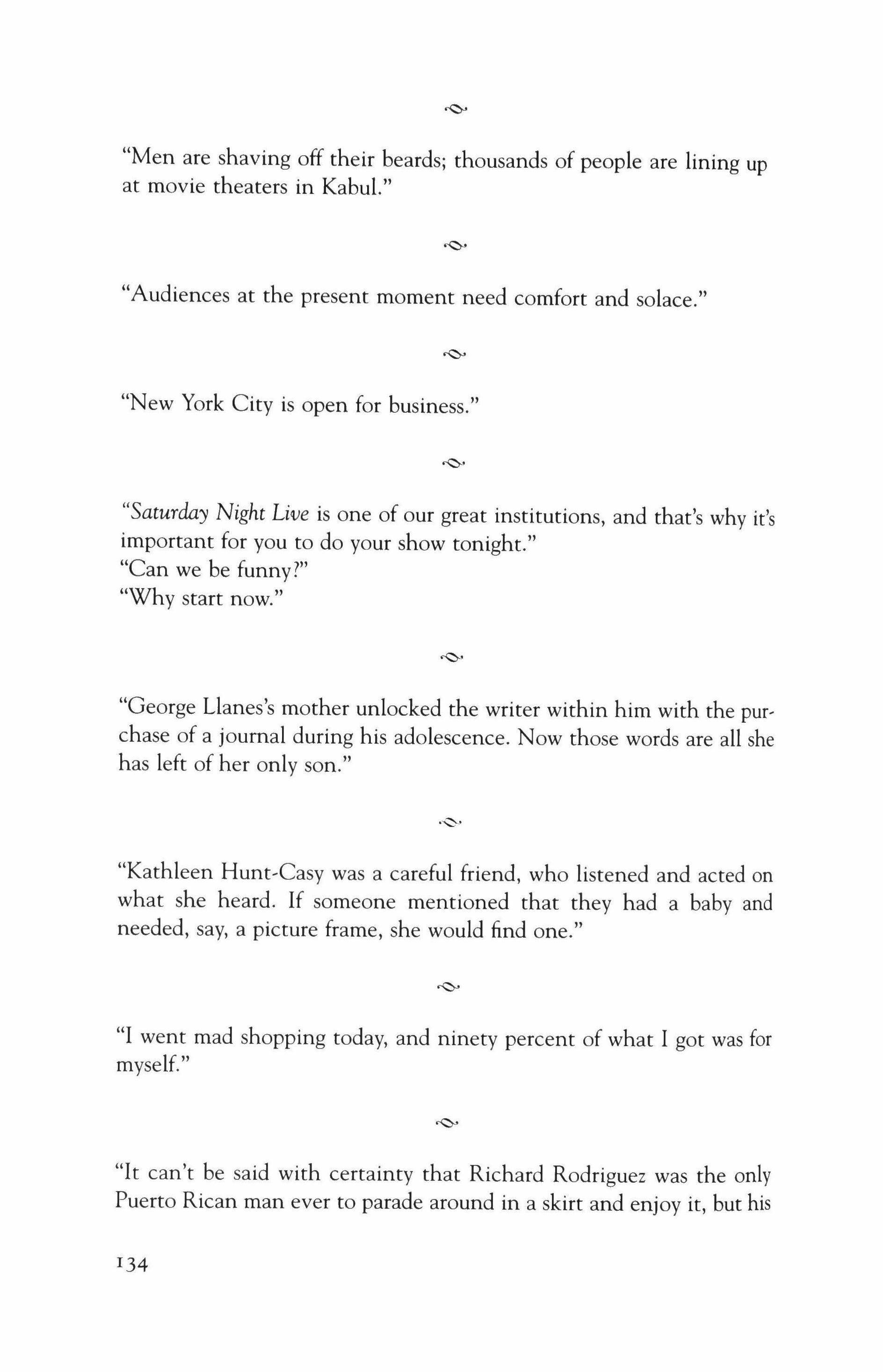
"Audiences at the present moment need comfort and solace."
"New York City is open for business."
"Saturday Night Live is one of our great institutions, and that's why it's important for you to do your show tonight."
"Can we be funny?"
"Why start now."
"George Llanes's mother unlocked the writer within him with the purchase of a journal during his adolescence. Now those words are all she has left of her only son."
"Kathleen Hunt-Casy was a careful friend, who listened and acted on what she heard. If someone mentioned that they had a baby and needed, say, a picture frame, she would find one."
"I went mad shopping today, and ninety percent of what I got was for myself."
"It can't be said with certainty that Richard Rodriguez was the only Puerto Rican man ever to parade around in a skirt and enjoy it, but his
family is certain that no one could have reveled in doing so more than he did. A drummer in the Port Authority's Emerald Society Pipes and Drums, officer Rodriguez was as proud of being a police officer as he was of his Latin heritage. And he didn't mind putting on a kilt and mixing the two. 'He used to say he was breaking barriers,' said his wife Cindy."
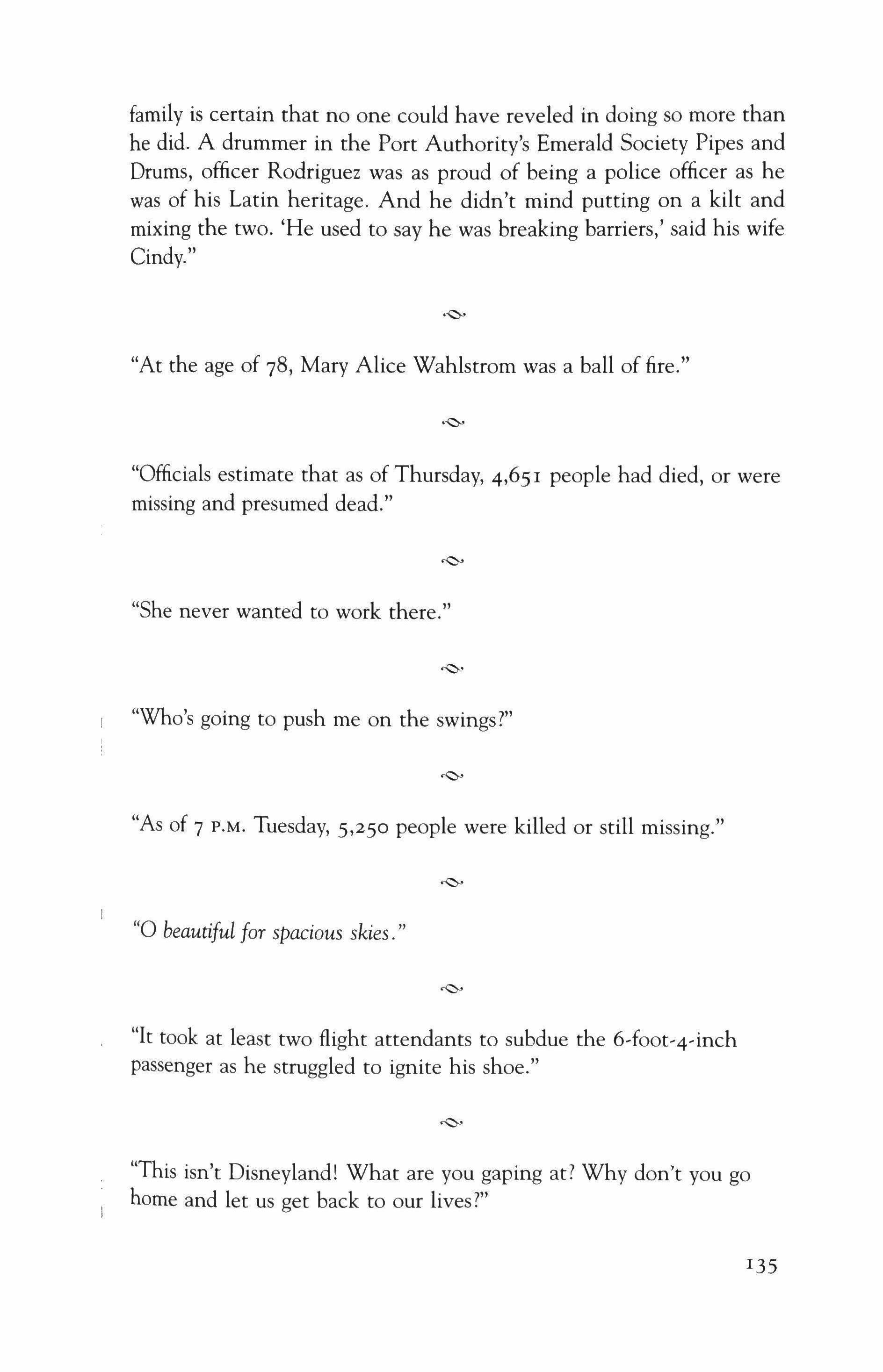
"At the age of 78, Mary Alice Wahlstrom was a ball of fire."
"Officials estimate that as of Thursday, 4,65 I people had died, or were missing and presumed dead."
"She never wanted to work there."
"Who's going to push me on the swings?"
"As of 7 P.M. Tuesday, 5,250 people were killed or still missing."
"0 beautiful for spacious skies."
"It took at least two flight attendants to subdue the o-foor-a-inch passenger as he struggled to ignite his shoe."
"This isn't Disneyland! What are you gaping at? Why don't you go home and let us get back to our lives?"
"My mom is down there, whatever is left of her, and I don't want to see some commercial skyscraper built on top of her."

"God bless America."
"Ya' did good, Rudy, you didn't fuck up."
"In times of crisis, we must all decide again and again whom we love."
"We may never know why he turned his back on our country and our values."
"I still can't sleep. I see those planes in my dreams, crashing into the towers over and over again."
"Officials estimate that as of Friday, 3,187 people had died, or were missing and presumed dead, not including 19 hijackers."
"What's the difference between detainees and prisoners?"
"City officials estimate that as of Wednesday, 2,992 people had died, or were missing and presumed dead."

"This place has to be sanctified."
"Tally of dead and missing 2,883."
"These dogs are depressed."
"She was one of the few hundred actually identified and confirmed dead; and although they only found her foot, she was buried in a casket."
"343 firefighters."
"This is the slaughter of the spy journalist, the Jew Daniel Pearl."
"What is coming to America will not, by the will of God, be less than what has come."
"With us or against us."
"There is no weakness in reexamining policies that lead to terrorism-we'd be fools not to."
"Not for one moment have I thought or felt the way my words are now being interpreted in the press."
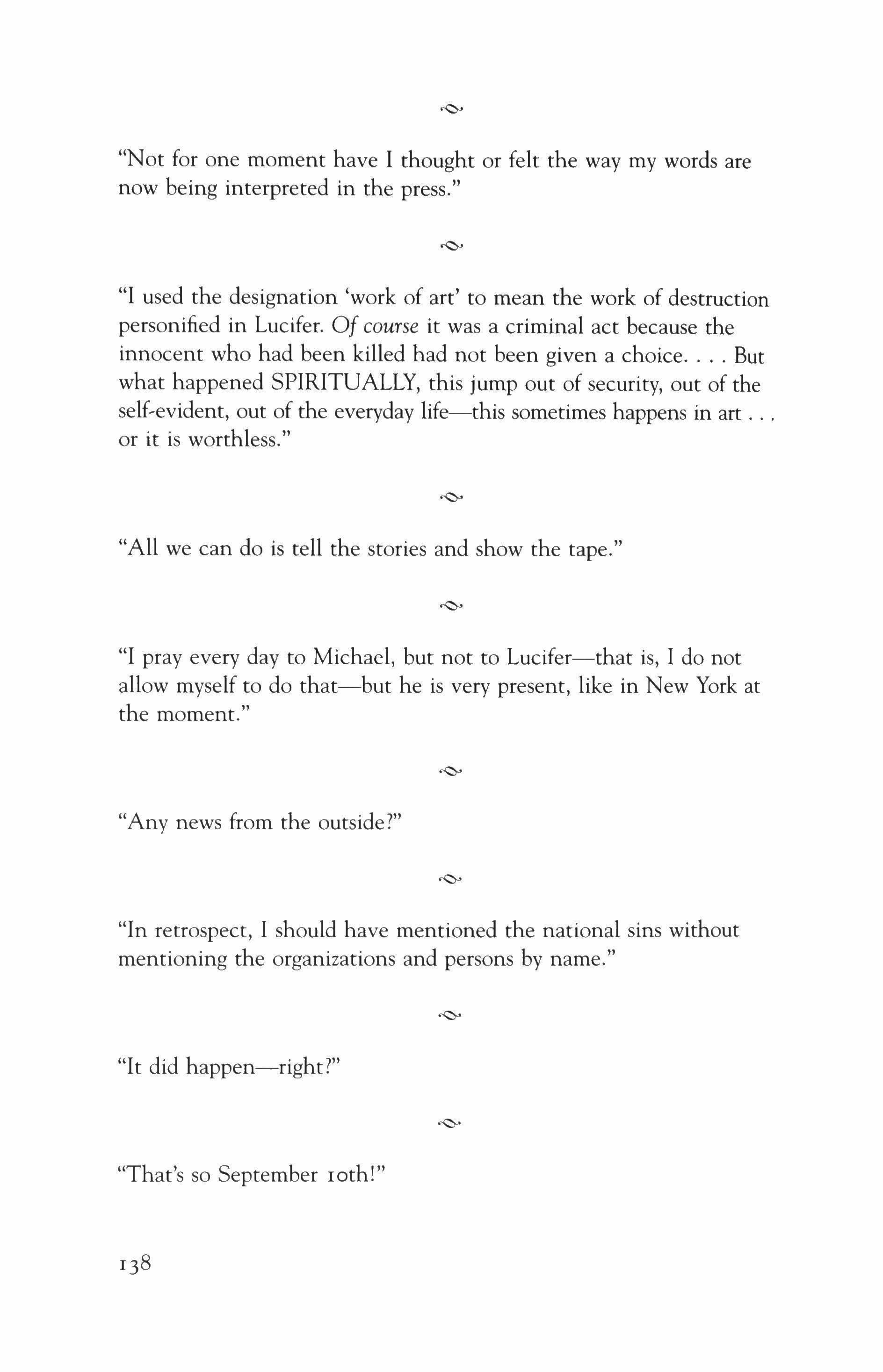
"I used the designation 'work of art' to mean the work of destruction personified in Lucifer. Of course it was a criminal act because the innocent who had been killed had not been given a choice But what happened SPIRITUALLY, this jump out of security, out of the self-evident, out of the everyday life-this sometimes happens in art or it is worthless."
"All we can do is tell the stories and show the tape."
"I pray every day to Michael, but not to Lucifer-that is, I do not allow myself to do that-but he is very present, like in New York at the moment."
"Any news from the outside?"
"In retrospect, I should have mentioned the national sins without mentioning the organizations and persons by name."
"It did happen-right?"
"That's so September loth!"

"The elevators are gone."
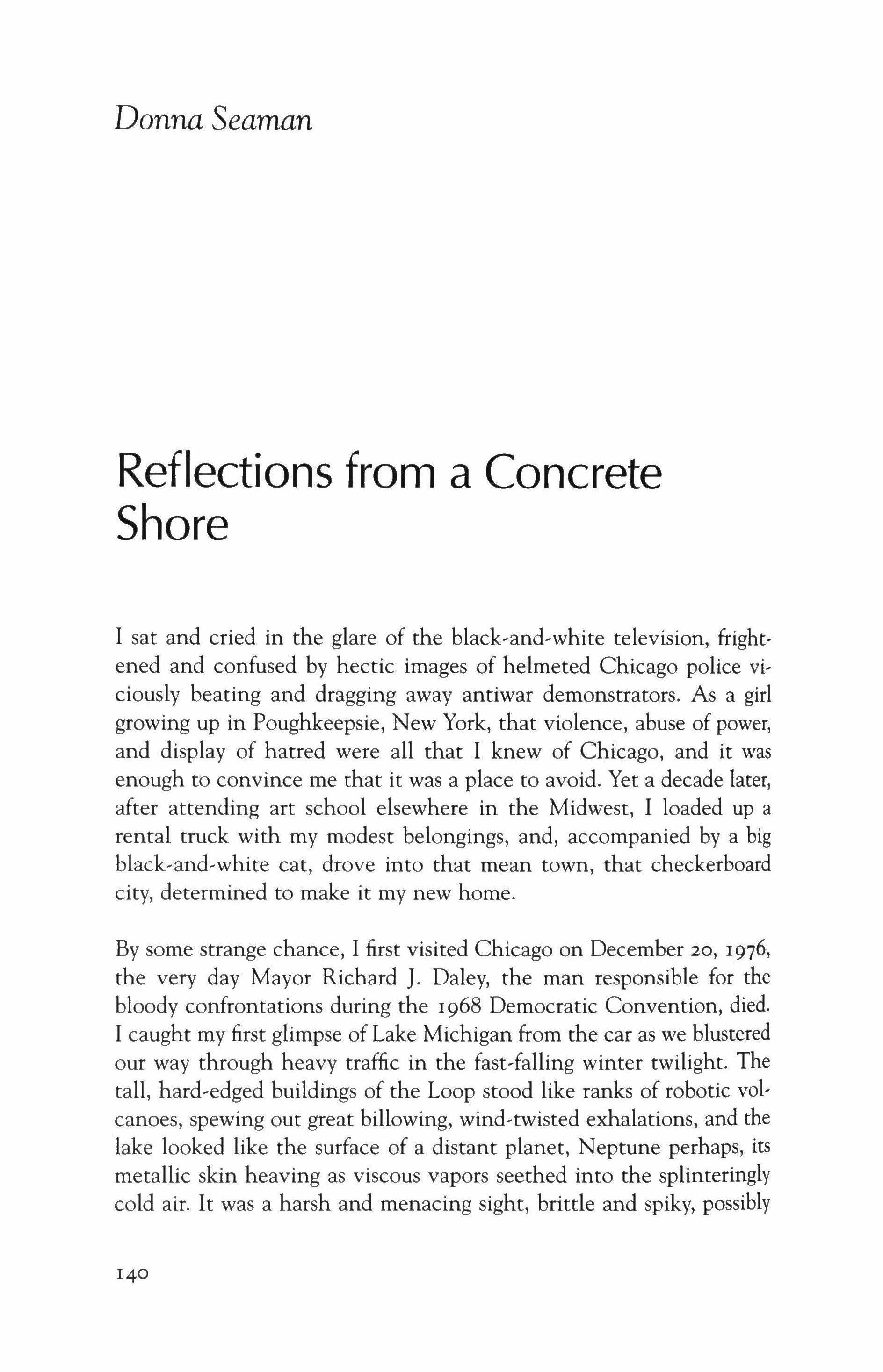
I sat and cried in the glare of the black-and-white television, frightened and confused by hectic images of helmeted Chicago police viciously beating and dragging away antiwar demonstrators. As a girl growing up in Poughkeepsie, New York, that violence, abuse of power, and display of hatred were all that I knew of Chicago, and it was enough to convince me that it was a place to avoid. Yet a decade later, after attending art school elsewhere in the Midwest, I loaded up a rental truck with my modest belongings, and, accompanied by a big black-and-white cat, drove into that mean town, that checkerboard city, determined to make it my new home.
By some strange chance, I first visited Chicago on December 20, 1976, the very day Mayor Richard J. Daley, the man responsible for the bloody confrontations during the 1968 Democratic Convention, died. I caught my first glimpse of Lake Michigan from the car as we blustered our way through heavy traffic in the fast-falling winter twilight. The tall, hard-edged buildings of the Loop stood like ranks of robotic volcanoes, spewing out great billowing, wind-twisted exhalations, and the lake looked like the surface of a distant planet, Neptune perhaps, its metallic skin heaving as viscous vapors seethed into the splinteringly cold air. It was a harsh and menacing sight, brittle and spiky, possibly
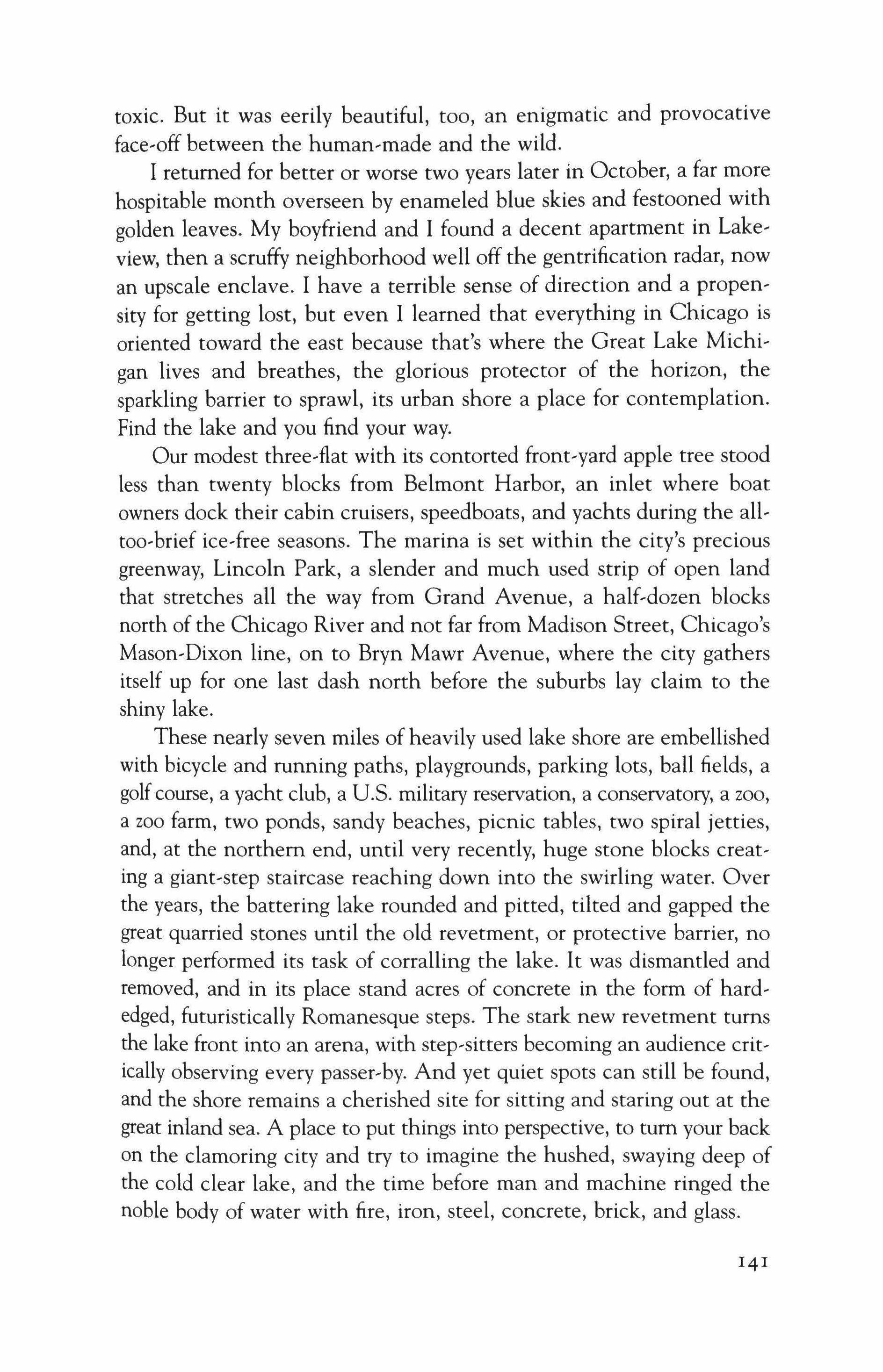
toxic. But it was eerily beautiful, too, an enigmatic and provocative face-off between the human-made and the wild.
I returned for better or worse two years later in October, a far more hospitable month overseen by enameled blue skies and festooned with golden leaves. My boyfriend and I found a decent apartment in Lakeview, then a scruffy neighborhood well off the gentrification radar, now an upscale enclave. I have a terrible sense of direction and a propensity for getting lost, but even I learned that everything in Chicago is oriented toward the east because that's where the Great Lake Michigan lives and breathes, the glorious protector of the horizon, the sparkling barrier to sprawl, its urban shore a place for contemplation. Find the lake and you find your way.
Our modest three-flat with its contorted front-yard apple tree stood less than twenty blocks from Belmont Harbor, an inlet where boat owners dock their cabin cruisers, speedboats, and yachts during the alltoo-brief ice-free seasons. The marina is set within the city's precious greenway, Lincoln Park, a slender and much used strip of open land that stretches all the way from Grand Avenue, a half-dozen blocks north of the Chicago River and not far from Madison Street, Chicago's Mason-Dixon line, on to Bryn Mawr Avenue, where the city gathers itself up for one last dash north before the suburbs lay claim to the shiny lake.
These nearly seven miles of heavily used lake shore are embellished with bicycle and running paths, playgrounds, parking lots, ball fields, a golf course, a yacht club, a U.S. military reservation, a conservatory, a zoo, a zoo farm, two ponds, sandy beaches, picnic tables, two spiral jetties, and, at the northern end, until very recently, huge stone blocks creating a giant-step staircase reaching down into the swirling water. Over the years, the battering lake rounded and pitted, tilted and gapped the great quarried stones until the old revetment, or protective barrier, no longer performed its task of corralling the lake. It was dismantled and removed, and in its place stand acres of concrete in the form of hardedged, futuristically Romanesque steps. The stark new revetment turns the lake front into an arena, with step-sitters becoming an audience critically observing every passer-by. And yet quiet spots can still be found, and the shore remains a cherished site for sitting and staring out at the great inland sea. A place to put things into perspective, to tum your back on the clamoring city and try to imagine the hushed, swaying deep of the cold clear lake, and the time before man and machine ringed the noble body of water with fire, iron, steel, concrete, brick, and glass.
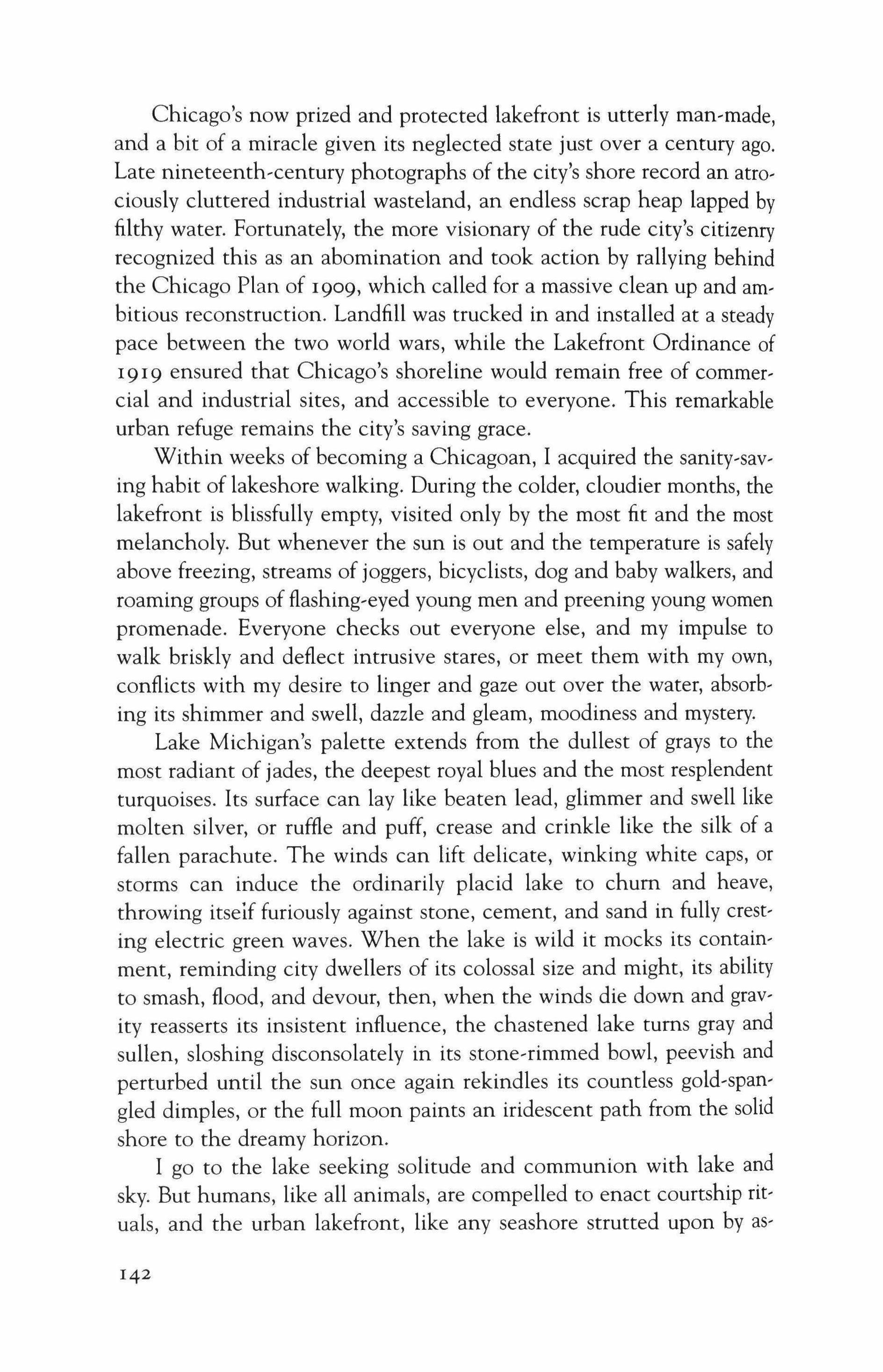
Chicago's now prized and protected lakefront is utterly man-made, and a bit of a miracle given its neglected state just over a century ago. Late nineteenth-century photographs of the city's shore record an atrociously cluttered industrial wasteland, an endless scrap heap lapped by filthy water. Fortunately, the more visionary of the rude city's citizenry recognized this as an abomination and took action by rallying behind the Chicago Plan of 1909, which called for a massive clean up and ambitious reconstruction. Landfill was trucked in and installed at a steady pace between the two world wars, while the Lakefront Ordinance of 1919 ensured that Chicago's shoreline would remain free of commercial and industrial sites, and accessible to everyone. This remarkable urban refuge remains the city's saving grace.
Within weeks of becoming a Chicagoan, I acquired the sanity-saving habit of lakeshore walking. During the colder, cloudier months, the lakefront is blissfully empty, visited only by the most fit and the most melancholy. But whenever the sun is out and the temperature is safely above freezing, streams of joggers, bicyclists, dog and baby walkers, and roaming groups of flashing-eyed young men and preening young women promenade. Everyone checks out everyone else, and my impulse to walk briskly and deflect intrusive stares, or meet them with my own, conflicts with my desire to linger and gaze out over the water, absorbing its shimmer and swell, dazzle and gleam, moodiness and mystery.
Lake Michigan's palette extends from the dullest of grays to the most radiant of jades, the deepest royal blues and the most resplendent turquoises. Its surface can lay like beaten lead, glimmer and swell like molten silver, or ruffle and puff, crease and crinkle like the silk of a fallen parachute. The winds can lift delicate, winking white caps, or storms can induce the ordinarily placid lake to chum and heave, throwing itseif furiously against stone, cement, and sand in fully cresting electric green waves. When the lake is wild it mocks its containment, reminding city dwellers of its colossal size and might, its ability to smash, flood, and devour, then, when the winds die down and gravity reasserts its insistent influence, the chastened lake turns gray and sullen, sloshing disconsolately in its stone-rimmed bowl, peevish and perturbed until the sun once again rekindles its countless gold-spangled dimples, or the full moon paints an iridescent path from the solid shore to the dreamy horizon.
I go to the lake seeking solitude and communion with lake and sky. But humans, like all animals, are compelled to enact courtship rituals, and the urban lakefront, like any seashore strutted upon by as-
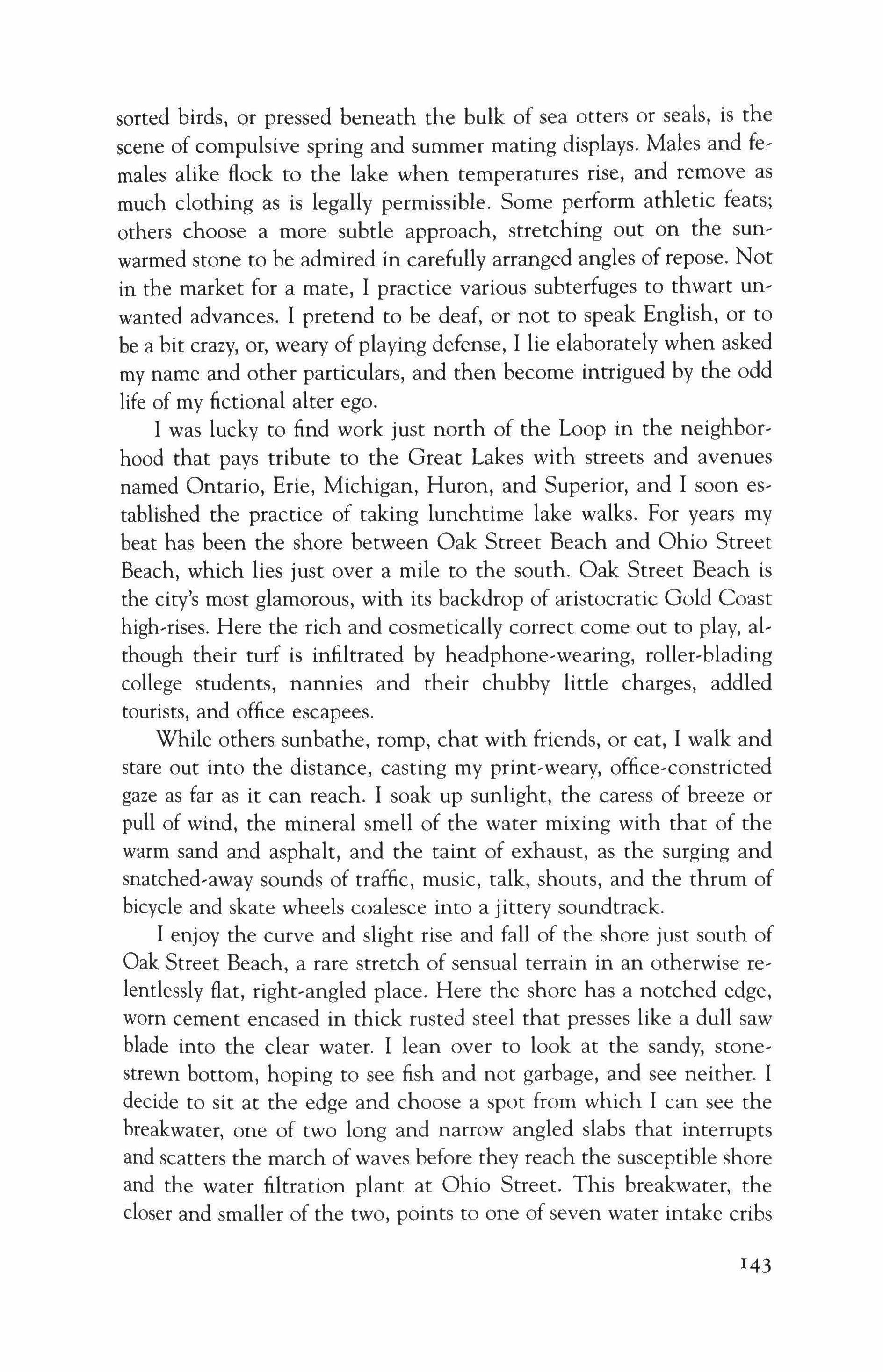
sorted birds, or pressed beneath the bulk of sea otters or seals, is the scene of compulsive spring and summer mating displays. Males and females alike flock to the lake when temperatures rise, and remove as much clothing as is legally permissible. Some perform athletic feats; others choose a more subtle approach, stretching out on the sunwarmed stone to be admired in carefully arranged angles of repose. Not in the market for a mate, I practice various subterfuges to thwart unwanted advances. I pretend to be deaf, or not to speak English, or to be a bit crazy, or, weary of playing defense, I lie elaborately when asked my name and other particulars, and then become intrigued by the odd life of my fictional alter ego.
I was lucky to find work just north of the Loop in the neighborhood that pays tribute to the Great Lakes with streets and avenues named Ontario, Erie, Michigan, Huron, and Superior, and I soon established the practice of taking lunchtime lake walks. For years my beat has been the shore between Oak Street Beach and Ohio Street Beach, which lies just over a mile to the south. Oak Street Beach is the city's most glamorous, with its backdrop of aristocratic Gold Coast high-rises. Here the rich and cosmetically correct come out to play, although their turf is infiltrated by headphone-wearing, roller-blading college students, nannies and their chubby little charges, addled tourists, and office escapees.
While others sunbathe, romp, chat with friends, or eat, I walk and stare out into the distance, casting my print-weary, office-constricted gaze as far as it can reach. I soak up sunlight, the caress of breeze or pull of wind, the mineral smell of the water mixing with that of the warm sand and asphalt, and the taint of exhaust, as the surging and snatched-away sounds of traffic, music, talk, shouts, and the thrum of bicycle and skate wheels coalesce into a jittery soundtrack.
I enjoy the curve and slight rise and fall of the shore just south of Oak Street Beach, a rare stretch of sensual terrain in an otherwise relentlessly flat, right-angled place. Here the shore has a notched edge, worn cement encased in thick rusted steel that presses like a dull saw blade into the clear water. I lean over to look at the sandy, stonestrewn bottom, hoping to see fish and not garbage, and see neither. I decide to sit at the edge and choose a spot from which I can see the breakwater, one of two long and narrow angled slabs that interrupts and scatters the march of waves before they reach the susceptible shore and the water filtration plant at Ohio Street. This breakwater, the closer and smaller of the two, points to one of seven water intake cribs
that asterisk the coast like floating brick mansions. On the outside, or the north face of the breakwater, the lake curls and foams and dashes itself repeatedly against the cement bulwark, feral and insistent. Within the rigid arm's embrace, however, the calm water gleams like glass, mirroring the sky. I relish the contrast, seeing it as emblematic of the division between the tumult of thought and feeling and a cool and collected demeanor.
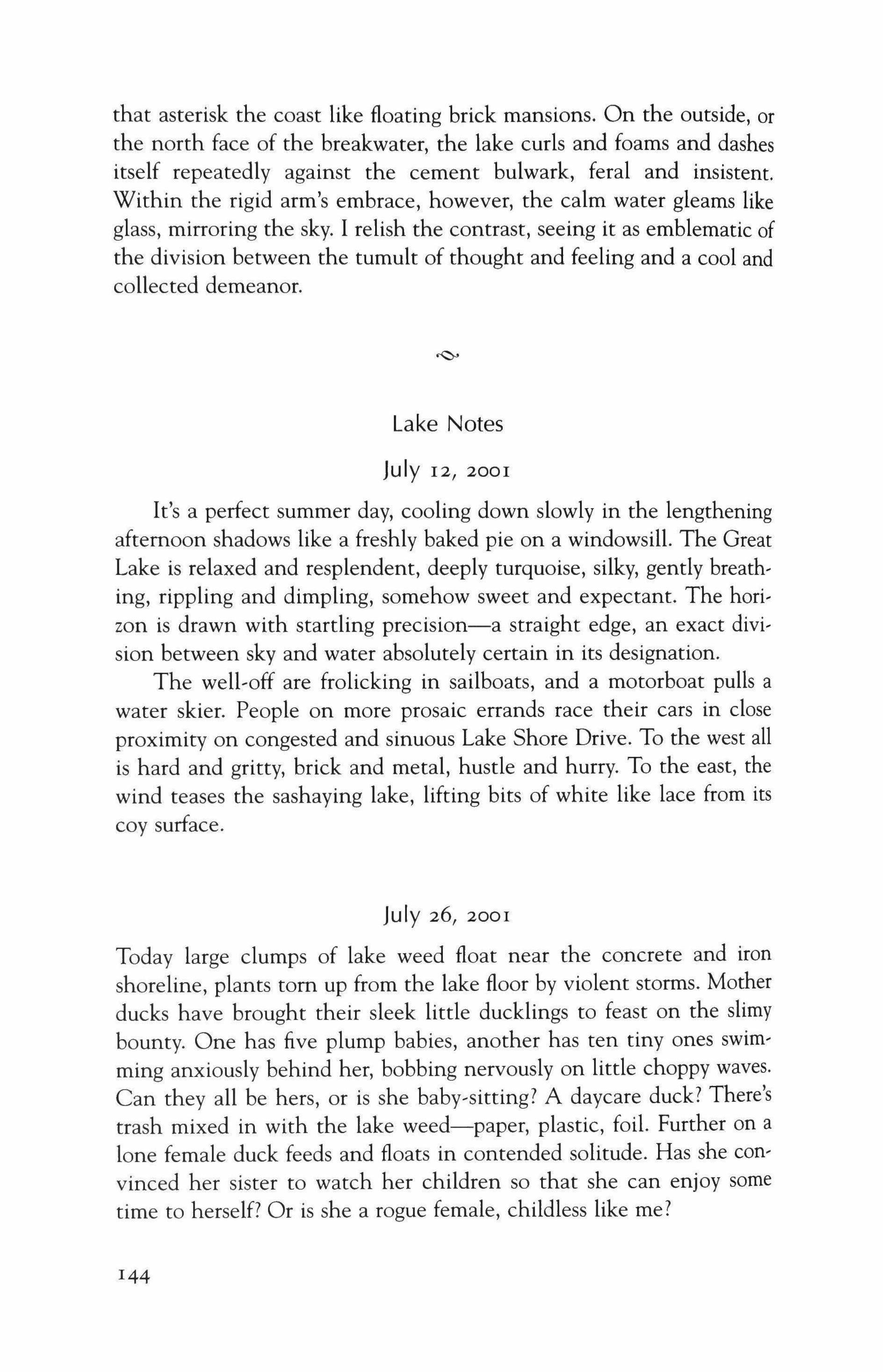
Lake Notes
July 12, 2001
It's a perfect summer day, cooling down slowly in the lengthening afternoon shadows like a freshly baked pie on a windowsill. The Great Lake is relaxed and resplendent, deeply turquoise, silky, gently breathing, rippling and dimpling, somehow sweet and expectant. The horizon is drawn with startling precision-a straight edge, an exact division between sky and water absolutely certain in its designation.
The well-off are frolicking in sailboats, and a motorboat pulls a water skier. People on more prosaic errands race their cars in close proximity on congested and sinuous Lake Shore Drive. To the west all is hard and gritty, brick and metal, hustle and hurry. To the east, the wind teases the sashaying lake, lifting bits of white like lace from its coy surface.
July 26, 2001
Today large clumps of lake weed float near the concrete and iron shoreline, plants tom up from the lake floor by violent storms. Mother ducks have brought their sleek little ducklings to feast on the slimy bounty. One has five plump babies, another has ten tiny ones swimming anxiously behind her, bobbing nervously on little choppy waves. Can they all be hers, or is she baby-sitting? A daycare duck? There's trash mixed in with the lake weed-paper, plastic, foil. Further on a lone female duck feeds and floats in contended solitude. Has she convinced her sister to watch her children so that she can enjoy some time to herself? Or is she a rogue female, childless like me?

The wind nicks the choppy waves, leaving gouges of white. People are swimming further out than before; the water must be warming up. A posse of cops-on-bikes confer, suited up in regulation blue shirts, shorts, and helmets. I'm walking north after crossing beneath the Drive at Chicago Avenue, and when I reach the beach the sound of the surf swells and my heart lifts. The teasing summer winds have taunted and riled the usually lulled and meditative lake, turning it loud and marauding, and it chums in a frenzy of crisscrossing collisions of incoming and outgoing waves. I'm reminded of a magical day on the spiral jetty near Montrose Harbor. It was autumn and cold with a rampaging north wind, and the lake was rushing the jetty like a herd of galloping horses, their white manes streaming behind them, their proud chests and heads and pounding legs surging along the cement curve, snorting and sending up great plumps of spray. I stood in the mist and roar, my own heart pounding, and thought of Neptune riding high on a chariot pulled by great broad-chested horses of the sea.
Back to the present, where the muscled and fashionable are stripped down and arranged on the cement as languidly as though they were lounging on upholstery. Others are not so relaxed, and they sit fully clothed in the hot sun, stiff, hunched, preoccupied, some with headsets fuzzing out the call of the lake, others with eyes cast down, denying themselves the radiance of the scene. I think about video monitors mounted in SUVs, conduits for pop culture that yank the attention of children away from the great outdoors, away from nature. Are these oppressive devices preparing them for a future when there really won't be anything worth looking at outside a vehicle's windows?
It's already like that in the city's dreary outback. There mile after mile of farmland has been transformed into franchised suburbs where retail and fast-food chains-and chains they are, shackling us to the corporate imperative-line the monotonous, dispiriting, automobile dense, stoplight-studded multi-lane streets. One town blends into the next with only the names painted on humongous, mushrooming water towers offering any sign of former discrete settlements. If we continue to brazenly cut down forests, and pave farmlands, wetlands, and meadows, driving myriad plant and animal species into extinction, nature, too, will become homogenized, incorporated, chained, and dull. What appalling loss looms before us? Yet human beings are persistently opti-
mistic and ferociously adaptable creatures, and no doubt future generations will find beauty in their world, however contrived and limited it may be, however smotheringly human.
Four bullet-like planes fly over the lake in tight formation, their pilots practicing for the annual air show, the annual display of military might. Each summer, good citizens mass along the lake shore by the hundreds of thousands, standing beneath the broiling sun and craning their necks to look up at flying, spying, and killing machines that cost far more than most states spend on educating and caring for people, cruel contraptions that burn massive amounts of fossil fuels and fill the poisoned air with raucous, tyrannical noise.
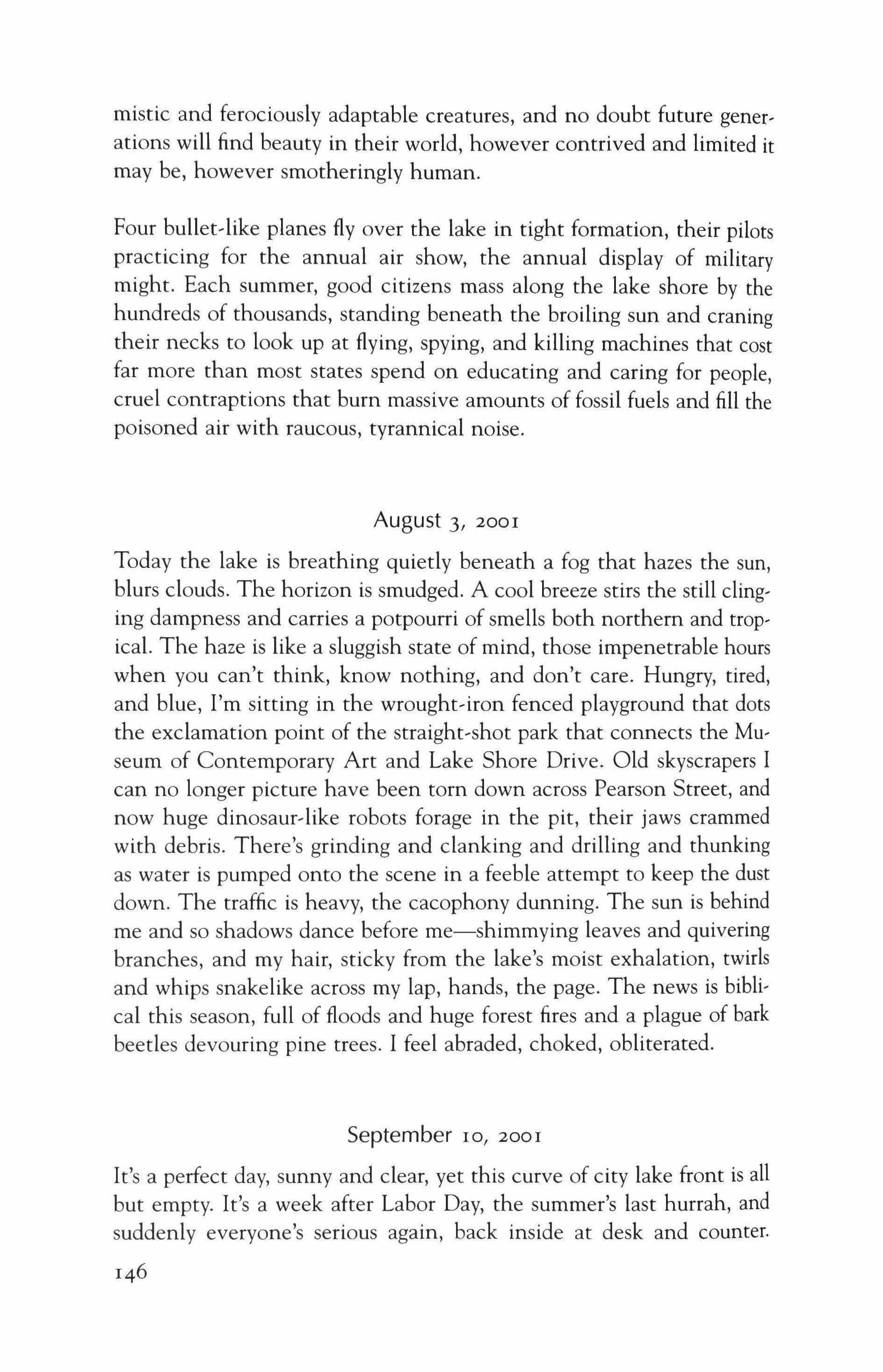
August 3, 2001
Today the lake is breathing quietly beneath a fog that hazes the sun, blurs clouds. The horizon is smudged. A cool breeze stirs the still clinging dampness and carries a potpourri of smells both northern and tropical. The haze is like a sluggish state of mind, those impenetrable hours when you can't think, know nothing, and don't care. Hungry, tired, and blue, I'm sitting in the wrought-iron fenced playground that dots the exclamation point of the straight-shot park that connects the Museum of Contemporary Art and Lake Shore Drive. Old skyscrapers I can no longer picture have been torn down across Pearson Street, and now huge dinosaur-like robots forage in the pit, their jaws crammed with debris. There's grinding and clanking and drilling and thunking as water is pumped onto the scene in a feeble attempt to keep the dust down. The traffic is heavy, the cacophony dunning. The sun is behind me and so shadows dance before me-shimmying leaves and quivering branches, and my hair, sticky from the lake's moist exhalation, twirls and whips snakelike across my lap, hands, the page. The news is biblical this season, full of floods and huge forest fires and a plague of bark beetles devouring pine trees. I feel abraded, choked, obliterated.
September 10, 2001
It's a perfect day, sunny and clear, yet this curve of city lake front is all but empty. It's a week after Labor Day, the summer's last hurrah, and suddenly everyone's serious again, back inside at desk and counter.
Even the ducks and gulls seem to have gone back to work and school. Even the wind is elsewhere occupied. The party is over, but I'm still here, watching. The surface of the water is meshlike today, a cellular membrane. It looks conscious, respiratory.
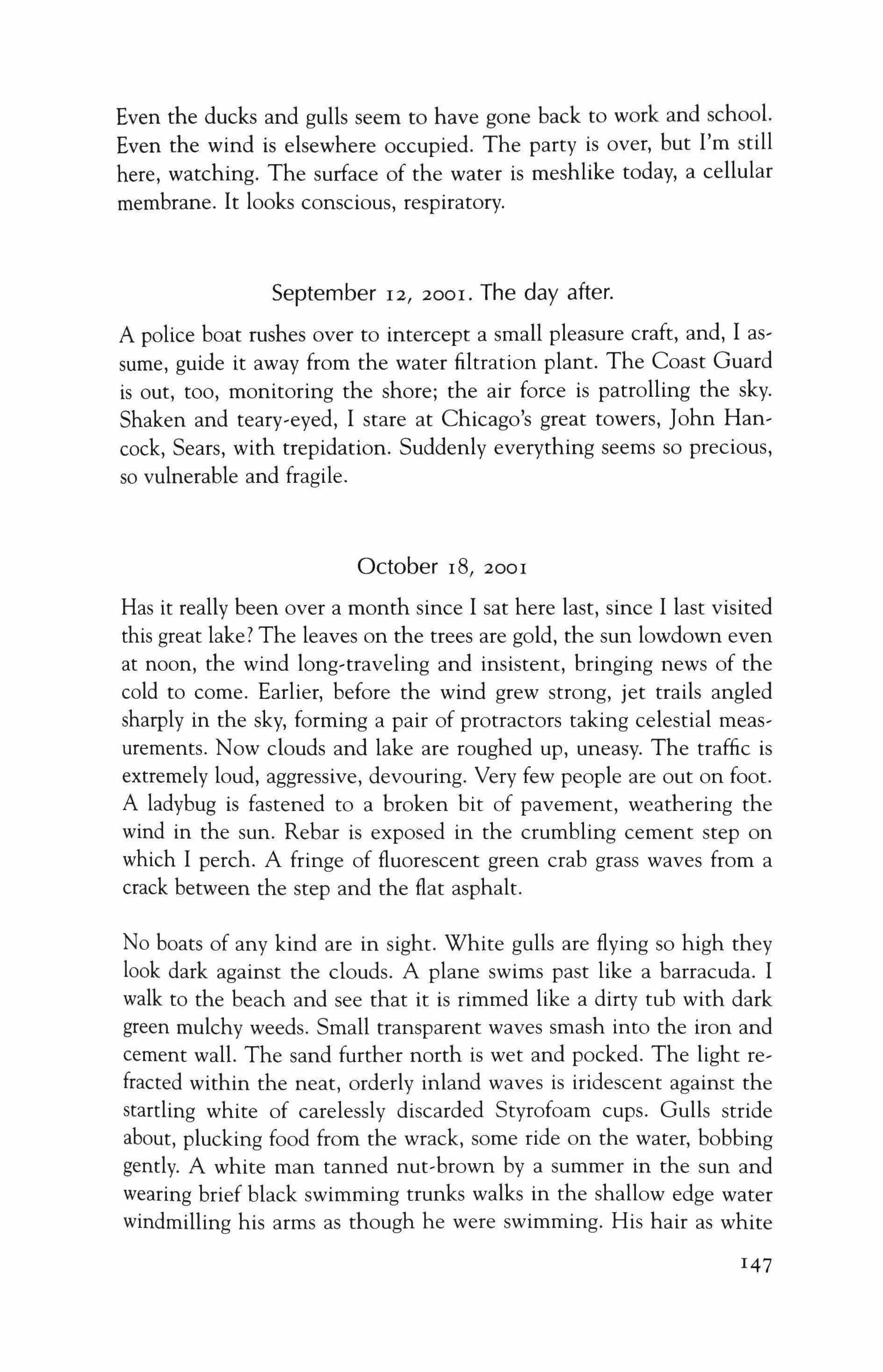
September 12, 2001. The day after.
A police boat rushes over to intercept a small pleasure craft, and, I assume, guide it away from the water filtration plant. The Coast Guard is out, too, monitoring the shore; the air force is patrolling the sky. Shaken and teary-eyed, I stare at Chicago's great towers, John Hancock, Sears, with trepidation. Suddenly everything seems so precious, so vulnerable and fragile.
October 18, 2001
Has it really been over a month since I sat here last, since I last visited this great lake? The leaves on the trees are gold, the sun lowdown even at noon, the wind long-traveling and insistent, bringing news of the cold to come. Earlier, before the wind grew strong, jet trails angled sharply in the sky, forming a pair of protractors taking celestial measurements. Now clouds and lake are roughed up, uneasy. The traffic is extremely loud, aggressive, devouring. Very few people are out on foot. A ladybug is fastened to a broken bit of pavement, weathering the wind in the sun. Rebar is exposed in the crumbling cement step on which I perch. A fringe of fluorescent green crab grass waves from a crack between the step and the flat asphalt.
No boats of any kind are in sight. White gulls are flying so high they look dark against the clouds. A plane swims past like a barracuda. I walk to the beach and see that it is rimmed like a dirty tub with dark green mulchy weeds. Small transparent waves smash into the iron and cement wall. The sand further north is wet and pocked. The light re� fracted within the neat, orderly inland waves is iridescent against the startling white of carelessly discarded Styrofoam cups. Gulls stride about, plucking food from the wrack, some ride on the water, bobbing gently. A white man tanned nut-brown by a summer in the sun and wearing brief black swimming trunks walks in the shallow edge water windmilling his arms as though he were swimming. His hair as white
as the gulls' feathers. Ladybugs are bristly when they fly, spiked and seed-like. Hillocks of sand newly delivered to combat the brutal beachconsuming winds and waves of winter stand like miniature mountain ranges, a shrunken Afghanistan landscape.
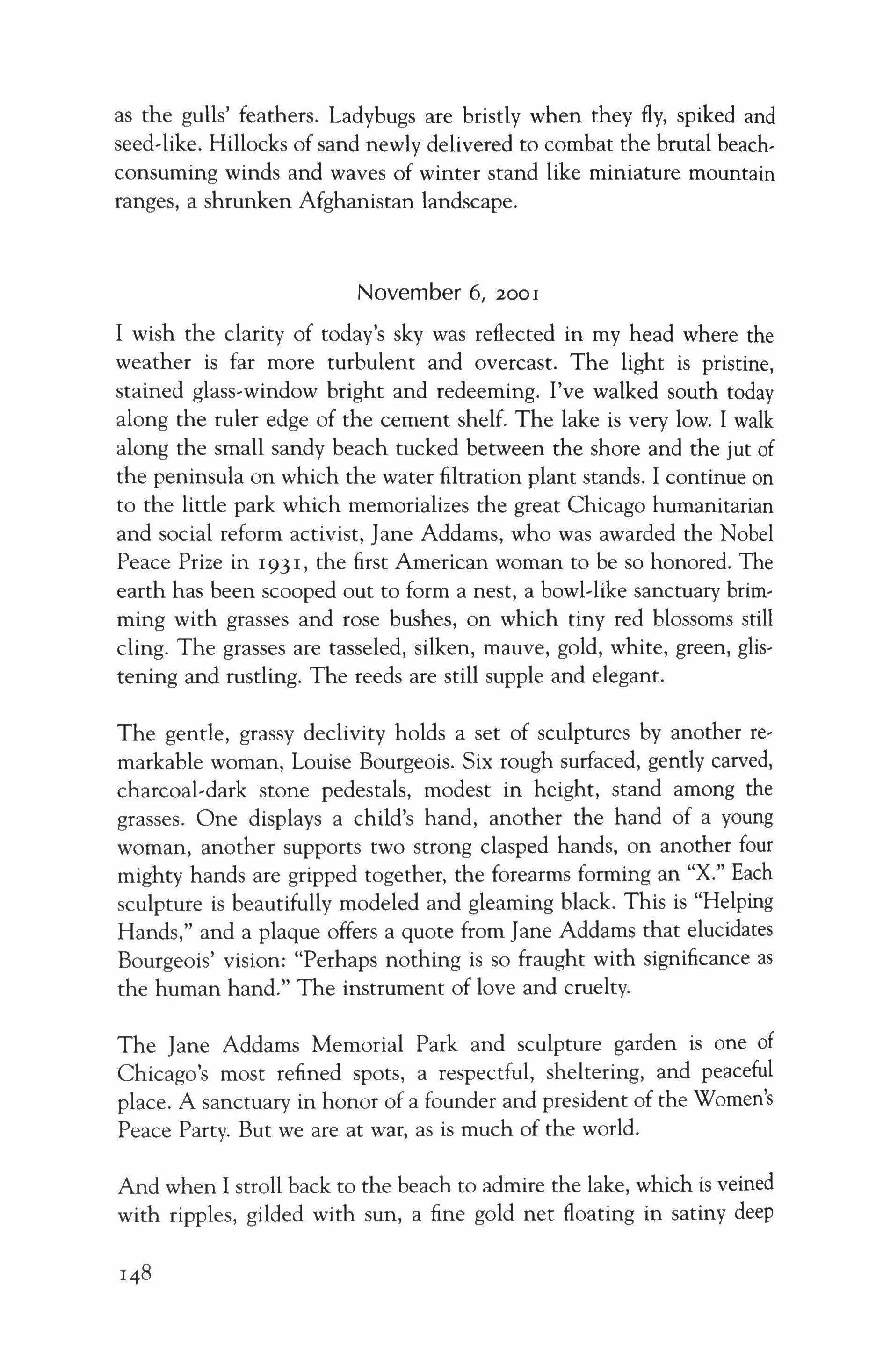
November 6, 2001
I wish the clarity of today's sky was reflected in my head where the weather is far more turbulent and overcast. The light is pristine, stained glass-window bright and redeeming. I've walked south today along the ruler edge of the cement shelf. The lake is very low. I walk along the small sandy beach tucked between the shore and the jut of the peninsula on which the water filtration plant stands. I continue on to the little park which memorializes the great Chicago humanitarian and social reform activist, Jane Addams, who was awarded the Nobel Peace Prize in 1931, the first American woman to be so honored. The earth has been scooped out to form a nest, a bowl-like sanctuary brimming with grasses and rose bushes, on which tiny red blossoms still cling. The grasses are tasseled, silken, mauve, gold, white, green, glistening and rustling. The reeds are still supple and elegant.
The gentle, grassy declivity holds a set of sculptures by another remarkable woman, Louise Bourgeois. Six rough surfaced, gently carved, charcoal-dark stone pedestals, modest in height, stand among the grasses. One displays a child's hand, another the hand of a young woman, another supports two strong clasped hands, on another four mighty hands are gripped together, the forearms forming an "X." Each sculpture is beautifully modeled and gleaming black. This is "Helping Hands," and a plaque offers a quote from Jane Addams that elucidates Bourgeois' vision: "Perhaps nothing is so fraught with significance as the human hand." The instrument of love and cruelty.
The Jane Addams Memorial Park and sculpture garden is one of Chicago's most refined spots, a respectful, sheltering, and peaceful place. A sanctuary in honor of a founder and president of the Women's Peace Party. But we are at war, as is much of the world.
And when I stroll back to the beach to admire the lake, which is veined with ripples, gilded with sun, a fine gold net floating in satiny deep
blue, the serenity of the scene is abruptly shattered by the darting arrival of an ugly red helicopter. It hovers, slashing the air, and growling. Directly beneath it a self,indulgent, angry man demands attention by ripping the water's delicate meshed surface with a monstrous red Jet' Ski, a shrieking, nasty, gas,guzzling, poison-spewing toy. As this decadent man in his clinging wet suit spins and lurches about like a hyper, active boy playing cowboy, his bucking machine looks like a huge cock, his frenzy both masturbatory and rape-like. I stand and stare, rocked by my boiling blood, until I finally force myself to walk unsteadily away, unexpressed anger painting spots before my hardened eyes.
November 19, 2001
It's been deliriously and inappropriately warm for the season. Morning fog bums off by ten A.M. to reveal a blooming blue sky, but the sun is so low the shadows of the buildings block out great dark blue rectangles of the breeze-frilled lake. The air is vapory, the horizon soft, blurry, and to the north the skyline is rendered in powdery pastels. The only creatures I see are humans on wheels. The scant and determined trees are bare and heartbreakingly beautiful in their arabesque arcings. Cal, ligraphic, they cast the graceful script of a lost language against the muted sky.
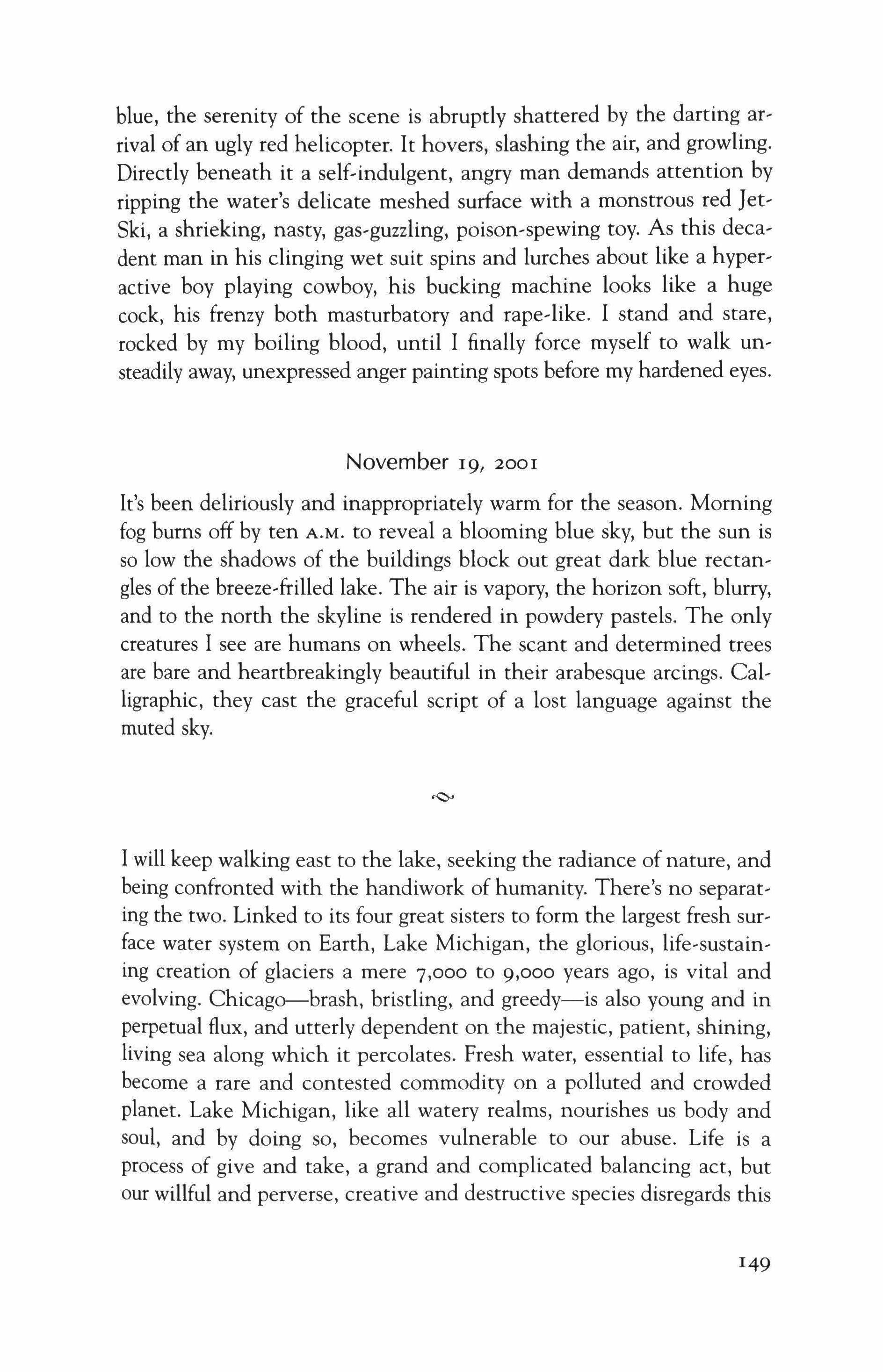
I will keep walking east to the lake, seeking the radiance of nature, and being confronted with the handiwork of humanity. There's no separating the two. Linked to its four great sisters to form the largest fresh sur, face water system on Earth, Lake Michigan, the glorious, life-sustaining creation of glaciers a mere 7,000 to 9,000 years ago, is vital and evolving. Chicago-brash, bristling, and greedy-is also young and in perpetual flux, and utterly dependent on the majestic, patient, shining, living sea along which it percolates. Fresh water, essential to life, has become a rare and contested commodity on a polluted and crowded planet. Lake Michigan, like all watery realms, nourishes us body and soul, and by doing so, becomes vulnerable to our abuse. Life is a process of give and take, a grand and complicated balancing act, but our willful and perverse, creative and destructive species disregards this

dynamic, feeling free to indulge its mysterious and potentially catastrophic fascination with risk, upset, and extremes. Shore walkers and lake watchers must be vigilant, protective, and appreciative to counterbalance those who see the Great Lakes as dumps or playgrounds rather than as entities that are as close to divine as human beings are ever likely to experience.
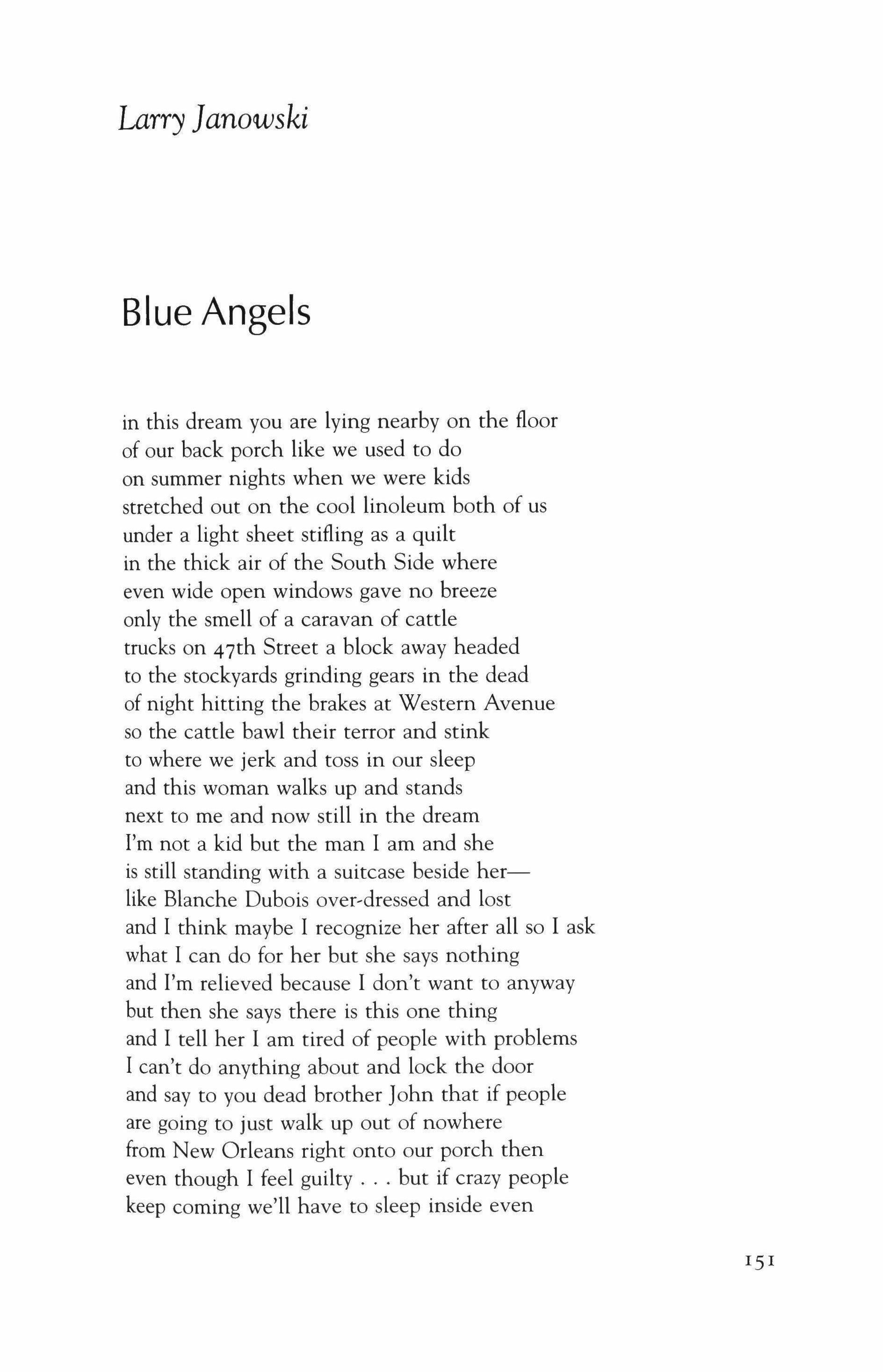
in this dream you are lying nearby on the floor of our back porch like we used to do on summer nights when we were kids stretched out on the cool linoleum both of us under a light sheet stifling as a quilt in the thick air of the South Side where even wide open windows gave no breeze only the smell of a caravan of cattle trucks on 47th Street a block away headed to the stockyards grinding gears in the dead of night hitting the brakes at Western Avenue so the cattle bawl their terror and stink to where we jerk and toss in our sleep and this woman walks up and stands next to me and now still in the dream I'm not a kid but the man I am and she is still standing with a suitcase beside herlike Blanche Dubois over-dressed and lost and I think maybe I recognize her after all so I ask what I can do for her but she says nothing and I'm relieved because I don't want to anyway but then she says there is this one thing and I tell her I am tired of people with problems I can't do anything about and lock the door and say to you dead brother John that if people are going to just walk up out of nowhere from New Orleans right onto our porch then even though I feel guilty but if crazy people keep coming we'll have to sleep inside even
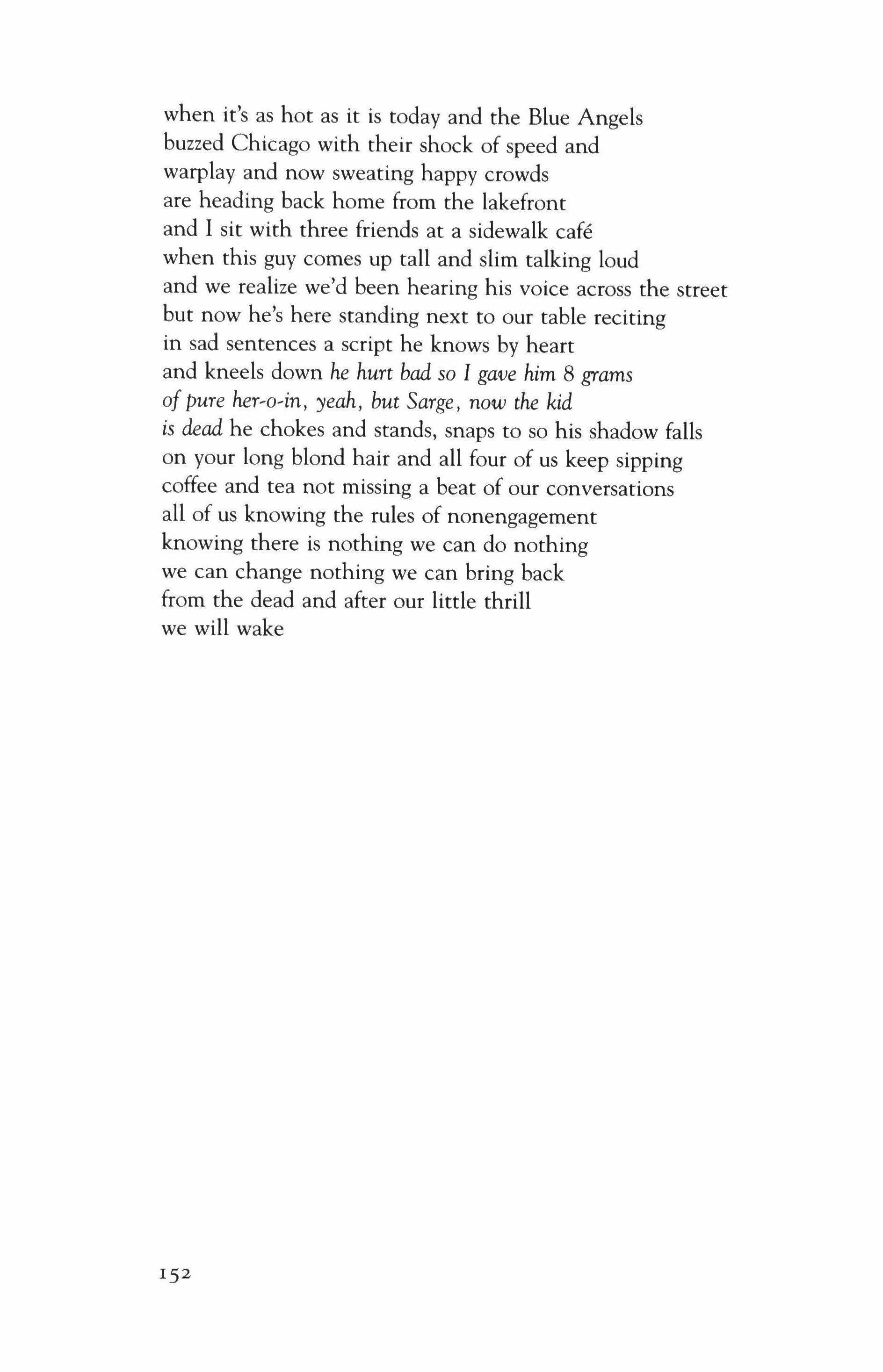
when it's as hot as it is today and the Blue Angels buzzed Chicago with their shock of speed and warplay and now sweating happy crowds are heading back home from the lakefront and I sit with three friends at a sidewalk cafe when this guy comes up tall and slim talking loud and we realize we'd been hearing his voice across the street but now he's here standing next to our table reciting in sad sentences a script he knows by heart and kneels down he hurt bad so I gave him 8 grams of pure her�o�in, yeah, but Sarge, now the kid is dead he chokes and stands, snaps to so his shadow falls on your long blond hair and all four of us keep sipping coffee and tea not missing a beat of our conversations all of us knowing the rules of nonengagement knowing there is nothing we can do nothing we can change nothing we can bring back from the dead and after our little thrill we will wake
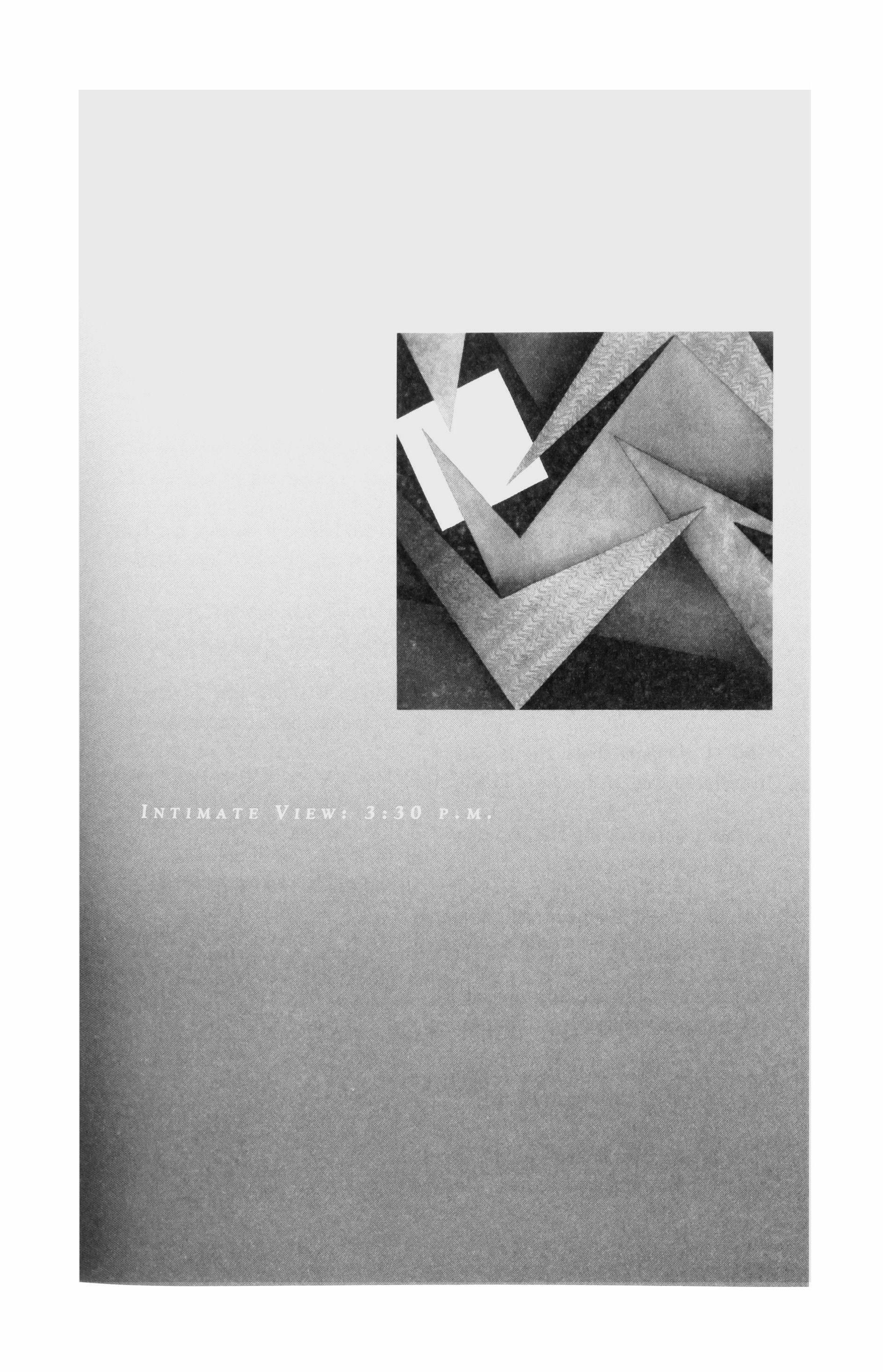
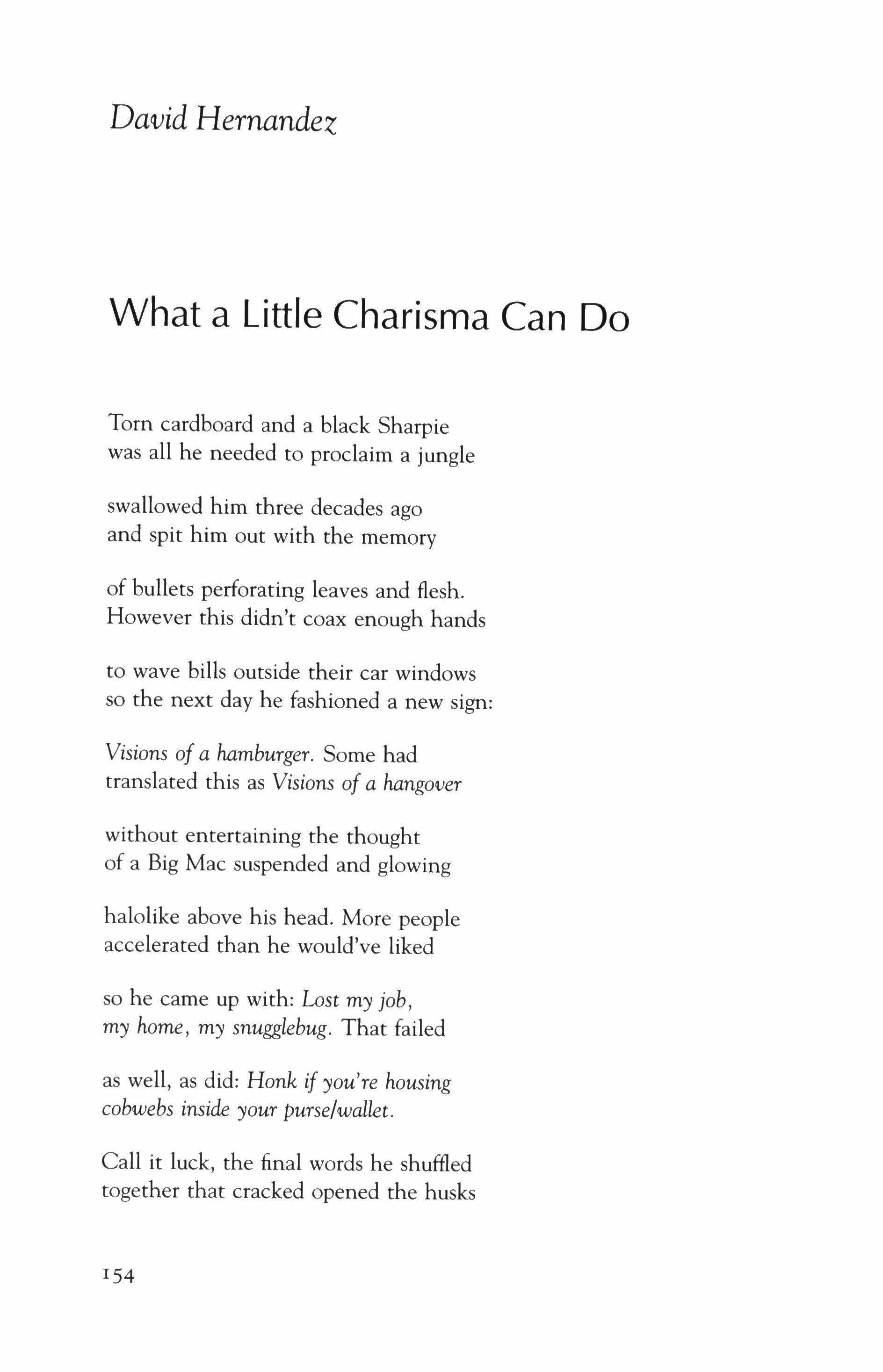
Torn cardboard and a black Sharpie was all he needed to proclaim a jungle
swallowed him three decades ago and spit him out with the memory of bullets perforating leaves and flesh. However this didn't coax enough hands
to wave bills outside their car windows so the next day he fashioned a new sign:
Visions of a hamburger. Some had translated this as Visions of a hangover without entertaining the thought of a Big Mac suspended and glowing
halolike above his head. More people accelerated than he would've liked
so he came up with: Lost my job, my home, my snugglebug. That failed
as well, as did: Honk if you're housing cobwebs inside your purse/wallet.
Call it luck, the final words he shuffled together that cracked opened the husks
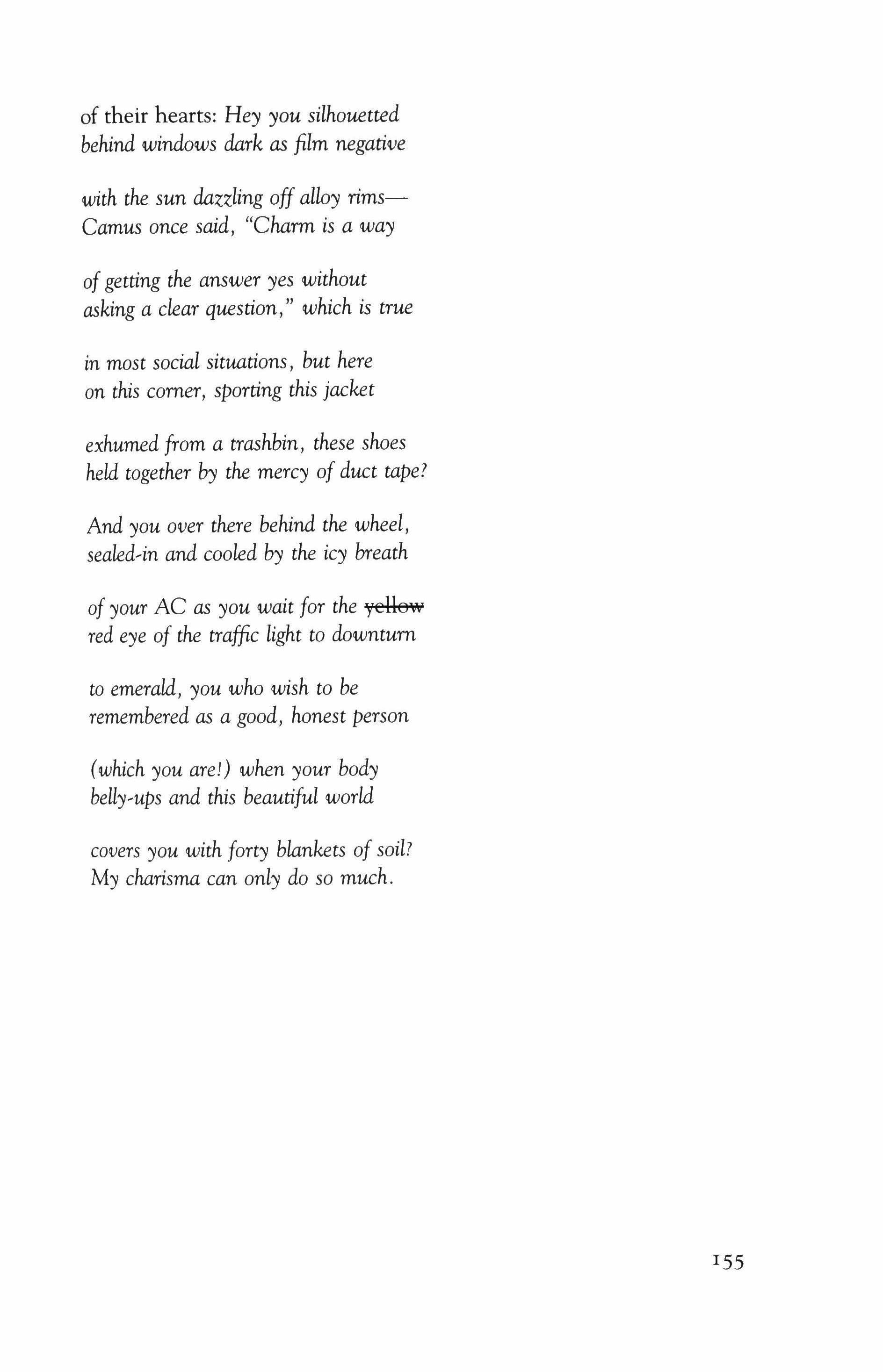
of their hearts: Hey you silhouetted behind windows dark as film negative
with the sun dazzling offalloy rimsCamus once said, "Charm is a way ofgetting the answer yes without asking a clear questioti." which is true in most social situations, but here on this comer, sporting this jacket exhumed from a trashbin, these shoes held together by the mercy of duct tape?
And you over there behind the wheel, sealed,in and cooled by the icy breath of your AC as you wait for the � red eye of the traffic light to downturn
to emerald, you who wish to be remembered as a good, honest person (which you are!) when your body belly,ups and this beautiful world
covers you with forty blankets of soil? My charisma can only do so much.
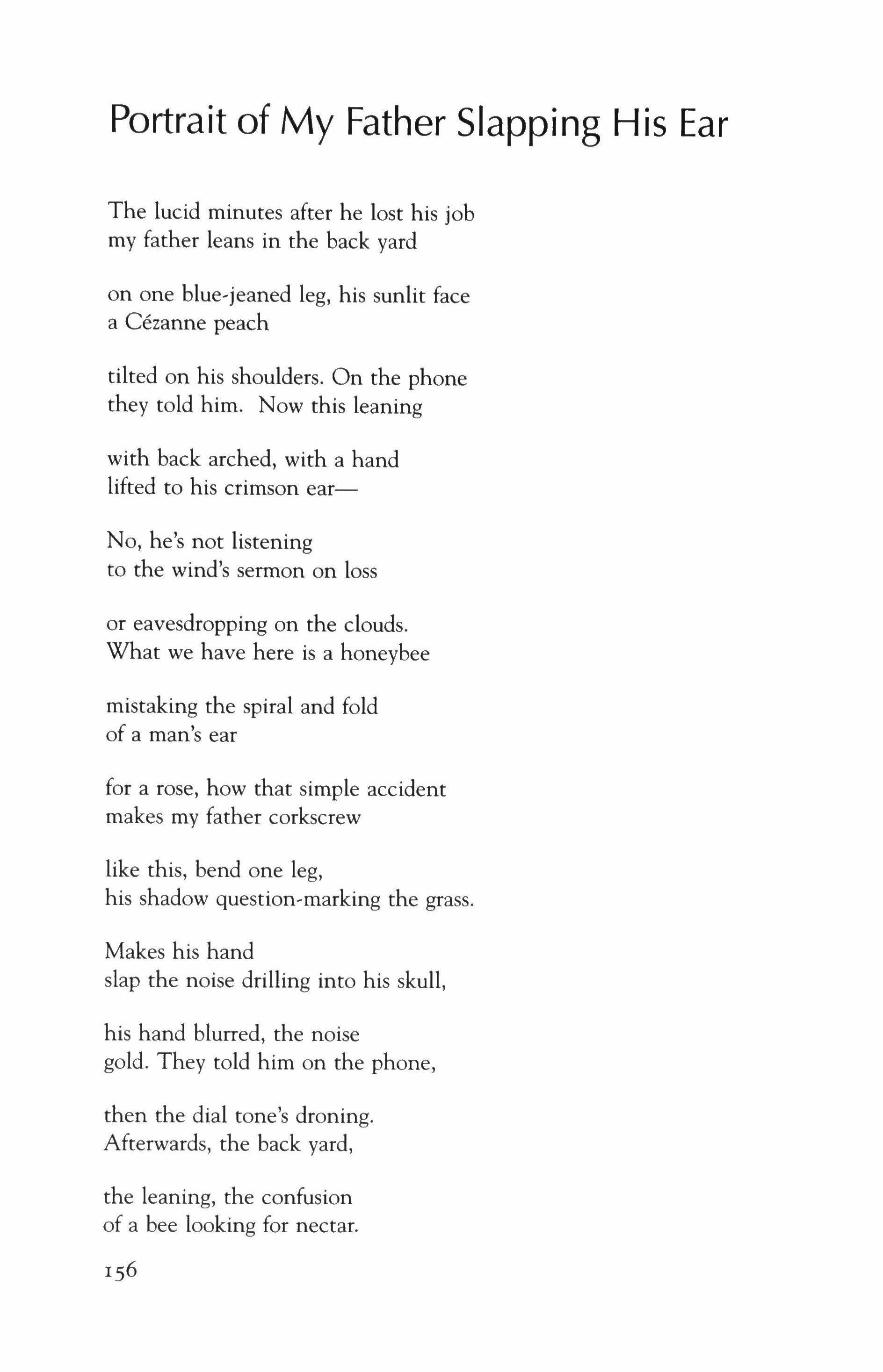
The lucid minutes after he lost his job my father leans in the back yard
on one blue-jeaned leg, his sunlit face a Cezanne peach
tilted on his shoulders. On the phone they told him. Now this leaning with back arched, with a hand lifted to his crimson ear-
No, he's not listening to the wind's sermon on loss or eavesdropping on the clouds. What we have here is a honeybee
mistaking the spiral and fold of a man's ear
for a rose, how that simple accident makes my father corkscrew
like this, bend one leg, his shadow question-marking the grass.
Makes his hand slap the noise drilling into his skull, his hand blurred, the noise gold. They told him on the phone, then the dial tone's droning. Afterwards, the back yard, the leaning, the confusion of a bee looking for nectar.
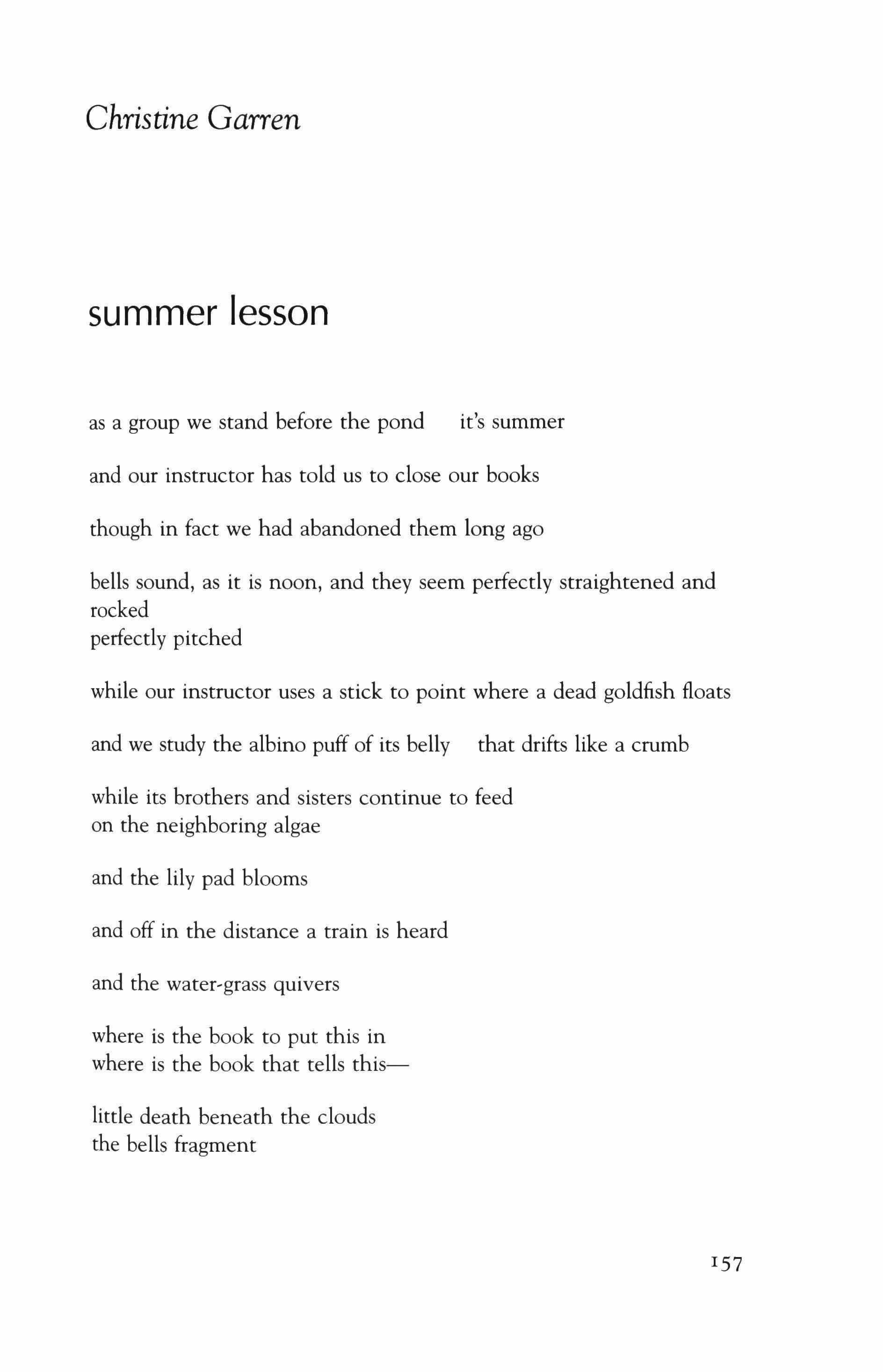
as a group we stand before the pond it's summer and our instructor has told us to close our books
though in fact we had abandoned them long ago
bells sound, as it is noon, and they seem perfectly straightened and rocked perfectly pitched
while our instructor uses a stick to point where a dead goldfish floats and we study the albino puff of its belly that drifts like a crumb while its brothers and sisters continue to feed on the neighboring algae and the lily pad blooms and off in the distance a train is heard and the water-grass quivers
where is the book to put this in where is the book that tells thislittle death beneath the clouds the bells fragment
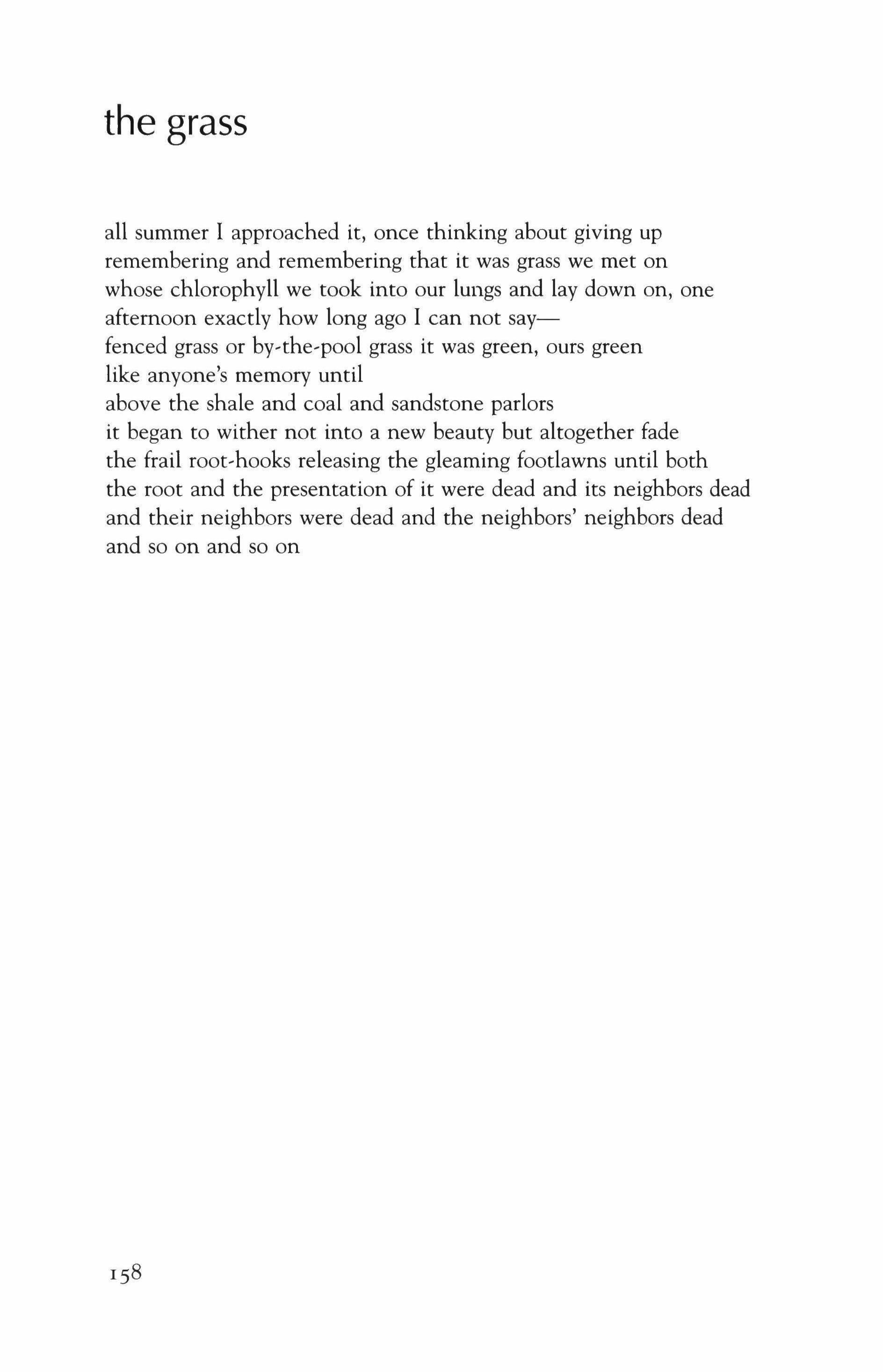
all summer I approached it, once thinking about giving up remembering and remembering that it was grass we met on whose chlorophyll we took into our lungs and lay down on, one afternoon exactly how long ago I can not sayfenced grass or by-the-pool grass it was green, ours green like anyone's memory until above the shale and coal and sandstone parlors it began to wither not into a new beauty but altogether fade the frail root-hooks releasing the gleaming footlawns until both the root and the presentation of it were dead and its neighbors dead and their neighbors were dead and the neighbors' neighbors dead and so on and so on
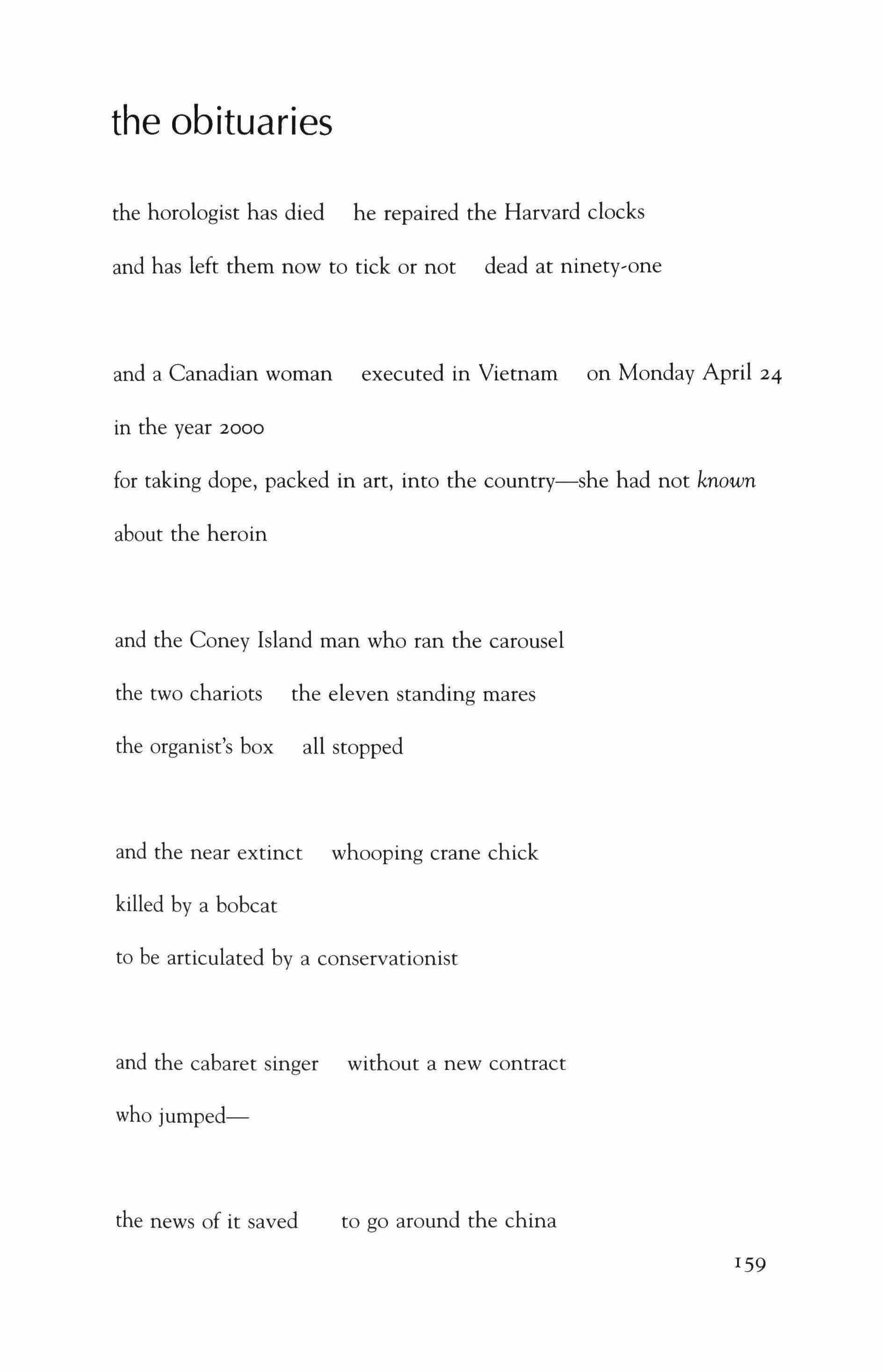
the horologist has died he repaired the Harvard clocks and has left them now to tick or not dead at ninety-one and a Canadian woman executed in Vietnam on Monday April 24 in the year 2000 for taking dope, packed in art, into the country-she had not known about the heroin and the Coney Island man who ran the carousel the two chariots the eleven standing mares the organist's box all stopped and the near extinct whooping crane chick killed by a bobcat to be articulated by a conservationist and the cabaret singer without a new contract who jumpedthe news of it saved to go around the china
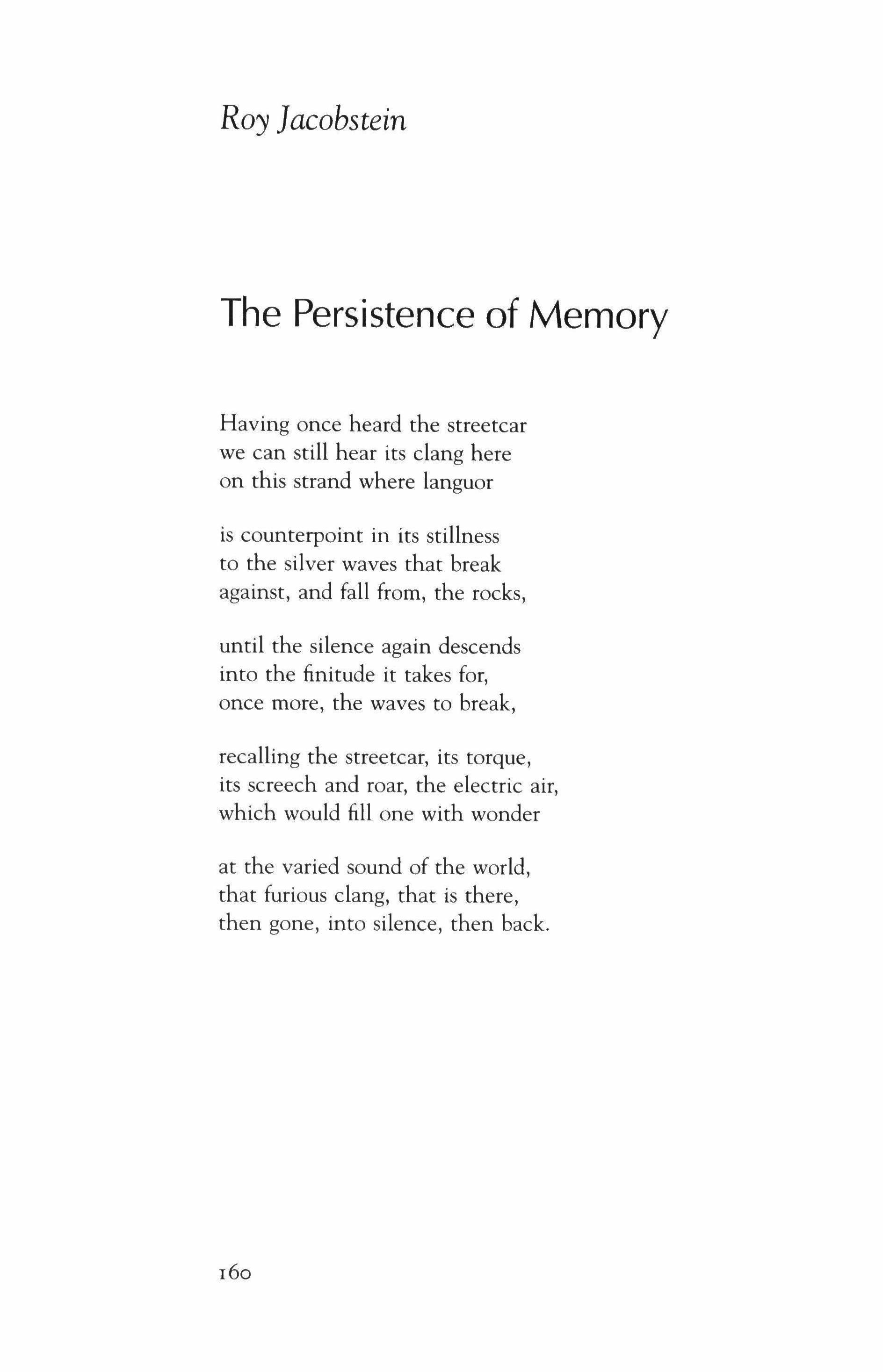
Having once heard the streetcar we can still hear its clang here on this strand where languor is counterpoint in its stillness to the silver waves that break against, and fall from, the rocks, until the silence again descends into the finitude it takes for, once more, the waves to break, recalling the streetcar, its torque, its screech and roar, the electric air, which would fill one with wonder at the varied sound of the world, that furious clang, that is there, then gone, into silence, then back.
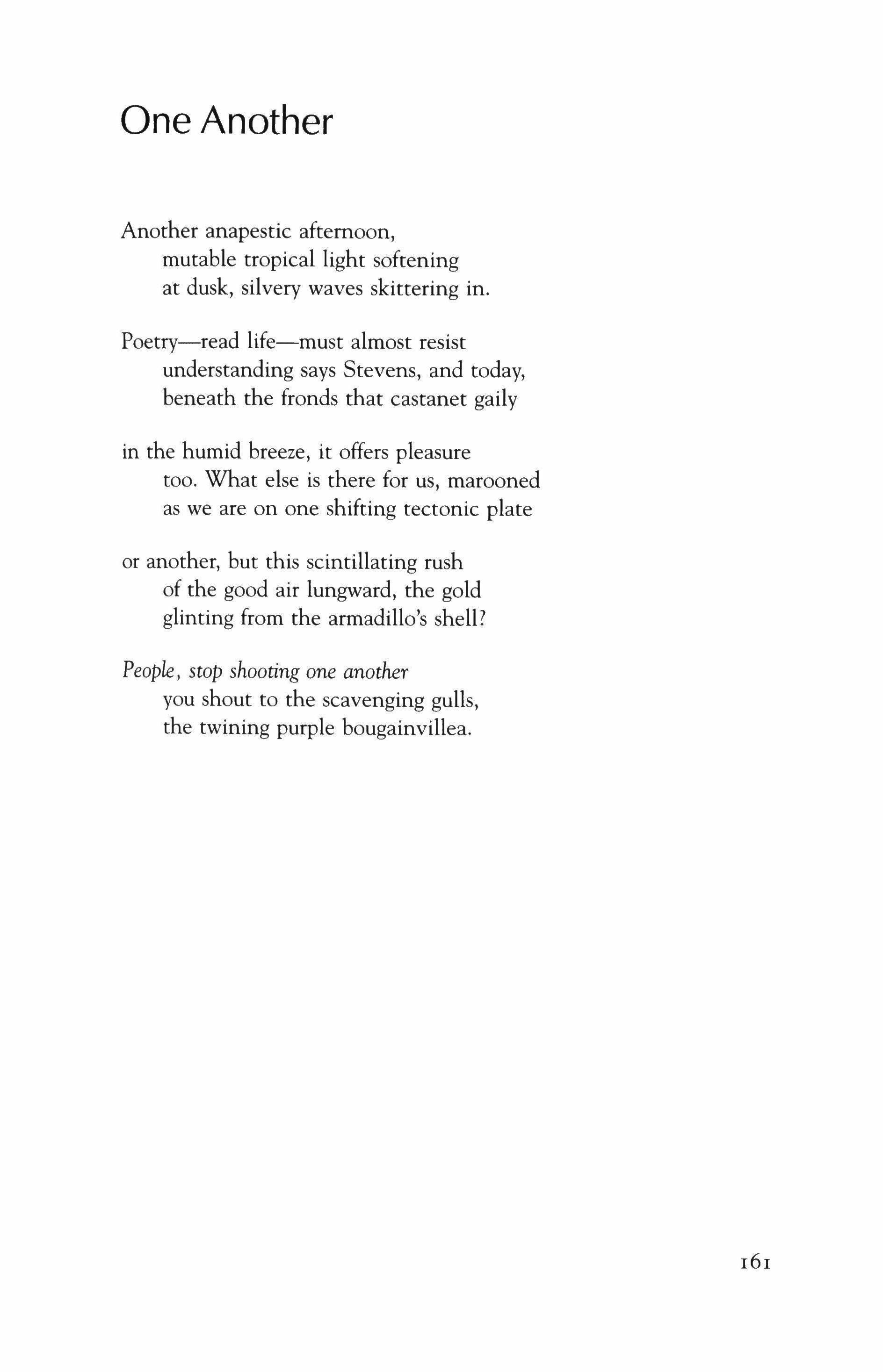
Another anapestic afternoon, mutable tropical light softening at dusk, silvery waves skittering in.
Poetry-read life-must almost resist understanding says Stevens, and today, beneath the fronds that castanet gaily in the humid breeze, it offers pleasure too. What else is there for us, marooned as we are on one shifting tectonic plate or another, but this scintillating rush of the good air lungward, the gold glinting from the armadillo's shell?
People, stop shooting one another you shout to the scavenging gulls, the twining purple bougainvillea.
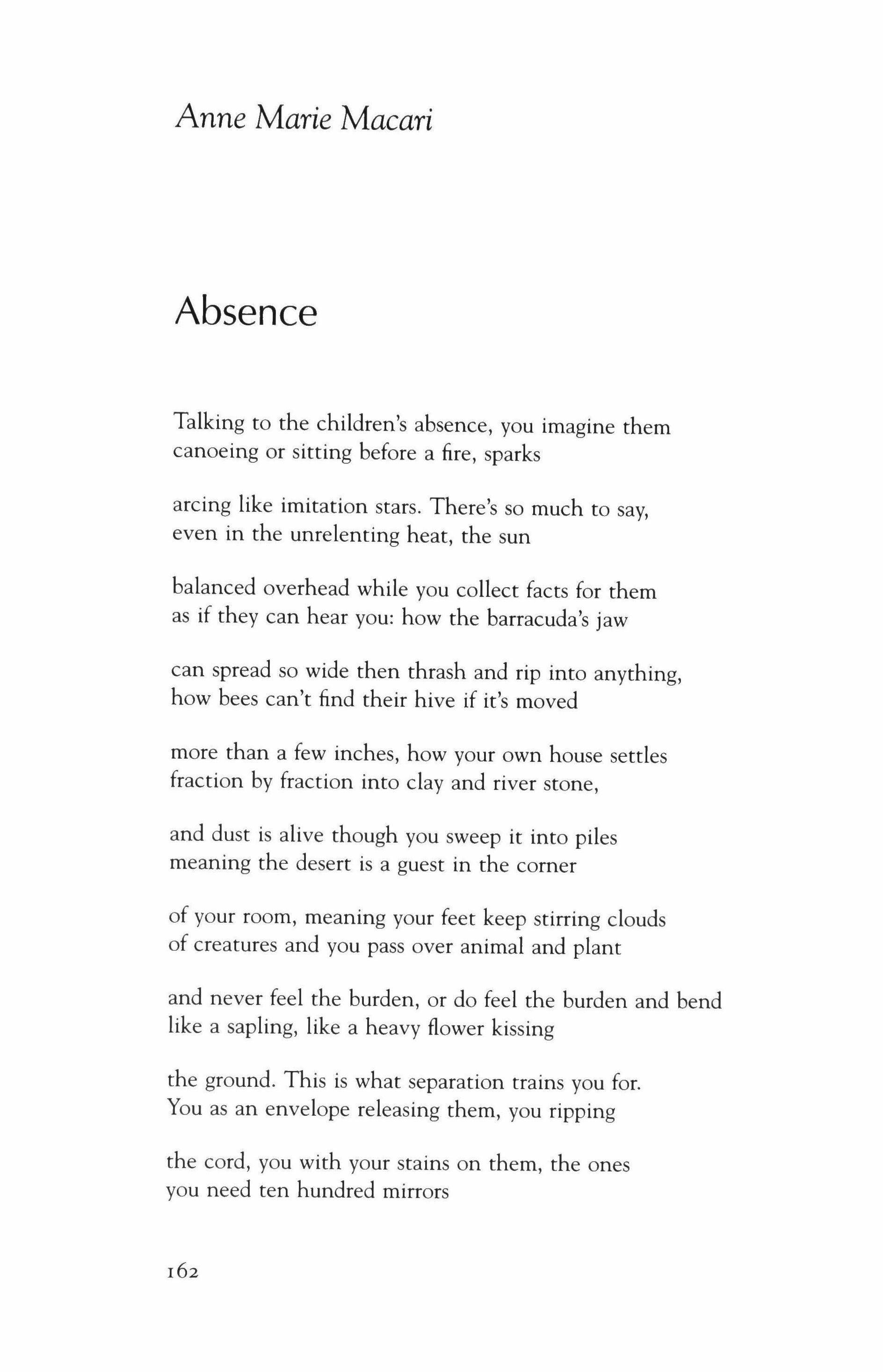
Talking to the children's absence, you imagine them canoeing or sitting before a fire, sparks
arcing like imitation stars. There's so much to say, even in the unrelenting heat, the sun
balanced overhead while you collect facts for them as if they can hear you: how the barracuda's jaw
can spread so wide then thrash and rip into anything, how bees can't find their hive if it's moved
more than a few inches, how your own house settles fraction by fraction into clay and river stone, and dust is alive though you sweep it into piles meaning the desert is a guest in the corner
of your room, meaning your feet keep stirring clouds of creatures and you pass over animal and plant and never feel the burden, or do feel the burden and bend like a sapling, like a heavy flower kissing
the ground. This is what separation trains you for. You as an envelope releasing them, you ripping the cord, you with your stains on them, the ones you need ten hundred mirrors
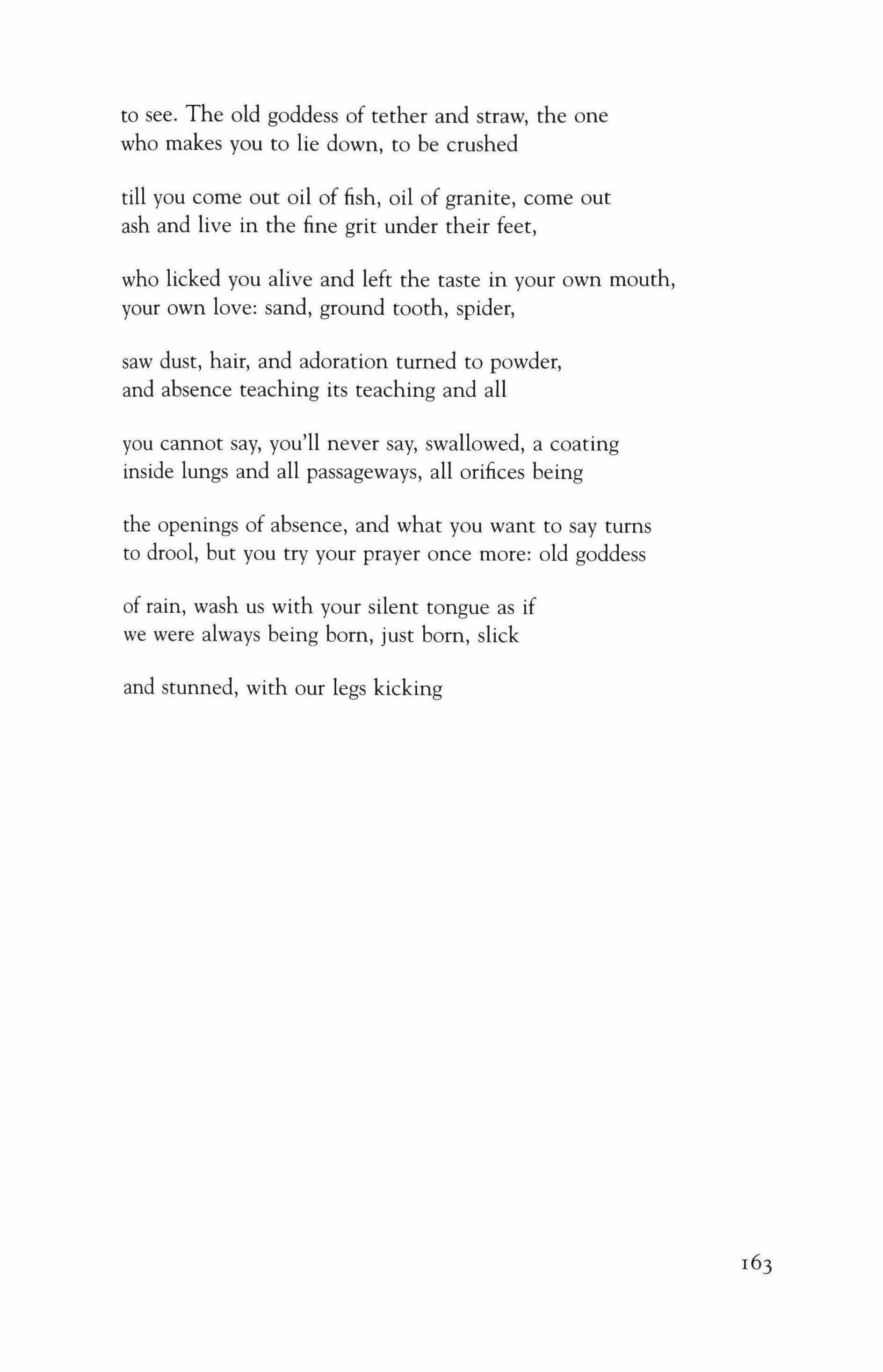
to see. The old goddess of tether and straw, the one who makes you to lie down, to be crushed
till you come out oil of fish, oil of granite, come out ash and live in the fine grit under their feet,
who licked you alive and left the taste in your own mouth, your own love: sand, ground tooth, spider,
saw dust, hair, and adoration turned to powder, and absence teaching its teaching and all
you cannot say, you'll never say, swallowed, a coating inside lungs and all passageways, all orifices being the openings of absence, and what you want to say turns to drool, but you try your prayer once more: old goddess of rain, wash us with your silent tongue as if we were always being born, just born, slick and stunned, with our legs kicking
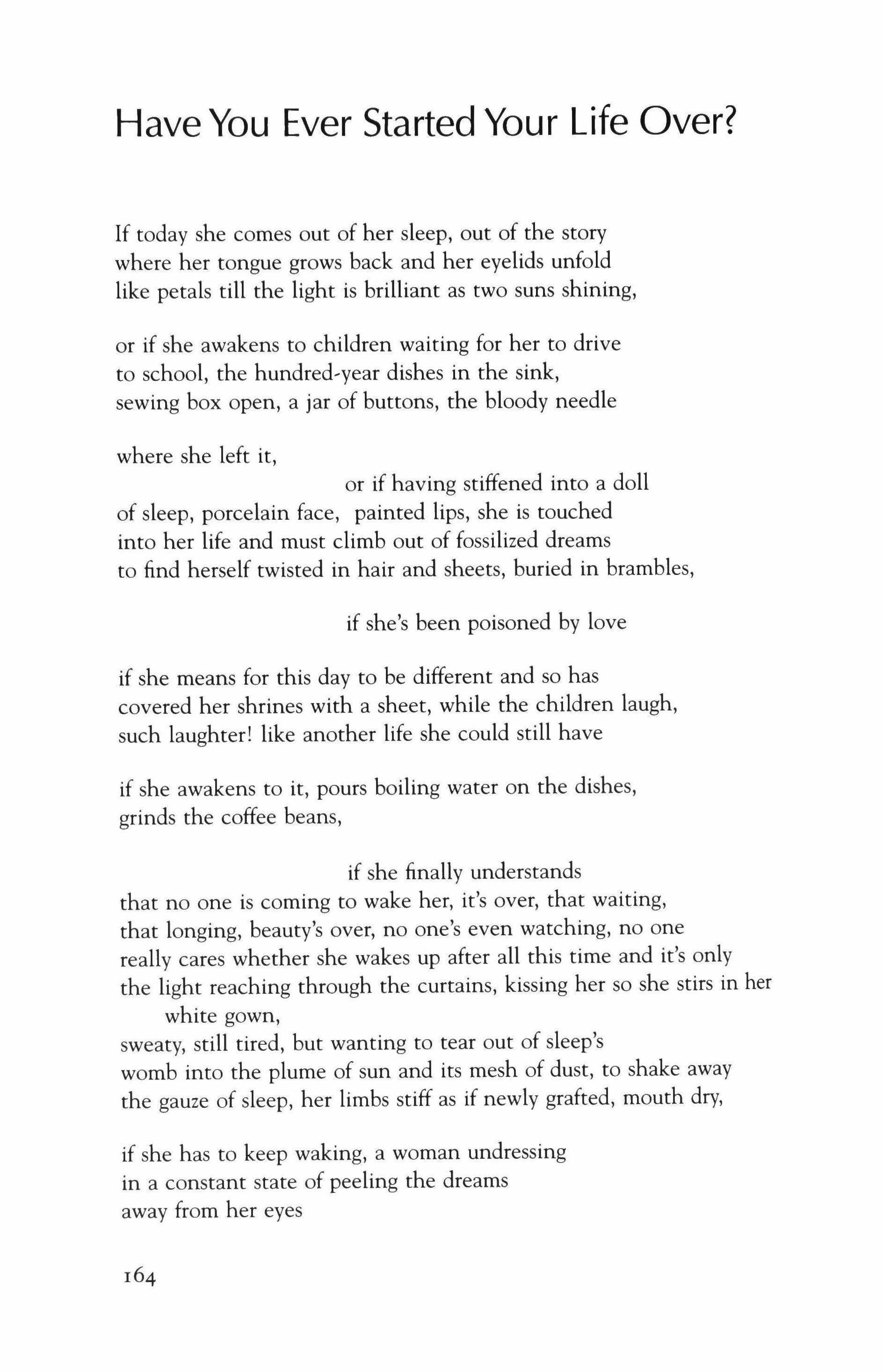
If today she comes out of her sleep, out of the story where her tongue grows back and her eyelids unfold like petals till the light is brilliant as two suns shining, or if she awakens to children waiting for her to drive to school, the hundred-year dishes in the sink, sewing box open, a jar of buttons, the bloody needle where she left it,
or if having stiffened into a doll of sleep, porcelain face, painted lips, she is touched into her life and must climb out of fossilized dreams to find herself twisted in hair and sheets, buried in brambles,
if she's been poisoned by love
if she means for this day to be different and so has covered her shrines with a sheet, while the children laugh, such laughter! like another life she could still have
if she awakens to it, pours boiling water on the dishes, grinds the coffee beans,
if she finally understands that no one is coming to wake her, it's over, that waiting, that longing, beauty's over, no one's even watching, no one really cares whether she wakes up after all this time and it's only the light reaching through the curtains, kissing her so she stirs in her white gown, sweaty, still tired, but wanting to tear out of sleep's womb into the plume of sun and its mesh of dust, to shake away the gauze of sleep, her limbs stiff as if newly grafted, mouth dry,
if she has to keep waking, a woman undressing in a constant state of peeling the dreams away from her eyes
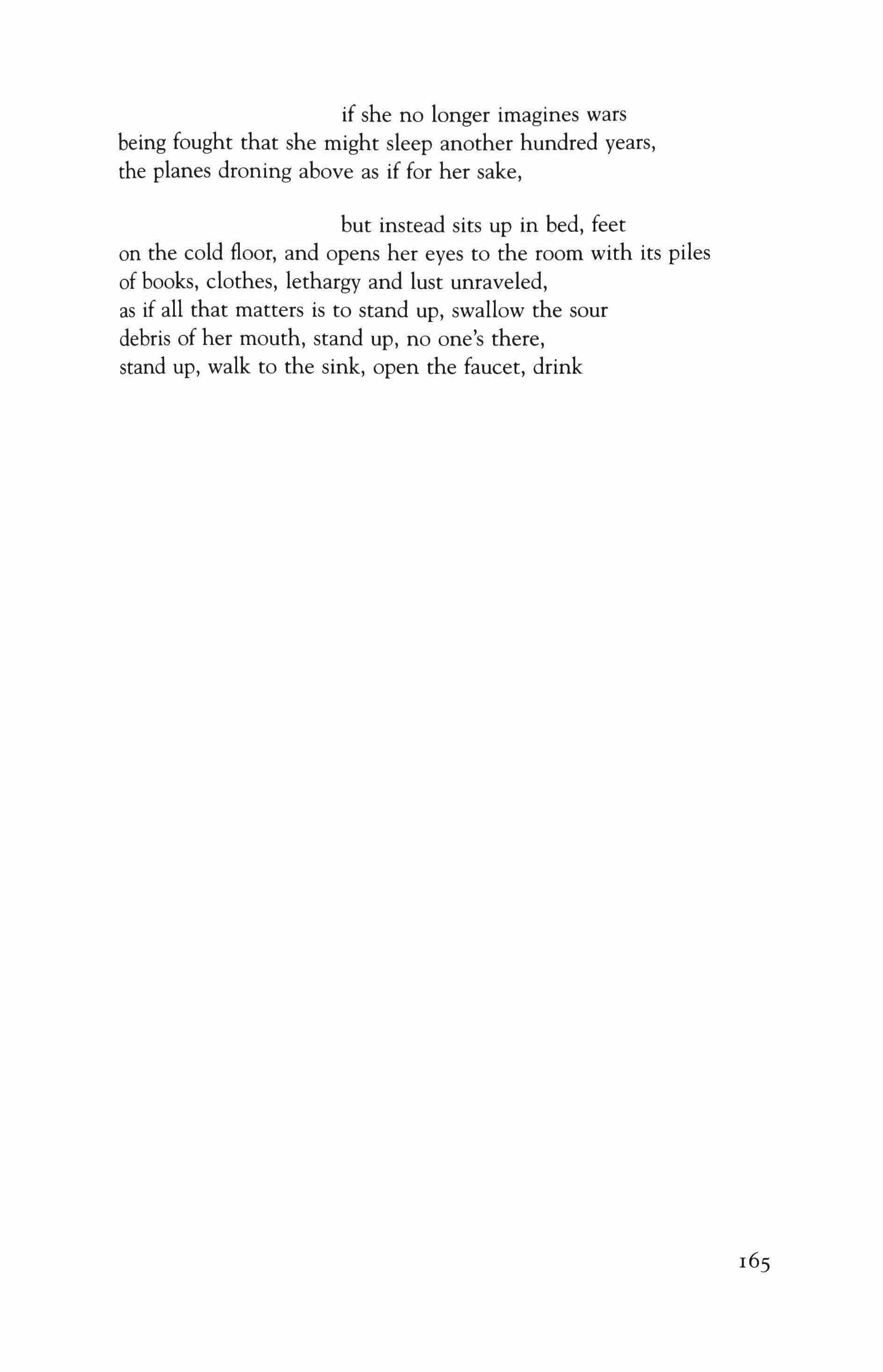
if she no longer imagines wars being fought that she might sleep another hundred years, the planes droning above as if for her sake,
but instead sits up in bed, feet on the cold floor, and opens her eyes to the room with its piles of books, clothes, lethargy and lust unraveled, as if all that matters is to stand up, swallow the sour debris of her mouth, stand up, no one's there, stand up, walk to the sink, open the faucet, drink
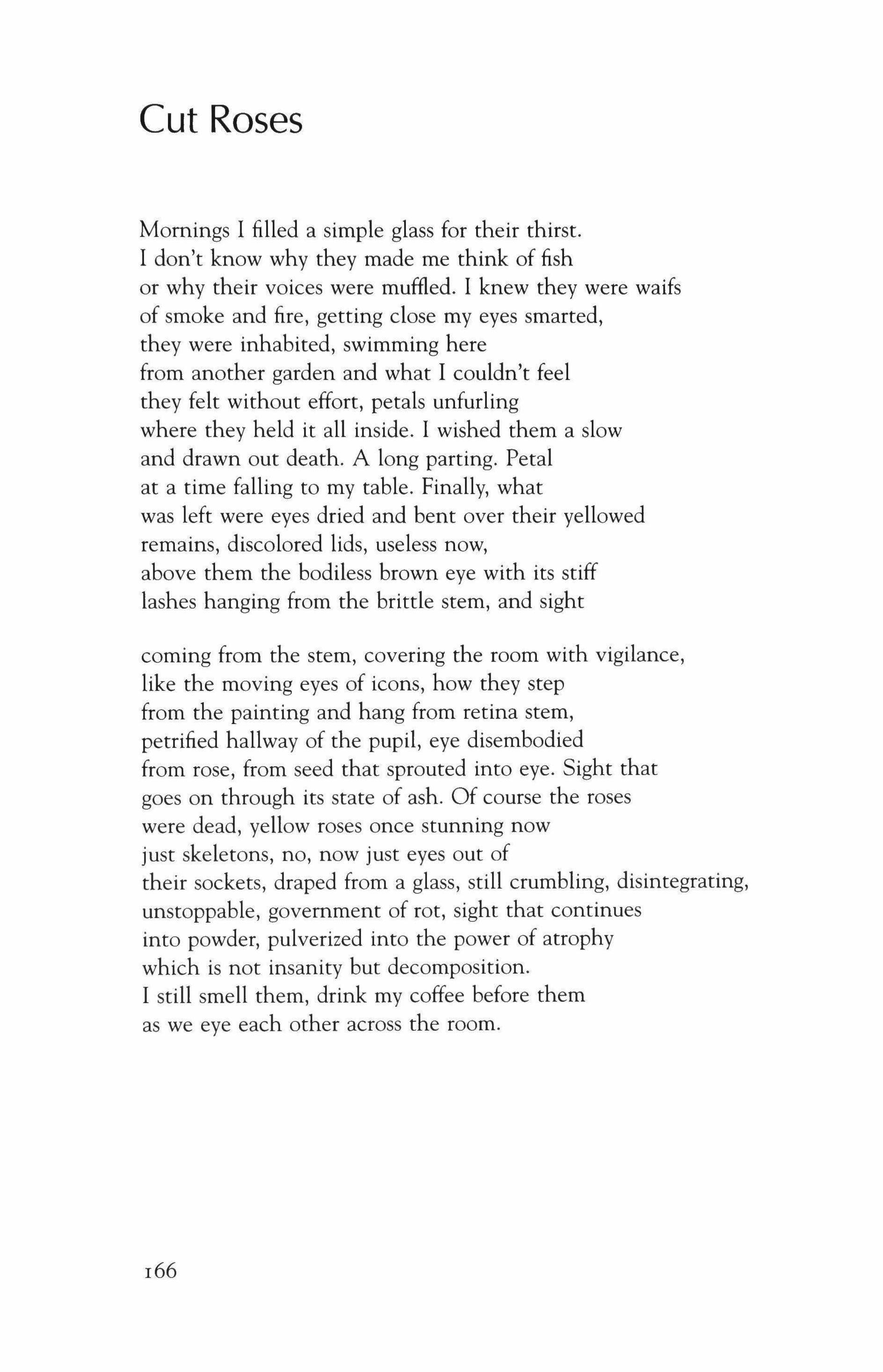
Mornings I filled a simple glass for their thirst. I don't know why they made me think of fish or why their voices were muffled. I knew they were waifs of smoke and fire, getting close my eyes smarted, they were inhabited, swimming here from another garden and what I couldn't feel they felt without effort, petals unfurling where they held it all inside. I wished them a slow and drawn out death. A long parting. Petal at a time falling to my table. Finally, what was left were eyes dried and bent over their yellowed remains, discolored lids, useless now, above them the bodiless brown eye with its stiff lashes hanging from the brittle stern, and sight
corning from the stern, covering the room with vigilance, like the moving eyes of icons, how they step from the painting and hang from retina stern, petrified hallway of the pupil, eye disembodied from rose, from seed that sprouted into eye. Sight that goes on through its state of ash. Of course the roses were dead, yellow roses once stunning now just skeletons, no, now just eyes out of their sockets, draped from a glass, still crumbling, disintegrating, unstoppable, government of rot, sight that continues into powder, pulverized into the power of atrophy which is not insanity but decomposition. I still smell them, drink my coffee before them as we eye each other across the room.
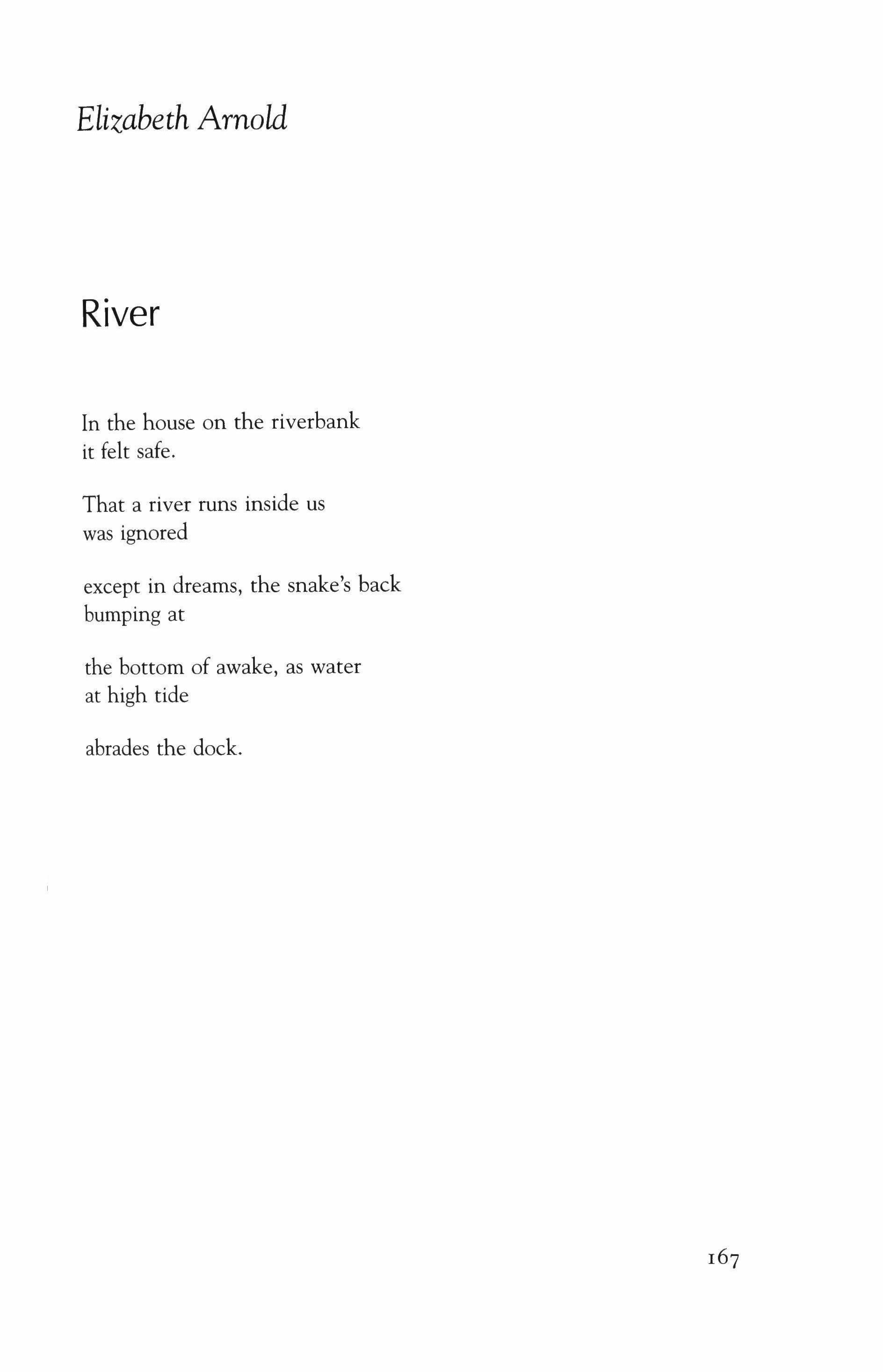
In the house on the riverbank it felt safe.
That a river runs inside us was ignored except in dreams, the snake's back bumping at the bottom of awake, as water at high tide abrades the dock.
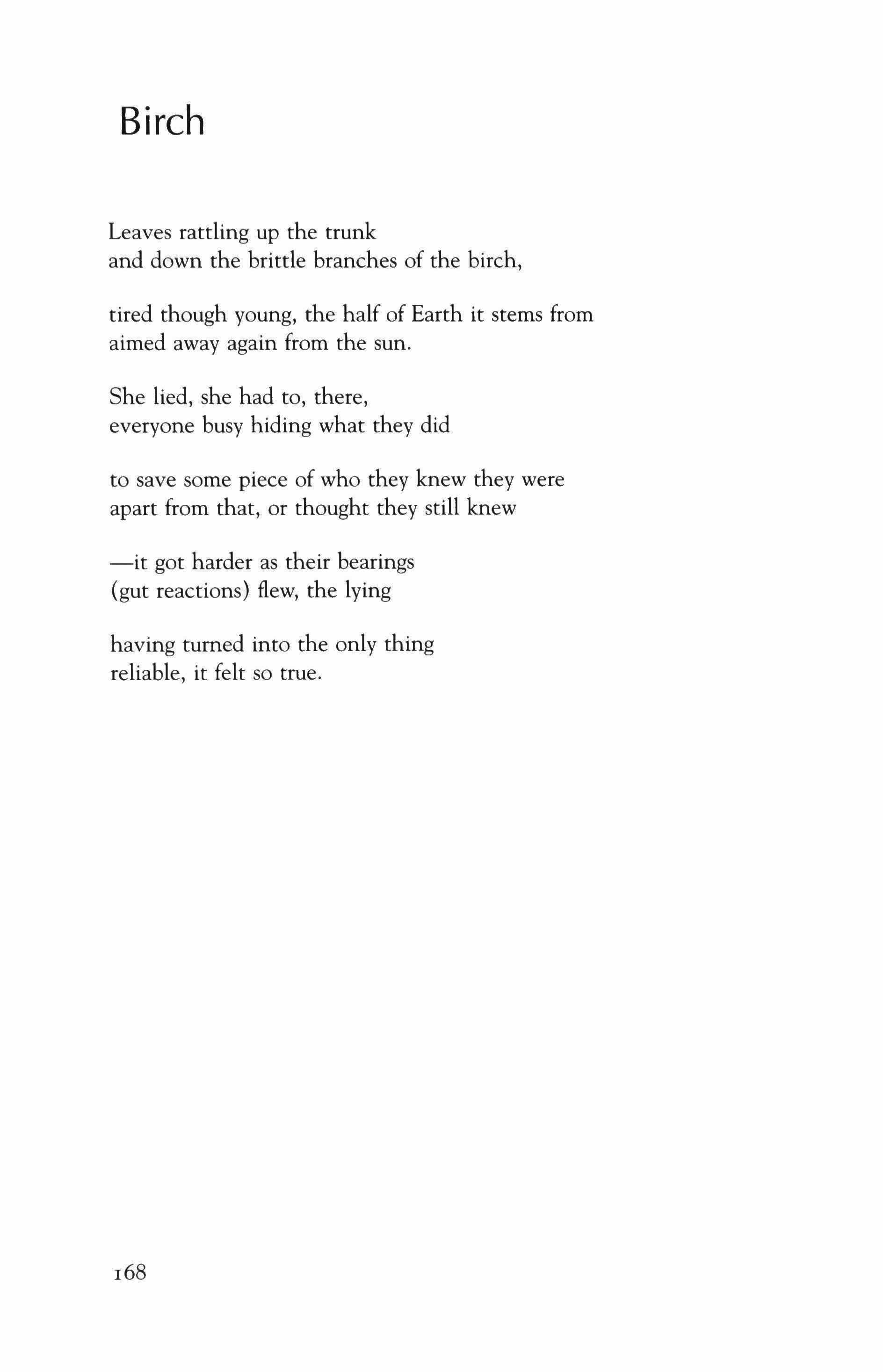
Leaves rattling up the trunk and down the brittle branches of the birch,
tired though young, the half of Earth it stems from aimed away again from the sun.
She lied, she had to, there, everyone busy hiding what they did
to save some piece of who they knew they were apart from that, or thought they still knew
-it got harder as their bearings {gut reactions} flew, the lying having turned into the only thing reliable, it felt so true.
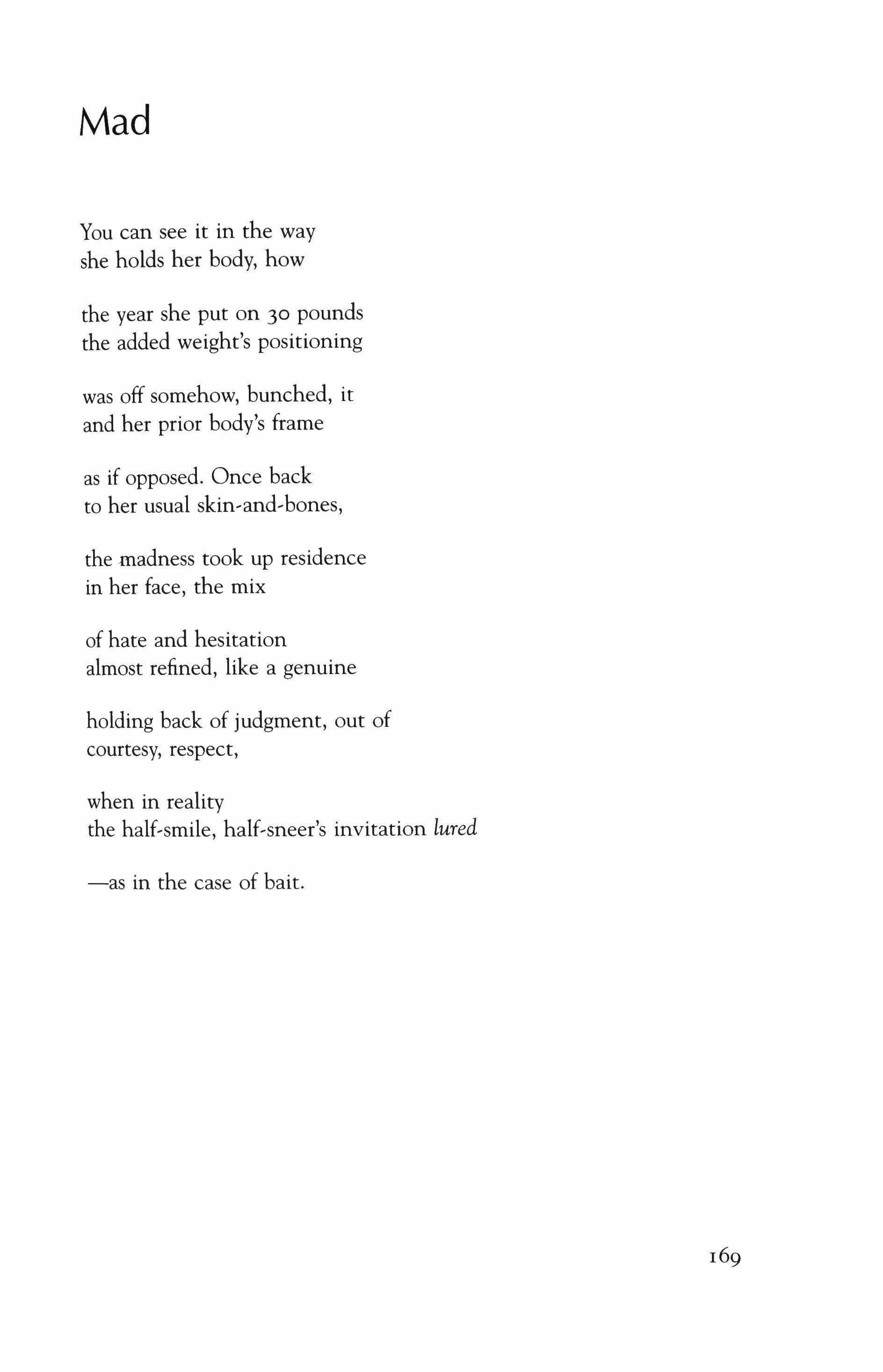
You can see it in the way she holds her body, how the year she put on 30 pounds the added weight's positioning was off somehow, bunched, it and her prior body's frame as if opposed. Once back to her usual skin-and-bones, the madness took up residence in her face, the mix of hate and hesitation almost refined, like a genuine holding back of judgment, out of courtesy, respect, when in reality the half-smile, half-sneer's invitation lured -as in the case of bait.
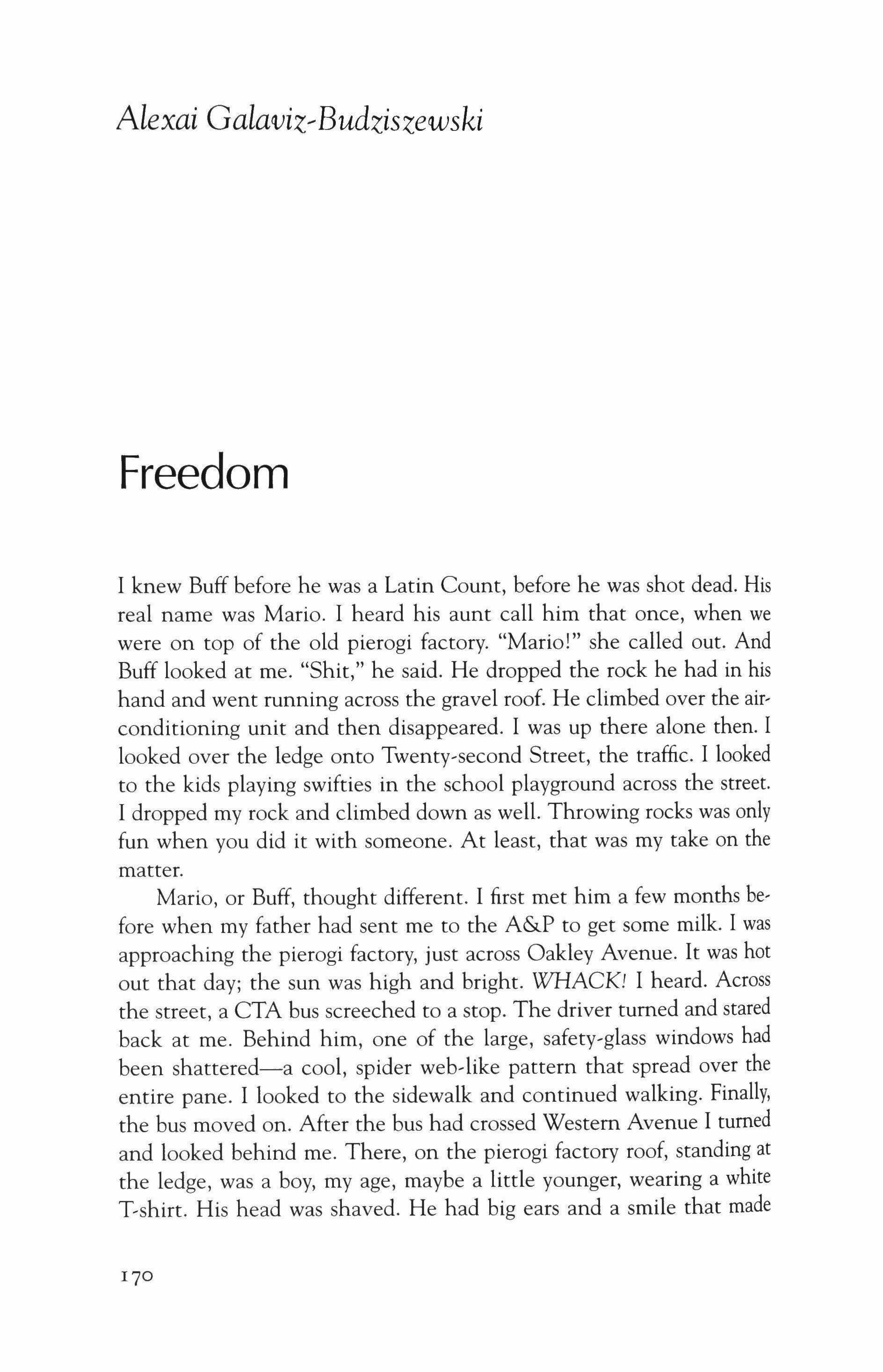
I knew Buff before he was a Latin Count, before he was shot dead. His real name was Mario. I heard his aunt call him that once, when we were on top of the old pierogi factory. "Mario!" she called out. And Buff looked at me. "Shit," he said. He dropped the rock he had in his hand and went running across the gravel roof. He climbed over the airconditioning unit and then disappeared. I was up there alone then. I looked over the ledge onto Twenty-second Street, the traffic. I looked to the kids playing swifties in the school playground across the street. I dropped my rock and climbed down as well. Throwing rocks was only fun when you did it with someone. At least, that was my take on the matter.
Mario, or Buff, thought different. I first met him a few months before when my father had sent me to the A&P to get some milk. I was approaching the pierogi factory, just across Oakley Avenue. It was hot out that day; the sun was high and bright. WHACK! I heard. Across the street, a CTA bus screeched to a stop. The driver turned and stared back at me. Behind him, one of the large, safety-glass windows had been shattered-a cool, spider web-like pattern that spread over the entire pane. I looked to the sidewalk and continued walking. Finally, the bus moved on. After the bus had crossed Western Avenue I turned and looked behind me. There, on the pierogi factory roof, standing at the ledge, was a boy, my age, maybe a little younger, wearing a white 'Tshirt. His head was shaved. He had big ears and a smile that made
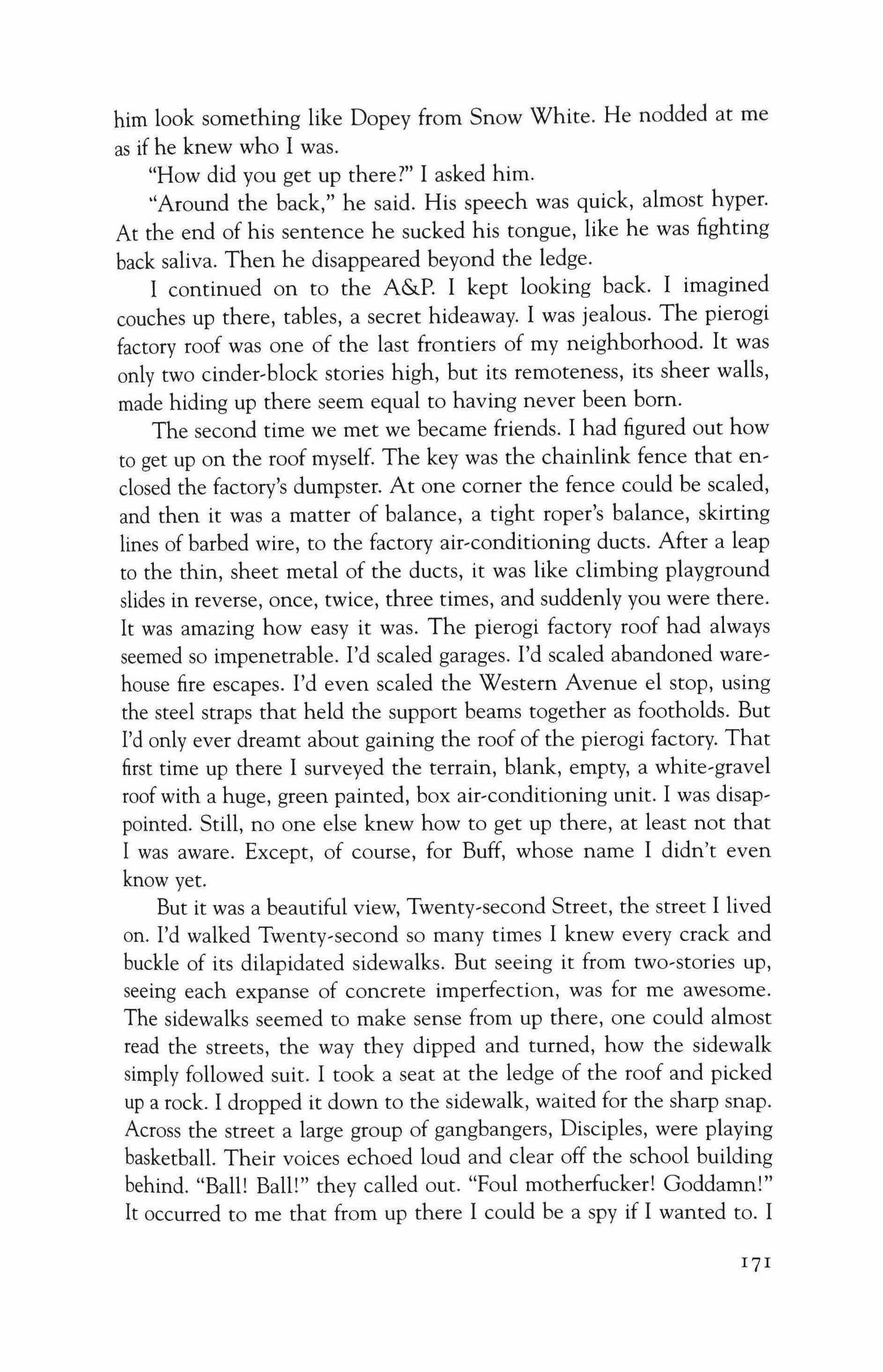
him look something like Dopey from Snow White. He nodded at me as if he knew who I was.
"How did you get up there?" I asked him.
"Around the back," he said. His speech was quick, almost hyper. At the end of his sentence he sucked his tongue, like he was fighting back saliva. Then he disappeared beyond the ledge.
I continued on to the A&P. I kept looking back. I imagined couches up there, tables, a secret hideaway. I was jealous. The pierogi factory roof was one of the last frontiers of my neighborhood. It was only two cinder-block stories high, but its remoteness, its sheer walls, made hiding up there seem equal to having never been born.
The second time we met we became friends. I had figured out how to get up on the roof myself. The key was the chainlink fence that en, closed the factory's dumpster. At one corner the fence could be scaled, and then it was a matter of balance, a tight roper's balance, skirting lines of barbed wire, to the factory air-conditioning ducts. After a leap to the thin, sheet metal of the ducts, it was like climbing playground slides in reverse, once, twice, three times, and suddenly you were there. It was amazing how easy it was. The pierogi factory roof had always seemed so impenetrable. I'd scaled garages. I'd scaled abandoned ware, house fire escapes. I'd even scaled the Western Avenue el stop, using the steel straps that held the support beams together as footholds. But I'd only ever dreamt about gaining the roof of the pierogi factory. That first time up there I surveyed the terrain, blank, empty, a white-gravel roof with a huge, green painted, box air-conditioning unit. I was disappointed. Still, no one else knew how to get up there, at least not that I was aware. Except, of course, for Buff, whose name I didn't even know yet.
But it was a beautiful view, Twenty-second Street, the street I lived on. I'd walked Twenty-second so many times I knew every crack and buckle of its dilapidated sidewalks. But seeing it from two-stories up, seeing each expanse of concrete imperfection, was for me awesome. The sidewalks seemed to make sense from up there, one could almost read the streets, the way they dipped and turned, how the sidewalk simply followed suit. I took a seat at the ledge of the roof and picked up a rock. I dropped it down to the sidewalk, waited for the sharp snap. Across the street a large group of gangbangers, Disciples, were playing basketbalL Their voices echoed loud and clear off the school building behind. "Ball! Ball!" they called out. "Foul motherfucker! Goddamn!" It occurred to me that from up there I could be a spy if I wanted to. I
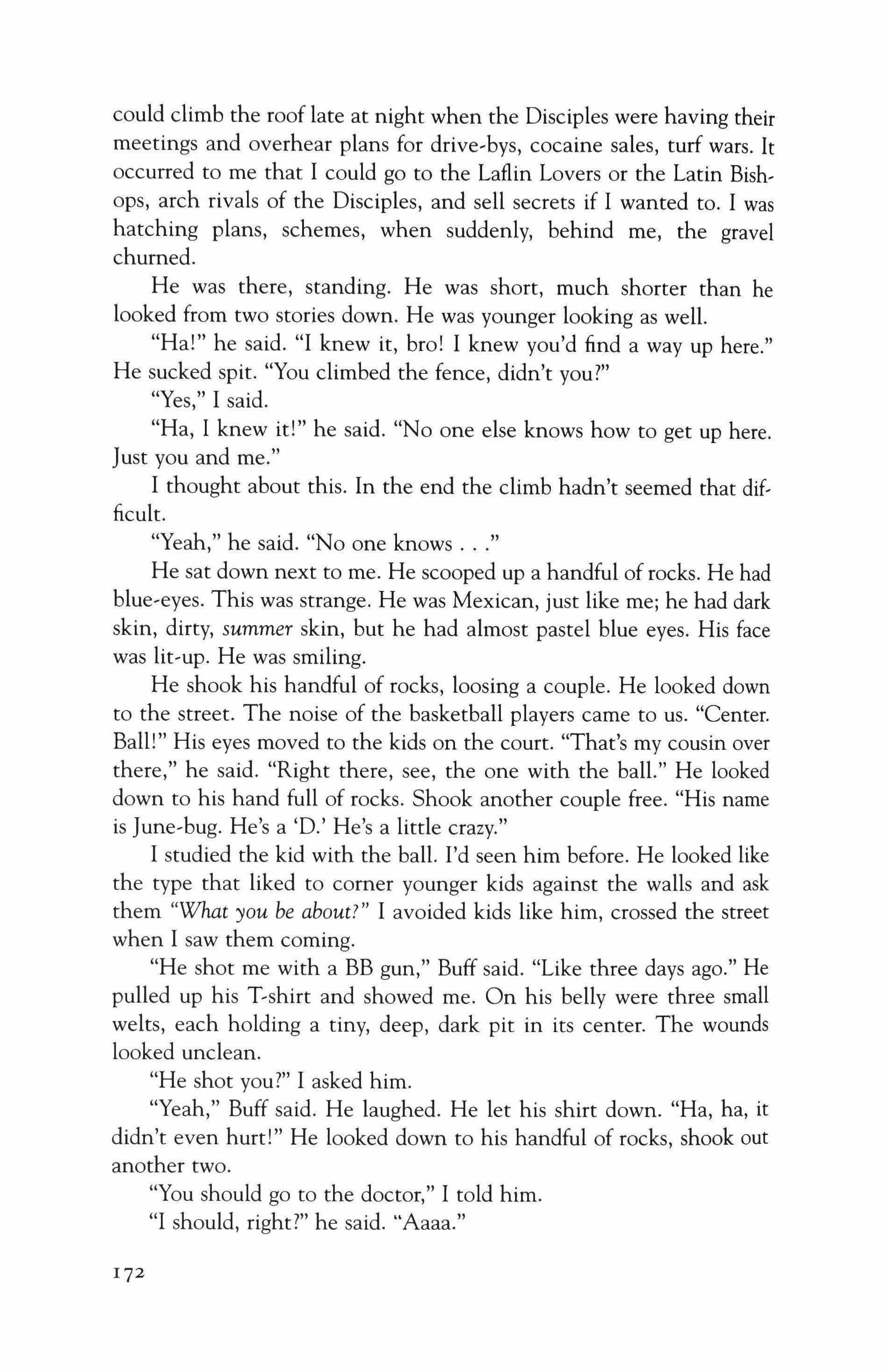
could climb the roof late at night when the Disciples were having their meetings and overhear plans for drive-bys, cocaine sales, turf wars. It occurred to me that I could go to the Laflin Lovers or the Latin Bishops, arch rivals of the Disciples, and sell secrets if I wanted to. I was hatching plans, schemes, when suddenly, behind me, the gravel churned.
He was there, standing. He was short, much shorter than he looked from two stories down. He was younger looking as well.
"Ha!" he said. "I knew it, bro! I knew you'd find a way up here." He sucked spit. "You climbed the fence, didn't you?"
"Yes," I said.
"Ha, I knew it!" he said. "No one else knows how to get up here. Just you and me."
I thought about this. In the end the climb hadn't seemed that difficult.
"Yeah," he said. "No one knows
He sat down next to me. He scooped up a handful of rocks. He had blue-eyes. This was strange. He was Mexican, just like me; he had dark skin, dirty, summer skin, but he had almost pastel blue eyes. His face was lit-up. He was smiling.
He shook his handful of rocks, loosing a couple. He looked down to the street. The noise of the basketball players carne to us. "Center. Ball!" His eyes moved to the kids on the court. "That's my cousin over there," he said. "Right there, see, the one with the ball." He looked down to his hand full of rocks. Shook another couple free. "His name is June-bug. He's a '0.' He's a little crazy."
I studied the kid with the ball. I'd seen him before. He looked like the type that liked to comer younger kids against the walls and ask them "What you be about?" I avoided kids like him, crossed the street when I saw them coming.
"He shot me with a BB gun," Buff said. "Like three days ago." He pulled up his 'Tshirt and showed me. On his belly were three small welts, each holding a tiny, deep, dark pit in its center. The wounds looked unclean.
"He shot you?" I asked him.
"Yeah," Buff said. He laughed. He let his shirt down. "Ha, ha, it didn't even hurt!" He looked down to his handful of rocks, shook out another two.
"You should go to the doctor," I told him. "I should, right?" he said. "Aaaa."
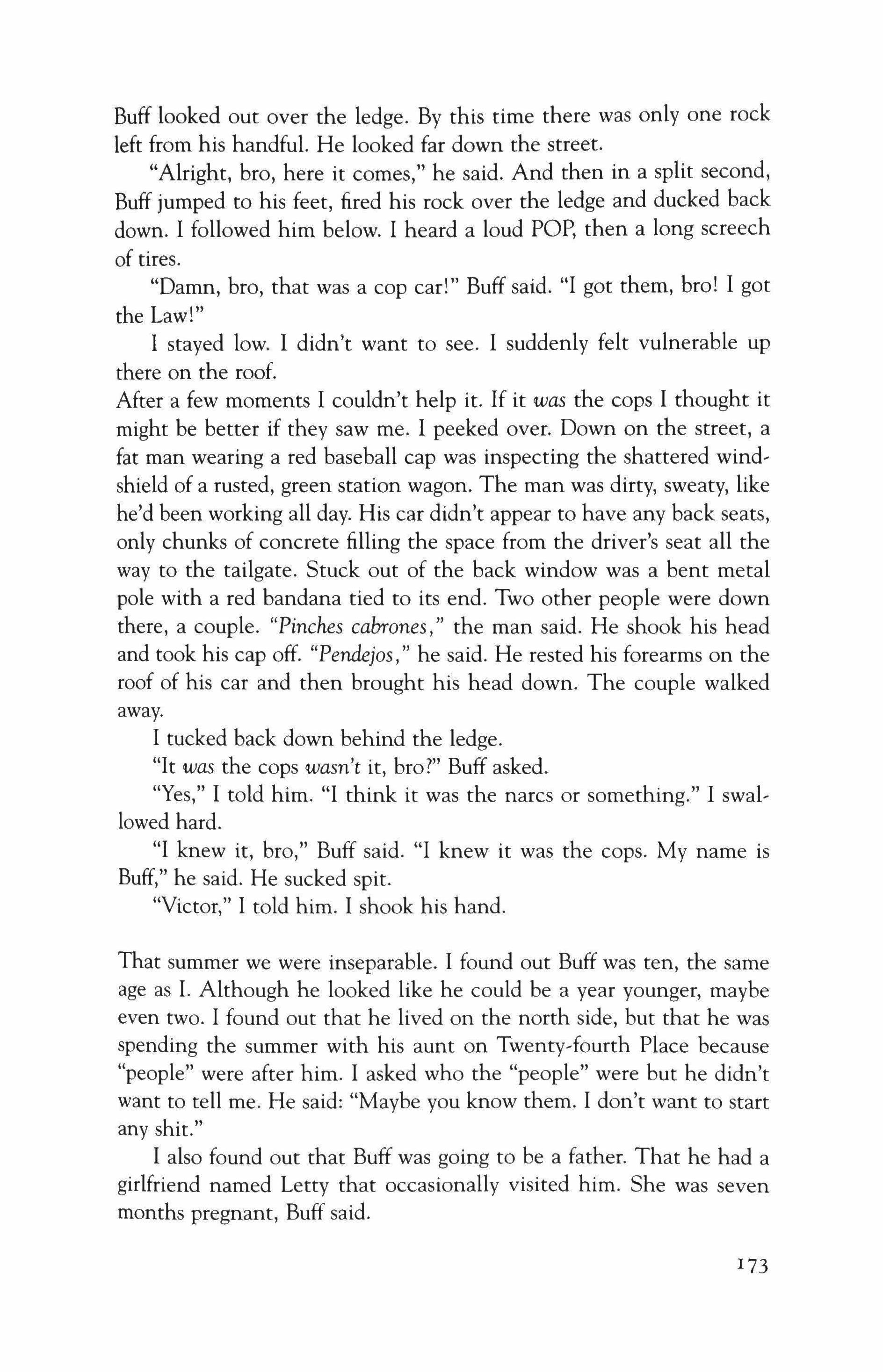
Buff looked out over the ledge. By this time there was only one rock left from his handful. He looked far down the street.
"Alright, bro, here it comes," he said. And then in a split second, Buff jumped to his feet, fired his rock over the ledge and ducked back down. I followed him below. I heard a loud POP, then a long screech of tires.
"Damn, bro, that was a cop car!" Buff said. "I got them, bro! I got the Law!"
I stayed low. I didn't want to see. I suddenly felt vulnerable up there on the roof.
After a few moments I couldn't help it. If it was the cops I thought it might be better if they saw me. I peeked over. Down on the street, a fat man wearing a red baseball cap was inspecting the shattered windshield of a rusted, green station wagon. The man was dirty, sweaty, like he'd been working all day. His car didn't appear to have any back seats, only chunks of concrete filling the space from the driver's seat all the way to the tailgate. Stuck out of the back window was a bent metal pole with a red bandana tied to its end. Two other people were down there, a couple. "Pinches cabrones," the man said. He shook his head and took his cap off. "Pendejos," he said. He rested his forearms on the roof of his car and then brought his head down. The couple walked away.
I tucked back down behind the ledge.
"It was the cops wasn't it, bro?" Buff asked.
"Yes," I told him. "I think it was the narcs or something." I swallowed hard.
"I knew it, bro," Buff said. "I knew it was the cops. My name is Buff," he said. He sucked spit. "Victor," I told him. I shook his hand.
That summer we were inseparable. I found out Buff was ten, the same age as I. Although he looked like he could be a year younger, maybe even two. I found out that he lived on the north side, but that he was spending the summer with his aunt on Twenty-fourth Place because "people" were after him. I asked who the "people" were but he didn't want to tell me. He said: "Maybe you know them. I don't want to start any shit."
I also found out that Buff was going to be a father. That he had a girlfriend named Letty that occasionally visited him. She was seven months pregnant, Buff said.
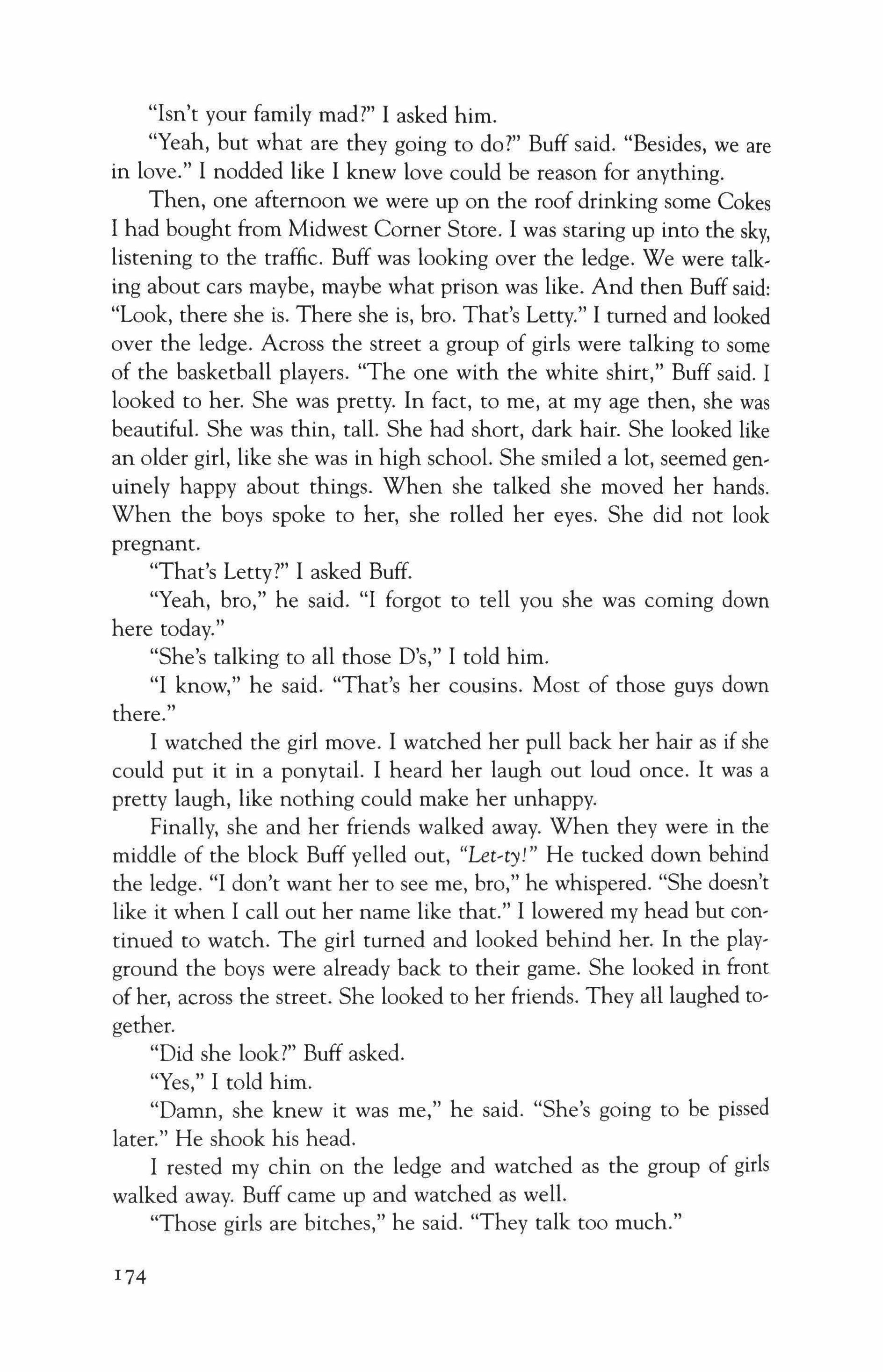
"Isn't your family mad?" I asked him. "Yeah, but what are they going to do?" Buff said. "Besides, we are in love." I nodded like I knew love could be reason for anything.
Then, one afternoon we were up on the roof drinking some Cokes I had bought from Midwest Comer Store. I was staring up into the sky, listening to the traffic. Buff was looking over the ledge. We were talking about cars maybe, maybe what prison was like. And then Buff said: "Look, there she is. There she is, bro. That's Letty." I turned and looked over the ledge. Across the street a group of girls were talking to some of the basketball players. "The one with the white shirt," Buff said. I looked to her. She was pretty. In fact, to me, at my age then, she was beautiful. She was thin, tall. She had short, dark hair. She looked like an older girl, like she was in high school. She smiled a lot, seemed genuinely happy about things. When she talked she moved her hands. When the boys spoke to her, she rolled her eyes. She did not look pregnant.
"That's Letty?" I asked Buff.
"Yeah, bro," he said. "I forgot to tell you she was coming down here today."
"She's talking to all those D's," I told him.
"I know," he said. "That's her cousins. Most of those guys down there."
I watched the girl move. I watched her pull back her hair as if she could put it in a ponytail. I heard her laugh out loud once. It was a pretty laugh, like nothing could make her unhappy.
Finally, she and her friends walked away. When they were in the middle of the block Buff yelled out, "Let-ty!" He tucked down behind the ledge. "I don't want her to see me, bro," he whispered. "She doesn't like it when I call out her name like that." I lowered my head but continued to watch. The girl turned and looked behind her. In the playground the boys were already back to their game. She looked in front of her, across the street. She looked to her friends. They all laughed together.
"Did she look?" Buff asked.
"Yes," I told him.
"Damn, she knew it was me," he said. "She's going to be pissed later." He shook his head.
I rested my chin on the ledge and watched as the group of girls walked away. Buff came up and watched as well.
"Those girls are bitches," he said. "They talk too much."
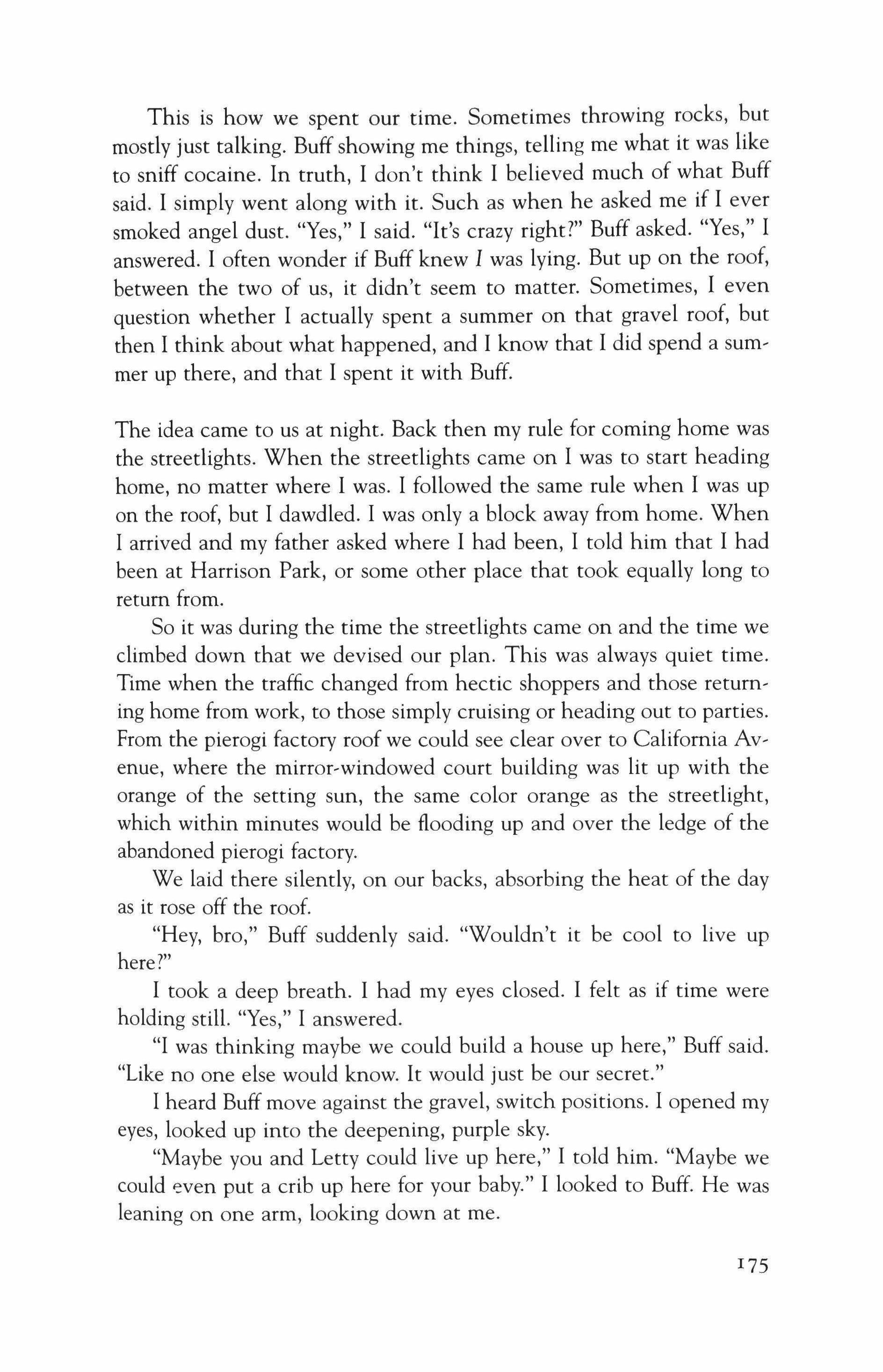
This is how we spent our time. Sometimes throwing rocks, but mostly just talking. Buff showing me things, telling me what it was like to sniff cocaine. In truth, I don't think I believed much of what Buff said. I simply went along with it. Such as when he asked me if I ever smoked angel dust. "Yes," I said. "It's crazy right?" Buff asked. "Yes," I answered. I often wonder if Buff knew I was lying. But up on the roof, between the two of us, it didn't seem to matter. Sometimes, I even question whether I actually spent a summer on that gravel roof, but then I think about what happened, and I know that I did spend a summer up there, and that I spent it with Buff.
The idea came to us at night. Back then my rule for coming home was the streetlights. When the streetlights came on I was to start heading home, no matter where I was. I followed the same rule when I was up on the roof, but I dawdled. I was only a block away from home. When I arrived and my father asked where I had been, I told him that I had been at Harrison Park, or some other place that took equally long to return from.
So it was during the time the streetlights came on and the time we climbed down that we devised our plan. This was always quiet time. Time when the traffic changed from hectic shoppers and those returning home from work, to those simply cruising or heading out to parties. From the pierogi factory roof we could see clear over to California Avenue, where the mirror-windowed court building was lit up with the orange of the setting sun, the same color orange as the streetlight, which within minutes would be flooding up and over the ledge of the abandoned pierogi factory.
We laid there silently, on our backs, absorbing the heat of the day as it rose off the roof.
"Hey, bro," Buff suddenly said. "Wouldn't it be cool to live up here?"
I took a deep breath. I had my eyes closed. I felt as if time were holding still. "Yes," I answered.
"I was thinking maybe we could build a house up here," Buff said. "Like no one else would know. It would just be our secret."
I heard Buff move against the gravel, switch positions. I opened my eyes, looked up into the deepening, purple sky.
"Maybe you and Letty could live up here," I told him. "Maybe we could even put a crib up here for your baby." I looked to Buff. He was leaning on one arm, looking down at me.
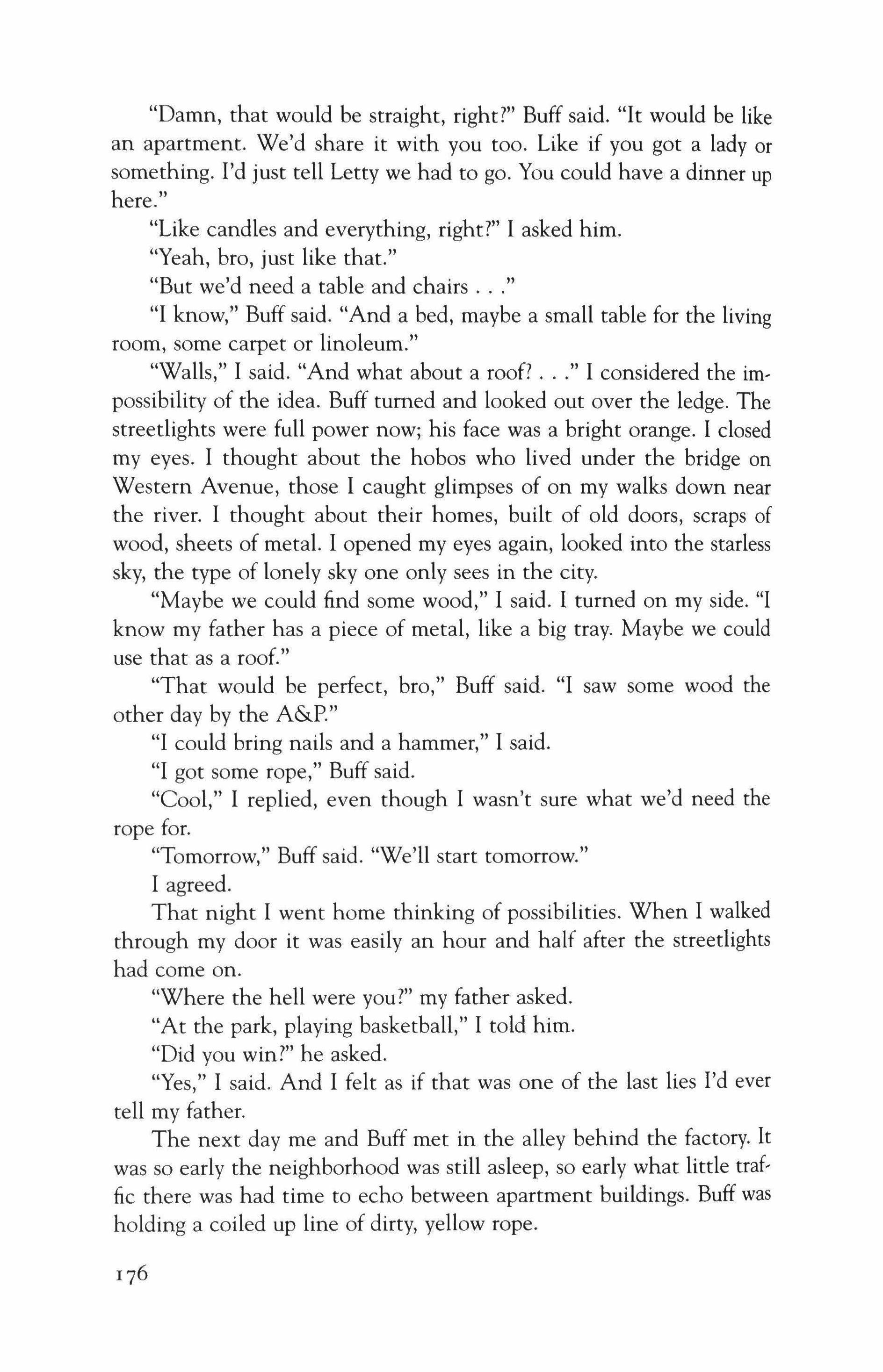
"Damn, that would be straight, right?" Buff said. "It would be like an apartment. We'd share it with you too. Like if you got a lady or something. I'd just tell Letty we had to go. You could have a dinner up here."
"Like candles and everything, right?" I asked him.
"Yeah, bro, just like that."
"But we'd need a table and chairs
"I know," Buff said. "And a bed, maybe a small table for the living room, some carpet or linoleum."
"Walls," I said. "And what about a roof? I considered the impossibility of the idea. Buff turned and looked out over the ledge. The streetlights were full power now; his face was a bright orange. I closed my eyes. I thought about the hobos who lived under the bridge on Western Avenue, those I caught glimpses of on my walks down near the river. I thought about their homes, built of old doors, scraps of wood, sheets of metal. I opened my eyes again, looked into the starless sky, the type of lonely sky one only sees in the city.
"Maybe we could find some wood," I said. I turned on my side. "I know my father has a piece of metal, like a big tray. Maybe we could use that as a roof."
"That would be perfect, bro," Buff said. "I saw some wood the other day by the A&P."
"I could bring nails and a hammer," I said.
"I got some rope," Buff said.
"Cool," I replied, even though I wasn't sure what we'd need the rope for.
"Tomorrow," Buff said. "We'll start tomorrow." I agreed.
That night I went home thinking of possibilities. When I walked through my door it was easily an hour and half after the streetlights had come on.
"Where the hell were you?" my father asked.
"At the park, playing basketball," I told him.
"Did you win?" he asked.
"Yes," I said. And I felt as if that was one of the last lies I'd ever tell my father.
The next day me and Buff met in the alley behind the factory. It was so early the neighborhood was still asleep, so early what little traffic there was had time to echo between apartment buildings. Buff was holding a coiled up line of dirty, yellow rope.
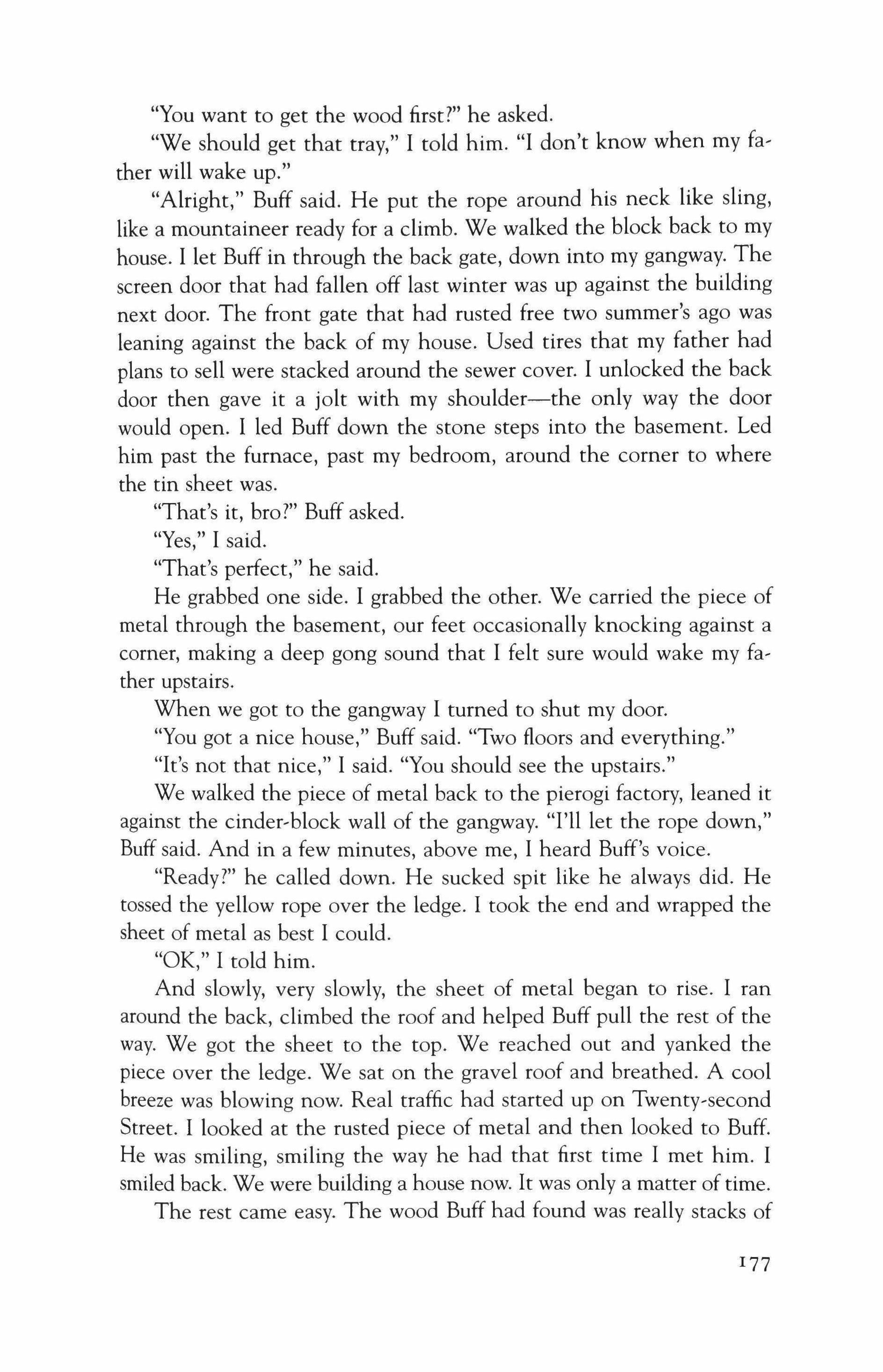
"You want to get the wood first?" he asked. "We should get that tray," I told him. "I don't know when my father will wake up."
"Alright," Buff said. He put the rope around his neck like sling, like a mountaineer ready for a climb. We walked the block back to my house. I let Buff in through the back gate, down into my gangway. The screen door that had fallen off last winter was up against the building next door. The front gate that had rusted free two summer's ago was leaning against the back of my house. Used tires that my father had plans to sell were stacked around the sewer cover. I unlocked the back door then gave it a jolt with my shoulder-the only way the door would open. I led Buff down the stone steps into the basement. Led him past the furnace, past my bedroom, around the corner to where the tin sheet was.
"That's it, bro?" Buff asked.
"Yes," I said.
"That's perfect," he said.
He grabbed one side. I grabbed the other. We carried the piece of metal through the basement, our feet occasionally knocking against a corner, making a deep gong sound that I felt sure would wake my father upstairs.
When we got to the gangway I turned to shut my door.
"You got a nice house," Buff said. "Two floors and everything."
"It's not that nice," I said. "You should see the upstairs."
We walked the piece of metal back to the pierogi factory, leaned it against the cinder-block wall of the gangway. "I'll let the rope down," Buff said. And in a few minutes, above me, I heard Buff's voice.
"Ready?" he called down. He sucked spit like he always did. He tossed the yellow rope over the ledge. I took the end and wrapped the sheet of metal as best I could.
"OK," I told him.
And slowly, very slowly, the sheet of metal began to rise. I ran around the back, climbed the roof and helped Buff pull the rest of the way. We got the sheet to the top. We reached out and yanked the piece over the ledge. We sat on the gravel roof and breathed. A cool breeze was blowing now. Real traffic had started up on Twenty-second Street. I looked at the rusted piece of metal and then looked to Buff. He was smiling, smiling the way he had that first time I met him. I smiled back. We were building a house now. It was only a matter of time.
The rest came easy. The wood Buff had found was really stacks of
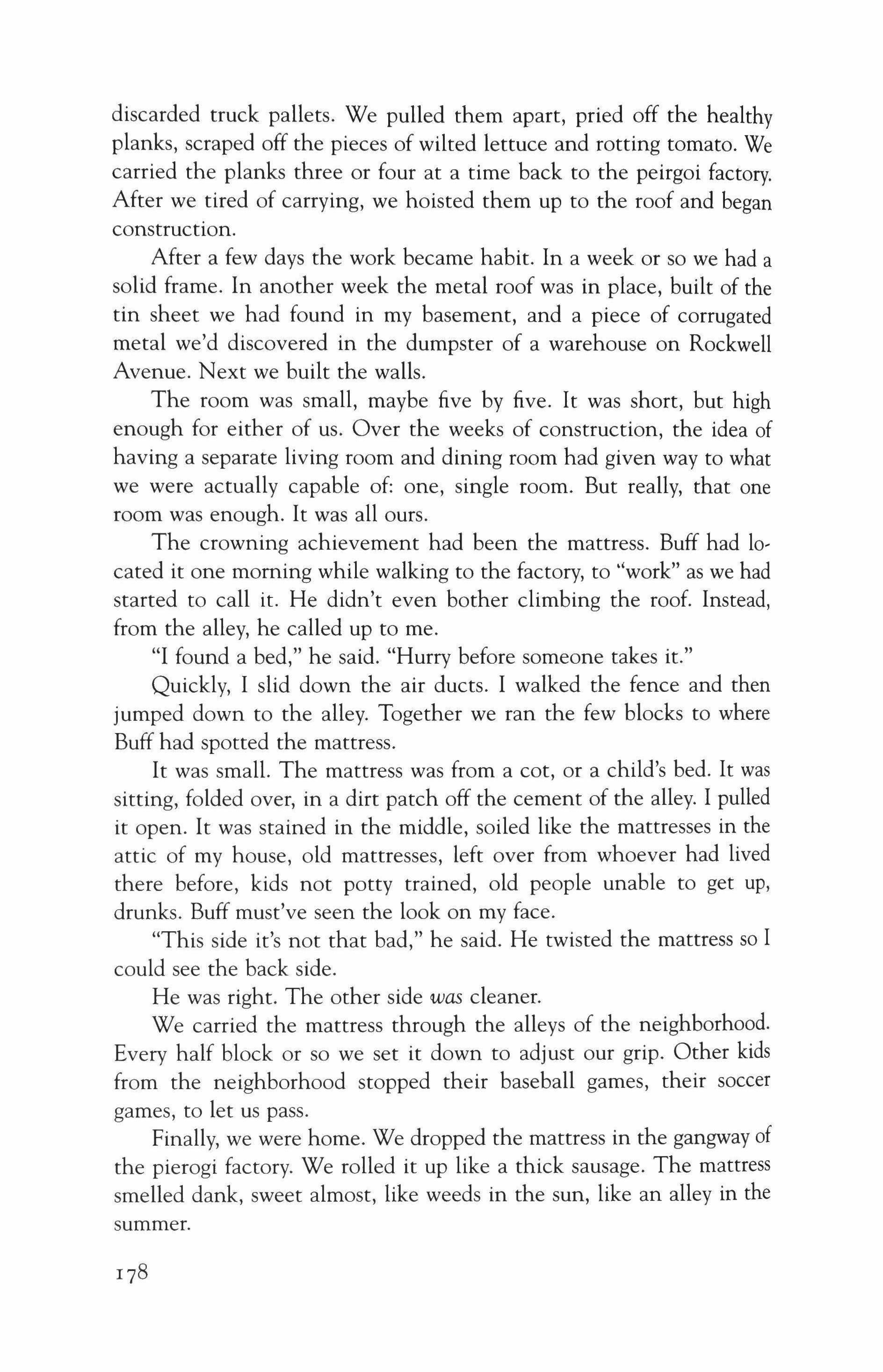
discarded truck pallets. We pulled them apart, pried off the healthy planks, scraped off the pieces of wilted lettuce and rotting tomato. We carried the planks three or four at a time back to the peirgoi factory. After we tired of carrying, we hoisted them up to the roof and began construction.
After a few days the work became habit. In a week or so we had a solid frame. In another week the metal roof was in place, built of the tin sheet we had found in my basement, and a piece of corrugated metal we'd discovered in the dumpster of a warehouse on Rockwell Avenue. Next we built the walls.
The room was small, maybe five by five. It was short, but high enough for either of us. Over the weeks of construction, the idea of having a separate living room and dining room had given way to what we were actually capable of: one, single room. But really, that one room was enough. It was all ours.
The crowning achievement had been the mattress. Buff had located it one morning while walking to the factory, to "work" as we had started to call it. He didn't even bother climbing the roof. Instead, from the alley, he called up to me.
"I found a bed," he said. "Hurry before someone takes it."
Quickly, I slid down the air ducts. I walked the fence and then jumped down to the alley. Together we ran the few blocks to where Buff had spotted the mattress.
It was small. The mattress was from a cot, or a child's bed. It was sitting, folded over, in a dirt patch off the cement of the alley. I pulled it open. It was stained in the middle, soiled like the mattresses in the attic of my house, old mattresses, left over from whoever had lived there before, kids not potty trained, old people unable to get up, drunks. Buff must've seen the look on my face.
"This side it's not that bad," he said. He twisted the mattress so I could see the back side.
He was right. The other side was cleaner.
We carried the mattress through the alleys of the neighborhood. Every half block or so we set it down to adjust our grip. Other kids from the neighborhood stopped their baseball games, their soccer games, to let us pass.
Finally, we were home. We dropped the mattress in the gangway of the pierogi factory. We rolled it up like a thick sausage. The mattress smelled dank, sweet almost, like weeds in the sun, like an alley in the summer.
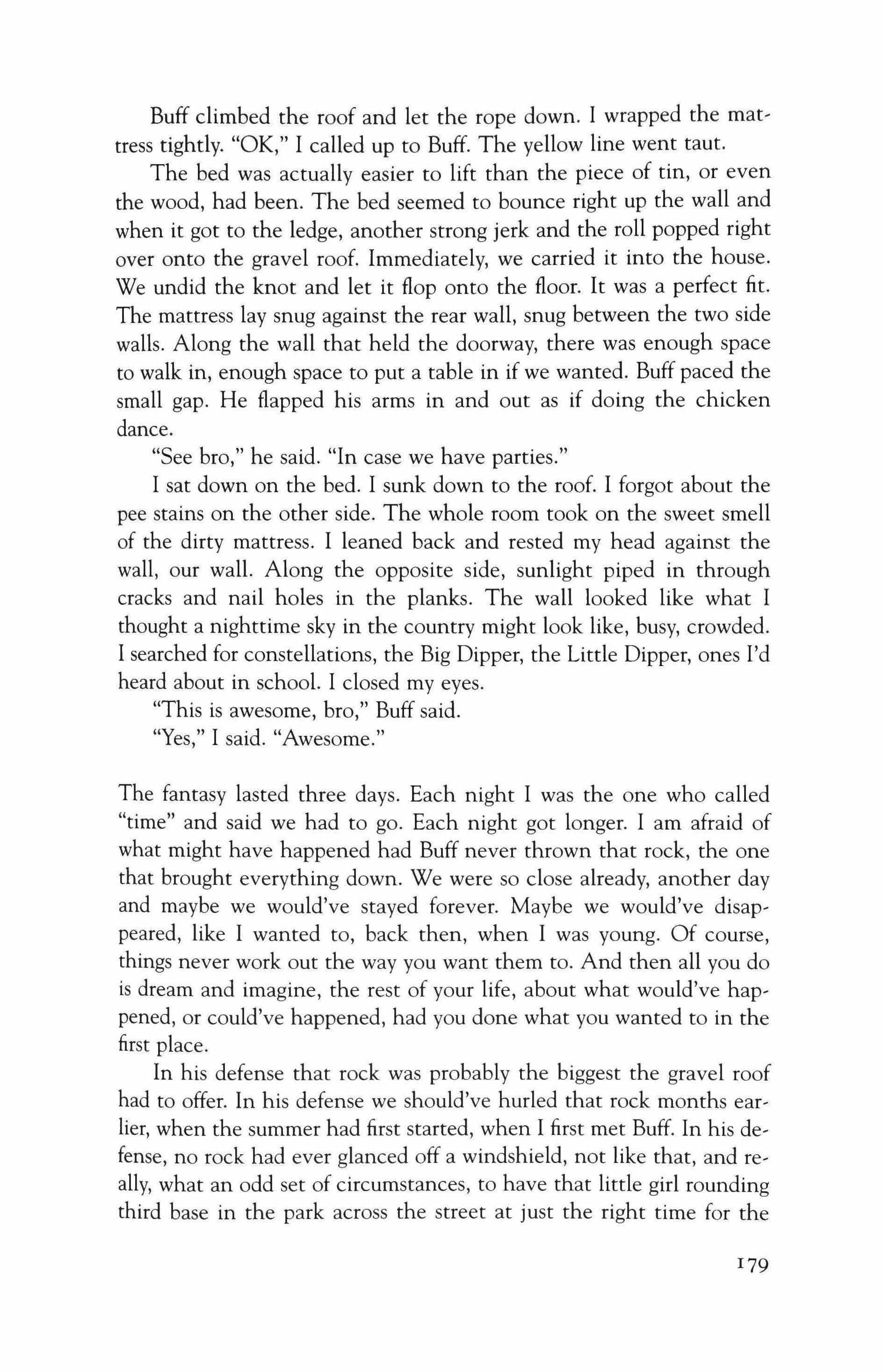
Buff climbed the roof and let the rope down. I wrapped the mattress tightly. "OK," I called up to Buff. The yellow line went taut.
The bed was actually easier to lift than the piece of tin, or even the wood, had been. The bed seemed to bounce right up the wall and when it got to the ledge, another strong jerk and the roll popped right over onto the gravel roof. Immediately, we carried it into the house. We undid the knot and let it flop onto the floor. It was a perfect fit. The mattress lay snug against the rear wall, snug between the two side walls. Along the wall that held the doorway, there was enough space to walk in, enough space to put a table in if we wanted. Buff paced the small gap. He flapped his arms in and out as if doing the chicken dance.
"See bro," he said. "In case we have parties."
I sat down on the bed. I sunk down to the roof. I forgot about the pee stains on the other side. The whole room took on the sweet smell of the dirty mattress. I leaned back and rested my head against the wall, our wall. Along the opposite side, sunlight piped in through cracks and nail holes in the planks. The wall looked like what I thought a nighttime sky in the country might look like, busy, crowded. I searched for constellations, the Big Dipper, the Little Dipper, ones I'd heard about in school. I closed my eyes.
"This is awesome, bro," Buff said. "Yes," I said. "Awesome."
The fantasy lasted three days. Each night I was the one who called "time" and said we had to go. Each night got longer. I am afraid of what might have happened had Buff never thrown that rock, the one that brought everything down. We were so close already, another day and maybe we would've stayed forever. Maybe we would've disappeared, like I wanted to, back then, when I was young. Of course, things never work out the way you want them to. And then all you do is dream and imagine, the rest of your life, about what would've happened, or could've happened, had you done what you wanted to in the first place.
In his defense that rock was probably the biggest the gravel roof had to offer. In his defense we should've hurled that rock months earlier, when the summer had first started, when I first met Buff. In his defense, no rock had ever glanced off a windshield, not like that, and really, what an odd set of circumstances, to have that little girl rounding third base in the park across the street at just the right time for the
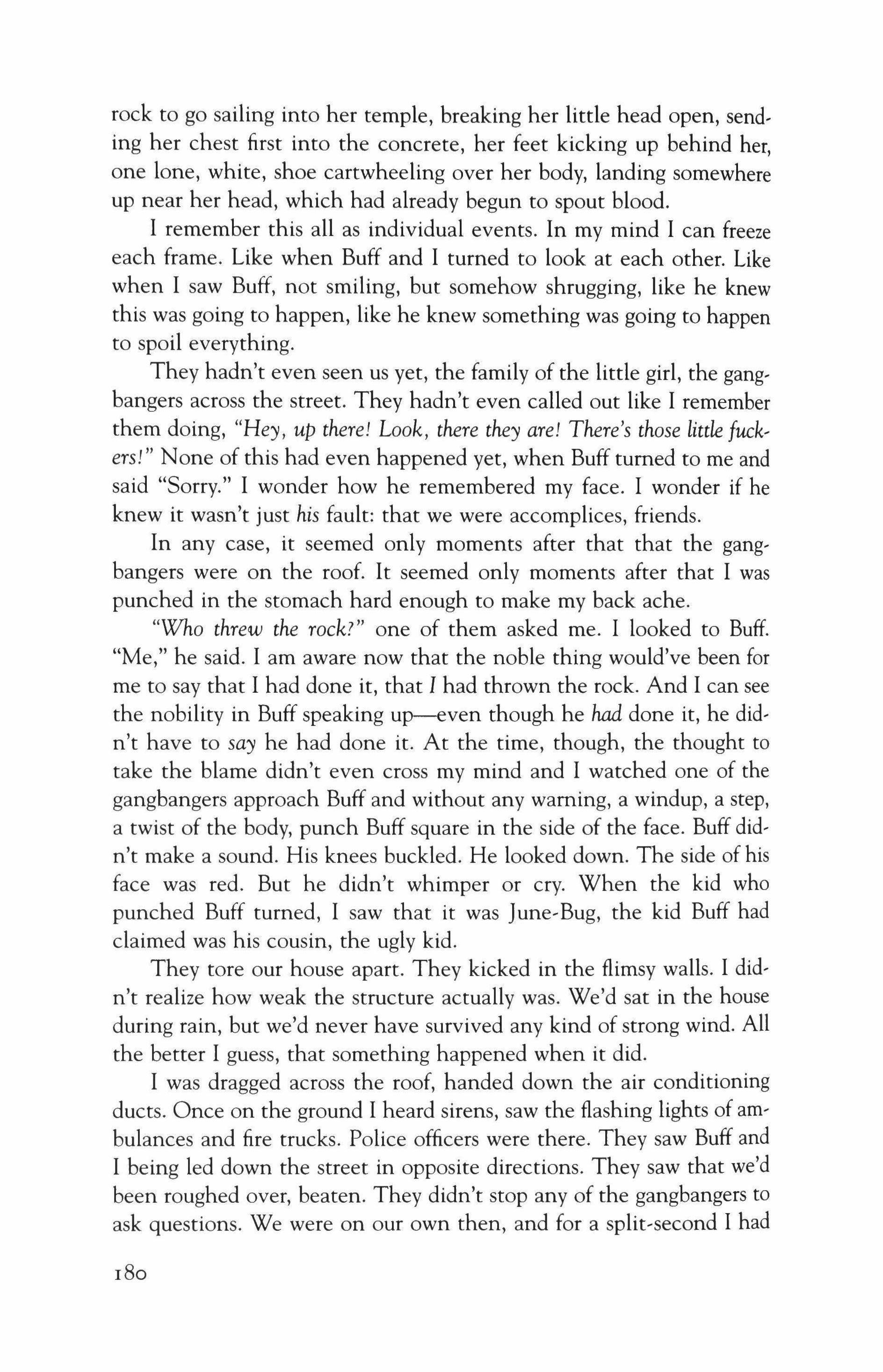
rock to go sailing into her temple, breaking her little head open, sending her chest first into the concrete, her feet kicking up behind her, one lone, white, shoe cartwheeling over her body, landing somewhere up near her head, which had already begun to spout blood.
I remember this all as individual events. In my mind I can freeze each frame. Like when Buff and I turned to look at each other. Like when I saw Buff, not smiling, but somehow shrugging, like he knew this was going to happen, like he knew something was going to happen to spoil everything.
They hadn't even seen us yet, the family of the little girl, the gangbangers across the street. They hadn't even called out like I remember them doing, "Hey, up there! Look, there they are! There's those little fuckers!" None of this had even happened yet, when Buff turned to me and said "Sorry." I wonder how he remembered my face. I wonder if he knew it wasn't just his fault: that we were accomplices, friends.
In any case, it seemed only moments after that that the gangbangers were on the roof. It seemed only moments after that I was punched in the stomach hard enough to make my back ache.
"Who threw the rock?" one of them asked me. I looked to Buff. "Me," he said. I am aware now that the noble thing would've been for me to say that I had done it, that I had thrown the rock. And I can see the nobility in Buff speaking up-even though he had done it, he didn't have to say he had done it. At the time, though, the thought to take the blame didn't even cross my mind and I watched one of the gangbangers approach Buff and without any warning, a windup, a step, a twist of the body, punch Buff square in the side of the face. Buff didn't make a sound. His knees buckled. He looked down. The side of his face was red. But he didn't whimper or cry. When the kid who punched Buff turned, I saw that it was June-Bug, the kid Buff had claimed was his cousin, the ugly kid.
They tore our house apart. They kicked in the flimsy walls. I didn't realize how weak the structure actually was. We'd sat in the house during rain, but we'd never have survived any kind of strong wind. All the better I guess, that something happened when it did.
I was dragged across the roof, handed down the air conditioning ducts. Once on the ground I heard sirens, saw the flashing lights of ambulances and fire trucks. Police officers were there. They saw Buff and I being led down the street in opposite directions. They saw that we'd been roughed over, beaten. They didn't stop any of the gangbangers to ask questions. We were on our own then, and for a split-second I had
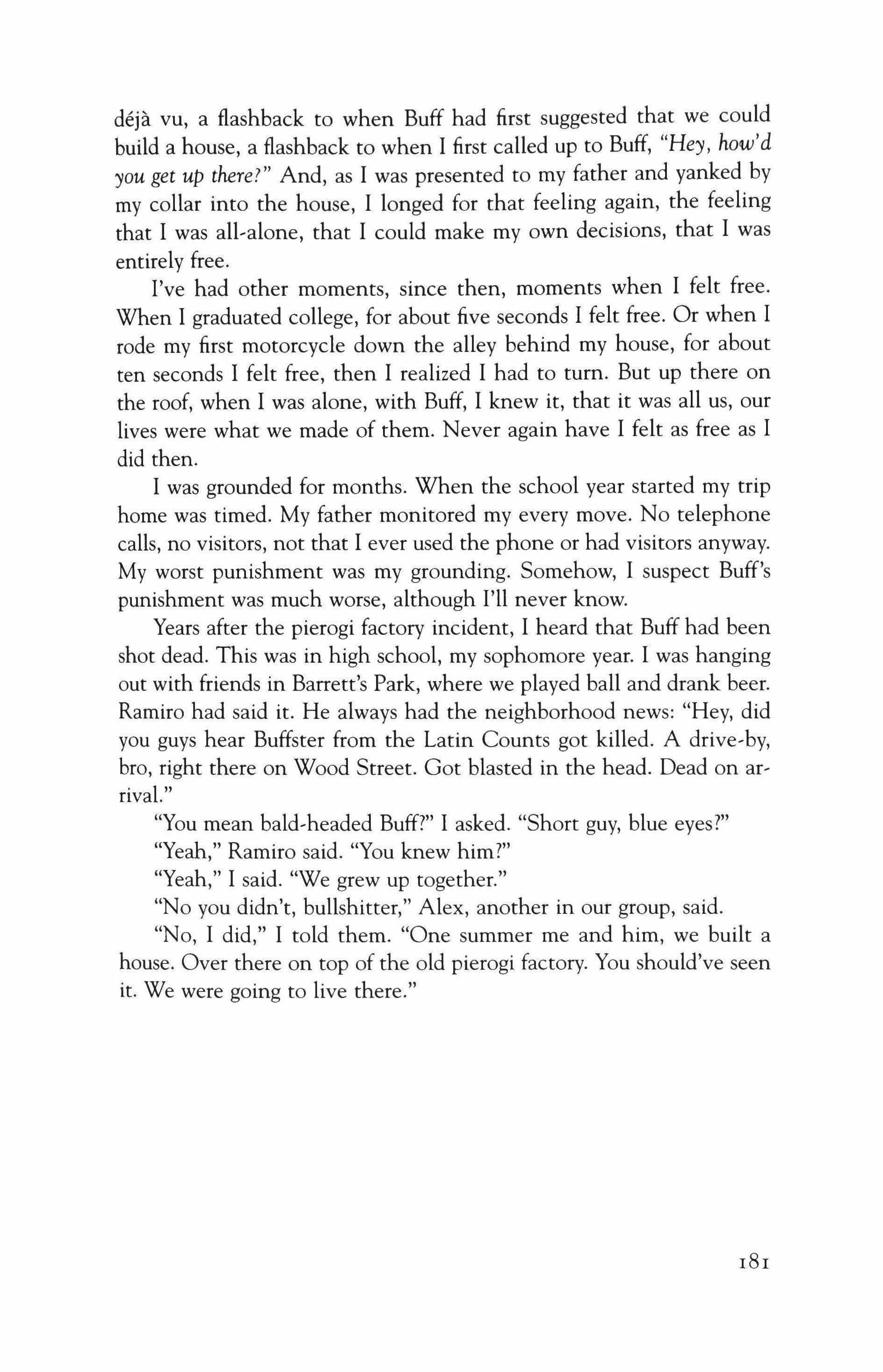
deja vu, a flashback to when Buff had first suggested that we could build a house, a flashback to when I first called up to Buff, "Hey, how'd you get up there?" And, as I was presented to my father and yanked by my collar into the house, I longed for that feeling again, the feeling that I was all-alone, that I could make my own decisions, that I was entirely free.
I've had other moments, since then, moments when I felt free. When I graduated college, for about five seconds I felt free. Or when I rode my first motorcycle down the alley behind my house, for about ten seconds I felt free, then I realized I had to turn. But up there on the roof, when I was alone, with Buff, I knew it, that it was all us, our lives were what we made of them. Never again have I felt as free as I did then.
I was grounded for months. When the school year started my trip home was timed. My father monitored my every move. No telephone calls, no visitors, not that I ever used the phone or had visitors anyway. My worst punishment was my grounding. Somehow, I suspect Buff's punishment was much worse, although I'll never know.
Years after the pierogi factory incident, I heard that Buff had been shot dead. This was in high school, my sophomore year. I was hanging out with friends in Barrett's Park, where we played ball and drank beer. Ramiro had said it. He always had the neighborhood news: "Hey, did you guys hear Buffster from the Latin Counts got killed. A drive'by, bro, right there on Wood Street. Got blasted in the head. Dead on arrival."
"You mean bald-headed Buff?" I asked. "Short guy, blue eyes?"
"Yeah," Ramiro said. "You knew him?"
"Yeah," I said. "We grew up together."
"No you didn't, bullshitter," Alex, another in our group, said.
"No, I did," I told them. "One summer me and him, we built a house. Over there on top of the old pierogi factory. You should've seen it. We were going to live there."
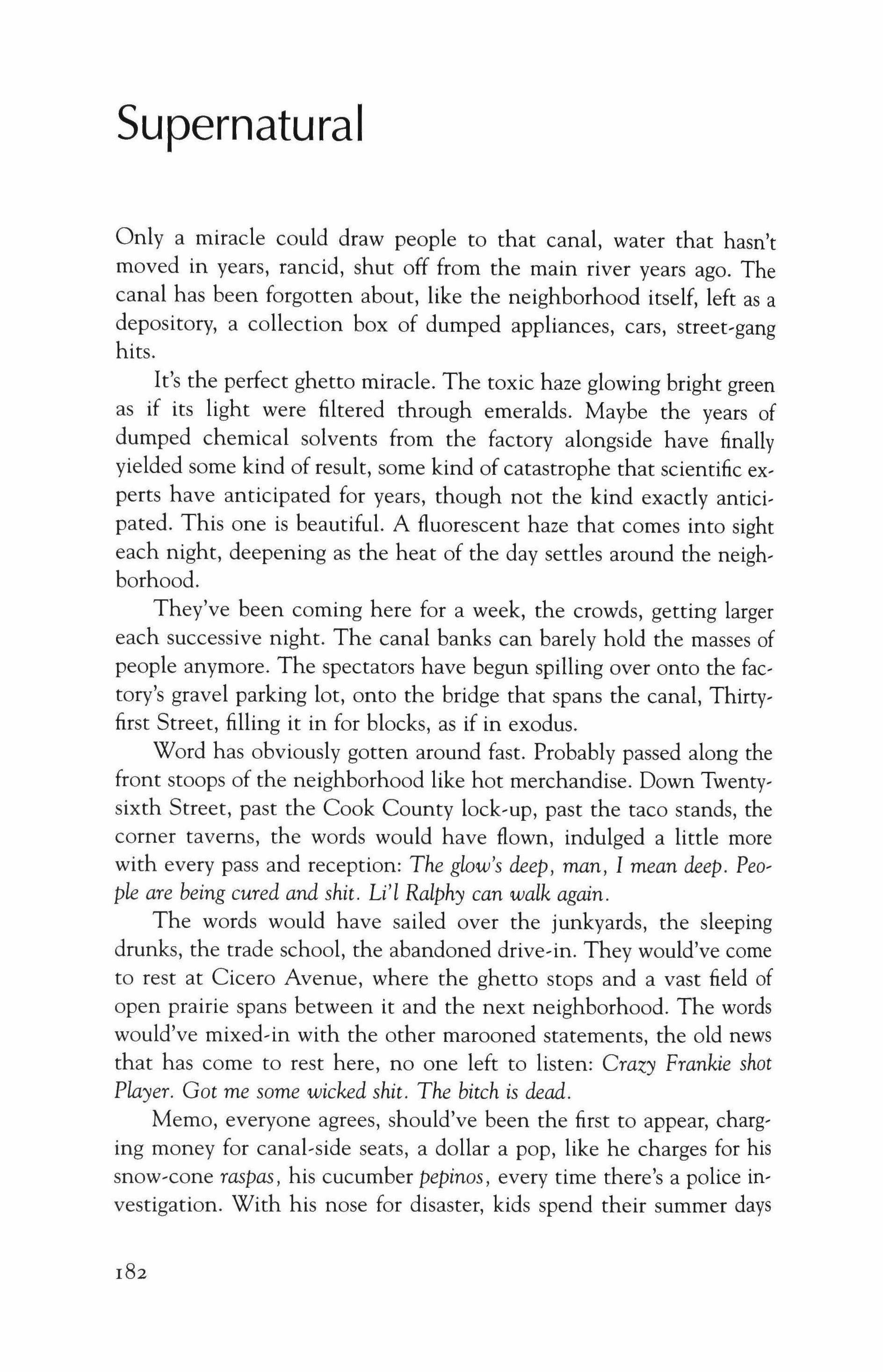
Only a miracle could draw people to that canal, water that hasn't moved in years, rancid, shut off from the main river years ago. The canal has been forgotten about, like the neighborhood itself, left as a depository, a collection box of dumped appliances, cars, street-gang hits.
It's the perfect ghetto miracle. The toxic haze glowing bright green as if its light were filtered through emeralds. Maybe the years of dumped chemical solvents from the factory alongside have finally yielded some kind of result, some kind of catastrophe that scientific ex, perts have anticipated for years, though not the kind exactly anticipated. This one is beautiful. A fluorescent haze that comes into sight each night, deepening as the heat of the day settles around the neighborhood.
They've been coming here for a week, the crowds, getting larger each successive night. The canal banks can barely hold the masses of people anymore. The spectators have begun spilling over onto the factory's gravel parking lot, onto the bridge that spans the canal, Thirty, first Street, filling it in for blocks, as if in exodus.
Word has obviously gotten around fast. Probably passed along the front stoops of the neighborhood like hot merchandise. Down Twentysixth Street, past the Cook County lock,up past the taco stands, the corner taverns, the words would have flown, indulged a little more with every pass and reception: The glow's deep, man, I mean deep. Pea' ple are being cured and shit. Li'l Ralphy can walk again.
The words would have sailed over the junkyards, the sleeping drunks, the trade school, the abandoned drive,in. They would've come to rest at Cicero Avenue, where the ghetto stops and a vast field of open prairie spans between it and the next neighborhood. The words would've mixed-in with the other marooned statements, the old news that has come to rest here, no one left to listen: Crazy Frankie shot Player. Got me some wicked shit. The bitch is dead.
Memo, everyone agrees, should've been the first to appear, charging money for canal-side seats, a dollar a pop, like he charges for his snow,cone taspas, his cucumber pepinos, every time there's a police investigation. With his nose for disaster, kids spend their summer days
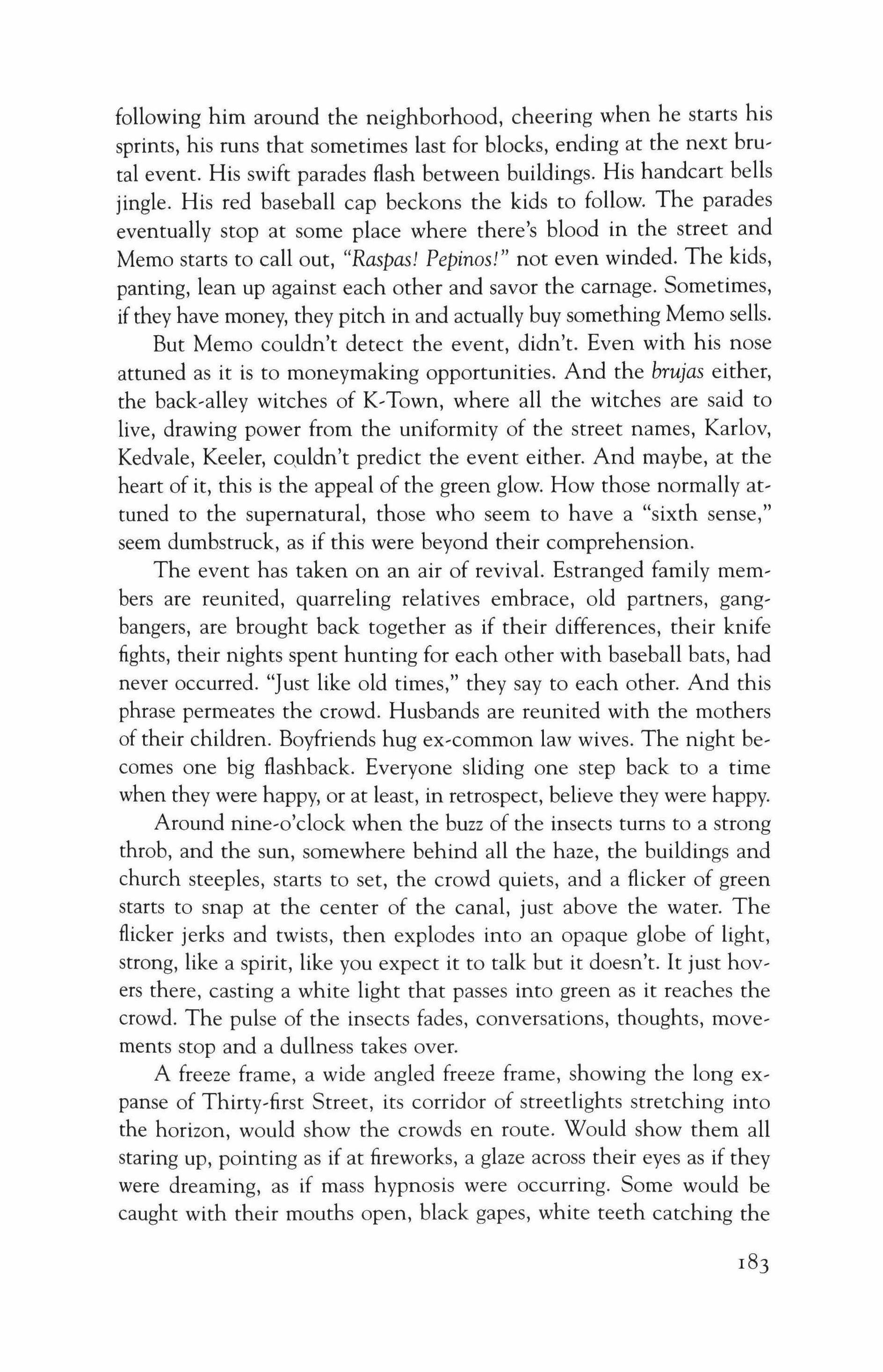
following him around the neighborhood, cheering when he starts his sprints, his runs that sometimes last for blocks, ending at the next brutal event. His swift parades flash between buildings. His handcart bells jingle. His red baseball cap beckons the kids to follow. The parades eventually stop at some place where there's blood in the street and Memo starts to call out, "Raspas! Pepinos!" not even winded. The kids, panting, lean up against each other and savor the carnage. Sometimes, if they have money, they pitch in and actually buy something Memo sells.
But Memo couldn't detect the event, didn't. Even with his nose attuned as it is to moneymaking opportunities. And the brujas either, the back-alley witches of K-Town, where all the witches are said to live, drawing power from the uniformity of the street names, Karlov, Kedvale, Keeler, couldn't predict the event either. And maybe, at the heart of it, this is the appeal of the green glow. How those normally attuned to the supernatural, those who seem to have a "sixth sense," seem dumbstruck, as if this were beyond their comprehension.
The event has taken on an air of revival. Estranged family members are reunited, quarreling relatives embrace, old partners, gangbangers, are brought back together as if their differences, their knife fights, their nights spent hunting for each other with baseball bats, had never occurred. "Just like old times," they say to each other. And this phrase permeates the crowd. Husbands are reunited with the mothers of their children. Boyfriends hug ex-common law wives. The night becomes one big flashback. Everyone sliding one step back to a time when they were happy, or at least, in retrospect, believe they were happy.
Around nine-o'clock when the buzz of the insects turns to a strong throb, and the sun, somewhere behind all the haze, the buildings and church steeples, starts to set, the crowd quiets, and a flicker of green starts to snap at the center of the canal, just above the water. The flicker jerks and twists, then explodes into an opaque globe of light, strong, like a spirit, like you expect it to talk but it doesn't. It just hovers there, casting a white light that passes into green as it reaches the crowd. The pulse of the insects fades, conversations, thoughts, movements stop and a dullness takes over.
A freeze frame, a wide angled freeze frame, showing the long expanse of Thirty-first Street, its corridor of streetlights stretching into the horizon, would show the crowds en route. Would show them all staring up, pointing as if at fireworks, a glaze across their eyes as if they were dreaming, as if mass hypnosis were occurring. Some would be caught with their mouths open, black gapes, white teeth catching the
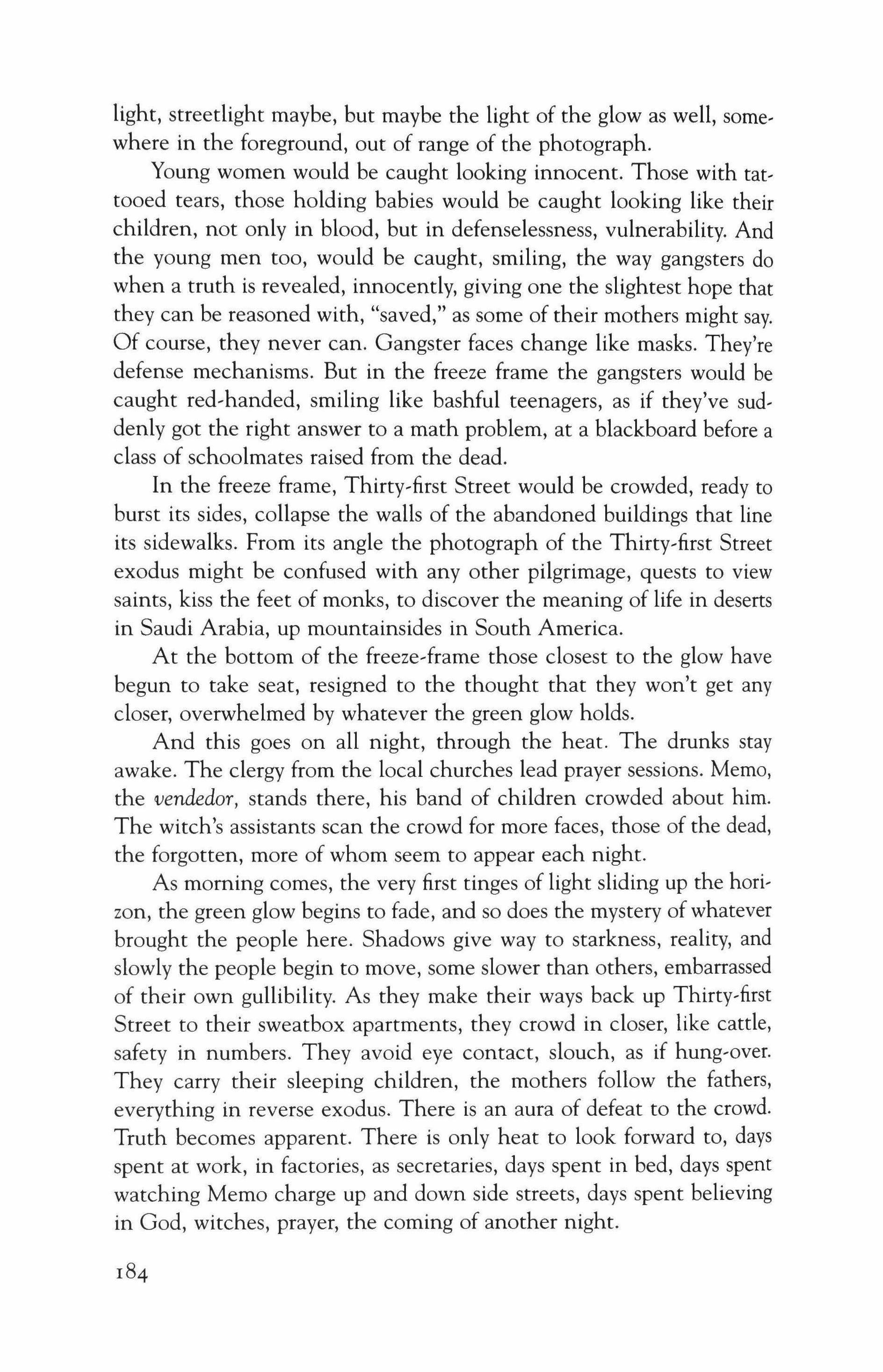
light, streetlight maybe, but maybe the light of the glow as well, somewhere in the foreground, out of range of the photograph.
Young women would be caught looking innocent. Those with tattooed tears, those holding babies would be caught looking like their children, not only in blood, but in defenselessness, vulnerability. And the young men too, would be caught, smiling, the way gangsters do when a truth is revealed, innocently, giving one the slightest hope that they can be reasoned with, "saved," as some of their mothers might say. Of course, they never can. Gangster faces change like masks. They're defense mechanisms. But in the freeze frame the gangsters would be caught red-handed, smiling like bashful teenagers, as if they've suddenly got the right answer to a math problem, at a blackboard before a class of schoolmates raised from the dead.
In the freeze frame, Thirty-first Street would be crowded, ready to burst its sides, collapse the walls of the abandoned buildings that line its sidewalks. From its angle the photograph of the Thirty-first Street exodus might be confused with any other pilgrimage, quests to view saints, kiss the feet of monks, to discover the meaning of life in deserts in Saudi Arabia, up mountainsides in South America.
At the bottom of the freeze-frame those closest to the glow have begun to take seat, resigned to the thought that they won't get any closer, overwhelmed by whatever the green glow holds.
And this goes on all night, through the heat. The drunks stay awake. The clergy from the local churches lead prayer sessions. Memo, the vendedor, stands there, his band of children crowded about him. The witch's assistants scan the crowd for more faces, those of the dead, the forgotten, more of whom seem to appear each night.
As morning comes, the very first tinges of light sliding up the horizon, the green glow begins to fade, and so does the mystery of whatever brought the people here. Shadows give way to starkness, reality, and slowly the people begin to move, some slower than others, embarrassed of their own gullibility. As they make their ways back up Thirty-first Street to their sweatbox apartments, they crowd in closer, like cattle, safety in numbers. They avoid eye contact, slouch, as if hung-over. They carry their sleeping children, the mothers follow the fathers, everything in reverse exodus. There is an aura of defeat to the crowd. Truth becomes apparent. There is only heat to look forward to, days spent at work, in factories, as secretaries, days spent in bed, days spent watching Memo charge up and down side streets, days spent believing in God, witches, prayer, the coming of another night.
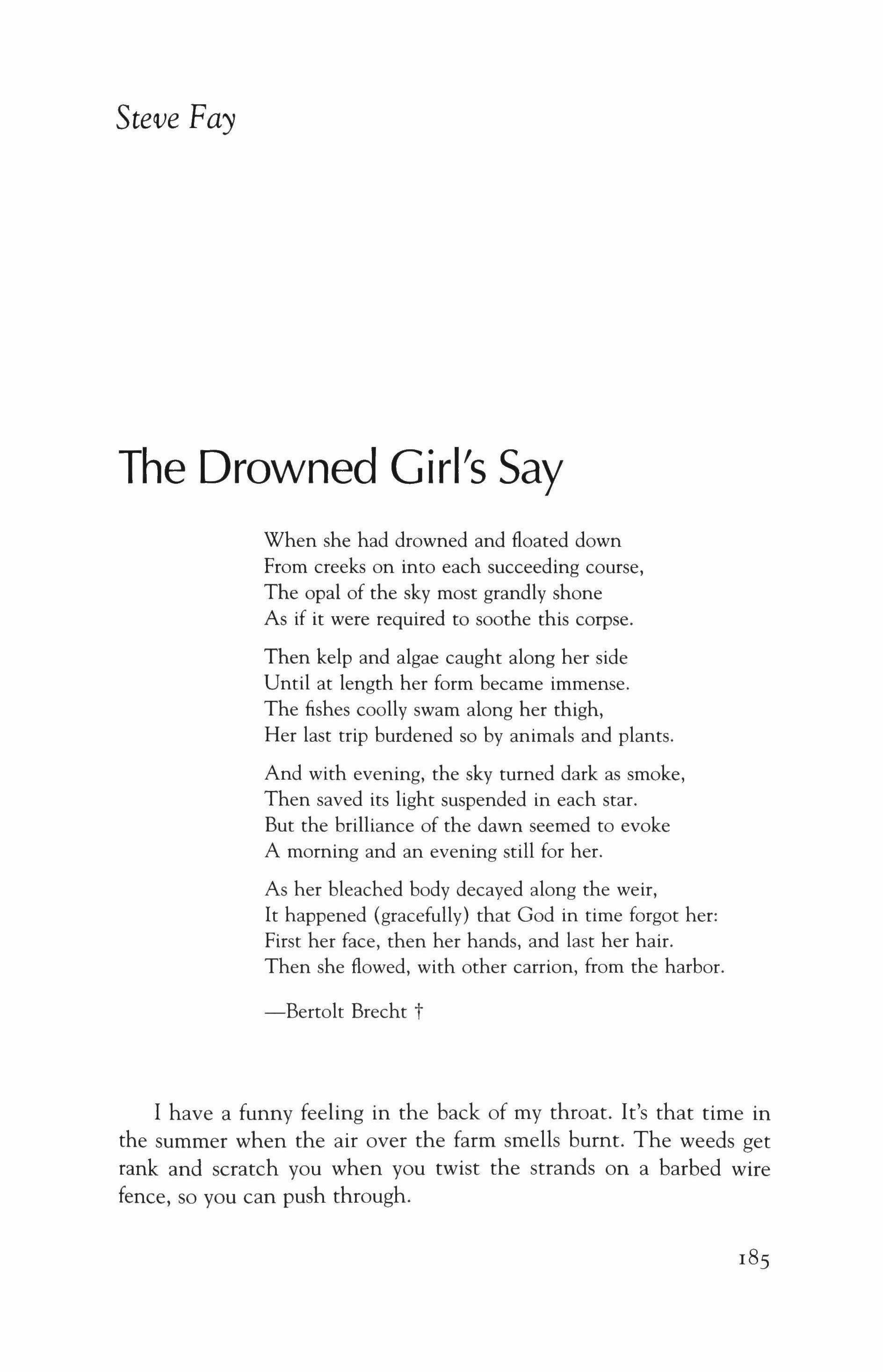
When she had drowned and floated down From creeks on into each succeeding course, The opal of the sky most grandly shone As if it were required to soothe this corpse.
Then kelp and algae caught along her side Until at length her form became immense. The fishes coolly swam along her thigh, Her last trip burdened so by animals and plants.
And with evening, the sky turned dark as smoke, Then saved its light suspended in each star. But the brilliance of the dawn seemed to evoke A morning and an evening still for her.
As her bleached body decayed along the weir, It happened (gracefully) that God in time forgot her: First her face, then her hands, and last her hair. Then she flowed, with other carrion, from the harbor.
-Bertolt Brecht tI have a funny feeling in the back of my throat. It's that time in the summer when the air over the farm smells burnt. The weeds get rank and scratch you when you twist the strands on a barbed wire fence, so you can push through.
Then your own sweat bums you when it runs down across that place
My bandanna has a hole in it. It's threadbare and frayed at the edges, but then that's the softest kind of cloth. A new one feels like a board when you wipe it on your face.
It's like with shoes, their tops and sales. The worn out ones feel best.
I'm glad when Vi doesn't have money to get me new shoes at the start of school. September's bad enough, having to squeeze behind that desk, and to be back under the gaze of a sour-faced teacher-without also having my feet pinched all day.
I rub the bandanna over the back of my neck. I stick it back in my overall pocket. When I put it, finally, back over my face, when I stretch out long on the pier by the river, it will smell like my own burned skin.
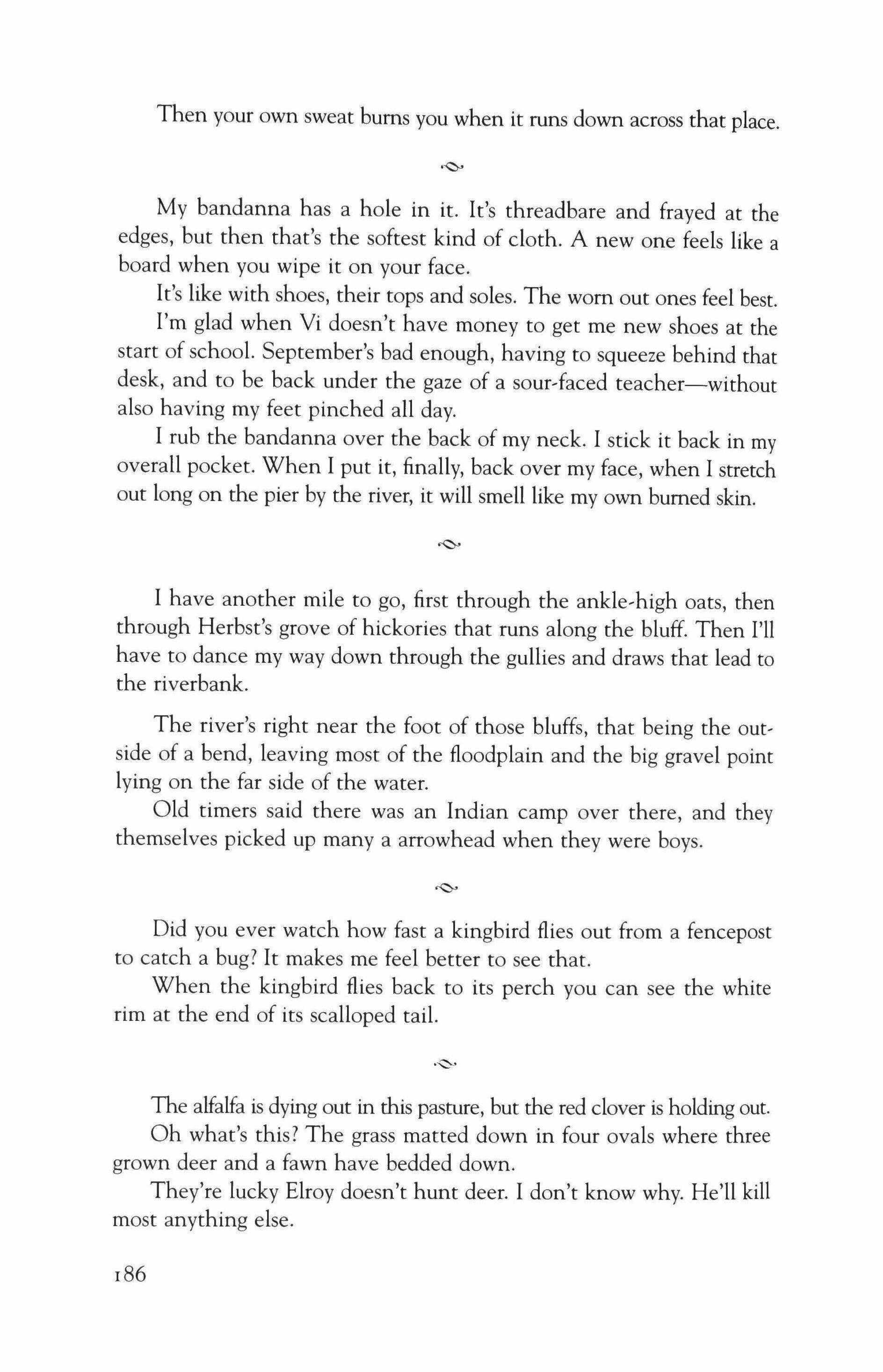
I have another mile to go, first through the ankle-high oats, then through Herbst's grove of hickories that runs along the bluff. Then I'll have to dance my way down through the gullies and draws that lead to the riverbank.
The river's right near the foot of those bluffs, that being the outside of a bend, leaving most of the floodplain and the big gravel point lying on the far side of the water.
Old timers said there was an Indian camp over there, and they themselves picked up many a arrowhead when they were boys.
Did you ever watch how fast a kingbird flies out from a fencepost to catch a bug? It makes me feel better to see that.
When the kingbird flies back to its perch you can see the white rim at the end of its scalloped tail.
The alfalfa is dying out in this pasture, but the red clover is holding out. Oh what's this? The grass matted down in four ovals where three grown deer and a fawn have bedded down.
They're lucky Elroy doesn't hunt deer. I don't know why. He'll kill most anything else.
I can hear a covey of quail calling to one another. Or really, there's one making low, throaty squalls and others whose little peeping sounds are answering, as they move towards him through the grass.
Sometimes they'll hold right there, until you almost step on one, and then they go up like a bomb all around you.
I'm glad they didn't do that this time. My stomach is bothering me, like a hostage.
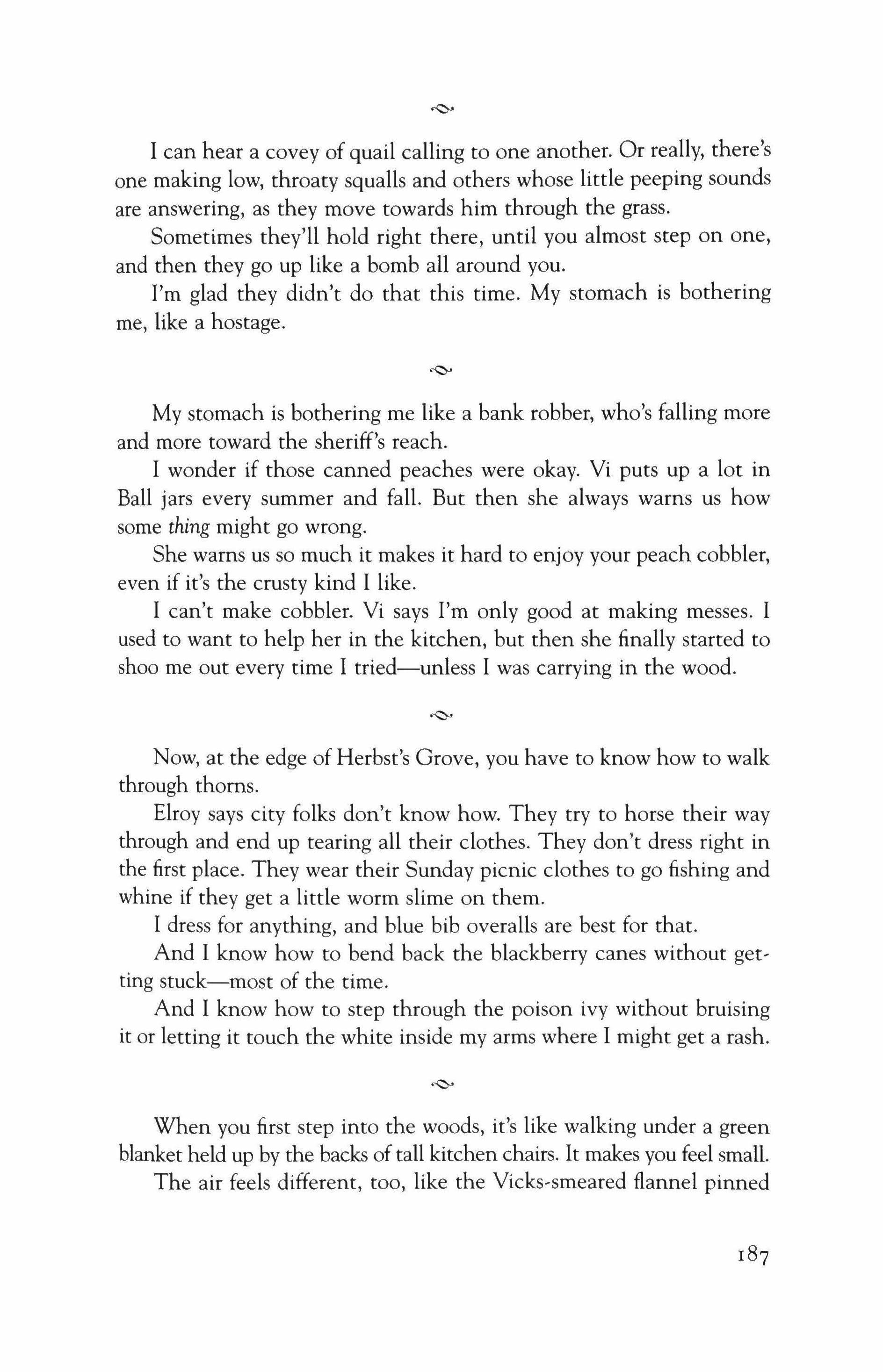
My stomach is bothering me like a bank robber, who's falling more and more toward the sheriff's reach.
I wonder if those canned peaches were okay. Vi puts up a lot in Ball jars every summer and fall. But then she always warns us how some thing might go wrong.
She warns us so much it makes it hard to enjoy your peach cobbler, even if it's the crusty kind I like.
I can't make cobbler. Vi says I'm only good at making messes. I used to want to help her in the kitchen, but then she finally started to shoo me out every time I tried-unless I was carrying in the wood.
Now, at the edge of Herbst's Grove, you have to know how to walk through thorns.
Elroy says city folks don't know how. They try to horse their way through and end up tearing all their clothes. They don't dress right in the first place. They wear their Sunday picnic clothes to go fishing and whine if they get a little worm slime on them.
I dress for anything, and blue bib overalls are best for that.
And I know how to bend back the blackberry canes without getting stuck-most of the time.
And I know how to step through the poison ivy without bruising it or letting it touch the white inside my arms where I might get a rash.
When you first step into the woods, it's like walking under a green blanket held up by the backs of tall kitchen chairs. It makes you feel small. The air feels different, too, like the Vicks-smeared flannel pinned
by Vi inside my pajama top when I used to have the croup.
Even if the wind is in the treetops, it's quieter down below than in the pasture. You can almost hear the spider plucking the strings of his web. I pick up a stick to wave in front of my face as I go. I don't like to walk right into the webs and get them stuck to my nose.
I wish I could see a gray fox running off somewhere through the trees. Or a gray fox climbing a tree. A gray fox can climb a tree, they say.
I go faster now. The path is narrow, but clear, and I want to stay ahead of the deer flies. Once they find you they don't let up.
If you stop, they'll light before you know it and take a sip of you. Some people say they bite, but I say they sip. They don't have teeth to chew with, but they sting your ear when they suck on it hard.
Their wings are spotted like a fawn's back, the way the hepatica leaf is shaped like a liver. Vi says God's design is spread all around us. Vi says God is watching over us all the time and protecting us.
Elroy spits his tobacco juice about the time she opens her Bible to show me the verses.

I usually bound down this draw like a deer, but I feel dizzy. I have to lean on this ironwood tree for a while.
There's a light-gap up ahead where an old red oak went down in a storm. It looks like it started to uproot on one side, but then it split where the hollow sides were thin.
I didn't notice it before. Already a pokeweed has grown tall where the sunlight spills now, down into the middle of the woods.
Those damned peaches! I didn't know they could cause this kind of pain in my side, and down between my hips.
I think I'll have to walk this pain away, like a bad Charlie-horse.
When you get near the bottom of this ravine, suddenly it's all ferns. I don't know what kind they all are, except that before they open you call the curled up leaves they start from fiddleheads
They call the lacy ferns on the other side of the farm maidenhair. I
wonder about that name. I wonder about names for things that are delicate and pretty.
Sometimes on the shady sides of a creek channel, you find thick-leaved and dark ferns hanging down the bank. Christmas fems, they call them.
Would you believe they're still green like that in December? You can walk down into the canyons at Siloam Park and brush the snow off them on New Year's Day, if you don't believe me.
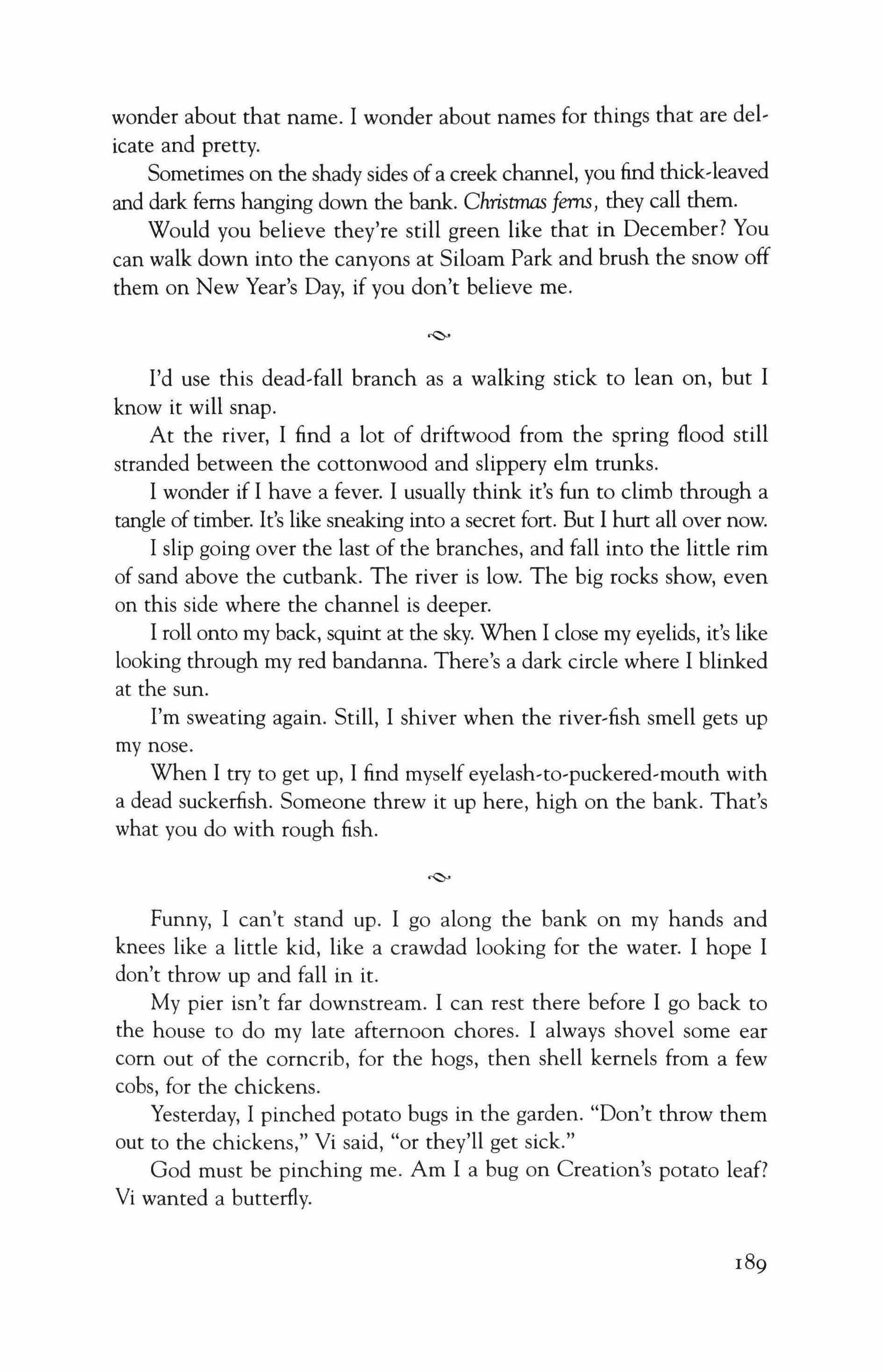
I'd use this dead-fall branch as a walking stick to lean on, but I know it will snap.
At the river, I find a lot of driftwood from the spring flood still stranded between the cottonwood and slippery elm trunks.
I wonder if I have a fever. I usually think it's fun to climb through a tangle of timber. It's like sneaking into a secret fort. But I hurt all over now.
I slip going over the last of the branches, and fall into the little rim of sand above the cutbank. The river is low. The big rocks show, even on this side where the channel is deeper.
I roll onto my back, squint at the sky. When I close my eyelids, it's like looking through my red bandanna. There's a dark circle where I blinked at the sun.
I'm sweating again. Still, I shiver when the river-fish smell gets up my nose.
When I try to get up, I find myselfeyelash-to-puckered-mouth with a dead suckerfish. Someone threw it up here, high on the bank. That's what you do with rough fish.
Funny, I can't stand up. I go along the bank on my hands and knees like a little kid, like a crawdad looking for the water. I hope I don't throw up and fall in it.
My pier isn't far downstream. I can rest there before I go back to the house to do my late afternoon chores. I always shovel some ear corn out of the corncrib, for the hogs, then shell kernels from a few cobs, for the chickens.
Yesterday, I pinched potato bugs in the garden. "Don't throw them out to the chickens," Vi said, "or they'll get sick."
God must be pinching me. Am I a bug on Creation's potato leaf? Vi wanted a butterfly.
I climb up on my pier. It's not made of beams and boards, and not one of those kinds built on old oil drums so it can float up or down with the river level. People used to try to have piers like that on the river, but they never lasted, more than a spring.
No, mine is a giant swamp white oak, its crown hooked into the bottom and its bole lodged deep in boulders and sand, ever since the big flood when I was little. Finally, the floods and wind have rasped the bark and small branches off of it, but the wood is still hard.
When I was nine I read Sam Clemens's Life on the MississiPPi sitting far out over the water, riding on my white oak's back. I wanted to be a river pilot, or a barge worker.
Vi said I should wash my face, or no boy would marry me.
Elroy said a barge never went up our river, and even if they did, nobody'd let a woman aboard one.
I told him, I wasn't going to be a damned woman then.
Vi slapped my face and told me not to mock God.
The wood is so smooth, I can slide along it like a snake. I don't need much strength to work my way out.
I stop and lay my cheek against the pier. In a moment it feels cool even though it has had the sun growling down on it for hours.
On Decoration Day, the glass of the Chevy's back window was cool like that. I wasn't talking to Vi and Elroy. Vi'd made Elroy spank me until I agreed to wear a dress.
I'm as tall and round as Vi, and he found it awkward to put me over his knee. She wouldn't let him use his belt, though, so he spanked me with his hard farmer's hands.
I was afraid he'd break my sitting bones. I'm still bruised.
And he was as red-faced as me when it was over.
So I put on the stupid dress, but I wouldn't let them pull my bandanna off my hair.
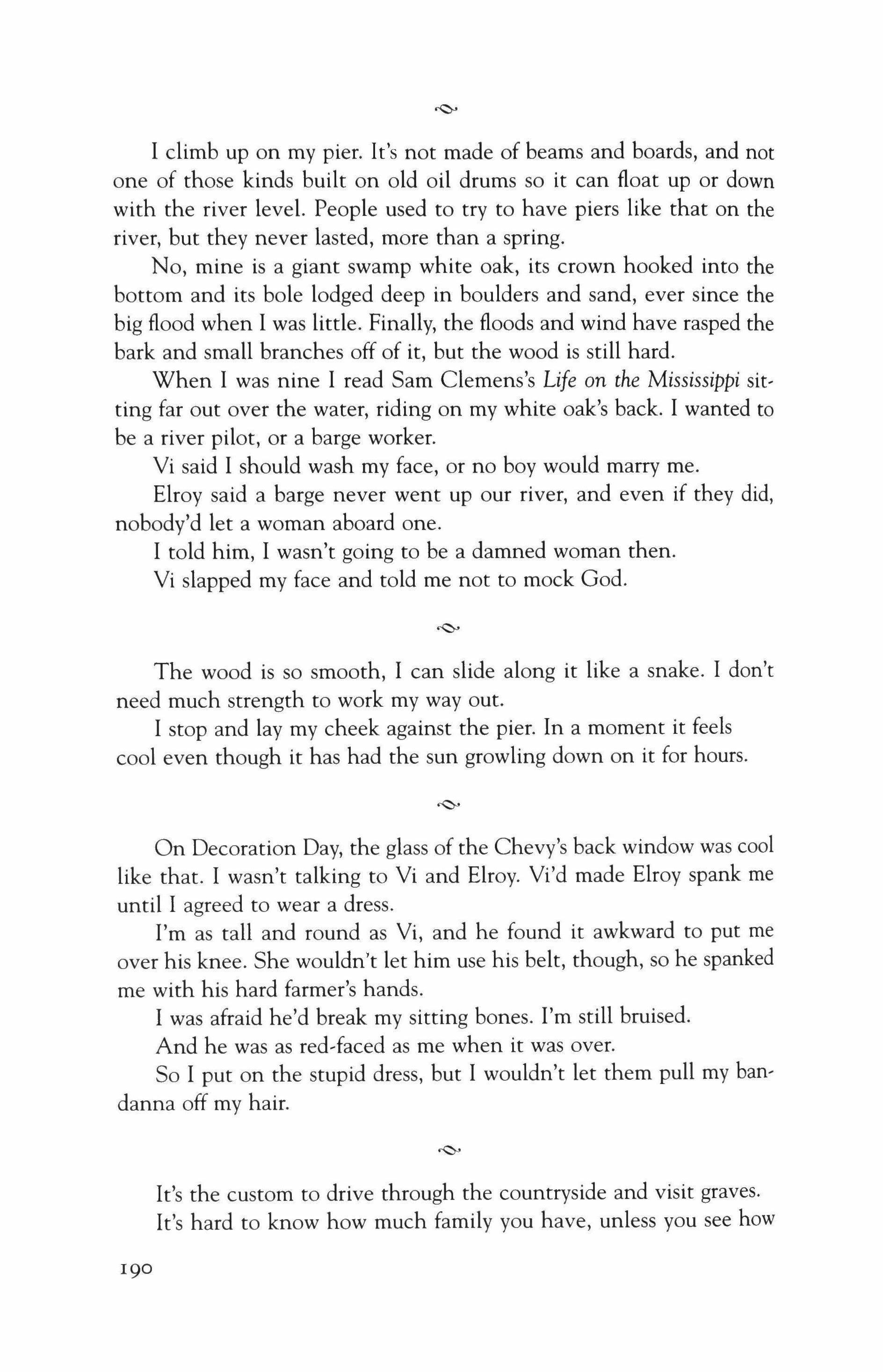
It's the custom to drive through the countryside and visit graves. It's hard to know how much family you have, unless you see how
many of them are dead. I have dead cousins in four counties, and I'm only adopted.
Aunt Lorraine says in some places people are buried one on top of the other. It makes me wonder how deep the graves go then.
Aunt Lorraine says she wants to be buried under Tyrone Power.
Vi clucks her teeth and gets in the car, up front, next to Elroy, who turns the key, and then presses the rubber starter button on the floor. Vi mumbles about her heathen sister going to Hell on the express train.
Elroy laughs and takes a big chaw of tobacco when the engine starts up. The Chevy's not like his old car, the one he had to crank, over and over, while Vi fiddled with knobs and levers on the steering wheel.
I sit in the back, alone with a bucket of flowers: columbine, Dame's rocket, sweet William, and hot-house lilies Vi used her egg money to buy in town.
"Don't let that bucket spill," Vi snaps at me, and I sneak a toe over to the base of the bucket, so it won't slide around so much when we pull around the tum in the lane.
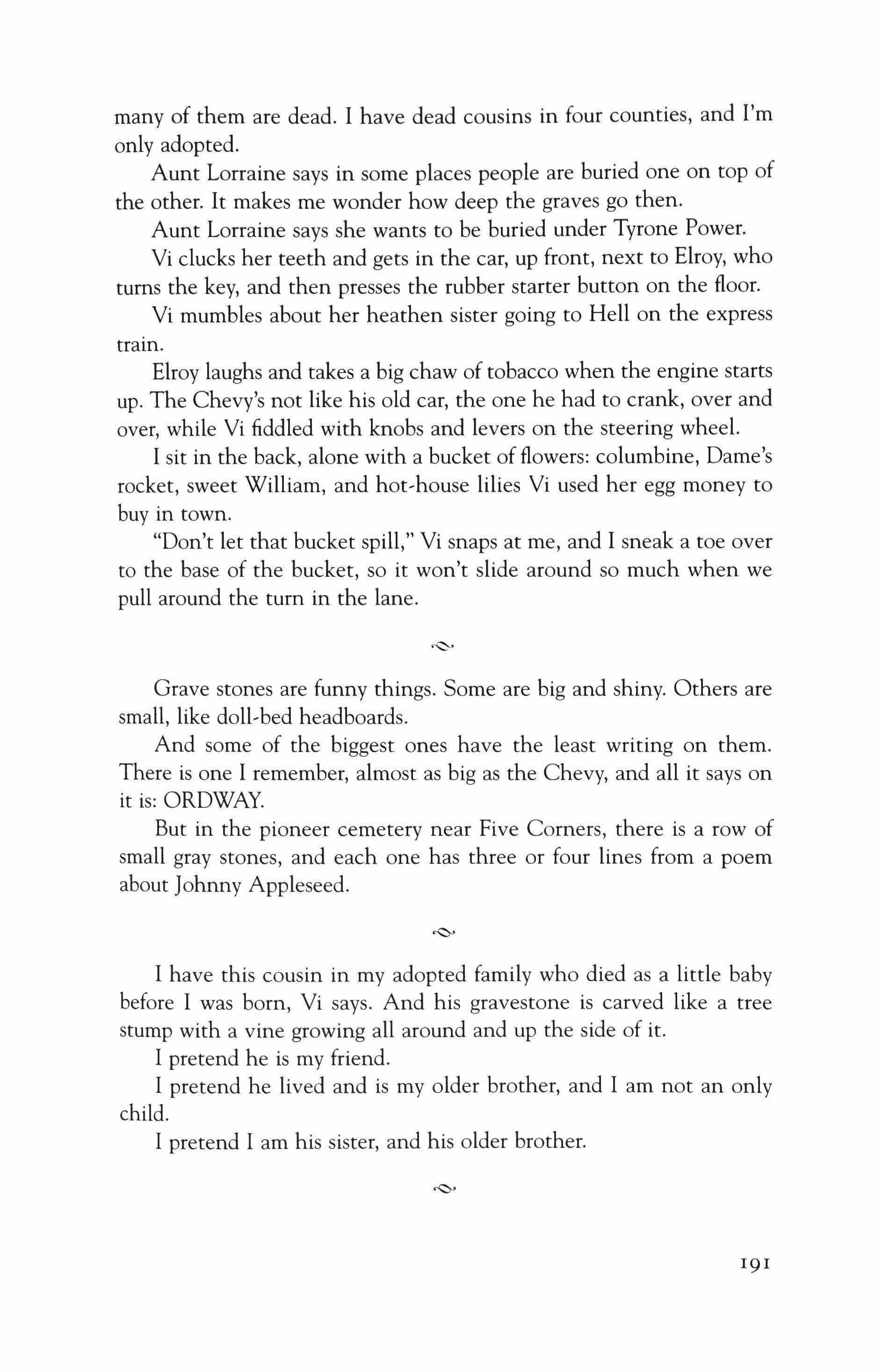
Grave stones are funny things. Some are big and shiny. Others are small, like doll-bed headboards.
And some of the biggest ones have the least writing on them. There is one I remember, almost as big as the Chevy, and all it says on it is: ORDWAY.
But in the pioneer cemetery near Five Corners, there is a row of small gray stones, and each one has three or four lines from a poem about Johnny Appleseed.
I have this cousin in my adopted family who died as a little baby before I was born, Vi says. And his gravestone is carved like a tree stump with a vine growing all around and up the side of it.
I pretend he is my friend.
I pretend he lived and is my older brother, and I am not an only child.
I pretend I am his sister, and his older brother.
Late in the day, Vi cried and cried over a low stone, as the sun went low over toward Columbus. The stone was like a shiny, reddishbrown pillow, propped in the grass near a crooked cedar.
She made me get her the rest of the flowers. She arranged them and then got down on her knees, and prayed over the stone.
Elroy went back to the car.
I stood halfway between them watching a robin pull up worms. Don't eat them, I thought. Those worms eat our dead. You might die.
I remember now, that's when I felt the first twinge of this pain in my stomach, that now feels like a worm is eating me.
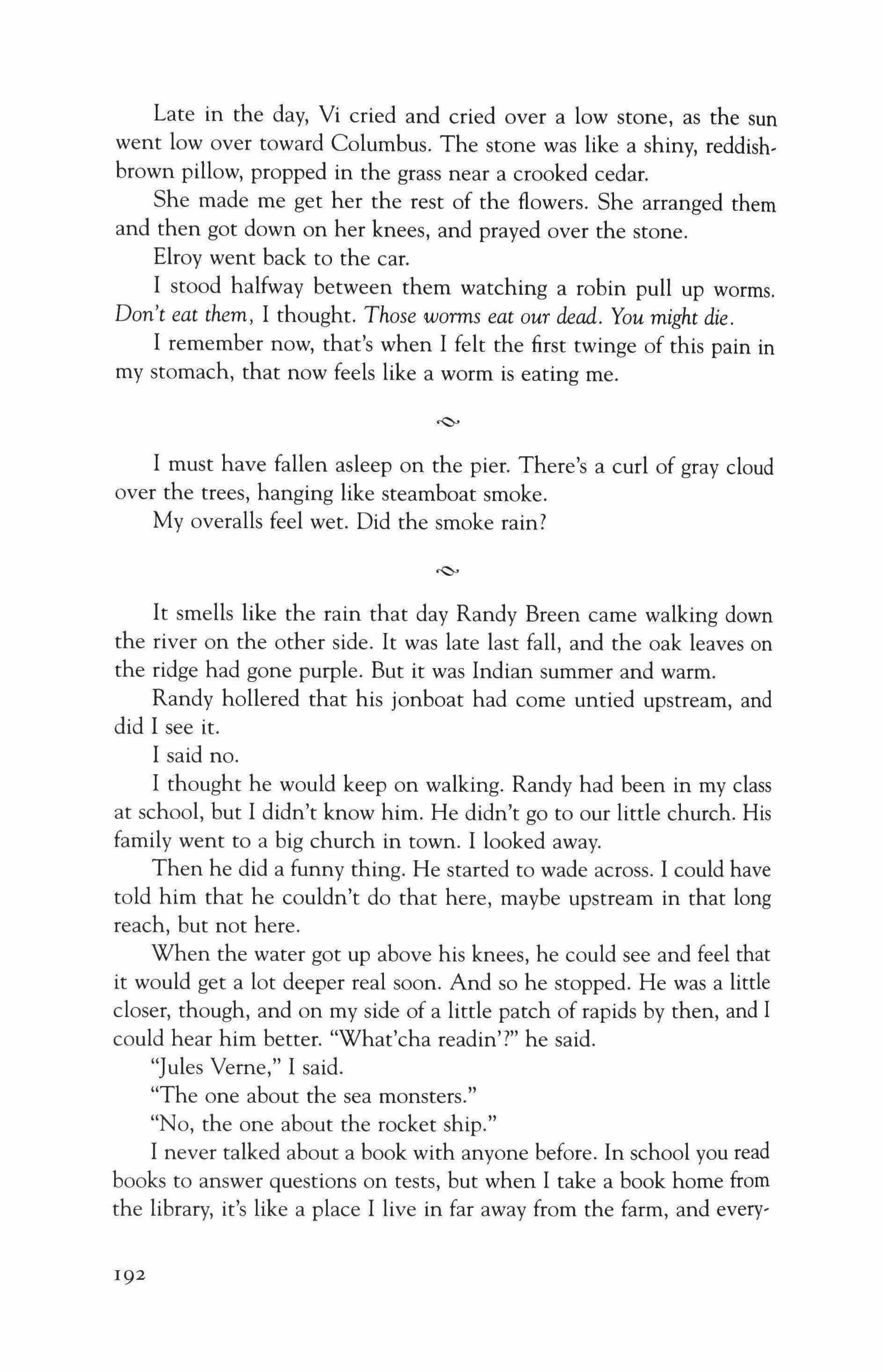
I must have fallen asleep on the pier. There's a curl of gray cloud over the trees, hanging like steamboat smoke.
My overalls feel wet. Did the smoke rain?
It smells like the rain that day Randy Breen came walking down the river on the other side. It was late last fall, and the oak leaves on the ridge had gone purple. But it was Indian summer and warm.
Randy hollered that his jonboat had come untied upstream, and did I see it.
I said no.
I thought he would keep on walking. Randy had been in my class at school, but I didn't know him. He didn't go to our little church. His family went to a big church in town. I looked away.
Then he did a funny thing. He started to wade across. I could have told him that he couldn't do that here, maybe upstream in that long reach, but not here.
When the water got up above his knees, he could see and feel that it would get a lot deeper real soon. And so he stopped. He was a little closer, though, and on my side of a little patch of rapids by then, and I could hear him better. "What'cha readin'?" he said.
"Jules Verne," I said.
"The one about the sea monsters."
"No, the one about the rocket ship."
I never talked about a book with anyone before. In school you read books to answer questions on tests, but when I take a book home from the library, it's like a place I live in far away from the farm, and every-
body else. I didn't know if I liked the idea of Randy trespassing there. "I didn't read that one yet. Is it good?"
"Yes."
Randy had a big smile, the kind of smile the boys in the pictures between the chapters of adventure books have. Randy could almost be Rex Lee, Night Flier.
I wonder if my cousin would have grown up that way, or if he'd be moody like me. Now, Sam Clemens, he knew the difference: Tom Sawyer was a smiler, but Huck Finn was moody, and didn't wash his face too much.
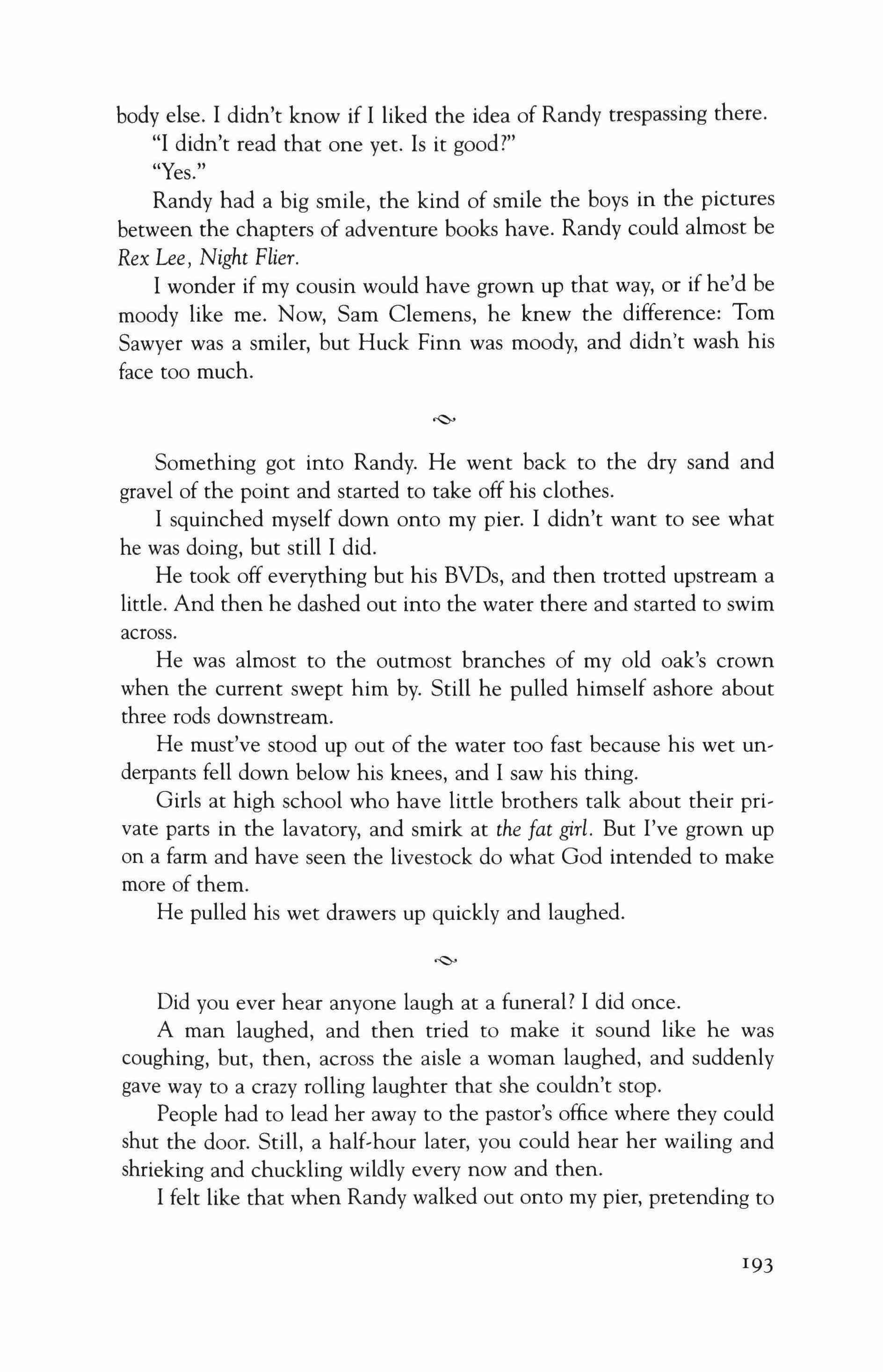
Something got into Randy. He went back to the dry sand and gravel of the point and started to take off his clothes.
I squinched myself down onto my pier. I didn't want to see what he was doing, but still I did.
He took off everything but his BVDs, and then trotted upstream a little. And then he dashed out into the water there and started to swim across.
He was almost to the outmost branches of mv old oak's crown when the current swept him by. Still he pulled himself ashore about three rods downstream.
He must've stood up out of the water too fast because his wet underpants fell down below his knees, and I saw his thing.
Girls at high school who have little brothers talk about their private parts in the lavatory, and smirk at the fat girl. But I've grown up on a farm and have seen the livestock do what God intended to make more of them.
He pulled his wet drawers up quickly and laughed.
Did you ever hear anyone laugh at a funeral? I did once.
A man laughed, and then tried to make it sound like he was coughing, but, then, across the aisle a woman laughed, and suddenly gave way to a crazy rolling laughter that she couldn't stop.
People had to lead her away to the pastor's office where they could shut the door. Still, a half-hour later, you could hear her wailing and shrieking and chuckling wildly every now and then.
I felt like that when Randy walked out onto my pier, pretending to
be a tightrope walker, with his arms balancing out at his sides. His face and forearms were tanned from three seasons lived out doors, but where his shirt and pants usually covered, his skin was a white as a baby's. There were a few, thin, reddish, wet curls on hi chest, and his boy's nipples were almost as small and flat as brown pen nies.
I laughed only a little, out loud. But, inside of me, I was disruptinj a city block full of churches.
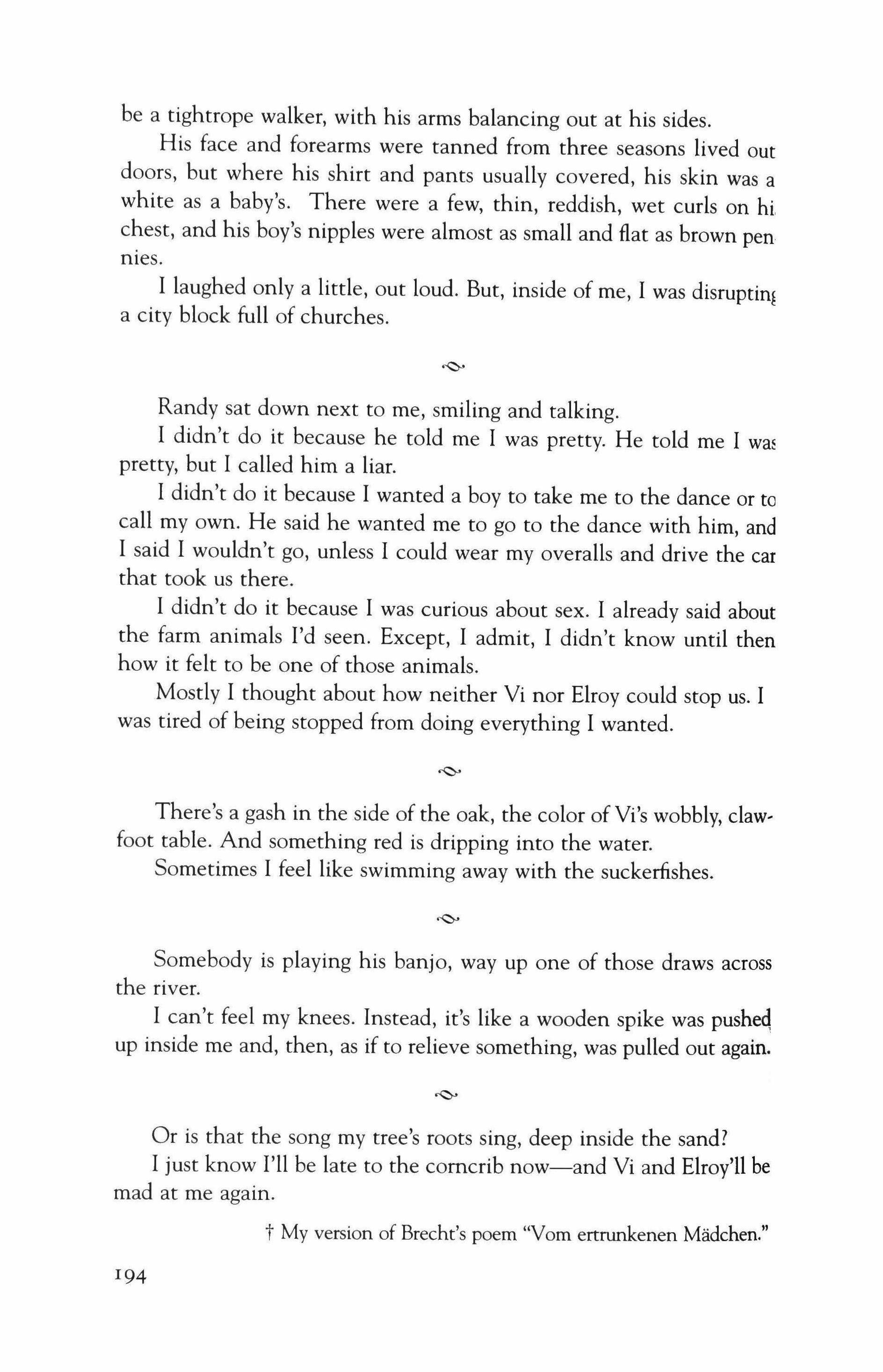
Randy sat down next to me, smiling and talking.
I didn't do it because he told me I was pretty. He told me I was pretty, but I called him a liar.
I didn't do it because I wanted a boy to take me to the dance or to call my own. He said he wanted me to go to the dance with him, and I said I wouldn't go, unless I could wear my overalls and drive the car that took us there.
I didn't do it because I was curious about sex. I already said about the farm animals I'd seen. Except, I admit, I didn't know until then how it felt to be one of those animals.
Mostly I thought about how neither Vi nor Elroy could stop us. I was tired of being stopped from doing everything I wanted.
There's a gash in the side of the oak, the color of Vi's wobbly, clawfoot table. And something red is dripping into the water.
Sometimes I feel like swimming away with the suckerfishes.
Somebody is playing his banjo, way up one of those draws across the river.
I can't feel my knees. Instead, it's like a wooden spike was pushed up inside me and, then, as if to relieve something, was pulled out again.
Or is that the song my tree's roots sing, deep inside the sand?
I just know I'll be late to the corncrib now-and Vi and Elroy'll be mad at me again.
t My version of Brecht's poem "Yom ertrunkenen Madchen."
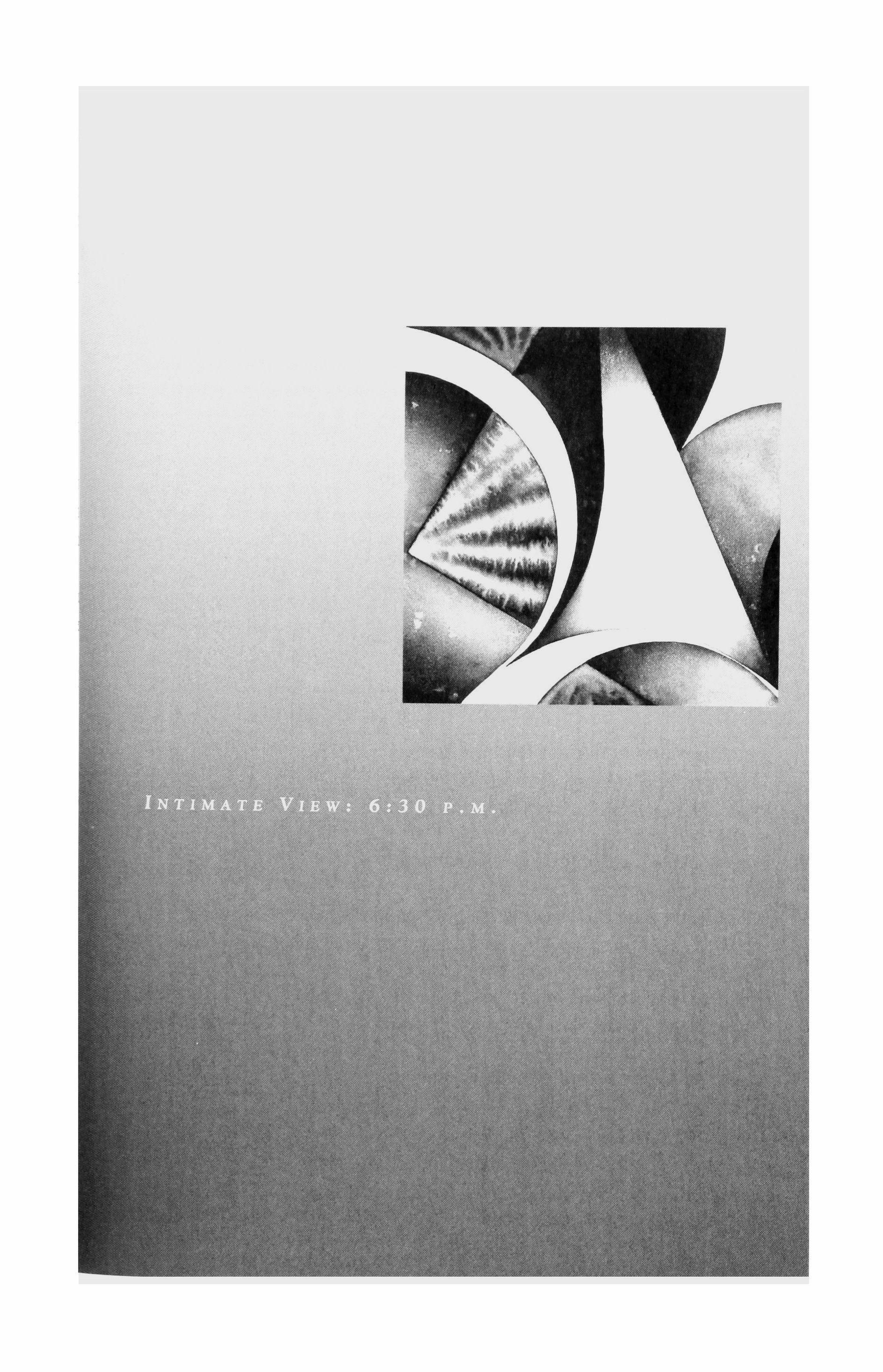
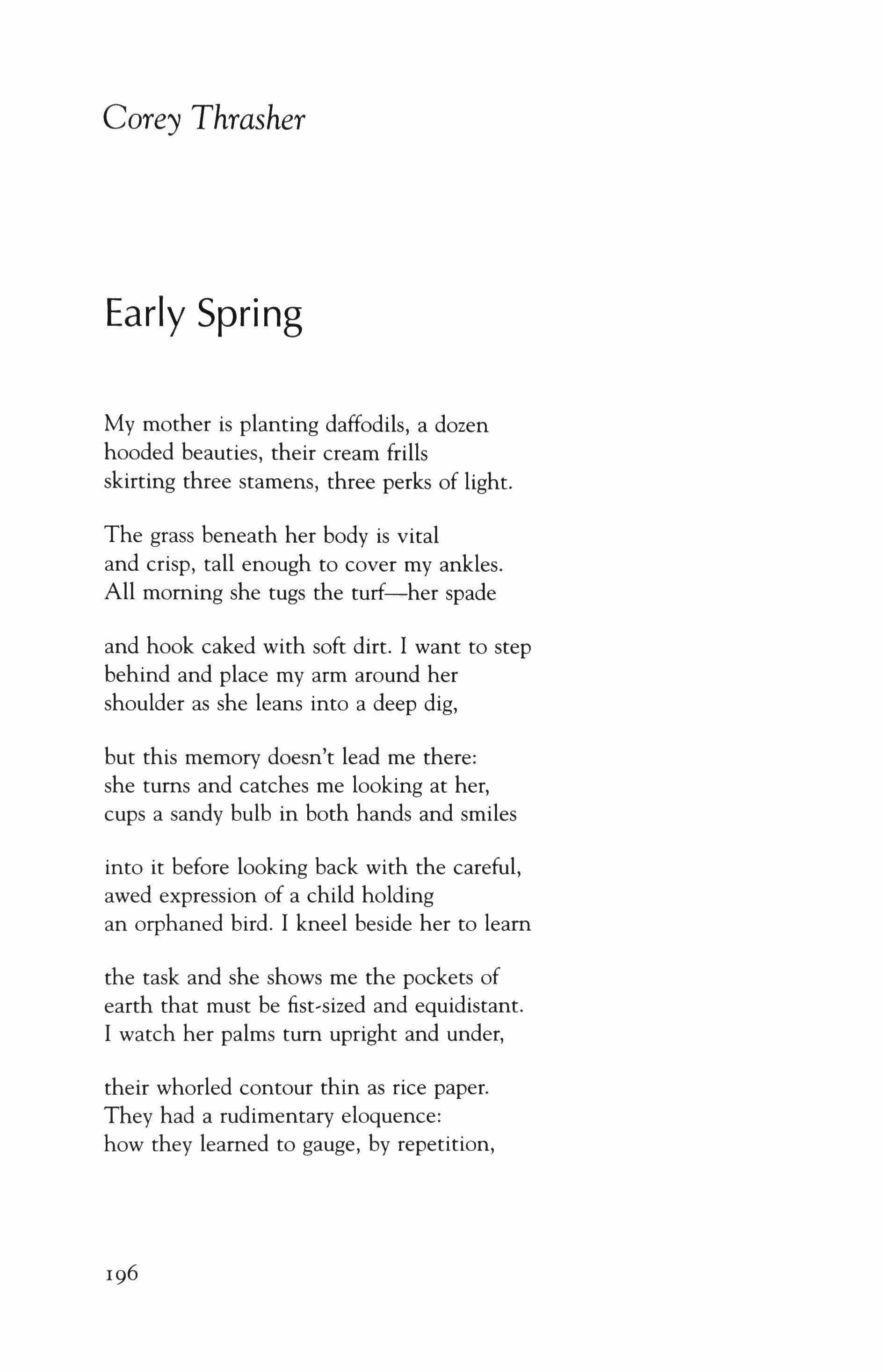
My mother is planting daffodils, a dozen hooded beauties, their cream frills skirting three stamens, three perks of light.
The grass beneath her body is vital and crisp, tall enough to cover my ankles. All morning she tugs the turf-her spade and hook caked with soft dirt. I want to step behind and place my arm around her shoulder as she leans into a deep dig, but this memory doesn't lead me there: she turns and catches me looking at her, cups a sandy bulb in both hands and smiles
into it before looking back with the careful, awed expression of a child holding an orphaned bird. I kneel beside her to learn
the task and she shows me the pockets of earth that must be fist-sized and equidistant. I watch her palms tum upright and under, their whorled contour thin as rice paper. They had a rudimentary eloquence: how they learned to gauge, by repetition,
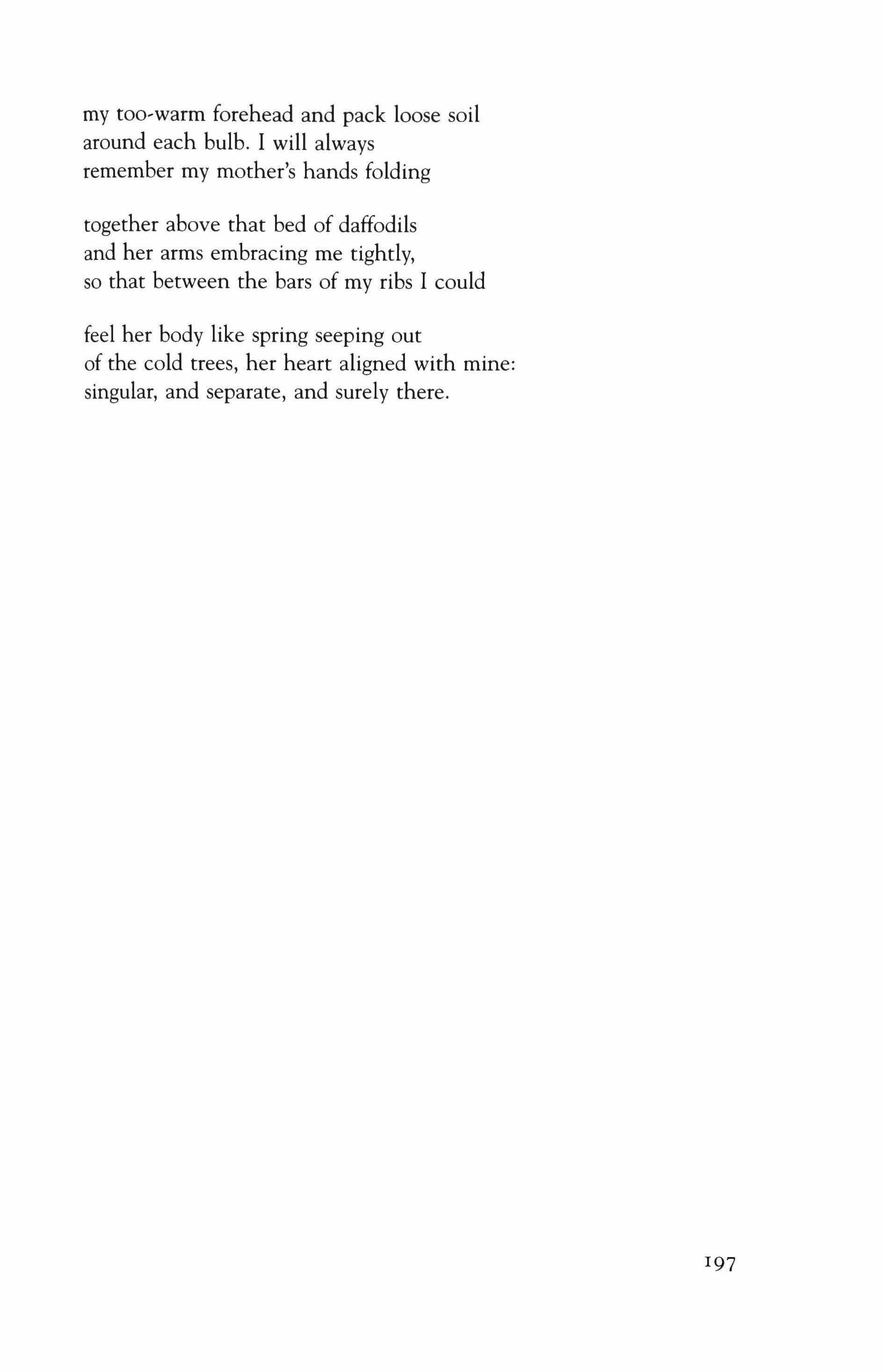
my too'warm forehead and pack loose soil around each bulb. I will always remember my mother's hands folding together above that bed of daffodils and her arms embracing me tightly, so that between the bars of my ribs I could feel her body like spring seeping out of the cold trees, her heart aligned with mine: singular, and separate, and surely there.
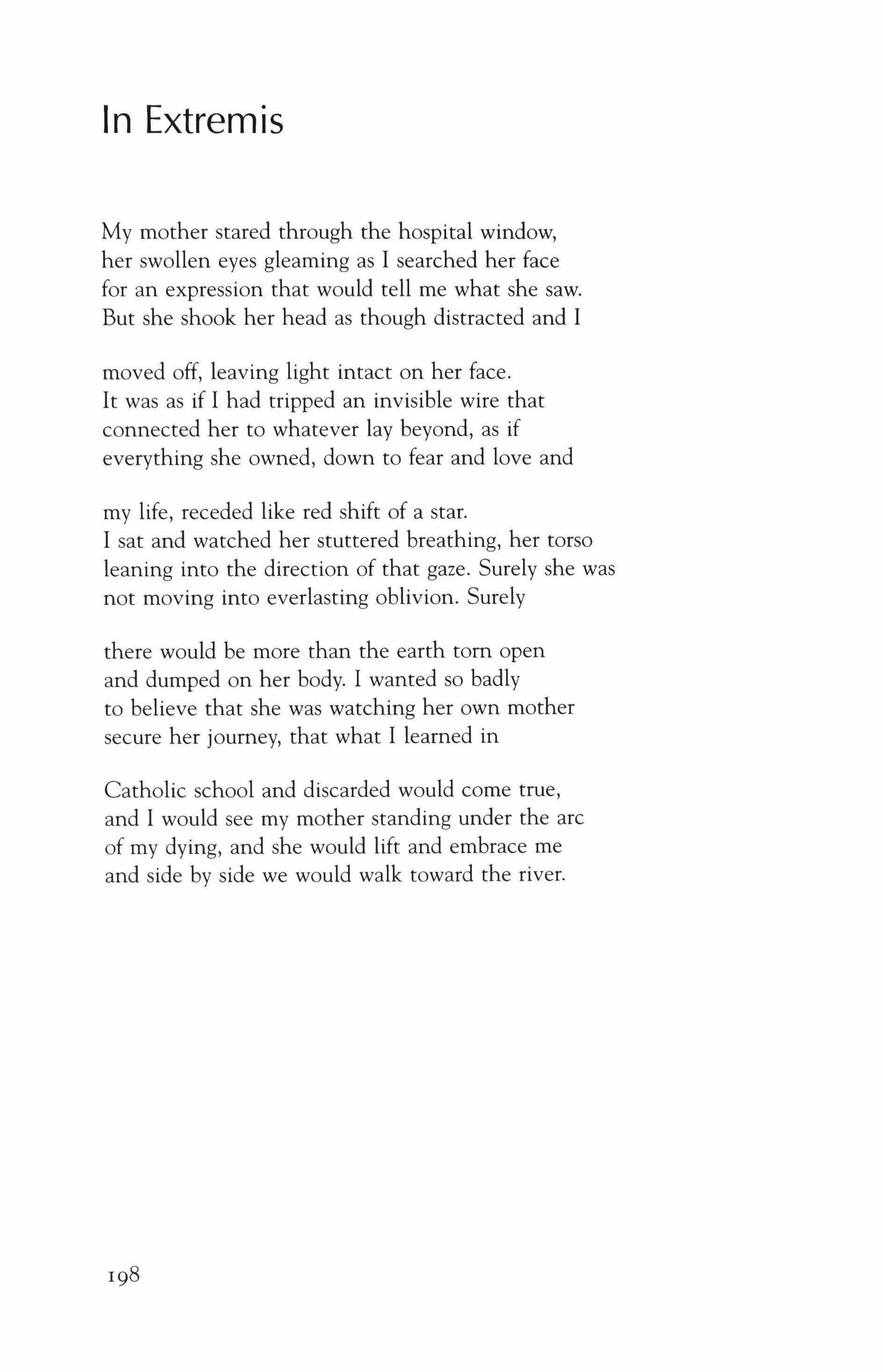
My mother stared through the hospital window, her swollen eyes gleaming as I searched her face for an expression that would tell me what she saw. But she shook her head as though distracted and I moved off, leaving light intact on her face. It was as if I had tripped an invisible wire that connected her to whatever lay beyond, as if everything she owned, down to fear and love and my life, receded like red shift of a star. I sat and watched her stuttered breathing, her torso leaning into the direction of that gaze. Surely she was not moving into everlasting oblivion. Surely there would be more than the earth tom open and dumped on her body. I wanted so badly to believe that she was watching her own mother secure her journey, that what I learned in Catholic school and discarded would come true, and I would see my mother standing under the arc of my dying, and she would lift and embrace me and side by side we would walk toward the river.
]effrey Harrison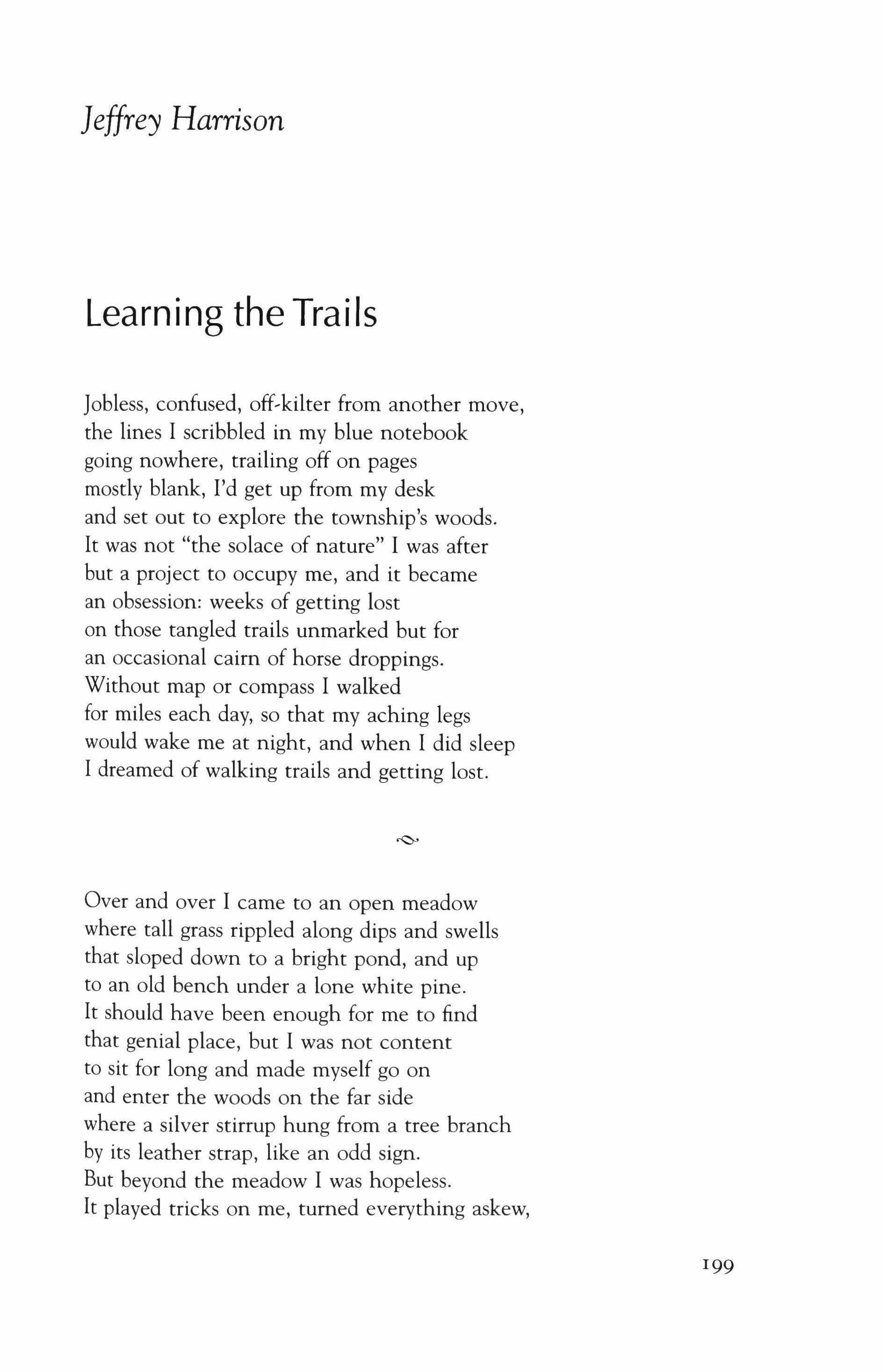
Jobless, confused, off-kilter from another move, the lines I scribbled in my blue notebook going nowhere, trailing off on pages mostly blank, I'd get up from my desk and set out to explore the township's woods. It was not "the solace of nature" I was after but a project to occupy me, and it became an obsession: weeks of getting lost on those tangled trails unmarked but for an occasional cairn of horse droppings. Without map or compass I walked for miles each day, so that my aching legs would wake me at night, and when I did sleep I dreamed of walking trails and getting lost.
Over and over I came to an open meadow where tall grass rippled along dips and swells that sloped down to a bright pond, and up to an old bench under a lone white pine. It should have been enough for me to find that genial place, but I was not content to sit for long and made myself go on and enter the woods on the far side where a silver stirrup hung from a tree branch by its leather strap, like an odd sign. But beyond the meadow I was hopeless. It played tricks on me, turned everything askew,
as if the meadow were the hub of that whole countryside and would twist on its axis and get me lost.
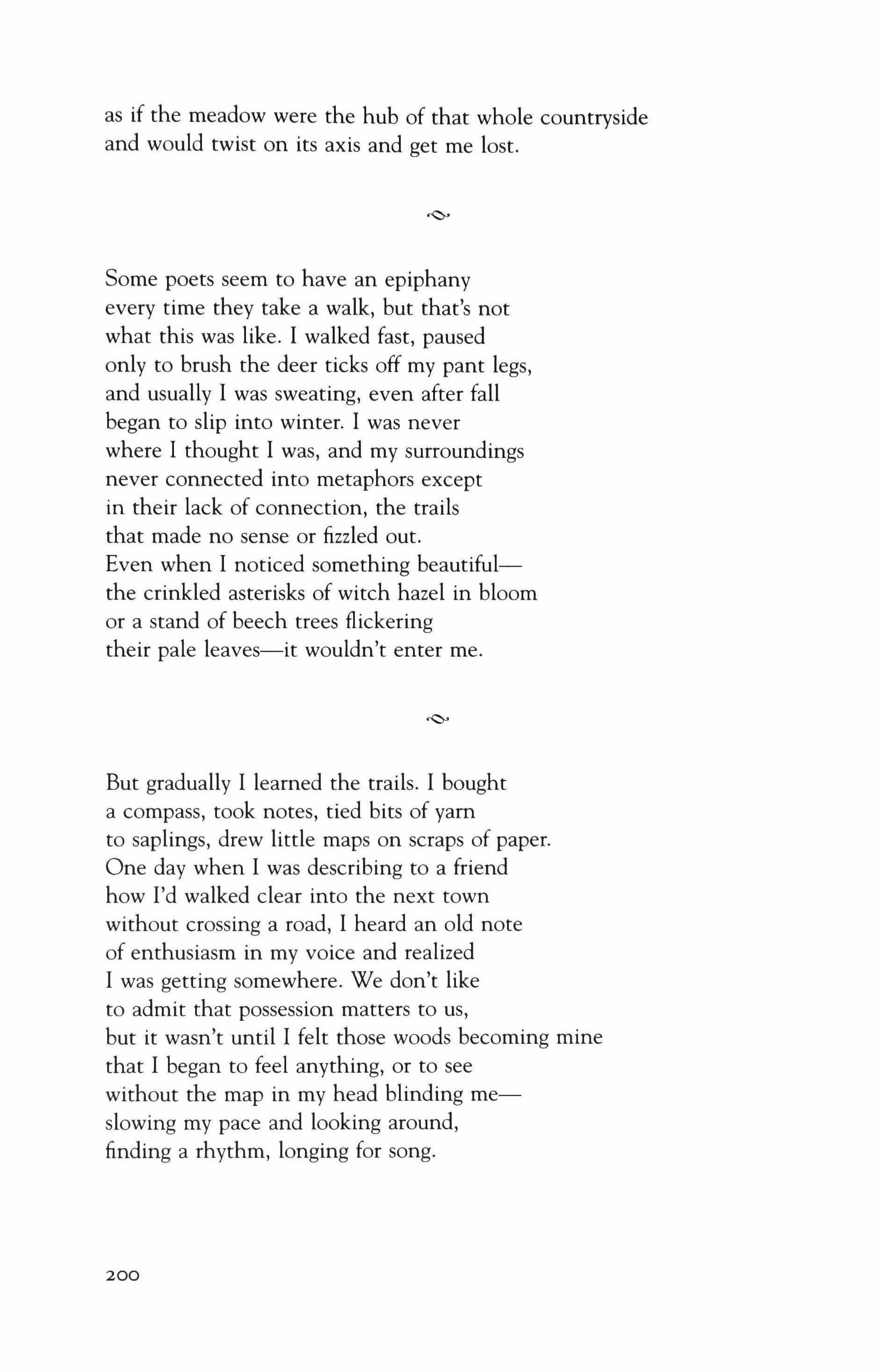
Some poets seem to have an epiphany every time they take a walk, but that's not what this was like. I walked fast, paused only to brush the deer ticks off my pant legs, and usually I was sweating, even after fall began to slip into winter. I was never where I thought I was, and my surroundings never connected into metaphors except in their lack of connection, the trails that made no sense or fizzled out. Even when I noticed something beautifulthe crinkled asterisks of witch hazel in bloom or a stand of beech trees flickering their pale leaves-it wouldn't enter me.
But gradually I learned the trails. I bought a compass, took notes, tied bits of yarn to saplings, drew little maps on scraps of paper. One day when I was describing to a friend how l'd walked clear into the next town without crossing a road, I heard an old note of enthusiasm in my voice and realized I was getting somewhere. We don't like to admit that possession matters to us, but it wasn't until I felt those woods becoming mine that I began to feel anything, or to see without the map in my head blinding meslowing my pace and looking around, finding a rhythm, longing for song.
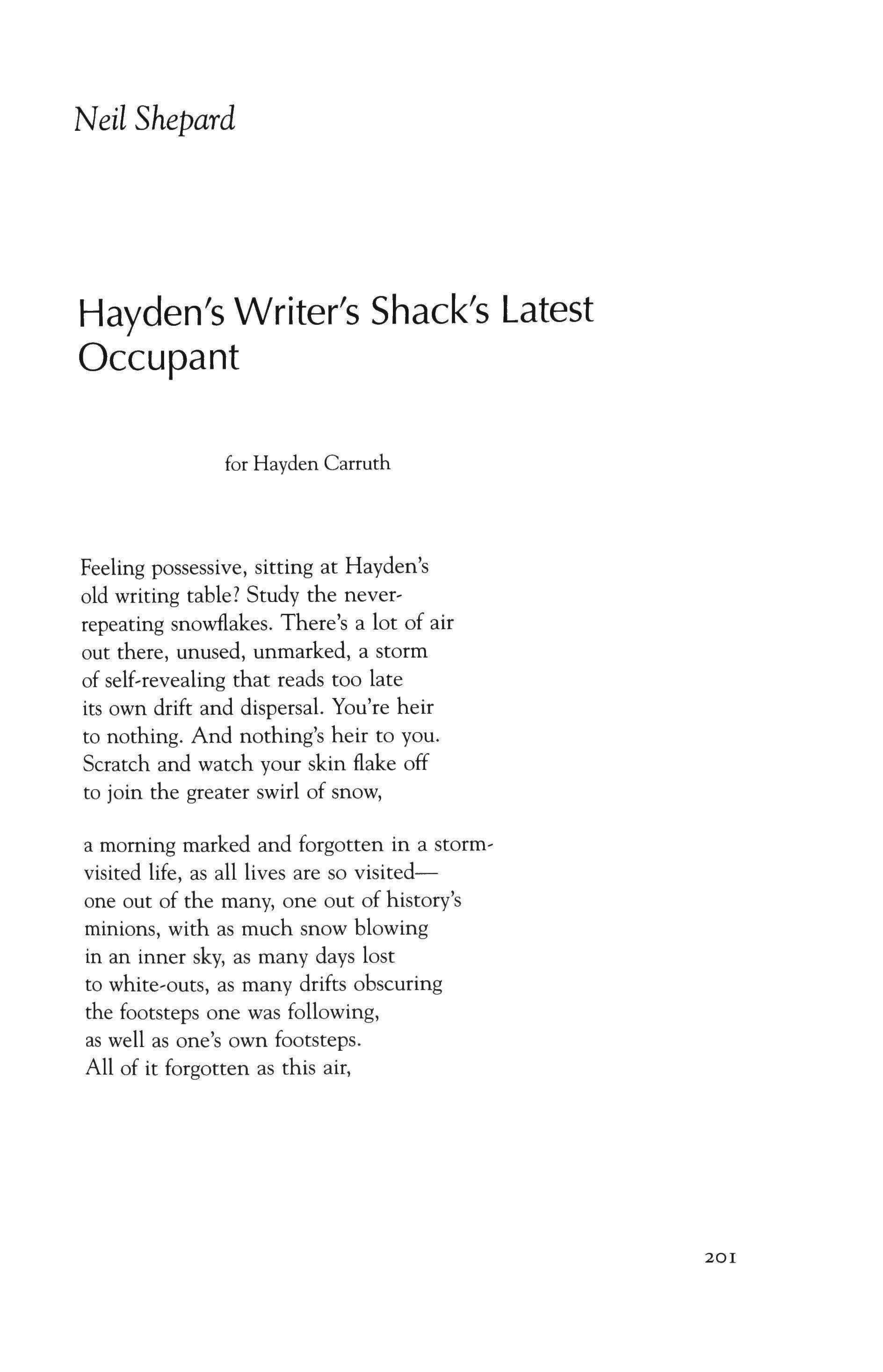
Feeling possessive, sitting at Hayden's old writing table? Study the neverrepeating snowflakes. There's a lot of air out there, unused, unmarked, a storm of self-revealing that reads too late its own drift and dispersal. You're heir to nothing. And nothing's heir to you. Scratch and watch your skin flake off to join the greater swirl of snow, a morning marked and forgotten in a stormvisited life, as all lives are so visitedone out of the many, one out of history's minions, with as much snow blowing in an inner sky, as many days lost to white-outs, as many drifts obscuring the footsteps one was following, as well as one's own footsteps. All of it forgotten as this air,
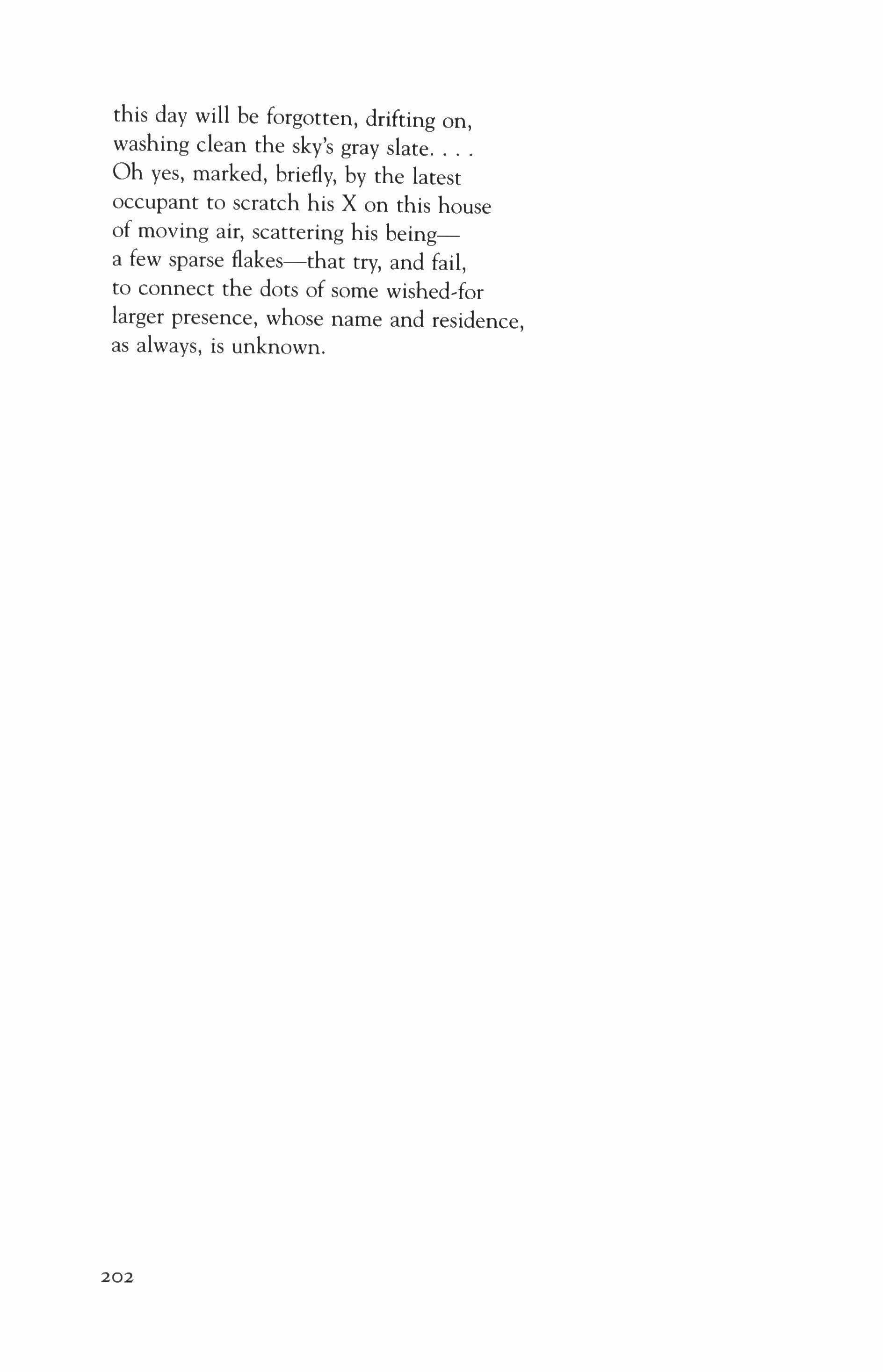
this day will be forgotten, drifting on, washing clean the sky's gray slate
Oh yes, marked, briefly, by the latest occupant to scratch his X on this house of moving air, scattering his beinga few sparse flakes-that try, and fail, to connect the dots of some wished-for larger presence, whose name and residence, as always, is unknown.

Dear Wanderer,
The beachcombers are in want of an elegy, and you are peddling starlight.
Where is the music in this?
The water is making its usual sound against the usual rocks, and the Golden Gate Bridge stands unswinging above its blue bath. The beachcombers have begun their slow-hipped pivot, stretching down for the solace of reaching.
I was mistaken.
The beach is an elegy for want and you, wanderer, have abandoned your stars which want for nothing but presence. At sunrise, willing to lapse back into the light of an oncoming day.
Call it The Breakers, The Headlandsthis strand of earth shaped by water is as derelict as the gulls. Their cries amended by wind into one stark tracing of a cry.
Call it simply vantage: the point of view into which Atlantis rises again in a different ocean.
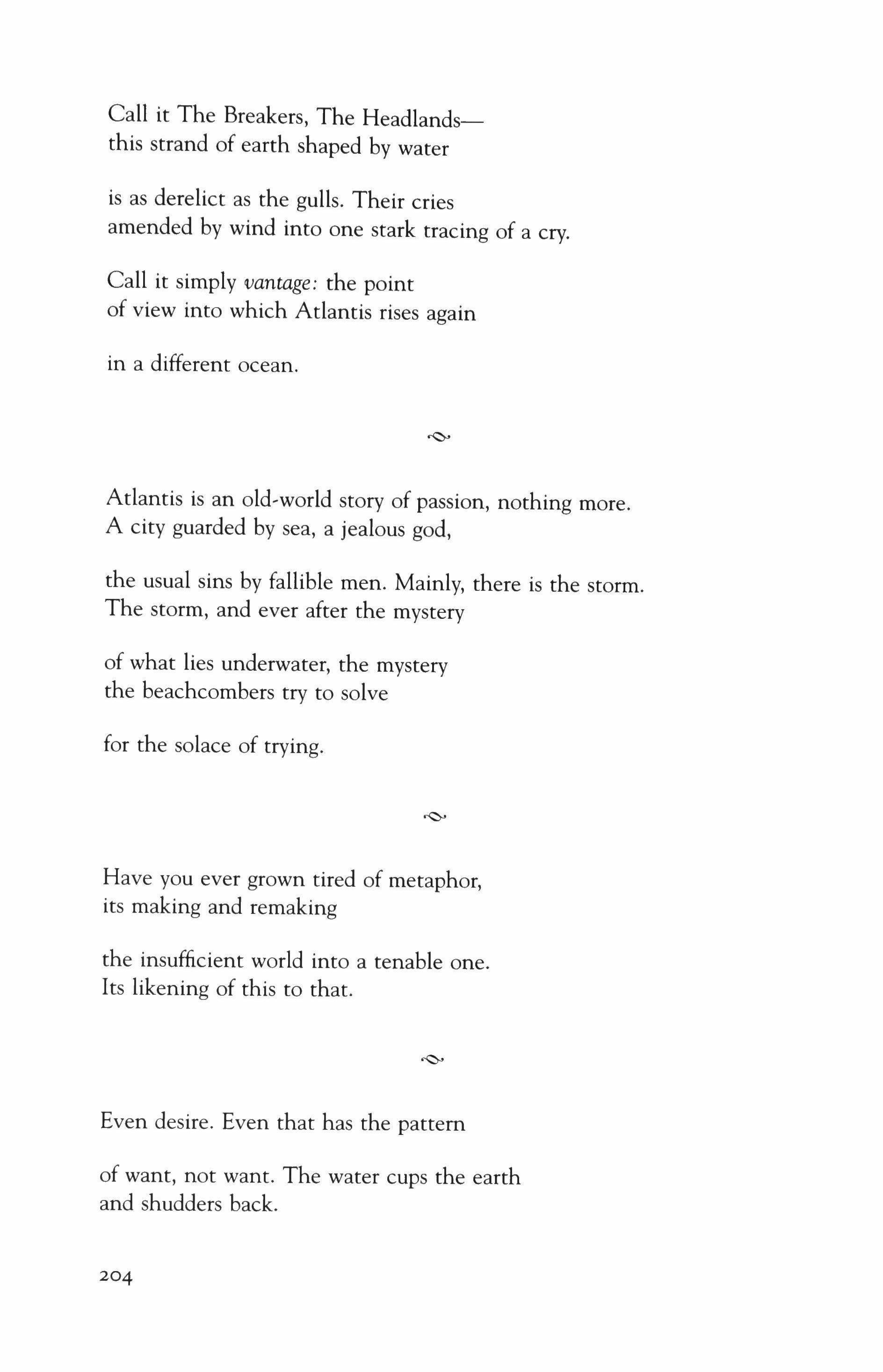
Atlantis is an old-world story of passion, nothing more. A city guarded by sea, a jealous god, the usual sins by fallible men. Mainly, there is the storm. The storm, and ever after the mystery of what lies underwater, the mystery the beachcombers try to solve for the solace of trying.
Have you ever grown tired of metaphor, its making and remaking the insufficient world into a tenable one. Its likening of this to that.
Even desire. Even that has the pattern of want, not want. The water cups the earth and shudders back.
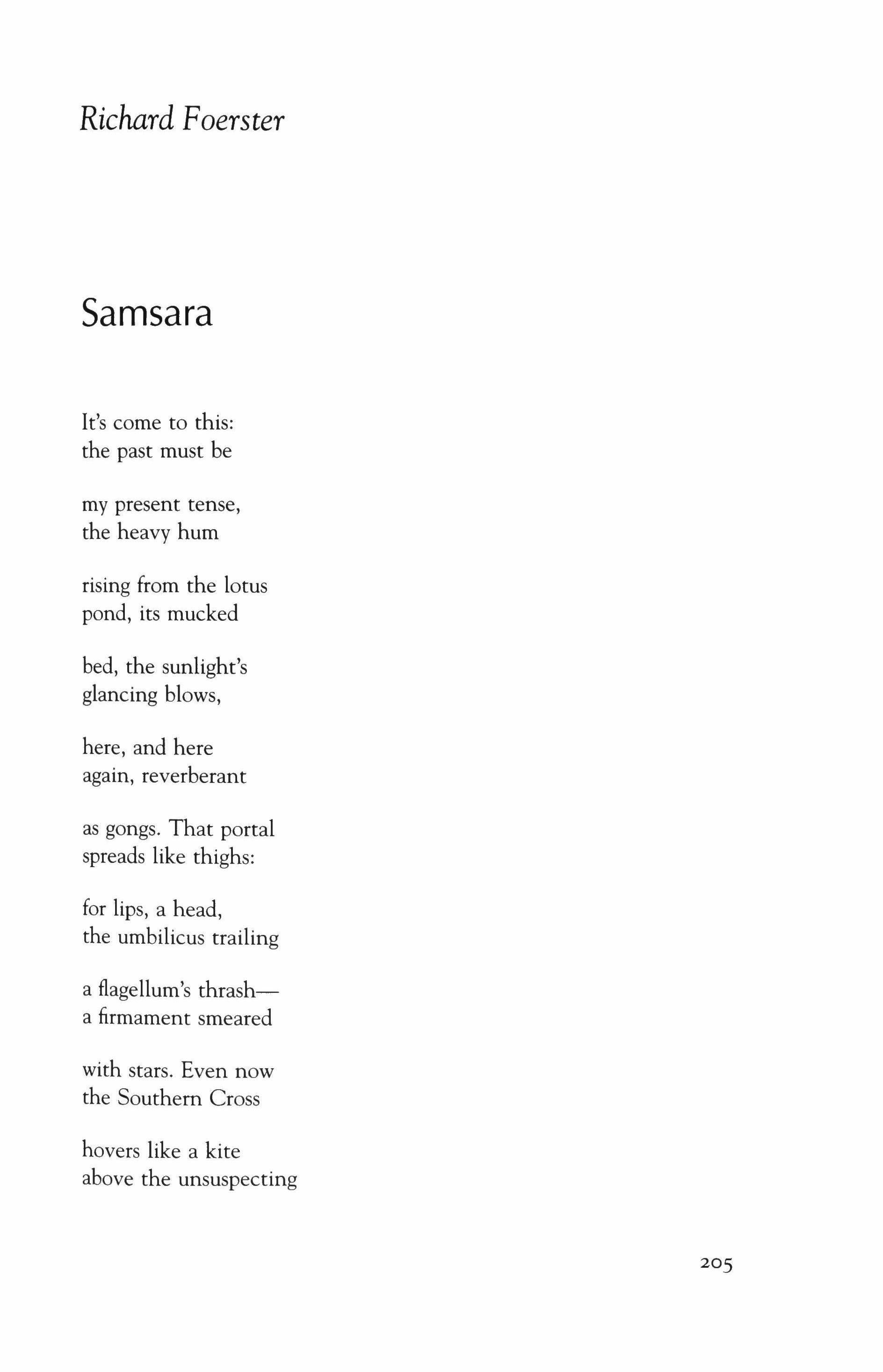
It's come to this: the past must be my present tense, the heavy hum
rising from the lotus pond, its mucked
bed, the sunlight's glancing blows, here, and here again, reverberant as gongs. That portal spreads like thighs: for lips, a head, the umbilicus trailing a flagellum's thrasha firmament smeared with stars. Even now the Southern Cross hovers like a kite above the unsuspecting

day. That wheel, that gap on which it soars, what light penetrates
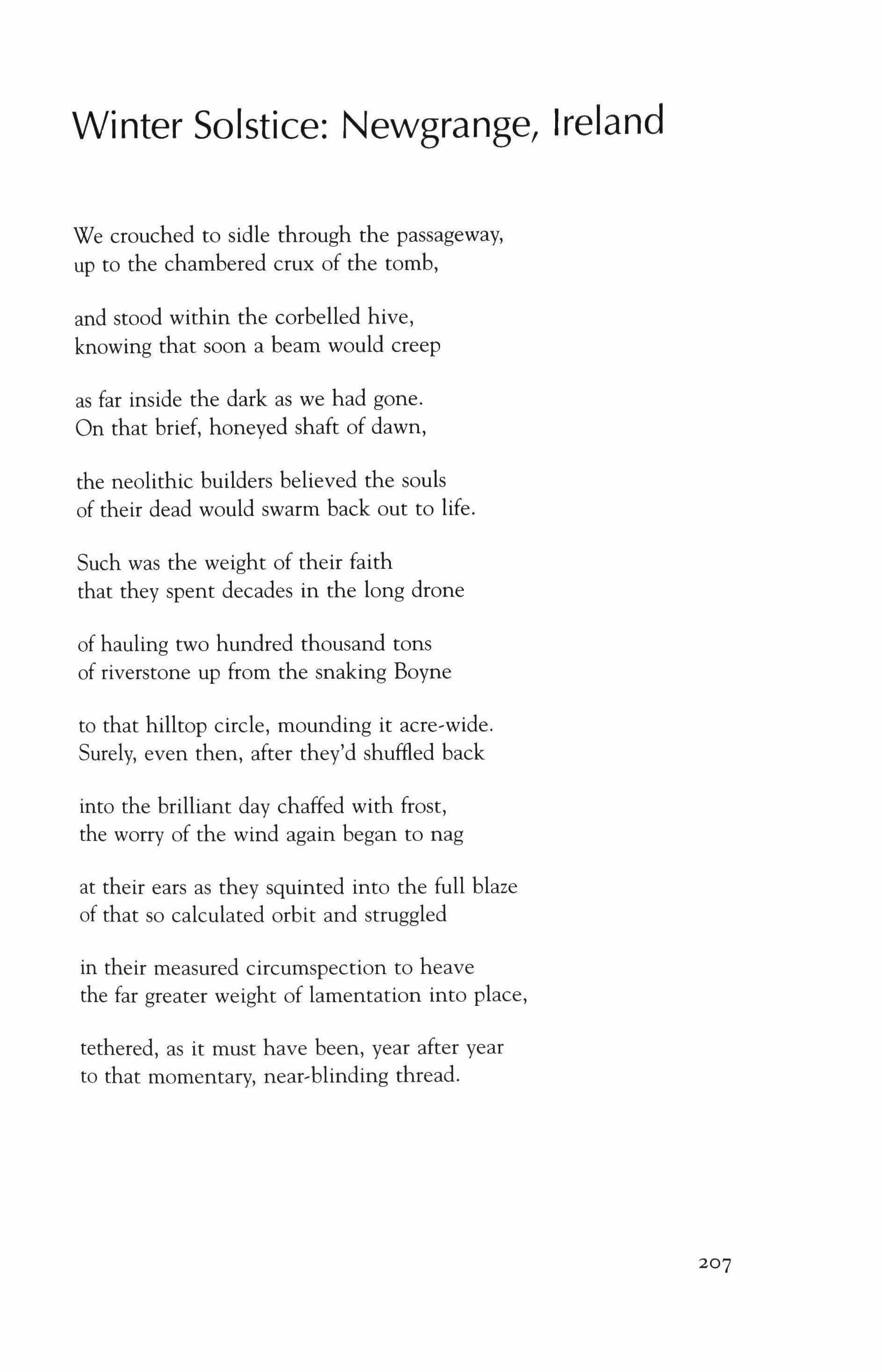
We crouched to sidle through the passageway, up to the chambered crux of the tomb, and stood within the corbelled hive, knowing that soon a beam would creep as far inside the dark as we had gone. On that brief, honeyed shaft of dawn, the neolithic builders believed the souls of their dead would swarm back out to life.
Such was the weight of their faith that they spent decades in the long drone of hauling two hundred thousand tons of riverstone up from the snaking Boyne to that hilltop circle, mounding it acre-wide. Surely, even then, after they'd shuffled back into the brilliant day chaffed with frost, the worry of the wind again began to nag at their ears as they squinted into the full blaze of that so calculated orbit and struggled in their measured circumspection to heave the far greater weight of lamentation into place, tethered, as it must have been, year after year to that momentary, near-blinding thread.
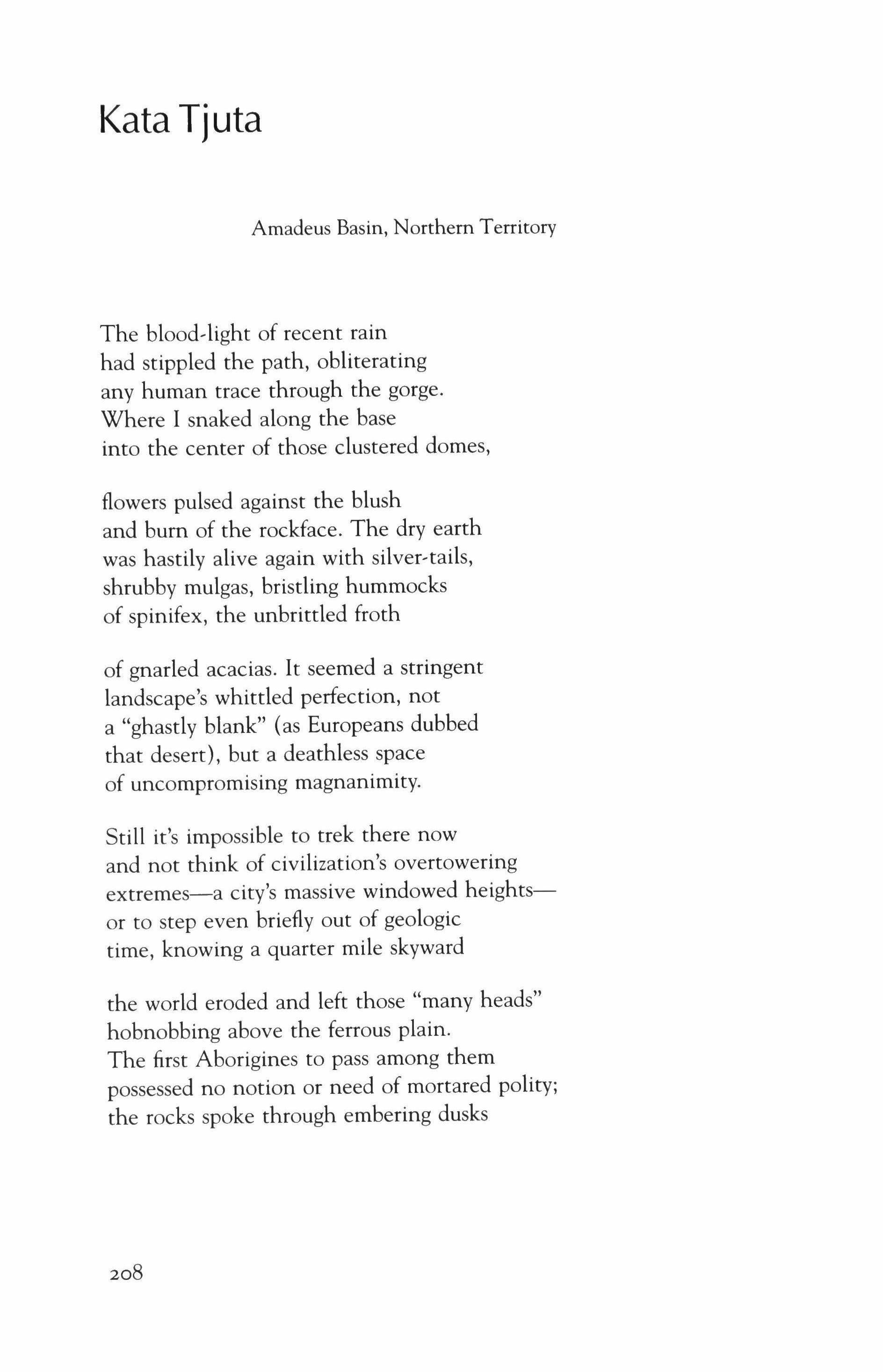
The blood-light of recent rain had stippled the path, obliterating any human trace through the gorge. Where I snaked along the base into the center of those clustered domes, flowers pulsed against the blush and bum of the rockface. The dry earth was hastily alive again with silver-tails, shrubby mulgas, bristling hummocks of spinifex, the unbrittled froth of gnarled acacias. It seemed a stringent landscape's whittled perfection, not a "ghastly blank" (as Europeans dubbed that desert), but a deathless space of uncompromising magnanimity.
Still it's impossible to trek there now and not think of civilization's overtowering extremes-a city's massive windowed heightsor to step even briefly out of geologic time, knowing a quarter mile skyward the world eroded and left those "many heads" hobnobbing above the ferrous plain. The first Aborigines to pass among them possessed no notion or need of mortared polity; the rocks spoke through embering dusks

in languages preutterant as wind till stories spilled like runnels from the summits down to lustering pools and told how here creation dreamt itself into being. Who wouldn't want to see the gods in everything,
to stammer through that visual syntax time and again like a liturgy for the living and the dead, and read in the soil's tiniest quickenings, in the slow accretion or seismic upheaval of our days a cartography of the soul?
To want to hold onto any swift-perishing grace.-That day I glimpsed a peregrine as it tore through the gorge. That fast, then gone. In the wake of its scree, I craned toward emptiness, into savaged blue,
waiting, while all around me the furrowed slopes slid gently into flame. Minutes, more, I stood as if eye to eye, consumed-so dazzling was the world's annihilating glance-till finally I doubled back along the ruined trail,
where my earlier boot,prints now brimmed with shadows. And so we shoulder what little history we have, like an aged parent through burning streets, with love's small store packed in a rucksack alongside our bearable
load of sorrows. Isn't this all the myth we need for the journey out into the inevitable, unsheltering dark?-not so much to relive the momentary arc above the heart's red center, the wounding absence of that raptor-split sky,
but to bless somehow the plod through each day's exile and return, the meandering path, the thin scar we blindly finger through the night, whereby we trace at last our only healing.
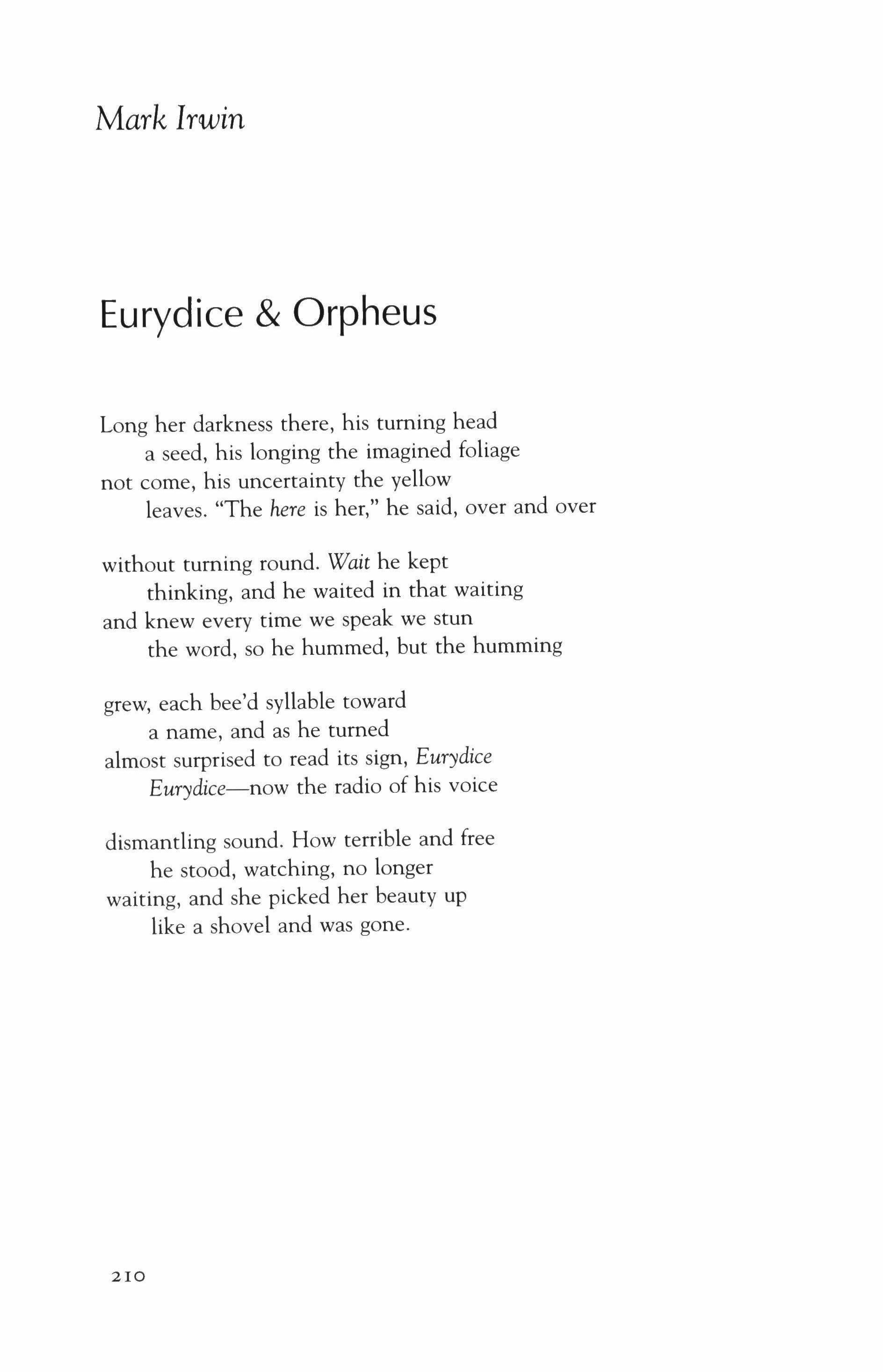
Long her darkness there, his turning head a seed, his longing the imagined foliage not come, his uncertainty the yellow leaves. "The here is her," he said, over and over without turning round. Wait he kept thinking, and he waited in that waiting and knew every time we speak we stun the word, so he hummed, but the humming grew, each bee'd syllable toward a name, and as he turned almost surprised to read its sign, Eurydice Eurydice-now the radio of his voice dismantling sound. How terrible and free he stood, watching, no longer waiting, and she picked her beauty up like a shovel and was gone.
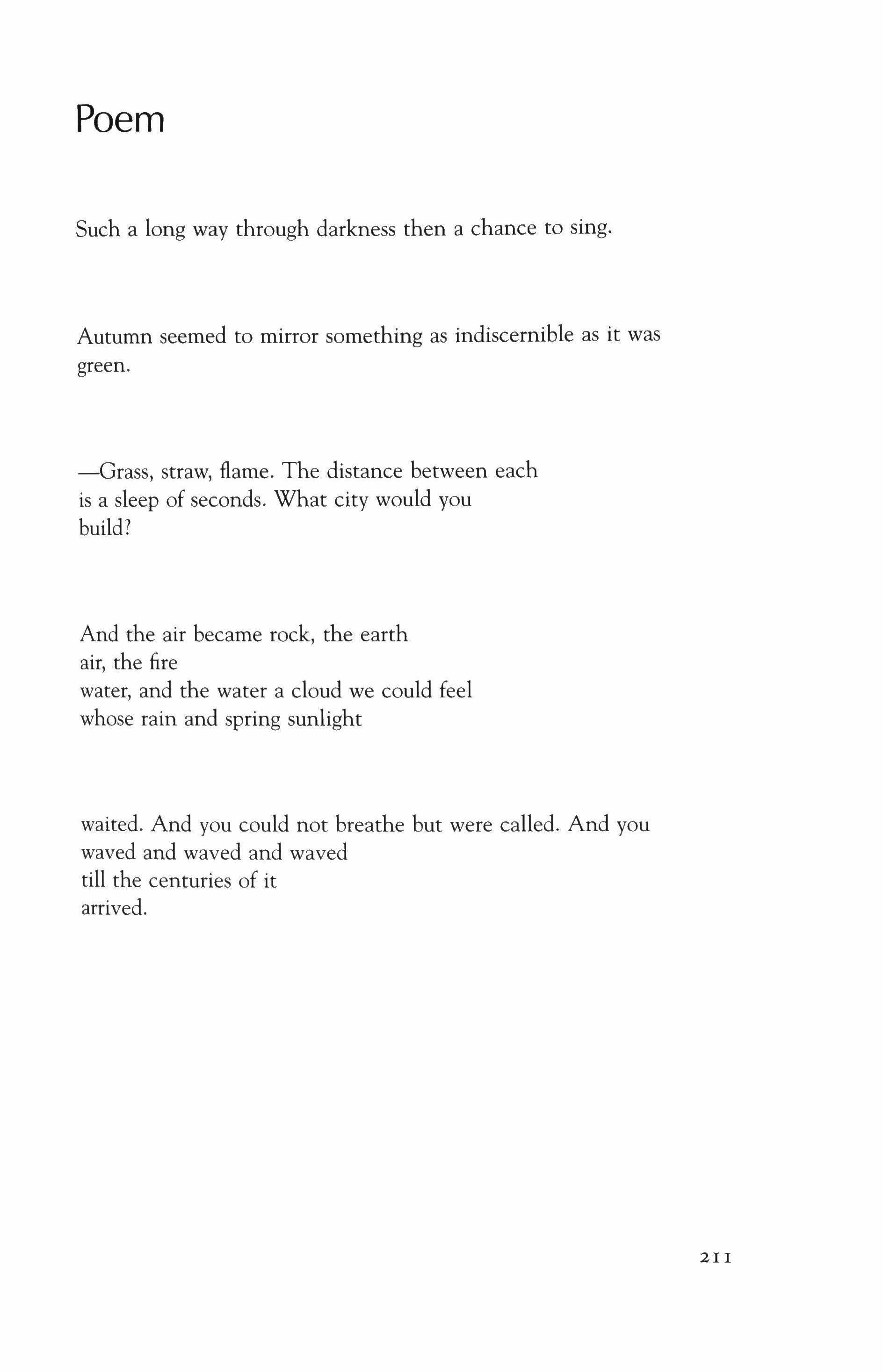
Such a long way through darkness then a chance to sing. Autumn seemed to mirror something as indiscernible as it was green. -Grass, straw, flame. The distance between each is a sleep of seconds. What city would you build?
And the air became rock, the earth air, the fire water, and the water a cloud we could feel whose rain and spring sunlight waited. And you could not breathe but were called. And you waved and waved and waved till the centuries of it arrived.
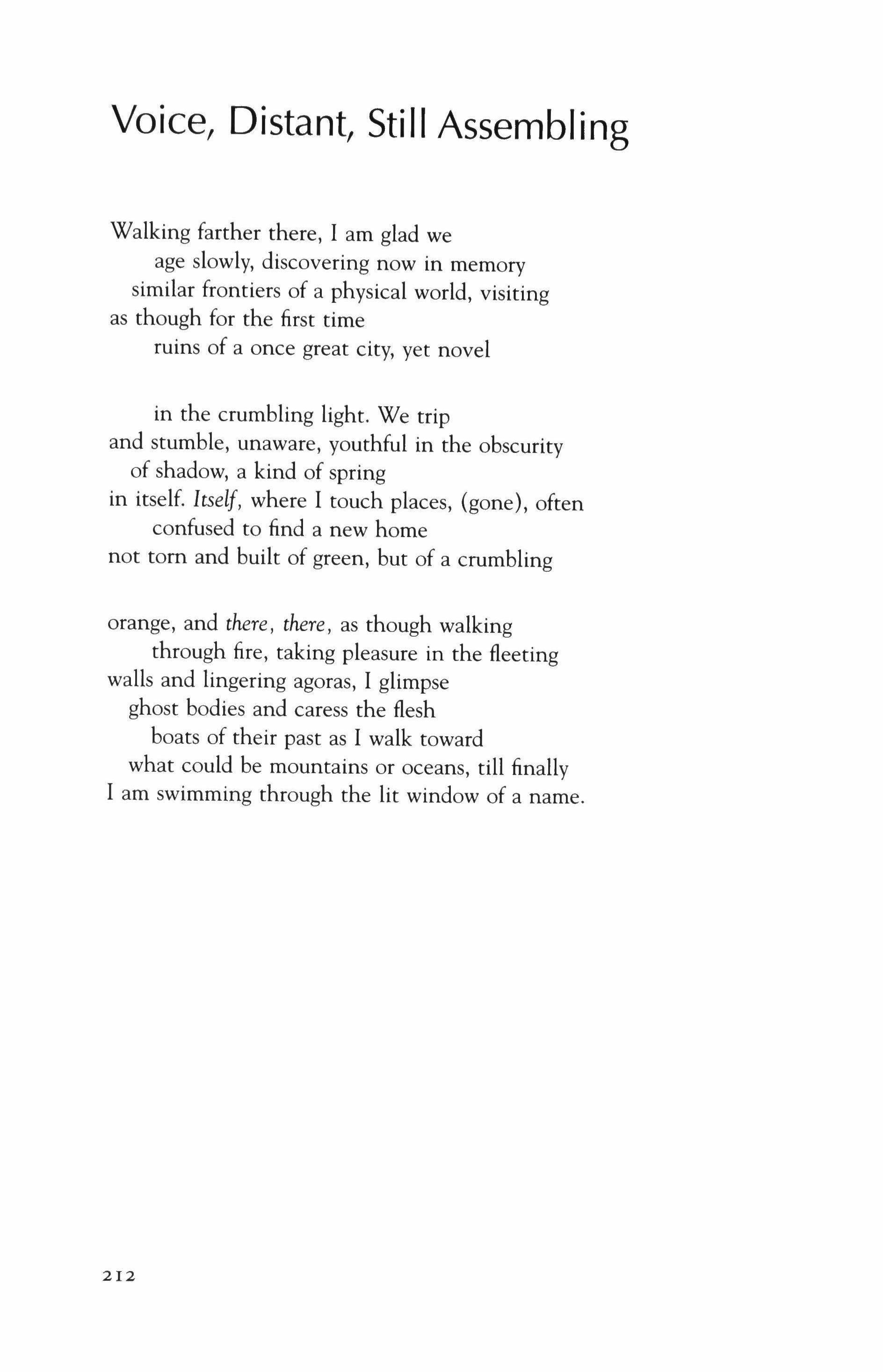
Walking farther there, I am glad we age slowly, discovering now in memory similar frontiers of a physical world, visiting as though for the first time ruins of a once great city, yet novel
in the crumbling light. We trip and stumble, unaware, youthful in the obscurity of shadow, a kind of spring in itself. Itself, where I touch places, (gone), often confused to find a new home not tom and built of green, but of a crumbling orange, and there, there, as though walking through fire, taking pleasure in the fleeting walls and lingering agoras, I glimpse ghost bodies and caress the flesh boats of their past as I walk toward what could be mountains or oceans, till finally I am swimming through the lit window of a name.
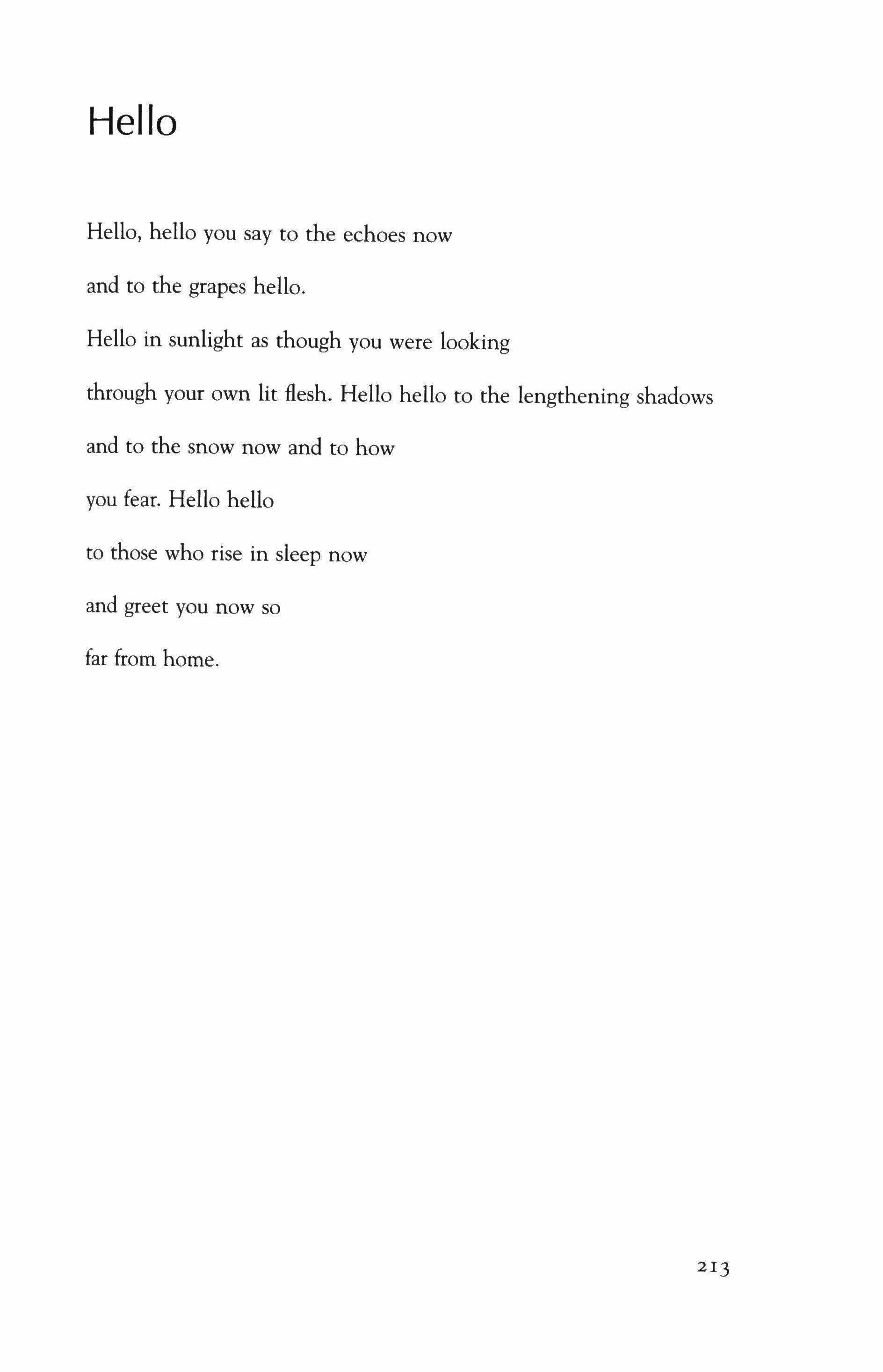
Hello, hello you say to the echoes now and to the grapes hello. Hello in sunlight as though you were looking through your own lit flesh. Hello hello to the lengthening shadows and to the snow now and to how you fear. Hello hello to those who rise in sleep now and greet you now so far from home.

Translated from the Polish by Joanna Trzeciak
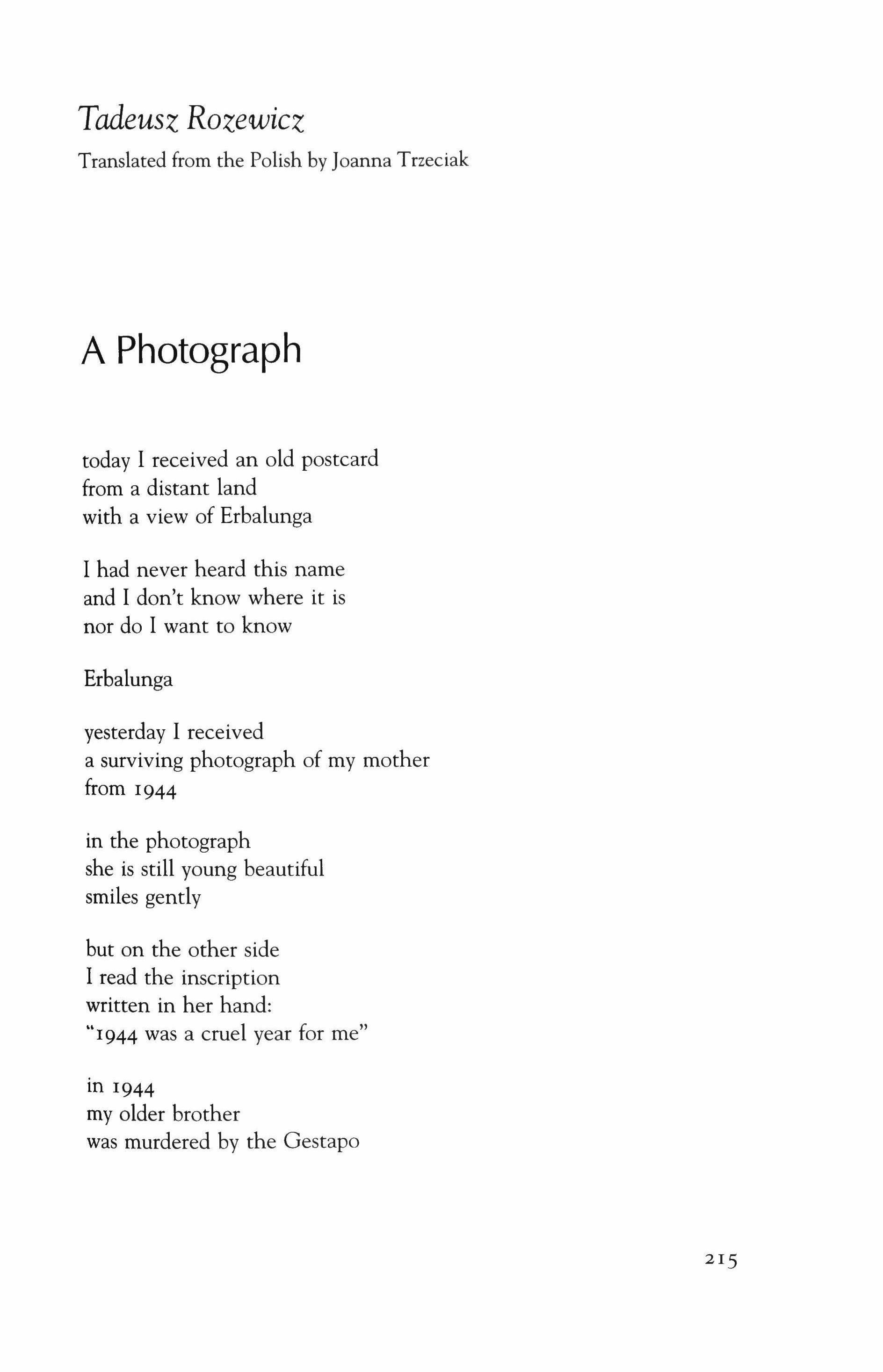
today I received an old postcard from a distant land with a view of Erbalunga
I had never heard this name and I don't know where it is nor do I want to know
Erbalunga
yesterday I received a surviving photograph of my mother from 1944 in the photograph she is still young beautiful smiles gently but on the other side I read the inscription written in her hand: "1944 was a cruel year for me" in 1944 my older brother was murdered by the Gestapo

we hid his death from mother but she saw through us and hid it from us
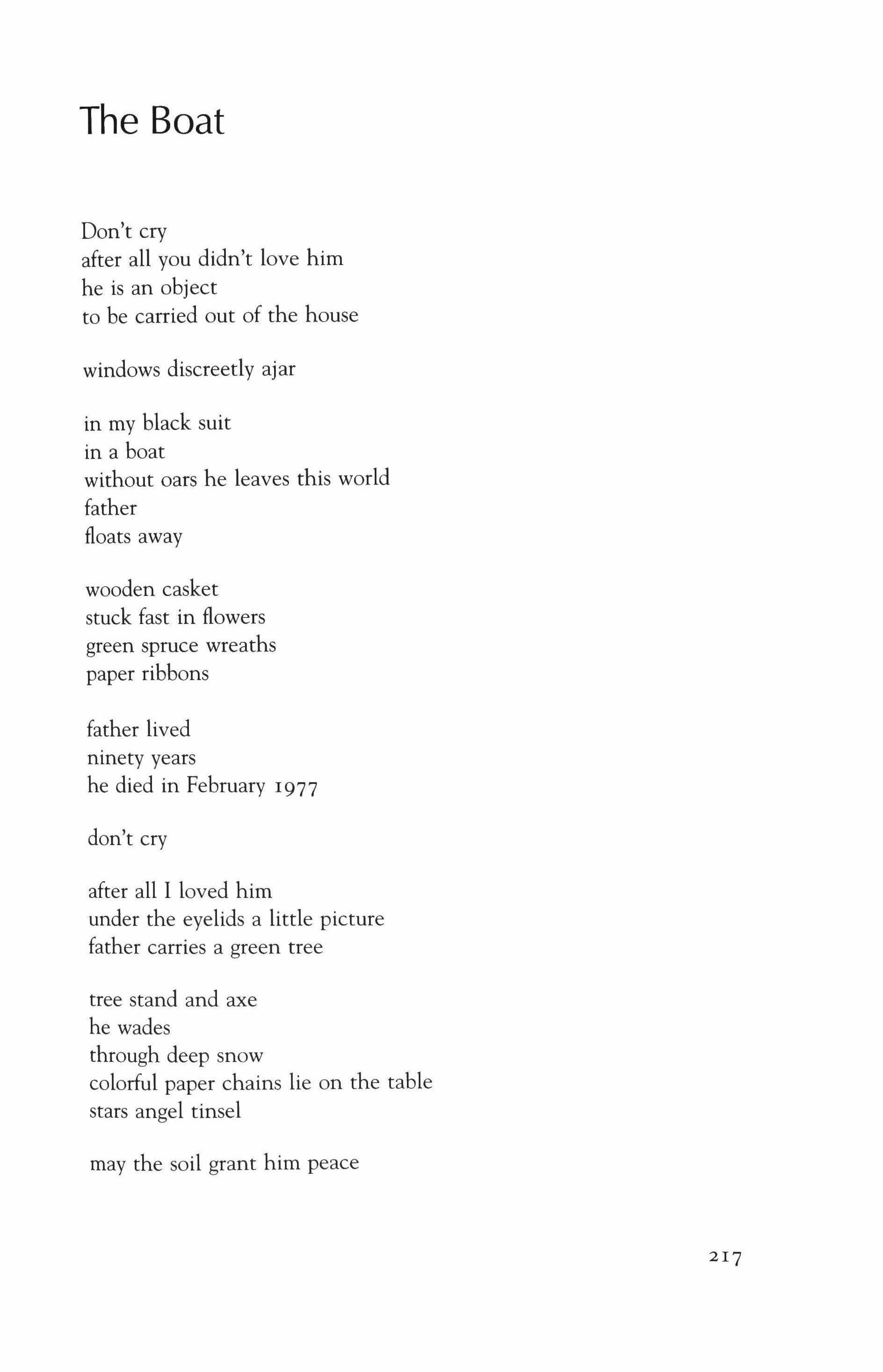
Don't cry after all you didn't love him he is an object to be carried out of the house
windows discreetly ajar in my black suit in a boat without oars he leaves this world father floats away
wooden casket stuck fast in flowers green spruce wreaths paper ribbons
father lived ninety years he died in February 1977
don't cry after all I loved him under the eyelids a little picture father carries a green tree
tree stand and axe he wades through deep snow colorful paper chains lie on the table stars angel tinsel
may the soil grant him peace
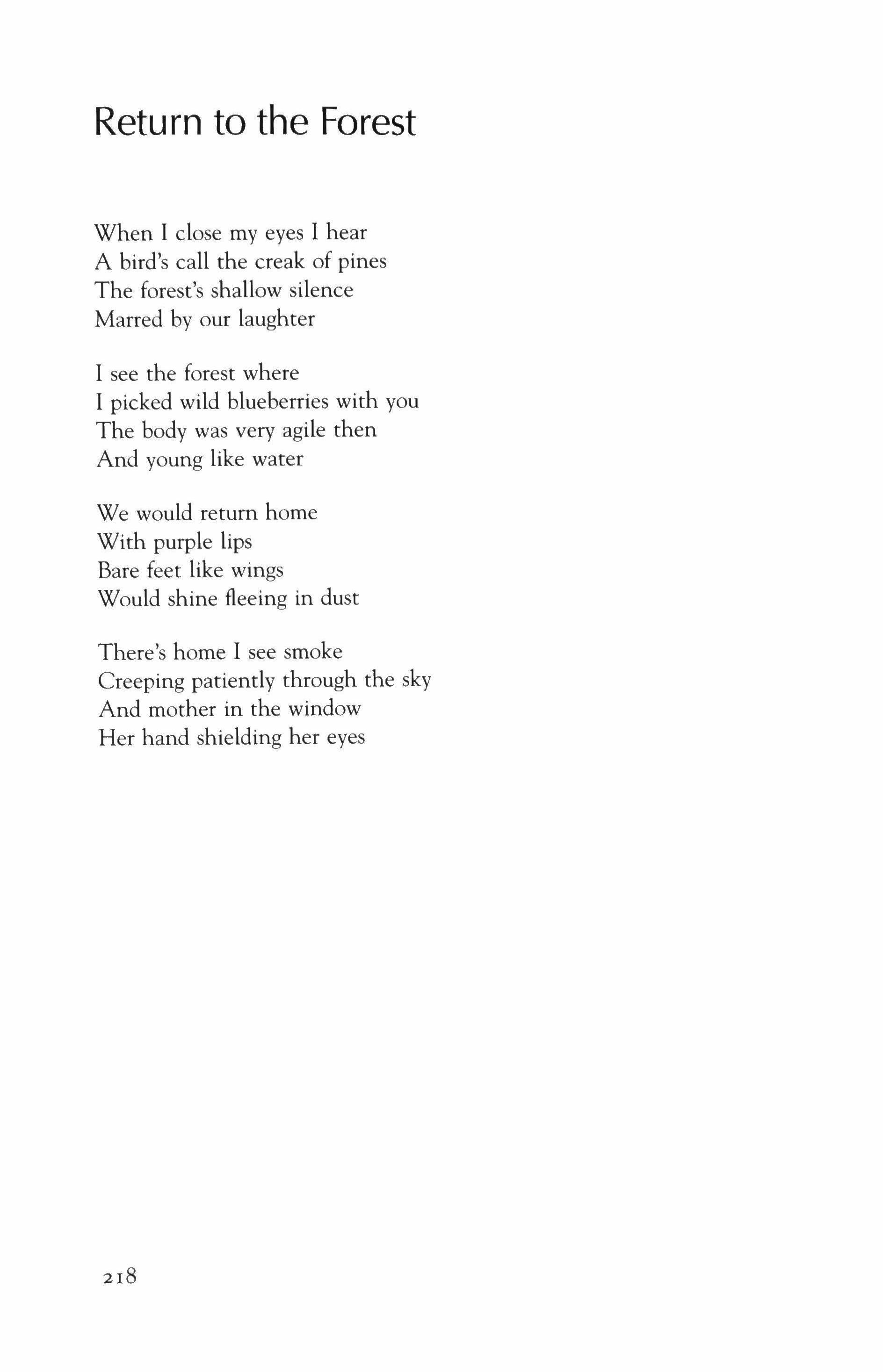
When I close my eyes I hear
A bird's call the creak of pines
The forest's shallow silence
Marred by our laughter
I see the forest where
I picked wild blueberries with you
The body was very agile then
And young like water
We would return home
With purple lips
Bare feet like wings
Would shine fleeing in dust
There's home I see smoke
Creeping patiently through the sky
And mother in the window
Her hand shielding her eyes
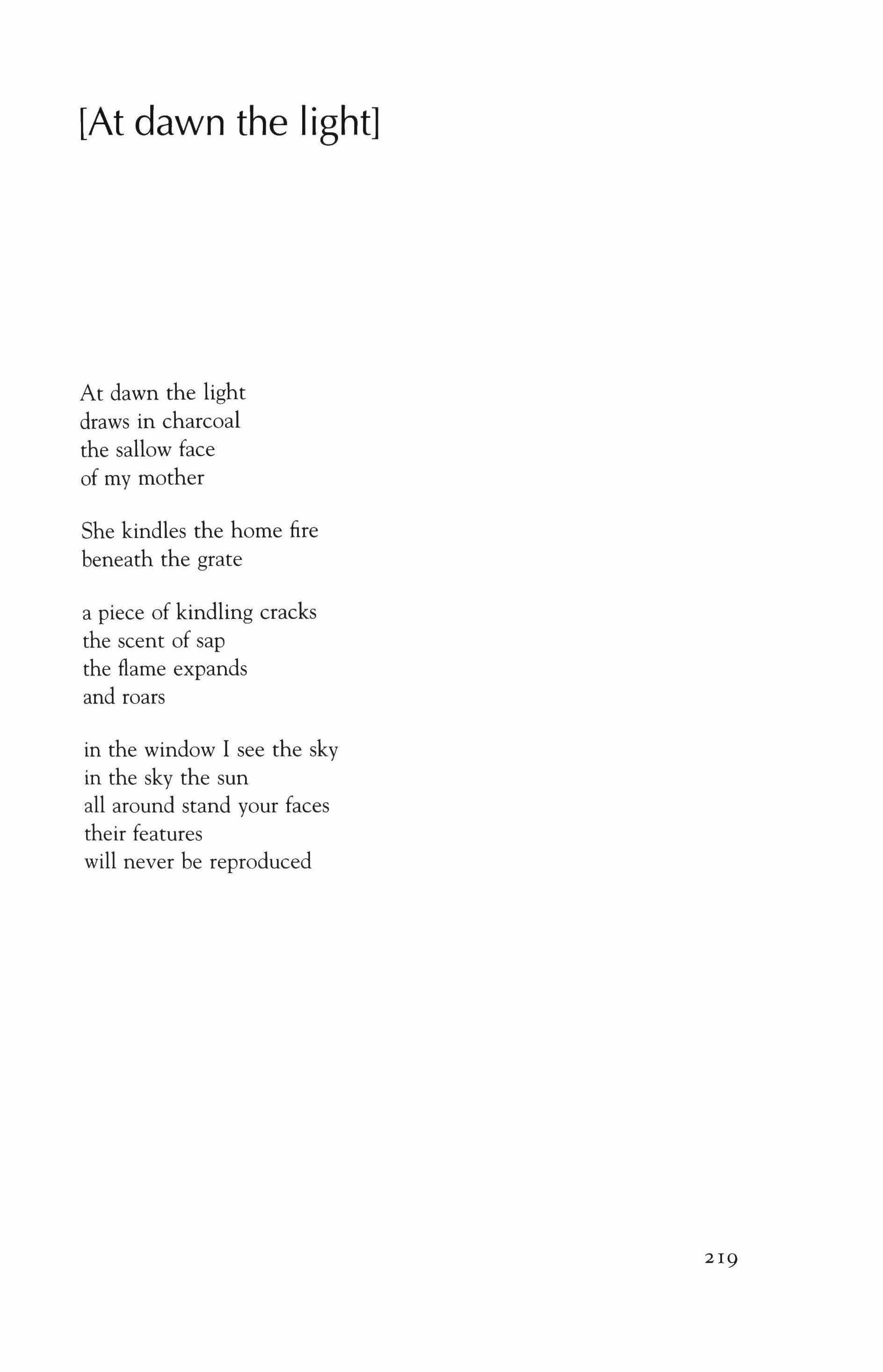
At dawn the light draws in charcoal the sallow face of my mother
She kindles the home fire beneath the grate a piece of kindling cracks the scent of sap the flame expands and roars
in the window I see the sky in the sky the sun all around stand your faces their features will never be reproduced

But whoever sees my mother in a gray'blue smock in a white hospital shaking stiffening wooden smile white gums
She a believer of fifty years now weeps saying: "I don't know I don't know" her face is one big murky tear she clasps her yellow hands like a frightened girl her lips are blue but whoever sees my mother a frightened animal with bulging eye may he oh I would like to carry her near my heart and feed her only sweetness.
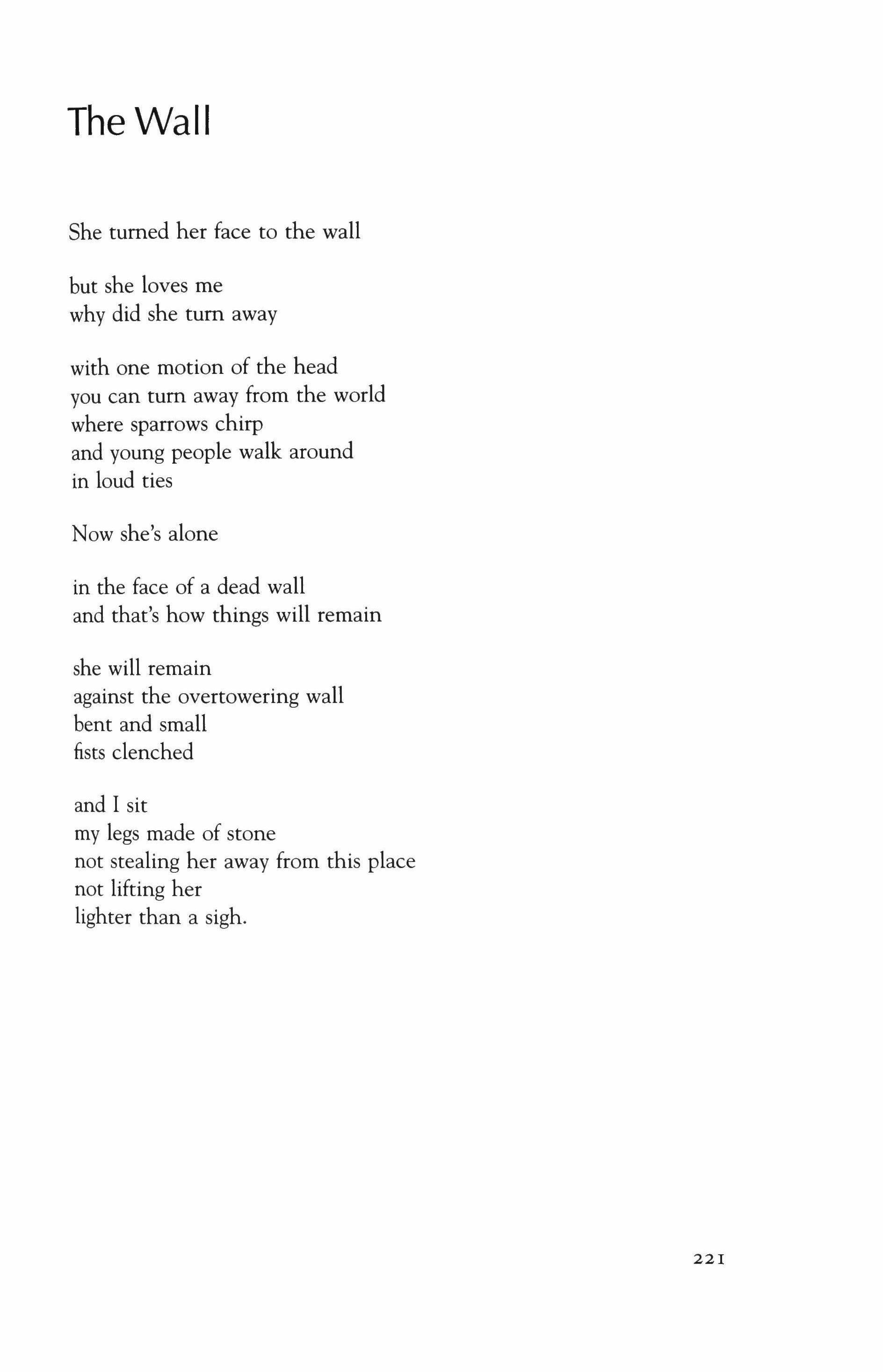
She turned her face to the wall
but she loves me why did she tum away with one motion of the head you can tum away from the world where sparrows chirp and young people walk around in loud ties
Now she's alone in the face of a dead wall and that's how things will remain she will remain against the overtowering wall bent and small fists clenched and I sit my legs made of stone not stealing her away from this place not lifting her lighter than a sigh.
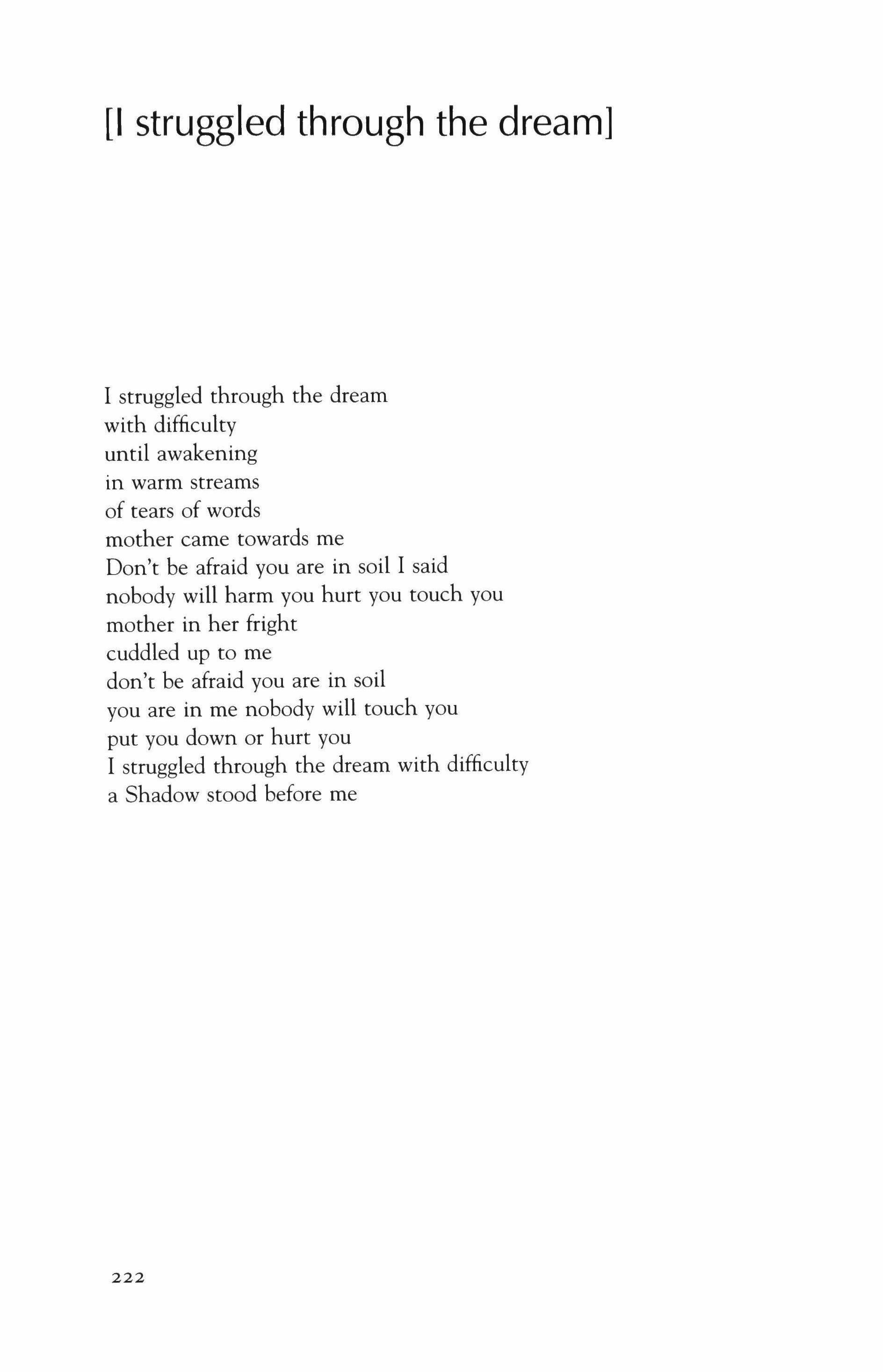
I struggled through the dream with difficulty until awakening in warm streams of tears of words mother came towards me Don't be afraid you are in soil I said nobody will harm you hurt you touch you mother in her fright cuddled up to me don't be afraid you are in soil you are in me nobody will touch you put you down or hurt you I struggled through the dream with difficulty a Shadow stood before me
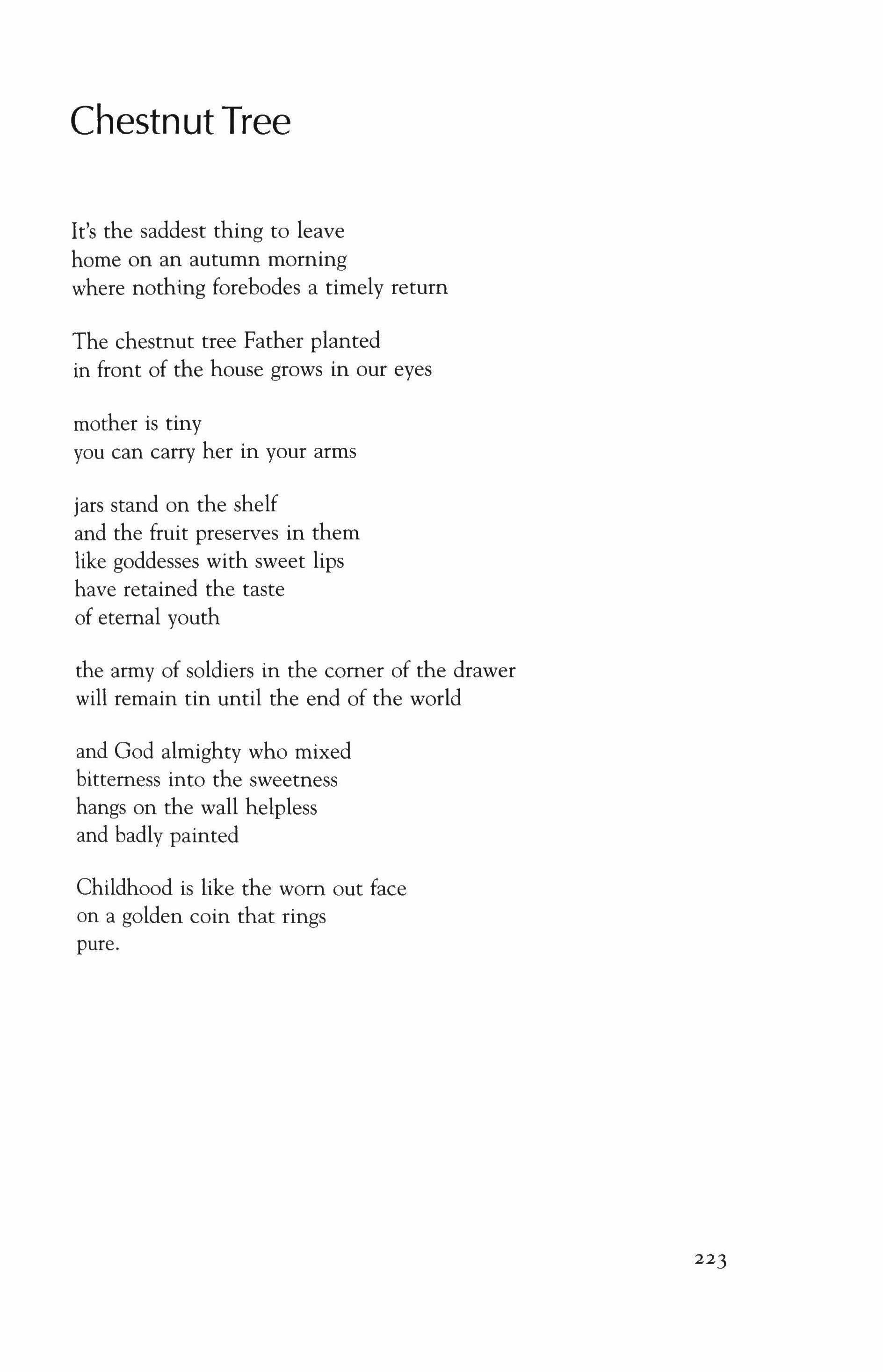
It's the saddest thing to leave home on an autumn morning where nothing forebodes a timely return
The chestnut tree Father planted in front of the house grows in our eyes
mother is tiny you can carry her in your arms
jars stand on the shelf and the fruit preserves in them like goddesses with sweet lips have retained the taste of eternal youth
the army of soldiers in the corner of the drawer will remain tin until the end of the world and God almighty who mixed bitterness into the sweetness hangs on the wall helpless and badly painted
Childhood is like the worn out face on a golden coin that rings pure.

In fall the earth closes down but the bodies of children shoot up. These children run naked into the early morning chill screaming with delight. They find things that crawl, things that have fallen into their laps, and sculpt little bowls out of mud on the picnic table. They collect maple leaves for school projects. They rip open chrysanthemum buds, smell the mint leaves they grind up between rocks. They swing from tires hanging from thick oak branches. They marvel at dusk, at anything that is potentially containable, anything that interrupts.
The body of the girl who lives in the gray farmhouse is shooting up, is badly in need of school clothes, but the mother hasn't a sense for or the money to buy them, and so the girl goes without. Seams are split, threads trail. The mother cuts these off-no sense letting the girl go ratty-but they come back again, appear again like dust. And dust, resented for its ubiquity, becomes an analogy in the mother's mind for the existence of the girl. This feeling creeps up on the mother; she is surprised and afraid of it and ignores it when possible.
When November eats away at the ends of daylight, the father decides that life should be offering him more tantalizing opportunities. The mother thinks there is no telling what the fantasy of this insolent and intrinsically lazy man could be. But there it is. He and the mother bicker well into an unusually warm evening, right in front of the girl, as if every nuance and inflection is not being absorbed by her, and then he is gone.
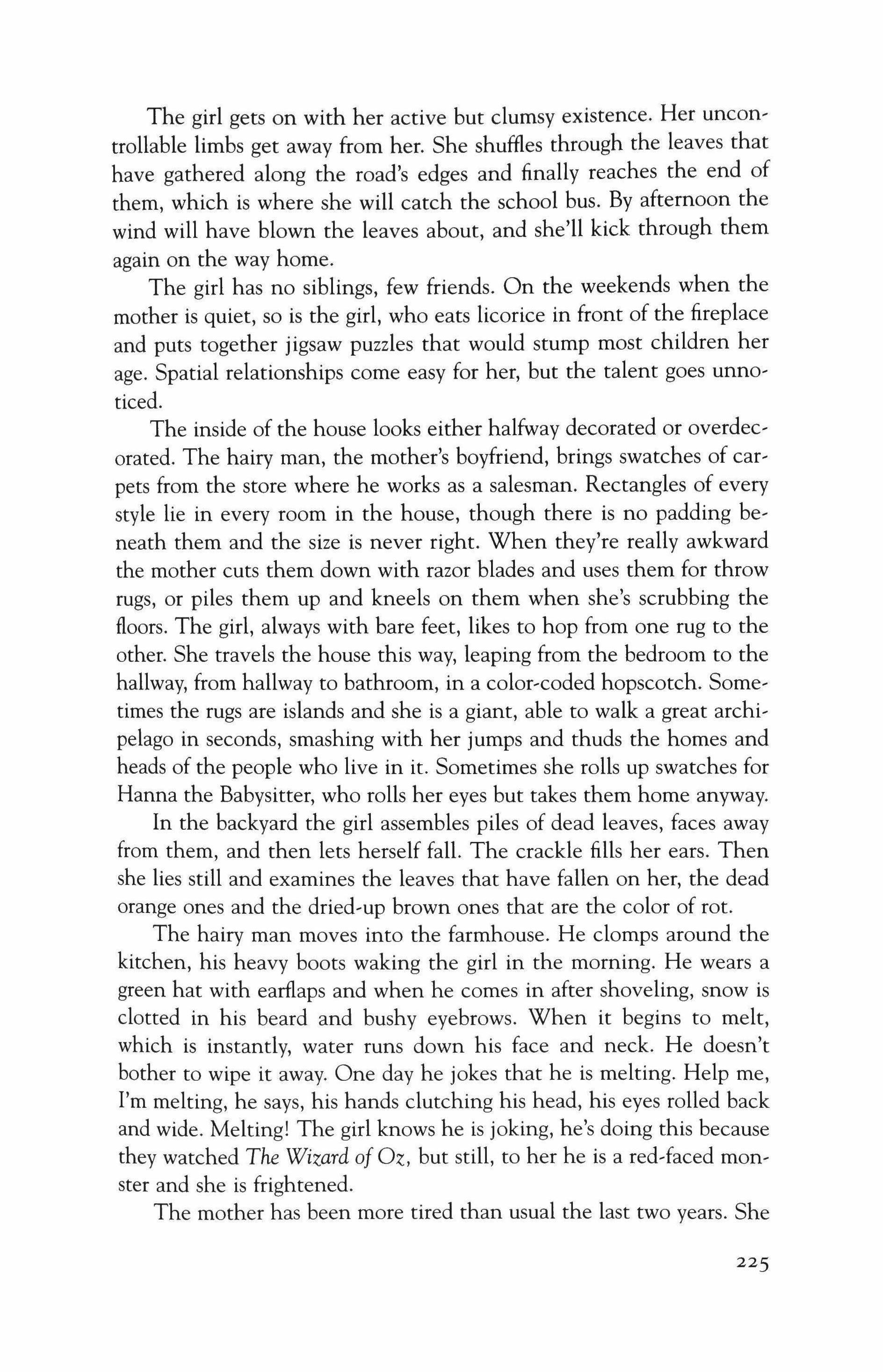
The girl gets on with her active but clumsy existence. Her uncontrollable limbs get away from her. She shuffles through the leaves that have gathered along the road's edges and finally reaches the end of them, which is where she will catch the school bus. By afternoon the wind will have blown the leaves about, and she'll kick through them again on the way home.
The girl has no siblings, few friends. On the weekends when the mother is quiet, so is the girl, who eats licorice in front of the fireplace and puts together jigsaw puzzles that would stump most children her age. Spatial relationships come easy for her, but the talent goes unnoticed.
The inside of the house looks either halfway decorated or overdecorated. The hairy man, the mother's boyfriend, brings swatches of carpets from the store where he works as a salesman. Rectangles of every style lie in every room in the house, though there is no padding beneath them and the size is never right. When they're really awkward the mother cuts them down with razor blades and uses them for throw rugs, or piles them up and kneels on them when she's scrubbing the floors. The girl, always with bare feet, likes to hop from one rug to the other. She travels the house this way, leaping from the bedroom to the hallway, from hallway to bathroom, in a color-coded hopscotch. Sometimes the rugs are islands and she is a giant, able to walk a great archipelago in seconds, smashing with her jumps and thuds the homes and heads of the people who live in it. Sometimes she rolls up swatches for Hanna the Babysitter, who rolls her eyes but takes them home anyway.
In the backyard the girl assembles piles of dead leaves, faces away from them, and then lets herself fall. The crackle fills her ears. Then she lies still and examines the leaves that have fallen on her, the dead orange ones and the dried-up brown ones that are the color of rot.
The hairy man moves into the farmhouse. He clomps around the kitchen, his heavy boots waking the girl in the morning. He wears a green hat with earflaps and when he comes in after shoveling, snow is clotted in his beard and bushy eyebrows. When it begins to melt, which is instantly, water runs down his face and neck. He doesn't bother to wipe it away. One day he jokes that he is melting. Help me, I'm melting, he says, his hands clutching his head, his eyes rolled back and wide. Melting! The girl knows he is joking, he's doing this because they watched The Wizard of Oz, but still, to her he is a red-faced monster and she is frightened.
The mother has been more tired than usual the last two years. She
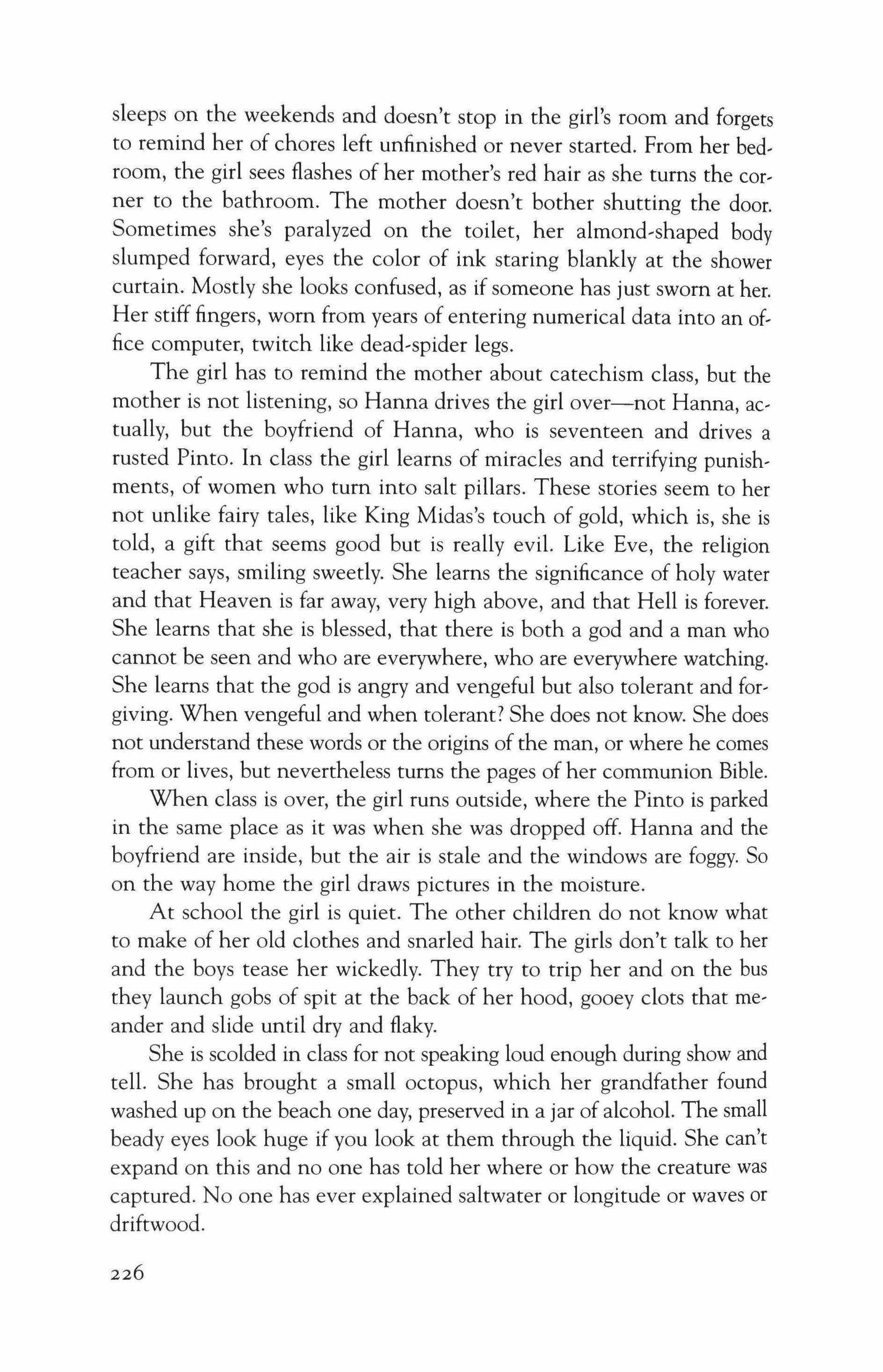
sleeps on the weekends and doesn't stop in the girl's room and forgets to remind her of chores left unfinished or never started. From her bedroom, the girl sees flashes of her mother's red hair as she turns the corner to the bathroom. The mother doesn't bother shutting the door. Sometimes she's paralyzed on the toilet, her almond-shaped body slumped forward, eyes the color of ink staring blankly at the shower curtain. Mostly she looks confused, as if someone has just sworn at her. Her stiff fingers, worn from years of entering numerical data into an office computer, twitch like dead-spider legs.
The girl has to remind the mother about catechism class, but the mother is not listening, so Hanna drives the girl over-not Hanna, actually, but the boyfriend of Hanna, who is seventeen and drives a rusted Pinto. In class the girl learns of miracles and terrifying punishments, of women who turn into salt pillars. These stories seem to her not unlike fairy tales, like King Midas's touch of gold, which is, she is told, a gift that seems good but is really evil. Like Eve, the religion teacher says, smiling sweetly. She learns the significance of holy water and that Heaven is far away, very high above, and that Hell is forever. She learns that she is blessed, that there is both a god and a man who cannot be seen and who are everywhere, who are everywhere watching. She learns that the god is angry and vengeful but also tolerant and forgiving. When vengeful and when tolerant? She does not know. She does not understand these words or the origins of the man, or where he comes from or lives, but nevertheless turns the pages of her communion Bible.
When class is over, the girl runs outside, where the Pinto is parked in the same place as it was when she was dropped off. Hanna and the boyfriend are inside, but the air is stale and the windows are foggy. So on the way home the girl draws pictures in the moisture.
At school the girl is quiet. The other children do not know what to make of her old clothes and snarled hair. The girls don't talk to her and the boys tease her wickedly. They try to trip her and on the bus they launch gobs of spit at the back of her hood, gooey clots that meander and slide until dry and flaky.
She is scolded in class for not speaking loud enough during show and tell. She has brought a small octopus, which her grandfather found washed up on the beach one day, preserved in a jar of alcohol. The small beady eyes look huge if you look at them through the liquid. She can't expand on this and no one has told her where or how the creature was captured. No one has ever explained saltwater or longitude or waves or driftwood.
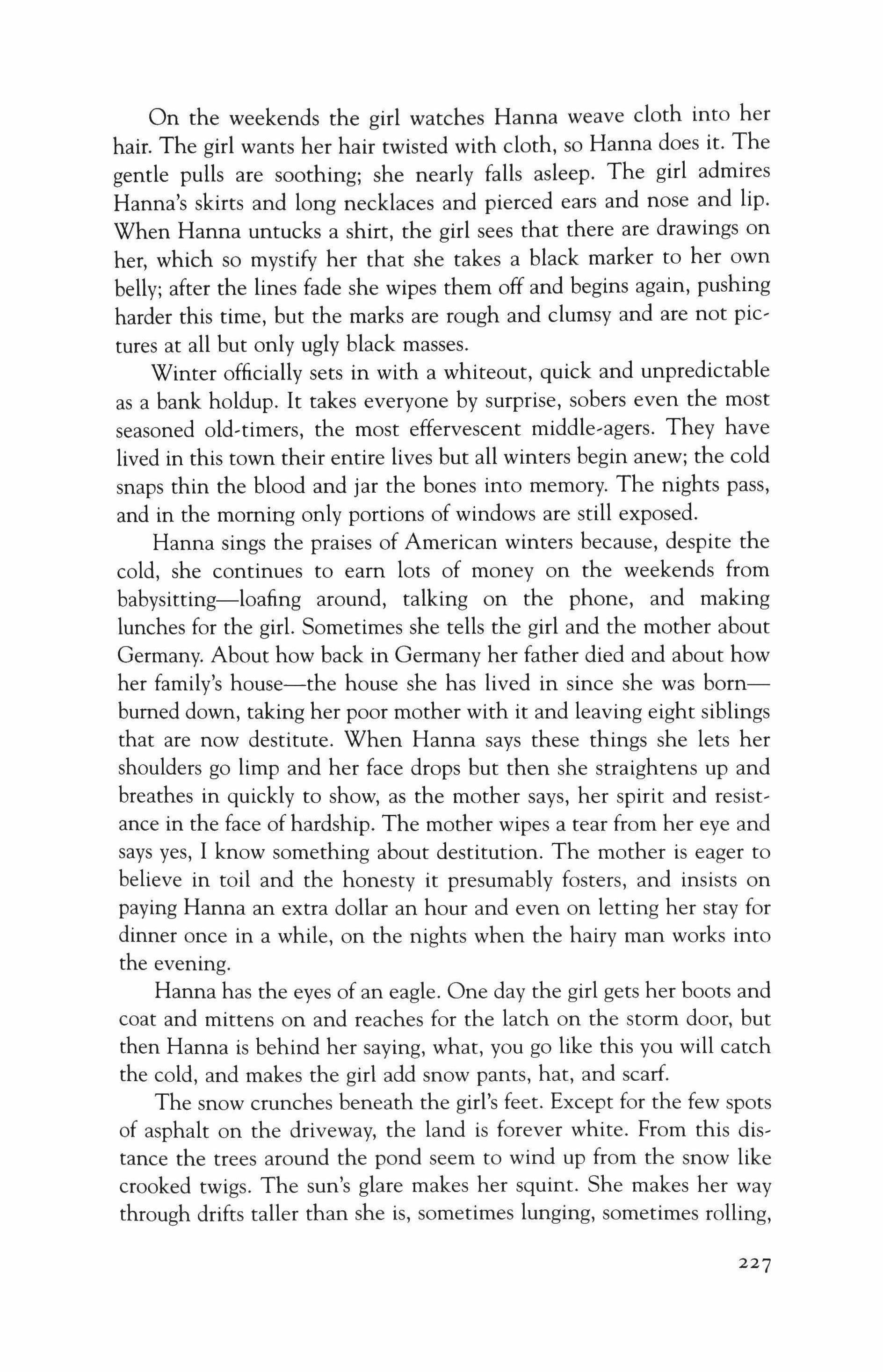
On the weekends the girl watches Hanna weave cloth into her hair. The girl wants her hair twisted with cloth, so Hanna does it. The gentle pulls are soothing; she nearly falls asleep. The girl admires Hanna's skirts and long necklaces and pierced ears and nose and lip. When Hanna untucks a shirt, the girl sees that there are drawings on her, which so mystify her that she takes a black marker to her own belly; after the lines fade she wipes them off and begins again, pushing harder this time, but the marks are rough and clumsy and are not pictures at all but only ugly black masses.
Winter officially sets in with a whiteout, quick and unpredictable as a bank holdup. It takes everyone by surprise, sobers even the most seasoned old-timers, the most effervescent middle-agers. They have lived in this town their entire lives but all winters begin anew; the cold snaps thin the blood and jar the bones into memory. The nights pass, and in the morning only portions of windows are still exposed.
Hanna sings the praises of American winters because, despite the cold, she continues to earn lots of money on the weekends from babysitting-loafing around, talking on the phone, and making lunches for the girl. Sometimes she tells the girl and the mother about Germany. About how back in Germany her father died and about how her family's house-the house she has lived in since she was bornburned down, taking her poor mother with it and leaving eight siblings that are now destitute. When Hanna says these things she lets her shoulders go limp and her face drops but then she straightens up and breathes in quickly to show, as the mother says, her spirit and resistance in the face of hardship. The mother wipes a tear from her eye and says yes, I know something about destitution. The mother is eager to believe in toil and the honesty it presumably fosters, and insists on paying Hanna an extra dollar an hour and even on letting her stay for dinner once in a while, on the nights when the hairy man works into the evening.
Hanna has the eyes of an eagle. One day the girl gets her boots and coat and mittens on and reaches for the latch on the storm door, but then Hanna is behind her saying, what, you go like this you will catch the cold, and makes the girl add snow pants, hat, and scarf.
The snow crunches beneath the girl's feet. Except for the few spots of asphalt on the driveway, the land is forever white. From this distance the trees around the pond seem to wind up from the snow like crooked twigs. The sun's glare makes her squint. She makes her way through drifts taller than she is, sometimes lunging, sometimes rolling,
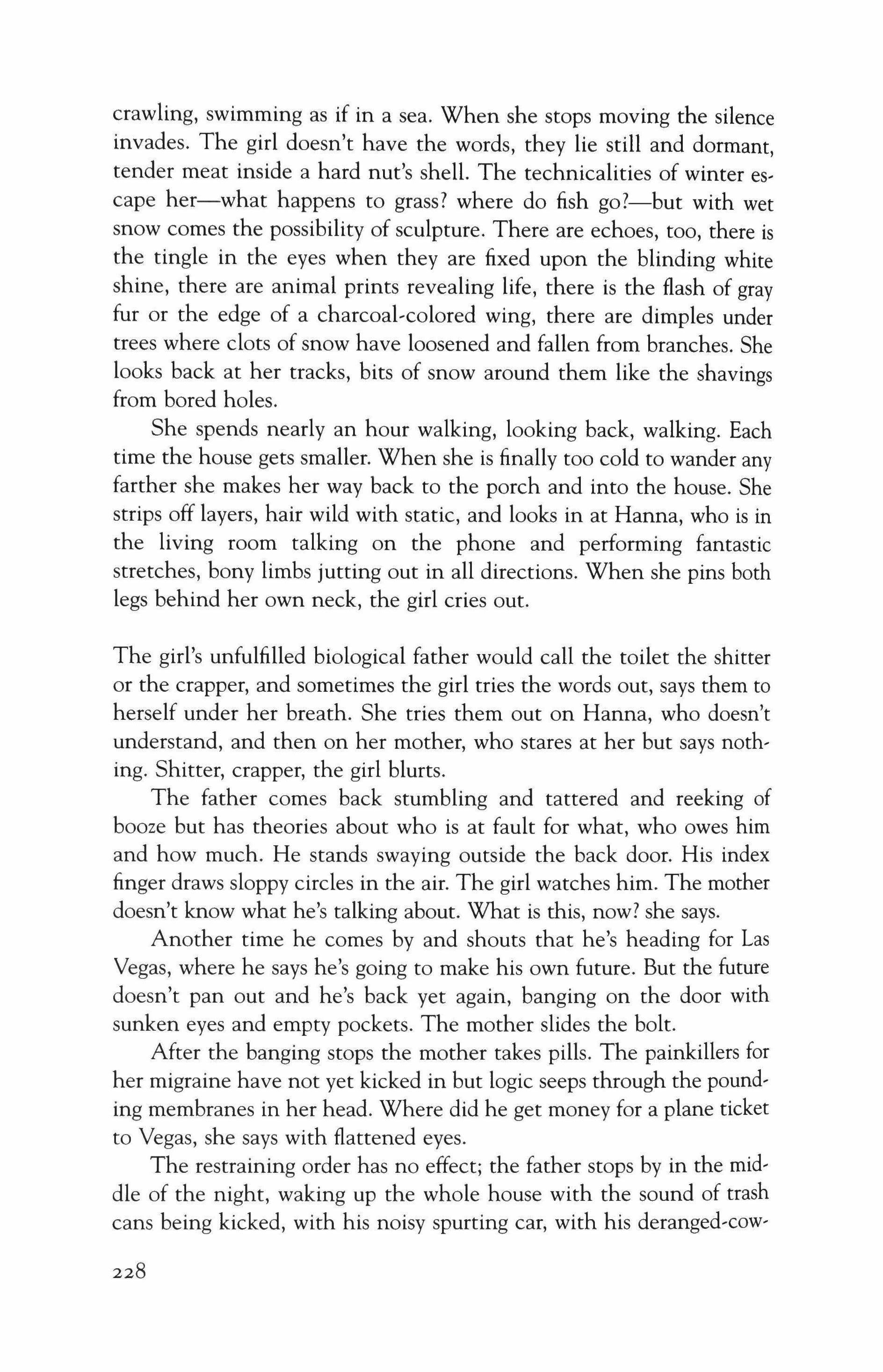
crawling, swimming as if in a sea. When she stops moving the silence invades. The girl doesn't have the words, they lie still and dormant, tender meat inside a hard nut's shell. The technicalities of winter escape her-what happens to grass? where do fish go?-but with wet snow comes the possibility of sculpture. There are echoes, too, there is the tingle in the eyes when they are fixed upon the blinding white shine, there are animal prints revealing life, there is the flash of gray fur or the edge of a charcoal-colored wing, there are dimples under trees where clots of snow have loosened and fallen from branches. She looks back at her tracks, bits of snow around them like the shavings from bored holes.
She spends nearly an hour walking, looking back, walking. Each time the house gets smaller. When she is finally too cold to wander any farther she makes her way back to the porch and into the house. She strips off layers, hair wild with static, and looks in at Hanna, who is in the living room talking on the phone and performing fantastic stretches, bony limbs jutting out in all directions. When she pins both legs behind her own neck, the girl cries out.
The girl's unfulfilled biological father would call the toilet the shitter or the crapper, and sometimes the girl tries the words out, says them to herself under her breath. She tries them out on Hanna, who doesn't understand, and then on her mother, who stares at her but says nothing. Shitter, crapper, the girl blurts.
The father comes back stumbling and tattered and reeking of booze but has theories about who is at fault for what, who owes him and how much. He stands swaying outside the back door. His index finger draws sloppy circles in the air. The girl watches him. The mother doesn't know what he's talking about. What is this, now? she says.
Another time he comes by and shouts that he's heading for Las Vegas, where he says he's going to make his own future. But the future doesn't pan out and he's back yet again, banging on the door with sunken eyes and empty pockets. The mother slides the bolt.
After the banging stops the mother takes pills. The painkillers for her migraine have not yet kicked in but logic seeps through the pounding membranes in her head. Where did he get money for a plane ticket to Vegas, she says with flattened eyes.
The restraining order has no effect; the father stops by in the middle of the night, waking up the whole house with the sound of trash cans being kicked, with his noisy spurting car, with his deranged-cow-
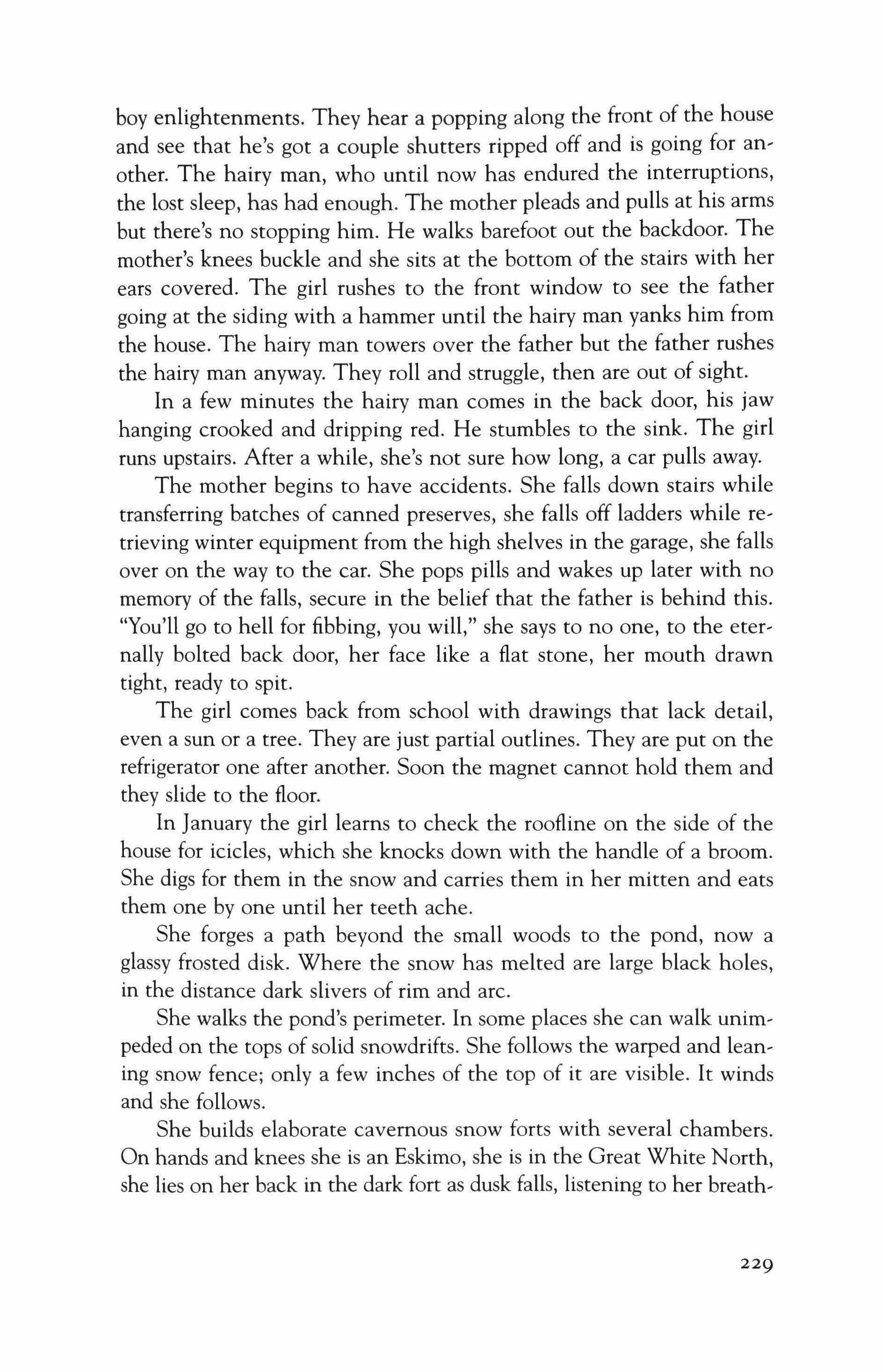
boy enlightenments. They hear a popping along the front of the house and see that he's got a couple shutters ripped off and is going for an' other. The hairy man, who until now has endured the interruptions, the lost sleep, has had enough. The mother pleads and pulls at his arms but there's no stopping him. He walks barefoot out the backdoor. The mother's knees buckle and she sits at the bottom of the stairs with her ears covered. The girl rushes to the front window to see the father going at the siding with a hammer until the hairy man yanks him from the house. The hairy man towers over the father but the father rushes the hairy man anyway. They roll and struggle, then are out of sight.
In a few minutes the hairy man comes in the back door, his jaw hanging crooked and dripping red. He stumbles to the sink. The girl runs upstairs. After a while, she's not sure how long, a car pulls away.
The mother begins to have accidents. She falls down stairs while transferring batches of canned preserves, she falls off ladders while re' trieving winter equipment from the high shelves in the garage, she falls over on the way to the car. She pops pills and wakes up later with no memory of the falls, secure in the belief that the father is behind this. "You'll go to hell for fibbing, you will," she says to no one, to the eternally bolted back door, her face like a flat stone, her mouth drawn tight, ready to spit.
The girl comes back from school with drawings that lack detail, even a sun or a tree. They are just partial outlines. They are put on the refrigerator one after another. Soon the magnet cannot hold them and they slide to the floor.
In January the girl learns to check the roofline on the side of the house for icicles, which she knocks down with the handle of a broom. She digs for them in the snow and carries them in her mitten and eats them one by one until her teeth ache.
She forges a path beyond the small woods to the pond, now a glassy frosted disk. Where the snow has melted are large black holes, in the distance dark slivers of rim and arc.
She walks the pond's perimeter. In some places she can walk unimpeded on the tops of solid snowdrifts. She follows the warped and lean, ing snow fence; only a few inches of the top of it are visible. It winds and she follows.
She builds elaborate cavernous snow forts with several chambers. On hands and knees she is an Eskimo, she is in the Great White North, she lies on her back in the dark fort as dusk falls, listening to her breath,
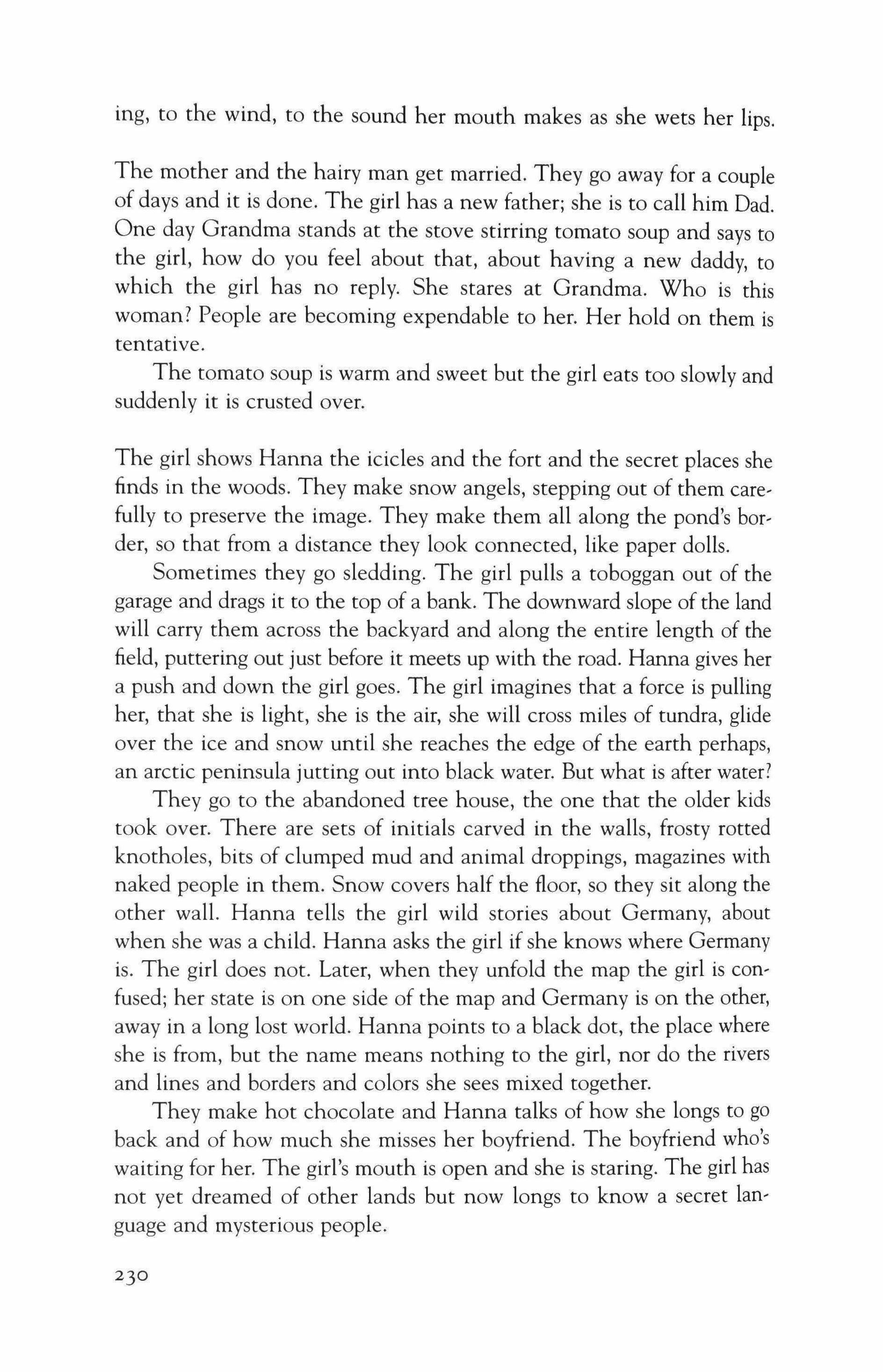
ing, to the wind, to the sound her mouth makes as she wets her lips.
The mother and the hairy man get married. They go away for a couple of days and it is done. The girl has a new father; she is to call him Dad. One day Grandma stands at the stove stirring tomato soup and says to the girl, how do you feel about that, about having a new daddy, to which the girl has no reply. She stares at Grandma. Who is this woman? People are becoming expendable to her. Her hold on them is tentative.
The tomato soup is warm and sweet but the girl eats too slowly and suddenly it is crusted over.
The girl shows Hanna the icicles and the fort and the secret places she finds in the woods. They make snow angels, stepping out of them carefully to preserve the image. They make them all along the pond's border, so that from a distance they look connected, like paper dolls.
Sometimes they go sledding. The girl pulls a toboggan out of the garage and drags it to the top of a bank. The downward slope of the land will carry them across the backyard and along the entire length of the field, puttering out just before it meets up with the road. Hanna gives her a push and down the girl goes. The girl imagines that a force is pulling her, that she is light, she is the air, she will cross miles of tundra, glide over the ice and snow until she reaches the edge of the earth perhaps, an arctic peninsula jutting out into black water. But what is after water?
They go to the abandoned tree house, the one that the older kids took over. There are sets of initials carved in the walls, frosty rotted knotholes, bits of clumped mud and animal droppings, magazines with naked people in them. Snow covers half the floor, so they sit along the other wall. Hanna tells the girl wild stories about Germany, about when she was a child. Hanna asks the girl if she knows where Germany is. The girl does not. Later, when they unfold the map the girl is confused; her state is on one side of the map and Germany is on the other, away in a long lost world. Hanna points to a black dot, the place where she is from, but the name means nothing to the girl, nor do the rivers and lines and borders and colors she sees mixed together.
They make hot chocolate and Hanna talks of how she longs to go back and of how much she misses her boyfriend. The boyfriend who's waiting for her. The girl's mouth is open and she is staring. The girl has not yet dreamed of other lands but now longs to know a secret language and mysterious people.
23°
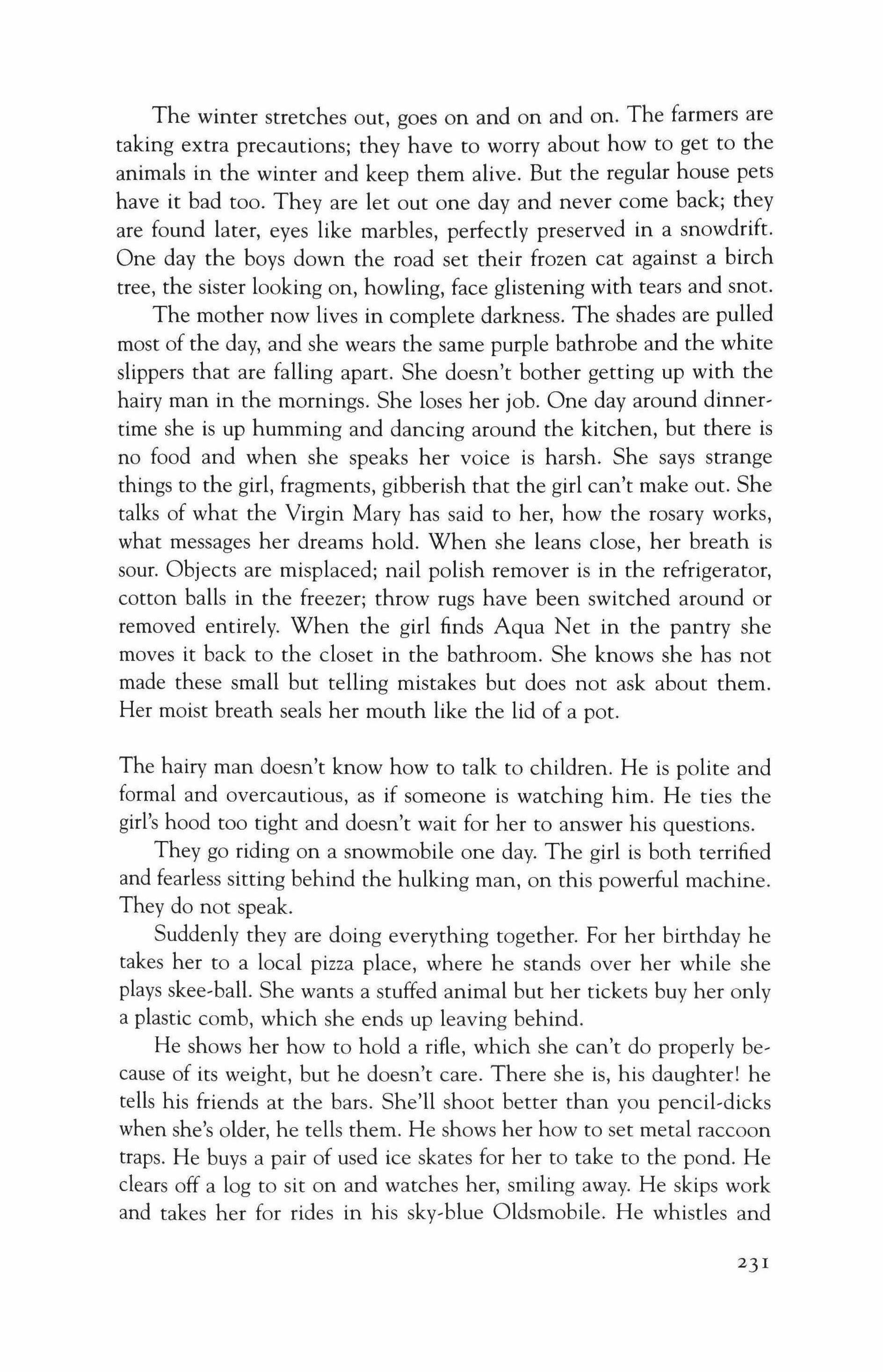
The winter stretches out, goes on and on and on. The farmers are taking extra precautions; they have to worry about how to get to the animals in the winter and keep them alive. But the regular house pets have it bad too. They are let out one day and never come back; they are found later, eyes like marbles, perfectly preserved in a snowdrift. One day the boys down the road set their frozen cat against a birch tree, the sister looking on, howling, face glistening with tears and snot.
The mother now lives in complete darkness. The shades are pulled most of the day, and she wears the same purple bathrobe and the white slippers that are falling apart. She doesn't bother getting up with the hairy man in the mornings. She loses her job. One day around dinnertime she is up humming and dancing around the kitchen, but there is no food and when she speaks her voice is harsh. She says strange things to the girl, fragments, gibberish that the girl can't make out. She talks of what the Virgin Mary has said to her, how the rosary works, what messages her dreams hold. When she leans close, her breath is sour. Objects are misplaced; nail polish remover is in the refrigerator, cotton balls in the freezer; throw rugs have been switched around or removed entirely. When the girl finds Aqua Net in the pantry she moves it back to the closet in the bathroom. She knows she has not made these small but telling mistakes but does not ask about them. Her moist breath seals her mouth like the lid of a pot.
The hairy man doesn't know how to talk to children. He is polite and formal and overcautious, as if someone is watching him. He ties the girl's hood too tight and doesn't wait for her to answer his questions.
They go riding on a snowmobile one day. The girl is both terrified and fearless sitting behind the hulking man, on this powerful machine. They do not speak.
Suddenly they are doing everything together. For her birthday he takes her to a local pizza place, where he stands over her while she plays skee-ball. She wants a stuffed animal but her tickets buy her only a plastic comb, which she ends up leaving behind.
He shows her how to hold a rifle, which she can't do properly because of its weight, but he doesn't care. There she is, his daughter! he tells his friends at the bars. She'll shoot better than you pencil-dicks when she's older, he tells them. He shows her how to set metal raccoon traps. He buys a pair of used ice skates for her to take to the pond. He clears off a log to sit on and watches her, smiling away. He skips work and takes her for rides in his sky-blue Oldsmobile. He whistles and
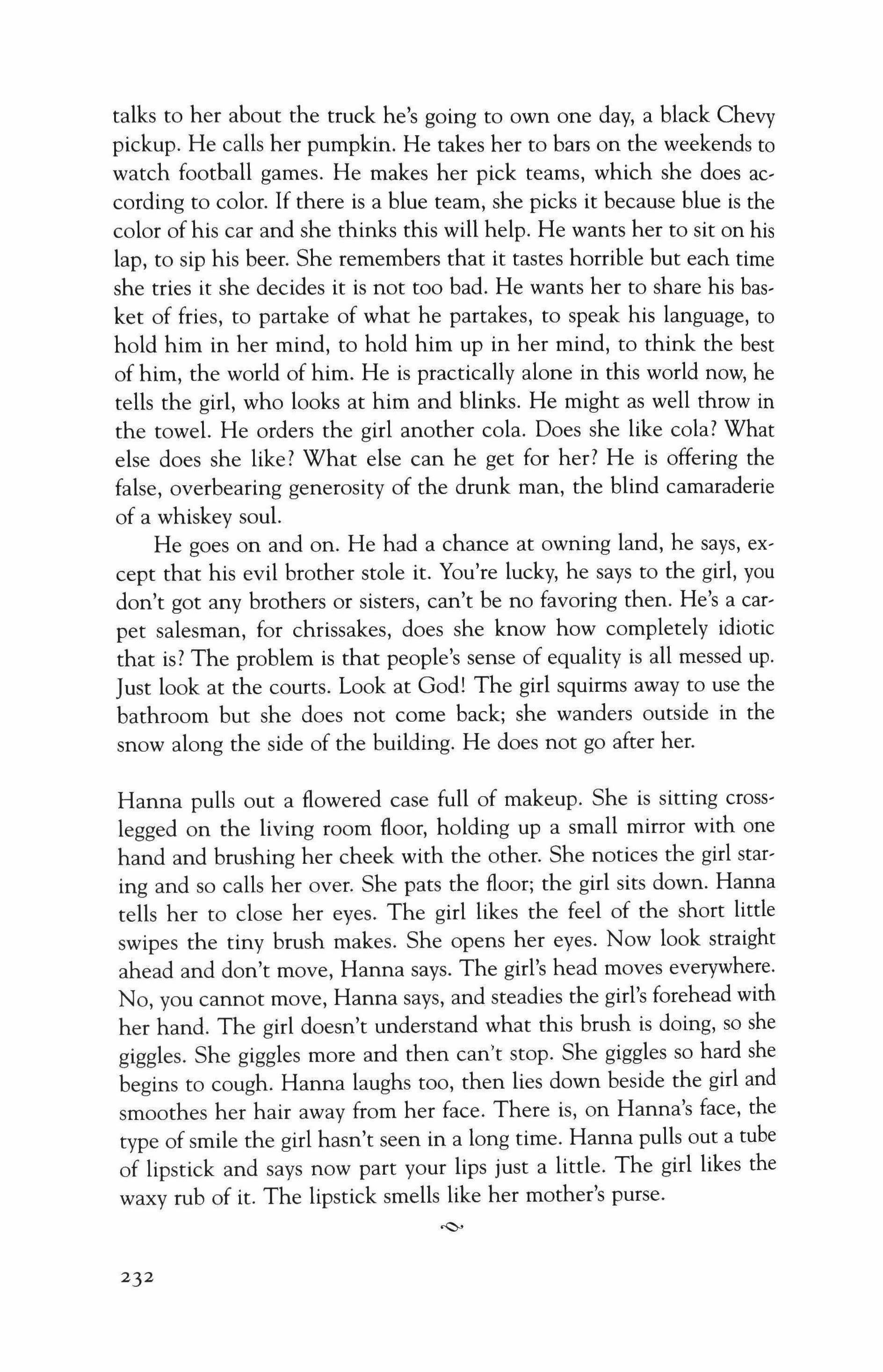
talks to her about the truck he's going to own one day, a black Chevy pickup. He calls her pumpkin. He takes her to bars on the weekends to watch football games. He makes her pick teams, which she does according to color. If there is a blue team, she picks it because blue is the color of his car and she thinks this will help. He wants her to sit on his lap, to sip his beer. She remembers that it tastes horrible but each time she tries it she decides it is not too bad. He wants her to share his basket of fries, to partake of what he partakes, to speak his language, to hold him in her mind, to hold him up in her mind, to think the best of him, the world of him. He is practically alone in this world now, he tells the girl, who looks at him and blinks. He might as well throw in the towel. He orders the girl another cola. Does she like cola? What else does she like? What else can he get for her? He is offering the false, overbearing generosity of the drunk man, the blind camaraderie of a whiskey soul.
He goes on and on. He had a chance at owning land, he says, except that his evil brother stole it. You're lucky, he says to the girl, you don't got any brothers or sisters, can't be no favoring then. He's a carpet salesman, for chrissakes, does she know how completely idiotic that is? The problem is that people's sense of equality is all messed up. Just look at the courts. Look at God! The girl squirms away to use the bathroom but she does not come back; she wanders outside in the snow along the side of the building. He does not go after her.
Hanna pulls out a flowered case full of makeup. She is sitting crosslegged on the living room floor, holding up a small mirror with one hand and brushing her cheek with the other. She notices the girl staring and so calls her over. She pats the floor; the girl sits down. Hanna tells her to close her eyes. The girl likes the feel of the short little swipes the tiny brush makes. She opens her eyes. Now look straight ahead and don't move, Hanna says. The girl's head moves everywhere. No, you cannot move, Hanna says, and steadies the girl's forehead with her hand. The girl doesn't understand what this brush is doing, so she giggles. She giggles more and then can't stop. She giggles so hard she begins to cough. Hanna laughs too, then lies down beside the girl and smoothes her hair away from her face. There is, on Hanna's face, the type of smile the girl hasn't seen in a long time. Hanna pulls out a tube of lipstick and says now part your lips just a little. The girl likes the waxy rub of it. The lipstick smells like her mother's purse.

The girl knows on some level that if the lake can hold a snowmobile, then it can hold her. She can wander out at will. At first she doesn't bring her ice skates, she just slides around in her boots. She is a feather, she is wind. She walks on water.
One morning the girl wakes to screams. She thinks it is a dream but then the screams come again. She hears heavy footsteps and then the back door slamming. She looks out the window to see her mother in the backyard, nearly naked, grasping her own hand and rubbing it, as if to get something off. By the time the hairy man drags her to the house, she has practically collapsed. Her lips are blue and her eyes are bloodshot and sunken. In February the mother disappears.
Grandma comes. She strips the girl down first thing and gives her a bath. The girl's head is washed with vinegar to get rid of the lice. The vinegar will ooze out of her pores for days. The hairy man has left. Just for a short time, Grandma says, but her tone is decisive.
A postcard comes from Hanna, who is in Germany over spring break. The girl tapes it up by her mirror but takes it down every day to examine it. The corners get soft and worn.
Grandma doesn't walk well, so the girl brings her tea and cough drops, and is the one on the receiving end of the UPS deliveries, the repair people, the Jehovah's Witnesses. She nods or shakes her head to respond to questions. She feels there is something to hide and so tries to; she has learned how to fumble her way through formal situations with adults, she has learned when to bother them and when to shut the door quietly, or hang up the phone quietly, and wander off to a different room. She has instinctually learned the art of silence.
The snow is melting. Drifts are crumbly and the snow seems almost dry. The girl runs outside without a coat-no one runs after her, now, or calls her name. Tracks appear in the mud around the pond-claw marks and rounded hooves and the forked prints of bird feet. She sits in the tree house for hours reading books that are too hard for her. She looks up "abyss" in the dictionary but the definition is "bottomless pit," which she doesn't understand. She cannot yet conceptualize a starting point without an ending, a beginning without an end, a story without a resolution. She opens a map but cannot find Germany and begins to cry.
In a month the mother is back. The mother who does not know life without a cloud hanging over her. She can hardly face the girl. Children's
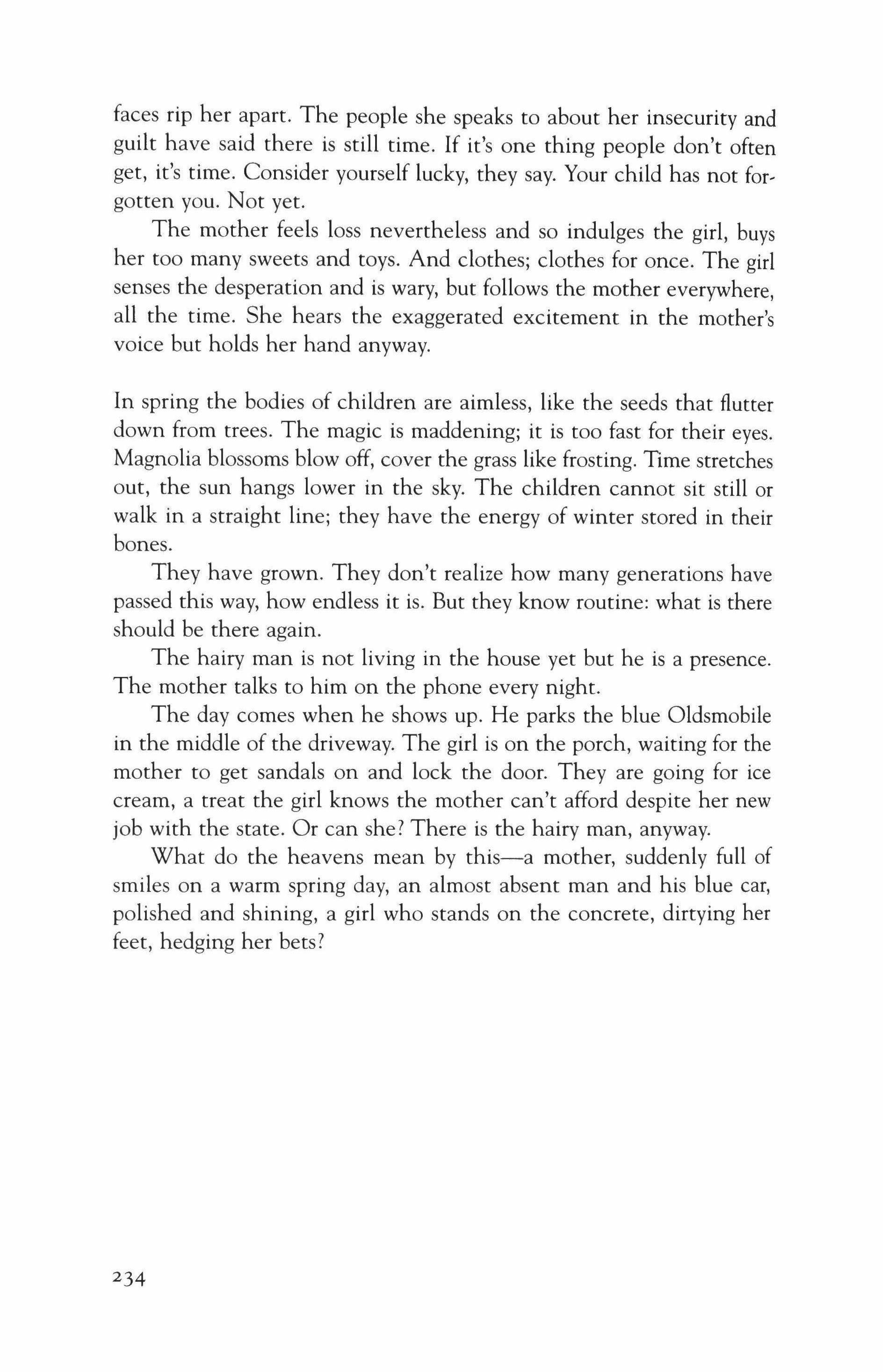
faces rip her apart. The people she speaks to about her insecurity and guilt have said there is still time. If it's one thing people don't often get, it's time. Consider yourself lucky, they say. Your child has not forgotten you. Not yet.
The mother feels loss nevertheless and so indulges the girl, buys her too many sweets and toys. And clothes; clothes for once. The girl senses the desperation and is wary, but follows the mother everywhere, all the time. She hears the exaggerated excitement in the mother's voice but holds her hand anyway.
In spring the bodies of children are aimless, like the seeds that flutter down from trees. The magic is maddening; it is too fast for their eyes. Magnolia blossoms blow off, cover the grass like frosting. Time stretches out, the sun hangs lower in the sky. The children cannot sit still or walk in a straight line; they have the energy of winter stored in their bones.
They have grown. They don't realize how many generations have passed this way, how endless it is. But they know routine: what is there should be there again.
The hairy man is not living in the house yet but he is a presence. The mother talks to him on the phone every night.
The day comes when he shows up. He parks the blue Oldsmobile in the middle of the driveway. The girl is on the porch, waiting for the mother to get sandals on and lock the door. They are going for ice cream, a treat the girl knows the mother can't afford despite her new job with the state. Or can she? There is the hairy man, anyway.
What do the heavens mean by this-a mother, suddenly full of smiles on a warm spring day, an almost absent man and his blue car, polished and shining, a girl who stands on the concrete, dirtying her feet, hedging her bets?
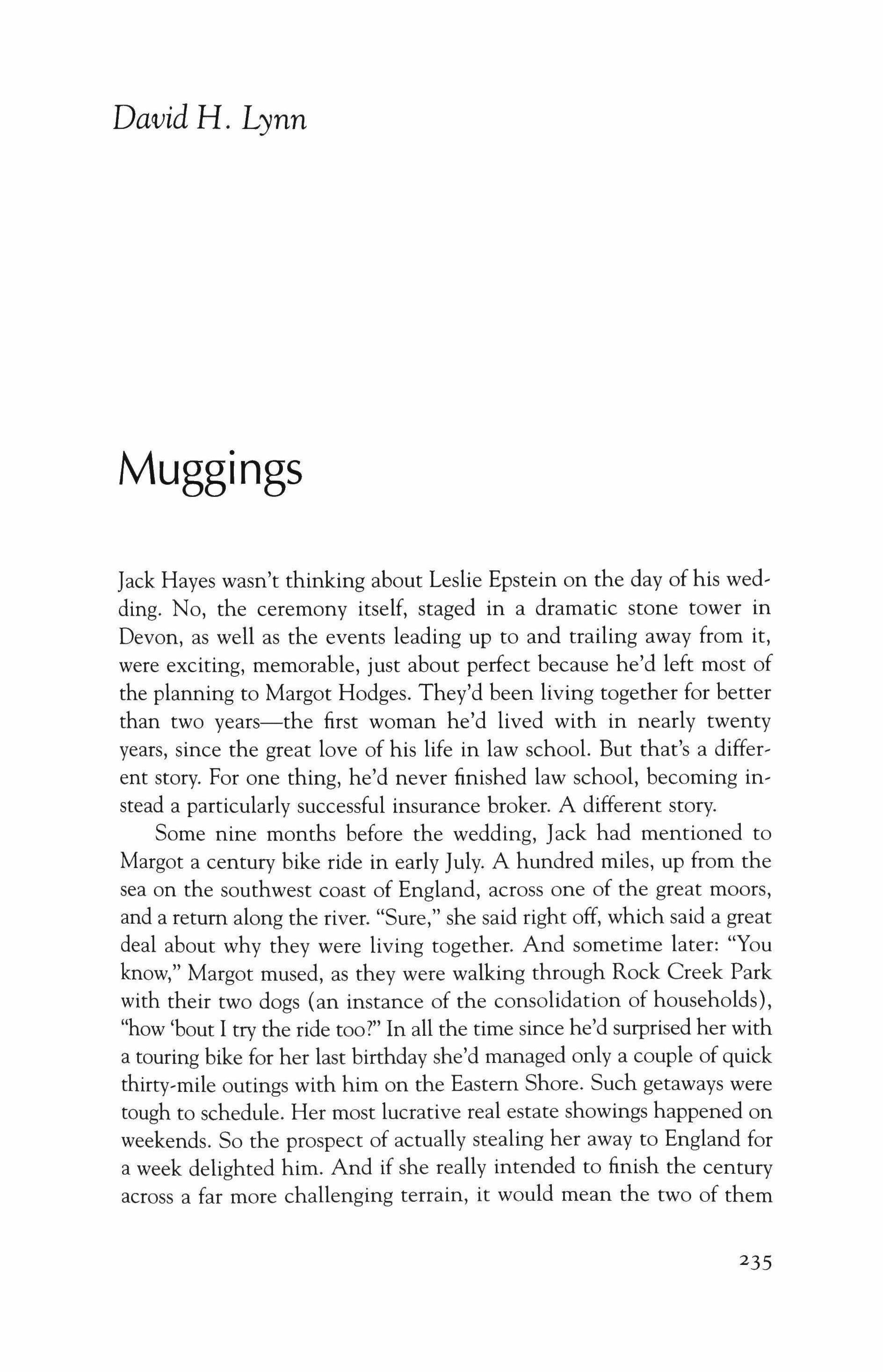
Jack Hayes wasn't thinking about Leslie Epstein on the day of his wedding. No, the ceremony itself, staged in a dramatic stone tower in Devon, as well as the events leading up to and trailing away from it, were exciting, memorable, just about perfect because he'd left most of the planning to Margot Hodges. They'd been living together for better than two years-the first woman he'd lived with in nearly twenty years, since the great love of his life in law school. But that's a different story. For one thing, he'd never finished law school, becoming instead a particularly successful insurance broker. A different story.
Some nine months before the wedding, Jack had mentioned to Margot a century bike ride in early July. A hundred miles, up from the sea on the southwest coast of England, across one of the great moors, and a return along the river. "Sure," she said right off, which said a great deal about why they were living together. And sometime later: "You know," Margot mused, as they were walking through Rock Creek Park with their two dogs (an instance of the consolidation of households), "how 'bout I try the ride too?" In all the time since he'd surprised her with a touring bike for her last birthday she'd managed only a couple of quick thirty-mile outings with him on the Eastern Shore. Such getaways were tough to schedule. Her most lucrative real estate showings happened on weekends. So the prospect of actually stealing her away to England for a week delighted him. And if she really intended to finish the century across a far more challenging terrain, it would mean the two of them
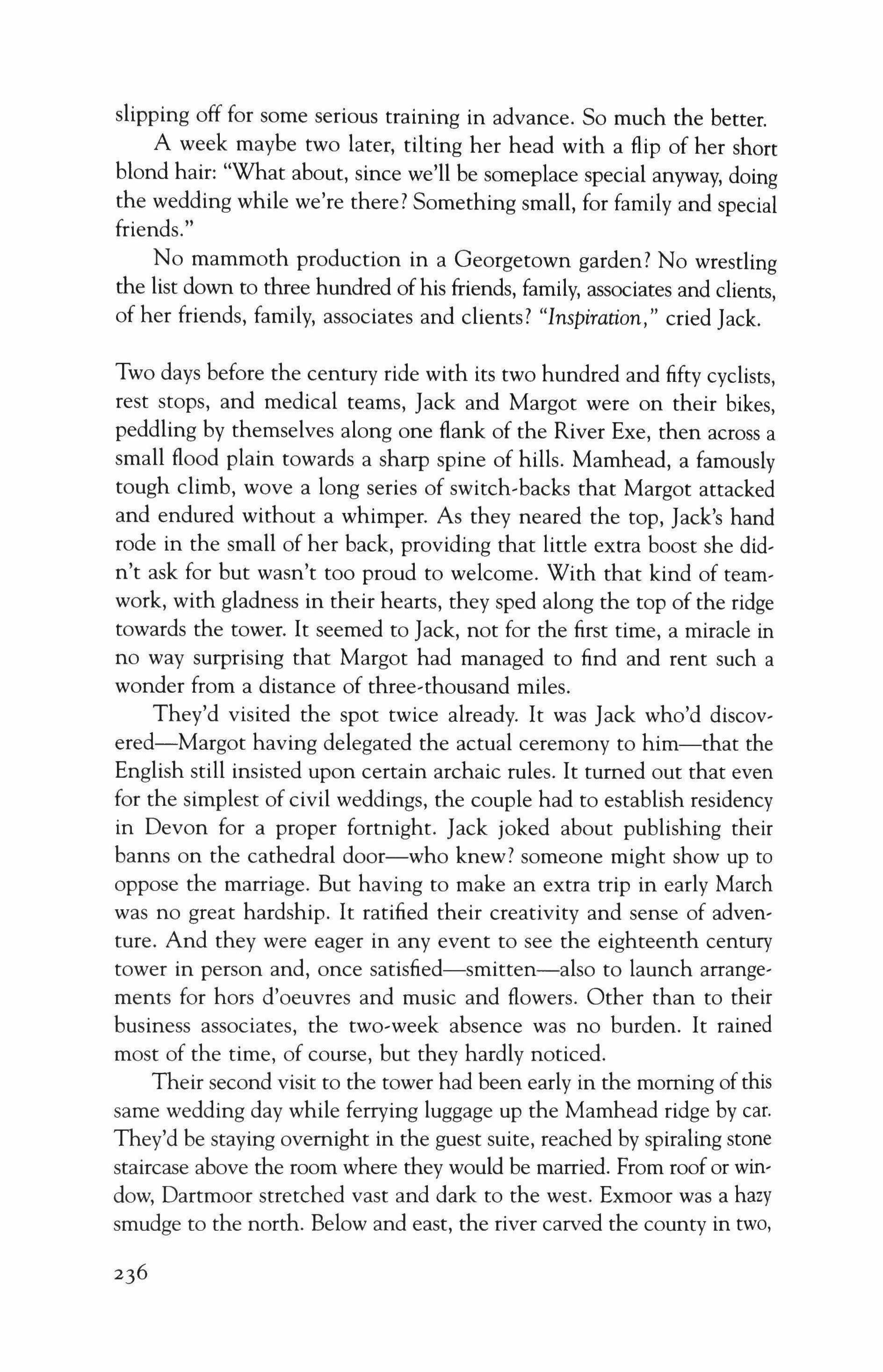
slipping off for some serious training in advance. So much the better. A week maybe two later, tilting her head with a flip of her short blond hair: "What about, since we'll be someplace special anyway, doing the wedding while we're there? Something small, for family and special friends."
No mammoth production in a Georgetown garden? No wrestling the list down to three hundred of his friends, family, associates and clients, of her friends, family, associates and clients? "Inspiration," cried Jack.
Two days before the century ride with its two hundred and fifty cyclists, rest stops, and medical teams, Jack and Margot were on their bikes, peddling by themselves along one flank of the River Exe, then across a small flood plain towards a sharp spine of hills. Mamhead, a famously tough climb, wove a long series of switch-backs that Margot attacked and endured without a whimper. As they neared the top, Jack's hand rode in the small of her back, providing that little extra boost she didn't ask for but wasn't too proud to welcome. With that kind of teamwork, with gladness in their hearts, they sped along the top of the ridge towards the tower. It seemed to Jack, not for the first time, a miracle in no way surprising that Margot had managed to find and rent such a wonder from a distance of three-thousand miles.
They'd visited the spot twice already. It was Jack who'd discovered-Margot having delegated the actual ceremony to him-that the English still insisted upon certain archaic rules. It turned out that even for the simplest of civil weddings, the couple had to establish residency in Devon for a proper fortnight. Jack joked about publishing their banns on the cathedral door-who knew? someone might show up to oppose the marriage. But having to make an extra trip in early March was no great hardship. It ratified their creativity and sense of adventure. And they were eager in any event to see the eighteenth century tower in person and, once satisfied-smitten-also to launch arrangements for hors d'oeuvres and music and flowers. Other than to their business associates, the two-week absence was no burden. It rained most of the time, of course, but they hardly noticed.
Their second visit to the tower had been early in the morning of this same wedding day while ferrying luggage up the Mamhead ridge by car. They'd be staying overnight in the guest suite, reached by spiraling stone staircase above the room where they would be married. From roof or window, Dartmoor stretched vast and dark to the west. Exmoor was a hazy smudge to the north. Below and east, the river carved the county in two,

its rolling hills and dark green pasture falling back from the Exe on either side all the way south to the sea.
Arriving now by bike, panting and exhilarated, Jack and Margot were greeted by a woman from Radio Devon in Wellington boots and a waxed jacket, her tape-recorder slung over a shoulder. Two Yanks shipping their bikes across an ocean for the Ride for Life (the event was for cancer research) and getting married to boot, well that was local news and made them celebrities the rest of their stay. Snapping away already was a photographer from the Exeter newspaper, two or three shots as they pushed up the last gravely hill, two or three more in front of their bikes, hot and sweaty and grinning giddily.
Such responsibilities dispatched, they still had nearly an hour to rush up the spiral stairs, make love quickly while using the hand-held shower in the bathtub, and dress for the ceremony. By the time they descended, the local Registrar had arrived, her assistant lugging the ornate volume in which Jack and Margot would inscribe their names, along with witnesses from both families. Family and friends, twentytwo all told, had also assembled, gay and noisy, having been fetched to the tower by private coach.
No, it was only two days later that Jack thought of Leslie Epstein again. Or that's not quite right. She'd been present all along as a mote, a fleck of shadow on his attention that drifted all but invisibly in the air. He knew it was there, knew it would flesh once more into sharper focus when the time came.
Jack and Margot were riding somewhere in the middle of a gradually thinning cortege of riders (the serious ones, the time-trialers and other more competitive types, had long since leaped away across the hills) as they climbed a short but sharp rise at mile thirty. Struggling at the crest, Margot pushed up next to him, breathing hard. "OK," she panted. "You were right," she panted. "Next time I train harder."
He nodded. "You've done great. We can peel off after the next rest stop and finish the fifty. Plenty of others will be doing the same."
"You're a sweet," she said, flashing a smile that betrayed her exhaustion. "But don't. There's no reason to. I'll be waiting for you on the pier to celebrate."
Jack flushed with joy. She meant it-that's what he knew. She was generous in just this way. Not that he wouldn't stop at fifty if she made the slightest gesture. He'd ridden plenty of centuries. Nothing was hanging on this one. But she'd be just as happy if he went on. She
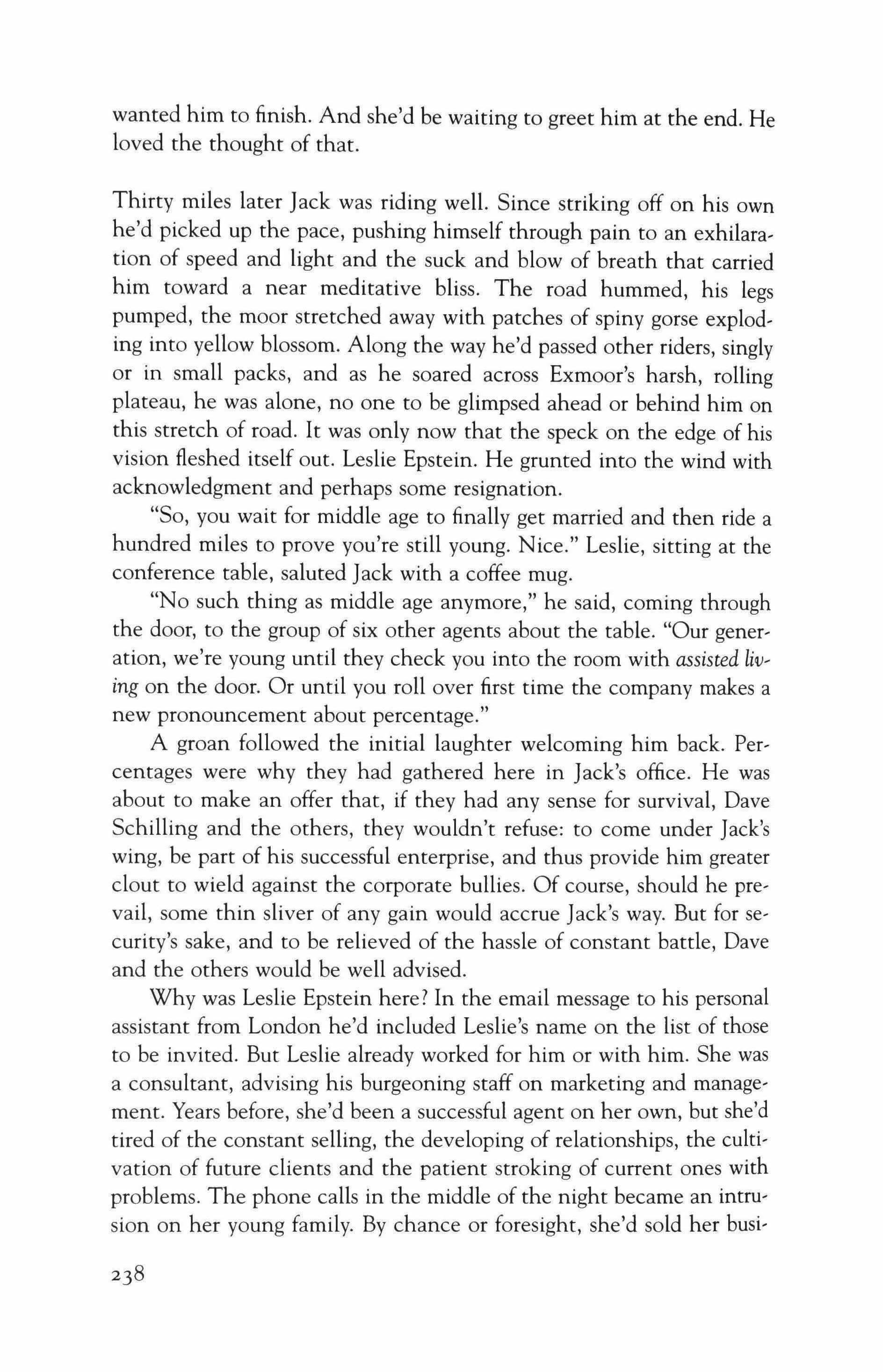
wanted him to finish. And she'd be waiting to greet him at the end. He loved the thought of that.
Thirty miles later Jack was riding well. Since striking off on his own he'd picked up the pace, pushing himself through pain to an exhilaration of speed and light and the suck and blow of breath that carried him toward a near meditative bliss. The road hummed, his legs pumped, the moor stretched away with patches of spiny gorse exploding into yellow blossom. Along the way he'd passed other riders, singly or in small packs, and as he soared across Exmoor's harsh, rolling plateau, he was alone, no one to be glimpsed ahead or behind him on this stretch of road. It was only now that the speck on the edge of his vision fleshed itself out. Leslie Epstein. He grunted into the wind with acknowledgment and perhaps some resignation.
"So, you wait for middle age to finally get married and then ride a hundred miles to prove you're still young. Nice." Leslie, sitting at the conference table, saluted Jack with a coffee mug.
"No such thing as middle age anymore," he said, coming through the door, to the group of six other agents about the table. "Our generation, we're young until they check you into the room with assisted living on the door. Or until you roll over first time the company makes a new pronouncement about percentage."
A groan followed the initial laughter welcoming him back. Percentages were why they had gathered here in Jack's office. He was about to make an offer that, if they had any sense for survival, Dave Schilling and the others, they wouldn't refuse: to come under Jack's wing, be part of his successful enterprise, and thus provide him greater clout to wield against the corporate bullies. Of course, should he prevail, some thin sliver of any gain would accrue Jack's way. But for security's sake, and to be relieved of the hassle of constant battle, Dave and the others would be well advised.
Why was Leslie Epstein here? In the email message to his personal assistant from London he'd included Leslie's name on the list of those to be invited. But Leslie already worked for him or with him. She was a consultant, advising his burgeoning staff on marketing and management. Years before, she'd been a successful agent on her own, but she'd tired of the constant selling, the developing of relationships, the cultivation of future clients and the patient stroking of current ones with problems. The phone calls in the middle of the night became an intrusion on her young family. By chance or foresight, she'd sold her busi-
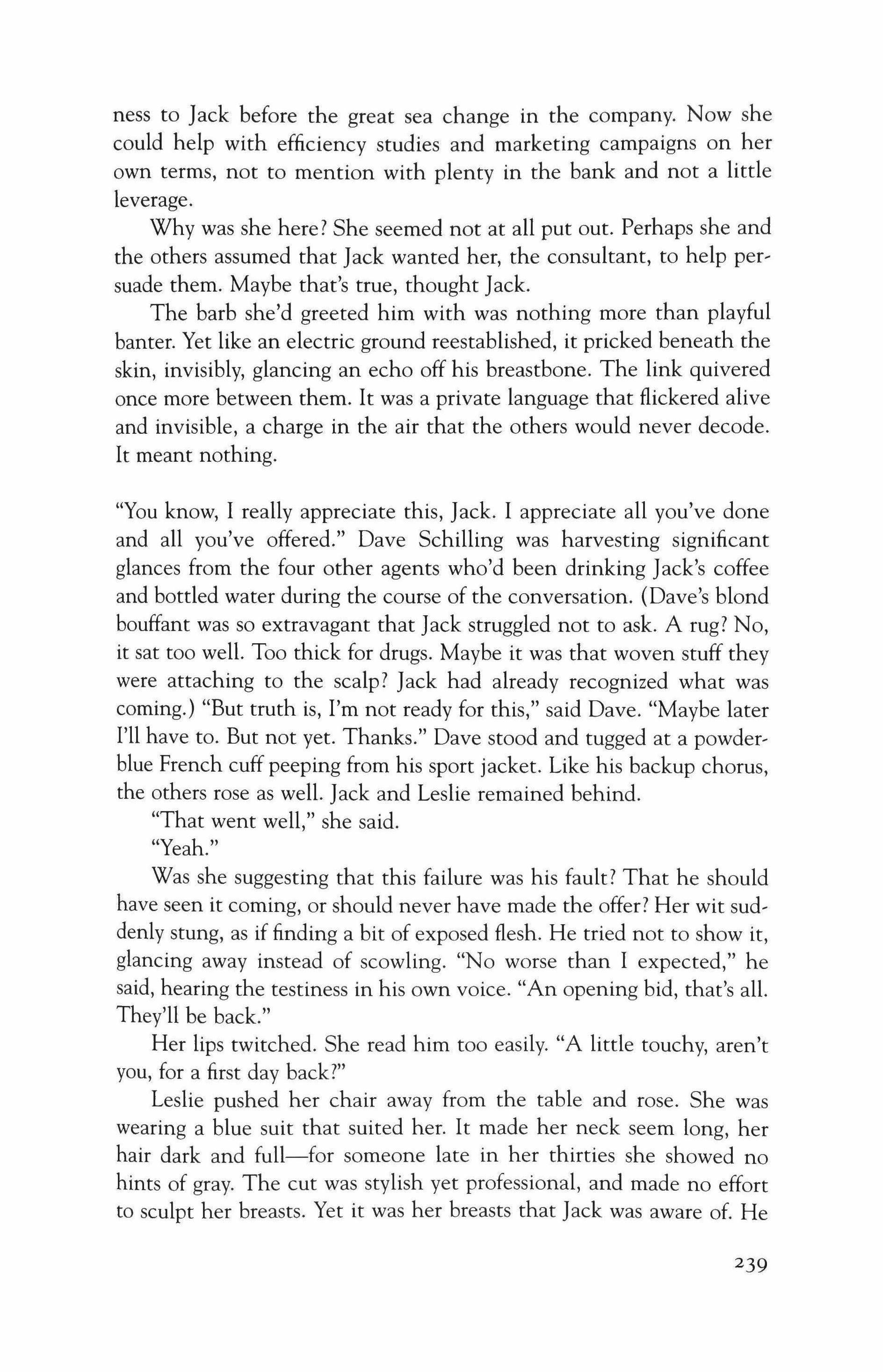
ness to Jack before the great sea change in the company. Now she could help with efficiency studies and marketing campaigns on her own terms, not to mention with plenty in the bank and not a little leverage.
Why was she here? She seemed not at all put out. Perhaps she and the others assumed that Jack wanted her, the consultant, to help persuade them. Maybe that's true, thought Jack.
The barb she'd greeted him with was nothing more than playful banter. Yet like an electric ground reestablished, it pricked beneath the skin, invisibly, glancing an echo off his breastbone. The link quivered once more between them. It was a private language that flickered alive and invisible, a charge in the air that the others would never decode. It meant nothing.
"You know, I really appreciate this, Jack. I appreciate all you've done and all you've offered." Dave Schilling was harvesting significant glances from the four other agents who'd been drinking Jack's coffee and bottled water during the course of the conversation. (Dave's blond bouffant was so extravagant that Jack struggled not to ask. A rug? No, it sat too well. Too thick for drugs. Maybe it was that woven stuff they were attaching to the scalp? Jack had already recognized what was coming.) "But truth is, I'm not ready for this," said Dave. "Maybe later I'll have to. But not yet. Thanks." Dave stood and tugged at a powderblue French cuff peeping from his sport jacket. Like his backup chorus, the others rose as well. Jack and Leslie remained behind.
"That went well," she said.
"Yeah."
Was she suggesting that this failure was his fault? That he should have seen it coming, or should never have made the offer? Her wit suddenly stung, as if finding a bit of exposed flesh. He tried not to show it, glancing away instead of scowling. "No worse than I expected," he said, hearing the testiness in his own voice. "An opening bid, that's all. They'll be back."
Her lips twitched. She read him too easily. "A little touchy, aren't you, for a first day back?"
Leslie pushed her chair away from the table and rose. She was wearing a blue suit that suited her. It made her neck seem long, her hair dark and full-for someone late in her thirties she showed no hints of gray. The cut was stylish yet professional, and made no effort to sculpt her breasts. Yet it was her breasts that Jack was aware of. He
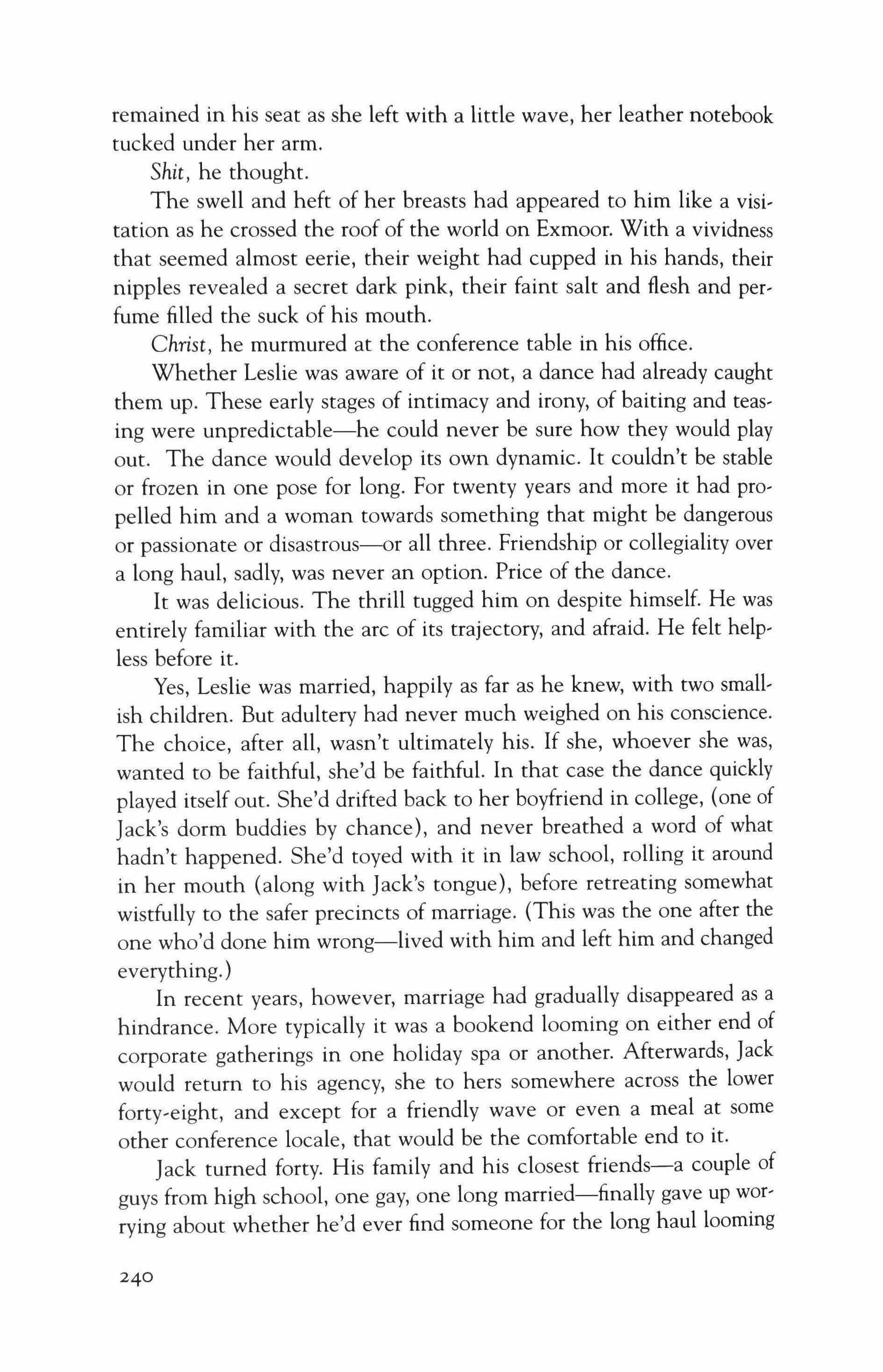
remained in his seat as she left with a little wave, her leather notebook tucked under her arm.
Shit, he thought.
The swell and heft of her breasts had appeared to him like a visitation as he crossed the roof of the world on Exmoor. With a vividness that seemed almost eerie, their weight had cupped in his hands, their nipples revealed a secret dark pink, their faint salt and flesh and perfume filled the suck of his mouth.
Christ, he murmured at the conference table in his office.
Whether Leslie was aware of it or not, a dance had already caught them up. These early stages of intimacy and irony, of baiting and teasing were unpredictable-he could never be sure how they would play out. The dance would develop its own dynamic. It couldn't be stable or frozen in one pose for long. For twenty years and more it had propelled him and a woman towards something that might be dangerous or passionate or disastrous-or all three. Friendship or collegiality over a long haul, sadly, was never an option. Price of the dance.
It was delicious. The thrill tugged him on despite himself. He was entirely familiar with the arc of its trajectory, and afraid. He felt helpless before it.
Yes, Leslie was married, happily as far as he knew, with two smallish children. But adultery had never much weighed on his conscience. The choice, after all, wasn't ultimately his. If she, whoever she was, wanted to be faithful, she'd be faithful. In that case the dance quickly played itself out. She'd drifted back to her boyfriend in college, (one of Jack's dorm buddies by chance), and never breathed a word of what hadn't happened. She'd toyed with it in law school, rolling it around in her mouth (along with Jack's tongue), before retreating somewhat wistfully to the safer precincts of marriage. (This was the one after the one who'd done him wrong-lived with him and left him and changed everything.)
In recent years, however, marriage had gradually disappeared as a hindrance. More typically it was a bookend looming on either end of corporate gatherings in one holiday spa or another. Afterwards, Jack would return to his agency, she to hers somewhere across the lower forty-eight, and except for a friendly wave or even a meal at some other conference locale, that would be the comfortable end to it.
Jack turned forty. His family and his closest friends-a couple of guys from high school, one gay, one long married-finally gave up worrying about whether he'd ever find someone for the long haul looming
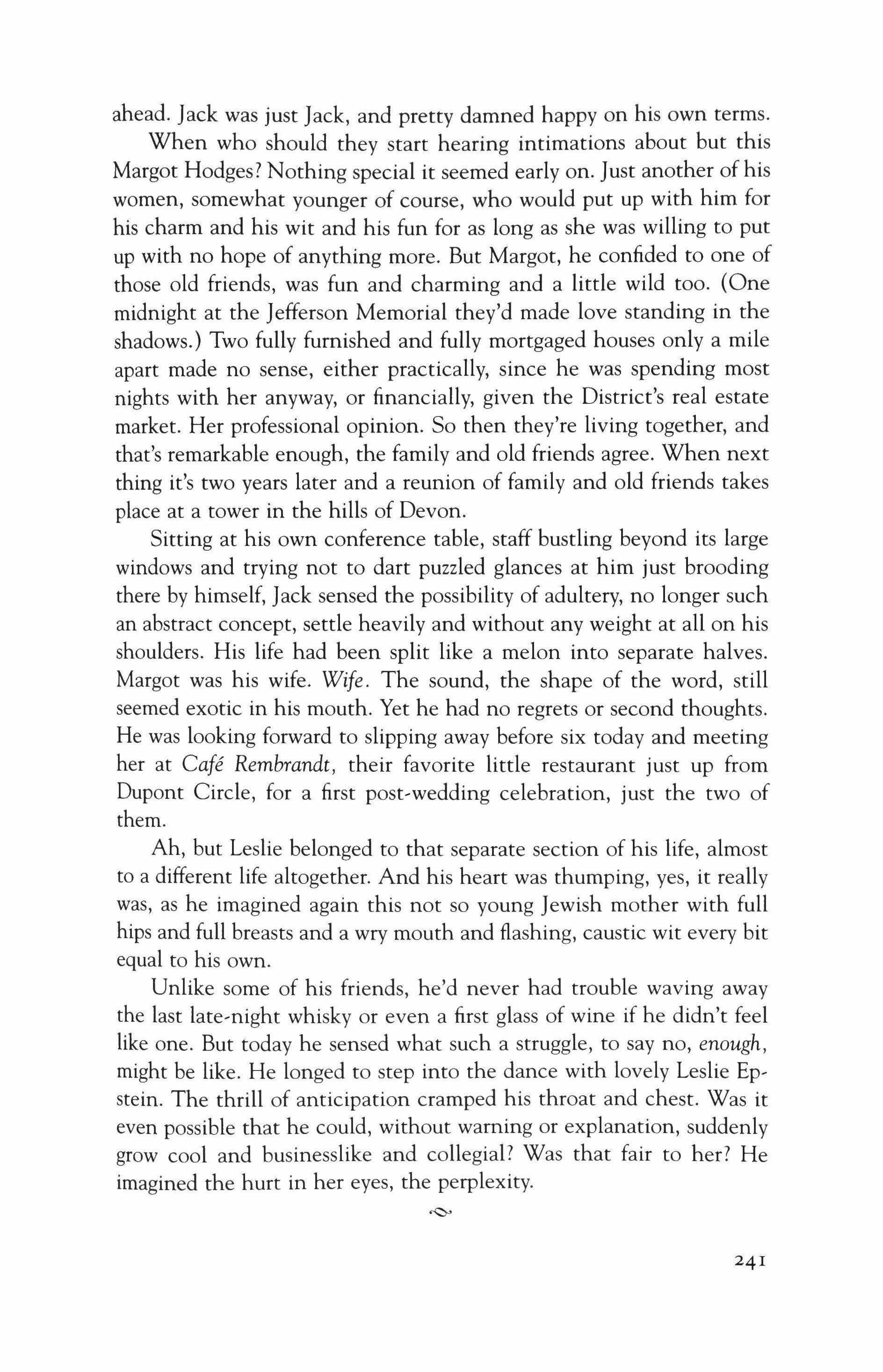
ahead. Jack was just Jack, and pretty damned happy on his own terms. When who should they start hearing intimations about but this Margot Hodges? Nothing special it seemed early on. Just another of his women, somewhat younger of course, who would put up with him for his charm and his wit and his fun for as long as she was willing to put up with no hope of anything more. But Margot, he confided to one of those old friends, was fun and charming and a little wild too. (One midnight at the Jefferson Memorial they'd made love standing in the shadows.) Two fully furnished and fully mortgaged houses only a mile apart made no sense, either practically, since he was spending most nights with her anyway, or financially, given the District's real estate market. Her professional opinion. So then they're living together, and that's remarkable enough, the family and old friends agree. When next thing it's two years later and a reunion of family and old friends takes place at a tower in the hills of Devon.
Sitting at his own conference table, staff bustling beyond its large windows and trying not to dart puzzled glances at him just brooding there by himself, Jack sensed the possibility of adultery, no longer such an abstract concept, settle heavily and without any weight at all on his shoulders. His life had been split like a melon into separate halves. Margot was his wife. Wife. The sound, the shape of the word, still seemed exotic in his mouth. Yet he had no regrets or second thoughts. He was looking forward to slipping away before six today and meeting her at Cafe Rembrandt, their favorite little restaurant just up from Dupont Circle, for a first post-wedding celebration, just the two of them.
Ah, but Leslie belonged to that separate section of his life, almost to a different life altogether. And his heart was thumping, yes, it really was, as he imagined again this not so young Jewish mother with full hips and full breasts and a wry mouth and flashing, caustic wit every bit equal to his own.
Unlike some of his friends, he'd never had trouble waving away the last late-night whisky or even a first glass of wine if he didn't feel like one. But today he sensed what such a struggle, to say no, enough, might be like. He longed to step into the dance with lovely Leslie Epstein. The thrill of anticipation cramped his throat and chest. Was it even possible that he could, without warning or explanation, suddenly grow cool and businesslike and collegial? Was that fair to her? He imagined the hurt in her eyes, the perplexity. �

"Two days gone and you're already checking up on me? Not a lot of faith there, Jack."
"Women don't throw their backs out. Middle-aged men, we're the one's supposed to suffer. So I figure you've been partying too wild over the weekend. Now you're paying, aren't you, on company time?"
"Yeah, that's me all right," Leslie laughed and then gasped into the receiver with pain. "Partying. A five-year-old tugging my sleeve. Her sister about to push a bowl of cereal off the table. One quick lunge to save it and a beanie baby underfoot. Next thing you know I'm flat on the floor and now I'm flat in bed. Boy, Jack, you sure nailed it-we've had some out-of-control fun around here."
"Here's the thing though." Jack tried to keep his jocular tone. "With you not in the office, I'm finding myself thinking about you." This was true. Two days gone in the middle of the week and she was haunting him. Not like on weekends. On weekends he'd be home or cycling with Margot. His life had its regular rhythms, and Leslie had thrown them all off. Two days missing from the office and he couldn't stop thinking of her.
"It's sweet you miss me. Let me guess-Sarah McElroy's screwing up in claims again?"
"No, dammit, she's done fine. We haven't missed a beat with you gone on holiday."
"Holiday."
"I've missed you."
"Jack?"
"Yeah, well there you have it," he snapped angrily.
"Jesus, Jack."
"Jesus yourself." He slammed the receiver down, ashamed and dissatisfied. But at least he'd gotten it off his chest. He felt relieved too. He could get back to work, back to selling insurance, slightly muted perhaps, but back to work.
What would she do now? he wondered even has he strode out to his secretary's desk. Quit? Spread the word around the office? Denounce him to Margot? Would her husband Harry confront him in the parking lot? Relieved, yes, but worried too and, yes, excited, he checked the appointment book to see what came next on his schedule.
Not Honolulu this time, not Las Vegas, not even the mineral springs resort up in the West Virginia mountains they'd taken over once before. Inexplicably-because it was hardly saving any money in the bar-
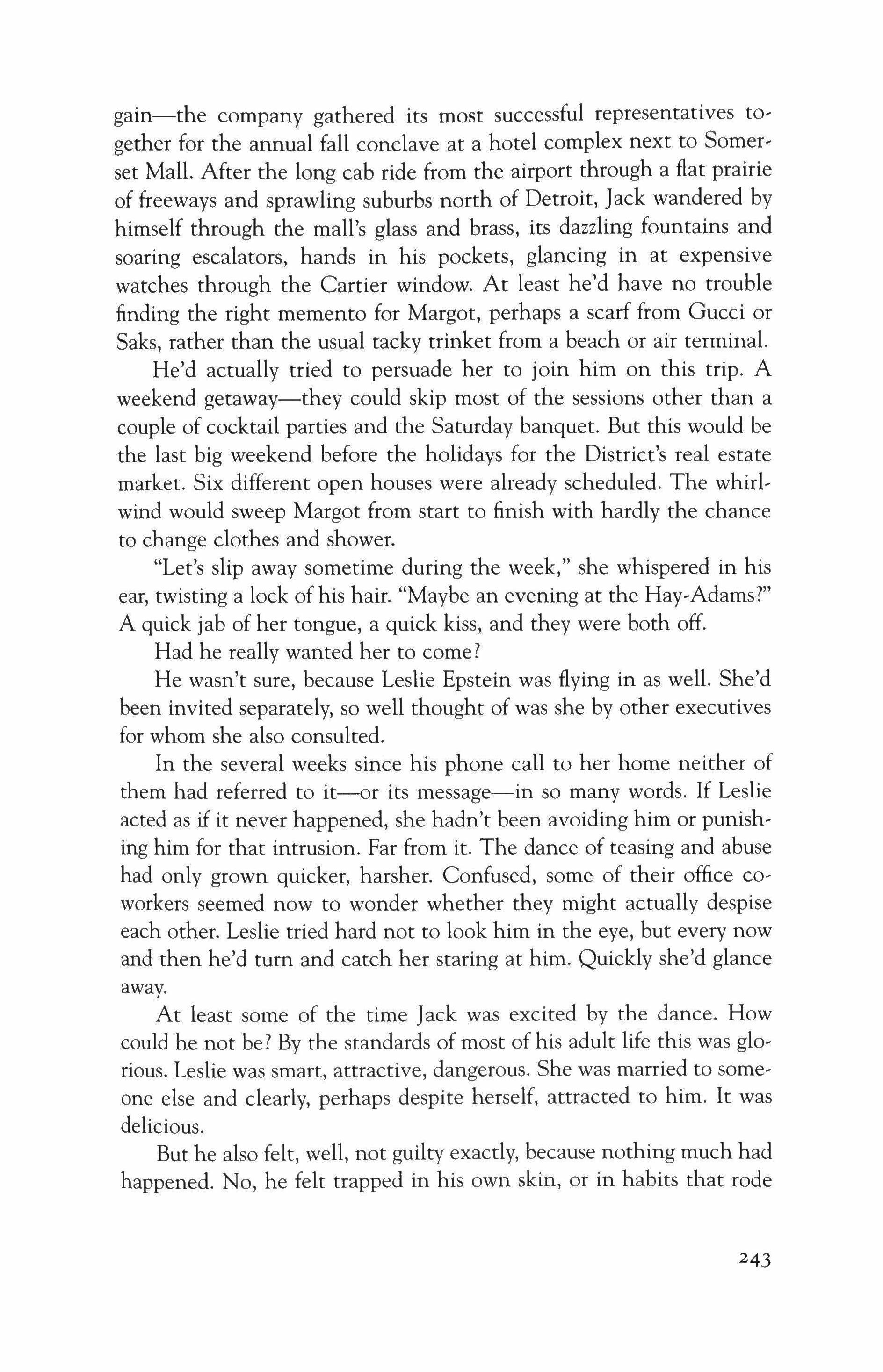
gain-the company gathered its most successful representatives together for the annual fall conclave at a hotel complex next to Somerset Mall. After the long cab ride from the airport through a flat prairie of freeways and sprawling suburbs north of Detroit, Jack wandered by himself through the mall's glass and brass, its dazzling fountains and soaring escalators, hands in his pockets, glancing in at expensive watches through the Cartier window. At least he'd have no trouble finding the right memento for Margot, perhaps a scarf from Oucci or Saks, rather than the usual tacky trinket from a beach or air terminal.
He'd actually tried to persuade her to join him on this trip. A weekend getaway-they could skip most of the sessions other than a couple of cocktail parties and the Saturday banquet. But this would be the last big weekend before the holidays for the District's real estate market. Six different open houses were already scheduled. The whirlwind would sweep Margot from start to finish with hardly the chance to change clothes and shower.
"Let's slip away sometime during the week," she whispered in his ear, twisting a lock of his hair. "Maybe an evening at the Hay-Adams?" A quick jab of her tongue, a quick kiss, and they were both off.
Had he really wanted her to come?
He wasn't sure, because Leslie Epstein was flying in as well. She'd been invited separately, so well thought of was she by other executives for whom she also consulted.
In the several weeks since his phone call to her home neither of them had referred to it-or its message-in so many words. If Leslie acted as if it never happened, she hadn't been avoiding him or punishing him for that intrusion. Far from it. The dance of teasing and abuse had only grown quicker, harsher. Confused, some of their office coworkers seemed now to wonder whether they might actually despise each other. Leslie tried hard not to look him in the eye, but every now and then he'd turn and catch her staring at him. Quickly she'd glance away.
At least some of the time Jack was excited by the dance. How could he not be? By the standards of most of his adult life this was glorious. Leslie was smart, attractive, dangerous. She was married to someone else and clearly, perhaps despite herself, attracted to him. It was delicious.
But he also felt, well, not guilty exactly, because nothing much had happened. No, he felt trapped in his own skin, or in habits that rode
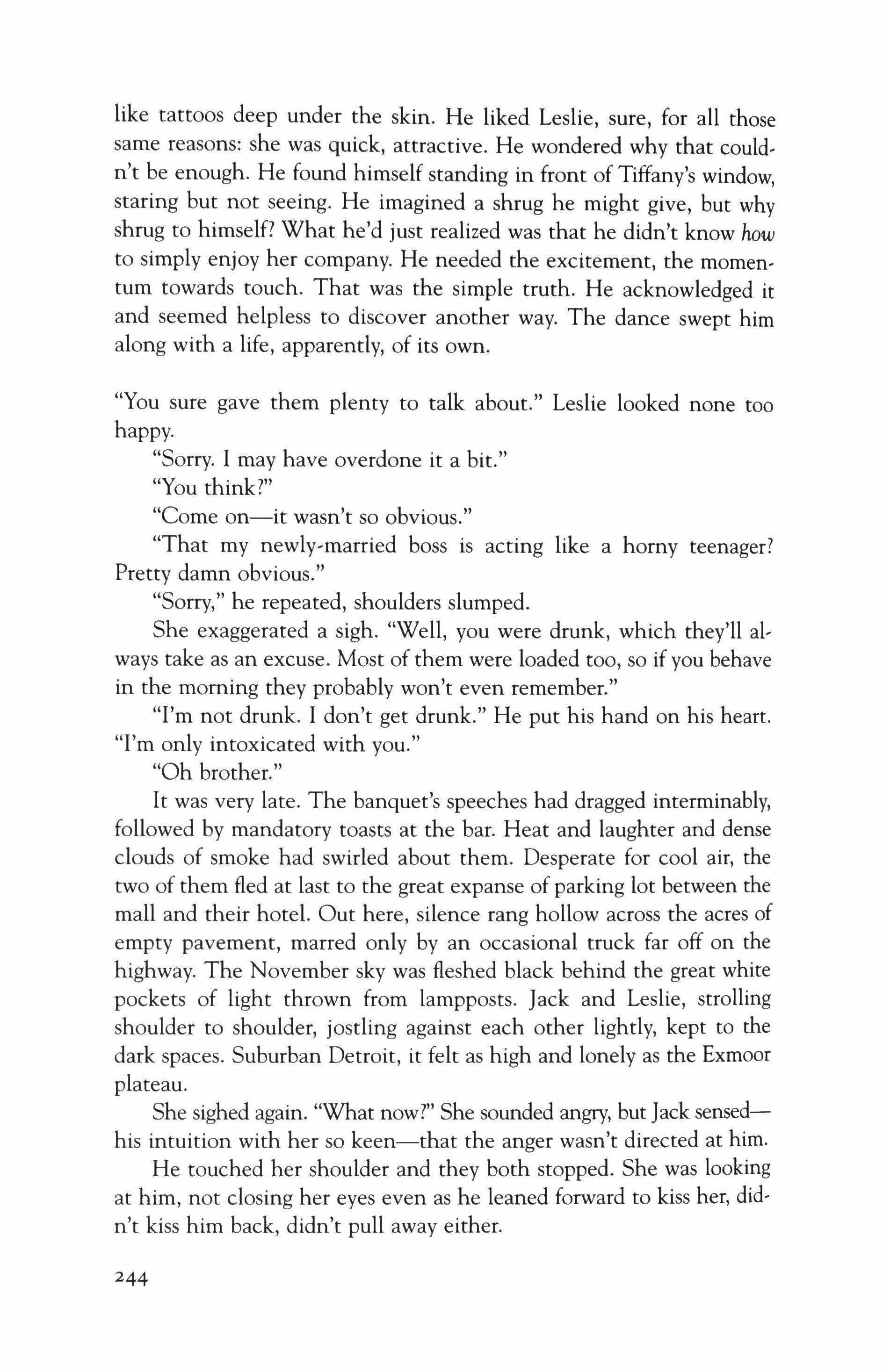
like tattoos deep under the skin. He liked Leslie, sure, for all those same reasons: she was quick, attractive. He wondered why that couldn't be enough. He found himself standing in front of Tiffany's window, staring but not seeing. He imagined a shrug he might give, but why shrug to himself? What he'd just realized was that he didn't know how to simply enjoy her company. He needed the excitement, the momentum towards touch. That was the simple truth. He acknowledged it and seemed helpless to discover another way. The dance swept him along with a life, apparently, of its own.
"You sure gave them plenty to talk about." Leslie looked none too happy.
"Sorry. I may have overdone it a bit."
"You think?"
"Come on-it wasn't so obvious."
"That my newly-married boss is acting like a horny teenager? Pretty damn obvious."
"Sorry," he repeated, shoulders slumped. She exaggerated a sigh. "Well, you were drunk, which they'll always take as an excuse. Most of them were loaded too, so if you behave in the morning they probably won't even remember."
"I'm not drunk. I don't get drunk." He put his hand on his heart. "I'm only intoxicated with you."
"Oh brother."
It was very late. The banquet's speeches had dragged interminably, followed by mandatory toasts at the bar. Heat and laughter and dense clouds of smoke had swirled about them. Desperate for cool air, the two of them fled at last to the great expanse of parking lot between the mall and their hotel. Out here, silence rang hollow across the acres of empty pavement, marred only by an occasional truck far off on the highway. The November sky was fleshed black behind the great white pockets of light thrown from lampposts. Jack and Leslie, strolling shoulder to shoulder, jostling against each other lightly, kept to the dark spaces. Suburban Detroit, it felt as high and lonely as the Exmoor plateau.
She sighed again. "What now?" She sounded angry, but Jack sensedhis intuition with her so keen-that the anger wasn't directed at him. He touched her shoulder and they both stopped. She was looking at him, not closing her eyes even as he leaned forward to kiss her, didn't kiss him back, didn't pull away either.

"You're just married," she said. "What about Margot? I like Margot." This was new. He didn't like it. "That's for me to deal with. Not you."
She shook her head.
Disoriented on this end, he knew he'd stumbled.
Perhaps because he was concentrating on the way her mouth tightened, he didn't notice the car until it was almost upon them. The rough roar seemed to swell out of nowhere. Startled, Jack stumbled as an ancient Camaro jerked up only inches from his hip. It bobbed for an instant like a rusty doll. Out jumped two teenage boys, one brandishing a tire iron.
Jack and Leslie weren't frozen. They'd fallen back a step towards the hotel. And Jack was already reaching for his hip pocket when the shorter white boy with dreadlocks shouted at him. "Your wallet. Give it up."
"Okay," said Jack.
The taller one was only a couple feet away, waving the iron. He couldn't have been more than fifteen. Even in the dim light his skin flared a full riot of acne. He looked edgy and spooked. "Come on, man, don't shit with us." He waggled the iron.
Jack was trying, he was tugging at the wallet. It held nothing he couldn't afford to surrender. But out of habit he'd buttoned the pocket, and his fumbling fingers couldn't push it open. He twisted at it, he struggled. At last the button popped off, pinging faintly on the pavement. But now the wallet itself resisted. It snagged and twisted in the lining. Leslie wasn't helping. Tucked up close, she was bumping against him. And they were both still edging away as the two boys pressed at them. Their breath was foul with beer.
"Fuck, man," shrieked the smaller boy, "give us the fucking money."
"I'm trying," shouted Jack.
As if this were a final, intolerable defiance, the other boy flailed at him with the iron rod. Jack raised his arm. The rod glanced off, missed his jaw, struck him in the chest. Scared and angry, he wasn't aware of pain. "Police," he shouted.
"Help. Police," screamed Leslie, taking the cue.
They were in full retreat now, the two of them, skating longer strides towards the perimeter of light thrown from the hotel. The car had swerved into them from the wrong side to begin with, and the boys, foolishly, failed to circle or cut them off. "Help. Police," cried Jack.
Instead of charging at him again, the scrawny boy fell back, his eyes wide with surprise and confusion, the iron still hoisted halfheart-
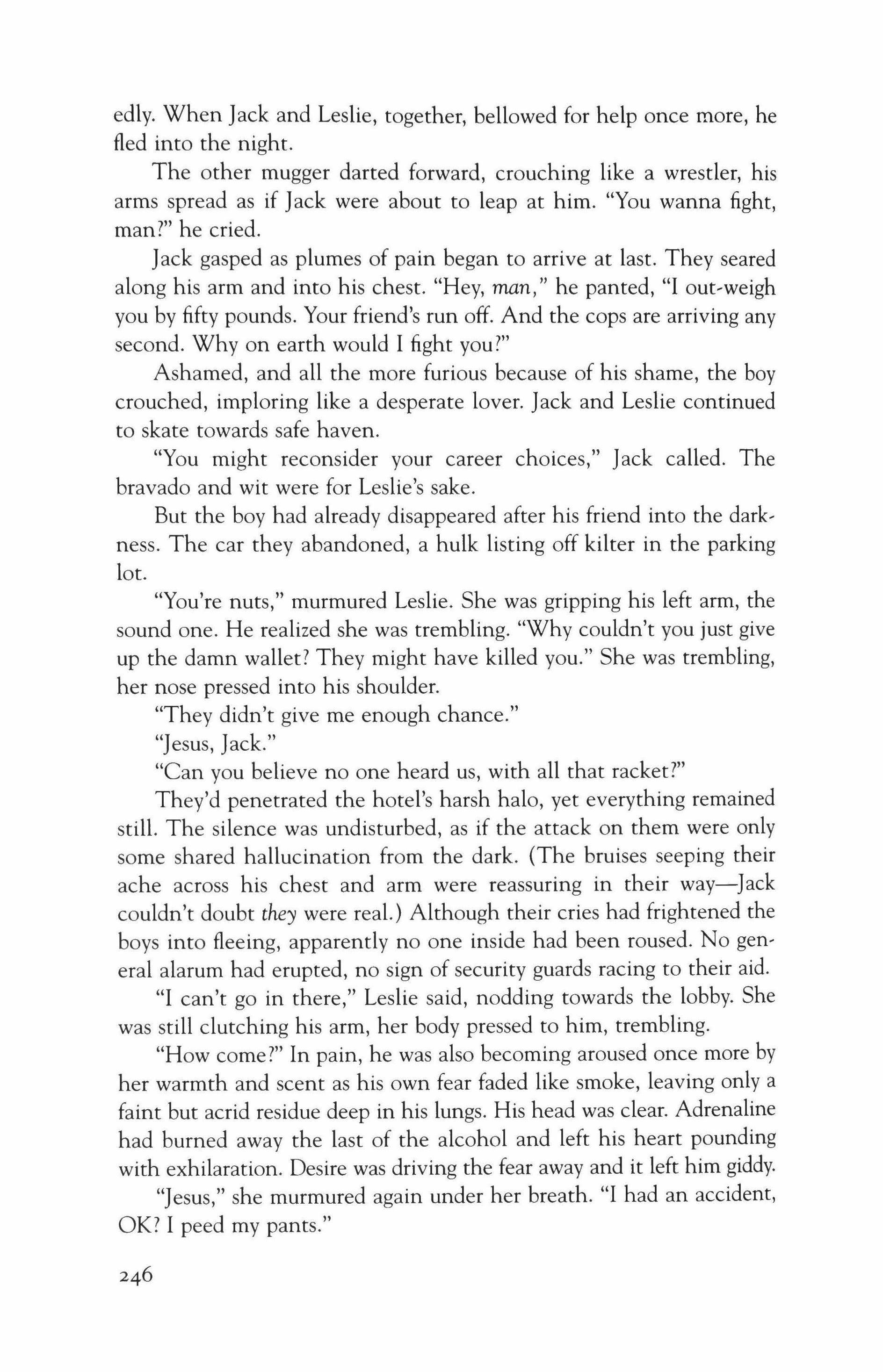
edly. When Jack and Leslie, together, bellowed for help once more, he fled into the night.
The other mugger darted forward, crouching like a wrestler, his arms spread as if Jack were about to leap at him. "You wanna fight, man?" he cried.
Jack gasped as plumes of pain began to arrive at last. They seared along his arm and into his chest. "Hey, man," he panted, "I out-weigh you by fifty pounds. Your friend's run off. And the cops are arriving any second. Why on earth would I fight you?"
Ashamed, and all the more furious because of his shame, the boy crouched, imploring like a desperate lover. Jack and Leslie continued to skate towards safe haven.
"You might reconsider your career choices," Jack called. The bravado and wit were for Leslie's sake.
But the boy had already disappeared after his friend into the dark, ness. The car they abandoned, a hulk listing off kilter in the parking lot.
"You're nuts," murmured Leslie. She was gripping his left arm, the sound one. He realized she was trembling. "Why couldn't you just give up the damn wallet? They might have killed you." She was trembling, her nose pressed into his shoulder.
"They didn't give me enough chance."
"Jesus, Jack."
"Can you believe no one heard us, with all that racket?"
They'd penetrated the hotel's harsh halo, yet everything remained still. The silence was undisturbed, as if the attack on them were only some shared hallucination from the dark. (The bruises seeping their ache across his chest and arm were reassuring in their way-Jack couldn't doubt they were real.) Although their cries had frightened the boys into fleeing, apparently no one inside had been roused. No general alarum had erupted, no sign of security guards racing to their aid.
"I can't go in there," Leslie said, nodding towards the lobby. She was still clutching his arm, her body pressed to him, trembling.
"How come?" In pain, he was also becoming aroused once more by her warmth and scent as his own fear faded like smoke, leaving only a faint but acrid residue deep in his lungs. His head was clear. Adrenaline had burned away the last of the alcohol and left his heart pounding with exhilaration. Desire was driving the fear away and it left him giddy.
"Jesus," she murmured again under her breath. "I had an accident, OK? I peed my pants."
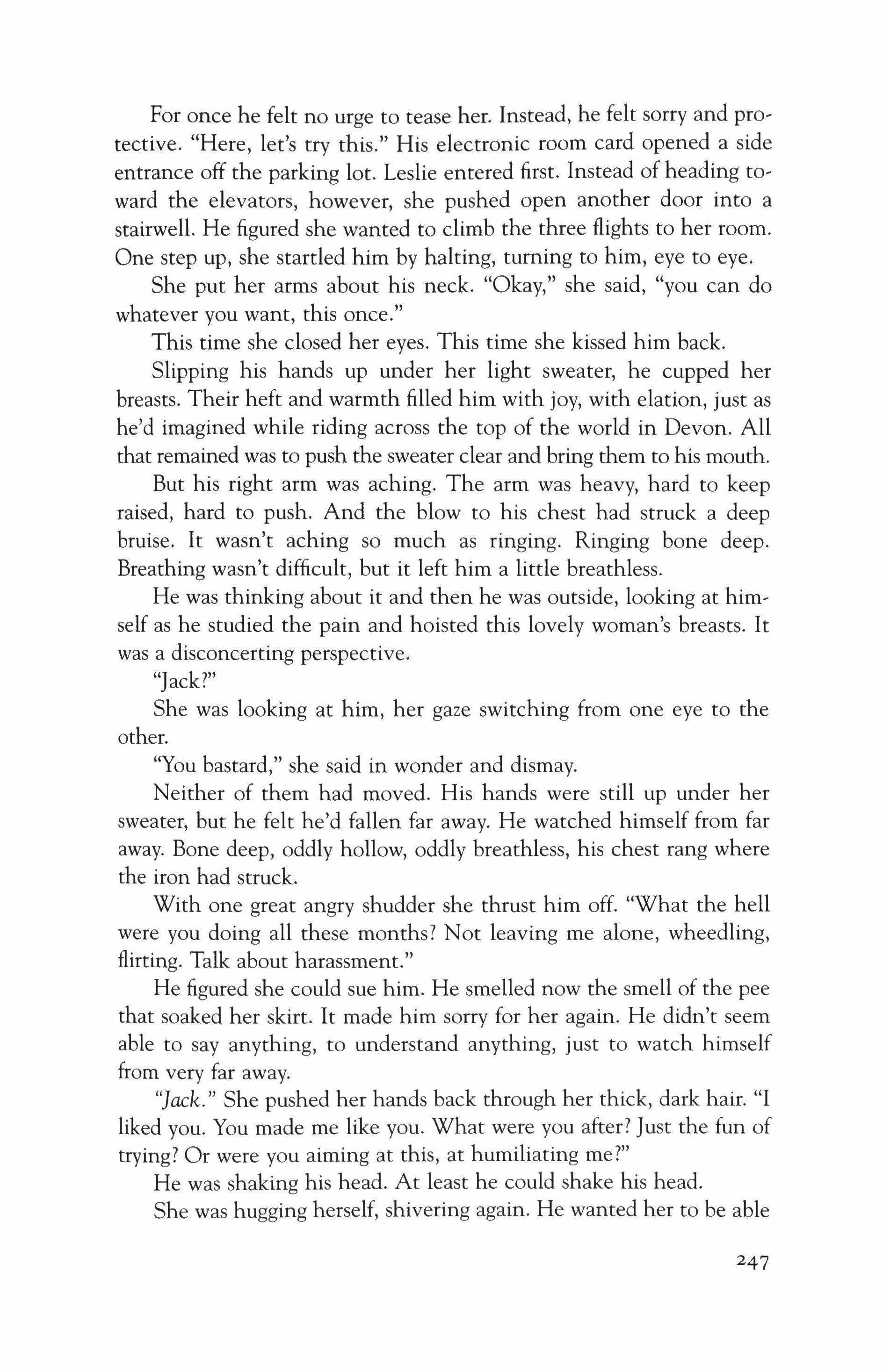
For once he felt no urge to tease her. Instead, he felt sorry and protective. "Here, let's try this." His electronic room card opened a side entrance off the parking lot. Leslie entered first. Instead of heading toward the elevators, however, she pushed open another door into a stairwell. He figured she wanted to climb the three flights to her room. One step up, she startled him by halting, turning to him, eye to eye.
She put her arms about his neck. "Okay," she said, "you can do whatever you want, this once."
This time she closed her eyes. This time she kissed him back.
Slipping his hands up under her light sweater, he cupped her breasts. Their heft and warmth filled him with joy, with elation, just as he'd imagined while riding across the top of the world in Devon. All that remained was to push the sweater clear and bring them to his mouth.
But his right arm was aching. The arm was heavy, hard to keep raised, hard to push. And the blow to his chest had struck a deep bruise. It wasn't aching so much as ringing. Ringing bone deep. Breathing wasn't difficult, but it left him a little breathless.
He was thinking about it and then he was outside, looking at himself as he studied the pain and hoisted this lovely woman's breasts. It was a disconcerting perspective.
"Jack?"
She was looking at him, her gaze switching from one eye to the other.
"You bastard," she said in wonder and dismay.
Neither of them had moved. His hands were still up under her sweater, but he felt he'd fallen far away. He watched himself from far away. Bone deep, oddly hollow, oddly breathless, his chest rang where the iron had struck.
With one great angry shudder she thrust him off. "What the hell were you doing all these months? Not leaving me alone, wheedling, flirting. Talk about harassment."
He figured she could sue him. He smelled now the smell of the pee that soaked her skirt. It made him sorry for her again. He didn't seem able to say anything, to understand anything, just to watch himself from very far away.
"Jack." She pushed her hands back through her thick, dark hair. "I liked you. You made me like you. What were you after? Just the fun of trying? Or were you aiming at this, at humiliating me?"
He was shaking his head. At least he could shake his head.
She was hugging herself, shivering again. He wanted her to be able

to grab his arm, to ground herself against him so that she could stop shaking. He could see the same wish in her eyes. And it was impossible. Without another word, she turned and climbed the stairs as quickly as her heels allowed.
Jack didn't move. His chest rang. He was watching.
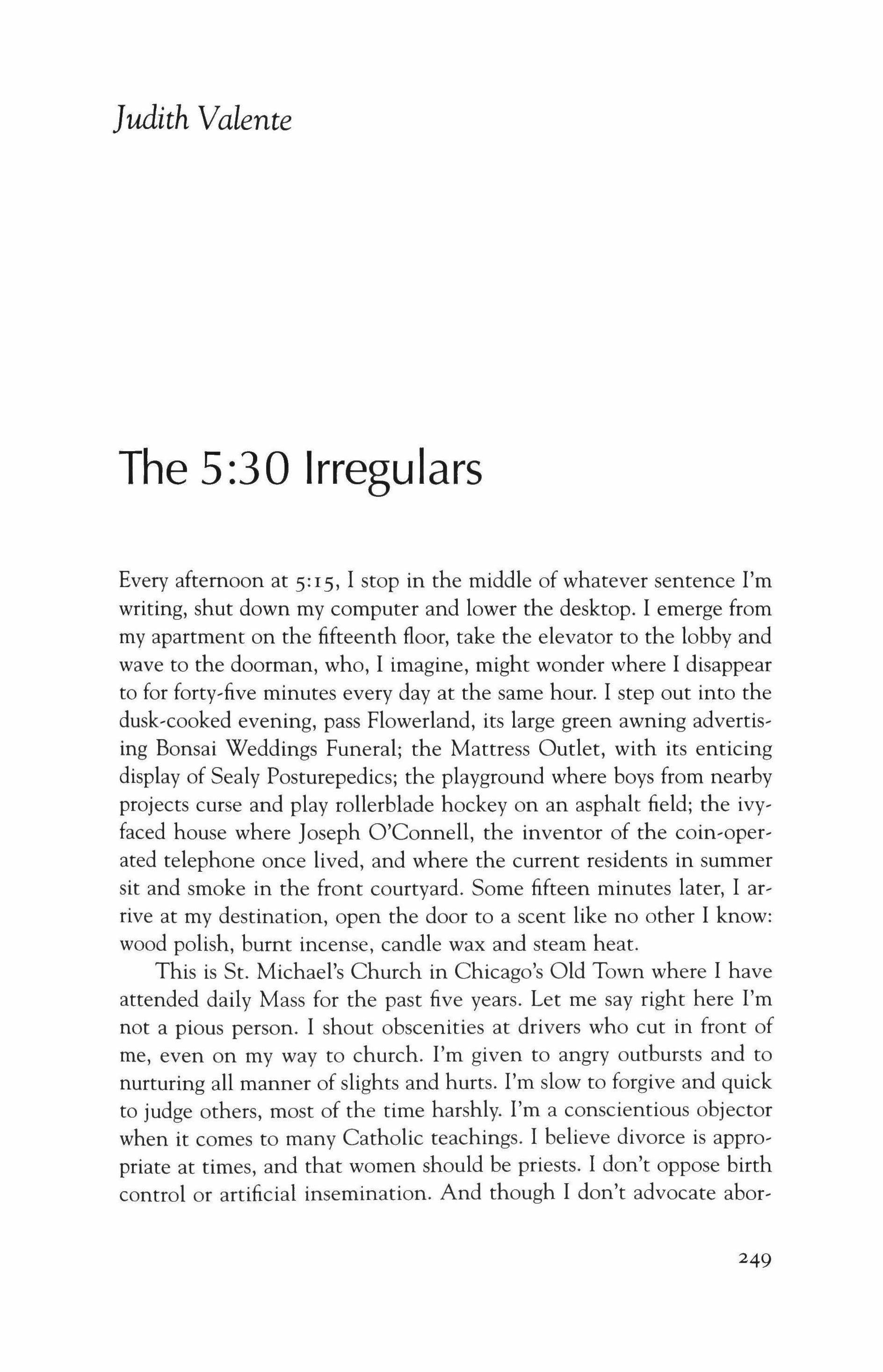
Every afternoon at 5:15, I stop in the middle of whatever sentence I'm writing, shut down my computer and lower the desktop. I emerge from my apartment on the fifteenth floor, take the elevator to the lobby and wave to the doorman, who, I imagine, might wonder where I disappear to for forty-five minutes every day at the same hour. I step out into the dusk-cooked evening, pass Flowerland, its large green awning advertising Bonsai Weddings Funeral; the Mattress Outlet, with its enticing display of Sealy Posturepedics; the playground where boys from nearby projects curse and play rollerblade hockey on an asphalt field; the ivyfaced house where Joseph O'Connell, the inventor of the coin-operated telephone once lived, and where the current residents in summer sit and smoke in the front courtyard. Some fifteen minutes later, I arrive at my destination, open the door to a scent like no other I know: wood polish, burnt incense, candle wax and steam heat.
This is St. Michael's Church in Chicago's Old Town where I have attended daily Mass for the past five years. Let me say right here I'm not a pious person. I shout obscenities at drivers who cut in front of me, even on my way to church. I'm given to angry outbursts and to nurturing all manner of slights and hurts. I'm slow to forgive and quick to judge others, most of the time harshly. I'm a conscientious objector when it comes to many Catholic teachings. I believe divorce is appropriate at times, and that women should be priests. I don't oppose birth control or artificial insemination. And though I don't advocate abor-
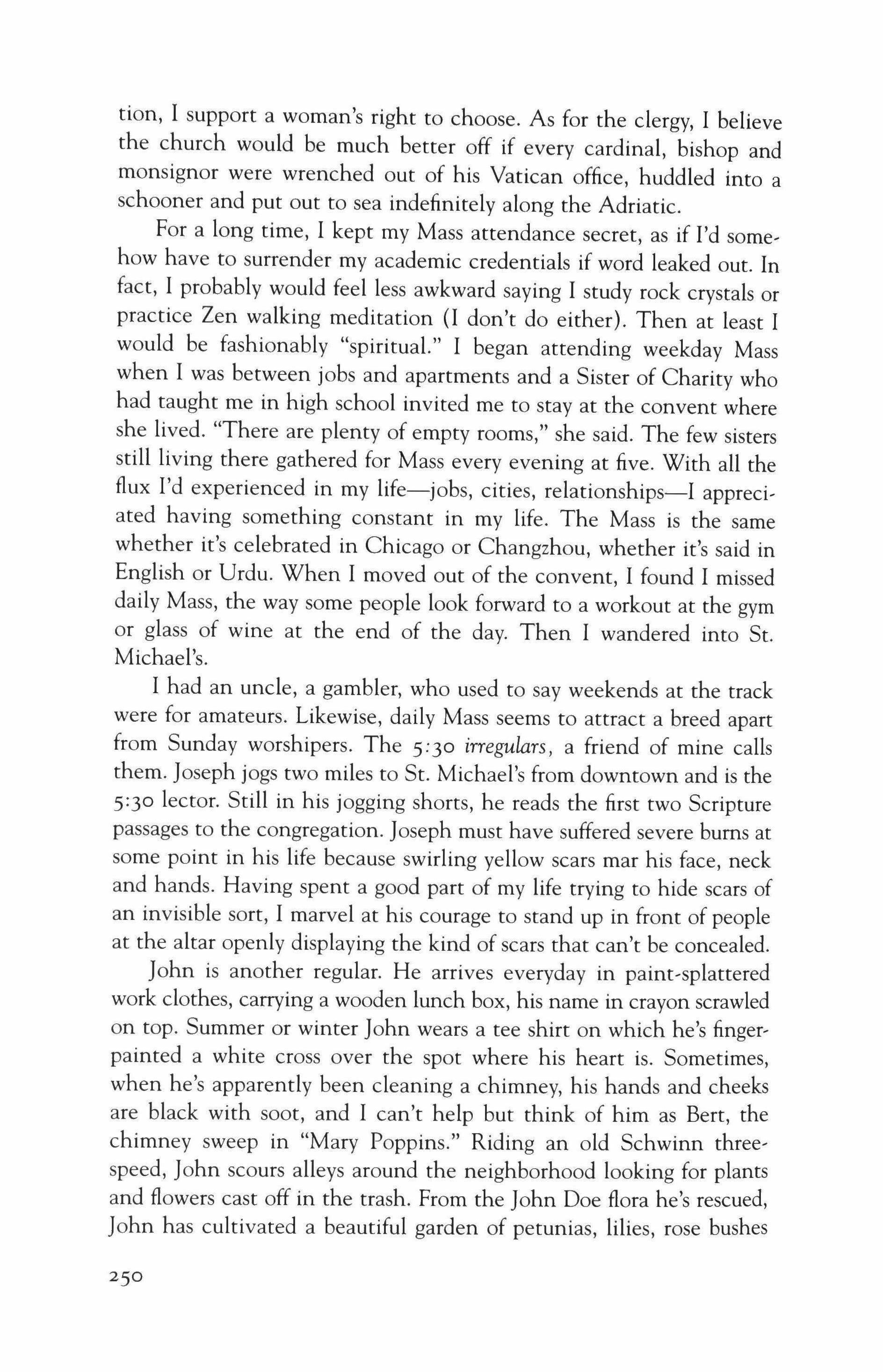
tion, I support a woman's right to choose. As for the clergy, I believe the church would be much better off if every cardinal, bishop and monsignor were wrenched out of his Vatican office, huddled into a schooner and put out to sea indefinitely along the Adriatic.
For a long time, I kept my Mass attendance secret, as if I'd somehow have to surrender my academic credentials if word leaked out. In fact, I probably would feel less awkward saying I study rock crystals or practice Zen walking meditation (l don't do either). Then at least I would be fashionably "spiritual." I began attending weekday Mass when I was between jobs and apartments and a Sister of Charity who had taught me in high school invited me to stay at the convent where she lived. "There are plenty of empty rooms," she said. The few sisters still living there gathered for Mass every evening at five. With all the flux I'd experienced in my life-jobs, cities, relationships-I appreciated having something constant in my life. The Mass is the same whether it's celebrated in Chicago or Changzhou, whether it's said in English or Urdu. When I moved out of the convent, I found I missed daily Mass, the way some people look forward to a workout at the gym or glass of wine at the end of the day. Then I wandered into St. Michael's.
I had an uncle, a gambler, who used to say weekends at the track were for amateurs. Likewise, daily Mass seems to attract a breed apart from Sunday worshipers. The 5: 30 irregulars, a friend of mine calls them. Joseph jogs two miles to St. Michael's from downtown and is the 5:30 lector. Still in his jogging shorts, he reads the first two Scripture passages to the congregation. Joseph must have suffered severe bums at some point in his life because swirling yellow scars mar his face, neck and hands. Having spent a good part of my life trying to hide scars of an invisible sort, I marvel at his courage to stand up in front of people at the altar openly displaying the kind of scars that can't be concealed.
John is another regular. He arrives everyday in paint-splattered work clothes, carrying a wooden lunch box, his name in crayon scrawled on top. Summer or winter John wears a tee shirt on which he's fingerpainted a white cross over the spot where his heart is. Sometimes, when he's apparently been cleaning a chimney, his hands and cheeks are black with soot, and I can't help but think of him as Bert, the chimney sweep in "Mary Poppins." Riding an old Schwinn threespeed, John scours alleys around the neighborhood looking for plants and flowers cast off in the trash. From the John Doe flora he's rescued, John has cultivated a beautiful garden of petunias, lilies, rose bushes
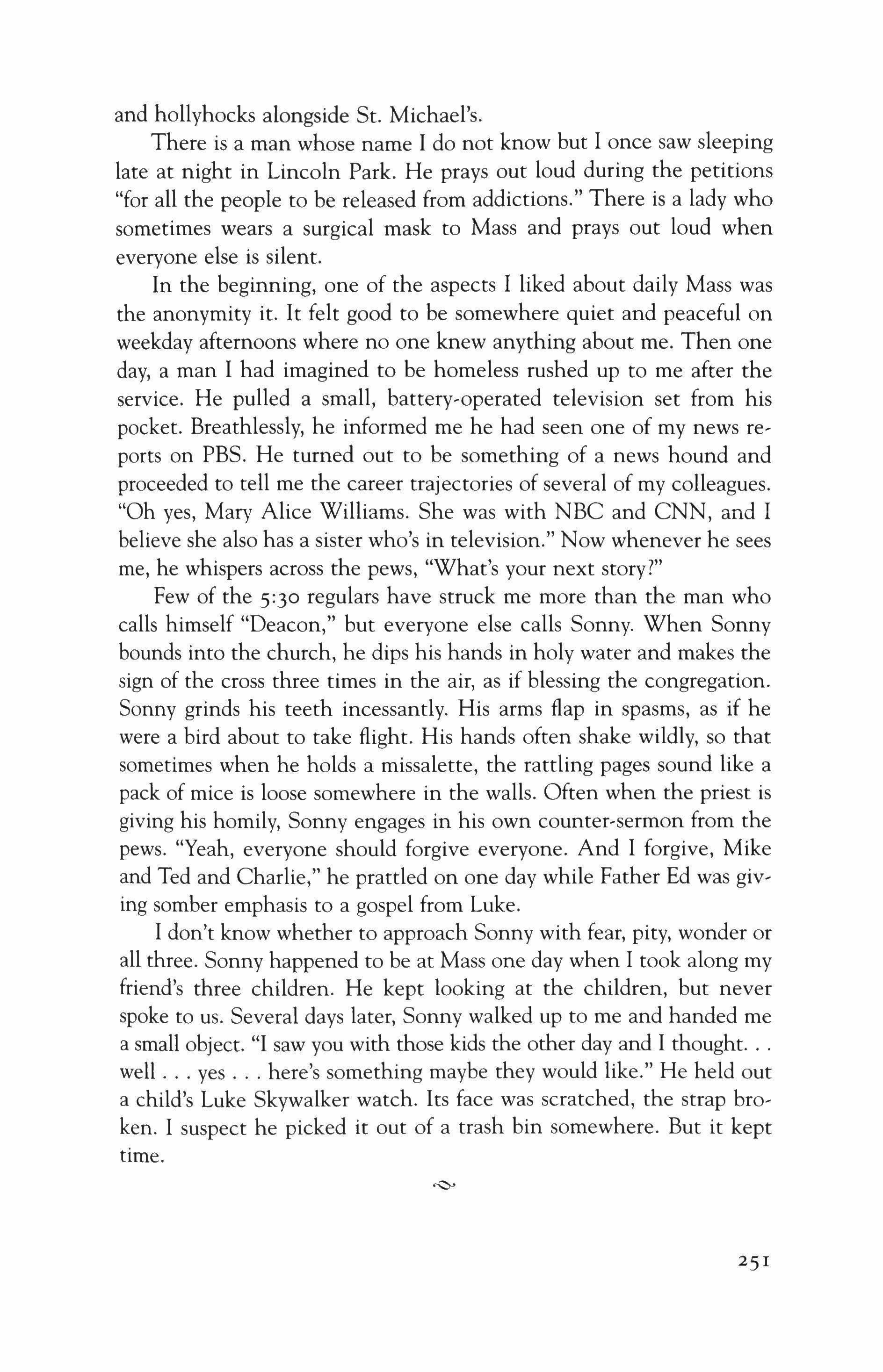
and hollyhocks alongside St. Michael's.
There is a man whose name I do not know but I once saw sleeping late at night in Lincoln Park. He prays out loud during the petitions "for all the people to be released from addictions." There is a lady who sometimes wears a surgical mask to Mass and prays out loud when everyone else is silent.
In the beginning, one of the aspects I liked about daily Mass was the anonymity it. It felt good to be somewhere quiet and peaceful on weekday afternoons where no one knew anything about me. Then one day, a man I had imagined to be homeless rushed up to me after the service. He pulled a small, battery-operated television set from his pocket. Breathlessly, he informed me he had seen one of my news reports on PBS. He turned out to be something of a news hound and proceeded to tell me the career trajectories of several of my colleagues. "Oh yes, Mary Alice Williams. She was with NBC and CNN, and I believe she also has a sister who's in television." Now whenever he sees me, he whispers across the pews, "What's your next story!"
Few of the 5:30 regulars have struck me more than the man who calls himself "Deacon," but everyone else calls Sonny. When Sonny bounds into the church, he dips his hands in holy water and makes the sign of the cross three times in the air, as if blessing the congregation. Sonny grinds his teeth incessantly. His arms flap in spasms, as if he were a bird about to take flight. His hands often shake wildly, so that sometimes when he holds a missalette, the rattling pages sound like a pack of mice is loose somewhere in the walls. Often when the priest is giving his homily, Sonny engages in his own counter-sermon from the pews. "Yeah, everyone should forgive everyone. And I forgive, Mike and Ted and Charlie," he prattled on one day while Father Ed was giving somber emphasis to a gospel from Luke.
I don't know whether to approach Sonny with fear, pity, wonder or all three. Sonny happened to be at Mass one day when I took along my friend's three children. He kept looking at the children, but never spoke to us. Several days later, Sonny walked up to me and handed me a small object. "I saw you with those kids the other day and I thought well yes here's something maybe they would like." He held out a child's Luke Skywalker watch. Its face was scratched, the strap broken. I suspect he picked it out of a trash bin somewhere. But it kept time.
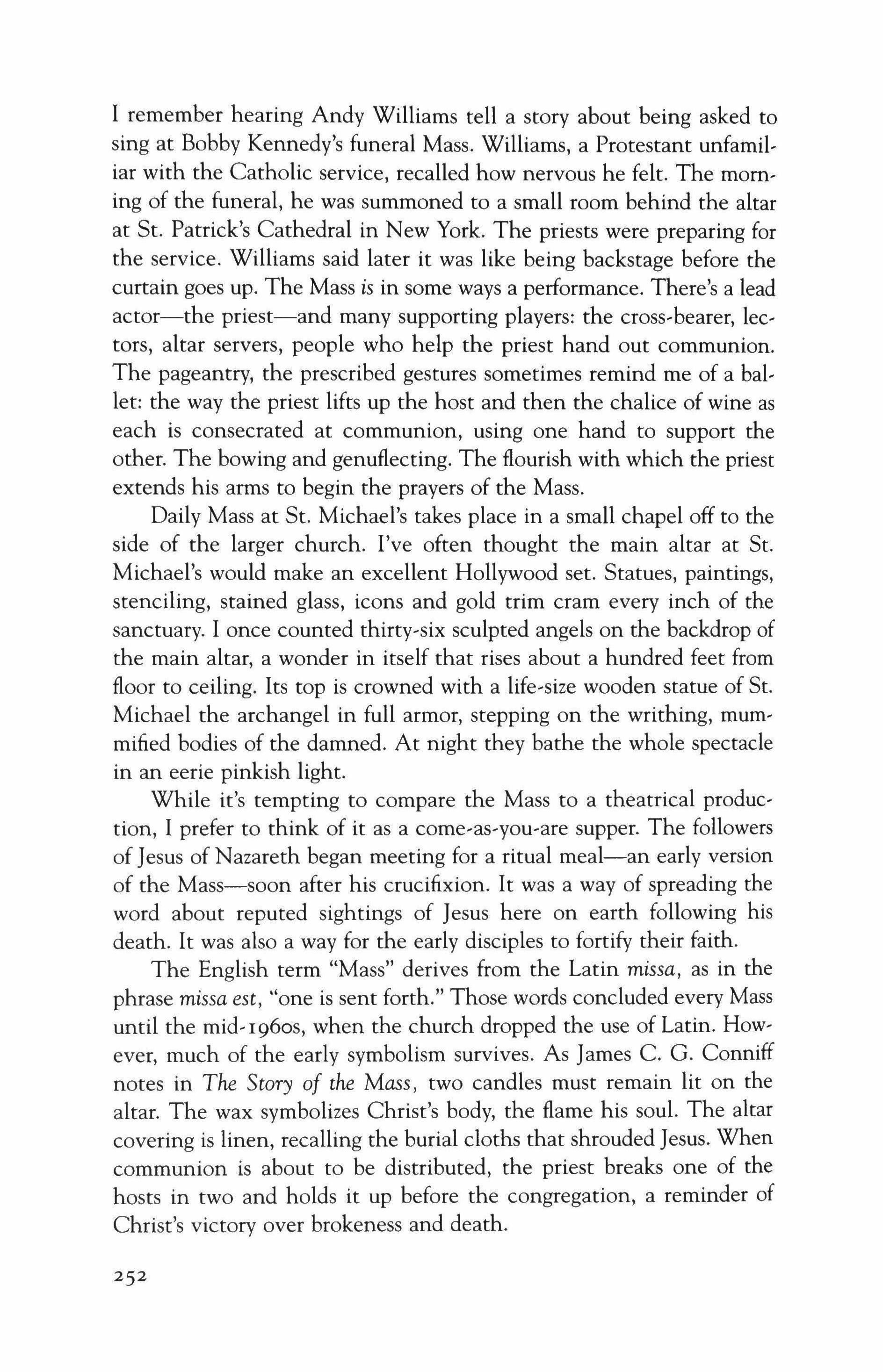
I remember hearing Andy Williams tell a story about being asked to sing at Bobby Kennedy's funeral Mass. Williams, a Protestant unfamiliar with the Catholic service, recalled how nervous he felt. The morning of the funeral, he was summoned to a small room behind the altar at St. Patrick's Cathedral in New York. The priests were preparing for the service. Williams said later it was like being backstage before the curtain goes up. The Mass is in some ways a performance. There's a lead actor-the priest-and many supporting players: the cross-bearer, lectors, altar servers, people who help the priest hand out communion. The pageantry, the prescribed gestures sometimes remind me of a ballet: the way the priest lifts up the host and then the chalice of wine as each is consecrated at communion, using one hand to support the other. The bowing and genuflecting. The flourish with which the priest extends his arms to begin the prayers of the Mass.
Daily Mass at St. Michael's takes place in a small chapel off to the side of the larger church. I've often thought the main altar at St. Michael's would make an excellent Hollywood set. Statues, paintings, stenciling, stained glass, icons and gold trim cram every inch of the sanctuary. I once counted thirty-six sculpted angels on the backdrop of the main altar, a wonder in itself that rises about a hundred feet from floor to ceiling. Its top is crowned with a life-size wooden statue of St. Michael the archangel in full armor, stepping on the writhing, mummified bodies of the damned. At night they bathe the whole spectacle in an eerie pinkish light.
While it's tempting to compare the Mass to a theatrical production, I prefer to think of it as a come-as-you-are supper. The followers of Jesus of Nazareth began meeting for a ritual meal-an early version of the Mass-soon after his crucifixion. It was a way of spreading the word about reputed sightings of Jesus here on earth following his death. It was also a way for the early disciples to fortify their faith.
The English term "Mass" derives from the Latin missa, as in the phrase missa est, "one is sent forth." Those words concluded every Mass until the mid-rooos, when the church dropped the use of Latin. However, much of the early symbolism survives. As James C. G. Conniff notes in The Story of the Mass, two candles must remain lit on the altar. The wax symbolizes Christ's body, the flame his soul. The altar covering is linen, recalling the burial cloths that shrouded Jesus. When communion is about to be distributed, the priest breaks one of the hosts in two and holds it up before the congregation, a reminder of Christ's victory over brokeness and death.
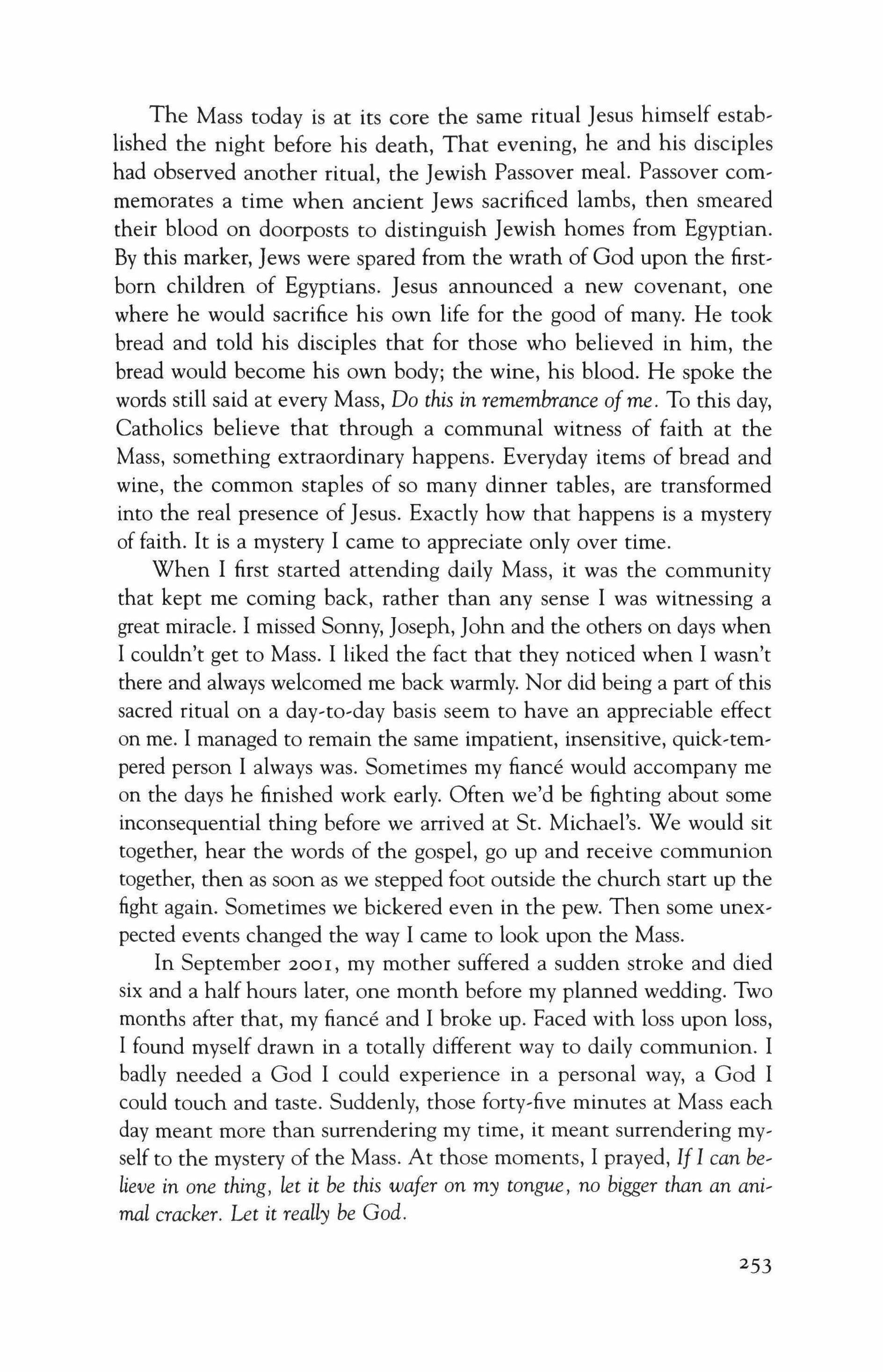
The Mass today is at its core the same ritual Jesus himself established the night before his death, That evening, he and his disciples had observed another ritual, the Jewish Passover meal. Passover com, memorates a time when ancient Jews sacrificed lambs, then smeared their blood on doorposts to distinguish Jewish homes from Egyptian. By this marker, Jews were spared from the wrath of God upon the first, born children of Egyptians. Jesus announced a new covenant, one where he would sacrifice his own life for the good of many. He took bread and told his disciples that for those who believed in him, the bread would become his own body; the wine, his blood. He spoke the words still said at every Mass, Do this in remembrance of me To this day, Catholics believe that through a communal witness of faith at the Mass, something extraordinary happens. Everyday items of bread and wine, the common staples of so many dinner tables, are transformed into the real presence of Jesus. Exactly how that happens is a mystery of faith. It is a mystery I came to appreciate only over time.
When I first started attending daily Mass, it was the community that kept me coming back, rather than any sense I was witnessing a great miracle. I missed Sonny, Joseph, John and the others on days when I couldn't get to Mass. I liked the fact that they noticed when I wasn't there and always welcomed me back warmly. Nor did being a part of this sacred ritual on a day-to-day basis seem to have an appreciable effect on me. I managed to remain the same impatient, insensitive, quick-ternpered person I always was. Sometimes my fiance would accompany me on the days he finished work early. Often we'd be fighting about some inconsequential thing before we arrived at St. Michael's. We would sit together, hear the words of the gospel, go up and receive communion together, then as soon as we stepped foot outside the church start up the fight again. Sometimes we bickered even in the pew. Then some unexpeeted events changed the way I came to look upon the Mass.
In September 2001, my mother suffered a sudden stroke and died six and a half hours later, one month before my planned wedding. Two months after that, my fiance and I broke up. Faced with loss upon loss, I found myself drawn in a totally different way to daily communion. I badly needed a God I could experience in a personal way, a God I could touch and taste. Suddenly, those forty-five minutes at Mass each day meant more than surrendering my time, it meant surrendering my' self to the mystery of the Mass. At those moments, I prayed, If I can be, lieve in one thing, let it be this wafer on my tongue, no bigger than an ani, mal cracker. Let it really be God.

Slowly, by measures, I have grown stronger. And though I could never in any intellectual way tell you why-not even if someone cocked a loaded gun to my head-I know a good part of that strength comes from my daily trek into this sacred landscape. After my fiance left me, I took a hard look at myself. I realized there were things about myself I had to change: my flash-point Italian temper, for one; my in, ability to see other viewpoints but my own, for another. There is a prayer just before communion that says: Lord I am not worthy that you should come under my roof but only say the word and I shall be healed.
It recalls the words of an impoverished father who begs Jesus to heal his ailing daughter. It's a prayer I never much paid attention to be' fore. Now I look forward to saying those words. I try to imagine my heart being healed, one day, one small piece at a time. Now I understand, perhaps for the first time in my life, why the early Greek converts to Christianity called the ritual of communion Eucharist: thanksgiving.
I have a new man in my life who I've come to love deeply, a "lapsed Catholic" who nonetheless accompanies me to Sunday Mass and occasionally daily services. Though we share many experiences and interests, I never feel closer to him than when we share the Eucharist together. The other day, he told me he could never explain it, but he feels the same way. He talked about the sense it gives him of reaching toward something larger than ourselves, a piece of the divine. I had to smile. I thought of something Flannery O'Connor, that quintessential skeptic, once said. Asked if she believed Jesus is truly present in the Eucharist, O'Connor shot back, "If it's not the real presence, then the hell with it."
I wish I could say the Mass is always a mystical experience. But we come together as a kind of family, and so are heir to the quirks and dvsfunctions that plague any family gathering. I find my patience tested when Sonny pops up and changes pews a half dozen times. When John cuts in front of other people to be the first to receive communion, like a kid fearing the candy store will run out. When someone swipes the roses from in front of the Virgin Mary's portrait. How can anyone steal from a church? Then I remember what Robert Frost said about family and apply that to the church: when you come, they have to take you in. At best, it's a place where writers and CEOs, half-crippled old people with canes, scarred men like Joseph and eccentrics like Sonny, are all equals.
On my way out of St. Michael's, I pass an icon of the Virgin Mary called "Our Mother of Perpetual Help." In the picture, Mary is hold,

ing her young son. Two angels float above his head. Jesus wears a somewhat startled expression, as if he's just seen an amazing sight and leapt into his mother's lap. A sandal dangles from his foot. The story has it that Jesus was so frightened by the sight of the angels that he raced to his mother's arms, nearly losing his shoe in the process. It's a picture I often stop to contemplate. Who isn't looking for a place to run to?

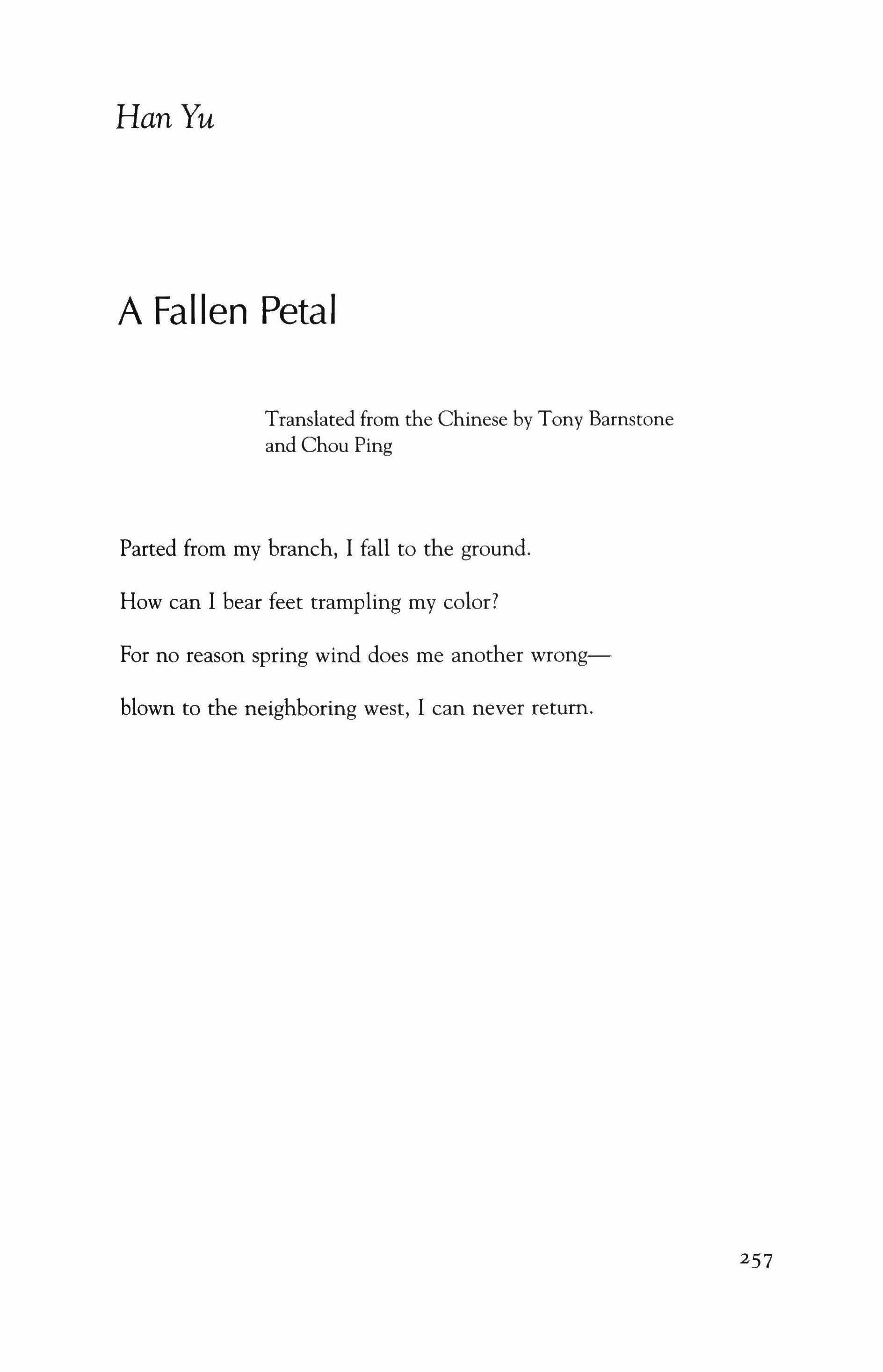
Translated from the Chinese by Tony Barnstone and Chou Ping
Parted from my branch, I fall to the ground.
How can I bear feet trampling my color?
For no reason spring wind does me another wrongblown to the neighboring west, I can never return.
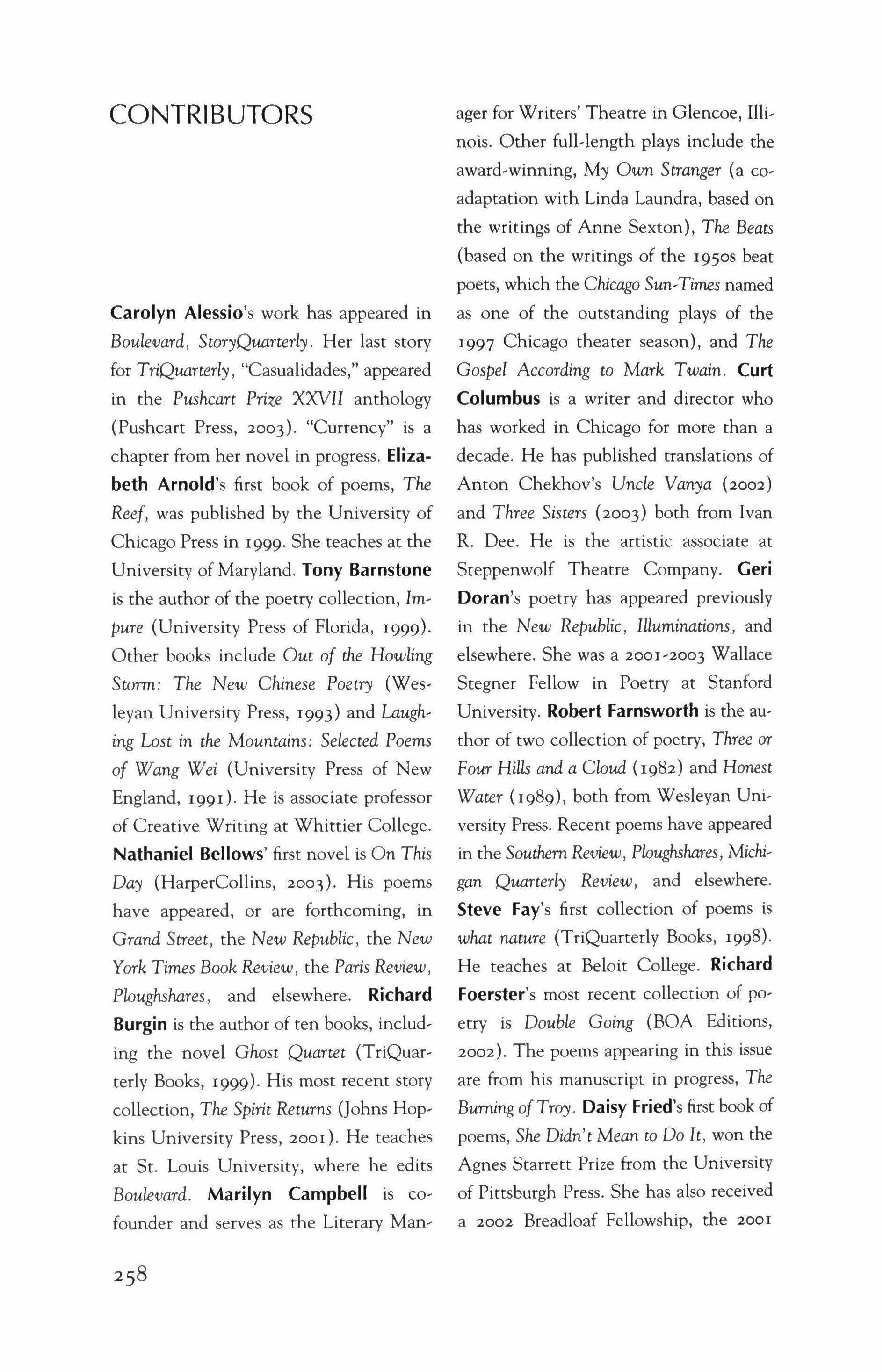
Carolyn Alessio's work has appeared in Boulevard, StoryQuarterly. Her last story for TriQuarterly, "Casualidades," appeared in the Pushcart Prize XXVII anthology (Pushcart Press, 2003). "Currency" is a chapter from her novel in progress. Elizabeth Arnold's first book of poems, The Reef, was published by the University of Chicago Press in 1999. She teaches at the University of Maryland. Tony Barnstone is the author of the poetry collection, Impure (University Press of Florida, 1999). Other books include Out of the Howling Storm: The New Chinese Poetry (Wesleyan University Press, 1993) and Laughing Lost in the Mountains: Selected Poems of Wang Wei (University Press of New England, 1991). He is associate professor of Creative Writing at Whittier College. Nathaniel Bellows' first novel is On This Day (HarperCollins, 2003). His poems have appeared, or are forthcoming, in Grand Street, the New Republic, the New York Times Book Review, the Paris Review, Ploughshares, and elsewhere. Richard Burgin is the author of ten books, including the novel Ghost Quartet (TriQuarterly Books, 1999). His most recent story collection, The SPirit Returns (Johns Hopkins University Press, 2001). He teaches at St. Louis University, where he edits Boulevard. Marilyn Campbell is cofounder and serves as the Literary Man-
ager for Writers' Theatre in Glencoe, Illinois. Other full-length plays include the award-winning, My Own Stranger (a coadaptation with Linda Laundra, based on the writings of Anne Sexton), The Beats (based on the writings of the 1950S beat poets, which the Chicago Sun-Times named as one of the outstanding plays of the 1997 Chicago theater season), and The Gospel According to Mark Twain. Curt Columbus is a writer and director who has worked in Chicago for more than a decade. He has published translations of Anton Chekhov's Uncle Vanya (2002) and Three Sisters (2003) both from Ivan R. Dee. He is the artistic associate at Steppenwolf Theatre Company. Geri Doran's poetry has appeared previously in the New Republic, Illuminations, and elsewhere. She was a 2001-2003 Wallace Stegner Fellow in Poetry at Stanford University. Robert Farnsworth is the author of two collection of poetry, Three or Four Hills and a Cloud (1982) and Honest Water (1989), both from Wesleyan University Press. Recent poems have appeared in the Southern Review, Ploughshares, Michigan Quarterly Review, and elsewhere. Steve Fay's first collection of poems is what nature (TriQuarterly Books, 1998). He teaches at Beloit College. Richard Foerster's most recent collection of poetry is Double Going (BOA Editions, 2002). The poems appearing in this issue are from his manuscript in progress, The Burning ofTroy. Daisy Fried's first book of poems, She Didn't Mean to Do It, won the Agnes Starrett Prize from the University of Pittsburgh Press. She has also received a 2002 Breadloaf Fellowship, the 2001
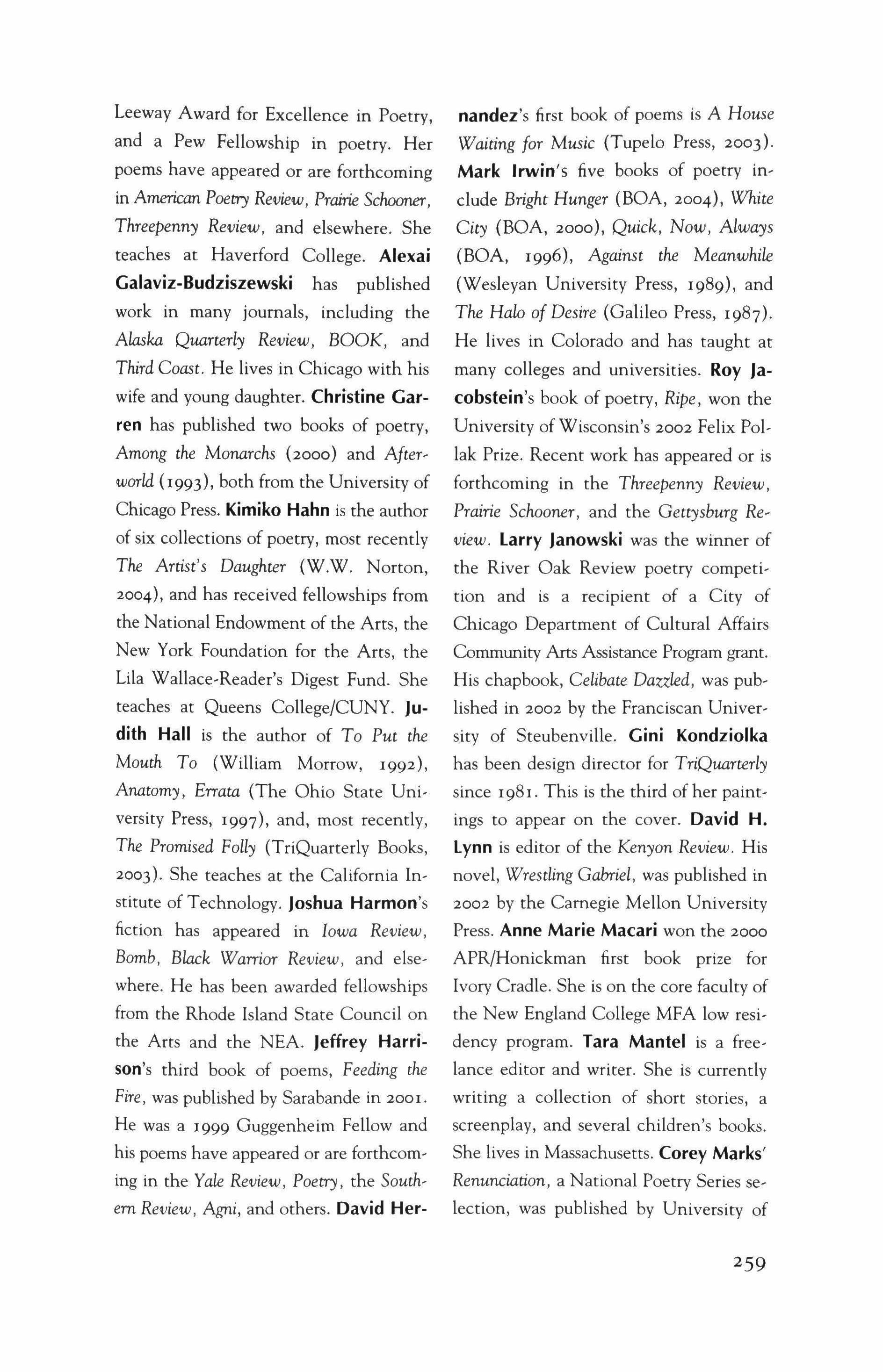
Leeway Award for Excellence in Poetry, and a Pew Fellowship in poetry. Her poems have appeared or are forthcoming in American Poetry Review, Prairie Schooner, Threepenny Review, and elsewhere. She teaches at Haverford College. Alexai Galaviz-Budziszewski has published work in many journals, including the Alaska Quarterly Review, BOOK, and Third Coast. He lives in Chicago with his wife and young daughter. Christine Garren has published two books of poetry, Among the Monarchs (2000) and Afterworld (1993), both from the University of Chicago Press. Kimiko Hahn is the author of six collections of poetry, most recently The Artist's Daughter (W.W. Norton, 2004), and has received fellowships from the National Endowment of the Arts, the New York Foundation for the Arts, the Lila Wallace-Reader's Digest Fund. She teaches at Queens College/CUNY. Judith Hall is the author of To Put the Mouth To (William Morrow, 1992), Anatomy, Errata (The Ohio State University Press, 1997), and, most recently, The Promised Folly (TriQuarterly Books, 2003). She teaches at the California Institute of Technology. Joshua Harmon's fiction has appeared in Iowa Review, Bomb, Black Warrior Review, and elsewhere. He has been awarded fellowships from the Rhode Island State Council on the Arts and the NEA. Jeffrey Harrison's third book of poems, Feeding the Fire, was published by Sarabande in 2001. He was a 1999 Guggenheim Fellow and his poems have appeared or are forthcoming in the Yale Review, Poetry, the Southern Review, Agni, and others. David Her-
nandez's first book of poems is A House Waiting for Music (Tupelo Press, 2003). Mark Irwin's five books of poetry include Bright Hunger (BOA, 2004), White City (BOA, 2000), Quick, Now, Always (BOA, 1996), Against the Meanwhile (Wesleyan University Press, 1989), and The Halo of Desire (Galileo Press, 1987). He lives in Colorado and has taught at many colleges and universities. Roy [acobstein's book of poetry, Ripe, won the University of Wisconsin's 2002 Felix Pollak Prize. Recent work has appeared or is forthcoming in the Threepenny Review, Prairie Schooner, and the Gettysburg Review. Larry Janowski was the winner of the River Oak Review poetry competition and is a recipient of a City of Chicago Department of Cultural Affairs Community Arts Assistance Program grant. His chapbook, Celibate Dazzled, was published in 2002 by the Franciscan University of Steubenville. Gini Kondziolka has been design director for TriQuarterly since 1981. This is the third of her paintings to appear on the cover. David H. Lynn is editor of the Kenyon Review. His novel, Wrestling Gabriel, was published in 2002 by the Carnegie Mellon University Press. Anne Marie Macari won the 2000 APR/Honickman first book prize for Ivory Cradle. She is on the core faculty of the New England College MFA low residency program. Tara Mantel is a freelance editor and writer. She is currently writing a collection of short stories, a screenplay, and several children's books. She lives in Massachusetts. Corey Marks' Renunciation, a National Poetry Series selection, was published by University of
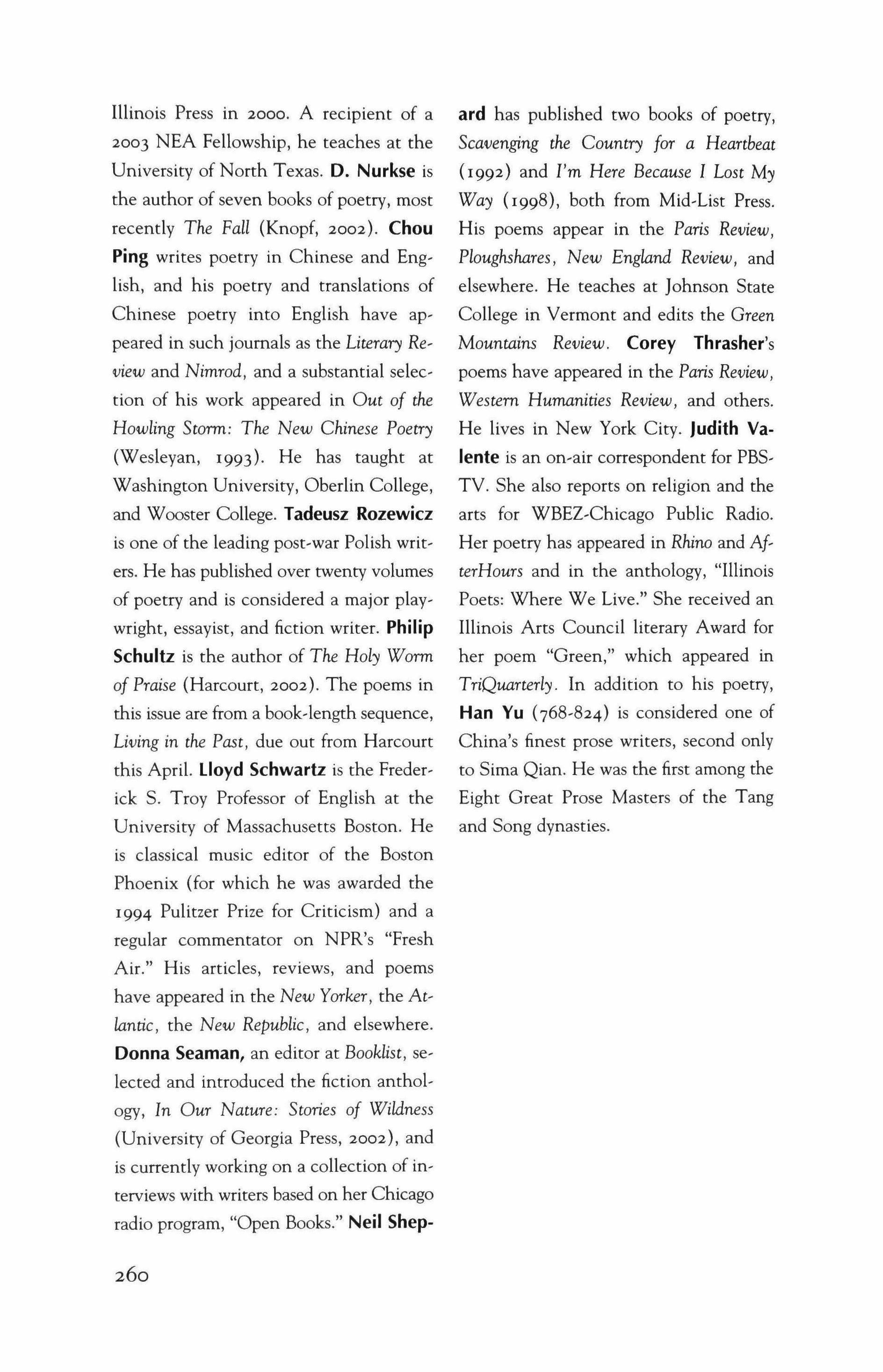
Illinois Press in 2000. A recipient of a 2003 NEA Fellowship, he teaches at the University of North Texas. D. Nurkse is the author of seven books of poetry, most recently The Fall (Knopf, 2002). Chou Ping writes poetry in Chinese and English, and his poetry and translations of Chinese poetry into English have appeared in such journals as the Literary Review and Nimrod, and a substantial selection of his work appeared in Out of the Howling Storm: The New Chinese Poetry (Wesleyan, 1993). He has taught at Washington University, Oberlin College, and Wooster College. Tadeusz Rozewicz is one of the leading post-war Polish writers. He has published over twenty volumes of poetry and is considered a major playwright, essayist, and fiction writer. Philip Schultz is the author of The Holy Worm of Praise (Harcourt, 2002). The poems in this issue are from a book-length sequence, Living in the Past, due out from Harcourt this April. Lloyd Schwartz is the Frederick S. Troy Professor of English at the University of Massachusetts Boston. He is classical music editor of the Boston Phoenix (for which he was awarded the 1994 Pulitzer Prize for Criticism) and a regular commentator on NPR's "Fresh Air." His articles, reviews, and poems have appeared in the New Yorker, the Atlantic, the New Republic, and elsewhere. Donna Seaman, an editor at Booklist, selected and introduced the fiction anthology, In Our Nature: Stories of Wildness (University of Georgia Press, 2002), and is currently working on a collection of interviews with writers based on her Chicago radio program, "Open Books." Neil Shep-
ard has published two books of poetry, Scavenging the Country for a Heartbeat (1992) and I'm Here Because I Lost My Way (1998), both from Mid-List Press. His poems appear in the Paris Review, Ploughshares, New England Review, and elsewhere. He teaches at Johnson State College in Vermont and edits the Green Mountains Review. Corey Thrasher's poems have appeared in the Paris Review, Western Humanities Review, and others. He lives in New York City. Judith Valente is an on-air correspondent for PBSTV. She also reports on religion and the arts for WBEZ-Chicago Public Radio. Her poetry has appeared in Rhino and AiterHours and in the anthology, "Illinois Poets: Where We Live." She received an Illinois Arts Council literary Award for her poem "Green," which appeared in TriQuarterly. In addition to his poetry, Han Yu (768-824) is considered one of China's finest prose writers, second only to Sima Qian. He was the first among the Eight Great Prose Masters of the Tang and Song dynasties.
Subscriptions
Three issues per year. Individuals: one year $24; two years $44; life $600. Institutions: one year h6; two years $68. Overseas: $5 per year additional. Price of back issues varies. Sample copies $5· Address correspondence and subscriptions to TriQuarteTly, Northwestern University, 629 Noyes St., Evanston, IL 60208-4210. Phone (847) 491-7614.
Submissions
The editors invite submissions of fiction, poetry and literary essays, which must be postmarked between October I and March 31; manuscripts postmarked between April I and September 30 will not be read. No manuscripts will be returned unless accompanied by a stamped, self-addressed envelope. All manuscripts accepted for publication become the property of TriQuaTteTly, unless otherwise indicated.
Reprints
Reprints of issues 1-17 of TriQuaTteTly are available in full format from Kraus Reprint Company, Route 100, Millwood, NY 10546, and all issues in microfilm from University Microfilms International, 300 North Zeeb Road, Ann Arbor, MI 48106.
Indexing
TriQuaTteTly is indexed in the Humanities Index (H. W. Wilson Co.), the American Humanities Index (Whitson Publishing Co.), Historical Abstracts, MLA, EBSCO Publishing (Peabody, MA) and Information Access Co. (Foster City, CA).
Distributors
Our national distributors to retail trade are Ingram Periodicals (La Vergne, TN); B. DeBoer (Nutley, NJ); Ubiquiry (Brooklyn, NY); Armadillo (Los Angeles, CA).

Copyright © 2004 by TriQuaTteTly. No part of this volume may be reproduced in any manner without written permission. The views expressed in this magazine are to be attributed to the writers, not the editors or sponsors. Printed in the United States of America by Sheridan Books. Typeset by TriQuaTteTly. ISSN 0041-3097.
Publication of TriQuarterly is made possible in part by the donors of gifts and grants to the magazine. For their recent and continuing support, we are very pleased to thank the lIIinois Arts Council, the Lannan Foundation, the National Endowment for the Arts, the Sara Lee Foundation, the Wendling Foundation and individual donors.
"When the future wants to know about our arts and letters, this is the publication it will turn to."
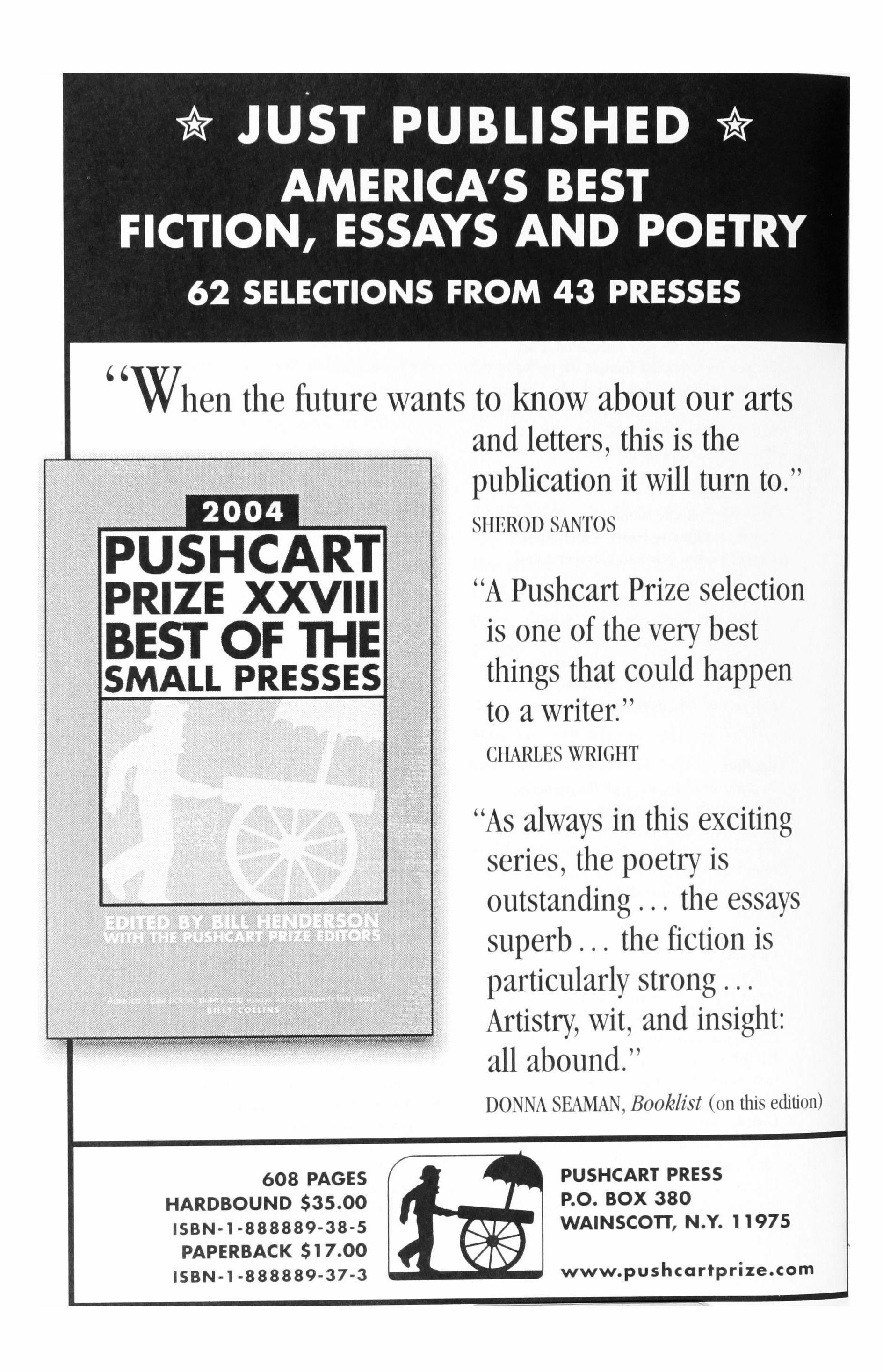
"A Pushcart Prize selection is one of the very best things that could happen to a writer."
CHARLES WRIGHT
"As always in this exciting series, the poetry is outstanding the essays superb the fiction is particularly strong Artistry, wit, and insight: all abound."
DONNA SEAMAN, Booklist (on this edition)
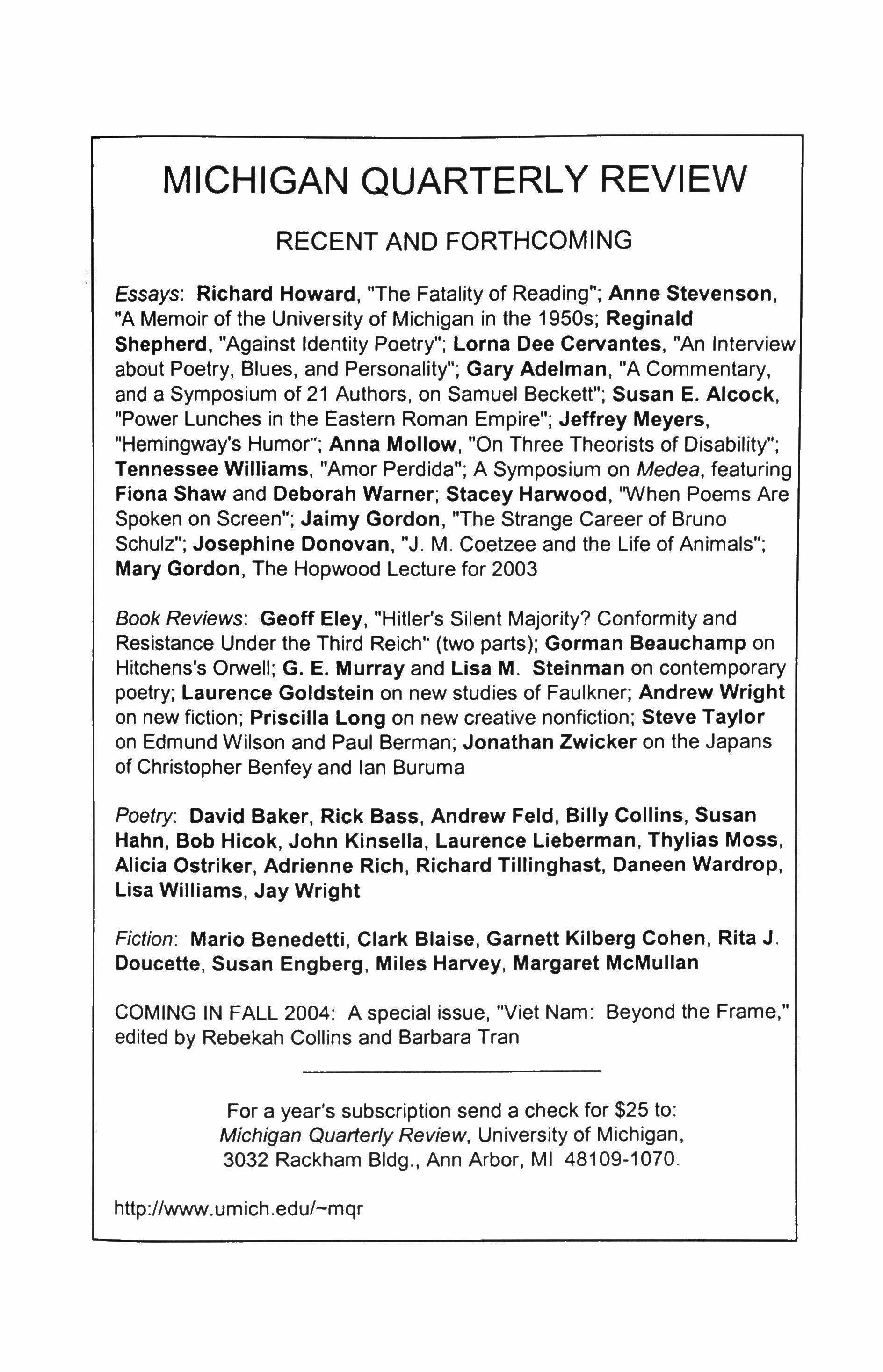
Essays: Richard Howard, "The Fatality of Reading"; Anne Stevenson, "A Memoir of the University of Michigan in the 1950s; Reginald Shepherd, "Against Identity Poetry"; Lorna Dee Cervantes, "An Interview about Poetry, Blues, and Personality"; Gary Adelman, "A Commentary, and a Symposium of 21 Authors, on Samuel Beckett"; Susan E. Alcock, "Power Lunches in the Eastern Roman Empire"; Jeffrey Meyers, "Hemingway's Humor'; Anna Mollow, "On Three Theorists of Disability"; Tennessee Williams, "Amor Perdida"; A Symposium on Medea, featuring Fiona Shaw and Deborah Warner; Stacey Harwood, 'When Poems Are Spoken on Screen"; Jaimy Gordon, "The Strange Career of Bruno Schulz"; Josephine Donovan, "J. M. Coetzee and the Life of Animals"; Mary Gordon, The Hopwood Lecture for 2003
Book Reviews: Geoff Eley, "Hitler's Silent Majority? Conformity and Resistance Under the Third Reich" (two parts); Gorman Beauchamp on Hitchens's Orwell; G. E. Murray and Lisa M. Steinman on contemporary poetry; Laurence Goldstein on new studies of Faulkner; Andrew Wright on new fiction; Priscilla Long on new creative nonfiction; Steve Taylor on Edmund Wilson and Paul Berman; Jonathan Zwicker on the Japans of Christopher Benfey and Ian Buruma
Poetry: David Baker, Rick Bass, Andrew Feld, Billy Collins, Susan Hahn, Bob Hicok, John Kinsella, Laurence Lieberman, Thylias Moss, Alicia Ostriker, Adrienne Rich, Richard Tillinghast, Daneen Wardrop, Lisa Williams, Jay Wright
Fiction: Mario Benedetti, Clark Blaise, Garnett Kilberg Cohen, Rita J. Doucette, Susan Engberg, Miles Harvey, Margaret McMullan
COMING IN FALL 2004: A special issue, "Viet Nam: Beyond the Frame," edited by Rebekah Collins and Barbara Tran
For a year's subscription send a check for $25 to: Michigan Quarterly Review, University of Michigan, 3032 Rackham Bldg., Ann Arbor, MI 48109-1070. http://www.umich.edu/-mqr
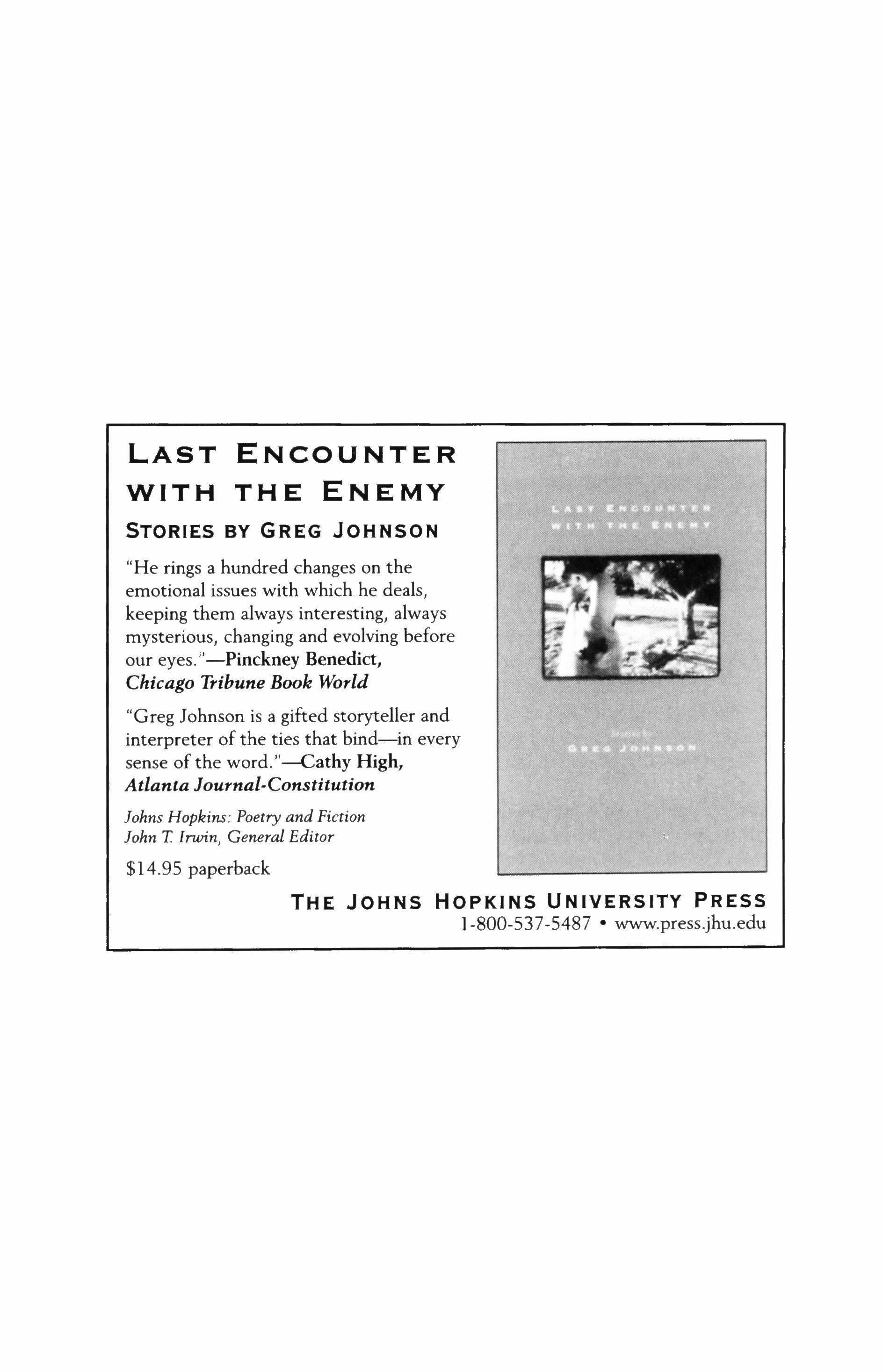
STORIES BY GREG
JOHNSON"He rings a hundred changes on the emotional issues with which he deals, keeping them always interesting, always mysterious, changing and evolving before our eyes. "-Pinckney Benedict, Chicago Tribune Book World
"Greg Johnson is a gifted storyteller and interpreter of the ties that bind-in every sense of the word."--Cathy High, Atlanta Journal-Constitution
fohns Hopkins: Poetry and Fiction
fohn T Irwin, General Editor
$14.95 paperback

